Admiral Mike Mullen's Call to Action
Published on May 3, 2010Watch Admiral Mike Mullen, 17th chairman of the Joint Chiefs of Staff, call on communities here to support veterans as they transition from military service to civilian life.
Charitable Gift Annuities: A Highway, Not A Barrier to Planning
Published on Jun 14, 2019Thor Heyerdahl was an adventurer. After serving as a WWII parachutist, he worked as an anthropologist in South America. Discovering cultural, religious and oral history similarities between Polynesia and Peru led Heyerdahl to speculate on an ancestral connection between the two—an idea in direct opposition to the prevailing theory that the Polynesians were descended from other parts of Asia.
To prove that the ocean was a highway, not a barrier, Heyerdahl mounted an expedition to sail from Peru across the vast Pacific to the Polynesian Islands using a raft typical in material and construction to those used by the pre-Columbian Peruvians. He and five fellow adventurers loaded up Kon-Tiki (their 30 x 15 balsa-wood raft) and set off, reporting by radio on their status and scientific observations. Of course, this perilous 4,300-mile journey required extensive planning and courage, but the team proved the plausibility of Heyerdahl’s theory by reaching Polynesia in 101 days.
Today, philanthropically inclined adventurers may, like Heyerdahl, need assurance that a charitable gift can be “a highway, not a barrier” to income security. Donors who want to make charitable gifts but also want to be assured of future income security may find that a charitable gift annuity lets them do both—create a positive steady stream of income and accomplish another important goal in their philanthropic journey.
Formation: Considering Options and Planning Ahead
Short trips require planning, but longer voyages necessitate a greater investment of time and energy as travelers contend with alternate GPS routes, roadwork, flight schedules, tight connections, security measures, packing restrictions, and inevitable delays. Donors may confront a similar level of alternatives and challenges when setting up a charitable gift annuity (CGA).
Charitable gift annuities are contractual agreements under which a donor agrees to make an irrevocable gift of cash or property (often, long-term appreciated stock) to a qualified charity, and in return, the charity agrees to pay a fixed amount for life to the donor and/or another person designated by the donor, with payments to be made quarterly, semiannually or annually. However, the transaction is not merely a “quid pro quo” between donor and charity. Since the present value of the donor’s annuity is less than the value of the property transferred, the transfer is legally considered part charitable gift and part annuity purchase.
Note: Charitable gift annuities are regulated by state law, so advisors should review the applicable state requirements carefully.
Benefits of a CGA
Of course, the charity benefits from the gift, but there are a number of advantages to donors as well:
- Simplicity. Since a CGA is a contractual arrangement, it is often easier to create and explain than other charitable tools (consider charitable trusts, for example, which require additional legal work and expense to create and administer).
- Immediate tax deduction. The CGA provides an immediate income tax charitable deduction in the year the property is transferred to charity for donors who itemize.
- Income stream. The charity promises to provide annual payments over the lifetime(s) of one or two individuals, with part of each payment considered a tax-free return of principal—a promise backed by the charity’s general assets.
- Flexibility. The donor can choose whether to begin income payouts immediately or defer income until some point in the future.
- Appreciated property tax treatment. When a donor transfers appreciated property in exchange for a gift annuity, the resulting capital gains tax liability (recognized because the transfer is, in part, a taxable exchange of property) can be spread over life expectancy if the donor is the annuitant.
- Smaller gift threshold. Often, the minimum gift amount required is low enough to make gift annuities accessible to a large part of the charity’s donor base.
Types of CGA Agreements
There are typically three types of CGA agreements that fit the varying needs and wishes of the donor.
- Single life—an annuity that pays income to one person for that person’s lifetime.
- Two lives in succession—an annuity that pays first to one person and then, upon that person’s death, to a second person (assuming the second person survives the death of the first person).
- Joint and survivor—an annuity that pays two annuitants during their respective lives, but upon the death of one, pays the full amount of the payment to the surviving annuitant.
Usually, these agreements are fairly standard. They offer donors limited choices and are based on the type of CGA and what is permitted under state law.
Immediate vs Deferred
While an immediate gift annuity begins payments within one year, a deferred gift annuity lets donors postpone the start date of income payments beyond the one-year mark. A deferred annuity significantly increases the annuity amount and the income tax charitable deduction (which is still available in the year of the contribution). Although many high-earning donors find the immediate income tax relief attractive, they neither want nor need additional current income, preferring instead that payments begin later when they can be used to supplement other retirement income.
Funding the Gift
A donor may fund a CGA with cash or property. Though cash is the simplest option, using appreciated property (say, securities held for more than one year) lets donors avoid capital gains tax on the gift part of the CGA. In addition, the long-term capital gain realized on the annuity part of the CGA can be evenly spread across each year of the donor’s life expectancy.
Avoid funding a CGA with property that cannot be easily valued or sold. Payments for an immediate CGA must begin within a year, and the charity would be at a disadvantage if it could not quickly convert the funding asset into income-producing property.
The Gift Annuity Rate
Each charity determines its own annuity rate, but most charities adopt a rate similar to the schedule of rates published by the American Council on Gift Annuities (ACGA)—a nonprofit that has long published suggested maximum charitable gift annuity rates recognized as actuarially sound by state insurance departments and the IRS.
The Gift Amount
Each charity determines its own minimum amount necessary to establish a CGA. In many cases, this minimum is much lower than the threshold required for other charitable giving tools.
Long-Range Planning—For Fun and Financial Security
Though Thor Heyerdahl only took 101 days to cross the Pacific Ocean from Peru to Polynesia, experts warn that if you plan to visit Walt Disney World or Universal Studios in Orlando, you need to have resort rooms booked 365 days in advance, dining reservations made 180 days in advance, and ride reservations in place 60 days in advance. Despite the excessive planning that is necessary, millions of people eagerly plan visits, walking away at the end of their holiday with zero regrets and great memories of the vacation of a lifetime.
For donors, a little extra planning may provide them with the exact benefits they’d hoped for—a way to make a heartfelt gift to a favorite charity while securing a guaranteed income stream for life. In fact, when a donor understands this giving tool, makes wise choices when it comes to type and funding, and realizes how to avoid potential tax hazards, it’s easy to walk away with zero regrets. And while a charitable gift annuity may not make a donor vacation-of-a-lifetime happy, there can be true joy found in making a real difference to a meaningful charity while simultaneously securing future income and enjoying a current tax advantage.
[1] Thor Heyerdahl Biography (https://www.biography.com/people/thor-heyerdahl-21183589).
Value of Faith-Based Network for Veteran Transitioning
Published on Oct 2, 2014In communities across our country, local faith leaders find themselves on the front lines of helping our returning veterans with issues ranging from suicide and domestic violence to basic needs assistance. Spiritual wellness, along with emotional, physical, social and family wellness, makes up one of the National Guard's "Five Pillars of Wellness", which are seen as a roadmap to resiliency. Whether or not one connects with a religion, spiritual wellness means finding a sense of hope and belonging, and therefore not becoming isolated.
Over a three year period, the Lincoln Community Foundation has funded a faithbased organization that strives to bring all faith communities together in common spirit and purpose to work hand in hand within the county area. They organized their Second Annual Faith Community Disaster Preparedness Conference last month. Knowing that our veterans are hard-wired for service and volunteering, they have been working with the Southeast Nebraska Emergency Response Group to organize veterans to assist with follow-up services after disasters. In conjunction with the local disaster scenario they have identified 730 faith-based groups within Lancaster County and are compiling a Faith Community Directory as a resource that will identify which faith communities would be able to supply space for beds and kitchens for serving hot meals if needed.
They have initiated a "Vets to Vets" program in local churches to provide "safe places" for veterans to meet and share in a non-threatening environment. Some services have been provided to older vets, such as rides to appointments. The organization has sponsored a Traumatic Brain Injury and PTSD Treatment Training Seminar as well as partnered with a local addiction and mental health organization on a "Veterans in Transition" program. We know that transitioning back to civilian life is difficult for our men and women who have served in Iraq and Afghanistan. Yes, of course, they are in need of the social capital that helps them connect to educational and job opportunities, but the Lincoln Community Foundation feels it would be remiss to overlook the inestimable value of the relational network our faith communities can provide.
Sincerely,
Rob McMaster
Rob McMaster
Internal Operations Coordinator
Lincoln Community Foundation, Inc.
May 30 Give to Lincoln Day Stretches Donor Dollars
Published on Apr 26, 2019Record $450,000 in matching funds
Lincoln, Neb. – Lincoln’s 8th annual giving day is scheduled for Thursday, May 30. Organized by the Lincoln Community Foundation, Give to Lincoln Day is a 24-hour online event encouraging donations to support the local nonprofits and causes people care about.
Every participating nonprofit organization will receive a proportional share of the record $450,000 match fund, based upon its percentage of total dollars raised. Give to Lincoln Day 2019 will have the largest match fund in the event’s seven-year history thanks to a generous gift from West Gate Bank and several other supporting sponsors.
A record number of nonprofit organizations are participating in Give to Lincoln Day this year. A total of 439 local charities, including 51 who are participating for the first time, have registered.
Last year’s event raised a record $4.6 million for 404 local nonprofits. “Lincoln’s generosity year after year is remarkable,” said Barbara Bartle, President of Lincoln Community Foundation. “Give to Lincoln Day has become a badge of honor for our community. It is a day when we come together to give our thanks and our gifts to the nonprofits for their tremendous impact in our city.”
The public is encouraged to visit Lincoln Community Foundation’s Tower Square at 13th & P Streets on May 30. Nearly 70 organizations will be there from 10 a.m. to 2 p.m. with hands-on activities, demonstrations and information about their programs. There will be a live performance at Noon by PANgea.
Donors may search nonprofits and give online at GiveToLincoln.com. Donors can plan ahead and begin giving online starting May 1 but all donations must be made before 11:59 p.m. on May 30 to count toward the giving day and the match fund. The minimum donation is $10 per charity. Donations will be charged to a credit or debit card.
Anyone who prefers not to give online can donate in person on May 30 only at one of three donations stations:
- Lincoln Community Foundation office, 215 Centennial Mall South, from 8:00am to 5:00pm
- Tower Square, 13th & P Streets, from 10:00am to 2:00pm
- West Gate Bank, 6003 Old Cheney Road, 9:00am to 4:00pm
On May 30, donation totals can be viewed throughout the day at GiveToLincoln.com.
The Lincoln Community Foundation, established in 1955, strives to continually enrich the Lincoln community by promoting and achieving perpetual philanthropic support. The foundation currently manages $127 million in assets and has distributed more than $130 million in grants to nonprofit organizations that have improved the lives of thousands of residents.
Give To Lincoln Day coming May 18
Published on May 5, 2017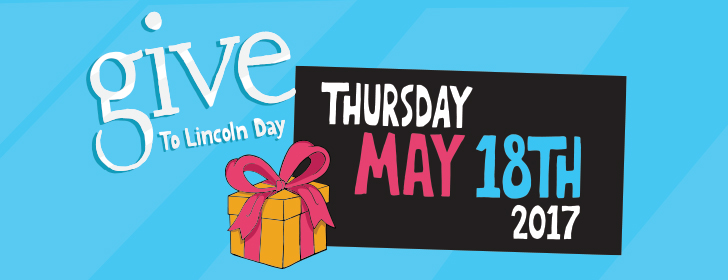
This year, your gifts are even more powerful!
The sixth annual Give To Lincoln Day is coming up on Thursday, May 18 and is on pace to make the most impact so far. This 24-hour online event encourages donations to support the organizations and causes that people care about. . “We continue to hear from local nonprofits that Give to Lincoln Day serves an important role in increasing not just funding but also awareness of their causes,” said Barbara Bartle, President of Lincoln Community Foundation. “We are honored to host this event that so beautifully advances the culture of philanthropy in our great city.”
Biggest match fund yet! $350,000 to be shared with local nonprofits.
Local nonprofits participating in Give to Lincoln Day will benefit from a larger match pool to boost their donations. Each year since Lincoln Community Foundation started Give to Lincoln Day, the match pool has been a motivating factor for donors who want to make the most of their gifts. The match fund increases every donation, making each gift even more meaningful. Every nonprofit organization will receive a proportional share of the match fund, based upon their percentage of the total dollars raised for Give To Lincoln Day. We thank the generous local businesses and families who joined Lincoln Community Foundation in contributing to this fund.
New online fundraising platform designed by local business and local students.
Lincoln Community Foundation tries to use local vendors whenever possible but until now, there were no Lincoln-based online platforms for giving days. Lincoln-based technology company, Firespring, has been working with a student team from the Jeffrey S. Raikes School of Computer Science and Management at UNL to design a new online fundraising platform which will be introduced for 2017 Give To Lincoln Day. This unique collaboration between Firespring and Lincoln Community Foundation will reduce fees and result in nonprofits retaining more of each gift they receive.
Give Online at www.GiveToLincoln.com starting May 1
Gifts can be made online beginning May 1 and will qualify for Give To Lincoln Day and the match fund. On May 18, from 12 a.m. to 11:59 pm, these donations and all gifts made throughout the day will be shown in real time on the website leaderboard. The minimum donation is $10.
The Lincoln Community Foundation will also receive donations from people who prefer to make their gifts in person at the Foundation office between 8 am and 5 pm on May 18.
Fun in Tower Square
The public is encouraged to stop by Tower Square at 13th & P Street on Give to Lincoln Day between 10 am and 2 pm. Many of the participating nonprofits will be there with hands-on activities to enjoy and information about their causes.
Winter 2017 Newsletter
Published on Jan 26, 2017A grant sends Lincoln Police Department officers to Sex Trafficking Summit to bring back expertise that will help Lincoln fight the problem, Walter Canney creates fund to help veterans, Pumphrey scholarship has helped students for 36 years.
Download the newsletter to read more.
Winter/Spring 2019 Newsletter
Published on Apr 12, 2019To catch up on the latest Lincoln Community Foundation happenings click here to download the newsletter.
Survivors just want us to remember
Published on Jul 11, 2018Traveling slowly through Wyuka Cemetery’s winding roads, visitors will come across a giant triangular sculpture tucked into the northeast corner of the all-faith cemetery. The striking silver monument is dedicated to the memory of those who perished in the Holocaust and in honor of all the liberators and survivors of the Nazi concentration camps. The Nebraska Holocaust Memorial was created through the support of thoughtful Nebraska citizens with the intent to remember and educate on lessons of history.
Wyuka Cemetery is an ideal location for the memorial because it is the nation’s only state cemetery. “Nebraskans of all walks of life are buried at Wyuka,” said Gary Hill, volunteer Managing Director of the Nebraska Holocaust Memorial. “Governors, military, slaves, civil war soldiers, unmarked graves,” he said could be found here. “Black and white, rich and poor.”
Next to the large monument, visitors will find the Wall of Remembrance as well as the Children’s Butterfly Garden. A “sea of stones” surrounding the monument represent the millions of men, women and children who were systematically murdered by the Nazis and their collaborators. “There are an estimated 11 million stones,” Hill said. “While 6 million were Jews, many others – including gypsies, homosexuals and Catholics - were slaughtered in this government-sponsored genocide.”
Within the stone garden are bricks with the names of individuals with Nebraska ties who died in the holocaust. Visitors often place stones from the garden on the memorial, following the Jewish tradition of leaving a stone to indicate the loved one was not forgotten.
Lincoln Community Foundation is home to the Sam and Frances Fried Holocaust Memorial Maintenance Fund, which helps to preserve the memorial. “Our goal is to have enough endowment that money will never be an issue for volunteers in the future,” said Hill. He and a team of volunteers, along with the grounds staff at Wyuka, care for the memorial, ensuring that visitors who stop by from near and far have a personal and valuable experience.
The memorial, dedicated in 2007, receives no state funds. Schools from around the state visit the Memorial annually, and ongoing educational programming is a priority. Organizers are creating a new website that will allow students to trace family histories.
Individuals can support the ongoing educational improvements by donating $100 toward personalized bricks. Hill also hopes to adda brick to the butterfly garden with the name of every middle and high school in Nebraska.
Gary has become a Legacy Society member at LCF for his end of life gift that will contribute to the ongoing maintenance and improvement of the Memorial.
His advice to donors who want to leave their mark is, “Find what does good in the community.” Hill encourages others to consider leaving a portion of a family estate to the Lincoln Community Foundation with instructions indicating the causes or organizations you wish to support.
The memorial is considered one of Lincoln’s top 50 attractions by TripAdvisor.com. A visitor from Brooklyn, NY left a review on Trip Advisor, “It was so beautiful, so quiet, so well done that of course my tears just flowed.”
Tell us what is making a mark in Lincoln that you’d like to support. To find a way to make a lasting gift, contact Chip DeBuse, VP for Development, at 402-474 2345 or chipd@lcf.org.
Barbara Bartle Receives Community Impact Award
Published on May 5, 2017The Lincoln Independent Business Association presented the 2017 Community Impact Award to Lincoln Community Foundation President Barbara Bartle. This award is presented for being a “good steward” of the community and making Lincoln a much better place to live.
Lincoln Forever Brochure
Published on Mar 14, 2017The noble goal of the Foundation can most easily be captured in the two simple words that grace the cover of this brochure: LINCOLN FOREVER.
Give to Lincoln Day Raises Nearly $5.6 Million
Published on Jul 25, 2019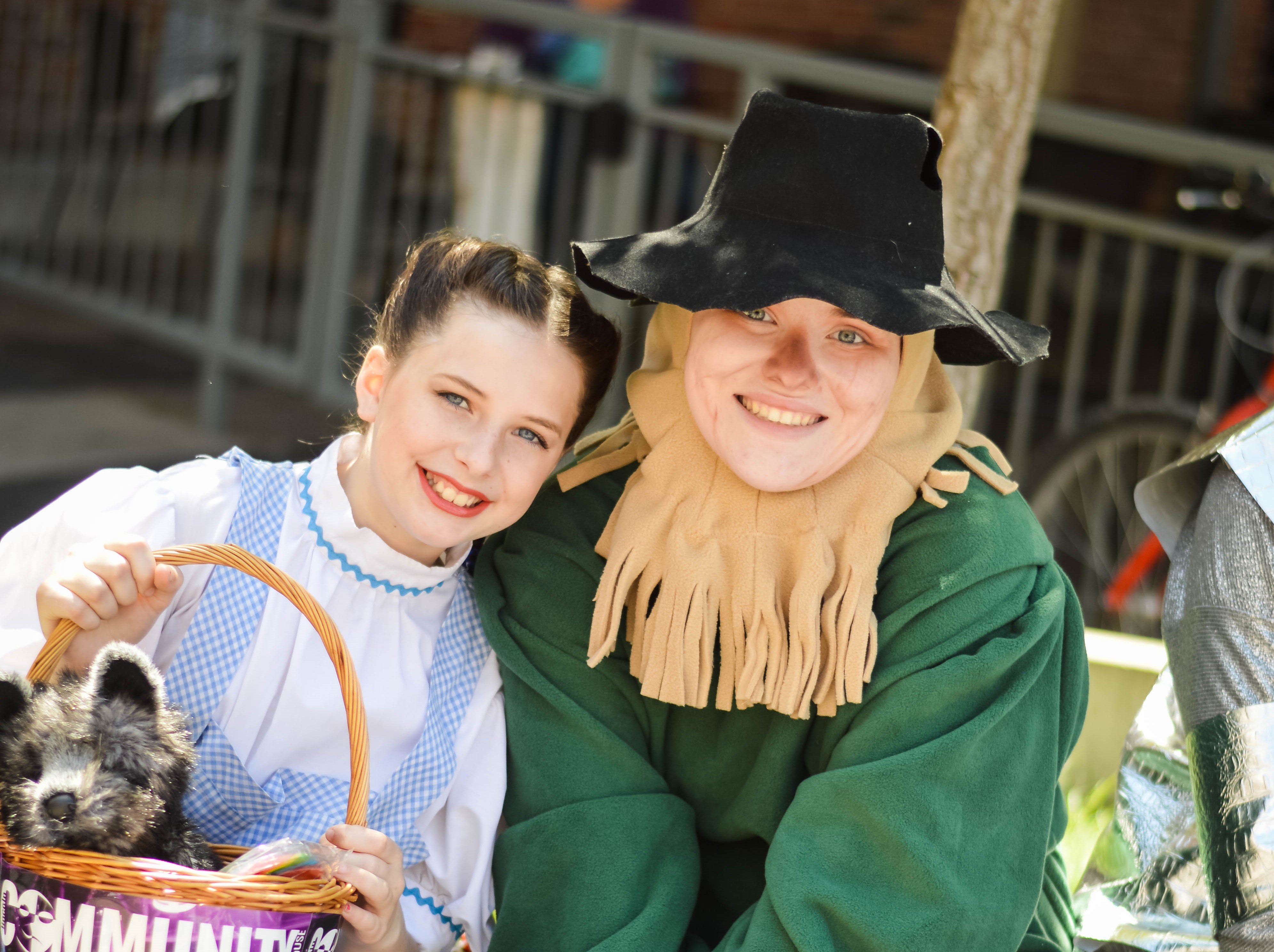
Give to Lincoln Day on May 30th raised a record-breaking $5,581,856, nearly $1 million more than the previous record set last year. The funds were designated to help support 438 local nonprofits that serve Lincoln and Lancaster County. All participating nonprofits will receive a proportional share of a $450,000 match fund provided by Lincoln Community Foundation, lead sponsor West Gate Bank, and other sponsors, based upon the organization’s percentage of the total dollars raised.
“Our generous community spirit continues to inspire me year after year,” said Barbara Bartle, President of the Lincoln Community Foundation. “The generosity of our community affects all aspects of Lincoln’s quality of life, including feeding the hungry, addressing physical and mental health, teaching skills for employment, giving children opportunity, and supporting pets, the arts, the environment and our parks.”
More than 21,000 individual donations were received for the 8th annual Give to Lincoln Day, an increase of almost 2,000 from the previous year. “Since Give to Lincoln Day began in 2012, donors have contributed more than $26 million to our nonprofits,” said Bartle. “Love was in the public square that day. We are so grateful to the caring Lincoln citizens on this remarkable day of giving.”
For more information and to see gifts received for each nonprofit, visit www.GiveToLincoln.com.
Do you want to play a BIG part in 2020’s Give to Lincoln Day? Learn how you can “love them all” by being a Match Fund Sponsor. Contact Tracy Edgerton, VP for Strategic Giving at 402-474-2345 or tracye@lcf.org.
Revocable Charitable Gifts: For On-Again/Off-Again Donor Relationships
Published on Aug 23, 2019On-again/off-again relationships can be fascinating to watch as long as you aren’t a part of the ride. Cheers, the award-winning TV show, featured one of the most celebrated on-again/off-again relationships between bartender Sam Malone and waitress Diane Chambers. Audiences laughed at their banter, identified with their romantic frustration, and shared their heartache—whether Sam left Diane or Diane left Sam. Over the years, Sam and Diane’s relationship cooled to make room for other characters and story arcs. Still, for viewers who lived with their own on-again/off-again relationships, Sam and Diane remained a cultural touchstone long after their storyline faded.
When we think about on-again/off-again relationships, we usually think about romance, but these relationships can also apply to charitable giving. Consider a donor who is passionately committed to making a gift to benefit a much-loved charity until, at some point in the future, something changes. When a donor makes a traditional, irrevocable gift, there is nothing the donor can do to alter the gift. However, when the donor makes a revocable gift, it is possible to change the gift to reflect the donor’s changing needs or objectives.
In this issue of CHARITABLE GIVING, we look at the process and challenges of revocable charitable gifts, including:
- •Bequests: The Traditional Way to Give
- •Revocable Trusts: An Effective and Flexible Planning Tool
- •Beneficiary Designations: An Easy Alternative
Bequests: The Traditional Way to Give
No celebrity couple exemplifies the on-again/off-again relationship better than Elizabeth Taylor and Richard Burton. The two met on the set of Cleopatra in the early 1960s and began a tempestuous romance that captivated the attention of paparazzi and fans around the globe. They were already married to others when they met, but both divorced their respective spouses so they could be together. In the years that followed, the couple married, divorced, remarried, and divorced again. With each divorce came rumors of reconciliation, and for good reason—Taylor and Burton seemed fated to be together and were drawn to each other until Burton died in 1984.
For donors who want the option to change their minds as often as Taylor and Burton did, there is no more “classic” revocable gift than a charitable bequest in a will. A will is the foundation of most estate plans—a legal document created by a testator under the laws of his or her state of residence.
A will primarily directs the distribution of the assets in the decedent’s estate. The testator uses a bequest to transfer specific property (money, stock, jewelry, artworks, and so on) to an individual or to charity. For many testators, a charitable bequest is a key component of their estate plan—a way to benefit a favorite cause or organization, honor an alma mater, or further the work of a religious institution.
The charitable bequest is a tremendous tool that provides donors with an easy, flexible way to make an impact by designating that one or more meaningful organizations or institutions receive:
- •A specified amount of money
- •A particular asset
- •A percentage of the value of the estate
- •The residue of the estate (in other words, those estate assets remaining after all other specific bequests, taxes, and expenses are paid)
A testator can include a bequest when the will is created or make a gift later by adding a codicil to the will. The testator can also invalidate the will simply by creating a new one, at which point the testator must decide whether to include the original bequest in the new will.
NOTE: It is usually beneficial for estate planning professionals to proactively ask clients about their charitable intentions as part of the will preparation process. Clients often focus on heirs and forget (or do not know) that they can include a charitable bequest. In addition, professionals can help testators avoid errors in bequest language and execution that can jeopardize an estate tax charitable deduction.
Revocable Trusts: An Effective and Flexible Planning Tool
If a will is considered the primary estate planning tool, a trust is not far behind. A trust is a legal entity under state law that holds property transferred by the grantor (the person who created the trust) and directs the distribution of property according to the grantor’s wishes. The grantor selects one or more trustees to manage the trust property for the benefit of the trust’s named beneficiaries. A trust provides the grantor with a degree of control that simply is not possible with a will.
The Five Basic Elements of a Trust
-
•Grantor—The individual who sets up the trust by transferring assets to a third party.
-
•Trustee—The individual, corporation, or bank that keeps legal title, possession, and control over the trust property.
-
•Trust Property—Otherwise known as the “corpus,” this may include anything capable of being legally owned, from real or personal property to a contract right (such as a life insurance policy).
-
•Beneficiaries—One or more named recipients of the trust income and corpus.
-
•Trust Terms—The instructions directing the trustee as to specific duties and distribution requirements.
A trust can be either revocable or irrevocable, depending on the terms of the trust agreement as determined by the grantor and as drafted by the grantor’s legal counsel.
-
•A revocable trust (also known as a living trust, revocable living trust, or inter vivos trust) is extremely flexible, allowing the grantor to make changes to trust terms or property or to revoke the trust entirely during life. The trust only becomes irrevocable at the grantor’s death.
-
•An irrevocable trust cannot be changed—at the time of creation, the grantor surrenders all ownership rights to the trust property.
The most prominent trusts used for charitable giving purposes are irrevocable (for example, charitable remainder trusts), but revocable trusts also provide giving options. A gift made through a revocable trust is like a bequest in a will—the grantor can modify or even remove the gift if circumstances change, but the gift becomes irrevocable at the grantor’s death. A charitable gift in a revocable trust requires the same diligence and care as a bequest, along with a similar level of additional documentation, follow-up, and communication.
Beneficiary Designations: An Easy Alternative
For donors who value flexibility, viewing revocable charitable gifts only in terms of estate planning documents would be a mistake. There is another easy, revocable option—naming the charity as the beneficiary of a life insurance policy or financial account. These gifts bypass the probate process and go directly to the charity, which typically means the charity receives a beneficiary gift much sooner than a gift made through a will.
A donor might consider using a beneficiary designation to make a gift with a:
- •Life insurance policy
- •Bank account
- •Brokerage account
- •Qualified retirement plan
- •IRA
- •401(k)
NOTE: There are good reasons for clients to use retirement assets to make a charitable gift, including a decreased tax burden on heirs. However, qualified plan owners must take care when naming a non-spouse beneficiary, as written spousal consent is often required under federal and/or state law.i
Using this type of revocable gift is a straightforward way to donate certain assets by simply designating the charity as the beneficiary on forms provided by the insurer, bank, or retirement account custodian. Donors must be sure to identify the charity using the organization’s proper name, address, and tax ID number. Like bequests and revocable trusts, a beneficiary designation is easy to update if the donor’s needs change.
Of course, donors should understand that the beneficiary designation controls the distribution of the policy or account, even in the face of conflicting distribution instructions found in the donor’s will or trust. Any instructions left in a will or trust regarding these items will have no effect if the asset is not left to the estate or the trust.ii
The Appeal of On-Again/Off-Again Relationships
Whether it is a fictional couple like Ross and Rachel from the TV show Friends, a real-life couple (or former couple) like Justin Beiber and Selena Gomez, or a sports star like LeBron James and his relationship to the city of Cleveland, most people understand the dynamics of on-again/off-again relationships. People involved in these relationships put up with the painful parts for many reasons, but first among them is often the potential for what might be.
This same sense of potential applies to revocable charitable gifts. Even though the donor may revoke the gift, most donors do not. In fact, revocable gifts are most often delivered as promised, fulfilling the donor’s desire to make a difference and providing a much-needed benefit to the charity. However, preserving the option to make a change, if necessary, relieves stress on donors who worry about an uncertain future.
Changing the Landscape from Nebraska to D.C.
Published on Nov 11, 2019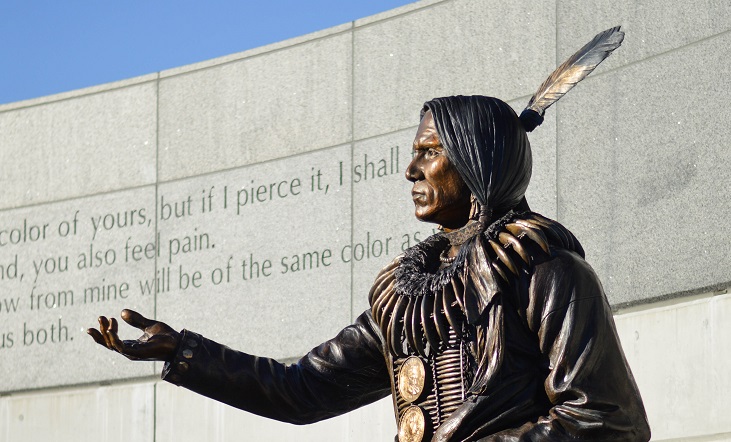
Donald Campbell believed he found the story of Nebraska when he discovered the story of Ponca Chief Standing Bear.
“His story is the story of our community, our state – ultimately a tale of sensitivity and kindness – capturing the essence of who we are and what we represent,” said Don.
Chief Standing Bear’s legacy so moved this Lincoln native – this philanthropist, lover and benefactor of the arts – he provided major funding to commission a world-class sculptor to create three dramatic 10-foot Standing Bear bronze castings, now poised on land stretching from Nebraska’s Niobrara River eastward to the Atlantic Ocean.
One statue stands grand and tall on the University of Nebraska-Lincoln’s edge of Centennial Mall, dedicated in October 2017. A second rests regally on a hill overlooking the Ponca tribe’s homeland near Niobrara. The final of the three – installed this fall – took its proud place in a prominent position within the National Statuary Hall at the U.S. Capitol in Washington, D.C., as one of two statues designated by the Nebraska State Senate.
These gorgeous works recognizing Standing Bear’s quintessential place in Nebraska history emerge from a unique partnership between Don, the City of Lincoln and the Nebraska Commission on Indian Affairs, with Don donating funds for the D.C. sculpture through the Lincoln Community Foundation and a qualified charitable distribution from his IRA.
Judi gaiashkibos, executive director of the Nebraska Commission on Indian Affairs, said Don’s gift has changed the landscape of Lincoln. “Don is a very kind and humble man who has a deep regard for history, and through his support of Standing Bear, is leaving a major legacy that will inspire others to do better. He is Standing Bear Strong,” said Judi.
She remembered how Don felt an immediate sense of compassion for this Ponca chief. “Don was so impressed with the dignity Standing Bear was able to maintain in the face of such shameful treatment. He agreed with me that the story of Standing Bear was a teachable moment in America’s history.”
Don has lived in San Francisco much of his professional life and was largely unaware of Standing Bear until he learned the narrative from Judi in their shared experience as Doane University Trustees.
“Judi had this dream to honor Standing Bear, and when she introduced me to his story – I knew something had to happen,” he remembered. “Here was a story of national importance, yet it had not been told … Here was a man who brought dignity to our Native Americans, and we had the opportunity to do something significant.”
Don helped commission renowned artist Ben Victor, whose ultimate sculpture captured the powerful image from 1879 when the Ponca tribal leader stood on trial, his right hand outstretched, fighting for the freedom to return to his homeland and bury his son.
The first two castings remain in Nebraska. The final piece arrived in the nation’s capital in September, a reality that happened thanks to Don’s unique gift to the Lincoln Community Foundation made possible with a qualified charitable distribution from his IRA (see sidebar).
“Lincoln is my home, Nebraska is my home, and it feels very good to have been part of this,” Don said. “This is a piece of Nebraska history, a piece of Native American history, that is an essential part of the nation’s history. We have not always done a good job of telling the story of Native Americans, and this is a wonderful chance to pass on that story to the future.”
USING IRAS FOR CHARITABLE GIFTS
Don Campbell made a qualified charitable distribution (QCD) from his IRA to a special fund at the Lincoln Community Foundation in order to bring the story and sculpture of Ponca Chief Standing Bear to Washington, D.C. this fall.
“When you reach a certain age, you must start taking money out of your IRA accounts,” Don explained. “But I discovered one viable alternative if you are in a position to give, where you can donate a limited amount of IRA funds to a charity. It counts toward the money you must take out but is not taxed. What a great way to give back to your community.”
If you are age 70½ or older and make a contribution directly from your IRA to a qualified charity, such as the Lincoln Community Foundation, you can donate up to $100,000 without it being considered a taxable distribution. For married couples, each spouse can make a qualified charitable distribution up to the $100,000 limit for a potential total of $200,000.
A QCD may offer tax advantages over a direct cash gift by the donor:
- • If the donor does not itemize deductions, a charitable gift made with cash will create no tax benefit. By contrast a QCD counts toward the donor’s Required Minimum Distribution but is not included in the donor’s adjusted gross income. The tax benefit is that a distribution from the IRA that would otherwise be taxable becomes non-taxable when it goes directly to charity.
- • The exclusion of the QCD amount from the donor’s adjusted gross income may also positively affect several other calculations such as the amount of social security benefits that are taxable and the cost of the donor’s Medicare premium.
For more information and examples of ways you can use an IRA contribution to achieve your charitable goals, contact Chip DeBuse at 402-474-2345 or chipd@lcf.org.
Strengthening the Community of the Future
Published on Nov 11, 2019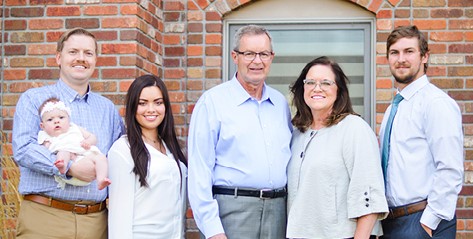 Twenty-five years ago, no one could have imagined a world with Google, gene therapy or smartphones. Yet-to-beimagined realities like these were one reason Pat and Ellen Beans decided to establish an unrestricted endowment at the Lincoln Community Foundation.
Twenty-five years ago, no one could have imagined a world with Google, gene therapy or smartphones. Yet-to-beimagined realities like these were one reason Pat and Ellen Beans decided to establish an unrestricted endowment at the Lincoln Community Foundation.
“We are placing our trust that the needs of tomorrow will be identified, and that our funds will help support the effort to address them,” said Ellen.
This commitment to community runs deep in the Beans.
“My mom and dad were great role models,” said Ellen. “They were very giving of themselves.” Ellen is in her 38th year with Bryan Health, where she oversees volunteering, patient experience and customer care.
“Bryan is a great example of a caring community,” she said. “It’s been a great journey for me, because health care and volunteerism are ever-changing.”
Pat, finance manager of Amandla LLC, began volunteering while attending Doane University and credits their sons Beau and Winston with strengthening his commitment to the community.
“There’s a lot we couldn’t have experienced or done if we didn’t have our kids,” he said. As a Meals on Wheels volunteer, he’d sometimes take Winston with him to make the deliveries. Ellen said they often took the boys whenever and wherever they volunteered. Those outings proved to be eye-opening experiences for the family.
“Volunteering for a non-profit really changed our journey,” said Pat. “By volunteering, you can see the needs of our community.” By making such efforts a family event, the Beans have helped pass along their community spirit to their sons.
“We have a firm belief in volunteering and have tried to raise our sons with that belief,” said Ellen.
With passions that range from health care to the arts, the Beans were drawn to the open-ended possibilities that come with an unrestricted endowment.
“While I’m alive, I have the option to be passionate about a project or need,” said Ellen. “After we’re gone, I hope our funds will be used in a way that reflects others’ passions and needs.”
Pat sees great potential in the flexibility that comes with the unrestricted endowment. “The needs of the community will change, but the need will always be there. By not being limited to a specific area, each year, those funds can go towards different needs,” he said. “This allows the Lincoln Community Foundation to put the money where that year’s greatest needs are.”
Ellen sees another advantage to this type of giving. “With the unrestricted endowment, those needs can be addressed sooner because the funding is already in place,” she said.
Pat believes that Lincoln is a better place today because of the impact of a previous generation’s endowments. “Today, we see funds being distributed from someone’s endowment that was set up years ago,” he said. “By setting up our endowment now, we have the chance to strengthen the community in the future.”
Ellen considers the unrestricted endowment to be an extension of volunteering and hopes that people see the validity of doing both.
“We can either choose to observe or to participate. We have to make that choice while we are living,” she said. “The endowment gives me a sense of peace, a way of making sure that the good continues.”
The Beans may not know what the future holds for Lincoln, but they do know that they can help make sure the community’s needs will continue to be addressed.
“We truly believe in this community and have placed our trust in the Lincoln Community Foundation,” said Ellen.
To learn more about establishing an unrestricted endowment at the Lincoln Community Foundation, contact Paula Metcalf at 402-474-2345 or paulam@lcf.org.
Charitable Giving eNews
Published on Aug 1, 2016Click on the following to download Charitable Giving eNewsletter:
Turning Lincoln Vital Signs Data into Action
Published on Sep 21, 2022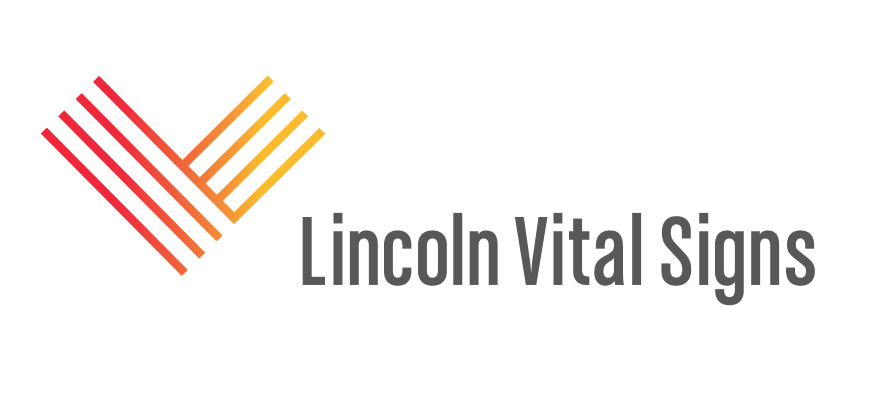
Alec Gorynski, President, Lincoln Community Foundation
Originally published in the Lincoln Journal Star, September 21, 2022
Strong communities use data to make collective changes that ensure everyone has the opportunity to succeed and thrive. Since 2014, Lincoln’s data report – Lincoln Vital Signs – informs Lincoln residents about trends affecting our city and invites collaboration across our all sectors of our community to address its findings.
In 2014, a group of public and private organizations commissioned the first Lincoln Vital Signs report to educate ourselves about the socio-economic conditions of our community and inform funding decisions. Now in its fifth iteration, the recently published 2022 Lincoln Vital Signs report provides us with a shared understanding of our community strengths, persistent concerns, and overall population shifts.
This information is critically important as our community leaders continue to work toward our shared economic and social prosperity. Lincoln Vital Signs is actively informing organizations such as Lincoln Chamber of Commerce, United Way, Lincoln Community Foundation, and many other agencies as we work on the long-term needs and goals of our community.
The data from Lincoln Vital Signs inspires and shapes giving strategies of both individual donors and institutional foundations and is helping nonprofit organizations orient their programs toward clearly articulated needs. Lincoln Vital Signs also substantiates our Proser Lincoln community agenda, which continues facilitate collaborative efforts to address early childhood, affordable housing, strong neighborhoods, and an innovative workforce.
Overall, the recent report tells us that Lincoln continues to flourish in many ways. We have a high-quality workforce with low unemployment. Lincoln is a safe place to live, as evidenced by low property and violent crime rates compared to cities of a similar size.
We continue to become a more diverse community, with persons of color now making up 21% of our population. Poverty, homelessness, and food insecurity are all lower since the original Vital Signs report in 2014; and we saw a reduction in the number of census tracts experiencing extreme poverty.
Although many trends are moving in a positive direction, there are still some areas for concern. Per capita income adjusted for cost of living continues to trail the nation’s average, and this gap is increasing. The cost of early childhood education continues to rise, an issue of critical concern for working families.
Lincoln’s unemployment rate for racially minority populations is higher than Lincoln’s total unemployment and the poverty rate among black residents is more than double the rate for white residents.
General population shifts will shape future demand for services and programs. People moving into Lincoln have recently been driving our overall population growth, with half of those moving here being young adults 18 to 24 years of age. However, Lincoln’s overall population is aging, as our 65+ population has grown more than four times faster than any other age group in the past decade.
Local funders and institutions, in partnership with the University of Nebraska Public Policy Center, have continued to invest in and produce Vital Signs to ensure our community operates under a comprehensive and consistent set of metrics. I am grateful to our peer funders and the University of Nebraska Public Policy Center for making the Lincoln Vital Signs report possible.
For our community to become all we know it can be, we need to work together to do what we can to address the Lincoln Vital Signs findings. That means fewer people living in poverty. It means access to affordable housing and high-quality childcare and early education. It means a strong workforce and strong neighborhoods. It means together – we thrive.’
To view the full 2022 Lincoln Vital Signs Report, visit www.LincolnVitalSigns.org.
Donna Woods honored with Charity Award
Published on May 5, 2017The Lincoln Community Foundation is pleased to present Donna Woods with the 2017 Charity Award for her leadership and philanthropic work that has strengthened the Lincoln community. She will be recognized at the Foundation’s Charity Luncheon, our annual donor appreciation event and charity award presentation, on May 4.
Donna’s marriage to Chip Woods brought her into a family with a well-recognized practice of donating time and resources to the community. Donna shares that when she married Chip, she married into the Woods family’s charitable values and beliefs. Taking on this role was a natural fit. Donna’s philosophy is, “I believe you give back to the community that takes care of you. The Woods family firmly believed in this with Lincoln, due to its support of the Lincoln Telephone & Telegraph Company for nearly a century”. Donna went on to say, “People with resources have an obligation to donate money and time to charitable and civic causes.” Donna's generosity goes far beyond her significant personal financial support of the community. She has contributed countless hours to many organizations.
In Lincoln, Donna’s charitable involvement started with the Junior League in the early 1970s. Over the years she has served on a wide range of boards that include The Nebraska Cultural Endowment, Sheldon Advisory Board, Lincoln Children's Zoo, Museum of Nebraska Art, Nebraska Arts Council, Nebraska Art Association and Lincoln Symphony Orchestra. Her most recent commitment was serving as honorary co-chair for the successful fundraising effort of Woods Tennis Center’s capital campaign.
Art has always held a special place in Donna’s heart. She says “I think I’ve served on almost every art board there is in Lincoln, as well as many of the state organizations.” Chip's grandmother, Sarah Woods, was a significant patron of the arts and a big influence on Donna and her love for the arts. “Society thrives on the arts”, said Donna. Through 7 generations and more than a century, Woods family members helped Sheldon Museum of Art and the Nebraska Art Association acquire more than 180 works of art for their collection.
Donna joined Woods Charitable Fund board of directors in 2001 and has served as Board Chair since 2007. Woods Charitable Fund seeks diversity in the organizations who receive grants and the fund focuses on helping minorities and addressing tough issues in Lincoln. During her board tenure, WCF has paid grants totaling more than $22 million.
Donna and Chip passed their values along to their 3 children who are also very active and philanthropic. Donna is now teaching her 7 grandchildren to make charitable gifts. Each year she gives some funds to her grandchildren on the anniversary of the passing of her late husband, Chip Woods, and asks them to donate the money to a charity of their choice and for them to write her a postcard telling her where they gave and why.
Donna married Jon Hinrichs in 2002. As a retired physician, Jon is active in health care and also the arts. Jon and Donna enjoy sharing similar interests and a passion for using their skills and resources to make a difference.
Congratulations to Donna Woods, the 2017 Charity Award recipient. For information about the May 4 luncheon, call LCF at 402 474-2345 or visit www.lcf.org/charity.
Lincoln Community Foundation Awards $158,000 to Support 18 Local Nonprofits
Published on Feb 23, 2018The Lincoln Community Foundation distributed $158,000 in community grants to local nonprofit organizations. These grants are made possible by contributions from the Lincoln Forever Fund and from a number of LCF donor endowment funds. Organizations that received funding include:
Bright Lights - $10,000
Scholarship support for students in Title I Schools
Child Guidance Center - $10,000
Infrastructure upgrades and capital improvements
Clinic With a Heart - $10,000
General operating support
El Centro de las Americas - $9,000
General operating support
Junior Achievement of Lincoln - $5,000
Expansion of “It’s My Business” middle school curriculum
Legal Aid of Nebraska - $10,000
Capital improvements
Lincoln Literacy - $10,000
English Language and Literacy Academy
Lincoln Medical Education Partnership - $10,000
School Community Intervention & Prevention program
Lincoln Orchestra Association -$5,000
Social Impact Program and Family Literacy Partnership
Live Well. Go Fish - $10,000
Outdoor experience for seniors, youth, veterans and people with disabilities
Madonna Rehabilitation Hospital - $19,000
Community Medical Transportation program
Men with Dreams - $5,000
Program support to reduce juvenile recidivism rate
Nebraska Appleseed Center for Law - $10,000
Increase SNAP Employment & Training Program access
Nebraska Children and Families Foundation - $10,000
Learn and Earn to Achieve Potential (LEAP) program
Old Cheney Farmers’ Market - $5,000
SNAP and Double Up Food Bucks program support
Released and Restored - $10,000
General operating support
Salvation Army - $5,000
Shield Fine Arts Academy
Spring Creek Prairie Audubon Center - $5,000
Haines Branch Prairie Corridor
The Lincoln Community Foundation, established in 1955, strives to continually enrich the Lincoln community by promoting and achieving perpetual philanthropic support. The foundation currently manages $135 million in assets and has distributed more than $117 million in grants to nonprofit organizations that have improved the lives of thousands of residents.
Summer 2016 Newsletter
Published on May 1, 2016The fifth annual Give To Lincoln Day took place on May 26, and rasied $3,076,995 to help support 348 local nonprofits that serve Lincoln and Lancaster County. Local financial advisors explain why they recommend LCF funds to their clients.
To read more about Give To Lincoln Day and catch up on the latest Lincoln Community Foundation happenings click here to download the newsletter.
Give to Lincoln Day 2016 Totals by Nonprofits
Published on May 22, 2016Veteran's Support Initiative Editorial
Published on May 24, 2011SUPPORTING OUR VETERANS – A COMMUNITY RESPONSIBILITY
By Barbara Bartle, Lincoln Community Foundation
This week our nation takes time to remember the thousands of military men and women who made the ultimate sacrifice to protect our freedom. Memorial Day is a very somber and special day, filled with emotion and gratitude for the members of our armed forces. However, it is just one day. The reality is, serving in the military is a 24/7 job, raising the question – “What can we as citizens and communities do to support our troops throughout the year?”
The Lincoln Community Foundation was extremely fortunate to recently host someone with an answer. Colonel David Sutherland is a highly-decorated military soldier who now serves as special assistant to the chairman of the Joint Chiefs of Staff. The Colonel has been traveling the country as part of a 50 States in 50 Weeks campaign. He reconnects with men and women in uniform to see how they are doing, and meets with community leaders to discuss how every citizen can help returning service members and their families.
Colonel Sutherland knows first-hand how important this is, having suffered post-traumatic stress disorder following several tours of duty in Iraq. He reminded us that since 9/11 our military has been at war for 10 straight years. This affects not just active military troops, but tens of thousands of National Guard and Reservists called to active duty multiple times.
He said the signature wounds of Iraq and Afghanistan are post-traumatic stress or traumatic brain injuries, which often manifest themselves in unexpected ways. Many families struggle to return to what would be considered a “normal home life.” Communities must help develop meaningful and holistic connections for service members to achieve effective reintegration into civilian society. Addressing the epidemic of disconnectedness requires the creation of significant human connections. Both peer-to-peer and mentorship relationships can be critical models for successfully creating long-lasting and meaningful connections.
While government programs are tasked with meeting the needs of current and former service members, government agencies cannot and should not be the only answer. For many veterans of combat the best treatment is understanding and support within their local communities. And that is where all of us can play an important role.
Colonel Sutherland spent most of the day talking with religious, civic and not-for-profit leaders, sharing a number of great ideas on what Lincoln area organizations and residents can do to help veterans and their families. Community-based strategies should focus on providing access to education, meaningful employment, physical and mental health care and reintegration skills. Participants were asked to think about what the community could be doing in terms of communication, collaboration and coordination to help meet these needs.
Colonel Sutherland noted that many challenges for veterans can be due to, or exacerbated by, policyrelated barriers at multiple levels and sectors. But when action is initiated at the local level by citizens committed to making a difference, community-based programs can be identified and created quickly to help veterans become positive, contributing members of society.
To honor Colonel Sutherland’s visit, the Lincoln Community Foundation established a new Military Support Fund. Grants will be made to not-for-profit organizations in the community to support areas of unmet need for our service members, veterans and their families such as counseling, physical and mental health services, employment and education opportunities.
It is our hope that citizens in Lincoln and throughout our state agree that we can and should do more for our service members and military families. There is immeasurable potential for returning soldiers to become productive leaders and contributors to our state. Veterans of the Iraq and Afghanistan conflicts live in dozens of Nebraska communities, and I encourage local civic leaders to come together, ask how you can help, and then take action. Together we will build a Nebraska legacy, our promise to our service members, veterans and their families.
How can you help? Employ a veteran. “Adopt” a military family in your neighborhood, church or school. Make a gift to the new Military Support Fund or create one in your community.
For more information contact the Lincoln Community Foundation, 402-474-2345 or www.lcf.org.
Turning Memories Into Gifts Doing Good
Published on Jul 25, 2019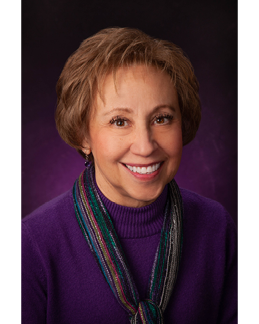
A third generation Lincolnite, Marcia Wallen knew she wanted to thank the community where she and her children were raised. “Lincoln has been good for our family and I want to give something back,” she said.
Marcia’s father Simon Kominsky owned an appliance store in Havelock and mother Estelle worked in preschool settings. Marcia had a long career as a dietitian, working for more than 20 years at Family Service of Lincoln’s WIC program, which provides nutrition information and food to low-income women and their children. Even in retirement, she works part-time at Lincoln Children’s Zoo in membership and reception.
“My career put me in touch with nonprofits,” she said. “It allowed me to see so much good in Lincoln.”
When her father passed away in December, 2017, a few years after her mother passed, Marcia and her brother Jordan Kominsky wanted to do something to honor them.
They designated a part of their parents’ estate and created a fund at Lincoln Community Foundation designated for South Street Temple where their parents worshiped.
Marcia was inspired with the idea when she heard Chip DeBuse, LCF’s Vice President for Development, speak at an event about different ways people can give through the Foundation.
She had planned to leave much of her own estate to Lincoln Community Foundation. “My family is taken care of and BJ has passed away,” she said, referring to her late son who suffered from mental health and substance use disorders. “I wanted to help others.”
“BJ always was his own person. He lived life by his own rules,” she said. “Addiction was a demon that was stronger than he was.” He passed away on April 14, 2015, nine days short of turning 35.
Since that time, Marcia had wanted to honor him and help others. She had planned to fund two Field of Interest funds through her own estate. One would honor her mother by funding early childhood education initiatives and another in honor of BJ that would fund substance use disorders.
Through discussions with her financial advisor at Edward Jones, Jenna Vitosh, Marcia learned she could use a portion of the Individual Retirement Account (IRA) she inherited from her father in a way that would fulfill her charitable wishes now, by funding the Field of Interest funds she had planned. “This is a great option for people like Marcia who are very charitable,” said Vitosh.
“I’m so glad I will get to see the funds helping somebody,” Marcia said. “If I can save one person, it is worth it.”
“Marcia is probably one of the sweetest, most kind-hearted people I’ve met,” said Vitosh. “I admire her desire to give back and honor the people that matter to her.”
Would you like to use an IRA to make your charitable wishes come true? Learn how by speaking to your tax or financial advisor and contacting Paula Metcalf, VP for Gift Planning at 402-474-2345 or paulam@lcf.org.
Partnering Up to Prevent Homelessness
Published on Apr 26, 2021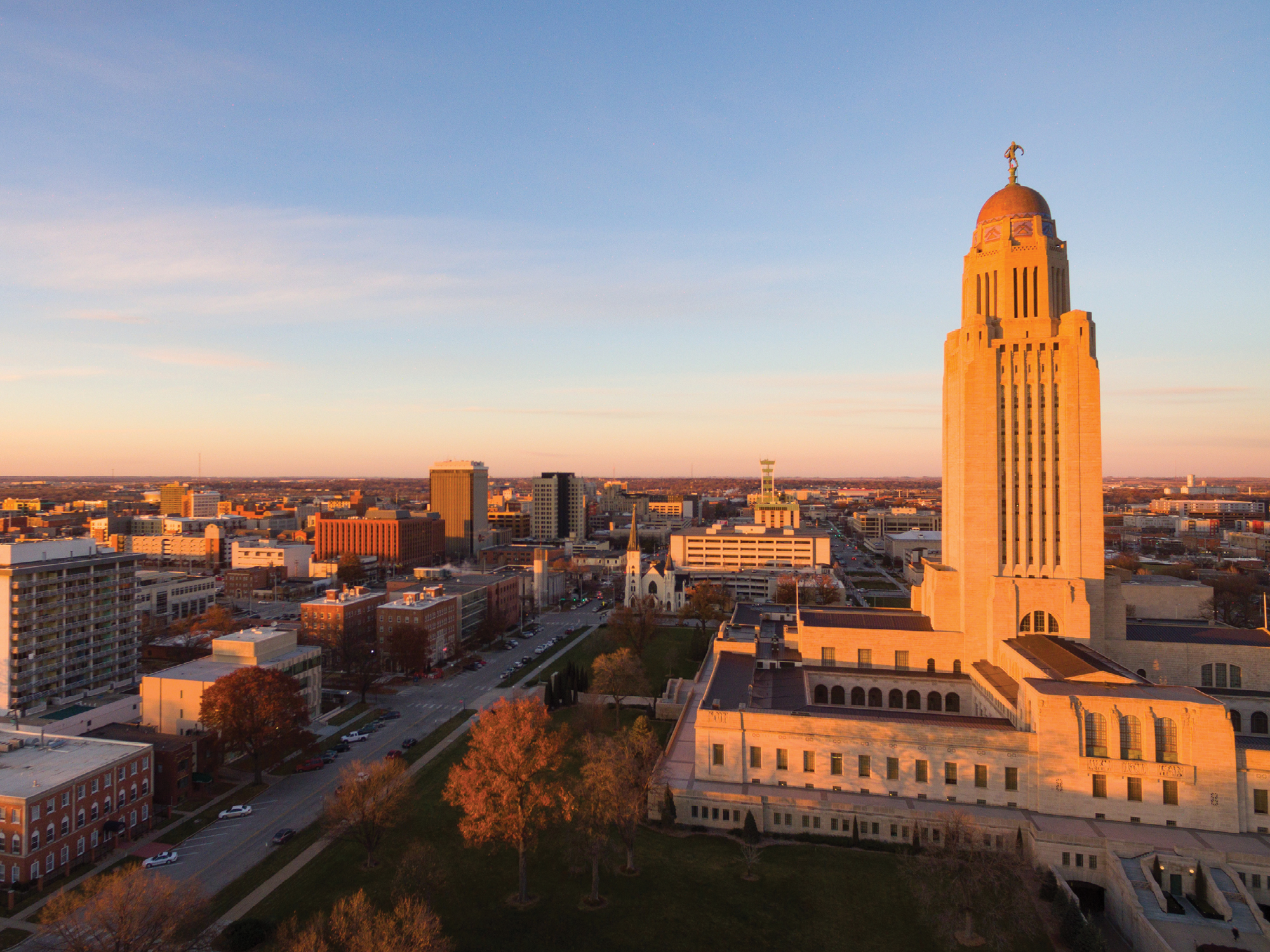
Collaboration is key in the City of Lincoln – especially during these challenging times. Agencies and non-profits regularly join forces to achieve amazing things. Sometimes the relationships come together at the right moment to form something much larger than anyone could imagine.
That was the case with the Lincoln Prevention Assistance Common Fund (LPAC). LPAC is a partnership between the City of Lincoln Urban Development Department, UNL Center on Children, Families, and the Law (CCFL), and the Lincoln Community Foundation. The partnership formed to distribute funds to Lincoln residents from the Coronavirus Aid, Relief and Economic Security (CARES) Act.
The local economy has been impacted by the pandemic in many ways: job reductions and furloughs, business closings, employees forced to leave the workforce to care for children no longer in schools and daycares. The ripple-effect through the workforce made it clear that if actions were not taken soon, people would be at risk of homelessness, many for the first time in their lives.
Lincoln is familiar with issues surrounding homelessness and has been working aggressively to create solutions as well as develop affordable housing. The Center for Children Families and the Law (CCFL) has been identifying and assessing the most vulnerable among the City’s homeless population through their coordinated entry system, called All Doors Lead Home (ADLH). This system provides people and families experiencing homelessness multiple public and private access points in the City to be assessed for housing assistance.
Public access points include Center Pointe, Matt Talbot Kitchen and Outreach, Family Service, People’s City Mission, The Hub, CEDARS and Community Action Partnership of Lancaster and Saunders Counties. Any person or family experiencing homelessness in Lincoln can visit these public access points to be assessed and referred by the coordinated entry staff.
ADLH has been addressing the needs of individuals experiencing homelessness in Lincoln for the past four years, however the assessment of individuals and families at risk of becoming homeless, known simply as prevention, is a new component of the coordinated entry system.
“Prevention was going to be a piece of All Doors Lead Home,” says Denise Packard, the Coordinated Entry Manager for CCFL. “We were already planning to go live with prevention and coordinated entry, however the pandemic made us do it in double-time.”
The City already had a strong working relationship with CCFL, due to their involvement with the continuum of care in the Lincoln Homeless Coalition. It made sense for the City to partner with CCFL on CARES Act funding because of their existing relationship and framework for assessing homelessness.
“When we found out we would be receiving these funds, it seemed like a good fit,” said Wynn Hjermstad, the Community Development Manager in the City’s Urban Development Department.
The next step was bringing in an organization to manage the multiple streams of funding. Much of the funding came in the form of CARES Response and Recovery funds through Nebraska Department of Health and Human Services. Other funds came from Emergency Solutions Grants and Community Development Block Grants. Each of these funding sources have different eligibility requirements that needed to be adhered to. Having multiple agencies manage the different funds would involve significant overhead.
That’s when the Lincoln Community Foundation stepped in.
LCF and the City’s Urban Development Department had already been working together to address Prosper Lincoln’s community agenda focus area of Affordable Housing. The pieces were now in place: homeless management, prevention, and continuum of care are now centralized through ADLH, and flowing through one payment processor, LCF.
Getting the program off the ground was not an easy task. CCFL only had months to create a prevention process to integrate in the existing coordinated entry system. LCF had to pivot employee time and resources to process the payments.
“We were building the plane while we were flying it,” said Michelle Paulk, Vice President Community Outreach at LCF.
That plane was the vehicle that helped many Lincolnites navigate through turbulence. Since July, more than $2.5M in rent, mortgage and utility assistance has been distributed to more than 850 households, many who received assistance are families with children.
“I learned we can do so many different things,” said Michelle. “The Foundation can be helpful to the community by being that neutral convener, that neutral place that can distribute funds and make a big impact on folks who need rapid assistance.”
“I always knew our community is pretty darn awesome, but this solidifies it for me,” said Denise. “Our partnership with the City and the Foundation has been wonderful. It makes me realize you can move mountains when you put your mind to it.”
Bansals’ Hearts Belong to Lincoln
Published on Mar 5, 2020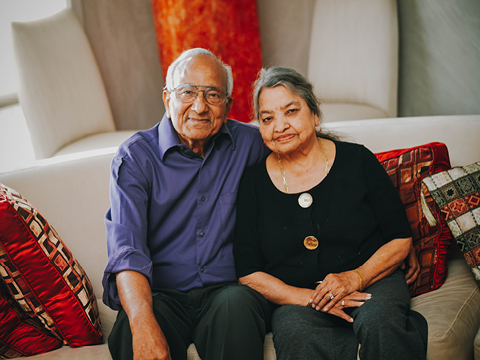
As they celebrate the golden anniversary of their arrival in Lincoln (following a few years in Lawrence, Kansas) as a young couple from India with three small children, Mahendra and Prem Bansal determined to honor their family legacy of generosity with a heartfelt gift to the Lincoln Community Foundation.
“Giving back to the community was part of our growing up, our faith, our family values,” Mahendra explained. “Our parents told us that you should always give whatever you have. The amount doesn’t matter, it is only important to give. Like our parents, we believe in leaving the world a better place than we found it.”
The principle of philanthropy was cultivated on both sides of their families. Prem’s parents gave to orphanages, while Mahendra’s family donated their land in India to create a school that eventually transformed into a college. “When people were looking for jobs, they would regularly come to our home in Delhi and stay with us,” Mahendra said. “A person never went hungry when they were in our house.”
Preeta Bansal, their youngest daughter and an LCF board member, reflected on this philosophy of care that shaped her family. “My parents come from a culture where family is everything, and community is family. They both were born into large families at a time when community and family were the primary source for safety nets, so extended family members looked after one another. And villagers and community members were all considered part of the extended family.”
To honor that family tradition of giving, and as part of a larger community charitable giving strategy, the Bansals created a charitable gift annuity at the Foundation, which offers a lifetime income for Mahendra and Prem now while providing future support for the community. As a result of this gift, they are new members of the Foundation’s Legacy Society, honoring donors who arrange now for a gift at the end of life. “This is about giving back to Lincoln, a place we love,” Prem said. “Lincoln is our home. We want to pass on the blessings this community has bestowed upon us.”
The Bansals grew up in India, married and had three children, but both wanted to further their education. Mahendra came to America first to earn his doctorate in Kansas. Prem and the children followed soon after, and a job opportunity for Mahendra brought them to Lincoln. It has been a wondrous journey. Mahendra became a registered professional engineer with a Ph.D. in civil engineering, and he led the Data Bank for the Nebraska State Natural Resources Commission for decades. Prem has a Ph.D. in public administration and was the first Indian American woman to serve in a professional role in the Nebraska statehouse.
Throughout her tenure as a public servant, Prem worked with five Nebraska governors over three decades as senior aide, policy researcher, policy advisor and division head.
Their children also flourished.
• Ameeta Martin was in second grade when they arrived in Nebraska. She’s now a pediatric cardiologist in Lincoln.
• Jay became a cornea and refractive eye surgeon and lives as an entrepreneur in California.
• Preeta graduated from Harvard Law School and has spent more than 30 years in senior roles in government, global business and corporate law, including positions at the White House and U.S. Supreme Court. She recently returned to make Lincoln her home.
“Now that I’m back here in Lincoln and get to see them up close and personal, I am amazed how active my parents remain, socially and civically,” Preeta said, noting a dizzying landscape of hands-on community service that includes Heartland Big Brothers and Sisters, Matt Talbot Kitchen, Cedars Home for Children, Friends of Foreign Students, Downtown Rotary, the Hindu Temple and the Faith Coalition of Lancaster County.
Granddaughter Alyssa Martin, a policy aide for Lincoln Mayor Leirion Gaylor-Baird and also a Harvard Law School graduate, agrees. “My grandparents infused in all of us a love for service to others and for seeing past surface differences, to honor unity as well as the unique humanity and spark of the divine in each person,” she said.
The Bansals are thankful for their blessings. “We believe in demonstrating gratitude and making a fair contribution. It is so easy to procrastinate, so we wanted to do something now,” Prem said. “Our fifty-year anniversary in Lincoln seemed like the right time to say thank you to a community that has been very good to us. Our hearts belong to Lincoln.”
Leave Your Mark on the Future
When Mahendra and Prem Bansal decided it was time to do something now to create a future charitable legacy, they turned to the Lincoln Community Foundation. The Bansals met with Paula Metcalf to brainstorm about how best to structure a future gift, and after considerable discussion they elected to create a charitable gift annuity as an initial step in their community giving plans.
Members of the Foundation’s Legacy Society make the ultimate and honored gift by including the community alongside family in the distribution of their assets through a will or trust, via beneficiary designation on a retirement account or insurance policy, or by creating a charitable gift annuity.
Mahendra and Prem were drawn to the Lincoln Community Foundation because it is a trusted organization, centered on community causes.
Their advice to Lincoln citizens: make your plans now. “Please do not put off your giving,” said Prem. “As we grow older, it becomes even more important to give back to our community.”
To learn more about how to create a charitable legacy, contact Tracy Edgerton at 402-474-2345 or tracye@lcf.org.
LCF celebrates 60th Anniversary
Published on Jan 1, 2015The words LINCOLN FOREVER convey the fondness that those who have made gifts to and through the Foundation have always held for this community.
The Lincoln Community Foundation celebrates our diamond anniversary, 60 years of service to Lincoln, in 2015. For sixty years, we have been privileged to be part of so many wonderful legacies by matching community needs with the passions of our donors.
As our anniversary gift to Lincoln, we are focused on building a new group of Diamond Donors. These new donors, with a love for Lincoln, will help continue to move the vision of Lincoln Forever forward.
Click here to download our 60th Anniversary Brochure and find out how you can be a Diamond Donor.
Spring 2016 Newsletter
Published on Apr 1, 2016The Lincoln Community Foundation is pleased to present Jim and Mary Abel, and the Abel family, with the 2016 Charity Award for three generations of leadership and philanthropic work in Lincoln and throughout the state.
Download the newsletter to read more about the Abel family and meet our newest benefactors.
Fall 2016 Newsletter
Published on Aug 1, 2016Since the Prosper Lincoln Community Agenda was launched last February, an infrastructure of professionals and organizations has been put in place to guide the work. The meetings are starting conversations, bringing people together to support each other, creating energy and breaking down silos. Jeff Johnson shares why he loves the LCF Donor Advised Fund.
Click here to read the Fall 2016 newsletter and what Lincoln Community Foundation is doing to take Lincoln to the next level.
2016 Annual Report
Published on May 3, 2017Spring 2017 Newsletter
Published on May 9, 2017To catch up on the latest Lincoln Community Foundation happenings click here to download the newsletter.
LCF Selected for Pioneering Disaster Preparedness, Response and Recovery Program
Published on Jun 16, 2016|
FOR IMMEDIATE RELEASE |
Pam Hunzeker Lincoln Community Foundation |
|
June 16, 2014 |
402.450.1519 |
Lincoln Community Foundation Selected for
Pioneering Disaster Preparedness, Response, and Recovery Program
Lincoln, NE — When disaster strikes, community foundations like Lincoln Community Foundation are often called into action to help residents connect to emergency services, accept donations and engage in community rebuilding. To become an even better partner during these extreme conditions, Lincoln Community Foundation has been selected to participate in a new disaster-preparedness, response, and recovery program designed to help community foundations expand their ability to respond quickly, efficiently, and effectively to natural disasters.
Philanthropic Preparedness, Resiliency, and Emergency Partnership (PPREP) selected 18 community foundations from across the Midwest. The two-year program will offer selected community foundations the resources, learning, and best practices they need to prepare for a natural disaster. The program is managed by the Funders’ Network for Smart Growth and Livable Communities and includes a grant to support the disaster preparedness of each selected foundation.
“Being chosen to participate in the PPREP program will be extremely helpful to Lincoln and Lancaster County,” said Barbara Bartle, president of Lincoln Community Foundation. “The associated grant is bringing additional financial resources to our community and complementing current disaster relief planning. We will work with Volunteer Partners to develop and execute our plan so we are better prepared to respond should the need arise.”
The unique attributes of community foundations are well suited for disaster work, including the ability to bring together service providers, community based organizations, businesses, government, and others, as well as their capacity to efficiently pool and distribute funds from donors. The PPREP program is designed to support foundations and equip them with tools and knowledge they need to serve their communities when an immediate, effective, and coordinated response is of the utmost importance.
About Lincoln Community Foundation
The Lincoln Community Foundation, established in 1955, strives to continually enrich the Lincoln community by promoting and achieving perpetual philanthropic support. The Foundation has distributed more than $75 million in grants to nonprofit agencies and organizations that have improved the lives of thousands of residents.
Lincoln Community Foundation Awards $135,000 to Support Veterans & Families
Published on Dec 1, 2010Council on Foundations Idea Lab Grant $17,500 December 2010
The Lincoln Community Foundation was awarded a grant to develop a model for community foundation intervention to address immediate needs and do develop a network of public and private organizations with the capacity to serve those who served our nation in Operation Enduring Freedom and Operation Iraqi Freedom. The participating community foundations on this project included: California Community Foundation, Community Foundation in Jacksonville, Dade Community Foundation, Dallas Foundation, Gulf Coast Community Foundation, Lincoln Community foundation and San Antonio Area Foundation.
Center for Rural Affairs $15,000/2010; $3,500/2011
This Nebraska based organization works to establish strong rural communities, social and economic justice, environmental stewardship, and genuine opportunity for all while engaging people in decisions that affect the quality of their lives and the future of their communities. They are currently working closely with the national Farmer Veteran Coalition to support veterans who want to become farmers and ranchers, by providing resources, training, technical assistance and access to land – all barriers to getting into farming.
CenterPointe, Inc. $10,000 February 2011
This is a facility for treatment, rehabilitation, and housing for women, men and teens overcoming homelessness, mental illness and addiction. They launched a new program in partnership with the Veterans Administration to provide 10 men who are veterans, homeless and mentally ill with transitional housing, life-skills education and counseling services.
The Bryan LGH Independence Center $40,000 February 2012
Bryan LGH is constructing a new facility. The current facility serves those seeking substance abuse treatment and mental health treatment for Lincoln, Nebraska and the surrounding region. Referrals from Fort Riley and Offutt Air Force Base continue to increase, last year 87 active military patients were treated at Bryan LGH, many for prescription drug addiction, posttraumatic stress disorder and depression. Bryan LGH Behavioral Health is unique as it is one of the few facilities in the country able to effectively treat people with co-occurring illness; patients with both mental health and substance abuse needs.
Survivor Outreach Services $12,000 February 2012
Host a retreat for thirty Nebraska Gold Star Families, specifically those who have lost loved ones in military service to the United States. This would mark the 1st annual retreat for Survivors of military deaths from all branches and components of the military and is intended to honor and remember the military members who have died while serving. This retreat will demonstrate continued support to the Gold Star Families in Lincoln, Nebraska and the surrounding area, by providing tools and skills to increase their resiliency.
Interchurch Ministries/Association of Ministries $15,000 November 2011
The faith community plays a critical role in the area of human services in Lincoln. The Lincoln Interfaith Council dissolved several years ago and this created a void in the Lincoln Community in the area of communication and networking within faith-based organizations. The Interchurch Ministries is creating a new Association of Ministries that will re-establish this critical organization within our community. This council will be an important factor in assisting and serving our returning veterans. Leaders of faith communities are in a unique position to help identify issues that effect this special population and can help facilitate solutions. The establishment of a strong Association of Ministries will strengthen the community’s efforts to help our returning veterans and their families as they return to civilian life.
Veterans Freedom Music Festival $5,000 June 2012 2012
The Veterans' Advisory Council has decided to partner with the VA Transition Clinics (the multidisciplinary clinics set up specifically to meet the needs of veterans returning from Iraq, Iran and Afghanistan) and hold the celebration in conjunction with a state wide "Welcome Home Event". Because the Welcome Home events can draw 500 - 1000 veterans and family members, we expect the event to be much bigger (and better) than last year. Several members of the Veterans' Advisory Council have set up a separate, but collaborative group called the Veterans' Freedom Music Festival Committee in order to better plan for and hold the 2012 Veterans Freedom Music Festival on June 23, 2012.
Veterans Memorial Garden $1,000 2012
This grant is in support of a cast stone brick holder which will hold placement of veterans’ nameplates. This marker will enhance the Garden, is lower maintenance and will last for a longer period of time than the current concrete holders presently in use. This beautiful garden memorializes those who gave their lives for their country, creates an environment of gratitude for all living veterans and enlightens the public of the men and women in the military who serve all of us.
Brain Injury Association of Nebraska $2,000 September 2012
Funding for workshops entitled “Responding to the Brain Injury and Post Traumatic Stress Disorder Needs of Veterans Returning from Operation Enduring Freedom/Operation Iraqi Freedom/Operation New Dawn.” As service members and veterans transition to their homes, schools and civilian jobs there is a need for families, colleges and employers to have a better understanding of the challenges they face. These workshops are for medical professionals, educators, clergy, employers, and family and community members.
Project Homeless Connect Lincoln $1,000 October 2012
This is a one-day, one-stop event where individuals and families who are homeless are able to receive a wide variety of immediate, on-site services and support for unmet needs. All factions of the community came together to address the needs of individuals and families who are homeless. The Department of Veterans Affairs held a Stand Down for homeless Veterans in conjunction with Project Homeless Connect. The VA Nebraska-Western Iowa Health Care System staff provided to Veterans who are eligible for VA health care benefits, services on the day that include health screening, foot care and eye care.
Veteran Food Assistance Program $3,000 February 2013
There are an estimated 2,000 low-income veterans in Lancaster County and many are struggling with hunger. The Food Bank of Lincoln will start monthly food pantries at the Department of Veterans Affairs Campus to provide assistance for these veterans and their families.
Nebraska Student Life $10,000 February 2013
A summer camp experience for children of military families that includes programs, activities and education to facilitate growth; intellectually, emotionally, culturally, spiritually and physically. The focus of this camp is to create a supportive environment that will equip students with the ability to bounce back from challenges, manage stress and make a positive contribution to their family and community. Lancaster County military families have 1031 youth between the ages of 6-18.
Community Collaboration Related to Veterans Issues
Veteran Support Fund (Established in 2011; $16,243.85 fund balance)
The Lincoln Community Foundation established a Veteran Support Fund to provide assistance to veterans returning to our community. The purpose of the Veteran Support Fund is to support areas of unmet need for our military personal (active duty, Reserve, National Guard, and veteran service members) and/or their families, including but not limited to counseling, emergency assistance, recovery programs for the families of those killed in action, physical and mental health services, employment and education.
Veteran Pretrial Diversion Program 2011-2012
The Lancaster County Attorney is expanding the existing Pretrial Diversion program to include opportunities for certain veterans to enter the program and thereby, avoid a criminal conviction. Veterans or current members in the armed forces, who are diagnosed with post traumatic stress disorder or traumatic brain injury sustained in the military, will be eligible if there is a connection between the crimes and the mental health issues. A lack of a criminal record prior to overseas deployment is strong evidence that the criminal behavior is related to the Post Traumatic Stress Disorder or Traumatic Brain Injury. In each case, we would ask the VA to draft a treatment plan for the PTSD or TBI and for any addictions. We would use that treatment plan as the center of a Veterans Pretrial Diversion plan. Community Corrections, our Veterans Pretrial Diversion hearing officer and the attorneys would try to add some structure and support to the plan to ensure a success. The team would work together to move the participant forward. Participants who do not follow the plan are terminated from Veterans Pretrial Diversion and prosecuted for the original crime. Participants who comply with the orders are successfully discharged after a year or so.
Community Connections 2011
Lincoln Community Foundation hosted a presentation and panel discussion for donors discussing community support for our returning Military Service Members. Panel members included Roger Lempke, Retired Adjutant General of Nebraska National Guard; Juan Franco, Vice Chancellor of Student Affairs, UNL; Cathy Lang, Commissioner of Labor; Joe Kelly, Lancaster County Attorney. Hiring Our Heroes Job Fair 2012 U. S. Chamber of Commerce initiative to help wounded, ill, and injured veterans find meaningful employment by establishing strategic partnerships with organizations in both the public and private sectors. “Hiring our Heroes” helps veterans start or grow a small business through getting proper certification, licenses, and specialized training for veterans and their spouses as well as enhance the availability of mentors within the business community.
Hiring Our Heroes Job Fair 2013
After a successful event in 2012, the Lincoln Community Foundation once again partnered with the U. S. Chamber of Commerce, Nebraska Department of Labor, the National Guard & Reserve and the Lincoln Chamber of Commerce to help veterans and military spouses find meaningful employment. This collaboration with strategic partners from the public, private, and non-profit sectors creates a powerful and effective platform for
Community Task Force
Regularly convene colleagues, government officials, nonprofit leaders and community members to identify concrete ways to support veterans and their families:
- Behavioral Health
- Education
- Employment & Labor
- Faith Community
- Health & Human Services
Legal Community Lincoln Community Foundation Veteran Work in the National Sector
Council on Foundations 2011 Annual Conference May 2011
The Lincoln Community Foundation planned and implemented a panel discussion presentation at the 2011 COL Fall Conference in San Francisco. The discussion focused on best practices for community support of returning military service members and ways in which Community Foundations can facilitate this effort.
Community Outreach Panel Discussion for Wounded Warriors/Veterans December 1, 2011
Barbara Bartle was invited to present at a forum held at the Pentagon in Washington D.C., hosted by Mrs. Dempsey, the spouse to the current Chairman of the Joint Chiefs of Staff. Invites to the conference were to the spouses of the Combatant Commanders, Service Chiefs, Secretary of Defense, Deputy Secretary of Defense, and Vice Chairman of the Joint Chiefs of Staff (approximately 20-25 attendees). This was a great opportunity to explain to these very important spouses how community based solutions are assisting the Veterans, their Families and the Families of the Fallen. The objective is to ensure they understand how Community Action Teams are making a difference.
Center for New American Security Task Force December 6, 2011
Barbara Bartle was invited to attend the task force meeting in Washing D.C hosted by the Center for a New American Security (CNAS). The task force explored the impact of military service on service members, veterans and their families; their deployment-related needs; and the ways in which the country can best support them. Nancy Berglass, CNAS Senior Fellow and Dr. Margaret Harrell, Director of the Military Veterans and Society Program, developed a report with concrete recommendations for how federal, state and local government agencies and community-based organizations can work together to ensure that veterans receive the care and services they need to reintegrate into civilian life. Lincoln Community Foundation is referenced on page 26 of the report found at http://www.cnas.org/wellafterservice
Council on Foundations Veterans Funders Meeting June 1, 2012
Barbara Bartle was invited to attend a meeting at the Pew Trusts Conference Center in Washington D.C. This meeting was hosted by the Council on Foundations and the Blue Shield of California Foundation to discuss how philanthropy can help those individuals rejoin their communities. A small group of foundations were invited to share their experiences with several key government officials from the Department of Defense, the Department of Veterans Affairs, the Pentagon and the White House Task Forces on Veterans and Military Families who can share information regarding the many policy intersections across the federal government related to veterans and service member community supports, and where the gaps and policy deficiencies are occurring. The agenda included a morning discussion sessions with government staff presentations by community foundations, and discussion focused on shaping the Council’s veteran funders’ national agenda.
Office of the Joint Chiefs of Staff/Lincoln Community Foundation visit August 14, 2012
Lieutenant Colonel Anthony M. Henderson, Assistant to Chairman of the Joint Chiefs of Staff U.S. Army General Martin E. Dempsey, visited the Lincoln Community Foundation to learn how the foundation is building robust support of returning veterans and their families. LCF convened a group of community leaders who informed Col. Henderson of the work they are doing to insure a successful reintegration into our community.
Council on Foundations 2012 Fall Conference September 11, 2012
Barbara Bartle served on a panel discussion at the Council on Foundations Fall Conference in New Orleans, Louisiana. This discussion focused on creating a framework in the philanthropic sector to meet the needs of service member’s physical and mental health and tap into the extraordinary training and civic engagement these returning veterans have to offer our communities.
Nebraska Hires Veterans Recruitment Video October 2012
Nebraska Gov. Dave Heineman released a new recruitment video, Nebraska Hires Veterans, produced by the Nebraska Department of Labor, to draw job-seeking veterans to Nebraska. The video features veterans from various parts of the country, and a wide array of occupations, discussing why Nebraska truly is The Good Life when you’re transitioning from military service. Following active duty deployments, many servicemen and women are looking for employment and a place to call home. The veterans in this video provide just a few examples of the job opportunities and quality of life veterans can find here. The video is being distributed to and by veterans, their friends and family, veteran support organizations and many others. Links to the video can be found on nebraska.gov and dol.nebraska.gov.
The New York Times (James Dao, columnist) November 8, 2012
The Lincoln Community Foundation was recognized in a New York Times article as one of the more effective Community-based alliances that tailor services to local needs of returning veterans rather than creating overlapping organizations. The plethora of private organizations has brought comfort and vital services to thousands, filling gaps left by overwhelmed government agencies. Though giving to military and veterans groups has increased — a survey by the Foundation Center suggests it has more than tripled since 2001 — many veterans advocates say donations have not kept pace with the growing needs of new veterans.
Army OneSource February 2013
This Secretary of the Army Initiative provides comprehensive community support and service delivery for Soldiers and their Families. AOS is raising awareness and generating support among the private sector to effectively connect military members to the best resources available wherever they may be. The Lancaster County Pretrial Diversion program was featured in a video produced by Army OneSource and is displayed on the AOS website.
Council on Foundations Annual Conference April 7, 2013
Sarah Peetz served on a panel discussion at the Council on Foundations Annual Conference in Chicago, Illinois. This session, From Battlefields to Communities: Collaborations for Veterans Philanthropy, explored how funders are joining public sector and business partners all over the nation to help the new generation of veterans and military families make a successful transition back into their communities. The time is right to harness our great American community spirit toward a more comprehensive, holistic “welcome back” to those who served in Iraq and Afghanistan. Panelists discuss how foundations have connected with Veterans Administration programs, what lessons they have learned, and how your foundation can be part of this effort.
Office of the Joint Chiefs of Staff/Lincoln Community Foundation visit May 6, 2013
Lt. Colonel Chris Ford, Regional Director-West; Warrior and Family Support, office of the Chairman of the Joint Chiefs Staff, is meeting with the Lincoln Community Foundation. His goal is to learn about the work we are doing in Lincoln to help veterans and military families make a successful transition back into their communities.
Nebraska National Guard Adjutant General, Major General Daryl L. Bohac September 17, 2013, met with former Adjutant General of the Nebraska National Guard, Roger Lempke, and Lincoln Community Foundation staff to discuss the role of communities in supporting veterans and their families. The Lincoln Community Foundation is committed to continuing the partnership we have with the Nebraska National Guard to link our military members with community resources as they reintegrate into civilian life.
Fall 2017 Newsletter
Published on Oct 31, 2017To catch up on the latest Lincoln Community Foundation happenings click here to download the newsletter.
Troncones Establish $10 Million Gift with Lincoln Community Foundation
Published on Oct 29, 2014FOR IMMEDIATE RELEASE
Pam Hunzeker Lincoln Community Foundation
October 29, 2014
402.450.1519 pamh@lcf.org
Troncones Establish $10 Million Gift with Lincoln Community Foundation
Permanent Endowment will Support Food, Shelter and Health Care Efforts for Young People and Families
Lincoln, NE — A generous $10 million gift from the Reginald and Marie Troncone estate to Lincoln Community Foundation is ensuring that the family’s long-time support of charitable efforts will continue forever. Per Reginald and Marie’s wishes, their gift is establishing four endowment funds to support local and national organizations that focus on helping young people and families.
The Troncone Fund for Basic Needs will support nonprofit organizations serving youth and families and basic needs like food, shelter and healthcare in Lincoln and Lancaster County. The three remaining funds will individually support the efforts of Center for People in Need in Lincoln, Children’s Hospital & Medical Center in Omaha, and St. Jude Children’s Research Hospital in Memphis, Tenn.
Barbara Bartle, President of Lincoln Community Foundation, said “We are honored to be stewards of the Troncones’ legacy. Their significant gift will make an everlasting difference for young people and families.”
The Troncones raised four children in Lincoln after moving from New York more than 40 years ago. Reginald was chairman and CEO of MetroMail, a direct mail services company that was acquired by R.R. Donnelley & Sons in 1987. He continued to run the business many years after the sale and passed away in 2010. Marie died in 2014.
During their lives, Reginald and Marie made many generous gifts to the local community, establishing a charitable fund with Lincoln Community Foundation in 1997 that supported several nonprofit organizations. Their latest gift will ensure that their charitable wishes are carried out in perpetuity.
About Lincoln Community Foundation
The Lincoln Community Foundation, established in 1955, strives to continually enrich the Lincoln community by promoting and achieving perpetual philanthropic support. The Foundation has distributed more than $75 million in grants to nonprofit agencies and organizations that have improved the lives of thousands of residents.
Largest Give to Lincoln Day Match Fund Thanks to West Gate Gift
Published on Jan 17, 2018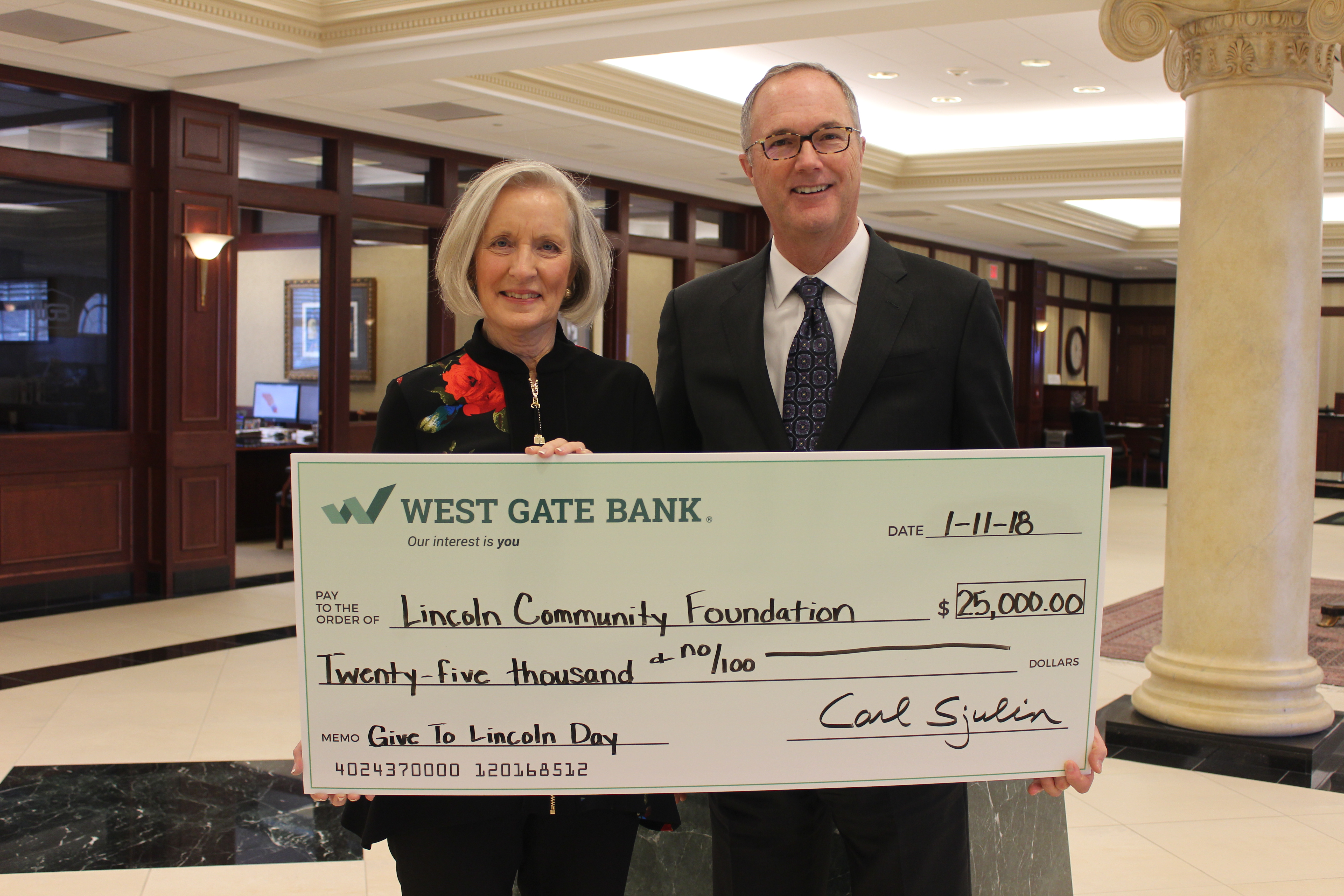
Give To Lincoln Day will have the largest match fund in its seven year history thanks to a generous gift from West Gate Bank. Lincoln’s annual giving day is scheduled for Thursday, May 31. Every participating nonprofit organization will receive a proportional share of the record $400,000 match fund, based upon its percentage of total dollars raised.
“West Gate Bank is proud to be celebrating 50 years of serving the Lincoln community,” said Carl Sjulin, President of West Gate Bank. “As a locally-owned, community bank, giving back to Lincoln is such an important part of our mission. Our commitment of $25,000 per year for three years to Give to Lincoln Day is one of the many ways we are investing back into the community in order to keep Lincoln growing and thriving.”
“We are so grateful for West Gate Bank’s generous donation to Give To Lincoln Day, allowing us to grow the match fund,” said Barbara Bartle, President of Lincoln Community Foundation. “This event, which many local nonprofits depend upon, will accomplish so much more thanks to this increased match.”
All local 501(c)(3) nonprofit organizations that have an office in the community and serve the Lincoln or Lancaster County may participate in Give to Lincoln Day. Registration for nonprofits opens on March 1 at GiveToLincoln.com.
Last year, Give To Lincoln Day raised a record $3,693,307 for 365 local nonprofits. Give To Lincoln Day aims to promote philanthropy in the city. By helping nonprofits raise funds, the daylong event helps them carry out their important work and supplements budgets which are challenged to meet current demands. It also allows nonprofits to tell their stories and attract new donors. Individuals may make their charitable donation to local nonprofits during this 24-hour day of giving at www.GiveToLincoln.com.
Food Bank of Lincoln Offers Lens for Understanding Poverty
Published on Aug 10, 2018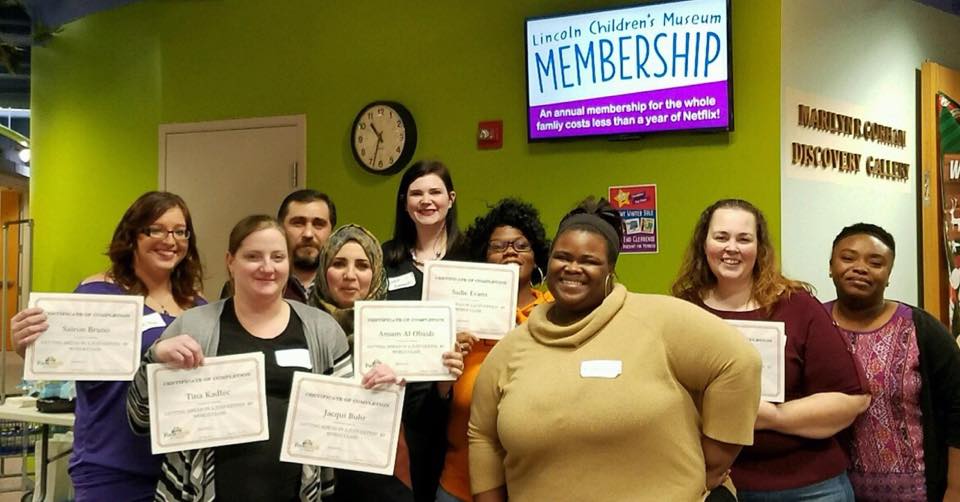
For people living in poverty, there is no one quick fix to gaining financial stability. Food Bank of Lincoln is working with the community to change perceptions through their program, Bridges Out of Poverty.
The multi-dimensional program aims to raise awareness and understanding about the mindset and barriers faced by individuals in the daily struggles that poverty is likely to bring and provides a lens for those who have not experienced these kinds of barriers to understand the obstacles those in poverty face. The classes help community groups, employers, and corporate donors to better understand poverty so they can help under-resourced individuals in a practical way.
“Many individuals who are running programs and creating procedures at an agency or business have said they have gained empathy and understand the perspective of those experiencing poverty,” said Alynn Sampson, Youth and Family Programs Director at the Food Bank of Lincoln. “They see how easy it can be for us to jump to unfair conclusions about why or how individuals get into a particular situation.”
Lincoln Community Foundation provided a grant to help fund and expand the program. Through this curriculum-based program, Food Bank of Lincoln was able to train 679 individuals.
Bridges Out of Poverty also works with under-resourced individuals directly through another curriculum called, Getting Ahead in a Just-Getting’-by World. These weekly classes develop individuals’ ability to reduce barriers, establish a positive social support structure, and build a future plan. Getting Ahead also partners with Community Learning Centers and trained 50 individuals since the program started.
Employers are offered Workplace Stability Training which focuses on ways to improve turnover rates by increasing an employee’s stability. This helps employers see that when life outside of work is stable, work life is more efficient.
Understanding the lives and challenges of people in poverty can be extremely challenging. Through Bridges Out of Poverty, Food Bank of Lincoln is working with the community to change the mindset to improve lives for people in poverty, and thus strengthen our entire community.
Reading Aloud Makes an Impact in South of Downtown
Published on Oct 25, 2018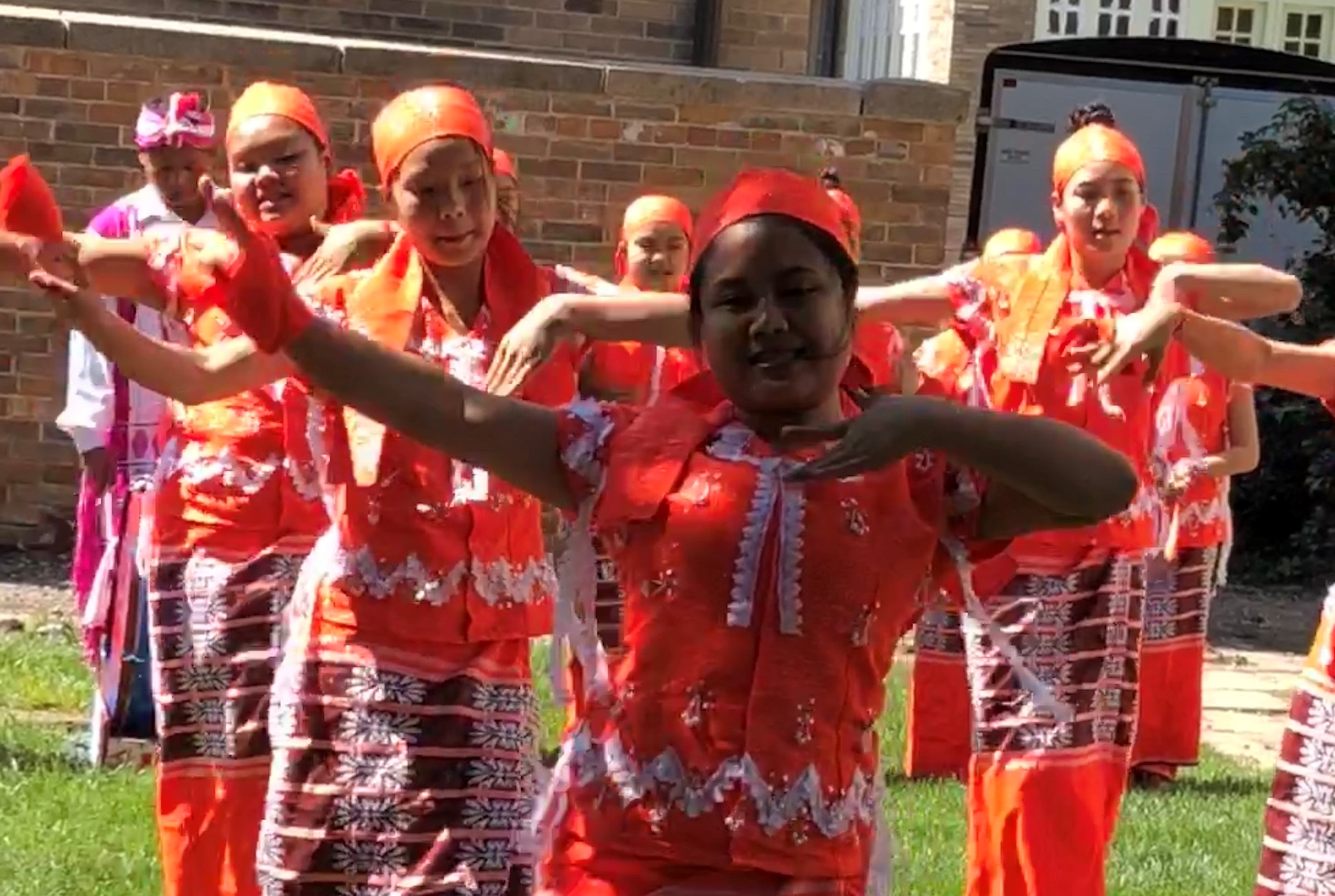
Residents in the South of Downtown neighborhoods gathered for a free event at the Thomas Kennard House on Sunday, September 9, to engage as a family with activities that encourage their children to read.
The event, called Colors & Patterns: Stories in Our Community, attracted 155 people and included activities, dance and storytimes from the Nebraska History Museum, Lincoln Children’s Museum, Lincoln City Libraries, University of Nebraska State Museum (Morrill Hall), and Midwestern African Museum of Art. These partners are all participating in Read Aloud Lincoln, a two-year initiative inspired by the Prosper Lincoln community agenda focus area of Early Childhood.
Read Aloud Lincoln is designed to spread the word to parents and caregivers that 15 minutes of reading aloud daily from birth to age 8 can profoundly impact success for all of Lincoln’s children, both in school and in life. Read Aloud Lincoln’s primary goal is to have every child ready to read when entering kindergarten and continue to build literacy skills during their early school years.
Focusing on the diverse populations within the South of Downtown neighborhoods, Read Aloud Lincoln promotes the collaboration and expansion of current early childhood reading opportunities and programs of these libraries and museums. The program partners provide fun, educational programming and events to promote reading aloud in a variety of community spaces, while enhancing their exhibits with early reading-oriented resources and events.
Read Aloud Lincoln is made possible through a grant received from the Institute of Museums and Library Services and the Lincoln Community Foundation in support of the Prosper Lincoln community agenda. Community involvement and support is encouraged and greatly appreciated.
More than 1,000 Community Members “On the Upbeat” at Prosper Lincoln Summit
Published on Mar 5, 2020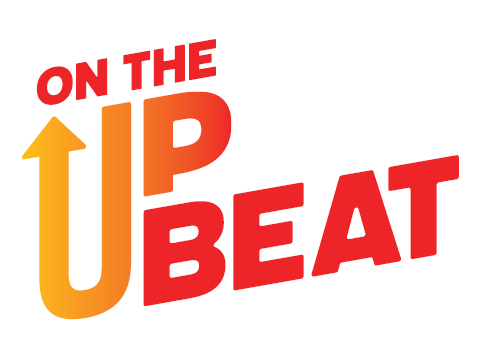
Passionate Lincolnites gathered at Pinnacle Bank Arena on December 17 to celebrate the progress of the past three years and hear what’s next for Prosper Lincoln’s shared community agenda. Mayor Leirion Gaylor Baird, President of the University of Nebraska Vice Admiral Walter “Ted” Carter, Prosper Lincoln Tri-Chairs and others addressed the crowd of nearly 1,100. The 2019 Summit as well as the release of the latest Lincoln Vital Signs (lincolnvitalsigns.org) served as a springboard for the next five years of Prosper Lincoln.
What started as 2,100 ideas to address the 2014 Lincoln Vital Signs findings, turned into a focused community agenda to lift Lincoln higher. Lincoln Community Foundation President, Barbara Bartle, highlighted many Prosper Lincoln’s recent successes at the Summit in the areas of Early Childhood, Employment Skills and Innovation and Entrepreneurship. Appreciation extended to the three Prosper Lincoln Developers: Michelle Suarez, Bryan Seck and Rich Claussen.
The progress to date is due to a true community-wide effort across all sectors. Individuals and organizations have stepped up to make progress toward these goals, including neighborhoods, businesses, schools, faith organizations, nonprofits and more. Michelle Suarez, Bryan Seck and Rich Claussen have been waking up every day to move the agenda forward as Prosper Lincoln Developers since 2016.
While much progress has been made, the data in the 2019 Lincoln Vital Signs report by the University of Nebraska Public Policy Center, shows that there is more work to be done for everyone in Lincoln to truly prosper. Public Policy Center Associate Director, Dr. Nancy Shank, shared major findings from the report at the Summit. “Lincoln is prospering and growing stronger,” said Shank. “However, persistent weaknesses are stymieing our progress.”
In response to the 2019 Vital Sign findings, Prosper Lincoln has now expanded its focus areas for the next five years to include Early Childhood, Innovative Workforce, Affordable Housing, Strong Neighborhoods and Civic Investments.
As Prosper Lincoln embarks on this next phase, the community agenda looks to prioritize Lincoln’s strengths and challenges, then concentrate public, private and philanthropic human and financial resources toward common goals, across all sectors from grassroots to systems leadership.
Mayor Leirion Gaylor Baird urged Lincolnites at the Prosper Lincoln Summit to “be informed, be involved, be patient.” For when we all band together…amazing things are possible! The full event can be viewed online at LNKTVcity.lincoln.ne.gov.
Turn insight into action! You can be “On the Upbeat” for Prosper Lincoln by gaining a shared understanding of the opportunities and challenges facing our community, getting involved and taking action to make our visions for the future a reality. Please visit www.prosperlincoln.org or email info@prosperlincoln.org for more information.
Zoomed Out but Tuned in to the Community
Published on Apr 26, 2021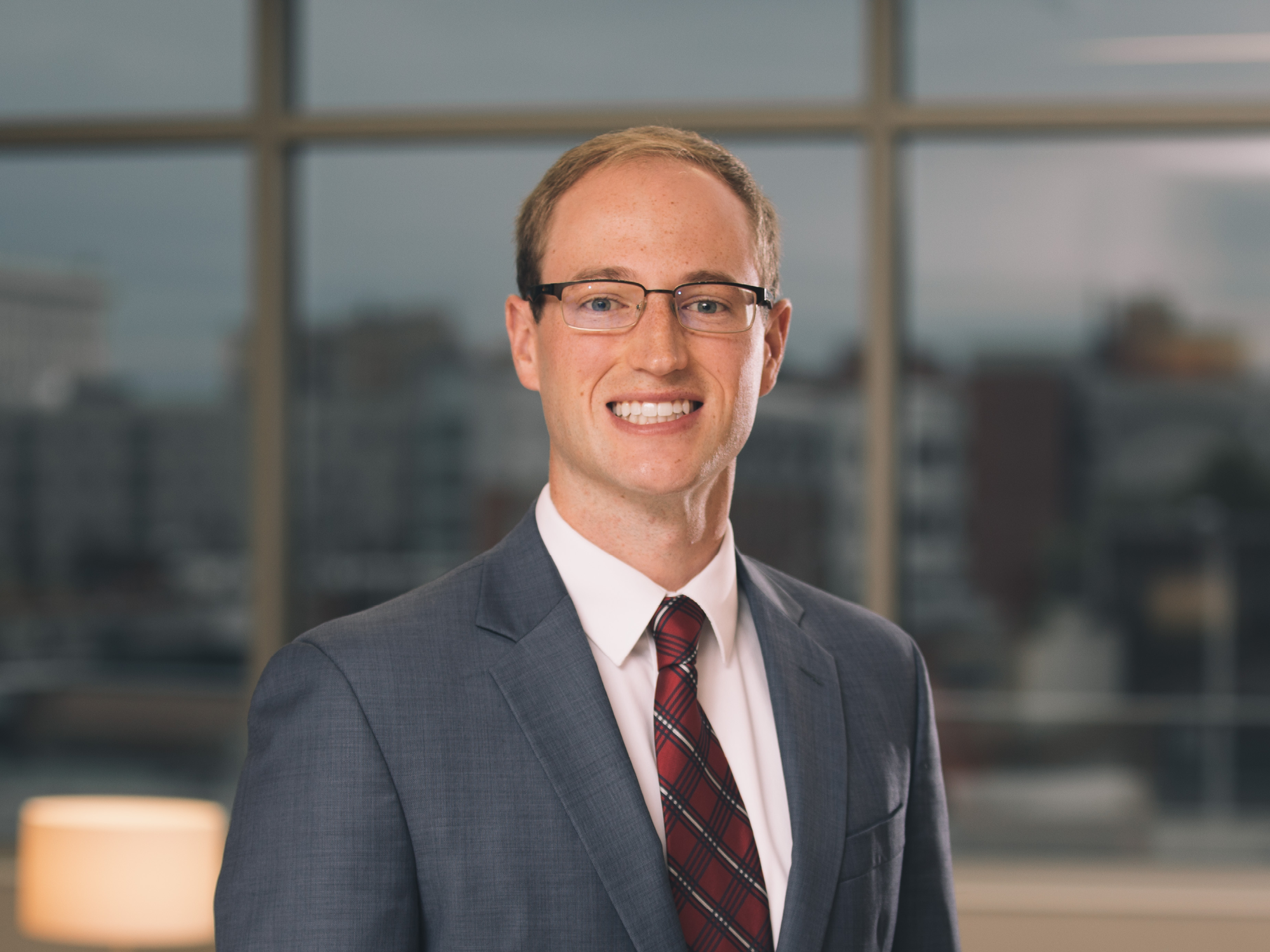
A year into the pandemic, many are feeling the effects of “Zoom fatigue” from working and socializing from home. However, when networking is a significant component of your organization’s activities, engagement is key. For NextGen Lincoln, a giving circle of young professionals, they responded to this virtual burnout by getting creative with their annual Abe Lincoln Party on February 19.
“It is a challenge,” said NextGen Lincoln Board Chair, Max Rodenburg. “The whole idea of NextGen is philanthropic networking so we had to keep things fresh in order to keep our members engaged.”
NextGen Lincoln (NextGen) is a giving circle of young adults who believe that, by coming together to give collectively, they can have a greater impact on Lincoln's nonprofit organizations. NextGen offers an opportunity to give back, learn about the unique issues in our city, and get together in a fun and charitable way.
NextGen typically holds their kickoff party at a local establishment. This year, Sideshow Spirits hosted a mixology class and a virtual tour of their operations for the group via Zoom. Max, who became NextGen’s board chair in January, created a “new member trivia” for folks to interact with on their mobile devices.
“It was pretty funny,” he confessed. “I think everybody learned a little bit more about each other.”
Events like the Annual Abe Lincoln party serve a larger purpose than just networking. Members of NextGen nominate local nonprofits at their events to receive unrestricted grants for their organization. The primary source of the award pool comes from annual membership dues, with additional funding from donations during Give to Lincoln Day, and a grant from the Lincoln Community Foundation. Local companies looking to partner with young professionals sponsor the events, which covers the group’s overhead costs.
Members vote on a nonprofit finalist at each event, and finalists traditionally send a representative to the final event known as the “pitch party.” The group has given tiered awards for first, second and third-place finalists in the past. In 2020, the group decided to award all three finalists: Lincoln Lighthouse, The Malone Center, and the Mental Health Association of Nebraska an equal portion of their $15,000 award.
Many of the organizations that receive these awards from NextGen have been smaller non-profits. Max points out that this is one of the unique things about NextGen.
“Smaller non-profits are primarily grant-funded, or program funded, where a lot of the revenue is pre-allocated and has to be used on certain programs,” said Max. “Receiving a grant for general operations, where the funds can be used to help with payroll or keep the lights on, becomes a giant shot in the arm for them. It has been really rewarding to see the reaction from them when they receive the funds.”
NextGen currently has 46 members, up from 42 in 2020. The group’s goal is to have somewhere between 60 to 75 members by the end of the year.
“This is a great way for young people to connect with their peers who care about the community and to learn about non-profits that they can get involved in,” said Max. “I highly recommend any young professional to join because it is a really good group of people, raising money for great organizations.”
If you are interested in joining or sponsoring NextGen, contact Kelly Burken at 402-474-2345 or kellyb@lcf.org or visit www.nextgenlincoln.org.
Lincoln Community Foundation Awards $239,250 in 2020 to Support 47 Local Nonprofits
Published on Jan 7, 2021Lincoln Community Foundation Awards $239,250 in 2020 to Support 47 Local Nonprofits
The Lincoln Community Foundation distributed $239,250 in community grants to local nonprofit organizations through Open Door Grants. These grants are made possible by contributions from the Lincoln Forever Fund and from LCF donor endowment funds. Organizations that received funding include:
American Cancer Society
Road to Recovery patient transportation service, lodging and new app
Asian Community & Cultural Center
CareerLadder project (by New Americans Task Force) graphics, social media, messaging and marketing; Youth programs at the Asian Community & Cultural Center
Barnabas Community
Meals, household products, hygiene kits and other basic needs
Blixt Locally Grown
Virtual performing arts piece that lifts up medical community and public health
Boy Scouts of America, Cornhusker Council
Cub Scout program at Title I schools
Bridge Behavioral Health
Replace windows in the residential treatment section of the facility
Cause Collective
Membership support
Center for Legal Immigration Assistance
Operating support
CenterPointe
Substance abuse services
Christian Heritage
Families Together operational support
Clinic With a Heart
Operational support to provide healthcare services to uninsured and underinsured
Common Threads Sewing Team (at Messiah Lutheran Church)
Materials for providing human care items for local individuals
Community Action Partnership of Lancaster/Saunders
Expansion of Gathering Place hours to include weekend evenings
Educare Lincoln
Expanding services and support for hiring of a fund development professional
Food Fort
Back to school event that provides one pair of shoes per child
Foundation for Lincoln City Libraries
Maker's Space at Walt Branch Library
Fresh Start Home
Operations support
Friends of Lied
Operating support for the Lied Center for the Performing Arts
Girl Scouts Spirit of Nebraska
2,500 Girl Scouts Outreach Activity Kits for Lincoln children
Heartland Bike Share
Sponsorship of five bicycles
Lighthouse
Funding to extend services due to additional LPS remote learners
Lincoln Animal Ambassadors
Pet Food Bank storage and other costs
Lincoln Children's Museum
Temporary exhibit in 2020 focusing on literacy "Once Upon a Time...Exploring the World of Fairy Tales"
Lincoln Children's Zoo
Care, health and welfare of the Zoo's animals
Lincoln Community Playhouse
Replacement of a heating unit for the building
Lincoln Housing Charities
Support Expanding Horizons Summer Enrichment Program for students in grades 1-6 in Air Park area
Lincoln Parks Foundation
Cascade Fountain renovation
Lincoln Public Schools (Arts & Humanities Focus)
Therapy dog
Lincoln Sports Foundaton
Operating support for sports facilities
Malone Community Center
Support costs to get a new van for youth transportation for programming
Mercy Housing Midwest
Resident Services programming
Nebraska Children and Families Foundation
Thriving Together event sponsorship; Funding for Learn and Earn to Achieve Potential (LEAP) program for Lincoln area scholars
Nebraska Civic Engagement Table
Efforts to register and increase voter turnout in the 2020 election
Nebraska Communities Playhouse
New heating/cooling system for facility
Nebraska Safety Council, Inc
Funding for Driver's Education instructor endosements
People's City Mission
Commercial washers for bunk house laundry room
Pinewood Bowl, Inc.
2021 summer performance sponsorship
Planned Parenthood North Central States
Comprehensive, inclusive sexuality education in Lancaster County
Rabble Mill
Operations support for The Bay
Southeast Community College - Lincoln
Advising Transformation supporting students in and out of the classroom to help them complete their course of study
University of Nebraska (Board of Regents)
Panel event to share techniques for battling labor trafficking as part of the 2020 HRHA Human Trafficking Initiative
University of Nebraska-Lincoln
UNL Tailgate Cinema Sponsorship; UNL Military and Veteran Success Center for tutors
Veterans of Foreign Wars Foundation
Sponsorship of Veterans' Freedom Music Festival in 2020
Visionary Youth
Mentoring in New Dimensions (MIND) Program
Willard Community Center
Operations support
Yazidi Cultural Center
Operations support
Open Door Grants were suspended April - June 2020 and $50,000 of discretionary funds was transferred to the Lincoln COVID-19 Response Fund
Veteran Pretrial Diversion Program
Published on Sep 1, 2014Serving veterans and their families has become a fundamental part of our work at The Lincoln Community Foundation. Through implementation of the Veteran Support Initiative we have the opportunity to work with and support a broad range of community organizations who provide direct services to these exceptional men and women. This initiative has enabled us to develop and broaden our community leadership role.
The Lincoln Community Foundation convened a community task force of legal professionals, military leaders and representatives of the county's justice system to focus on veterans involved in the criminal justice system. This resulted in the establishment of the Lancaster County Veteran Pretrial Diversion Program now in its third year.
The program recognizes the effect of traumatic brain injury and post traumatic stress disorder on those who have suffered trauma related to military service. This trauma can manifest itself through behavior resulting in a misdemeanor or nonviolent felony charge. Participants are required to comply with specific conditions such as attending treatment and performing community service. Volunteer veteran mentors serve as coach, guide, role model and advocate for the individual participants as they progress through the court process.
Veterans Diversion Programs and Veterans Courts have proven to be effective in helping veterans involved in the criminal justice system. Although the aim is to combine traditional pretrial diversion goals of increasing public safety and holding offenders accountable, it also is intended to provide timely access to VA mental health and substance use services, when clinically indicated, and other services and benefits as appropriate.
The Lincoln Community Foundation, in our role as convener and funder, is proud to be a part of Nebraska's first Veteran Pretrial Diversion Program.
Sarah Peetz
VP for Community Outreach
Lincoln Community Foundation, Inc.
Human Services Community Collaborations Supporting Veterans
Published on Oct 11, 2014The Lincoln Community Foundation has found partnering with local Veterans Affairs offices and human services agencies to be an effective way to serve military families and veterans in need.
We recently participated in our third Project Homeless Connect event held in conjunction with a Stand Down sponsored by the Veterans Affairs Nebraska- Western Iowa Health Care System. Stand Downs are one to three day events hosted by local VA offices in collaboration with other government and community organizations. These events provide an array of services including food, clothing, health screenings, benefits assistance and referrals. Volunteers from the Nebraska Air and Army National Guard assist event guests who are veterans and help them find services they may not otherwise have access to or know about.
Many Veterans in need don't want a hand-out, just some assistance. The Food Bank of Lincoln recognized that their Mobile Pantry Program could easily be used to serve military families and veterans in helping them through times of need. The Food Bank partnered with the VA Nebraska-Western Iowa Health Care System to host a food pantry for veterans which is located at the VA out-patient clinic in Lincoln. The Lincoln Community Foundation provided initial funding to launch this program. The pantry, which is open the first Monday of every month, leverages a network of community volunteers, government agencies and community organizations to serve veterans and military families.
These are great examples of taking existing community programs and adding a veteran focused component to enhance outreach and engagement with those in need.
Sarah Peetz
VP for Community Outreach Lincoln Community Foundation, Inc.
Disaster Philanthropy: Preparing for the Worst
Published on Jul 25, 2019
Rivers flood. Tornados roar. Those of us in the Midwest states know these weather phenomena are rare but deadly. Because of this, Lincoln Community Foundation has participated in the Philanthropic Preparedness, Resiliency & Emergency Partnership (PPREP) since 2014.
PPREP is a learning cohort of community foundations in a ten-state Midwestern region. The purpose of this grant-funded initiative is to build understanding, skill,
and capacity in response to disaster while insuring our communities become more resilient. PPREP focuses on community foundations because we work regularly with partners in the private, nonprofit and public sectors, effectively organizing our regions and coordinating services to those requiring assistance.
This initiative strengthens the capacity of the community to respond should Lincoln/ Lancaster County face a disaster.
When the widespread floods devastated Nebraska in March, Lancaster County was gratefully spared. Lincoln Community Foundation sprung into action, reaching
out to the community foundations in the areas affected and offered our PPREP resources to help them navigate the process.
We also fielded dozens of inquiries from donors asking how they could help. We directed them to community foundations that would address longterm recovery as well as nonprofits providing immediate relief.
Donors can continue to support statewide recovery efforts through several organizations here.
Winter 2020 Newsletter
Published on Mar 5, 2020To catch up on the latest Lincoln Community Foundation happenings click here to download the newsletter.
Lincoln Rallies Around Its Littles
Published on Jan 31, 2020
The audience sat in rapt attention at December’s Prosper Lincoln Summit as they heard staggering numbers surrounding early childhood from the latest Lincoln Vital Signs report. Seventy-five percent of Lincoln’s children under six have all parents in the workforce and parents at every income level report expense as the biggest challenge to accessing high quality care in Lincoln. It currently costs more per year to send an infant or toddler to a child care center than one year of tuition at the University of Nebraska.
It is especially difficult for families who fall below or near the poverty level to afford and access quality early childhood education. There are currently 3,362 children under the age of six in Lincoln who live in families that fall below the poverty threshold and only 9% of young children in poverty are enrolled in nursery/preschool programs.
The question arises – how do we serve our youngest citizens in need of quality early childcare? In response, The Lincoln Community Foundation once again partnered with Nebraska Children and Families Foundation to host the second annual Lincoln Littles giving day in honor of Abe Lincoln’s birthday on February 12. The giving day raised $668,150 for tuition assistance, allowing more children in need to access quality early childhood education. The fund is inspired by the Prosper Lincoln Early Childhood community agenda goal of increasing accessible and affordable high-quality early childhood education.
“These generous gifts will make a big impact for our little ones in Lincoln,” said Barbara Bartle, President of the Lincoln Community Foundation. “When we band together, more children have access to quality early childhood education. Thank you, Lincoln.”
Nineteen early childhood education providers are now participating in the Lincoln Littles initiative and will receive funding for families in need. All providers are Step 2 or higher on Nebraska’s Step Up to Quality, 5-step rating scale. Providers include CEDARS Youth Services, The Children’s Place, Coddington Learning Center, Community Action Head Start, Dimensions Education Program – A Street, Dimensions Education Program – First Plymouth, Educare Lincoln, Faith Lutheran Touching Hearts, Fingerprints Child Development Center, Kids First Inc., Kids Imagination Station, KinderCare Learning Center, KinderCare Learning Center – West A, Loving Hearts Child Development Center, St. Mark’s Preschool Kidzone, Trinity Lutheran Early Childhood Program, Westminster Preschool, Willard Community Center and World of Knowledge Child Development Center & Preschool.
Testimonials pouring in from those who received assistance through the program last year paint a moving picture – a family facing the loss of one spouse’s job not knowing how they’ll be able to keep their children enrolled in a program; a single mother leaving an abusing relationship and looking for a safe and stable place for her toddler; a preschooler with learning disabilities whose family is in need of high-quality educational environment they can afford. The stories go on and on.
High-quality childcare helps children develop the range of skills necessary for success in school and beyond. The National Chamber of Commerce Foundation says that quality early childhood education is important for today’s workforce as well as preparing the future workforce.
Seed funding for Lincoln Littles is granted by W.K. Kellogg Foundation and Buffett Early Childhood Fund. Champions for Children match partners are Acklie Charitable Foundation, Harbor of Dreams, Jim and Penny Krieger Family Foundation, Susan Sehnert Stuart, and Mae Whitmer.
As Abe Lincoln said, “When I do good, I feel good.” Gifts for the Lincoln Littles Early Learning Fund are accepted year-round. For more information Lincoln Littles, call 402-474-2345 or visit LincolnLittles.org.
Big Impact
Testimonials from Lincoln Littles scholarship recipients
“We are a family of four and my husband lost his job recently. His income was the primary source of income for our mortgage, the cars, preschool, all the big things. When he lost his job my first thought was – what about our kids? To say, ‘thank you’ wouldn’t even begin to describe our gratitude for the Lincoln Littles Scholarship we received."
“I will forever be beyond thankful, grateful and blessed to the Lincoln Littles scholarship program for saving my family.”
“Our daughter was able to receive the Lincoln Littles Scholarship and since being able to go to preschool, her whole personality has brightened up. The Lincoln Littles Scholarship has really allowed her to have amazing experiences and create many memories and she is only just starting school.”
“I was so relieved at the mention of a scholarship. This is really an opportunity for me to express how grateful I am to the donors and to all those who are working to offer hope to families like mine. You wiped my tears by granting this opportunity to my child.”
Testamentary Charitable Gifts: Bringing Peace to a Stressful World
Published on Mar 12, 2020We all feel stress—traffic, deadlines, family obligations... Financial and estate planning presents a stressful challenge too, particularly for clients who wish to make a charitable gift, but are reluctant to relinquish control of their assets during life. Fortunately, testamentary charitable gifts can be a virtually stress-free solution for some clients. For stressed and reluctant clients who are philanthropically inclined, testamentary charitable gifts might just be an ideal option.
In this issue of Charitable Giving, we’ll look at testamentary charitable gifts—in particular, how these gifts may benefit clients who want to leave a charitable legacy as part of an estate plan but don’t want to make lifetime changes or relinquish control of their assets.
Charitable Bequests: The Basics
The most fundamental of all human actions is, of course, breathing. We take thousands of breaths every day—each breath is a little miracle to which we give little or no thought. Yet, becoming intentional about each breath can actually reduce stress. Careful planning can also reduce stress. When it comes to estate planning, the most fundamental of all tools is a will. A will lets clients distribute estate assets at death, name a personal representative for the estate, and designate a guardian for minor children.
A charitable bequest is a popular giving method because bequests are an easy way for clients to create a legacy, qualify for an estate tax deduction, and support charity. While simple to make, the impact of a bequest on the donor and the charity cannot be ignored, especially when charitable organizations regularly report testamentary gifts of $1 million, $10 million, or more. To include the Lincoln Community Foundation as a part of a client’s charitable bequest, include Lincoln Community Foundation, Inc., Lincoln, Nebraska as a beneficiary. We can meet with you and your client to create instructions at the Foundation that can be updated as the client wishes during their lifetime.
Deductibility
When properly made, a bequest in any form—a specific dollar amount, a particular asset, a certain percentage of the available estate, or the estate residue—will qualify for an estate tax charitable deduction under IRC §2055(a) if it is:
- •Included in the decedent’s gross estate,
- •Transferred by the decedent by will, and
- •Made to a qualified charitable organization as defined under estate tax rules.
A “qualified charitable organization” generally means any domestic or foreign “corporation or association organized and operated exclusively for religious, charitable, scientific, literary, or educational purposes” that will use the asset exclusively for charitable purposes.
Drafting the Bequest
The donor must draft the bequest with care, since errors in bequest language and execution can jeopardize the deduction.
Incorrect identity. The will must identify the charity with its correct legal name and address. Incorrect identification may cause both the gift and the deduction to fail. Even if the bequest is initially correct, however, the charity may change names, reorganize, merge with another organization, or even cease to exist. The donor can plan for this by naming a contingent charitable beneficiary to accept the donation only if the original charity cannot.
Third-party involvement. Bequeathed property cannot pass through a third party to a charity. Let’s say Brenda leaves estate property to her sister, May, with instructions for May to use that property to make a charitable gift on Brenda’s behalf. This invites the question of who has actually made the gift—Brenda or May? Even though the charity ultimately receives the bequest property and the initial beneficiary never had any intention of keeping the property, a “roundabout” bequest does not secure the charitable deduction. Even if the donor makes a bequest gift to a fraternal organization, and that organization specifically uses it for charitable purposes, the bequest does not qualify for a charitable deduction without the testator’s clear stated intent that the gift be used exclusively for charitable purposes.
What about an unnamed charity?
While this would appear to be a problem, the testator can take steps to secure the estate tax charitable deduction even without naming an exact beneficiary. As the IRS noted in a Revenue Ruling, the decedent will be deemed to have effectively made the transfer if local law provides that the terms of the will impose a trust over the assets and require the trustee to distribute the bequest property only to qualified charitable organizations (as stated in IRC §2055).
Unspecified amount. If testators do not specify the dollar amount, asset, or percentage of the available estate to be transferred to a charitable organization, they jeopardize the estate tax charitable deduction. In the case of Humes v. United States, the Supreme Court said:
Did Congress, in providing for the determination of the net estate taxable, intend that a deduction should be made for a contingency, the actual value of which cannot be determined from any known data? Neither taxpayer, nor revenue officer—even if equipped with all the aid which the actuarial art can supply—could do more than guess at the value of this contingency. It is clear that Congress did not intend that a deduction should be made for a contingent gift of that character.[x]
A failure to specify the amount of a charitable bequest may force the executor or personal representative to make that decision, or may prevent the gift value from being ascertained at all.[xi]
Contingent bequest language. Bequest language is considered contingent (or conditional) if the charitable transfer depends on the occurrence or non-occurrence of some event.[xii] The use of contingent language to convey a charitable bequest will not jeopardize an estate’s charitable deduction provided the chance that the charity will not receive the bequest is “so remote as to be negligible when it is determined on the decedent’s date of death.”[xiii]
Testamentary Gifts of Retirement Assets
Regular exercise throughout the years not only combats stress—it increases the chances of good physical and mental health in old age. Financial planning may sound stressful, but much like exercise, those who practice solid retirement planning over the years increase their chances of having strong financial health in retirement. This, in turn, relieves stress and lets the retiree enjoy the results of a lifetime of work. It also provides an opportunity to realize charitable giving goals through a testamentary gift of retirement assets—perhaps an even more significant gift than would otherwise have been possible.
A Beneficiary Designation
The most straightforward method of making a testamentary charitable gift of retirement assets is to name the charity as the beneficiary of an IRA or retirement plan. The donor simply completes a new beneficiary form. Of course, it is important to confirm with the plan administrator or custodian that there are no restrictions on designating a charity as a beneficiary. Also, married donors may be required to obtain spousal consent.[xiv] Because the amount in an IRA or retirement account will change over time, it is prudent for the donor to specify a percentage gift rather than a dollar amount.
Income in Respect of a Decedent (IRD)
IRD refers, of course, to income earned during life but not included in the decedent’s gross income prior to death.[xv] Traditional IRAs, qualified retirement plan accounts, and savings bonds all fall into this category—in fact, these items represent a significant percentage of IRD in most estates.
Because it hasn’t been taxed yet, IRD is generally includible in the gross income of the recipient (estate or individual) and taxed at the recipient’s income tax rate. Whether the property passes through the probate estate or outright to the recipient, it retains the same character it would have had in the decedent’s hands.
If the income in respect of a decedent represents gain (capital or ordinary) on the sale of an asset, the recipient may utilize the decedent’s basis to offset the gain. The basis of appreciated property does not step up to the fair market value at death, even though the IRD is included in the gross estate. IRD is includible in the decedent’s gross estate as a property interest or right that passes at death.
IRD items left to charity qualify for the estate tax charitable deduction and also negate the adverse income tax consequences for the recipient because of the charity’s tax-exempt status. It is often a sound tax strategy for a donor to leave IRD assets to charity and non-IRD assets to individuals.
Stress and the Five O'clock Hour
“It’s five o’clock somewhere!” This common expression heralds the end of work—even when the actual clock says otherwise. For successful individuals who have navigated the shoals of a stress-filled life, the prospect of retirement years brings the same sort of anticipation. During the dreaming, planning, and re-evaluating of the pre-retirement years, clients may decide that a testamentary gift is the best way to realize a charitable legacy. While these clients are “calling it a day,” a charitable gift will continue working long after they are sailing into the sunset.
Thank you for staying in the charitable giving loop!
Speaking of “calling it a day,” Paula Metcalf, our VP for Gift Planning and General Counsel, has retired from the Lincoln Community Foundation after nearly 10 years with us. We will make an announcement when a new Vice President for Gift Planning is added to the Foundation staff! We wish Paula well as she continues the retirement chapter of life. �
Visit Planned Giving Online to learn more about charitable planning.
See also Reg. 20.2055-1(a).
Reg. 20.2055-1(a)(2). The IRS maintains a non-exclusive informational listing of qualified charitable organizations in IRS Publication 78, Cumulative List of Organizations described in Section 170(c) of the Internal Revenue Code of 1986. Find an online version of Publication 78 at: http://www.irs.gov/app/pub-78.
Levey v. Smith, 103 F.2d 643 (7th Cir. Ind. 1939). The court said, “The meaning of this language is that the testator and he alone must provide for the charitable bequest. It means that the provision by the testator must be one that is definite in ascertainment and that is legally enforceable; it must possess the qualities [sic] of a definite command which will define the legal rights of all parties to the property intended to be affected.”
Ltr. Rul. 200437032.
IRC §2055(a)(3); Levey at 646. The court said, “The right to a deduction depends upon what a testator has willed respecting the use of a legacy and not upon the use which a legatee is willing to make of it.”
United States v. First Nat'l Bank, 74 F.2d 360, 363 (5th Cir. Ala. 1934). The 5th Circuit Court of Appeals stated: It is well settled in Alabama that "a charitable trust will not fail on account of any uncertainty as to the ultimate beneficiaries, within a properly designated class, if there is a competent trustee to make a selection and thereby render certain the beneficiaries who are to enjoy the bounty provided by the trust."
Rev. Rul. 69-285, 1969-1 C.B. 222.
Humes v. United States, 276 U.S. 487 (U.S. 1928); Estate of Marine v. Commissioner, 97 TC 368 (1991), aff’d 990 F2d 136, 71 AFTR2d 93-2182 (4th Cir. 1993).
Florida Bank at Lakeland v. United States, 443 F.2d 467 (5th Cir. Fla. 1971). The appellate court upheld the district court ruling that the taxpayer was not entitled to a charitable deduction for the charitable remainder because the requirement that the trustee pay over all capital gains to the life beneficiaries prevented the value of the charitable remainder from being ascertainable.
Reg. 20.2055-2(b)(1); Commissioner v. Estate of Sternberger, 348 U.S. 187 (U.S. 1955); Bach v. McGinnes, 333 F.2d 979 (3d Cir. Pa. 1964).
Reg. Sec. 20.2055-2(b)(1).
IRC §417(a)(2).
IRC §691.
Spring 2021 Newsletter
Published on Apr 26, 2021To catch up on the latest Lincoln Community Foundation happenings click here to download the newsletter.
Lincoln COVID-19 Response Fund To Help Those Impacted By Coronavirus
Published on Mar 23, 2020FOR IMMEDIATE RELEASE: March 20, 2020
MEDIA CONTACTS: Diane Gonzolas, City Communications, 402-441-7831
Jenny Chapin, Lincoln Community Foundation, 402-474-2345
The City of Lincoln, philanthropic organizations, and business partners today launched the Lincoln COVID-19 Response Fund to assist nonprofits that serve vulnerable individuals in the community. Individuals, institutions, companies, and other funders are encouraged to contribute to the Fund. Mayor Leirion Gaylor Baird said the Fund is designed to rapidly deploy grants to nonprofits working with those disproportionately affected by the coronavirus pandemic, including those who have become newly vulnerable as a result of this public health emergency.
“This is a crucible moment. In the midst of this pandemic, our community is coming together to create something new and urgently needed.” said Mayor Gaylor Baird. “The Lincoln COVID-19 Response Fund will provide resources to some of our most impacted residents. I thank all those involved in the Fund’s creation – our philanthropic and business partners, as well as the grassroots donors – whose generosity of spirit during this challenging time is a testament to the power of community.”
The fund will be hosted by the Lincoln Community Foundation (LCF). The process, criteria, and decisions for making grants will be determined by the Lincoln COVID-19 Response Committee, with representation from a cross-section of the community. The committee is chaired by Bryan Seck, Director of Workforce Development for the Lincoln Partnership of Economic Development. Meagan Liesveld, Executive Director of the United Way of Lincoln and Lancaster County, serves as Vice Chair.
“This is a devastating world situation that affects our entire community,” said LCF President, Barbara Bartle. “Our thoughts go out to everyone impacted by this crisis. We hope this fund serves as a platform for a ‘community helping hand.’ We are all in this together.”
Strategic partners have donated a combined $500,000 to support the Fund and provide a proportional match to donations contributed by the community. Strategic partners include Abel Foundation, Acklie Charitable Foundation, Allo, Ameritas, Community Health Endowment, Greater Lincoln Chamber Foundation, Harbor of Dreams, LCF, Nelnet, Rhonda Seacrest, Susan Sehnert Stuart, Union Bank & Trust Company, Inc., and J.A. Woollam Foundation.
Funds will be released on a rolling basis as fundraising continues throughout the phases of the crisis, making it possible to move resources quickly and adapt to evolving needs. The Fund is designed to complement the work of public health officials and expand local capacity to address all aspects of the pandemic as efficiently as possible. Details on how nonprofits will request resources from this fund will be announced in the near future.
More information on the Lincoln COVID-19 Response Fund can be found at LCF.org or by calling the Lincoln Community Foundation at 402-474-2345.
Passion to Purpose: Mae Whitmer's gifts create lasting impact for children.
Published on Oct 31, 2017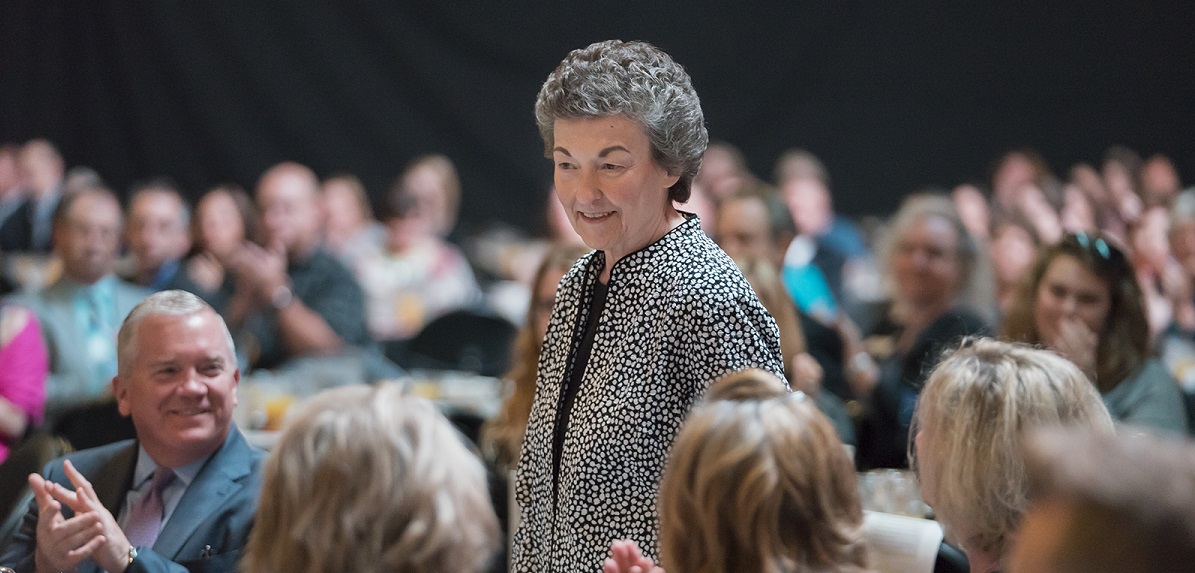
Mae Whitmer has a passion for children. In the 80s, Mae worked at SRI (Gallup) Child Development Center with babies and toddlers and realized the critical importance of early childhood development. When she learned through Prosper Lincoln that 750 young children in need are on a wait list for high quality early childhood education, she was moved to make a difference.
“Mae has a special place in her heart for babies and toddlers,” said Paula Metcalf, VP for Gift Planning at Lincoln Community Foundation. “It was such a pleasure to watch her face light up as she discovered she could fulfill her lifelong dream by making a permanent impact through her gifts."
Mae began by establishing the Bill and Mae Whitmer Early Childhood Education Scholarship at the University of Nebraska Foundation. Because of Mae’s generosity, six students already received scholarship awards this year to help with their tuition costs to pursue a career focusing specifically on infant and toddler education.
Mae then became a Benefactor at the Foundation when she established an endowment designated for Dimensions Education Programs. Their new early childhood center is located at 70th and A and will serve 120 more Lincoln children. Made possible by the sale of some land, this forward-thinking gift will reserve 45% of enrollment for infants and toddlers from low-income families at Dimensions. These families will receive scholarship assistance from the endowment Mae set up at the Lincoln Community Foundation. Because this gift is endowed, it creates a permanent funding stream for these scholarships. This is a remarkable gift from a visionary person.
Mae’s late husband, Bill, was the third generation owner of ABC Electric. In a beautiful tribute to Bill, Dimensions’ new baby classroom will be named Advanced Baby Care (ABC).
“I’m thrilled that I was able to fulfill the three greatest needs identified by Prosper Lincoln’s Early Childhood focus – teachers, space and infant and toddler scholarships,” said Mae.
In 2014, leaders of Lincoln’s largest public and private charitable organizations commissioned the first Lincoln Vital Signs report to provide a shared understanding of both the strengths and the challenges in our city. Since then, Lincoln Vital Signs reports have been used by funders to target resources, nonprofit agencies for program development, the faith community for services planning, the business community
to improve workforce development, neighborhood organizations for advocacy and involvement, performing arts as an inspiration for a new musical, and in many other ways.
Our community’s response to Lincoln Vital Signs led to the creation of the Prosper Lincoln community agenda. Thousands of people participated in prioritizing Lincoln’s focus areas of Early Childhood, Employment Skills, and Innovation.
Prosper Lincoln has an action-packed strategic plan to ensure great progress in these focus areas by year 2020. It is through the power of numbers - working toward a common goal - that our community agenda can best respond to Lincoln’s needs and opportunities.
Would you like to follow Mae's lead? Find out how you can turn your passion into a lasting legacy for our community. Contact Paula at 402-474-2345 or paulam@lcf.org.
Combating Addiction with CARE
Published on Feb 20, 2018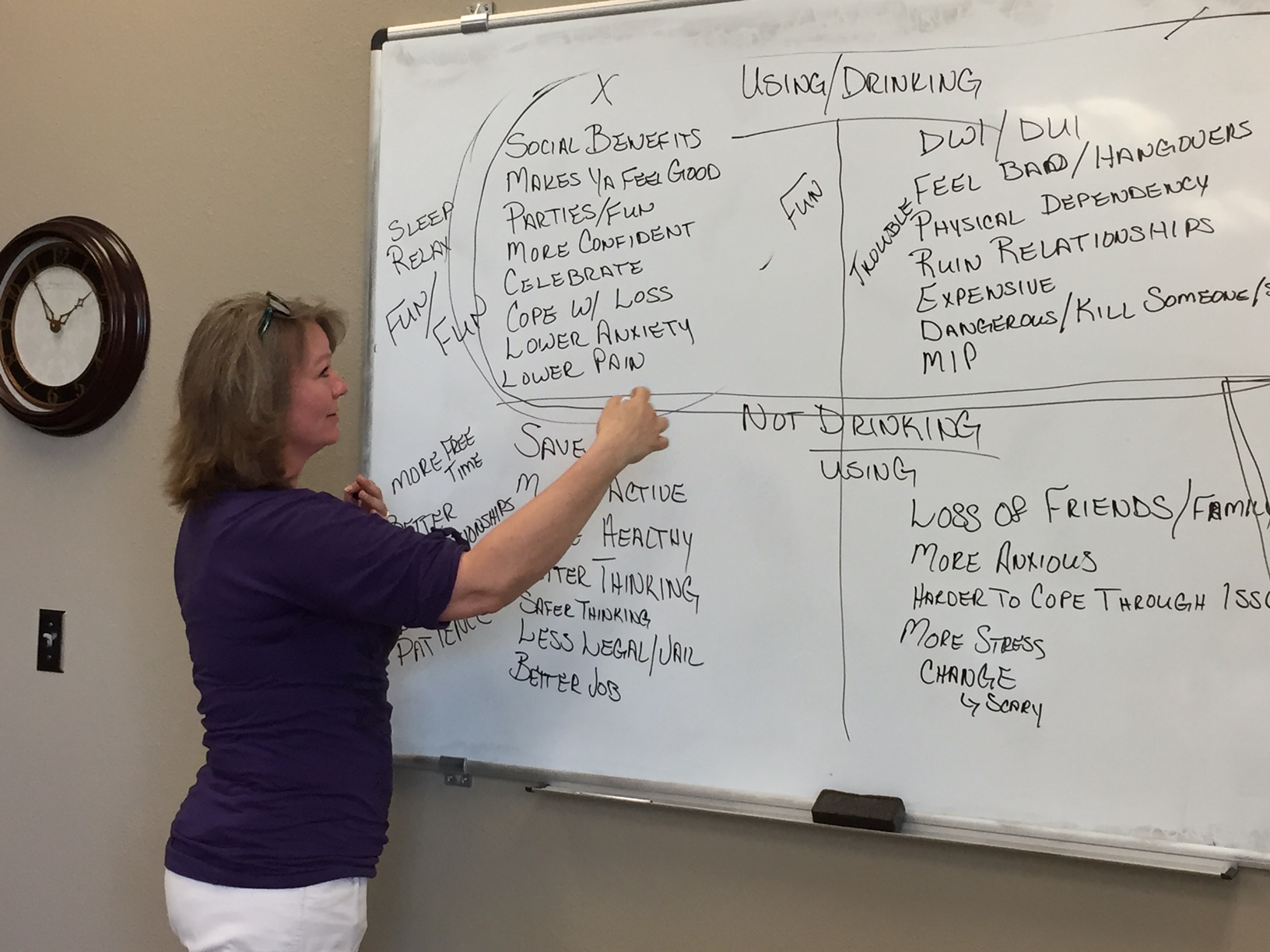
Matt Talbot Kitchen & Outreach is so much more than a soup kitchen. Since 1992, Matt Talbot’s programs have helped thousands of Lincoln’s homeless off the streets and into the workforce. One of these programs is the Counseling, Alcohol Education, Referral and Evaluation (CARE) Program.
Substance use disorders are a common problem among the homeless population, and Matt Talbot believes that full rehabilitation requires sobriety. The CARE Program offers drug and alcohol evaluations which are required in order to enter a treatment facility. CARE staff members provide one-on-one counseling and help refer individuals to appropriate resources in the community that address these behavioral health disorders. These services are free, eliminating the financial barrier that often exists for the homeless seeking treatment.
In August of 2016, Matt Talbot received a $20,000 grant from the Lincoln Community Foundation to expand the scope of the CARE Program by hiring additional counselors. As a result, Matt Talbot was able to greatly increase the number of annual drug and alcohol evaluations, and saw a 24% increase in the number of people enrolled in the program.
“We’re doing a lot more than giving them an evaluation and kicking them out,” said Clarence Grendahl, CARE’s program coordinator. “We walk with them if they’ll let us.”
CARE’s counselors are engaged with these individuals every step of the way. The program even offers transitional housing to move further in the direction of independent living. Tenants are only asked to pay a $20 monthly service fee.
Susie Wilson, Matt Talbot’s Coordinator of Communications and Grants, stressed how important the CARE Program is to the organization’s overall mission.
“This program is so important to Matt Talbot,” Wilson said. “Our founders originally set out to offer assistance to people struggling with addiction, so the addition and growth of the CARE Program is realizing their dream in a very concrete and effective way. It's what our organization is really all about.”
Grendahl and the rest of the CARE staff hope to continue to grow the program in the coming years to combat the queue of people seeking help.
“It’s difficult and frustrating to make people wait when it’s clear that they’re ready,” Grendahl said.
If you want to learn more about the CARE Program and the good it’s doing for Lincoln’s homeless, visit Matt Talbot.org/addressing-addiction.
Fortunate Enough to Share
Published on Oct 25, 2018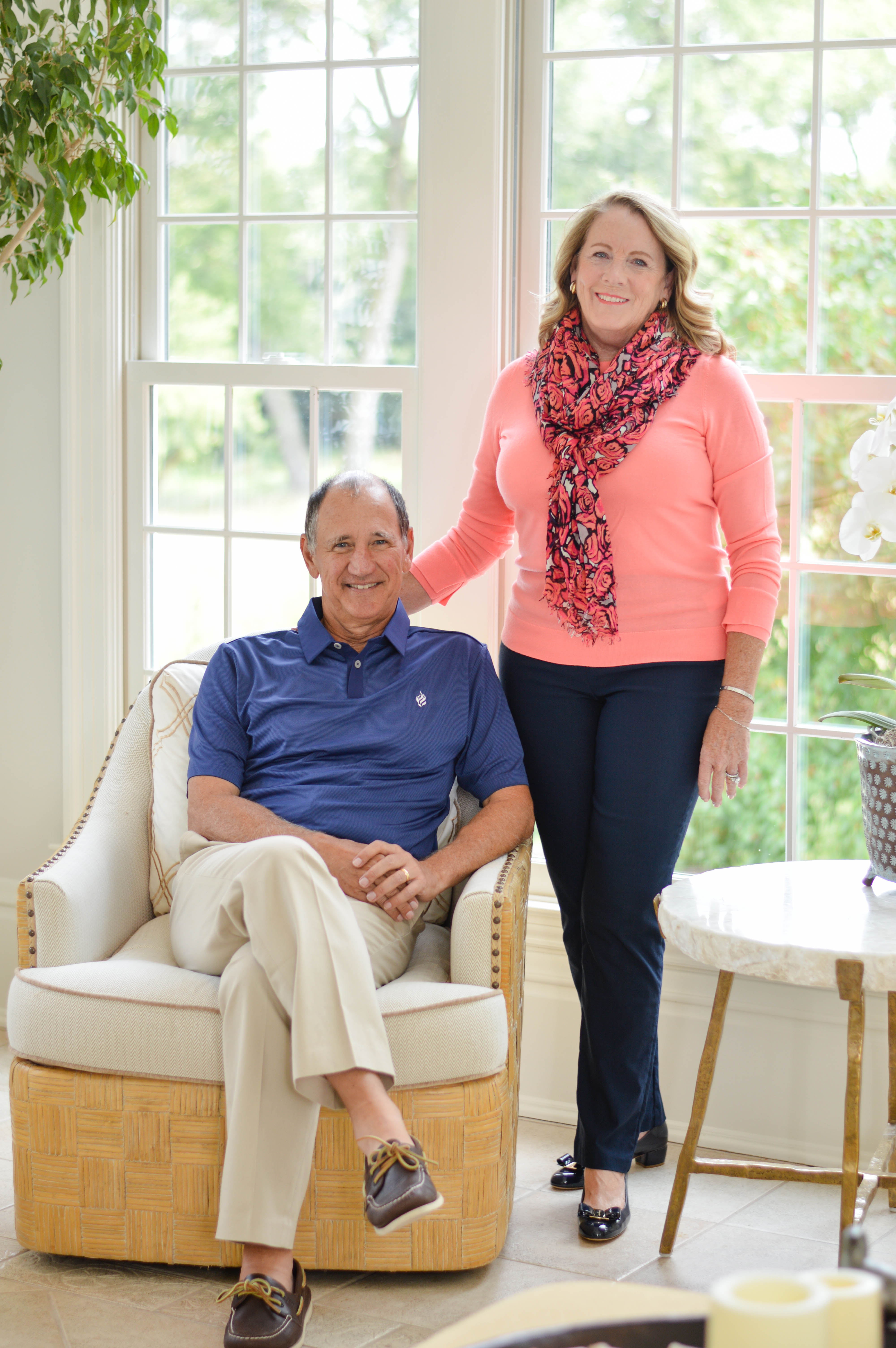
Bill and Marilyn Cintani appreciate their good fortune. They own a successful business. They have raised four successful children. They love their community. “We have been very fortunate in making Lincoln our home,” Bill said. “Many people find themselves in less than ideal circumstances that are not of their own making. It takes a strong person to persevere through adversity, and live a happy, productive life. We give to try to help level the playing field a little bit for those folks.”
Marilyn grew up near Lincoln, while Bill moved here 40 years ago to work for Mapes Industries, a family owned business with 100 employees that has manufactured specialty architectural panels and architectural canopies in Lincoln since 1952.
Lincoln is their home, and their involvement reflects that support of the Lincoln community. Bill recently served as Chair of the Lincoln Community Foundation board of directors and will serve as board chair for the Lincoln Chamber of Commerce in 2019.
During Bill’s time on the LCF board, he’s seen the impact that a match can have on encouraging donations. Give to Lincoln Day has been able to leverage a match investment of $2,050,000 to produce $20 million in donations over 7 years. “Being able to leverage donations and increase the total number of donors to make a bigger impact just makes sense,” he said.
Inspired by this concept of leverage, Bill and Marilyn have pledged $50,000 from their personal donor advised fund (DAF) to serve as match dollars for new DAFs established at the Lincoln Community Foundation. As match funds are available, new DAFs will receive an additional 10% gift up to $1,000, thanks to the Cintanis’ generosity.
“Today, DAFs are probably the simplest,most flexible structure to create and maintain philanthropy,” Bill said. Donors can advise which nonprofits receive grants
from their DAF, and Lincoln Community Foundation verifies the legitimacy of all nonprofits and keeps all of the required records. There are no specific time frames for how often you must donate to or grant from a DAF. There are no minimums and no fees, allowing more benefit to return to the community.
“It really is better than a personal foundation,” Bill said.
This isn’t the first time Bill and Marilyn have used their donor advised fund for a creative purpose. For several years, they sponsored projects at the University of
Nebraska Raikes School of Computer Science and Management giving students the opportunity to work on issues that help nonprofits. One example enabled the Lied Center for Performing Arts to hire a technology intern to set up a new event management software and ticketing software, creating long-term efficiencies for the organization.
“I like that we get to expose these tech kids to philanthropy early,” said Bill. “They will be successful some day, and we want them to know how important giving back can be to their community.”
After meeting some of the students, Marilyn said, “It’s nice to hear the students get excited about helping.”
“I believe in supporting people early in their lives,” Bill said. “We won’t have an effect on outcomes unless we catch them in their formative years.”
Marilyn’s heart guides the issues she supports. “I want to touch families by helping children, helping women raise their children and helping them get out of a bad situation,” she said.
Bill sees DAFs as a tool for younger adults too. “DAFs are a great way for someone not as active in philanthropy yet,” he said. “A person could make donations to the fund over time in order to make a larger gift at a future time.”
As a matter of fact, Bill and Marilyn have set up DAFs for their four adult children, who have modeled Bill and Marilyn’s charitable interests, serving on boards and committees. “It is a good way to bring along the next generation of philanthropists.”
Besides Bill’s work with Mapes Industries and the couple’s philanthropic interests, the next generation - their five grandchildren – get much of their focus. “Getting to spend so much time with grandchildren brings us joy,” said Marilyn.
“When you are in a position to share your good fortune, everybody wins,” Bill said.
To learn more about the match opportunity and setting up a donor advised fund, contact Chip DeBuse, VP for Development, at 402-474-2345 or chipd@lcf.org.
Barb and Carly – Teammates for School and Life
Published on Jul 25, 2019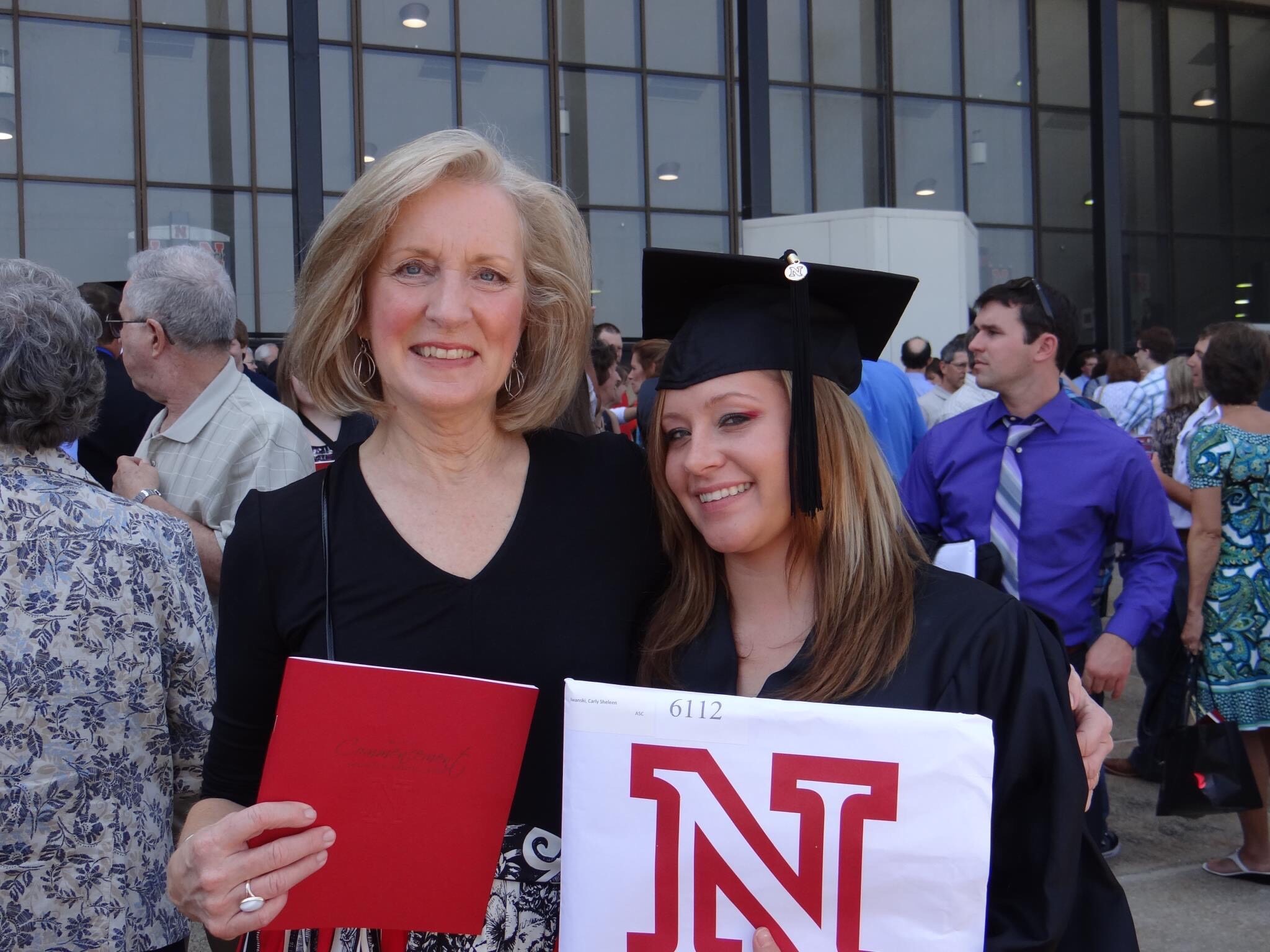
Carly was in fifth grade when a teacher at Hawthorne Elementary told her someone was going to come meet with her regularly. “I didn’t really know why,” Carly remembers. “Just that some lady would come talk to me and hang out.”
That lady is now Lincoln Community Foundation’s President, Barbara Bartle. Now, over 20 years later, Carly and Barb are professional colleagues. “Little did I know the impact she would have on my life when I volunteered to be her mentor,” said Barb.
The early years of their TeamMates relationship were about building trust, but having Barb as a TeamMate during high school and college was most important. “I didn’t really open up for a while,” Carly said, “but I really liked having someone to talk to. She gave me a whole other perspective on future goals.”
Carly had moved a lot before fifth grade. Her family benefited from resources like housing opportunities through Habitat for Humanity, social services and federal programs that supported her medical needs and school lunches.
Thanks in part to Barb’s encouragement through the TeamMates program, Carly became the first in her family to graduate college where she studied Communication and minored in psychology and ethnic studies. Prior to serving as Donor Relations Assistant for the Foundation, she worked as an AmeriCorps member with Lincoln Public Schools to help connect families in need with their school community. Most recently, she was a consultant for Region V Systems and implemented a grant in the area of substance use prevention in youth.
“I realized later in life that because of having Barb as a TeamMate, I was given an outside perspective on a different reality than what I was living,” said Carly. “Any time I expressed an interest in something, she connected me with someone who I could speak to and learn more. Having a TeamMate helped me connect my thoughts and ideas with the rest of the world.”
“From childhood mentee to successful professional woman, she has defined courage, perseverance and hard work,” said Barb. “While serving as her mentor to guide her pathway, she in turn has been the poster child of influence on my career path. She has been a driving force in my life.”
Give To Lincoln Day Smashes Record with $4.6 Millions
Published on Jul 3, 2018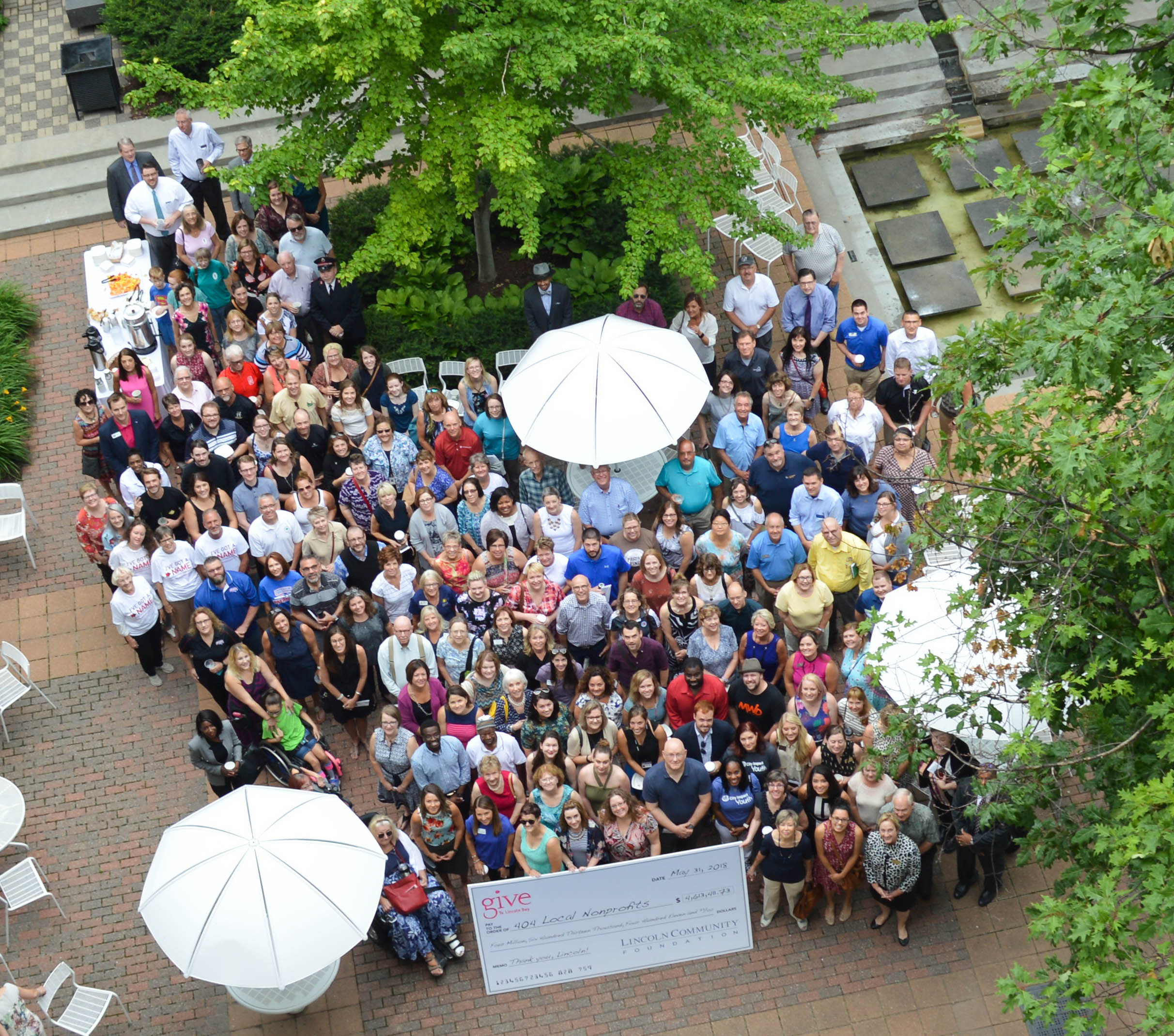
When the community comes together, big things happen. The biggest, really! Lincoln Community Foundation hosted the 7th annual Give to Lincoln Day on May 31st, raising a record $4,613,411.73. This total was more than $920,000 over the previous record set last year. The funds were designated to support 404 local nonprofits that serve Lincoln and Lancaster County.
All participating nonprofits received a proportional share of a $400,000 match fund provided by Lincoln Community Foundation and other sponsors, based upon the organization’s percentage of the total dollars raised.
“Our generous community spirit was spectacular,” said Barbara Bartle, President of the Lincoln Community Foundation. “Thanks to thousands of donors, the match fund sponsors and the local media partners, our local charitable organizations have the funding they need to continue their impactful work in our community.”
Nearly 20,000 individual donations were received for this year’s event, an increase of almost 3,000 from the previous year.
“Since Give to Lincoln Day began in 2012, donors have contributed more than $20 million to our nonprofits,” said Bartle. “We are so grateful to the caring Lincoln citizens who show the meaning of philanthropy on this remarkable day of giving. We passed the hat, and Lincoln opened its giant heart.”
For more information and to see gifts received for each nonprofit, visit www.GiveToLincoln.com.
Do you want to play a BIG part in 2019’s Give to Lincoln Day? Learn how you can “love them all” by being a Match Fund Sponsor. Contact Tracy Edgerton, VP for Strategic Giving, at 402-474-2345 or tracye@lcf.org.
Fall 2019 Newsletter
Published on Nov 11, 2019To catch up on the latest Lincoln Community Foundation happenings click here to download the newsletter.
Northeast Family Center
Published on May 26, 2017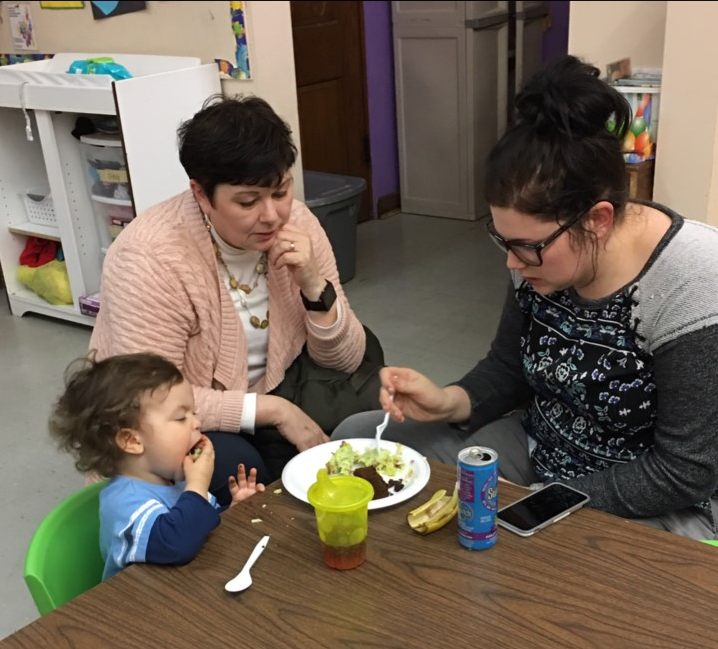
Strong families create strong, successful children and thriving communities. That’s the backbone of the Parents as Partners program at Northeast Family Center (NFC). It was developed to address the need for quality, affordable and safe early childhood education for low-income families in northeast Lincoln.
Parents as Partners (PAP) uses evidence-based practices to enhance the lives and learning of children ranging from 6-weeks-old to age five – and their parents – through ongoing enrichment, parenting education and family support (including food, diapers and transportation of children to/from school and the center).
“With the $10,000 grant from Lincoln Community Foundation as well as other support, we were able to purchase a van to help with the increased enrollment of children,” says Tonya Beckenhauer, executive director of NFC. “It also allowed us to eliminate a waiting list and begin expansion of our program to serve more families in need.”
One mother’s desire for her 4-year-old son to attend a structured program and be kindergarten-ready spurred her to enroll him in the PAP program last August. David is an only child, and needed to learn how to get along with others and transition from one activity to another. The staff and David’s mother worked together to come up with a chart and a classroom bell so he was able to both see and hear transition times. David is learning to communicate verbally when he needs something. He has even started encouraging his peers to follow directions. His mother is very happy David is progressing at NFC, and plans for David to attend the summer program to maintain consistency in his routine.
PAP is designed to ensure that children are prepared with the skills necessary to succeed in kindergarten, making it statistically more likely that they will graduate from high school. The Prosper Lincoln shared community agenda embraces the importance of a higher graduation rate and its connection to a strong economy where all can prosper.
If you are interested in helping fund a scholarship for a child in need, please contact Tonya Beckenhauer at 402-471-3700.
The Lincoln COVID-19 Response Fund Deploys $189,000 in Emergency Assistance to 13 Local Nonprofit Organizations
Published on Apr 6, 2020The grants are a coordinated first response to provide immediate economic stability and meet the basic needs of Lincoln residents, including access to food, housing, medical information, and other support.
The Lincoln COVID-19 Response Fund has been established by the City of Lincoln, businesses, and philanthropic partners to rapidly deploy flexible resources to nonprofit organizations in Lincoln that are working with communities disproportionately affected by the coronavirus pandemic.
First round grant recipients were identified by a coalition including the City, LCF, the United Way of Lincoln and Lancaster County, the Lincoln Partnership for Economic Development (LPED), the Community Health Endowment (CHE), and other philanthropic and business partners. The coalition is led by a committee chaired by Bryan Seck, Director of Workforce Development for LPED. Meagan Liesveld, Executive Director of the United Way serves as Vice Chair.
To make it possible to move resources quickly and adapt to evolving needs, the Fund will continue to award operating grants on a rolling basis as fundraising efforts continue. The Lincoln COVID-19 Response Fund is designed to complement the work of public health officials and expand local capacity to address all aspects of the pandemic as efficiently as possible.
The needs in our community continue to grow and the scope of this crisis will require aid from many different public and philanthropic sources. We continue to encourage everyone to give a "community helping hand” to the causes and organizations they care about, including those that are not included in this round of grants. Now is the time to double down for our community. Lend your hand by making a donation today.
Grants addressing the immediate needs of economically vulnerable populations
Asian Community & Cultural Center $7,500.00
CEDARS Youth Services $25,000.00
Coddington Learning Center $5,000.00
Community Action Partnership $15,000.00
Faith Lutheran Touching Hearts $2,500.00
Food Bank of Lincoln $25,000.00
Food Fort $7,500.00
Good Neighbor Community Center $30,000.00
Merry Manor School of Childhood $12,500.00
People's City Mission $25,000.00
The Barnabas Community $4,000.00
The Salvation Army $25,000.00
Yazda $5,000.00
Record Number of Nonprofits Registered for 10th Give to Lincoln Day
Published on May 5, 2021
Lincoln’s 10th annual giving day is scheduled for Tuesday, May 25. Coordinated by the Lincoln Community Foundation (LCF), Give to Lincoln Day is an online event encouraging donations to support the local nonprofits and causes people care about. A record total of 455 local charities have registered for this year’s event. Every participating nonprofit organization will receive a proportional share of the $500,000 match fund, based upon its percentage of total dollars raised, thanks to many generous sponsors including Presenting Sponsor, West Gate Bank
Give to Lincoln Day will provide registered nonprofits a critical lifeline to fill the void from cancelled fundraisers and increased demands during the past year. Last year’s event raised nearly $7 million for 448 local nonprofits. Give to Lincoln Day has raised more than $33 million for local nonprofits in its nine-year history.
“Last year’s results were an incredible show of support for our community and neighbors,” said LCF President, Barbara Bartle. “Our nonprofits have been on the front line serving our most vulnerable for over a year. Our generosity is needed now more than ever. On May 25th, let’s wrap our arms around them and give them a great big community hug.”
Donors may search nonprofits and give online at GiveToLincoln.com. Online giving beings on May 1, all donations must be made before 11:59 p.m. on May 25 to count toward the giving day and the match fund. The minimum donation is $10 per charity.
Gifts may also be mailed to the Lincoln Community Foundation if postmarked by May 20. Donors may also drop off donations between May 1 and May 25 at all Lincoln West Gate Bank branches via the lobby or the commercial drop drawers.
- • Lincoln Community Foundation’s mailing address, 215 Centennial Mall South, Lincoln, NE, 68508.
- • Presenting Sponsor, West Gate Bank, Lincoln Branch Locations, Visit https://westgate.bank/locations for lobby hours.
On May 25, donation totals can be viewed throughout the day at GiveToLincoln.com. Match Sponsors include: West Gate Bank (Presenting Sponsor), ABC Electric, Assurity Life Insurance Company, Bill and Marilyn Cintani, Cornhusker Bank, Data Source, Davis Design, The family of Alfred A. Duteau, Firespring, Bob & Jan FitzSimmons, HBE LLP, Lincoln Community Foundation, Mail Management Services, Inc., Olsson, Pepsi Cola of Lincoln, Pinnacle Bank, William J. Mueller & Kim M. Robak, Runza, Joe W. & Ruth K. Seacrest Fund, Talent Plus Inc., US Bank, and WRK Family Foundation.
Finding the good, giving as a wealth strategy, and an open invitation
Published on Jun 3, 2022
It can be hard to see the good in people as heartbreaking exceptions seem to dominate modern life, but it is worth remembering that philanthropy–”love of humanity”--is alive and well. A study at Stanford University indicates that a sense of community and calls to action help align people around common values. Indeed, high-profile examples of philanthropy, from Carnegie Hall to the manatees, help reinforce the notion that people can turn altruism into action through their leadership and financial resources.
What’s more, nearly two-thirds of high net-worth philanthropists agree that charitable giving is part of their overall wealth strategy, according to a recently-released study by BNY Mellon reporting the results of a survey of individuals with investable assets of at least $5 million. Once again, the takeaway here for advisors is that it is important in any situation to at least ask whether the client would like to incorporate charitable giving into their financial and estate plans. If the answer is yes, the development team at LCF is just a phone call away to provide guidance and serve as a sounding board.
Your clients’ charitable intentions, coupled with LCF’s ability to structure donor-advised funds and other charitable giving vehicles to meet your clients’ financial and community impact goals, create many opportunities for us to work together. The offer is always open for our team to stop by your office over breakfast, lunch, or even as a midday break to exchange ideas. We’d love to help you help your clients make a difference in our community.
Hanging in there: Charitable giving in a challenging economy
Published on Oct 6, 2022
Earlier this year, Bankrate and Psych Central released the Money and Mental Health study and, not surprisingly, a large number of people surveyed in the research reported that money has a negative impact on their mental health. Survey results varied across generations: Financial concerns psychologically impact 48 percent of Millennials, 46 percent of Generation X, and 40 percent of Generation Z. Needless to say, every generation will feel the sting of any bear market, including (and especially) Baby Boomers.
At the moment, economic conditions feel, well, awful. Some people feel better if they can gain a better understanding of the factors that created the unpleasant mix of inflation, rising interest rates, and a bear market in the first place. Others are comforted knowing they are not alone as they ride the emotional rollercoaster. And for those who are charitably inclined, challenging economic times might serve as an inspiration to become more intentional about charitable giving priorities. What's more, not all donors will reduce their donations.
Here are three messages worth sharing with your philanthropic clients as bear market conditions hang on into the fourth quarter:
“Not all stocks are down.”
Giving appreciated stock to a donor-advised fund or other type of fund at the community foundation is always a tax-savvy alternative to giving cash, regardless of the economic situation. Your clients may feel disappointed that their portfolios have hit a rough patch, but this does not mean that there aren’t still plenty of opportunities to avoid capital gains tax on stocks held for more than a year. (Take a look at the historical share price of Apple, for example, and imagine the capital gains tax liability for clients who’ve held the stock for several years.)
“Consider the needs of others who are even more acutely feeling the pinch of inflation.”
Community needs are rising, and the Lincoln Community Foundation is dedicated to staying on top of the issues that are critically important to our quality of life at any given time. Families with low or moderate household incomes can be especially vulnerable to high inflation. The team at LCF can help your clients zero in on nonprofits in our community that are serving the people who need the most help right now.
“Don’t forget about the Qualified Charitable Distribution.”
We mention this tool a lot because it is such a financially savvy way for your clients to support the charities they care about. If your client has reached the age of 70 1/2, the client may be eligible to make annual distributions of up to $100,000 per spouse from IRAs directly to an unrestricted or field-of-interest fund at LCF or other qualifying public charity. REMEMBER, transfers to donor advised funds do not qualify. QCD transfers count toward satisfying clients’ Required Minimum Distributions and avoid the income tax on those funds. Plus, those assets are no longer part of a client’s estate at death, which avoids estate taxes, too. What’s more, the QCD may get a boost if the EARN Act becomes law; proposed bipartisan legislation would expand the QCD rules to allow a one-time, $50,000 QCD to a split-interest trust such as a charitable remainder trust.
Celebrating a Community of Belonging
Published on Sep 29, 2023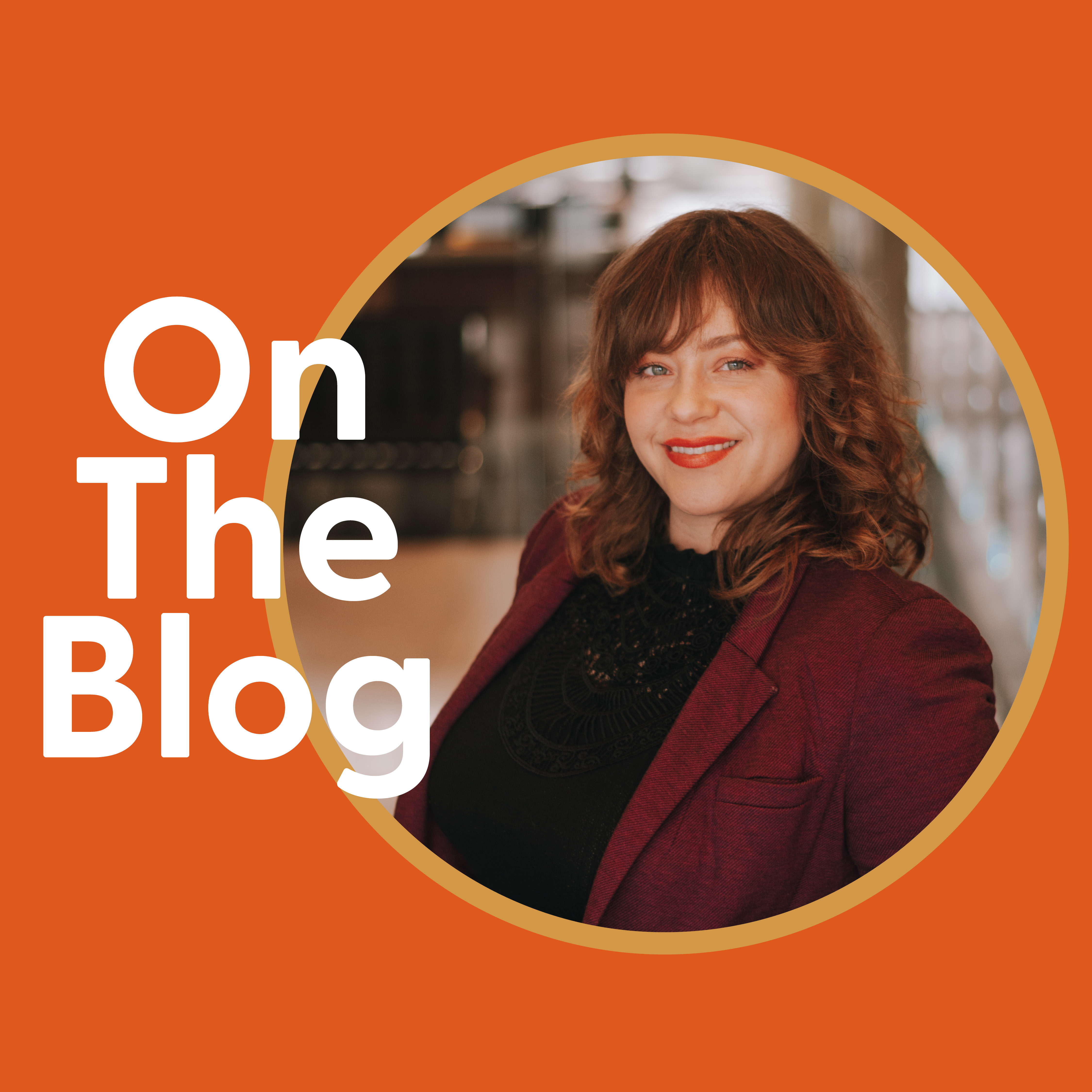
By Carly Grutel
As naturally social beings, humans instinctively want to belong. Belonging to a community can help us develop a sense of purpose and provide an opportunity for a collective identity. By adopting belonging as one of our organization’s core values, we strive to be proactive and intentional about creating equitable opportunities in our community. Lincoln’s annual Welcoming Week was a recent example of our community coming together to celebrate belonging.
Since 2012, Welcoming Week has been celebrated during a week in September in communities across the country, including ours. During this week organizations and communities bring together neighbors of all backgrounds to build strong connections and affirm the importance of welcoming and inclusive places in achieving collective prosperity.
Lincoln’s Welcoming Week in 2022 saw planning efforts grow by bringing in city partnerships for the first time and holding three very successful Welcoming Week events. In 2023, the community set a record of 23 Lincoln Welcoming Week events, including community festivals, citizenship ceremonies and celebrations, informational and community-building events, art exhibitions, voter registration, and more. Local nonprofits, businesses, museums, and the city offered engaging and unique experiences to the community. As a community, we celebrated music, culture, food, and talents of newcomers from myriad countries who now call Lincoln home.
The Lincoln Community Foundation was a proud sponsor of this year’s Welcoming Week. In addition to being a sponsor, LCF shared the week’s line-up of activities with our staff so they could attend. Lincoln Unites! kicked off the festivities at the Auld Pavillion on Friday, September 8th with storytelling, music, and a citizenship ceremony. It was inspiring to hear stories from an array of speakers about citizenship, community and welcoming. You could feel the whirlwind of emotions by family members, friends, and neighbors as 25 immigrants gained citizenship.
During the ECHO Collective New Americans Art Show, I was drawn to a piece that depicted the Lincoln skyline. Founder & Executive Director of ECHO Collective, Kelly Ross shared more about the piece.
“The artist asked me if people would know what this was,” she reflected. “I said, of course, people in Lincoln know their skyline.”
I was particularly struck by this sentiment. Whenever I see the Capitol, especially upon returning from traveling, I get an overwhelming sense of gratitude to call Lincoln my home. What a beautiful, shared experience for us to have as Lincolnites. No matter where you might be from originally, once you live in Lincoln – when you see that skyline appear on the horizon it feels like home.
I continued to reflect on this idea of what it means to belong in our community, especially for newcomers. How incredible is it that this talented artist is creating meaningful art that showcases Lincoln, a new home to her? I think about her connection to ECHO Collective and how it has given her a positive experience in Lincoln, allowing her to really embrace a sense of belonging.
Lincoln embraces community. We show up for each other. This was on full display at all the activities and events during Welcoming Week.
To learn more about Lincoln Welcoming Week and the New Americans Task Force efforts visit Lincoln/Lancaster County Welcoming & Belonging.
Clients want to know: What’s deductible and what’s not?
Published on Oct 4, 2023
Whether you are an estate planning attorney, financial advisor, or accountant, you’ve probably seen an uptick in client questions about tax deductions–and tax rules in general–over the last few years. Tax law changes at the end of 2017 have caused a lot of ongoing taxpayer confusion.
To be sure, your clients will be asking about charitable tax deductions as year-end rolls around. As an advisor, you’re already working with clients on financial and tax planning all year long, but fall is the time when many clients buckle down. Whether it’s the change in the weather or the imminent end of the calendar or tax year, autumn is a time to reassess things like tax loss harvesting and charitable giving. These are just two of many types of transactions that result in deductions when tax returns are filed in the spring.
Charitable giving may be especially high on the planning radar right now because of the many national fundraising initiatives that kick into gear this time of year. You (and your clients) have probably noticed that many different types of causes are celebrated each and every month.
Make sure your clients are aware that there are specific parameters around tax deductibility before they respond to requests from organizations and even their friends and family members who support these organizations. Your clients are relying on you as an advisor to stay on top of the rules, including:
–Section 501(c) of the Internal Revenue Code lays out the requirements for organizations to be considered tax-exempt--a status for which an organization must seek IRS approval.
–Tax exemptions apply to certain types of nonprofit organizations, but status as a nonprofit (which is a state law construct) does not necessarily mean that the organization will be exempt from Federal income taxes.
–Furthermore, even under Section 501(c), there are different types of nonprofits that are recognized by the IRS as tax-exempt.
–To qualify under the Internal Revenue Code Section 170 charitable deduction for gifts to Section 501(c)(3) organizations, for example, the recipient must be organized and operated exclusively for “charitable, religious, educational, scientific, literary, testing for public safety, fostering national or international amateur sports competition, and the prevention of cruelty to children or animals.” “Charitable,” according to the IRS, has a very narrow definition.
–No doubt, many of your clients not only support 501(c)(3) charities, but also social welfare groups organized under Section 501(c)(4). Examples of social welfare groups include neighborhood associations, veterans organizations, volunteer fire departments, and other civic groups whose net earnings are used to promote the common good. Donations to social welfare groups are tax deductible in only certain cases (e.g., gifts to volunteer fire departments and veterans organizations).
–Chambers of commerce and other business leagues fall under Section 501(c)(6); donations to these entities are not tax deductible.
If you have any questions about the tax deductibility of your clients’ contributions to various organizations, please reach out to the team at the community foundation. We are immersed in the world of Section 501(c) every single day and are happy to help you navigate the rules.
Summer 2019 Newsletter
Published on Jul 25, 2019To catch up on the latest Lincoln Community Foundation happenings click here to download the newsletter.
Lincoln's Symphony Orchestra
Published on Jun 2, 2017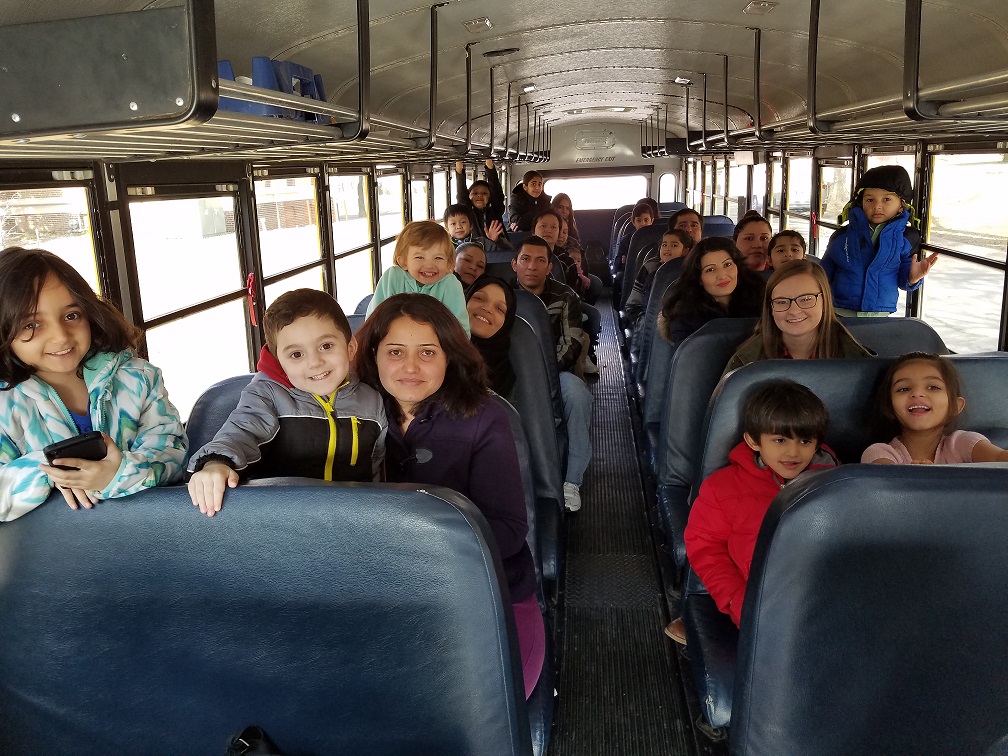
“Music is a piece of art that goes in the ears, straight to the heart.” ~ Author unknown
Lincoln’s Symphony Orchestra’s (LSO’s) partnership with Lincoln Public Schools’ (LPS’s) Family Literacy program provides families of the immigrant and refugee community the ability to experience all aspects of American culture, beyond what is learned in the classroom.
A $15,000 grant from Lincoln Community Foundation (LCF) allowed for approximately 1,000 English Language Learning family members to attend LSO’s two Family Concerts this past season.
Most immigrants and refugees are unable to attend concerts not only because of the perceived cultural barrier, but because of the very real challenge of transportation and financial restrictions. The program provides concert tickets to all Family Literacy participants free of charge, including family members living in the same household. LCF’s financial support is vital to underwrite transportation to the concerts and pre-event educational preparation.
“I spoke with one family after a concert and they said they felt like they belong,” says Barbara Zach, LSO’s Executive Director. “Participating in cultural activities is a really beautiful way to make people feel part of a community.”
The partnership with LPS Family Literacy has been so successful that LSO expanded the program to serve other organizations supporting immigrant and refugee families, including Lutheran Family Services, Catholic Social Services and Center for People in Need.
As Lincoln is a resettlement community, LSO wants to provide a warm and welcoming way for people to become involved in the community. Zach says that if there’s anything to bring people together, it’s music. No matter what your country of origin is or your income level, music can reach and touch us all, she says.
Read Aloud Lincoln Initiative Transitions to Lincoln City Libraries
Published on Nov 11, 2019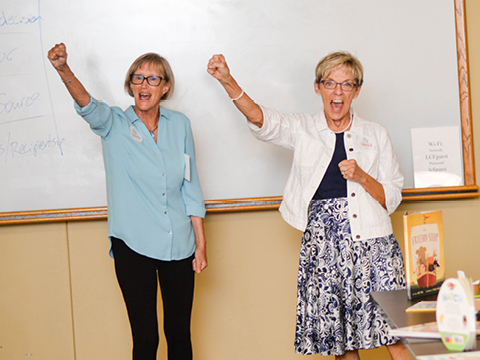 Part meeting, part celebration – the supporters of Read Aloud Lincoln were all smiles as they gathered in early September for an exciting announcement. After nearly 18 months of successful programming formed around the Prosper Lincoln focus on early childhood, the platform will continue to create a culture of reading aloud across the city. The work will now transition to a new parttime position within Lincoln City Libraries as Teagan Earhart steps into the role of Read Aloud Lincoln Advocate.
Part meeting, part celebration – the supporters of Read Aloud Lincoln were all smiles as they gathered in early September for an exciting announcement. After nearly 18 months of successful programming formed around the Prosper Lincoln focus on early childhood, the platform will continue to create a culture of reading aloud across the city. The work will now transition to a new parttime position within Lincoln City Libraries as Teagan Earhart steps into the role of Read Aloud Lincoln Advocate.
Read Aloud Lincoln includes a dedicated group of partners who want to spread the word to parents and caregivers that 15 minutes of reading aloud daily from birth to age 8 can profoundly impact success for all Lincoln’s children, both in school and in life. Their primary goal is to have every child ready to read when entering kindergarten and continue to build their literacy skills during their early school years. This can happen when parents read aloud 15 minutes a day, every day. It is the single most important thing they can do to prepare their child for reading and learning.
The original Co-Directors of Read Aloud Lincoln, Nancy Larimer and Mary Reiman, are thrilled to know that the work they started will deepen and continue to develop with Earhart at the helm. Events surrounding the initiative have kept them both extremely busy. “We popped up everywhere,” said Nancy.
Within the past two years, more than 35,800 books were placed into the hands of children all over the city. Mary said, “What we really saw was the generosity of Lincoln.” Beyond distributing books, Read Aloud Lincoln focused on connecting people and building relationships within the community.
The first two years of Read Aloud programming were made possible through a grant received from the Institute of Museums and Library Services and the Lincoln Community Foundation in support of the Prosper Lincoln community agenda emphasizing access to quality early childhood development. Now with the platform transitioning to the Lincoln City Libraries, the goals of the program have not changed, and its early champions are happy to see the initiative thrive in a new home. “We are so very fortunate to live in a city which highly supports early childhood literacy,” said Mary.
Philanthropic Preparedness, Resilience and Emergency Partnership
Published on Mar 1, 2018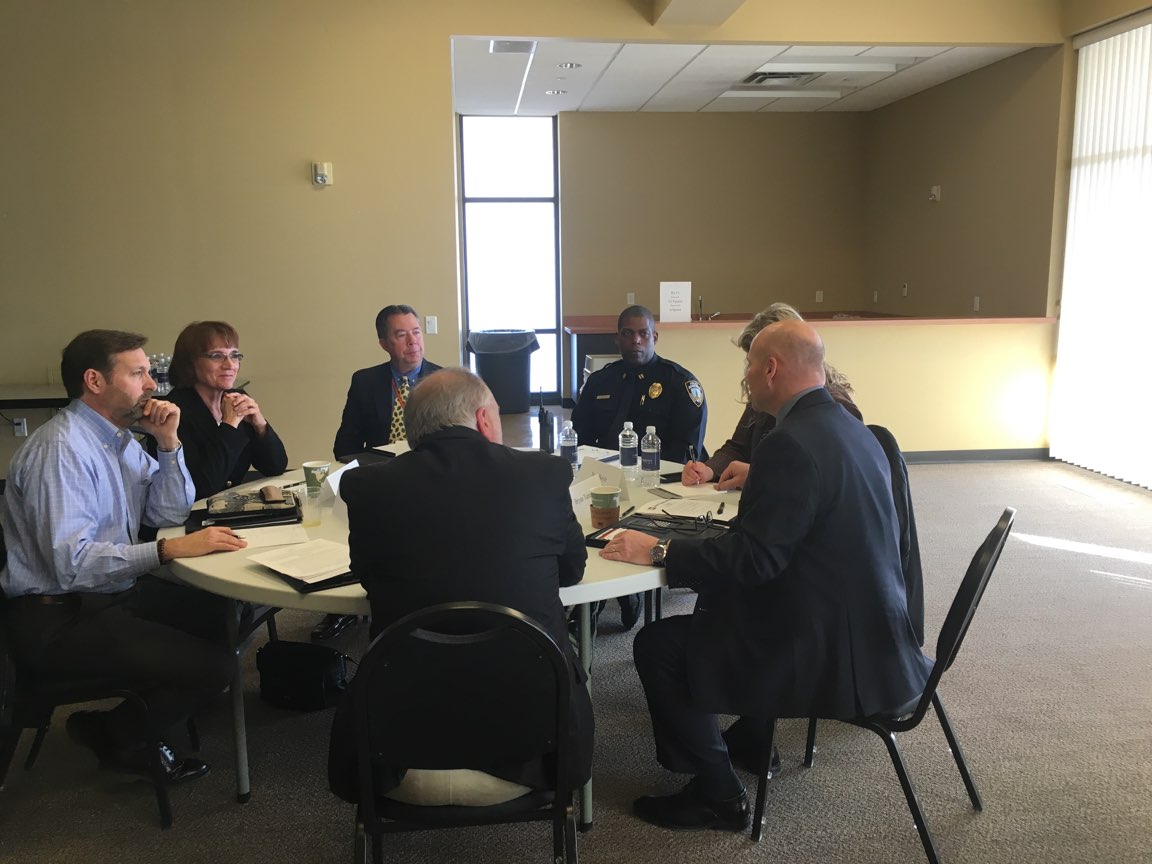
Many cities have faced serious natural disasters and local crises. As a community, we are taking advantage of an opportunity to learn lessons and best practices from the experience of others while preparing and planning for our community. Thanks to a grant to the Lincoln Community Foundation made possible by The Funders’ Network for Smart Growth and Livable Communities we have the opportunity to increase capacity of the community to respond and recover from disaster.
This critical planning process includes a broad base of Lincoln citizens whose roles in various areas of our everyday life contribute to the strength of our city and county. We are in collaboration with colleagues from the Philanthropic Preparedness, Resilience and Emergency Partnership (PPREP), a collective of 20 community foundations from across the Midwest. Kim Maphis Early is one of the designers for the PPREP curriculum, a facilitator of the PPREP meetings, and a senior associate with the Center for Disaster Philanthropy headquartered in D.C. She has been a wonderful asset in our work thus far, as she has led our discussions.
The objectives of our recently completed meetings have been: to share information on preparedness in our community; to determine issue areas needing focused attention; to create issue area working groups; and to finalize the framework for a collaborative process that will advance our goal of building a more resilient region.
With the collaborative efforts of community members and experts, Lincoln Community Foundation will be able to use the newly awarded grant to best help the community in times of need.
Tabitha Meals on Wheels Celebrated 50 Years
Published on Oct 8, 2018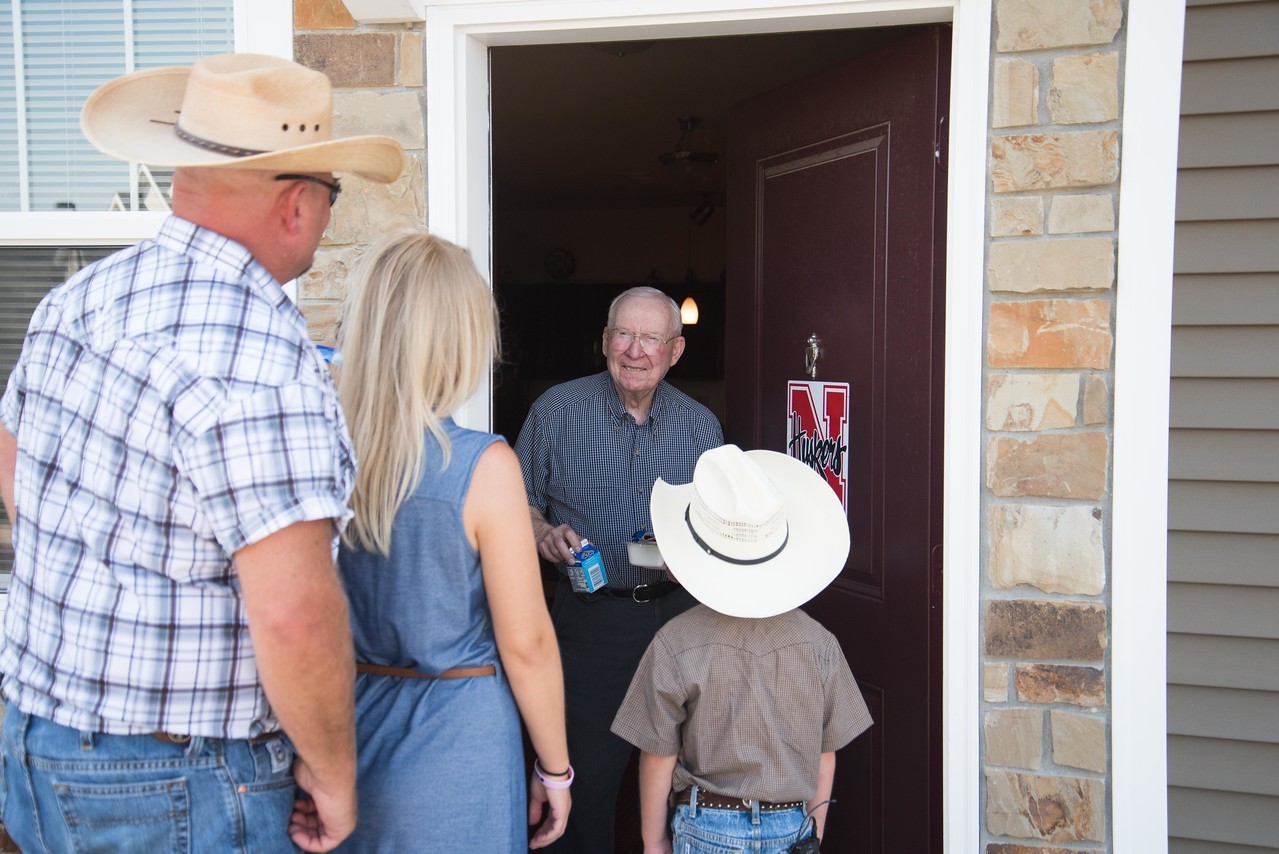
Food is a basic human need. For many individuals, where their next meal is coming from is a guessing game. Since 1967, Tabitha has been delivering more than four million meals to the Lincoln community through its program, Meals on Wheels. Over 500 clients receive not only a nutritious meal, but a safety check daily.
One of the 500 people Meals in Wheels serves daily is Deloris, an elderly woman at risk for falls. With limited mobility and health risks, Tabitha continues to serve her regardless of her inability to pay. A volunteer not only delivers a hot noon-time meal, but also provides a much-needed daily safety check. This program helps people like Deloris maintain their independence by continuing to live at home, which is a more economical option and often a better quality of life.
Lincoln Community Foundation provided a grant in honor of the 50th anniversary of the program. With 87% of recipients earning less than one-half of the area’s median income, Meals on Wheels never turns down an individual due to their inability to pay.
“This funding provided by the Lincoln Community Foundation was able to provide 1,600 hot and nutritious meals to those in our community who otherwise could not afford them,” said Michaela Young, Director of Program Development for Tabitha. “In 2017, we delivered 174,817 noon-time meals to local residents every day of the week and every week of the year.”
For more than 50 years, Tabitha has been promoting the dignity, independence and well-being of older-adults. Through generous donors and volunteers, Meals on Wheels will continue to provide the much needed support many people, like Deloris, need to remain independent.
Poetry and Sacrifice Collide in LPS Vietnam Project
Published on Oct 25, 2018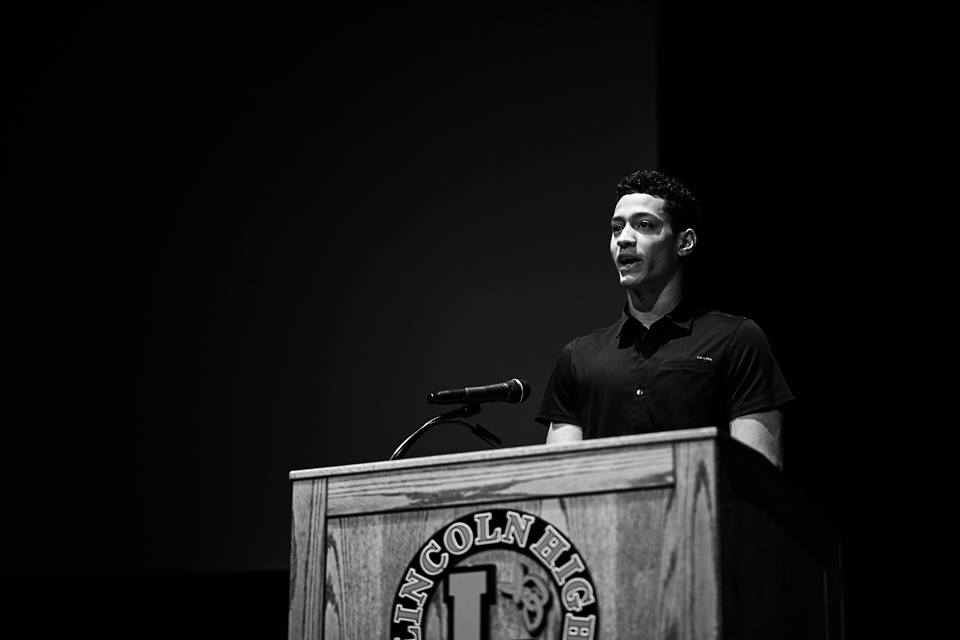
The firsthand accounts of war are often left out of textbooks. NET partnered with LPS to connect Lincoln High students with Nebraska Vietnam veterans, taking a deeper look into the realities of the war. The Vietnam Poetry Project allowed for face-to-face interaction, turning stories of sacrifice into poetry.
With many not knowing much about the Vietnam War, today’s high school students lack understanding and appreciation of the stories. This project allowed Lincoln High students to open their eyes to the important lessons of war. Funded by the Lincoln Community Foundation, students from Lincoln High were paired with Vietnam Veterans from Nebraska for face-to face interviews to learn about the war from those who saw and felt its impact first hand. “Young people are losing a bit of human connection, but by sitting across from someone, you can see the pain of their memories,” said Chris Maly, Lincoln High English teacher. “It becomes very real.”
For the veterans, this allowed the opportunity to tell their story and heal old wounds in the process. The poets were able to honor the sacrifice the soldiers made through their work. Both the poet and veteran benefited by building a multigenerational connection, one that held strong. Many veterans attended their poets’ graduation ceremony. One chose to write a letter of recommendation for his poet to enter the Naval Academy. Another attended the recent wedding of his poet as she married into the military, and he has since been a pillar of support as she navigates her new life.
We should never forget the sacrifices our service men and women have made. LPS is leading by example by providing an enlightening educational experience that has created lifelong connections. Through poetry, the sacrifices and warrior spirits will not be forgotten.
Community Learning Centers celebrate 20 years of success
Published on Apr 12, 2019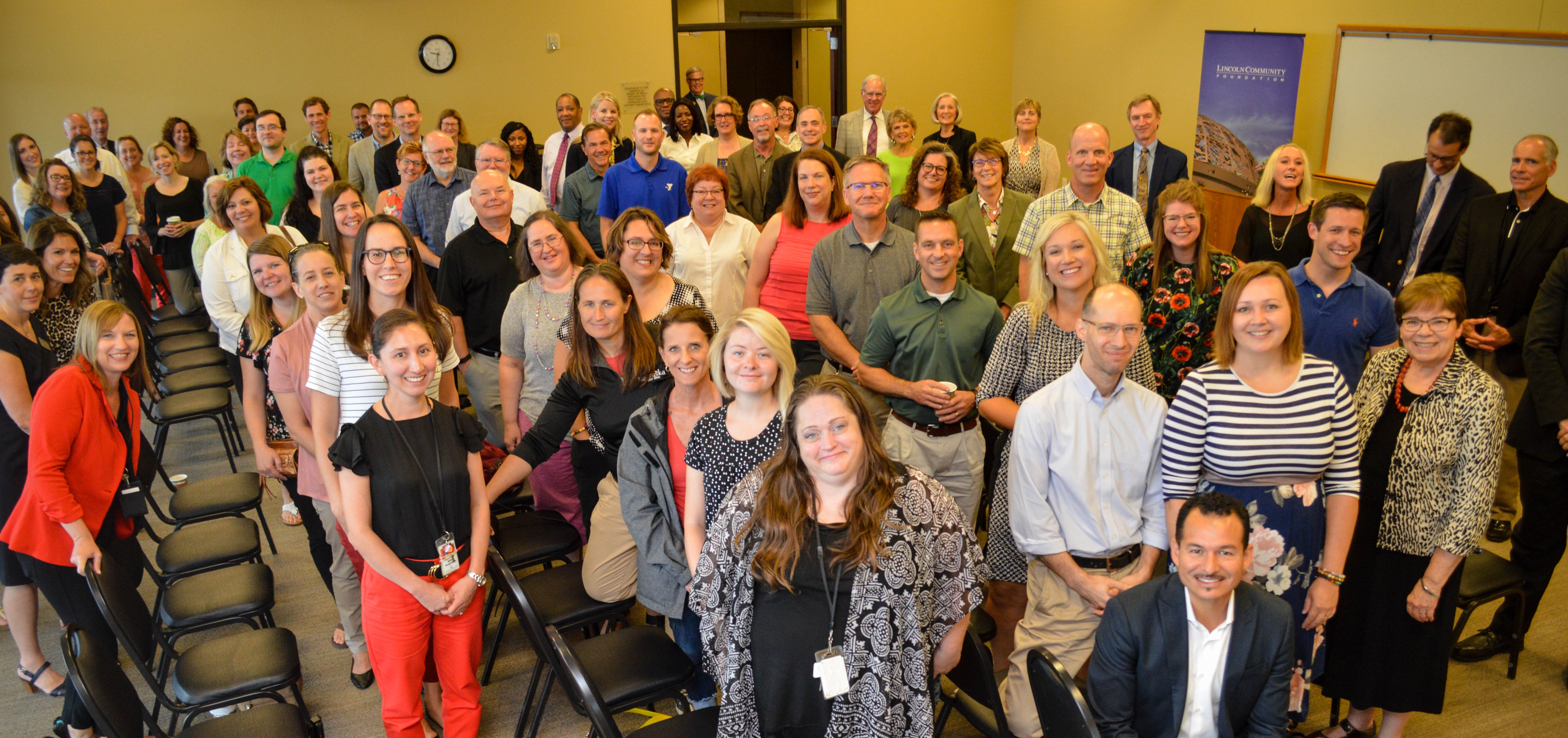
In 1999 Lincoln Community Foundation invested $100,000 in an idea that would support successful students, thriving families and strong neighborhoods. The creation of Community Learning Centers (CLC’s) represented a major structural shift in how our community worked together to deliver assistance.
CLCs started in four of Lincoln’s public elementary schools, offering before and after school programming for students as well as services for families and neighbors. “CLC’s were not just an after-school program,” said Cathie Petsch, former Co-Coordinator of the CLC’s from 2001 to 2011. In addition to raising the academic standards of after school programming, the CLC’s connect with families and the neighborhood surrounding the schools.
Today there are CLC’s at 26 schools (19 elementary, 6 middle schools and 1 high school) with plans to expand to 3 additional schools (1 elementary and 2 high schools) beginning next school year. To date, they have served more than 68,000 students.
Over the past 20 years Lincoln’s Community Learning Centers have leveraged millions of dollars from federal, state and city government, corporations, other foundations and private philanthropy. Each of the partners contribute a significant amount of funding and infrastructure to the system, with Lincoln Public Schools contributing approximately $2.5 million, City of Lincoln contributing $1.9 million and the lead agencies contributing $2.8 million in cash assets, capital, and in-kind support.
“The cooperation is a beautiful thing,” said Petsch. “The school system, working with the city and along-side the nonprofit partners really made a difference.”
Last year, an interlocal agreement created a new nonprofit to govern the CLC’s in an effort to create long-term sustainability. "Building on our strong 20-year history, Lincoln Community Learning Centers continues to prioritize serving our community's most important asset – our children,” said Nola Derby-Bennett, current director of the Community Learning Centers. “By serving the whole child, and their family and neighborhood, we give the student the very best possibility for success."
Learn how you can support children, families and neighborhoods, or a passion of your own, by contacting Tracy Edgerton, VP for Strategic Giving, by contacting her at tracye@lcf.org or 402-474-2345.
Released and Restored
Published on Jun 15, 2017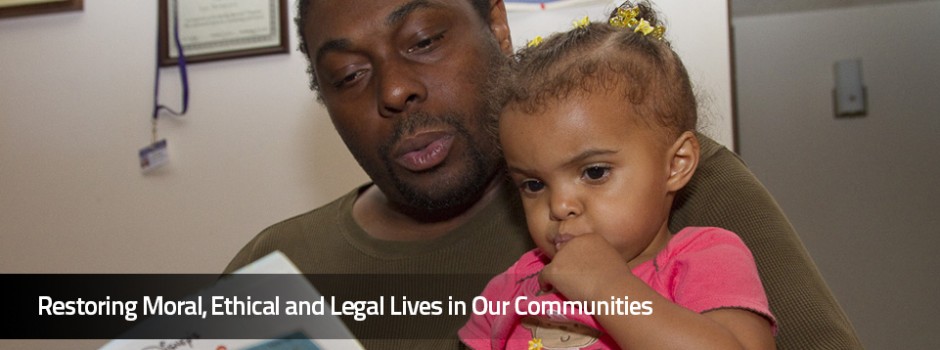
They want to work after they’ve served their sentence. Individuals who go through the Released and Restored programs – Job Readiness/LifeSkills (JRLS) and LifeSkills/ReEntry Prep (LSRP) – are preparing themselves for a better life after incarceration. Statistically, 28% of Nebraska’s 2,200 felons released from prison each year will return within three years. These programs effectively reduce recidivism rates among those in the criminal justice system and provide the tools to turn lives around for good.
Lincoln Community Foundation’s $15,000 grant to Released and Restored helps the day-to-day operations of their programs. “It supports the Life Skills/Re-Entry Prep program we offer in multiple locations, including the Nebraska State Penitentiary and the Nebraska Correctional Center for Women,” says Ruth Karlsson, its founder and executive director.
Incarcerated women and men going through the programs are prepared with skills and self-confidence to maintain long-term, gainful employment and the ability to successfully integrate back into the community.
Released and Restored’s programs offer a supportive environment and services post-release, including mentoring, job seeking and online application access through a computer lab, interview coaching and practice, and the Safe Haven program (weekly safe, sober and fun fellowship meetings).
One young woman, Nancy, decided to take the LSRP class three times, telling her fellow female inmates, ‘I grew more self-confidence each time and I’m glad I had the opportunity to take it more than once.’
Karlsson says that the felons who go through the structured Released and Restored programs are a great labor pool. Employers can be confident that those who go through Released and Restored programs very much want to work and are going to be good employees.
LCF Celebrates New Benefactors and Legacy Society Members
Published on Nov 11, 2019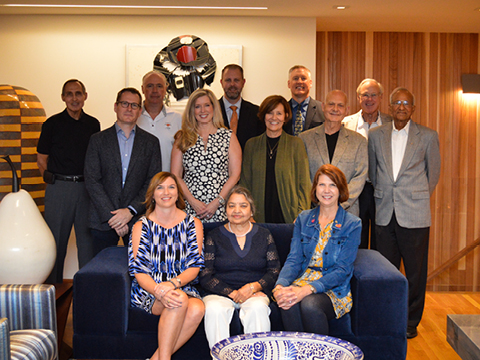 In September, LCF's Benefactors and Legacy Society gathered at the beautiful home of Tom and Lisa Smith to recognize and welcome new members.
In September, LCF's Benefactors and Legacy Society gathered at the beautiful home of Tom and Lisa Smith to recognize and welcome new members.
Members of our Legacy Society and Lincoln Benefactors are passionate leaders of the Lincoln community who inspire others through their investment in its future.
Lincoln Benefactors
Lincoln Benefactors are the backbone of LCF, providing long-term stability and significant benefits to our community nonprofit organizations. Lincoln Benefactors are donors who have made a current gift or a commitment for a future gift in one of the following categories:
• Individual gifts of $50,000 or more to the Lincoln Community Foundation Fund
• Endowed gifts of at least $500,000 to any fund. Learn more about an available 10% match
• Gifts of $1,000,000 or more to any fund
New Benefactors
John H. Casey
Willa Foster Jones & Richard K. Jones
Helen L. (Penny) Greer
Earl Visser
Philip A. & Carlene K. Waldron
Marica Kominsky Wallen
Legacy Society
Many donors make charitable plans through a will or trust, establishing a gift now and funding it at end of life. These legacy gifts are the ultimate gift received from a donor.
New Legacy Society Members
Mahendra & Prem Bansal
Ted & Karen Boyer
James D. & Rosalind K. Carr
Kyle & Koren Cartwright
Kristen & Geoff Cline
Heather Douglas
Clover & Matthew Frederick
Thad & Megan Huenemann
Al Imig & Beth (Dering) Imig
Alvin A. Lind
Tyler W. & Denise E. Mainquist
Linda & Gary Major
Robert McMaster & Maureen Ose
Richard J. Patronsky*
Ginny Phillips & Bill Weesner
James E. Potter* & Gail DeBuse Potter
Betty Sage
Thomas C. & Lisa M. Smith
Diane Snapp
David & Linda Sundberg
Jim & Nancy VanKirk
Philip & Carlene Waldron
*deceased
To learn more about planning a gift that leaves a lasting mark on Lincoln, contact Paula Metcalf, VP for Gift Planning, at 402-474-2345 or paulam@lcf.org
Young Professionals grant funds from Next Gen Giving Circle
Published on Apr 12, 2019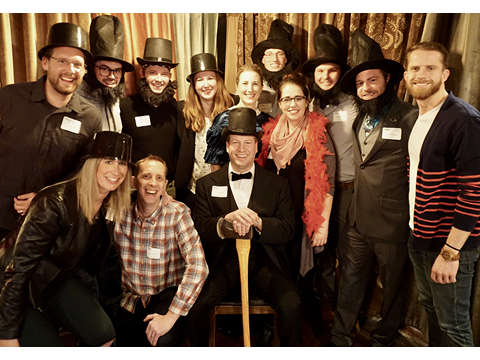
NextGen Lincoln, LCF’s group of young professionals who donate their time and money to local nonprofits, granted $13,000 to three local charities in 2018. Heartland Big Brothers Big Sisters received $6,500, Child Advocacy Center received $3,900 and Community CROPS received $2,600.
NextGen is now accepting membership applications for 2019. Sponsors and Friends are also needed to reach their goal of distributing $20,000 in 2019.
To become a member or support the NextGen Giving Circle, visit www.nextgenlincoln.org or contact Kelly Theye at kellyt@lcf.org or 402-474-2345.
Clover Frederick Assumes LCF Marketing Leadership
Published on May 5, 2017Lincoln Community Foundation welcomes Clover Frederick as Vice President for Marketing. For the past 16 years, Clover has worked as a fundraising and marketing consultant helping local nonprofit organizations to raise awareness and funding to help better meet their missions.
“Clover’s skills and talents make her a valuable addition to the Lincoln Community Foundation team,” said Barbara Bartle, President. “Clover is stepping in as we say farewell to Pam Hunzeker who retired on March 31st. Pam served as VP for Marketing at LCF since 2012 and for two years prior to that when she directed the foundation’s marketing efforts in her role as President of Bailey Lauerman. Please join us in wishing Pam a relaxing and happy retirement.”
Generous Donors Leave Their Mark
Published on Mar 5, 2018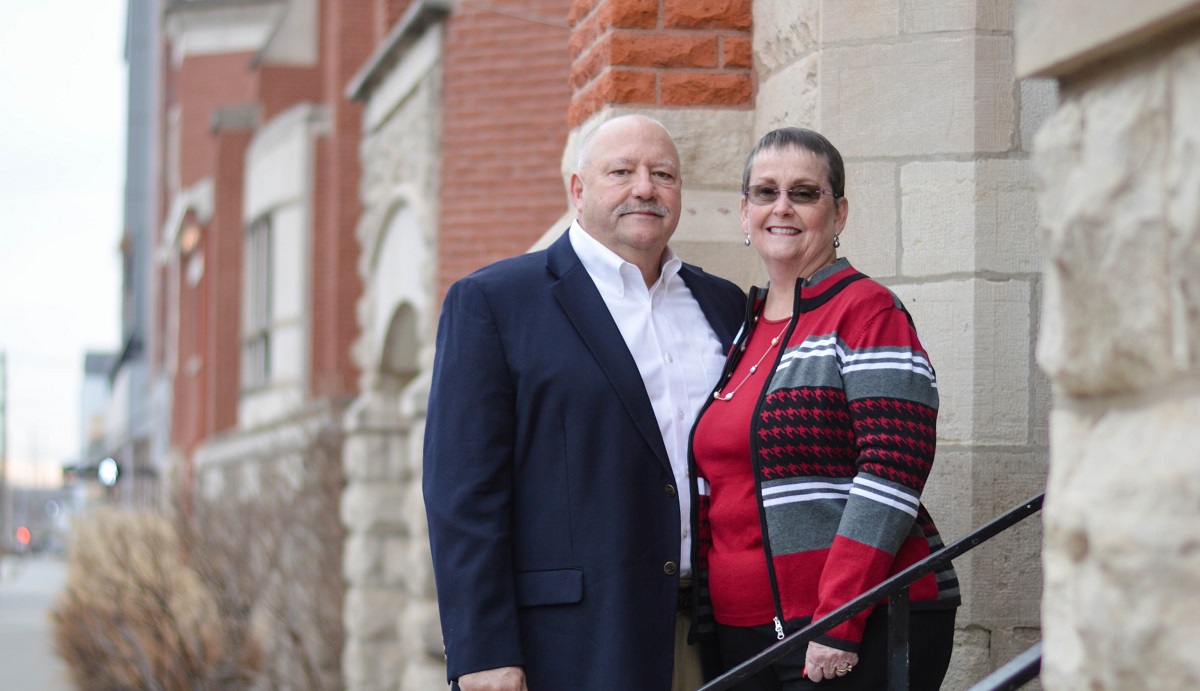
“This is our community and it’s important to leave a legacy,” said Vicki Huff. The retired trust officer and her husband, John who is retired from Lincoln Fire and Rescue, recently found a way to leave a lasting impact on an organization they love.
“We’ve always felt tithing at our church is important,” Vicki explains. “And I worried that someday, when we are both gone, the church will have a void without our annual gifts.”
Vicki and John started an endowed fund at the Lincoln Community Foundation that is designated for St. Paul United Methodist Church. The church will receive an annual distribution from the fund, and the fund will grow over time as a result of its investment and additional planned contributions from the Huffs. After providing for their 4 children and 10 grandchildren, they plan to leave much of their estate to the endowment fund as well.
“This teaches our children and grandchildren how important it is to give,” she said. “It is a big legacy for John and I to leave.”
The Huffs used a tax-savings tool to initiate the fund. “When I turned 70½, I was required to take a minimum distribution from my IRA,” she explained. “By using some of it to set up the endowment, no taxes were due on that amount.”
Lincoln Community Foundation is currently offering a 10% match on endowed funds designated to local nonprofits or churches. “The match was spectacular,” Vicki said. “I wanted to give the cake. You iced it!”
Endowments don’t have to be started by a single donor or family. The Lincoln Community Playhouse Guild found a way to ensure they could support the Playhouse for many years to come thanks to the newly established Lincoln Community Playhouse Guild Charitable Fund.
The Guild was started 50 years ago by a group of women who wanted to support the Playhouse’s programming. Over the years, the Guild had enough members and financial contributions to sponsor one of the Playhouse’s performances each year. But as membership organizations in general are experiencing a decline in involvement, so did the Guild.
Carla Petrey, the Playhouse Guild’s president, spoke to the Playhouse’s executive director, Morrie Enders, about her concerns in raising enough money to sponsor a show. Morrie knew that LCF could hold an endowment but had recently learned that a 10% match would be made available on endowments of $10,000 or more.
In 2017, the Guild started the fund with an initial gift of $5,000 — the amount that the Guild normally used to sponsor a performance — and they plan to contribute their sponsorship dollars annually to the fund.
“We’re encouraging supporters of the Playhouse and Guild members to consider donations to the endowment fund in memory of friends as well as include it in their estate plan,” said Petrey.
The fund is in “incubation” until it reaches $10,000 or more in donations, when it will then be invested, receive the 10% match and begin distributions annually to the Playhouse.
“That is just a win-win,” said Petrey. “Our name will continue on forever because of this fund.”
Learn more about the 10% match on designated endowed funds at www.LincolnForever.org or contact Paula Metcalf, Vice President for Gift Planning, at paulam@lcf.org or 402-474-2345.
Leaving a Legacy of Harmony
Published on Aug 30, 2021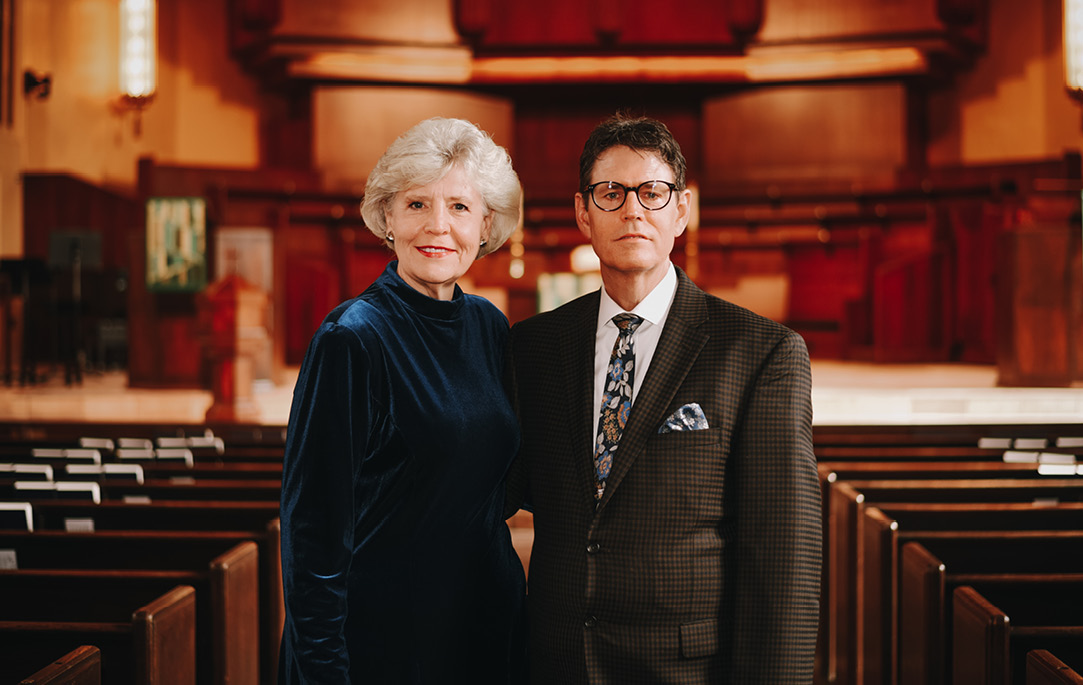
Listening to Matthew and Ann Finkner speak about their attraction to Lincoln and each other, one thing becomes clear: music is a strong link.
Matthew came to Lincoln from Minden, Nebraska, to be the drum major of the Cornhusker Marching Band.
Hailing from Rushmore, Minnesota, Ann arrived in Lincoln by way of her new position with Farm Credit Services. Her childhood fascination with the Huskers made Lincoln an easy choice, even after her position moved to Omaha.
“Omaha has lots to offer, but Lincoln is home,” she said.
While here, Ann started attending Hope Reformed Church (now Hope Community Church), and Matthew served as their organist and choir director. A gifted vocalist, Ann joined the church choir, and after some friendly persuasion from friends, they attempted a first date. They have been together ever since.
“She could sing anything I needed to sing,” Matthew recalls. “It was a great partnership.”
“Music is what brought us together,” Ann added. “And what keeps us together.”
Church and music brought the Finkners together. It also gave Ann her earliest memories of philanthropy. As a child, Ann remembers seeing her parents and grandparents support causes that were important to them, including the family church. That spirit of giving has expanded over the years and became an increasingly important part of Ann’s life.
“I’d say as we’ve experienced more of what is possible or where needs are, that has expanded our giving beyond just religious affiliation,” she said.
Matthew agreed. “For me, it was seeing what a lot of organizations were doing and wondering what I could do to help,” he said. “There are so many wonderful organizations doing amazing things, so you want to help them.”
The Finkners make contributions to many local nonprofits that serve the arts, human needs, and education. One organization, however, sticks out as particularly special to them: Wyuka Cemetery.
“Wyuka is one of the most interesting places in Lincoln,” Matthew revealed. “We walk through Wyuka a lot. It’s full of history, and that’s one of the causes dear to our hearts.”
Ann echoed this sentiment.
“I am big into genealogy,” she confessed. “Cemeteries are my library, with what you can learn from them. We take good care of where we live in our living bodies. We think it’s important to take care of where our bodies rest as well.”
Their advice to others is to pursue personal passions and give in the best way they can.
“Some people think they don’t have a lot of money to give right away, but that isn’t what it takes,” Matthew reminds us. “It just takes giving what you can.”
“Find your passion and ask yourself how you support it,” Ann adds. “What time, talents, and resources are you giving back?”
Matthew’s music career resulted in the couple switching churches from time to time. Now they attend a church where Ann wanted to sing, First-Plymouth. After Matthew retired from his director position, he became increasingly involved in First-Plymouth and Abendmusik, an organization that enriches and inspires the community through music using both international artists and locally produced performances.
For the Finkners, their philanthropic legacy is holistic. They enjoy supporting causes that help people live life. They are equally passionate about contributing to the organizations that preserve people’s legacy when life has ended.
One word describes the Finkners’ passion for their church, Lincoln, each other, and their philanthropy... “harmonious.” What a beautiful legacy.
LCF’s Legacy Society
When Matthew retired, the Finkners became more involved in Abendmusik and First-Plymouth Congregational Church. They also became aware of the Lincoln Community Foundation when Ann served on the church’s board of trustees. As the church began working with LCF to manage its long-term endowed funds, the Finkners began considering whether LCF could help them with their philanthropic legacy.
Tracy Edgerton, Vice President for Strategic Giving, helped the Finkners discover all the possibilities, from endowed funds and donor advised funds to estate planning.
“LCF was particularly helpful with our estate planning process,” Ann said. “It’s been helpful to have their expertise and understanding, especially when dealing with organizations inside and outside of Lincoln.”
By creating their estate plans, they became members of the Foundation’s Legacy Society, honoring donors who make an end-of-life gift.
“Tracy and the Foundation have been there at every turn, saying ‘yes, we can do this, here is a way to do this,’” Matthew said. “We wouldn’t have known how to do that ourselves.”
For anyone considering becoming a member of the Legacy Society or interested in opening their first fund, the Finkners say no amount is too small, and there is no time like the present.
“It’s never too late to start,” Ann affirms. “You never know what tomorrow holds or what today holds.”
“And don’t think you have to start big,” Matthew adds. “Start small and increase it when you can. You’ll be surprised how good it makes you feel.”
Are you interested in giving to Lincoln Forever and becoming a member of LCF’s Legacy Society? Contact Tracy Edgerton at 402-474-2345 or tracye@lcf.org.
Donor Wishes Meet Student Dreams
Published on Mar 5, 2018
Art by scholarship recipient, Maria Guiza Beltran.
While Maria Guiza Beltran dreamed of studying art, she is also talented in math and science. Thanks to one local donor, Maria is currently majoring in Fine Arts with a math minor at the University of Nebraska – Lincoln (UNL) and the first recipient of the PINC (Poverty is Not a Choice) Scholarship.
Inspired by the Nebraska Loves Public Schools film by the same name which explores the day-to-day realities faced by students living in poverty, the scholarship donor set up the fund that would provide a generous scholarship to someone displaying extreme financial need. The donor also wanted to support an individual wishing to study the arts.
“A lot of people suggested that I not go into the arts,” said Maria, a first-generation college student whose mother didn’t have the same opportunities and only studied until the sixth grade. “I felt really grateful and encouraged that I could do it. It is amazing that there was a scholarship for art. It was encouraging.”
Cornhusker Bank set up two scholarships several years ago in the names of their founders, George and Cecile Frampton. Grandson and current Chairman of Cornhusker Bank, John Dittman, loves how easy it is to support students through their LCF scholarship funds.
“You make it so easy to set up and will do whatever the donor wants,” he said. “While there are always ups and downs in the market, our funds have seen nice growth. It makes us want to add to the funds.”
One of last year’s scholarship winners, Hae Paw, is a graduate of Lincoln High School. Hae came to the US in 8th grade after being born in a refugee camp in Thailand. Her parents, Karen refugees, both died before having a chance for stability and safety. Her father died suddenly in the camp and her mother died after a long battle with cancer after returning to her birthplace in Burma.
As the youngest of 9 children, she is one of only four to be afforded the opportunity of a new life in America. She entered Park Middle School knowing no English, learning fast and moving up quickly.
“My family never had the chance to even graduate from high school,” she said. “When you grow up in a refugee camp, we don’t explore opportunities.”
Hae is the first in her family to attend college, now studying nursing at UNL. “The lack of support given to my parents by health providers was proof that I needed to contribute to the medical profession,” she explained in her scholarship application.
“Because of this scholarship, I can reach my dreams,” she said. “The money won’t be wasted. I will use it for good.”
You can help students achieve success with a scholarship fund. Contact Tracy Edgerton, Vice President for Strategic Giving, at tracye@lcf.org or 402-474-2345.
Winter 2018 Newsletter
Published on Mar 7, 2018To catch up on the latest Lincoln Community Foundation happenings click here to download the newsletter.
Boys & Girls Club of Lincoln/Lancaster County
Published on Jun 30, 2017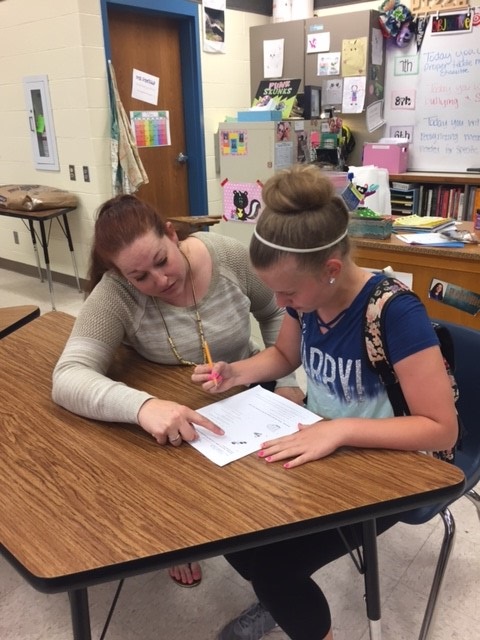
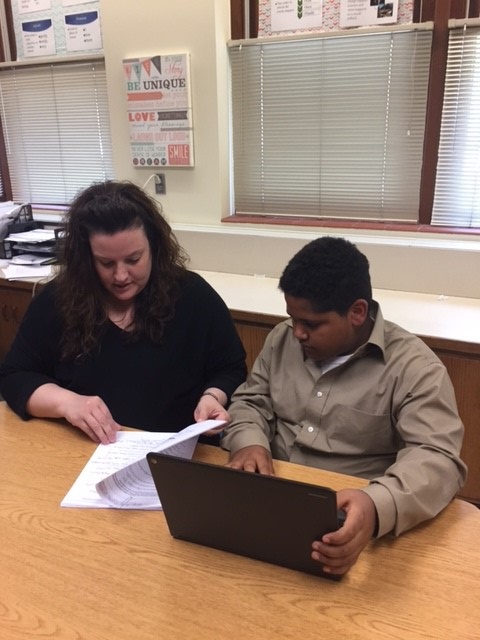
Staying after school can be rewarding for some students. That’s proven by the success of the Boys & Girls Club’s Power Hour program at Park Middle School.
Power Hour is a core after-school program of Boys & Girls Club of Lincoln/Lancaster County, serving any of its 1,400 members who participate at no cost. More than 550 of the approximately 800 Park Middle School students participate each school year.
A $20,000 grant from Lincoln Community Foundation supported the staffing of Power Hour with Park Middle School teachers. They reinforce learning concepts taught during the school day, and use fun and educationally-redeeming programs to incentivize students to keep up regular, daily attendance.
“The results are tremendous,” says Kevin Sander, the Boys & Girls Club executive director. “Club members have seen a significant increase in test scores since the Power Hour was implemented three years ago.” In one case, a student’s individual scores improved by 20% over the prior year.
“Power Hour is a great way for students to get structured time to work on their homework,” says teacher Andrea Silver. “It’s also an opportunity for them to ask a teacher for one-on-one help. I’ve seen many of my students develop stronger time management skills and a deeper understanding of the material they’re assigned.”
Achieving academic success before transitioning to high school helps at-risk youth reach their full potential as productive, caring and responsible citizens. Power Hour also gives students the opportunity to apply learning to everyday situations to achieve success in their future careers.
Uncommon Facts about Charitable Deductions
Published on Nov 15, 2019On the surface, charitable income tax deductions seem similarly straightforward. Many donors believe it is common knowledge that when a person makes a contribution to a school, house of worship, or any qualified charitable organization, the donor can take a charitable income tax deduction if they itemize on their federal income tax return. However, there are subtleties. In particular, potential donors must keep in mind the rules for substantiating and valuing charitable gifts if they intend to deduct their charitable contribution.
The Do’s and Don’ts of Charitable Deduction Substantiation
When considering the deductibility of a charitable donation, we can simply turn to the Internal Revenue Code (IRC) to find a definitive source of “do’s and don’ts.” IRC §170 states the general rule: “There shall be allowed as a deduction any charitable contribution (as defined in subsection (c)) payment of which is made within the taxable year.”[i] In other words, a taxpayer who makes a contribution to a qualified charity can deduct the gift in the year in which it is made.
The two basic requirements that all donors must meet in order to claim a charitable income tax deduction are:
• Determine the fair market value of the property donated to the charity.
• Retain documentation to substantiate the donation (as prescribed in the Treasury regulations as maintaining adequate records to substantiate the gift).[ii]
Next, we are going to focus on the second requirement—substantiation.
Substantiating a Gift
It is common knowledge that taxpayers must maintain records related to their taxes, so it shouldn’t surprise donors that a gift to charity must be substantiated with a record of the contribution.[iii] This record can be:
• a cancelled check
• an electronic fund transfer receipt from a financial institution
• a receipt or written letter from the charitable organization showing the donee name, the date, and the amount of the contribution
• some other reliable written record showing the same information[iv]
If a receipt from the charity is impractical (such as for a donation made at a charity drop-box), the taxpayer must keep a reliable written record (including all information required in the regulations) of each item donated.[v]
A Gift of $250 or More
If the donation is $250 or more, the Code requires a “contemporaneous written acknowledgment” (CWA).[vi] The Ninth Circuit Court of Appeals noted that this requirement is placed directly on the taxpayer seeking the deduction, not on the charity.[vii] A CWA is considered contemporaneous if the donor obtains it before the earlier of (1) the filing of the donor’s tax return, or (2) the due date of the donor’s tax return in the year in which the charitable donation was made.[viii] If the taxpayer files an extension, extensions are included.[ix]
A Gift of $500 to $5,000
As charitable donations increase in value, the IRS requires additional information in order to allow the taxpayer to deduct the donation. For gifts of property over $500 but not more than $5,000, the taxpayer must use IRS Form 8283 to include a description of the donated property with the federal income tax return.[x]
A Gift of $5,000 or More
For a gift of property worth $5,000 or more (other than cash or publicly traded securities, which never require a qualified appraisal), the taxpayer must obtain a qualified appraisal and include the appraisal summary with the tax return.[xi] If the donation is non-publicly traded stock, certain publicly traded securities, or a contribution by a C corporation, the donor must maintain additional records.[xii] However, publicly traded stock that exceeds $5,000 but is less than $10,000 and non-publicly traded stock with a value less than $10,000 do not need a qualified appraisal.[xiii]
The taxpayer making a gift over $5,000 must also maintain the general substantiation records required by Treas. Reg. §1.170A-13(b)(2)(ii):
•The name and address of the donee organization
•The date and location of the contribution
•A description of the property in reasonable detail (descriptions of securities must include the name of the issuer, the type of security, whether the stock is publicly traded, and where it is traded)
• The fair market value (FMV) of the property at the time of the contribution and how this FMV was determined
• The basis of the property, if the contribution involved certain ordinary income and capital gain property (see IRC 170(e))
A Gift of $500,000 or More
For a charitable donation of $500,000 or more, the taxpayer must attach a copy of a qualified appraisal (not just an appraisal summary) to the income tax return for that year.[xiv]
Note: Certain charitable gifts are not usually deductible, including:
· Volunteer time (work not done as a professional service)
· Donations to foreign charitable organizations
· Donations made specifically for the benefit of an individual or small group of friends
· Donations made in a quid pro quo manner, where the donor receives something of value in return from the charity
The Ins and Outs of Qualified Appraisals
Viewers of the TV show Antiques Roadshow know that the best way to determine an item's approximate value is for an expert to appraise it. For tax items, though, appraisals aren’t necessarily common knowledge, since the IRC only requires them for gifts above $5,000. However, for donors who reach that threshold, the IRC has a number of specific requirements for a gift appraisal to qualify a gift for a charitable deduction.
Qualified Appraisals
According to Treasury Regulations, a “qualified appraisal” is an appraisal document that is not more than 60 days old, done by a qualified appraiser, includes the required information, and does not involve a prohibited fee.[xv] It must be conducted in accordance with generally accepted appraisal standards and should assess value as of the proposed date of the gift.[xvi] The required appraisal information includes:[xvii]
• A sufficiently detailed description of the property
• The physical condition of any tangible property
• The contribution date (or expected date)
• The terms of any agreement or understanding that restricts or reserves rights to or use of the property
• The name, address, and other identifying information and/or the identifying number of the qualified appraiser
• The appraiser’s qualifications, including background, experience, education, and professional association membership (if any)
• A statement that the appraisal was prepared for income tax purposes
• The date(s) on which the property was appraised
• The appraised fair market value (see Treas. Reg. §1.170A-1 (c)(2)) of the property on the date (or expected date) of contribution
• The method of valuation used to determine the FMV
• The specific basis for the valuation
Qualified Appraisers
The IRC defines a qualified appraiser as someone who: [xviii]
1. Has earned an appraisal designation from a recognized professional appraiser organization or has otherwise met minimum education and experience requirements
2. Regularly performs appraisals for which the individual receives compensation
3. Meets any other requirements prescribed by the Secretary in regulations or other guidance
4. Demonstrates verifiable education and experience in valuing the type of property subject to appraisal
5. Has not been prohibited from practicing before the IRS by the Secretary at any time during the three-year period ending on the date of the appraisal
Specifically excluded from this list are the donor or taxpayer who wants to claim the deduction, as well as any relative or employee of the donor, [xix] any person party to the transaction in which the donor acquired the property (unless the property is donated within two months of acquisition for an amount that does not exceed the acquisition price),[xx] or anyone who regularly performs appraisals for one of these excluded parties and who does not perform a majority of their appraisals for other people.[xxi]
Appraisal Summaries
While the taxpayer must attach the actual appraisal when deducting a gift over $500,000, for gifts from $5,000 to $500,000, only an appraisal summary is required. This summary is an IRS form signed and dated by both the donee and the appraiser that includes:
• The donor’s name and taxpayer identification number (Social Security number for individuals, employer identification number for partnerships or corporations)
• The donee’s name, address, and taxpayer identification number
• The date the donee received the property
• A description of the property (detail must be such that a person who is not generally familiar with the type of property can ascertain that the appraised property is the contributed property)
• A brief summary of the overall physical condition of the tangible property at the time of the contribution
• The manner of acquisition (e.g., purchase, exchange, gift, or bequest)
• The date the donor acquired the property (or the date the property was created, produced or manufactured by or for the donor)
• The cost or other basis of the property, adjusted as provided by IRC §1016
• A statement explaining whether the charitable contribution was made by means of a bargain sale and the amount of any consideration received from the donee for the contribution
• The name, address, and identifying number (if a taxpayer identification number is otherwise required by IRC §6109 and the regulations thereunder) of the qualified appraiser who signs the appraisal summary and of other persons as required
• The appraised fair market value of the property on the date of contribution
•Any other information required on the appraisal summary form[xxii]
Furthermore, the appraisal summary must contain a declaration by the appraiser that he or she is qualified, is not prohibited from performing the appraisal, understands the civil penalties for overstating the valuation,[xxiii] did not charge a prohibited type of fee, and is not currently having his or her appraisals disregarded pursuant to 31 U.S.C. 330(c) on the date he or she signed the appraisal summary. [xxiv]
Common Knowledge vs. Knowledge of Subtleties
Donors understand the advantages of taking a charitable income tax deduction, but to be successful hinges on following every detail prescribed in federal tax law.
Knowledgeable financial professionals can provide an essential service by guiding donors to properly substantiate their gifts according to the law. Understanding and applying these subtleties will help donors achieve a successful, properly deductible charitable donation.
[i] IRC §170(a)(1).
[ii] Treas. Reg. §1.170A-13(a)(1).
[iii] Id.
[iv] Id.
[v] Treas. Reg. 1.170A-13(b)(1)(iii) and (b)(2)(ii).
[vi] IRC 170(f)(8)(A).
[vii] Addis v. Commissioner of Internal Revenue, 374 F3d 881 (9th Cir. 2004).
[viii] IRC §170(f)(8)(C).
[ix] IRC §170(f)(8)(C)(ii).
[x] IRC §170(f)(11)(B).
[xi] Treas. Reg. §1.170A-13(c)(2)(i)(B).
[xii] Treas. Reg. §1.170A-13(c)(2)(ii).
[xiii] Treas. Reg. §1.170A-13(c)(2)(ii)(A).
[xiv] IRC §170(f)(11)(D).
[xv] Treas. Reg. §1.170A-13(c)(3).
[xvi] IRC §170(f)(11)(E) and Treas. Reg. §25.2512-3.
[xvii] Treas. Reg. 1.170A-13(c)(3)(ii).
[xviii] IRC §170(f)(11)(E)(ii).
[xix] Treas. Reg. §1.170A-13(c)(5)(iv).
[xx] Treas. Reg. §1.170A-13(c)(5)(iv)(B).
[xxi] Treas. Reg. §1.170A-13(c)(5)(iv)(D).
[xxii] Treas. Reg. §1.170A-13(c)(4)(i)(A)-(D).
[xxiii] Treas. Reg. §1.170A-13(c)(5)(i)(D).
[xxiv] Treas. Reg. §1.170A-13(c)(4).
Stretching $1.00 into Three Meals
Published on Jul 26, 2017
Perched at the very top of the 2017 Give to Lincoln Day leaderboard is the name of a cause loved by many in our community. The Food Bank of Lincoln collaborates with more than 20 nonprofit partners who also participated in Give to Lincoln Day. All of that generous giving benefits our community.
“It would be difficult to overstate the importance of Give to Lincoln Day’s impact on the nonprofits involved or the impact on our community,” says Scott Young, Executive Director of the Food Bank of Lincoln. “Give to Lincoln Day provides agencies a chance for a ‘second’ season of giving. Many nonprofits depend on the November and December holidays to make up the bulk of their annual fundraising, so a giving opportunity in late May is extremely timely.”
The mission of the Food Bank is to alleviate hunger in Southeast Nebraska. The organization pursues funds year-round to support its agency network, Mobile Pantry and Child Hunger programs, and SNAP (Food Stamp) Outreach efforts. Thanks to a combination of bulk buying power and efficient operations, they are able to connect people to three meals for every dollar that comes in the door.
Food Bank of Lincoln was a Top 5 recipient during last year’s Give to Lincoln Day, raising $97,315. This year, a Food Bank donor’s $10,000 matching gift and promotions to their ongoing supporters gave them a very strong boost. Young says more people are aware of the 24-hour Give to Lincoln Day and hold back their gifts until then.
Dollars raised through Give to Lincoln Day help ensure the Food Bank’s productive summer, which is its highest need time of year. Families with kids cannot rely on the schools for breakfasts and lunches. The 2017 Give to Lincoln Day funds totaling $154,563.90 (which includes its proportional share of the $350,000 match funds) will provide for approximately 463,691 meals – the equivalent of 5,095 meals a day for July, August and September.
Give to Lincoln Day raised a record-setting $3,693,307 in its sixth year. Since 2012, more than $16 million has been generously given by thousands of donors to help local nonprofits provide needed services and improve our great city. Mark your calendar – next year’s day of charitable giving will be May 31, 2018.
Clinic with a Heart creates connections and healthy outcomes
Published on Mar 7, 2018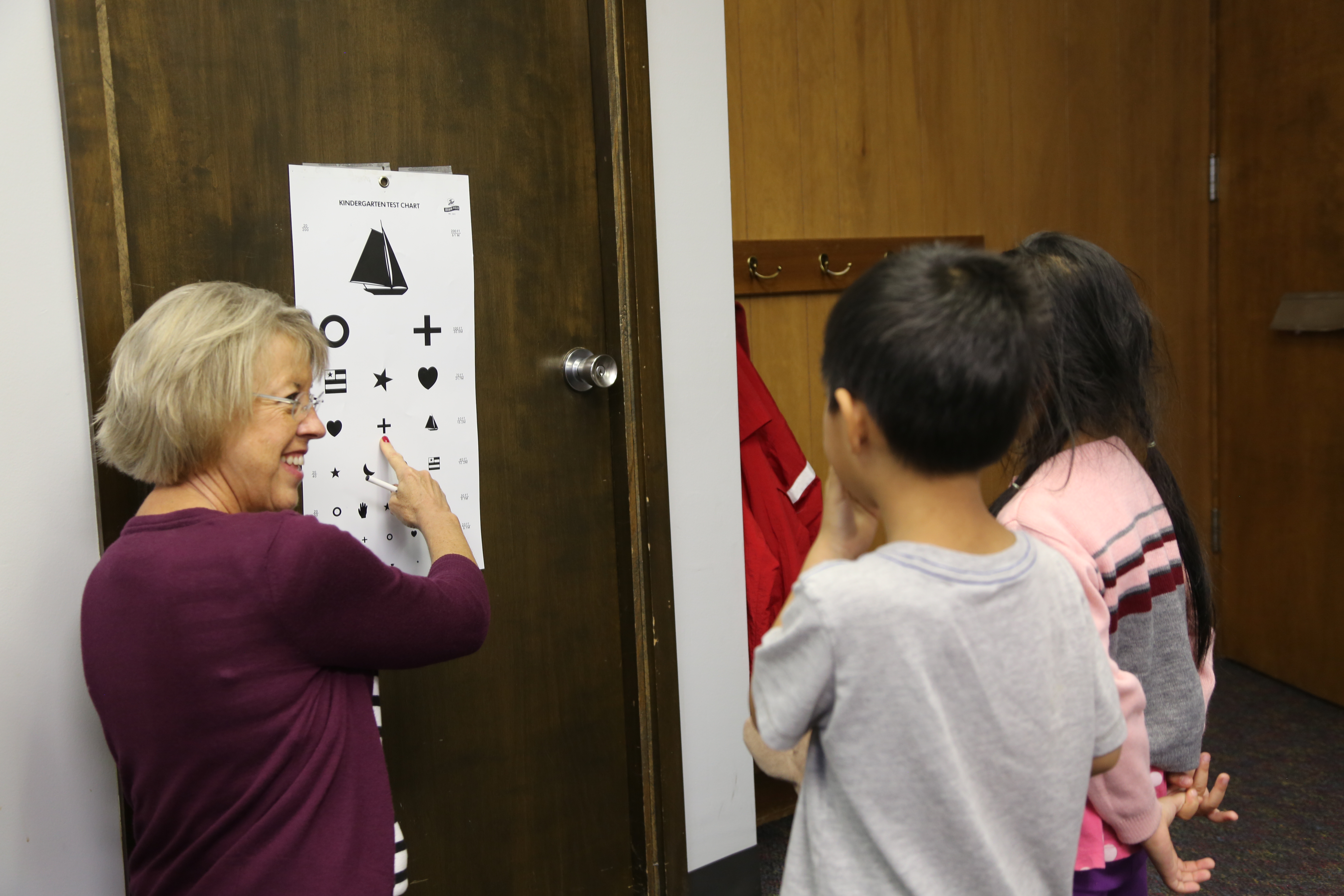
Clinic with a Heart is just that: a medical clinic with heart. In addition to providing free medical care, the organization helps to offer hope to people in need.
In 2016, Clinic with a Heart received a $10,000 grant from the Lincoln Community Foundation to pay for general operating costs.
Thanks to that grant, last year, Clinic with a Heart provided over 3,000 healthcare visits where 93% of patients did not have health insurance. Over the last 15 years, Clinic with a Heart has provided not only medical clinics, but their services have grown to include dental, vision, physical therapy, chiropractic care, hearing screenings, and mental health assessments.
Clinic with a Heart’s free clinics are fueled by volunteer nurses, doctors, physical therapists, dentists and other health professionals. In 2017, 636 volunteers donated nearly 11,000 hours to patient care.
“We wouldn’t be able to make free healthcare happen without our incredible volunteers,” said Angela Boule, Clinic with a Heart’s Director of Development. “And most of our volunteers have never lived in poverty where most of our patients do. When everyone is in a room together, barriers start to break down. It’s not just a healthcare clinic; it’s creating connections that might not otherwise happen.”
On top of regularly scheduled clinics, Clinic with a Heart offers specialized services for people with diabetes, chronic hypertension and orthopedic issues. If patients have health problems outside of the scope of Clinic with a Heart’s services, they’re referred to other healthcare organizations in Lincoln to continue their care.
Among Clinic with a Heart core objectives is creating a healthier Lincoln. Lincoln Community Foundation is pleased to support the mission of an organization that makes such a difference in the health of so many in our community.
Lincoln Community Foundation announces retirement of President Barbara Bartle
Published on Jun 14, 2021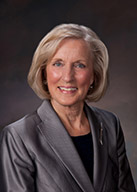 The Lincoln Community Foundation announced Barbara Bartle will retire at year’s end. Barbara was named President of the Lincoln Community Foundation (LCF) in 2010. Under her leadership, LCF has grown substantially, initiating significant programs which have increased philanthropy in the community while creating new partnerships with government, business, nonprofits, and neighborhoods. Barbara’s notable career spans 48 years of fundraising, program development, community engagement, and teaching.
The Lincoln Community Foundation announced Barbara Bartle will retire at year’s end. Barbara was named President of the Lincoln Community Foundation (LCF) in 2010. Under her leadership, LCF has grown substantially, initiating significant programs which have increased philanthropy in the community while creating new partnerships with government, business, nonprofits, and neighborhoods. Barbara’s notable career spans 48 years of fundraising, program development, community engagement, and teaching.
For more than 65 years, the mission of LCF has been to provide leadership and resources to help build a great city. A few of the many accomplishments under Barbara’s leadership the past 11 years include:
- • The number of donor funds more than quadrupled
- • Assets grew from $62 million to $175 million
- • Annual grants to the community grew from $4 million to more than $21 million
- • Give To Lincoln Day raised more than $40 million for hundreds of nonprofits
- • Lincoln Littles Giving Day raised more than $2.4 million to help children from lower-income families with early childhood education
- • Lincoln COVID-19 Response Fund raised more than $1.2 million to assist 66 nonprofits serving the most vulnerable populations
- • First Community Land Trust in Nebraska was established in Lincoln to address affordable housing
- • From Veterans initiatives to Lincoln Vital Signs and Prosper Lincoln, there have been multiple community building efforts to guide Lincoln’s vision toward a stronger, more diverse, and more innovative community.
Barbara’s leadership, through her impact on the many organizations she has served, has been recognized with numerous awards. Some of those include the Association of Fundraising Professionals Nebraska Chapter Fundraising Hall of Fame, Lincoln Journal Star’s Inspire Awards’ Woman of the Year, Spirit of United Way Award, and the Grace Abbott Award honoring her advocacy for children and families in Nebraska.
“We have been so fortunate to have Barbara Bartle at the helm of Lincoln Community Foundation for the past 11 years,” said Foundation Board Chair, Kim M. Robak. “She immediately set out to form the best staff, surrounding herself with talented, hardworking professionals. Barbara quickly connected with community foundations across the country, gathering great ideas and bringing them home. Her incredible passion and energy to raise funds and unite people together for causes that benefit Lincoln will leave a lasting legacy”.
A search for Barbara’s successor is underway. The Board of Directors of Lincoln Community Foundation is partnering with Kittleman and Associates, a national search firm focused on nonprofit CEO recruitment. Individuals wishing to learn more or apply should visit www.kittlemansearch.com.
Lincoln Community Foundation Awards $470,000 to Support 18 Local Nonprofits
Published on Aug 23, 2018The Lincoln Community Foundation distributed $470,000 in community grants to local nonprofit organizations. These grants are made possible by contributions from the Lincoln Forever Fund and from LCF donor endowment funds. Organizations that received funding include:
Lincoln Parks Foundation - $250,000
Prairie Corridor Trail from Pioneers Park to Spring Creek Prairie Audubon Center
Lincoln Parks Foundation - $50,000
Redevelopment of Rudge Park
JCMF Children’s Charities - $20,000
Float 4 Life national training facility
Boy Scouts of America, Cornhusker Council- $10,000
Scoutreach leadership program in Lincoln Community Learning Centers
CEDARS Youth Services - $25,000
Northbridge Early Childhood Development Center
Friends of Nebraska Dyslexia Association - $5,000
Star Readers program at Saratoga Elementary School
Good Neighbor Community Center - $10,000
Food Distribution Program, Pantry and Food Truck
Humanities Nebraska - $6,000
Prime Time Family Reading Program
Lincoln Bike Kitchen - $10,000
Provide refurbished bikes free to Lincoln youth
Lincoln Midwest Ballet Company - $4,000
Support for 2018 production of The Nutcracker
Malone Community Center - $10,000
Support of STEAM Program for at-risk youth
MilkWorks - $10,000
Implementation of Electronic Health Records system
Montessori School for Young Children - $5,000
Support of early childhood student scholarships
Nebraska Association of Local Health Directors - $5,000
Nebraska Veteran and Family Task Force
Nebraska Jazz Orchestra- $5,000
Educational Outreach Program
Tabitha Inc. - $25,000
Comprehensive Workforce Development Program
VolunteerLinc - $10,000
Emergency Management Volunteer Program
Willard Community Center - $10,000
General operating support
The Lincoln Community Foundation, established in 1955, strives to continually enrich the Lincoln community by promoting and achieving perpetual philanthropic support. The foundation currently manages $135 million in assets and has distributed more than $117 million in grants to nonprofit organizations that have improved the lives of thousands of residents.
CASA Adds Second Layer of Support
Published on Dec 19, 2018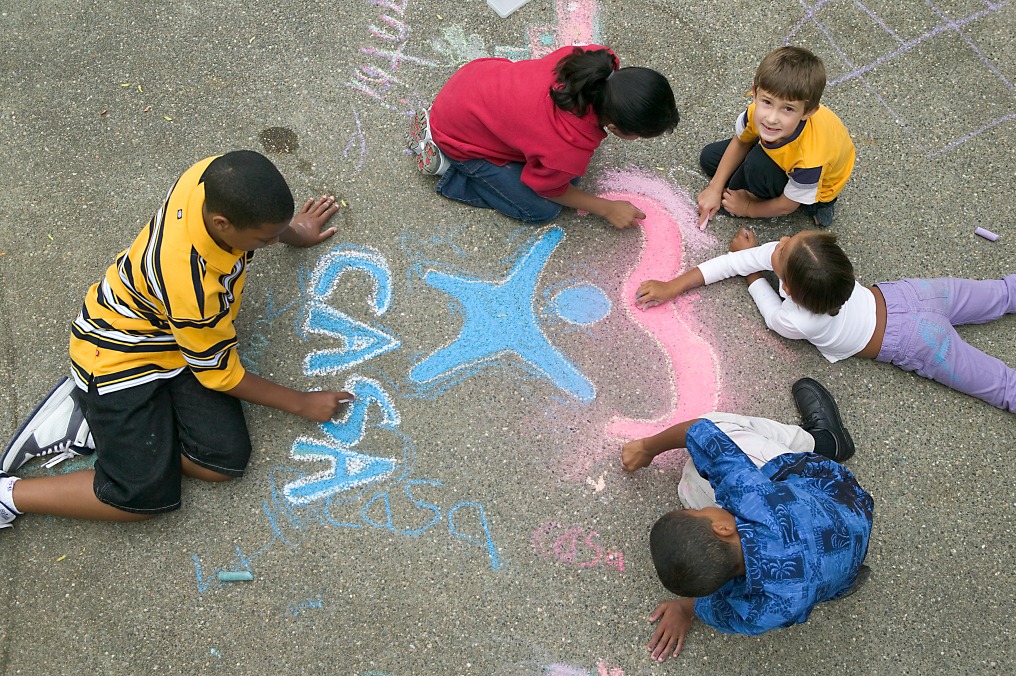
Every child needs an advocate. For many children in Lancaster County, their advocate is not a parent, but a volunteer from CASA (Court Appointed Special Advocate). These volunteers provide the consistent emotional support for an abused or neglected child as their case moves through the legal system. Being a CASA volunteer isn’t easy. CASA noticed the need for new volunteers to have their own mentor, someone to ask questions and give advice on cases. The result of this is CASA Peer Coordinator Program.
Wanting to make sure every volunteer was confident in their advocacy, CASA developed the Peer Coordinator program. Even though every CASA volunteer receives extensive training they are highly specialized, this does not guarantee the volunteer will know the best practice for every situation. This program allows for experienced volunteers to act as a mentor for new volunteers, allowing them to ask questions and better their skills as an advocate. The assistance helps smooth over the transition from training to practice.
Lincoln Community Foundation provided a grant to financially assist with recruiting and training for volunteers. “This program is vitally important to our ability to continue to grow the number of children we serve while doing so in the most cost-effective manner possible,” said Dawn Rockey, Executive Director of CASA for Lancaster County. “We have found that through this additional support we are retaining more of our new volunteer advocates than in prior years.”
CASA volunteers act as a voice for a child who can’t use their own. Through the Peer Coordinator program, volunteers now have their own support system, allowing them to confidently advocate, knowing they have someone in their corner.
Lincoln Community Foundation Awards $204,150 to Support 15 Local Nonprofits
Published on Feb 22, 2019Lincoln Community Foundation Awards $204,150 to Support 15 Local Nonprofits
The Lincoln Community Foundation distributed $204,150 in community grants to local nonprofit organizations. These grants are made possible by contributions from the Lincoln Forever Fund and from LCF donor endowment funds. Organizations that received funding include:
Big Brothers Big Sisters Lincoln - $10,000
Smart Start initiative for ages 5-8 and other mentoring programming
Boys and Girls Club of Lincoln/Lancaster County - $15,000
New club at Lincoln North Star High School and support for the Park Middle School club
Cause Collective - $45,000
Network for Good JumpStart Fundraising program for cohort of local nonprofits
CenterPointe - $11,150
Training and consultation with a Dialectical Behavior Therapy trainer to address suicide in the community
City Impact - $10,000
Expansion of the Impact Reading Program in Title I schools
City of Lincoln – Parks & Recreation Department - $15,000
Fitness and nutrition pilot program at F Street Community Center for 3- and 4-year-olds and their caregivers in the South of Downtown neighborhood
RISE - $10,000
Implementation of the CEO of Your New Life program at the Lincoln Correctional Center
Food Bank of Lincoln - $17,500
Bridges Out of Poverty program support
Foundation for Lincoln City Libraries - $10,000
Begin with Books program to promote early childhood literacy
HUB – Central Access Point for Young Adults - $10,000
Support to help underserved young adults transitioning to adulthood
Lincoln Children’s Museum - $10,000
Renovation of the main floor lobby for better security
Lutheran Family Services of Nebraska - $12,500
Children’s Behavioral Health Program support for direct therapy delivery and specialized training for therapists
LUX Center for the Arts - $8,000
Artist-in-Residence position support
Nebraska Association of Former State Legislators - $10,000
State Capitol courtyard landscaping project
Rabble Mill - $10,000
All-Access Pass program support for passes for at-risk youth
The Lincoln Community Foundation, established in 1955, strives to continually enrich the Lincoln community by promoting and achieving perpetual philanthropic support. The foundation currently manages $127 million in assets and has distributed more than $130 million in grants to nonprofit organizations that have improved the lives of thousands of residents.
Nebraska Gold Star Families Memorial Monument
Published on Sep 22, 2017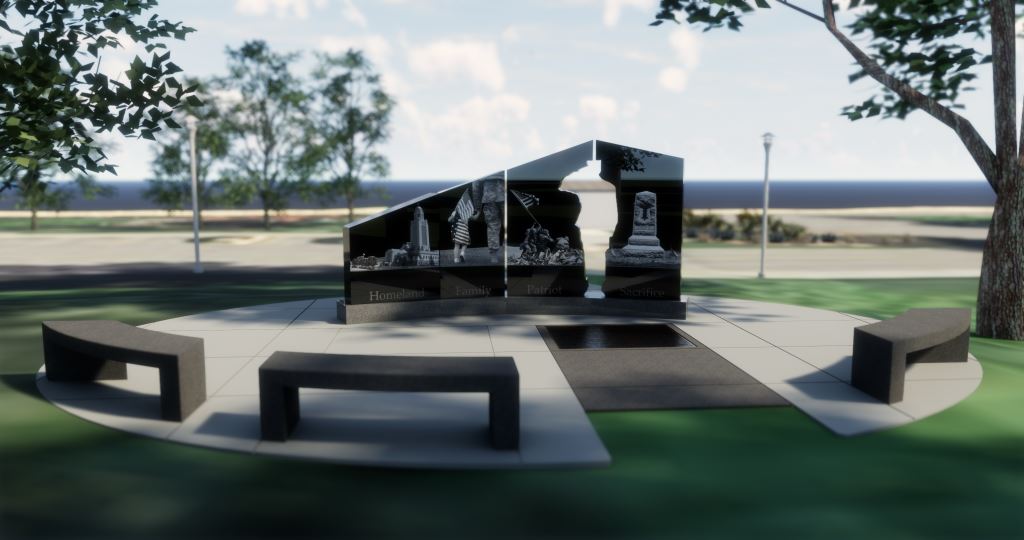
A new monument in honor of Gold Star Families was unveiled on Sunday, September 24 at 1 pm at Antelope Park, 1650 Memorial Dr., in Lincoln. The monument was a gift to Nebraska in its Sesquicentennial year, honoring all families who have lost loved ones in the U.S. Armed Forces in the past 150 years.
Hershel “Woody” Williams, who helps to make these monuments possible, is the last living medal of honor recipient for his service at Iwo Jima. His foundation’s mission is to have a Gold Star Families Memorial Monument in every state. The Nebraska monument was the 23rd to be dedicated. Williams spoke at the dedication.
“No one has sacrificed more for Nebraska in the past 150 years than our fallen military,” said Barbara Bartle, President of the Lincoln Community Foundation. “This monument is a beautiful tribute to honor the Gold Star Families who continue to endure their loss.”
The Nebraska Gold Star Families Memorial Monument was funded by Lincoln Community Foundation, Hershel “Woody” Williams Medal of Honor Foundation, The City of Lincoln, The Clark Enersen Partners, Nebraska Gold Star Wives – Omaha Chapter, Rixstine Recognition and Sampson Construction Company, Inc.
The read about the symbolism of the monument, click here.
A Jumpstart to Serving the Community
Published on Aug 30, 2021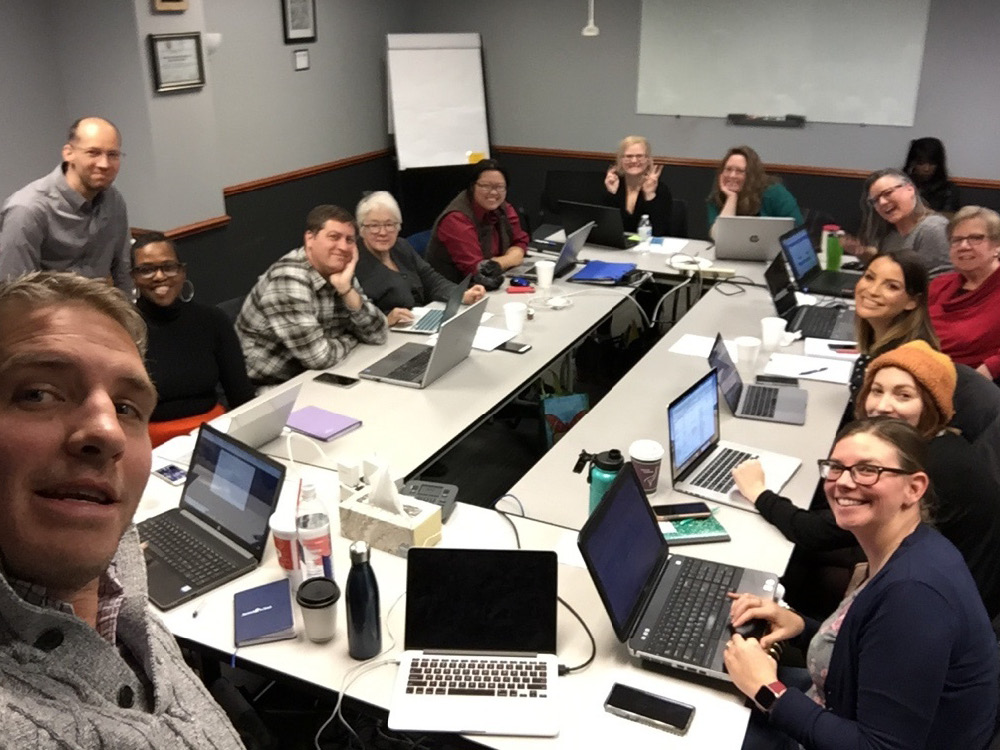
Growing nonprofits can face many challenges when it comes to fundraising. Many report that they lack the infrastructure to acquire, attain and upgrade donors. Health, economic and social crises have further taxed local nonprofits and the vulnerable communities they serve. With the shared goal of building capacity and sustainability within Lincoln’s nonprofit community, Lincoln Community Foundation, Network for Good (NFG) and Cause Collective partnered to bring NFG’s fundraising capacity building program, Jumpstart, to Lincoln nonprofits.
Network for Good approached LCF with the Jumpstart program in early 2019. Funding from the John and Catherine Angle Fund over two years was designated to help nonprofits improve their capacity, sustainability, and governance. Two cohorts of nonprofits participated in the program between 2019-2021.
Jumpstart’s fundraising platform and content management system was designed by NFG and provides integrated tools, coaching, and technology to nonprofits to build their fundraising capacity and sustain their programs.
In addition to the platform, the program provided a cohort of 8-10 agencies with one year of free software, fundraising coaching, and quarterly meetings facilitated by Cause Collective to share learning among the participants.
Before Jumpstart, members of the cohort used multiple methods to record their fundraising efforts and track donors.
“It was a bit of a free-for-all,” said Jason Varga, executive director of Cause Collective. “Some agencies were using software that was cumbersome and twice as expensive. Some were using large spreadsheets. Some were using nothing at all.”
The results for many of the participating agencies were noticeable. Jumpstart tracked the fundraising of each agency with the software to compare those numbers to their previous fundraising campaigns. Almost every agency experienced a substantial increase in its fundraising totals. Two years since the initial pilot program, Jason believes the effect for the nonprofits has been positive.
“Agencies that still use the software are finding new ways to grow their fundraising, make processes more efficient, and properly thank their donors,” he said.
The nonprofits who participated in the cohort agreed.
“I have learned so much in the last year through the Jumpstart program. Not only is the software user-friendly, but it also has many helpful features and tools that made our job easier,” said Destiny Burkett, development director at Lincoln-Lancaster Child Advocacy Center. “Add to all of that the coaching that I received, and I can honestly say that it was a year that has been a huge benefit to our organization and fundraising capabilities.”
Altogether, the 2020-2021 cohort leveraged the grant from LCF into $282,697 in net new revenue for participating nonprofits.
“This would not have happened without LCF,” said Varga. “Their funding made this work.”
Guiding Children, Creating Positive Futures
Published on Apr 20, 2018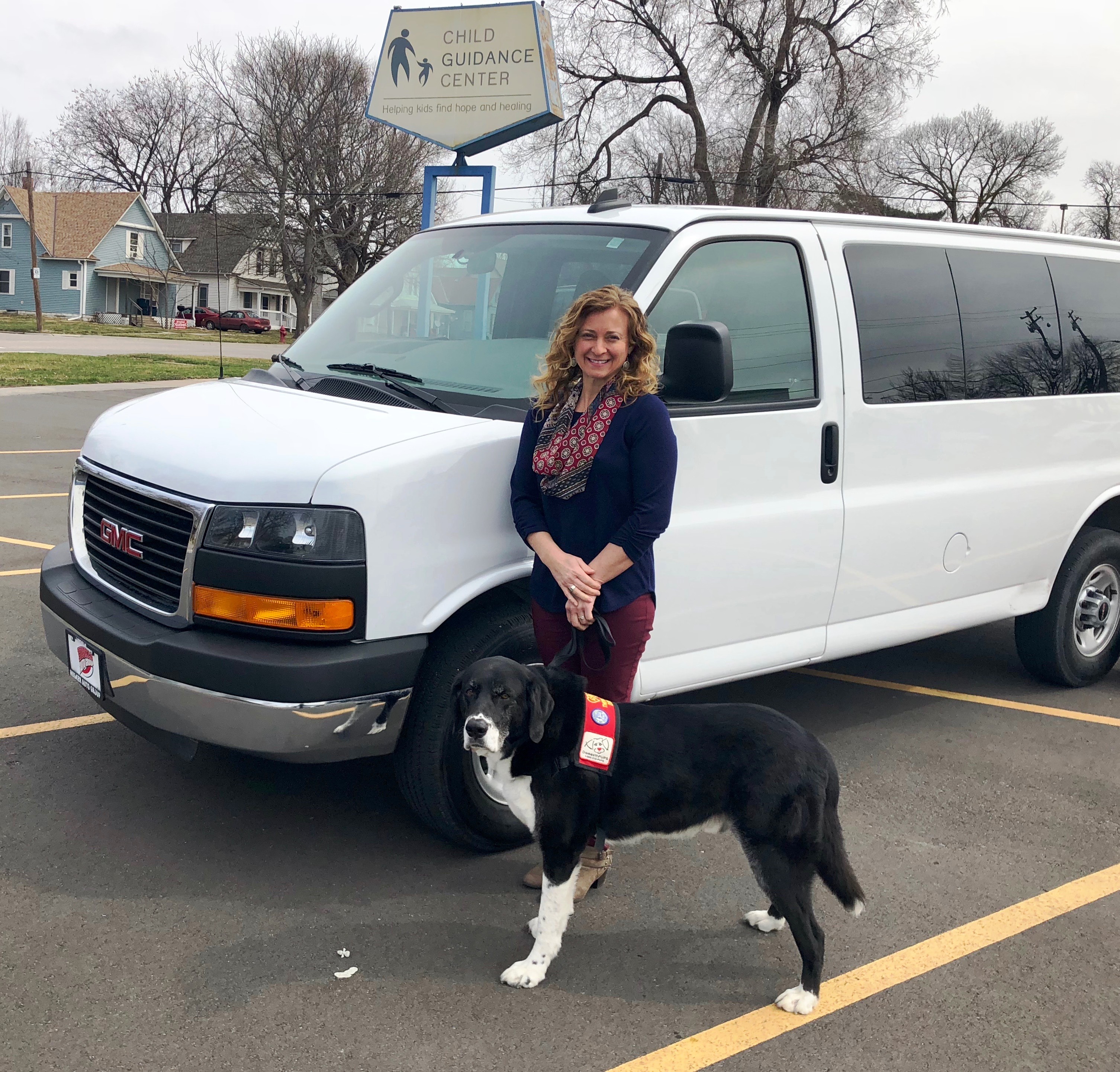
CGC understands that therapy with children is a dynamic process that requires an understanding of their unique qualities and experiences. They incorporate this philosophy into everything they do, providing comprehensive behavioral and mental health services.
Child Guidance Center (CGC) was started in 1949 to provide individual, group, and family therapy services for the Lincoln community. Last year, they served nearly 1,700 children and families.
In 2015, Jenny Cardwell, CGC’s Development Director, and other members of the leadership team noticed how badly they needed a new set of passenger vans. Despite being taken in for regular check-ups and maintenance, the vans they were using were 14 years old and beginning to show their age. These vans are critical as they transport children to and from school, CGC services, and other important appointments.
“Without these vans, children wouldn’t have a safe mode of transportation to and from important appointments and services,” Cardwell said.
In 2016, CGC received $20,000 from the Lincoln Community Foundation to help replace their 15-passenger vans. One van is being used for the Therapeutic Group Home, which provides specialized therapy for young men. The other van is being used for CGC’s Extended Day Treatment Program, which provides intensive therapeutic after-school and summer programming for children ages 5-12 with serious emotional and behavioral difficulties.
CGC offers a variety of programs tailored to the needs of children and their families. They provide counseling services in 16 of Lincoln’s public schools, and they predominantly serve low-income families. They will never turn someone away if they’re in need.
“Even if someone doesn’t have Medicaid or doesn’t have the money for a co-pay, we will still provide treatment,” said Cardwell.
Nearly 70 years ago, CGC was the first organization in Lincoln dedicated to meeting the mental health needs of children. They’ve been proudly wearing that badge ever since.
Training Mixed with Treatment Creates Confidence
Published on Apr 20, 2018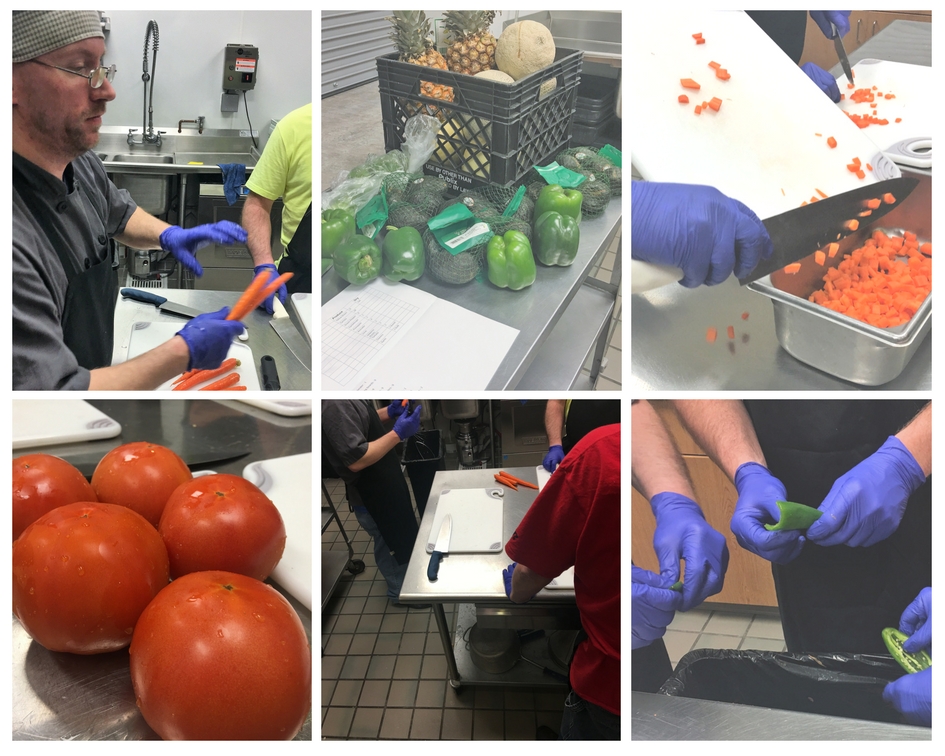
“It may not be easy, but it will be worth it.” That’s a guiding principle of The Bridge Behavioral Health. For more than thirty years, the nonprofit agency has provided emergency, long and short-term substance use treatment services for residents of Lincoln and surrounding counties. The Bridge offers a wide range of services including withdrawal services, treatment, and recovery support in addition to addressing trauma and mental health issues.
The Bridge knows that its mission isn’t just about getting help for a substance use disorder, but providing clients with life skills. One of those skills, which can also serve as a vocational skill, is how to prepare food in a commercial kitchen.
With the help of a grant from Lincoln Community Foundation, The Bridge is offering a non-credit hands-on culinary introduction class for men in their residential treatment program, with the opportunity to test for a food handler’s permit. Jeremy Brown, the instructor for the class stated, “The clients that completed this class learned many new things and realized that they can do something they didn’t think they could.”
The culinary classes have provided a space and environment for the men to open up. “It’s always nice seeing the look of satisfaction on their faces.” Jeremy said, “I often have clients asking ‘How do I get in the cooking class?’”
The Bridge is helping clients prepare for life outside treatment by providing them with skills allowing more options for employment, and giving them the cinfidence needed to cross the bridge from addiction to recovery.
2017 Annual Report
Published on May 10, 2018El Centro de las Americas
Published on May 22, 2017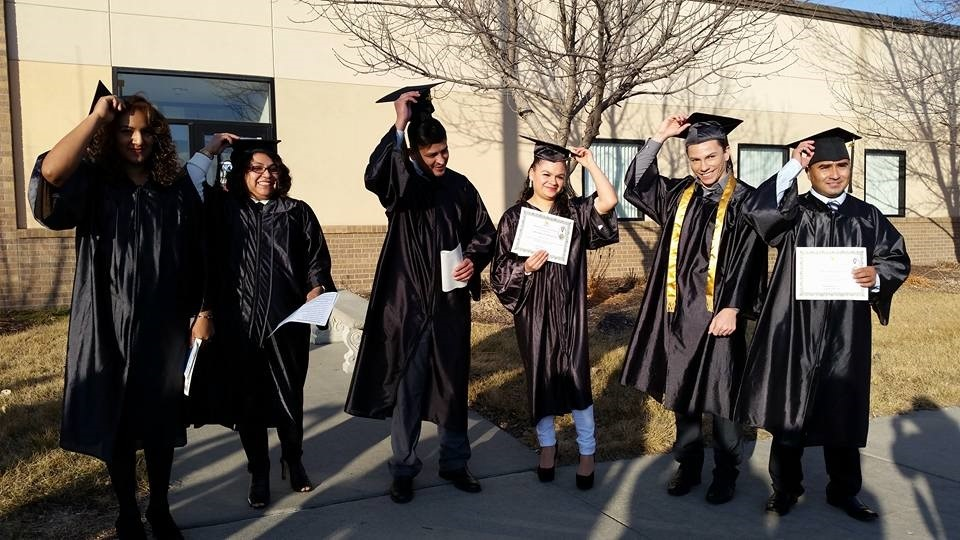
El Centro de las Americas empowers Latino families to achieve self-sufficiency, self-determination and personal growth through the provision of high quality bilingual educational, social and health services. Their Adelante Educational Program increases academic achievement through tutoring services, academic youth outreach, and GED® and English classes for Latino adolescents and young adults.
Each student has a different level of education – some do not complete elementary school in their home countries, while others drop out just before graduating. Therefore, their needs are assessed to fill in gaps before they begin the GED® curriculum.
“Lincoln Community Foundation assisted the Adelante Educational Program by providing $12,000 to cover the cost of materials used by the GED® students, such as books, calculators and practice exams,” said its executive director, Romeo Guerra. “These funds also cover the citizenship tutoring program cost, which supports clients on their path to become U.S citizens.”
Rafael, age 25, had been living in Lincoln for only two months when he came to El Centro. He had not completed high school in Brazil, but held a cosmetology license. He learned he would not be able to practice without earning a Nebraska cosmetology license. To do this, he needed his GED®. The test is not offered in his native language, Portuguese, so Rafael had to take the test either in English or Spanish, not fluent languages for him.
Within one month, Rafael passed both science and social studies exams with above average scores. He dedicated himself to his studies, coming to class daily, studying on his own and engaging with classmates. His admirable work ethic and determination paid off when he received his GED® certificate.
Rafael came back to El Centro to volunteer, teaching computer classes and helping GED® students. He is a shining example of the many immigrants who wish to make the Lincoln community their home.
LCF Announces West Gate Bank as Presenting Sponsor of Give To Lincoln Day
Published on Aug 18, 2020The Lincoln Community Foundation enthusiastically announced the continuation of West Gate Bank’s sponsorship for Give to Lincoln Day. West Gate Bank has committed to the event for the next three years as Presenting Sponsor. The 10th annual giving day is scheduled for Tuesday, May 25.
“As a locally-owned, community bank, giving back to Lincoln is such an important part of our mission,” said Carl Sjulin, President of West Gate Bank. “Our continued commitment to Give to Lincoln Day is one of the many ways we are investing back into the community in order to keep Lincoln growing and thriving. We are proud to partner with the Lincoln Community Foundation as the Presenting Sponsor for Give to Lincoln Day.”
“We are so grateful for West Gate Bank’s on-going support of Give To Lincoln Day,” said Barbara Bartle, President of Lincoln Community Foundation. “Their commitment since day one has been invaluable to the event, which many local nonprofits depend upon. We look forward to celebrating the 10th annual Give to Lincoln Day next year on Tuesday, May 25th and salute our Presenting Sponsor, West Gate Bank.”
Give to Lincoln Day was established by the Lincoln Community Foundation in 2011. The most recent giving day event in 2020 raised a record $7 million for 448 local nonprofits. The Lincoln Community Foundation strives to continually enrich the Lincoln community by promoting and achieving perpetual philanthropic support. Visit LCF.org for more information.
Keeping Lincoln Beautiful, One Park at a Time
Published on Jul 9, 2018If you spend just a few minutes outside in your neighborhood, it’s likely that the Lincoln Parks Foundation is responsible for what you see: trees, playgrounds, trails, and even sidewalks. In collaboration with the city and various neighborhood associations, Lincoln Parks Foundation preserves the beauty of our city.
“We have 128 parks, 85 playgrounds, 10 pools, 5 recreation centers, and 5 golf courses,” said Maggie Stuckey, Lincoln Parks Foundation’s executive director. “All of those amenities are part of Lincoln’s quality of life, and it’s our job to preserve, improve and update them.”
Two of those 128 parks are Breta Park and Near South Park, both of which are part of Lincoln’s Near South neighborhood. In the summer of 2016, the Lincoln Community Foundation awarded a $13,000 grant to Lincoln Parks Foundation to help renovate the parks, which were originally developed more than 20 years ago. With crumbling bricks and dying trees, what used to serve as a welcome mat for the Near South community was failing to meet the neighborhood’s expectations.
In conjunction with the Near South Neighborhood Association and the Lincoln Parks and Recreation Department, Lincoln Parks Foundation regraded the parks. They dug out dying trees and planted new ones. They reseeded the grass and replaced the bricks. And while the project is still ongoing, the changes have already been considerable.
“The before-and-after is pretty amazing,” Stuckey said. “And we’ll still be working on the project through the calendar year.”
To learn more about how Lincoln Parks Foundation is keeping Lincoln remarkably beautiful, visit www.lincolnparks.org
Lincoln Community Foundation Awards $480,000 to Support Seventeen Nonprofit Organizations
Published on Aug 24, 2017The Lincoln Community Foundation distributed $480,000 in community grants to local nonprofit organizations. These grants are made possible by contributions from the Lincoln Forever Fund and from a number of LCF donor endowment funds. Organizations that received funding include:
CASA for Lancaster County - $15,000
Peer Coordinator Program
Center for Legal Immigration Assistance - $10,000
Operating support
Center for People in Need - $20,000
English as a Second Language Classes
Child Advocacy Center - $10,000
Support services for child victims of abuse
Citizens for Improved Transit - $20,000
Bus passes for low-income individuals
City of Lincoln - $80,000
BikeLincoln Bike Share Program
Community Action Partnership of Lancaster and Saunders County - $20,000
Support for Early Head Start and Head Start Centers
Community CROPS- $10,000
Youth Community Gardens and farmer training program
Friends of Lied -$7,000
Access for early childhood programs to attend music, dance and theater performances
Friendship Home of Lincoln - $15,000
Children in Shelter Project
Heartland Big Brothers Big Sisters - $10,000
Youth mentoring program
Lincoln Children's Zoo - $200,000
Love Your Zoo Capital Campaign
LUX Center for the Arts - $8,000
Lancaster County Youth Services Artist Inside program
Partnership for Healthy Lincoln - $15,000
Student fitness and nutrition education
Planned Parenthood of the Heartland - $10,000
Reproductive education and outreach
Voices of Hope - $20,000
Advocacy and safety planning for victims of abuse
Wellbeing Initiative Inc. - $10,000
The Orchard behavioral health facility
Staff Changes at Lincoln Community Foundation
Published on Dec 6, 2018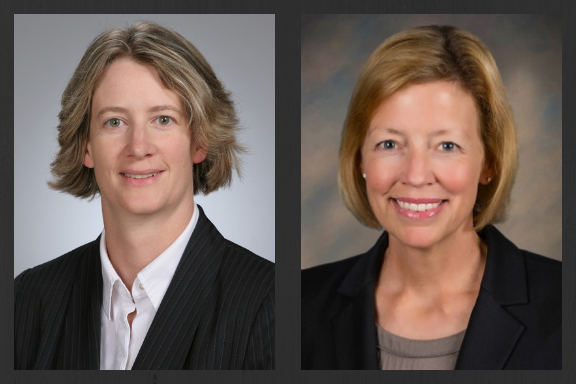
Lincoln Community Foundation announces the promotion of Michelle Paulk to Vice President for Community Outreach. For the past 8 years, Paulk has served as Program Coordinator, assisting with grants and overseeing Give to Lincoln Day. She has 17 years of experience in the nonprofit sector in the areas of database and grants management, donor relations and program administration.
Paulk is stepping into the role as Sarah Peetz retires at year end. Peetz served as VP for Community Outreach at the Foundation since 2010 overseeing grant distributions, community initiatives and fostering donor relations. To commemorate her service to the organization, LCF established the Sarah Peetz Lincoln Forever Fund to support the ever-changing needs in the community as well as opportunities and innovation.
“Sarah’s leadership at the Foundation has been integral to our successful growth to help build a wonderful community,” said Barbara Bartle, President of the Lincoln Community Foundation. “We wish her well in her retirement and look forward to Michelle carrying on this important work.”
An Incentive for Veterans with PTSD
Published on Oct 25, 2018
From left to right: Jared Baker - Veterans Court Officer, Honorable Judge John A. Colborn - Veterans Court Judge, Landon Parks - Acting Veterans Court Coordinator
When returning from a combat zone, veterans are increasingly diagnosed with mental health disorders such as post-traumatic stress disorder or traumatic brain injury. The Lancaster County District Court began seeing more of these individuals on their court docket. Lancaster County Community Corrections and the Lancaster County Attorney, along with the Lancaster County District Court, decided that rather than jail, perhaps a problem-solving court would be a better alternative.
Modeled after the highly successful problem-solving court for individuals with substance use disorders, the Lancaster County Veterans Treatment Court is meant to provide veterans and active duty military members facing felony charges with resources rather than prison.
Using funds from Lincoln Community Foundation’s Veteran Support Fund, gift cards to The Mill and Walmart are purchased and used as incentives for participants to continue making progress in the program, which includes drug testing, treatment, and individual and group therapy.
“Each week, when a veteran follows all of the conditions of Veterans Court, their name gets put in a hat and one person is drawn to receive a gift card,” said Jeff Curry, Chief Probation Officer in the Lancaster County District Court. “On weeks when all participants do well, we draw for two gift cards.”
Participants meet weekly and form bonds as a group, Curry says. With a little positive peer pressure, they encourage each other. “They really look forward to the gift cards,” he said.
Since kicking off the treatment court in April 2017, six individuals have started the program and are in varying phases of the process. Because the program takes a lot of resources, there is only room for 8-10 people at this time. The program takes one to two years to complete.
Participants must have served in a combat zone, have a mental health diagnosis or traumatic brain injury, be eligible for Veterans Administration benefits, and not have a long prior criminal history before their service. Veterans are recommended, but also volunteer to participate.
You can contribute to the Veterans Support Fund to ensure programs like these continue. Contact Sarah Peetz, VP for Community Outreach, at 402-474-2345 or sarahp@lcf.org.
New Lincoln Community Foundation Benefactors
Published on May 5, 2017The Lincoln Community Foundation is pleased to recognize our new 2016 Lincoln Benefactors. Benefactor gifts provide long-term stability for the Foundation and significant support to our local nonprofit organizations. These special people are investing in Lincoln…Forever, helping to build a strong community for future generations.
Joe and Jeanette Adams
We were very fortunate to be raised in Lincoln. After having lived out of state for over 20 years, we appreciate more than ever all that Lincoln has to offer to its families and businesses. We designed our estate plan with the hopes that our gifts to LCF will encourage and inspire our children and grandchildren to support this wonderful community for generations to come.
Dr. Michael and Susan Ferris
Lincoln has been a great city for us to raise our family and practice our professions. Our children are now grown, and we continue to love living and working here. There are so many who strengthen the future of Lincoln with their generous gifts of time, talent, and treasure.
The Lincoln Community Foundation has helped us channel our gifts to local programs that support the things we care about the most. Along the way, we believe that the more we give, the more we are blessed with to give anew.
In reviewing our estate planning, we made a commitment to support the Lincoln Community Foundation as Lincoln Benefactors. We enjoyed exploring what might be possible to make a difference for years to come. We are happy to encourage others to do the same.
Tom and Lisa Smith
We have had a great opportunity to be involved in our wonderful community during our many years in Lincoln. We have met and been able to engage with people who believe that giving back to our community enhances our lives, and the lives of future generations.
We are grateful for the work the Lincoln Community Foundation performs and believe it is the organization that can promote the best of what Lincoln can be in the future. We are hopeful that our gift, along with other gifts, can help Lincoln sustain and build on the many successes we have enjoyed while living and working in this terrific community.
Chris Whitehead
As a life-long Lincoln resident, I am deeply grateful to reside in a community where we enjoy a high quality of life. We are so fortunate to have beautiful parks, a strong school system, a stable economy and the opportunity for people and businesses to prosper. Lincoln has proven a solid and enriching community in which we raised our two daughters. As a small business owner, we are engrained in many aspects of the community. And as the community supports us, it is so important that we give back to the community.
It is my privilege to help support the efforts of the Lincoln Community Foundation, continue the stewardship of its benefactors, and join them in identifying the ideas and resources that will help impact Lincoln’s future as we continue the mission to make Lincoln a great place to live and raise families.
LCF Invests in Early Childhood Resulting in Second Dimensions Preschool Location
Published on Nov 1, 2017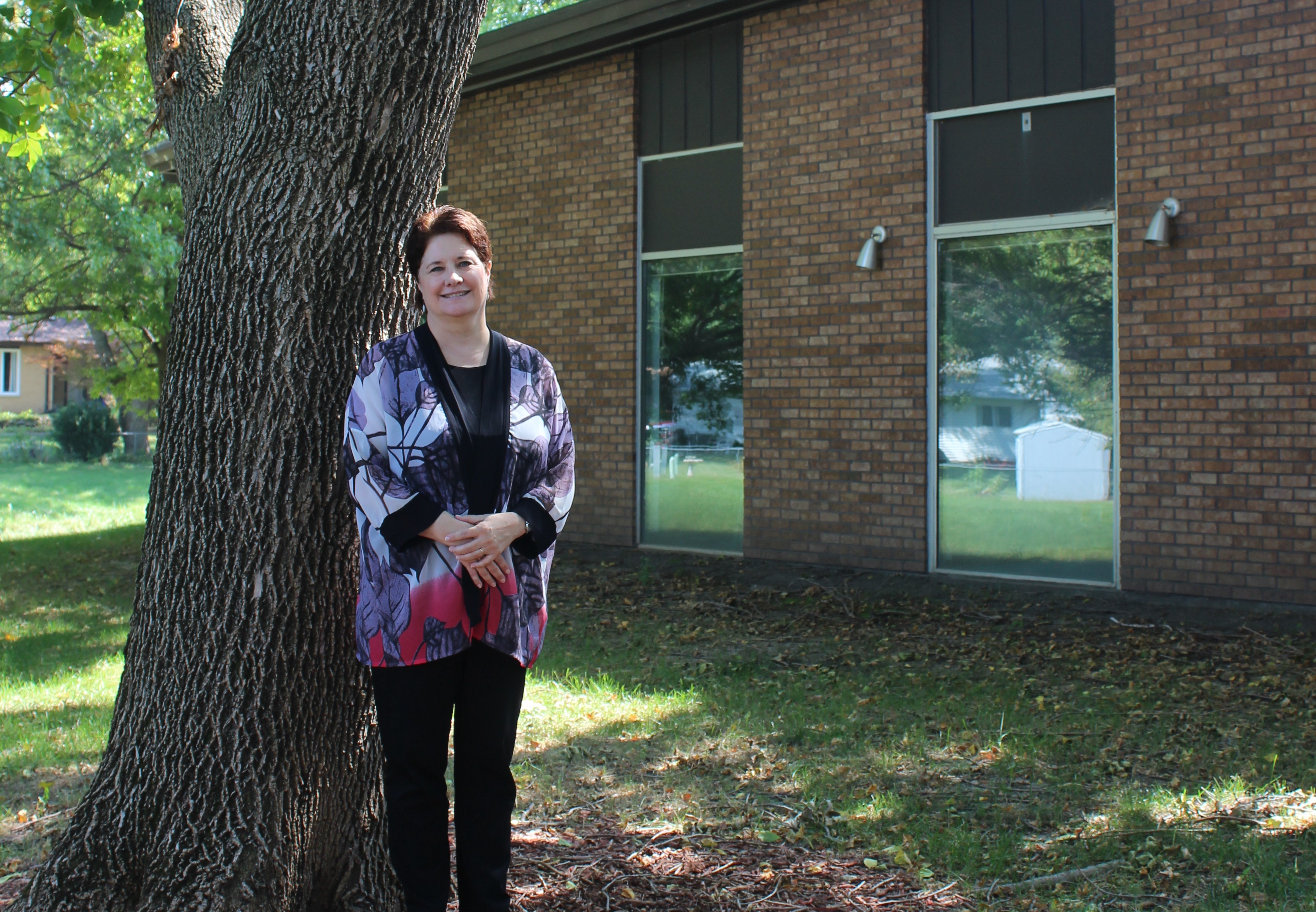
Lincoln Community Foundation has made an investment in the Dimensions Educational Research Foundation to help the organization acquire a new building. The new space, located at 7700 A Street will offer a second Dimensions Education Program location, providing quality early childhood education for 120 additional children. Approximately one-third of the placements will go to lower and moderate income families based on scholarships and a sliding fee scale.
Most of LCF’s endowment assets are invested in a diversified mix of equity funds and bonds. The Foundation has been looking for opportunities to invest a portion of the endowment locally in projects that provide a market return and also help to achieve a mission, according to Scott Lawson, LCF’s VP for Finance.
This inaugural mission investment has provided a $300,000 second mortgage loan to Dimensions for the new space. The additional site will provide 11 new, living-wage jobs. Situated near a wooded area, the preschool will include a Nature Explore outdoor classroom. Additional space is available for training staff and workshops for other early childhood center staff in Lincoln. Classrooms are scheduled to open by fall of 2018. Dimensions’ location at First Plymouth Church will continue to serve families at its current capacity.
“The Foundation has been exploring the concept of mission investment for some time,” said Barbara Bartle, President of Lincoln Community Foundation. “We are so pleased that this investment will help Lincoln’s families by providing more quality early childhood education and career opportunities for adults. It is a great way for LCF to support the Prosper Lincoln community agenda.”
“Lincoln truly has a world-class vision when it comes to early childhood education.” said Nancy Rosenow, Executive Director of Dimensions Educational Research Foundation. “Lincoln Community Foundation’s belief and investment in Dimensions is a win-win, especially for the young children in our community.”
Learn more about mission investment opportunities by contacting Scott Lawson at 402-474-2345 or scottl@lcf.org.
Nearly 1,000 Lincolnites asked to Step Up!
Published on Nov 2, 2017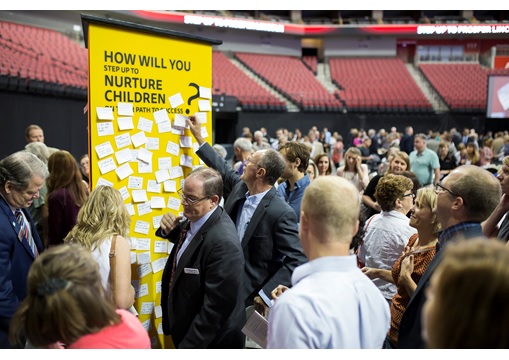
The 2017 Prosper Lincoln Summit, held Wednesday, August 23 at Pinnacle Bank Arena, attracted nearly 1,000 individuals wishing to learn more about the community agenda designed to address the issues of early childhood, employment skills and innovation and entrepreneurship.
The Summit featured the release of the latest Lincoln Vital Signs report as well as speakers who have engaged in activities that further the Prosper Lincoln Strategic Plan. Making connections was a common thread as speakers talked about connecting students to innovation, helping people find careers through case managers and providing scholarships so babies and toddlers from low income families can receive high quality early childhood education.
Those that were in attendance were encouraged to write on a Post-It note how they would “step up” to the Prosper Lincoln community agenda and to place that note on a plexiglass tower as they left the Summit. The tower can be found at Wells Fargo Center in downtown Lincoln through October 2017 and will make its way around the community throughout the next year.
Learn more about Prosper Lincoln by visiting www.prosperlincoln.org.
Summer 2018 Newsletter
Published on Jul 12, 2018To catch up on the latest Lincoln Community Foundation happenings click here to download the newsletter.
Local Students Build Hope
Published on Aug 7, 2018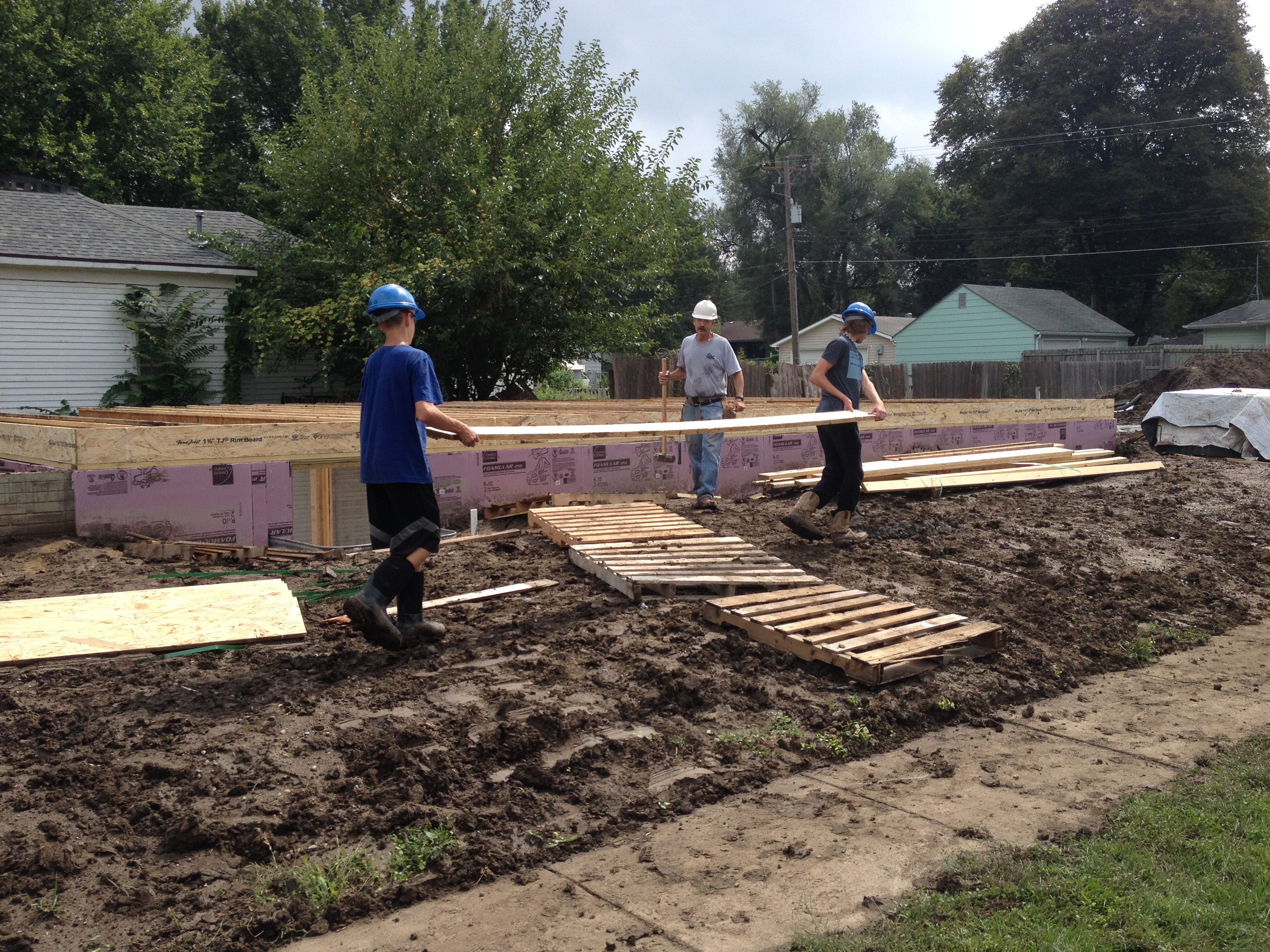
To many, the idea of homeownership is an expectation. But for many Lincoln residents in poverty, the thought of owning a home seems like an intangible dream. Lincoln Housing Authority (LHA) is working to change that.
With a mission of providing safe and affordable housing to families under financial stress, the nonprofit has maintained a longstanding partnership with Lincoln Northeast High School through a residential construction class.
Lincoln Community Foundation provided a grant to the 24-year-old program to help offset construction costs. Through this hands-on program, students are able to experience various trades within the construction field while helping those in need, all while developing key life skills such as teamwork and communication.
Over the course of a school year, students are responsible for framing, siding, installation of windows, doors, cabinets and finish trim. Thomas Judds, LHA’s Planning and Development Manager said that the construction industry is in need of workers. This class provides high school students with the chance to step into the industry before their high school careers are over.
While students are gaining experience in the trade industry, they are grasping the profound impact their time and skill can have on a family. Judds touched on the impact this partnership has had on community members. “This program is helping families achieve the dream of home ownership.”
In addition to this project, the nonprofit works to administer nearly three-thousand tenant based, rental assistant vouchers and oversees the management and maintenance of 1,500 rental units across Lincoln.
Fall 2018 Newsletter
Published on Oct 25, 2018To catch up on the latest Lincoln Community Foundation happenings click here to download the newsletter.
Community Action: Helping Some of Lincoln’s Most Vulnerable
Published on Apr 16, 2020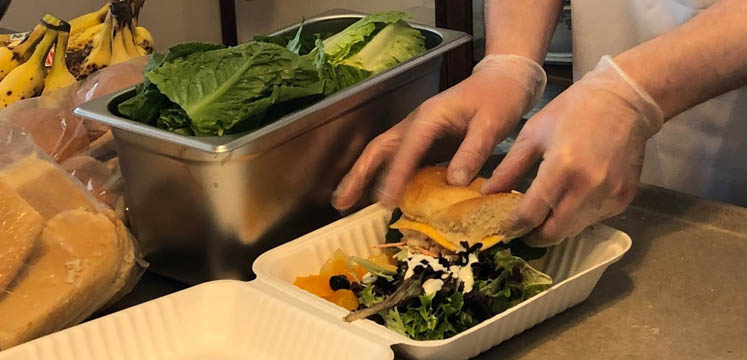
With 20,000 participants to serve, Community Action started developing an infectious-disease response plan in early March. “We worked quickly, anticipating what our programs would look like,” said Communications and Development Director Heather Loughman.
Since mid March, the Gathering Place soup kitchen has been serving guests to-go meals from the porch, and has extended those meals to include weekends. “We’ve seen a surge in demand, the need has been higher than usual,” Loughman said.
Following suit with the schools, Community Action Partnership suspended on-site operations of its three Head Start centers. Staff are now connecting with families remotely and providing weekly deliveries of diapers, wipes, formulas and educational materials. Head Start families are among the most vulnerable in Lincoln. “When schools and centers close, the implications for families are pretty high. It’s a challenging time for our families now.”
There will also be increased demands on the Homeless Prevention Emergency Services Program which provides rent and utility assistance for those near or experiencing homelessness.
“With the COVID-19 response funds, we are ramping up our efforts to make sure participants have what they need right now. The money helps our staff respond to new and immediate needs,” Loughman said. “We are incredibly thankful for how quickly this fund was put together to help support non-profits.”
For more information on the Lincoln COVID-19 Response Fund and to make a donation, click here.
Passion for Literacy Leads to Legacy Gift
Published on Jul 11, 2018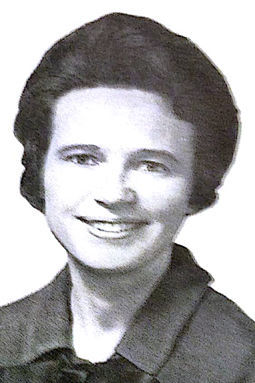
A pioneer. A force. No nonsense. Strong.
These are the words used to describe Catherine Angle.
The city’s first woman elected to the Lincoln Board of Education (1967), Catherine dedicated herself to remediating dyslexia – a languagebased learning disorder.
Her volunteer activities focused mostly on children and reading, including serving on the board of Lincoln City Libraries, Head Start, Junior League and Child Guidance Center. She volunteered extensively with Lincoln Public Schools and served on many committees related to learning disabilities. For five years, she sponsored a monthly support group for parents with children experiencing dyslexia. Along with other parents, she started a tutoring program where parents would work with students after school.
“I am thankful that my interest in children’s reading problems has given a meaningful focus in my life,” she once said.
It only made sense that Catherine would create a Legacy Society gift with the Lincoln Community Foundation that would promote a love of reading. The John & Catherine Angle Lincoln Public Library Fund is an endowed gift with the intent to help build a future library site. A second end of- life gift, the John & Catherine Angle Special Purpose Fund, reflects the couple’s interest in strong local nonprofit organizations and provides funding for governance training for nonprofit boards in Lincoln.
A brilliant mind, Catherine graduated as a 16-year old valedictorian from Lincoln High School and continued her education, graduating Phi Beta Kappa from Smith College in 1946.
Catherine’s husband and high school sweetheart, John, had a long career in the insurance industry, serving in executive positions with Woodmen Accident and Life and then Guardian Life in New York. The couple lived in New York between 1973 and 1989, where Catherine pursued her master’s degree in Reading and Educational Psychology at NYU and became involved with the Orton Dyslexia Society (now called the International Dyslexia Association), the country’s foremost authority on the subject.
Catherine passed away in 2017, nine years after John. She spent those years involved in many clubs and organizations that touched on her other interests including the arts, gardening and trails. LCF President, Barbara Bartle, had a personal friendship with Catherine as they shared an interest in providing resources to parents and students with dyslexia. “I have such respect for Catherine,” Barbara said. “She was a giant in the field. She influenced hundreds of educators in her commitment to see that every child learns to read.”
What is your passion? Contact to Paula Metcalf, VP for Gift Planning, at 402-474-2345 or paulam@lcf.org to talk about a way to leave a legacy gift for your favorite cause.
Donor Advised Funds: Maintaining Control and Doing it My Way
Published on Mar 1, 2019
For such donors, a donor advised fund (DAF) may be the best solution. While not a new charitable giving tool, donor advised funds have become one of the most popular giving techniques in recent years. Contributions as a percentage of total individual giving have more than doubled between 2010 and 2017, probably because these funds offer a variety of donor benefits, including control, anonymity, potential tax savings, and ease of giving.
Defining a Donor Advised Fund
A donor advised fund is a contractual relationship between the donor and a sponsoring organization. The donor makes a charitable contribution to the sponsoring organization, which then owns the assets and administers the fund. The donor retains advisory privileges over the charitable funds distributed from the account. This arrangement lets the donor qualify for an immediate income tax deduction for the amount of the contribution even though funds won’t be distributed until later, at which time the donor can influence distributions to support a chosen charity. A donor advised fund offers unique versatility in allowing a donor to give what is most favorable at the time that works best for the donor.
Forbes magazine compared donor advised funds to a traditional brokerage:
Think of a donor advised fund (DAF) account as kind of a tax-advantaged charity brokerage account. The sponsoring organization is a charity that holds and manages donors’ contributions—cash, stocks, bonds, real estate, even business ownership—for the purpose of making grants to other charities, once (or if) the donors tell them to do so.
The Benefits of Donor Advised Funds
The innate flexibility of donor advised funds provides donors options that allow for some level of control, and arguably provides customized charitable giving options that let donors “donate their way.”
Advantages
For the donor, there are many benefits to donor advised funds:
- Income tax deductions are allowed in the year of the contribution, even if no distribution is made from the DAF.
- A DAF offers a more generous income tax deductibility percentage limitation than is available for private foundations, assuming the donor itemizes. The deduction limit for a cash gift is equal to 60% of a donor’s adjusted gross income (pursuant to the 2017 Tax Cuts and Jobs Act).
- If privacy is a concern, a DAF may allow the donor to maintain anonymity (or at least minimize publicity).
- A DAF’s advisory privilege offers donors a great deal of flexibility and control over fund distributions.
For certain donors, the flexible nature of a donor advised fund may be almost as important as the tax deduction. Consider a typical charitable donation—let’s say a donor writes a check to a charity, the charity accepts the donation, and the donor qualifies for an income tax deduction in the year of the gift. The gift is complete and the donor and charity each go their merry way. With a donor advised fund, however, the donor has more options. Let’s look at two examples:
Example: Brian took a gamble on an initial public offering of a new stock, and it paid off. He is going to owe significant income taxes this year and would like to use the stock to make a charitable donation so that he can make use of the charitable income tax deduction. However, he does not have a particular charity in mind yet. He has no time to research worthy charities and doesn’t want to rush into a decision. For Brian, a donor advised fund provides a way to make a donation, take the income tax deduction now, and then later recommend distributions to particular charities.
Example: Erin is a successful software engineer who will be receiving a series of substantial payments over the next 20 years as a result of her work being licensed. Erin wants to make a charitable contribution to her graduate school, but also wants the contribution to be large enough to allow the school to do something significant. Rather than contribute $10,000 or $20,000 per year, Erin instead contributes the annual cash into a donor advised fund. In 10 years, enough has accumulated that she can make a significant contribution.
Maintaining Control and Avoiding Problems
Donor advised funds offer a level of control that is often lacking with other charitable giving strategies. For donors who prefer flexibility in their giving but still want an immediate income tax deduction, a DAF may be the answer. As a professional advisor, understanding the basics of donor advised funds (including requirements, restrictions, benefits and shortcomings) will allow you to effectively counsel clients. Ideally, informed advice will lead clients away from inflexible gifts to transactions that are financially successful and personally satisfying to donors.
2018 Donor Advised Fund Report, National Philanthropic Trust.
Richard Eisenberg, “There’s a Target on Charity’s Booming Donor Advised Funds,” Forbes, August 2, 2018.
ScoutReach Instills Scout Values in All Boys
Published on Jul 18, 2018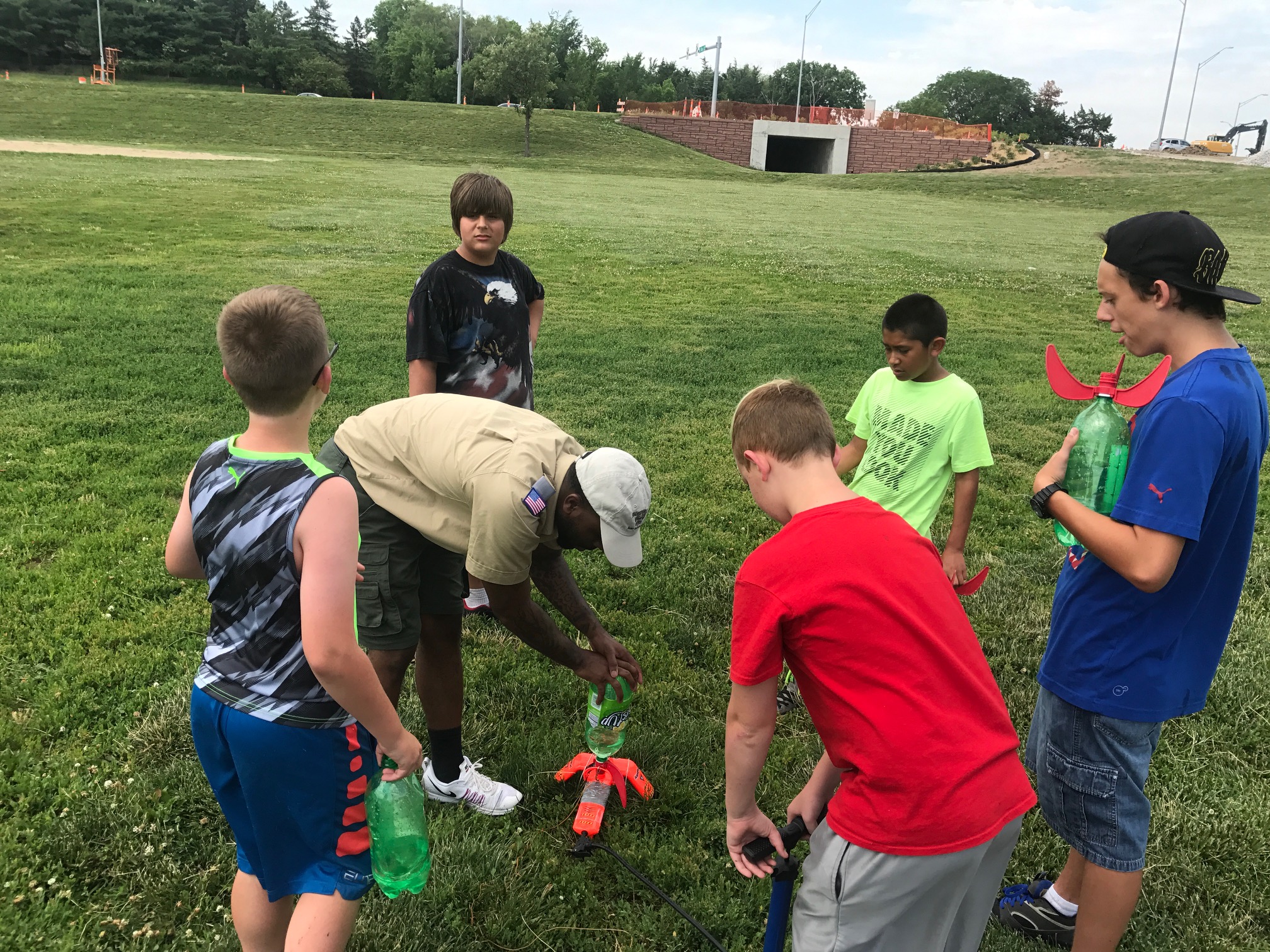
Scouting should be for everyone, but in some low-income areas, not every boy has the opportunity to earn their badges. The Boy Scouts of America – Cornhusker Council noticed the lack of scouting opportunity in some Lincoln schools. Thanks to the ScoutReach After School program, young boys are now getting the chance to take the Scouts oath.
ScoutReach extends the Boy Scouts programs to youth who, due to financial restrictions, would not otherwise have the same scouting opportunities as others. In 2016, Lincoln Community Foundation provided a grant to help start the program. Since then, the Foundation has continued to provide funding and support for the program.
“This program helps keep a lot of young men from going down the wrong path based on their lives and the community they live in,” said Akeem Holmes, District Executive. The program currently services 17 Community Learning Center (CLC) schools in Lincoln. CLCs offer before and after school programs with a goal of building smarter kids, thriving families, and stronger neighborhoods
Holmes also oversees an internship program with the University of Nebraska Lincoln in connection to the ScoutReach program. Interns are able to provide an example of positive character as they assist with the afterschool program while earning college credit. The internship with UNL adds a layer of leadership for young adults, mixing education and service.
The Lincoln Community Foundation grant assisted with program supplies, summer day camps and scouting achievements and incentives for youth and volunteers. The ScoutReach program has seen the growth and strengthening of the after school programs in the last year.
Classic Boy Scout activities like the pine wood derby, camping and archery are included in ScoutReach. Through outdoor activities and educational programs, the program is able to train new members in responsible citizenship, character development, and self-reliance.
Every child should have the same opportunity to develop their leadership skills and grow their character, no matter their circumstance. The Cornhusker Council of Boy Scouts of America is doing its part to instill the Scout values in every boy, regardless of background.
Reading Fifteen Minutes a Day Boosts Children’s Brainpower
Published on Oct 1, 2018Studies have shown that reading to a child between the ages of 0 and 5 can quadruple the number of words they know, increasing their ability to succeed in school. For over half of families under the poverty line, reading to their child is not incorporated into their day. Lincoln City Libraries wished to bring the national campaign, 15 Minutes a Day, to Lincoln by working with Community Learning Centers and community health agency partners to help our most vulnerable children get daily exposure to reading.
Lincoln Community Foundation granted Lincoln City Libraries the funds to bring the campaign to Lincoln families. The campaign provided books, educational materials and incentives to encourage reading. Vicki Wood, Youth Services Supervisor for Lincoln City Libraries said, “We were pleased to see the positive response from families receiving book packets. Many families are new to America and English is their second language, so the parents were learning with their children.”
Lincoln City Libraries’ 15 Minutes a Day campaign was a model that inspired Read Aloud Lincoln, a community-wide awareness campaign launched in 2018. Focusing in the South of Downtown neighborhoods, events are hosted for children and parents, such as tours of their local library.
Today, Read Aloud events are held at Morrill Hall, the Children’s Museum and other local partners, mixing reading aloud with other educational exhibits. “Together, we have created a powerful, consistent message that is delivered regularly at places where families gather: in their community, schools and special events,” said Vicki Wood.
Partners of Read Aloud Lincoln include Lincoln City Libraries, the University of Nebraska State Museum, Lincoln Children’s Museum, the Nebraska History Museum and Midwestern African Museum of Art. Read Aloud Lincoln is made possible by funding from the Institute for Museum and Library Services and Lincoln Community Foundation in support of the Prosper Lincoln community agenda.
CEDARS Providing Holistic Support to Families with Young Children
Published on Oct 1, 2018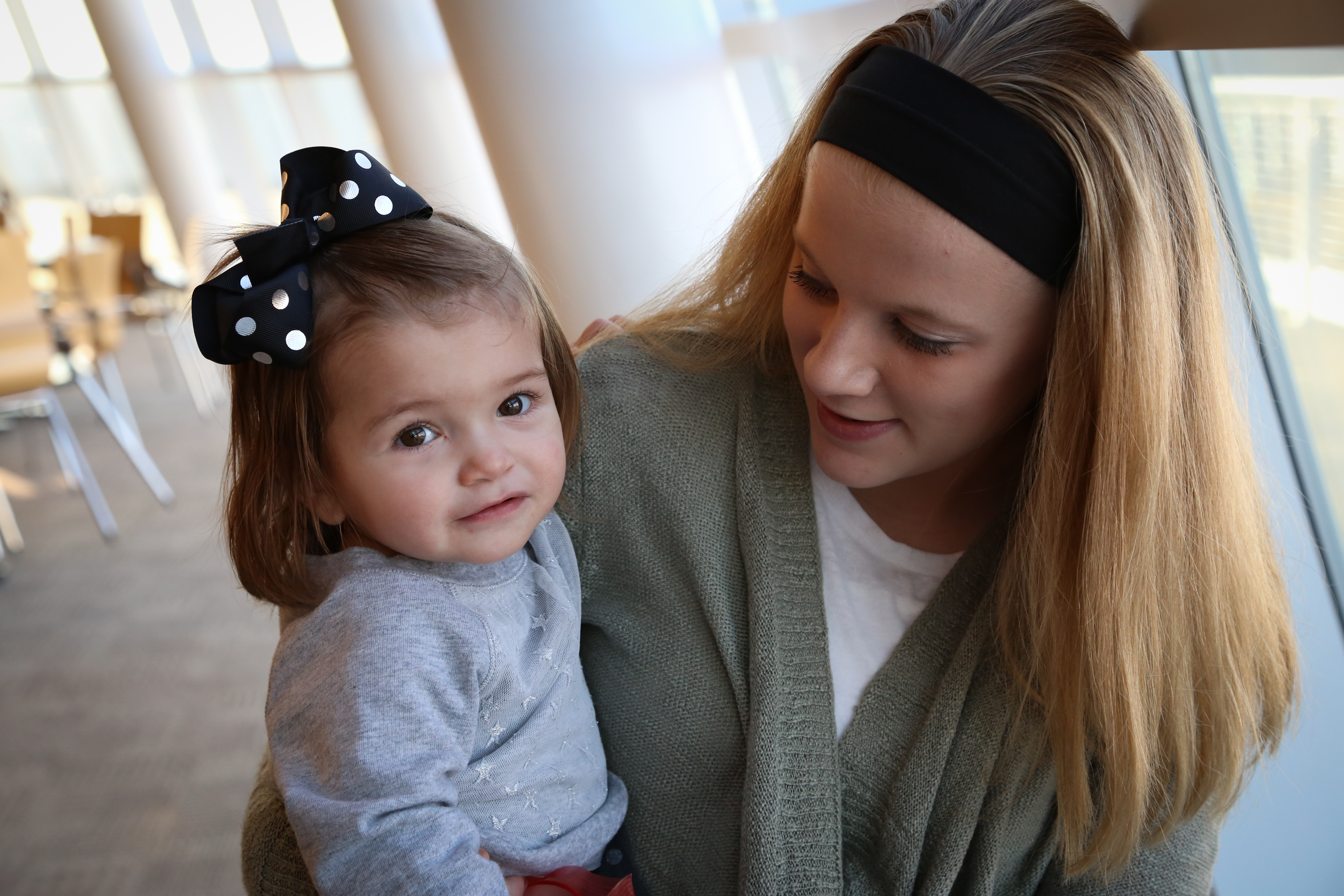
For most parents, getting a child ready for kindergarten is an exciting and nervous time. While some are buying backpacks and crayons for their child, other families have to choose between the electrical bill and new shoes. CEDARS Youth Services is working with some of those families by providing holistic support for families with young children.
With a mission of providing safety and stability for families, the nonprofit has developed a new initiative to provide education and access to resources for families facing instability. In 2016, Lincoln Community Foundation provided a grant to help launch the program.
CEDARS is working to break the cycle of poverty by educating families on how to prioritize finances, access affordable housing, and gain employment. While most people have a birth certificate or a driver’s license needed to gain employment, some living in poverty do not have access to these essentials we take for granted.
“If you look at Maslow’s Hierarchy of Needs, a family must have their basic needs, such as housing, met before a need like education can be fulfilled,” said Christen Million, Early Childhood and Family Specialist for CEDARS. Million works directly with families in the program and helps the parents prioritize between paying bills and updating their driver’s license. “We help them find and access those resources,” said Million.
When asked where the program is headed, Million says the focus is helping families become self-sufficient. Once the basic needs are met and a family has gained some stability, they are able to focus on their child’s education needs.
Every family deserves the support needed to prosper in life. CEDARS Early Childhood programs provide a blanket of holistic support that vulnerable families in Lincoln need. When the basic needs of a family are met, parents can focus on getting their child ready for the new school year.
Women’s Shelter Offers a Fresh Start
Published on Dec 19, 2018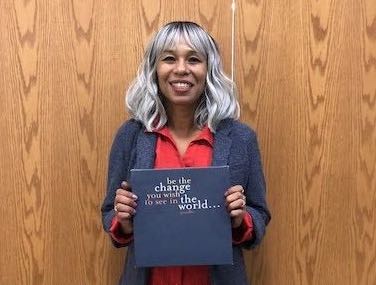
Keenomo grew up around alcoholics. At the young age of 22, she herself struggled with substance use. After being released from incarceration, she had nowhere to go and found herself homeless. On Christmas Eve, she moved with her few possessions to Fresh Start, a transitional long-term shelter for women.
It was here that she was connected to a case manager who helped her find employment within two weeks. After graduating from the program, she moved into her own apartment, completed treatment and went back to school to study Human Services.
Fresh Start allows women to stay in the shelter for one year while they strive to change their lives. The longer stay allows for greater opportunity to focus on goals and enact change. When they enter the program, women are matched with a case worker, who helps empower and support the residents. By providing a safe, supportive and caring environment, Fresh Start allows women a place to find stability and focus on using their strengths to knock down barriers towards self-sufficiency.
Lincoln Community Foundation provided a grant in 2017 to assist the program. “The grants and contributions given by LCF and its donors provide so much more than the shelter and program costs,” said Monica Zinke, Executive Director. “They give hope for a new life, and a place to act on that hope.”
Fresh Start continues to be beacon of hope for homeless women in Lincoln. Providing women with a case worker, empowerment, and long-term shelter allows the women to truly turn their lives around and get the fresh start they deserve.
CEDARS: Tending to local youth
Published on Apr 20, 2020
Sometimes, timing is everything. Renovations at the CEDARS shelter on 66th Street were recently completed. Now it can provide kids under Cedar’s care a place to stretch out and be safe, at a time when social distancing has become crucial. “The timing was amazing,” said CEDARS CEO Jim Blue. “And everyone is healthy at this point.”
Of its 20 programs, all but its Community Learning Centers remain open. CEDARS provides an emergency shelter for youth and a drop-in center for runaway and homeless youth. Several programs, including home based prevention programs, have transitioned to a tele-health focus.
One program hit particularly hard this month is CEDARS nationally-accredited early-childhood center. Attendance has dropped by 50 percent this month. “The center serves marginally-employed families, many of whom are now no longer employed,” Blue said. CEDAR’S is spreading the word that they’ve now got space for kids, especially those whose parents are considered essential personnel. They are able to provide temporary care while other centers are closed.
The Lincoln COVID-19 grant will help CEDARS through these ever-changing times. “I’m really proud of the way we’ve adapted to circumstances this past month,” said Blue. “And there are new lessons to learn every hour. We are so grateful for the COVID-19 fund. It has been a blessing and a reassurance.”
For more information on the Lincoln COVID-19 Response Fund and to make a donation, click here.
Making Lincoln a More Affordable Place to Live
Published on May 11, 2022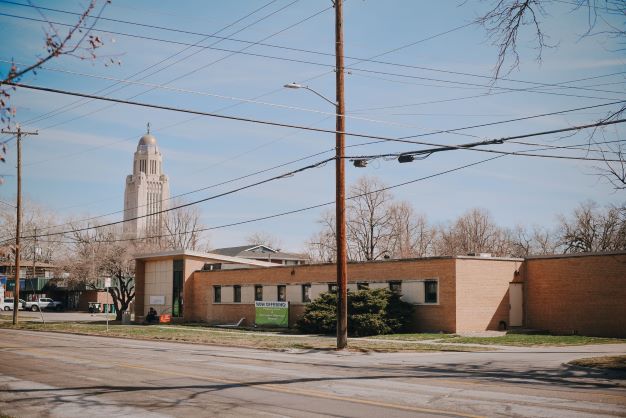
True to the collaborative spirit of our great city, Lincoln’s affordable housing story is the product of public, private, philanthropic, and nonprofit partnerships. Over the past few years, these entities have come together to develop a shared understanding of the affordable housing problems in our community and work towards potential solutions.
The Lincoln Community Foundation has been a common thread throughout these partnerships. Collaboration began with the 2017 Lincoln Vital Signs report, a partnership between LCF and the University of Nebraska Public Policy Center to identify our community’s strengths and opportunities for improvement.
The 2017 Vital Signs and other data concluded that a high percentage of Lincoln residents were housing cost-burdened – paying more than 30 percent of their income for housing. This paired with low homeownership rates, a decline in residential construction, and overall, not enough affordable units to meet current and future housing demands. The alarming data lead to Affordable Housing becoming a focus area as of the Prosper Lincoln community agenda in 2019.
“One of the things that became very obvious was that we weren’t going to solve all of the problems, but we could start,” said Tom Smith, local investor, and board president of the South of Downtown Community Development Organization.
The City’s Affordable Housing Coordinated Action Plan further documented Lincoln’s future housing needs and added to the conversation a target of 9,000 affordable housing units over the next 10 years. This, in conjunction with the Lincoln Vital Signs findings, has created a common affordable housing goal across our community.
This shared goal guides LCF’s affordable housing leadership and mission investment work (see side bar), which includes partnering with nonprofit organizations like the South of Downtown and NeighborWorks, who are focusing their affordable housing work in targeted neighborhoods with a high concentration of poverty, low home-ownership rates, and an aging housing stock.
LCF’s affordable housing efforts are made possible because of partnerships with – and investments from – local financial institutions. Funds were raised from 11 local banks who supported LCF’s affordable housing initiatives due to the documented need as well as their trust in LCF’s leadership.
Affordable housing goes beyond brick-and-mortar projects. LCF also invests in the tools our community needs to systemically increase affordable housing development. One such tool is a Community Development Financial Institution (CDFI), a nonprofit organization that exists to provide technical assistance and financing to support community development activities.
Throughout 2020 and into 2021, LCF led an effort with affordable housing professionals to explore, design, and launch a CDFI to provide financing to future affordable housing projects. As a result of this work, Community Development Resources, an existing nonprofit CDFI dedicated to small business lending, announced plans to expand its mission to include affordable housing.
Another available tool in the affordable housing toolkit are funds used to support the construction of single-family owner-occupied units. Catalyzed by the Nebraska Legislature in 2020, urban communities can now access grants to support financing for workforce housing development. NeighborWorks, South of Downtown, and Nebraska Housing Resources each were awarded workforce housing grants through this legislation.
When combined with local match funds provided by LCF and their partners, such as local foundations and the Nebraska Investment Finance Authority, these organizations collectively have $6 million to be used for single family housing development.
“Because of the pandemic, grant programs have really played into our ability to move the needle,” Tom said. “When you get the City, the state and the federal government all saying the same things and local entities and organizations ready to take action – progress starts to happen.”
This progress represents just a few pieces in a complex affordable housing puzzle, with much work still ahead. Of all the progress made to date, including the development of brick-and-mortar projects and the creation of housing financing tools, the most import outcome has been raising the awareness of affordable housing needs in our community.
Lincoln Housing Charities Supports Preschool Education through Curriculum
Published on Dec 19, 2018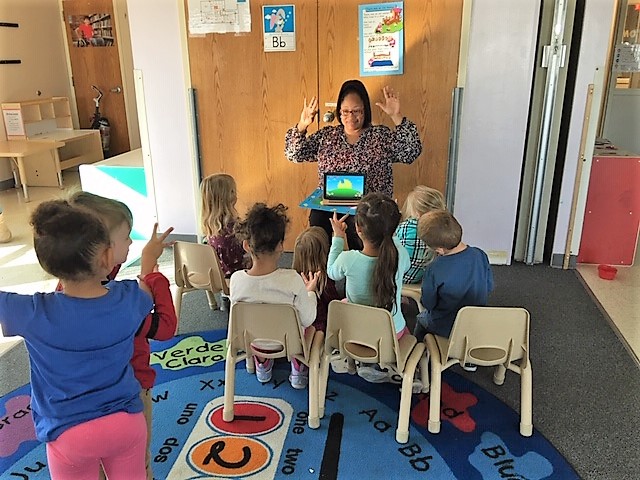
Parkview Child Development Services, a preschool at the Carol Yoakum Family Resource Center, was at risk of losing a quality curriculum for their young students. Because of a change in service providers, the curriculum the students were using would go away if new licenses weren’t purchased.
With a mission of supporting low-income families, Lincoln Housing Charities approached Lincoln Community Foundation about providing a grant to help purchase the curriculum. Thanks to the grant, the curriculum will stay at Carol Yoakum Family Resource Center regardless of the child care provider. The center serves children in the Arnold Elementary School area. Seventy percent of the families in this area are on free/reduced lunches. According to Lincoln Housing Charites, the need is high for quality child care options in the area.
The quality curriculum will help make sure every child served is Kindergarten ready. The Easy Breezy curriculum not only provides quality lesson plans, but also visual materials such as large, colorful books and posters to help reinforce what the children are learning. This comprehensive curriculum encourages the preschoolers to participate in hands-on learning through songs and air writing. Tablets were also purchased in order enhance the child’s learning experience.
Since implemented, the curriculum is receiving praise from students, parents and teachers. “The kids enjoy the videos and songs that are helping them learn their letters and numbers,” said one of the preschool teachers. “The curriculum is easy to use, especially the digital component.” Parents have commented that their children are practicing their air writing at home and are singing the songs about letters and numbers they are learning.
Early Childhood Education Gives Children a Head Start
Published on Dec 19, 2018For working parents in poverty, finding quality early childhood programs that provide full-day, full-year care can be a challenge. Community Action Partnership of Lancaster and Saunders Counties is working to fill this gap through its Early Head Start and Head Start programs. These anti-poverty programs provide dual-generation services to prepare our community’s most vulnerable children for kindergarten. The program’s center-based option allows parents to work more regular hours, improving their financial stability.
Community Action’s Early Head Start and Head Start programs prepare children for success in kindergarten through a range of early learning interventions (targeting cognitive, social-emotional, language, and physical development); health, mental health, and nutrition promotion and intervention; and intensive family support and education services. The programs target children with the greatest barriers to success. All enrollees live at or below 100 percent of the federal poverty level, and many experience additional barriers including disability and high social-emotional needs. “Programs are specifically designed to meet the unique needs of children experiencing the greatest barriers to success,” said Heather Loughman, Communications and Development Director at Community Action.
Children with higher emotional or developmental needs benefit from the individualized support provided through Early Head Start and Head Start. Cassie, a mother who struggled to find adequate care for her four-year-old who has several developmental and genetic disorders, says, “It’s not that other programs were bad; I just don’t think they knew how to handle my son’s needs,” she said. “It was a relief to find Head Start.”
In support of the Prosper Lincoln early childhood community agenda, the Lincoln Community Foundation provided a grant to support the program and, as a result, children in Lincoln, and their families, received greater access to quality care.
Donate to Nebraska Disaster Relief and Recovery
Published on Mar 18, 2019We understand that many of our generous donors want to assist with immediate relief and response to Nebraska flooding. Below is a list of qualified public charities here working on these efforts.
Use caution when donating through crowdfunding websites and social media, as scammers may be looking to take advantage of people’s sympathy. A better option would be to give a tax-deductible donation to a qualified public charity subject to accountability, reporting and oversight.
Resources for those affected: Nebraska Emergency Management Agency: https://nema.nebraska.gov/. University of Nebraska Extension: https://flood.unl.edu/.
You can also visit http://www.nebraska.gov/nebraska-strong/ for information about donating or requesting resources.
The Washington County Long-Term Recovery Team is providing aid and assistance to those in Washington County, Nebraska. For more information, visit www.bereadywashco.org.
Community Foundations--Supporting Relief and for Long-Term Recovery
Nebraska Community Foundation
https://www.nebcommfound.org/give/rebuild-the-heartland-community-fund/
First National Bank has collaborated with NCF to establish this fund and contributed $100,000 to it. First National Bank will match up to $150,000 in additional contributions from other sources.
https://www.nebcommfound.org/give/nebraska-flood-recovery-fund/
The Nebraska Flood Recovery Fund is a collaboration between the Ethel S. Abbott Charitable Foundation and NCF to assist Nebraskans, especially low-income Nebraskans impacted by flooding in 2019, to recover and rebuild their lives
Grand Island Community Foundation
(greater Hall, Howard and Sherman Counties)
http://www.gicf.org/
Designate the Central Nebraska Disaster Relief Fund
Custer County Community Foundation
https://www.custercountyfoundation.org/area-funds
Kearney Area Community Foundation
https://www.shorturl.at/gozKY
Merrick Foundation (Merrick County)
http://www.merrick-foundation.org/giving.htm
Valley Days Foundation
https://bit.ly/2HGs5tS
Fremont Area Community Foundation
https://www.facfoundation.org/floodreliefrecovery.html
Support Give to Lincoln Day With Your Donor Advised Fund
Published on Apr 12, 2019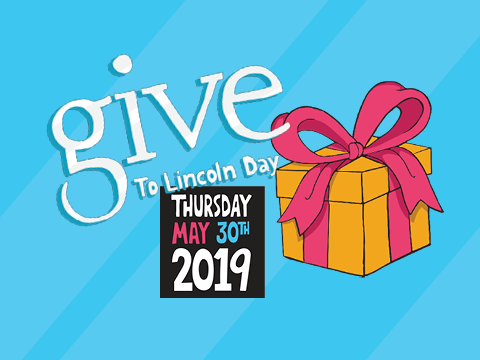
If you have a donor advised fund at Lincoln Community Foundation, you can avoid credit card fees when you support nonprofits for Give to Lincoln Day. Instead of using www.GiveToLincoln.org, make grants to your favorite participating nonprofit, using my LCF online portal at www.lcf.org or email Michelle Paulk at michellep@lcf.org to request grant distributions by May 15. Minimum distribution of $100 per nonprofit applies to grants from LCF donor advised funds.
If you don’t already have a donor advised fund with Lincoln Community Foundation, there is still time. Plus, new DAFs will receive a 10% match up to $1,000. Contact Scott Lawson, Vice President for Finance at scottl@lcf.org or 402-474-2345 to set up and fund your DAF by May 1st in order to make your Give to Lincoln Day grants from the fund.
Lincoln Community Foundation Awards $472,000 to Support Local Nonprofit Organizations
Published on Feb 23, 2017The Lincoln Community Foundation distributed $472,000 in community grants to nonprofit organizations. These grants are made possible by contributions from generous donors to Lincoln Forever Funds at LCF. Organizations that received funding include:
Asian Community & Cultural Center - $10,000
Family Resource Program
Boy Scouts of America-Cornhusker Council - $10,000
Support for scouting programs held at Lincoln Community Learning Centers
Bridge Behavioral Health - $10,000
Food handler training and accreditation
CEDARS Youth Services - $25,000
Support of Early Childhood Development Centers
Food Bank of Lincoln - $15,000
Bridges Out of Poverty
Foundation for Lincoln City Libraries - $20,000
15 Minutes a Day Reading program
Foundation for Lincoln Public Schools -$10,000
Career Academy
Fresh Start - $10,000
Women’s Transitional Shelter
Give To Lincoln Day Match Fund - $250,000
Support for the 2017 Give To Lincoln Day match fund
Good Neighbor Community Center - $10,000
Food pantry and distribution services
Lincoln Housing Authority - $10,000
Lincoln Northeast High School home build program
Lincoln Parks Foundation - $62,000
Woods Park Tennis Center landscape
Malone Center - $10,000
General Operating Support
St. Monica’s Behavioral Health Services - $10,000
Women’s treatment program
Tabitha- $10,000
Meals on Wheels 50th Anniversary
Building a Great City
Published on Apr 12, 2019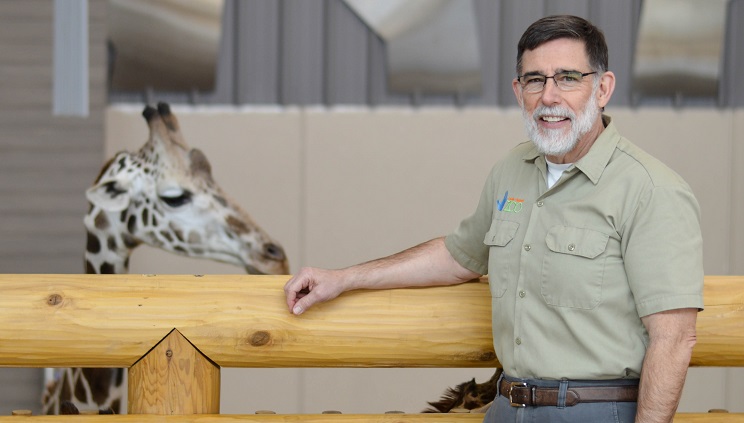
We know Lincoln is a great city by the many accolades and national rankings we receive. Since 1955, the Lincoln Community Foundation has provided leadership and resources to help build a wonderful community to call home. This happens when thoughtful donors love Lincoln as much as we do.
Many know LCF as a grant-making organization. Grants are a key component to our local nonprofits’ budgets. Grants, accompanied by direct donations from charitable people, help fund expert staff and keep the lights on so these organizations can accomplish their important missions.
Sometimes nonprofits must grow and dream big. That is where LCF can help with capital improvements. In recent years, dreams such as the new adoptioncenter for Capital Humane Society came true in part because of an LCF grant. YMCA facilities have been built and Woods Tennis Center has expanded. The Career Academy trains high school students for in-demand jobs, and Matt Talbot offers more services to the homeless through LCF support.
Capital grants from LCF helped build new and renovated substance use treatment
centers, planted trees, obtained state-of-the-art equipment and improved access for people with disabilities.
LCF’s latest capital grants will contribute to the building of the new Float 4 Life National Training Facility (JCMF Children’s Charities), endowments for Rudge Park and the Prairie Corridor, as well as improvements to HopeSpoke, the new name of Child Guidance Center.
Most recently Lincoln Children’s Zoo is expanding thanks to an LCF grant and much community support. A new giraffe habitat allowing children to look eye-to-eye
with these tall creatures will open soon, as well as a new tiger habitat and facility for learning.
There are several landmarks made possible by LCF capital grants, including Tower Square, Gold Star Families Memorial monument, Centennial Mall and Union Plaza’s amphitheater. Visitors and residents alike are fortunate to have places to enjoy their time here, thanks to the generosity of people who have made Lincoln their home. Because of gifts made to – and through – the Lincoln Community Foundation, memorials, monuments, green parks and city spaces are fine features of our city.
Some donors create permanent funds designated to a particular field of interest, such as the arts or human services. Others choose to leave the gift unrestricted,
allowing Lincoln Community Foundation the flexibility to respond to the everchanging needs of the community. Some donors give while they are living, whileothers wait until they’ve passed. All of these personalized ways of giving help build and sustain our city.
Personally, John Chapo, executive director of Lincoln Children’s Zoo, and his wife, Tracie, are members of Lincoln Community Foundation’s Legacy Society.“My wife is an educator and I’m a nonprofit guy. We aren’t wealthy people,” said Chapo. “But we can leave something. We are pleased to be able to leave a legacy
gift with as few restrictions as possible because we don’t know what the future holds.”
Do you want to leave a lasting legacy? Start the conversation with Chip DeBuse, VP for Development by contacting him at chipd@lcf.org or 402-474-2345.
Benefactor, Legacy Society and Trustee Virtual Celebration
Published on Oct 21, 2020Panel Presentation by:
Tony Goins, Author "Something in the Water: Stories of Lincoln's Iconic Founders and Builders
JoAnn Martin, Retired President and CEO of Ameritas
Mark Weber, Author "The Legacy Spectrum: Passing Your Wealth with Thought and Meaning"
LCF Grants Record $13 million in 2018
Published on May 2, 2019Thanks to the foresight of generous donors, Lincoln Community Foundation granted funds totaling more than $13 million in 2018. This record amount was distributed to 974 nonprofit organizations with 85% of the grant dollars staying in Lancaster County.
Discretionary grants totaling close to $2 million were provided to local nonprofits made possible by contributions to the Lincoln Forever Fund and from LCF donor endowment funds. This includes leadership grants to Lincoln Parks Foundation for the Prairie Corridor Trail from Pioneers Park to Spring Creek Prairie Audubon Center ($250,000) and Redevelopment of Rudge Park ($50,000).
Nearly $5 million was granted from designated funds that were created by donors to support the programs and operations of their favorite nonprofits and houses of worship. Over $6 million was granted from Donor Advised Funds. These grants, which can be distributed to any eligible nonprofit in the country, are directed by the donor using funds they set aside for charitable distribution.
Grants support a variety of donor interests including health and human services, community improvement, education and youth, arts and culture, environment and animals, and religion-related.
Food Fort: Feeding Underserved Youth
Published on Apr 9, 2020
Since 2016, the Food Fort has used its distinctive bus to deliver weekly hot meals to about 200 youth in Lincoln.
“We use food as our avenue to build relationships with underserved youth,” said executive director Michaela Akridge. Since the pandemic, the Food Fort has seen its clients double and its services expand, even as social distancing has challenged the relational aspect of their service.
“We can’t invite kids into the bus anymore but we’ve built relationships over the years with them and they depend on us to help address their needs,” Akridge said. Food Fort is now handing out hot dinners, groceries and creative kits filled with coloring books, markers, crayons and crafts.
“The kids are really excited about the kits. It’s something new and different,” she said. “And the parents are very grateful for something that keeps their kids busy and creative. The need has been overwhelming and it’s a huge blessing to have the financial resources to do what the families need us to do.”
For more information on the Lincoln COVID-19 Response Fund and to make a donation, click here.
Nonprofits build new house, hope at 11th and E in Lincoln
Published on Nov 2, 2020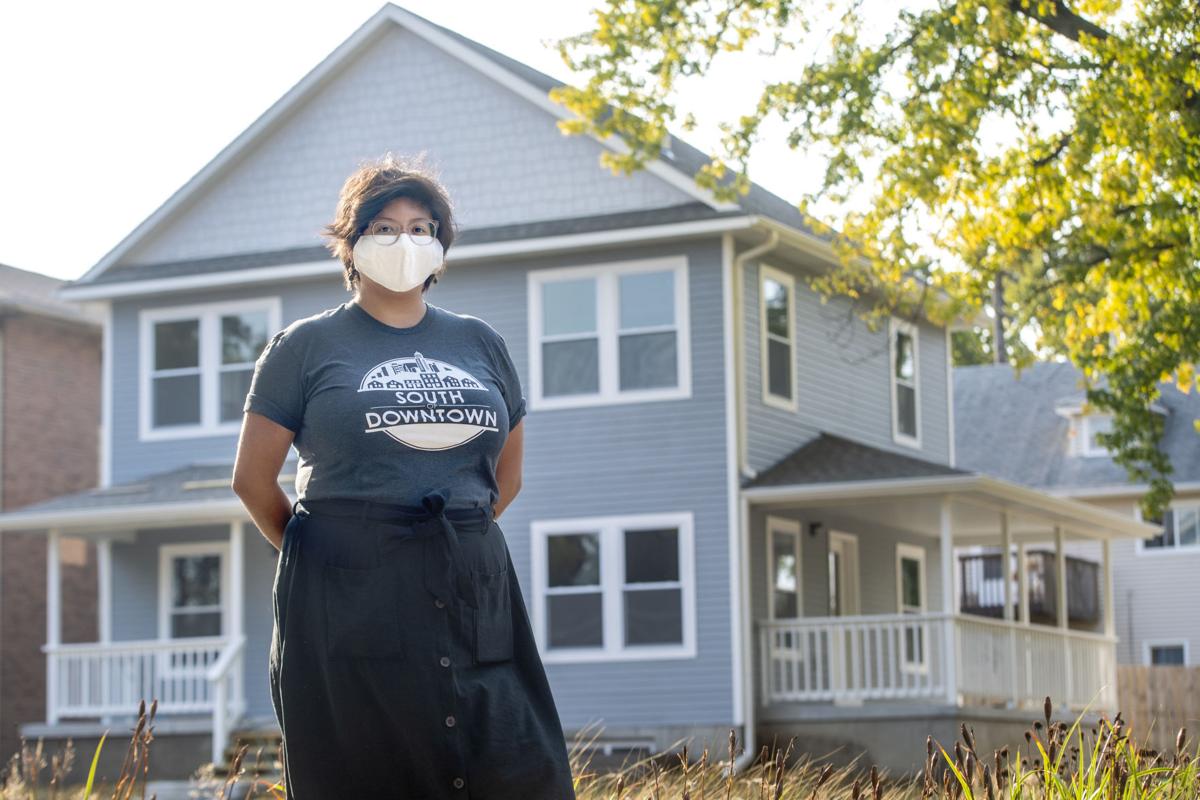
Photo by Justin Wan, Lincoln Journal Star
by Peter Salter, Lincoln Journal Star. The original article can be viewed here.
The first time Isabel Salas opened the door to 1105 E St., she was shocked by the shell in front of her.
The walls were stripped to the studs. The floors sagged. The wiring was exposed, and fire had scarred a floor. But her reaction ran deeper than the dirt and debris, and the signs of squatters and vandals who’d visited during the decade the house sat vacant.
“I was thinking of all of the conversations I had with folks who were just struggling to find an affordable and quality place to live. It was really disappointing to me that this house had sat empty for so long.”
Salas is a community organizer for the South of Downtown Community Development Organization, and in early 2018, the new nonprofit set its sights on the two-story problem property.
Its owner had started a renovation, but the home stood uninhabitable and unoccupied for years, drawing housing complaints and police calls.
“Houses just don’t sit vacant; they become a problem,” said Pat Anderson-Sifuentez, who’s active in the Everett Neighborhood and lives nearby. “There are people who get in and squat, and do probably not good things. There’s no positive activity going on inside a vacant home.”
The South of Downtown group launched a fundraiser to purchase the property, with a two-tiered plan in mind: Replace it with something that would benefit the neighborhood, and start a broader discussion about affordable housing and wasted space.
And this week, nearly three years after she first walked into 1105 E, Salas plans to return, to help host a virtual open house of the new two-story home that South of Downtown and NeighborWorks Lincoln — with help from others — built at the corner of 11th and E streets.
The four-bedroom, three-bathroom house already has a buyer. And it has the distinction of being the first property in Nebraska governed by a community land trust, intended to make home ownership more affordable and accessible.
Salas was eager to see inside, because she’d been watching it rise from the outside.
“All of a sudden, there was a hole in the ground. Then a foundation. And I went by one day, and it was a whole house. It was so amazing to see it transform that quickly.”
The South of Downtown group didn’t initially plan to build a home. After it bought the 120-year-old property, it asked the Everett Neighborhood what it wanted to see on the corner. What would elevate neighbors' quality of life? A small park? A place for food trucks? A gathering space?
And the group was told: Save the house. Maintain the historical character of one of Lincoln’s oldest areas, and give a family a place to live.
But that was a problem. With a buckled basement wall, ill-fitting windows and bare bones, the house wouldn’t be worth repairing; they’d have to spend more than it would ultimately be worth. So they made a plan to demolish the house and build a new one.
And that became another problem. The corner lot was considered nonstandard: It met the city’s size standards when it was created, but then the standards were changed.
South of Downtown executive director Shawn Ryba calls them toothpick and postage stamp lots; some are long and narrow, others are square. And 25% of the properties in his group’s focus areas are considered nonstandard, he said.
It can be expensive and exhausting to design a house on a nonstandard lot that complies with the city’s requirements, including setback provisions and parking space requirements, Ryba said.
“It took a long time to go back and forth and try to navigate and negotiate and move through it,” he said. “If we are making it virtually impossible to redevelop those lots, that’s a problem.”
The project’s design also had to clear the Historic Preservation Commission’s requirements, forcing changes in the porch roofline and window placement to keep with the character of the neighborhood.
“We kept hearing different things depending on who we talked to at the city,” Salas said. “There were a lot of hoops we had to jump through.”
But they cleared the red tape and got to work with others to start building — and filling — a home. The Lincoln Community Foundation provided a low-interest construction loan, NeighborWorks Lincoln did the work and South of Downtown created a community land trust.
The concept is simple: South of Downtown will own the land, and the homebuyer will own the building. That lowers the purchase price and, by extension, the size of the mortgage and its monthly payments.
In this case, the home was selling for $150,000. If the land were part of the deal, the cost would have climbed to $170,000 or $175,000, said Bill Porn, home ownership coordinator for NeighborWorks Lincoln.
But the land trust also posed further complications, because local lenders and appraisers were unfamiliar with something so new to Nebraska, Ryba said.
Still, the house went up, and it’s getting good reviews. “It’s a real plus for the neighborhood,” Anderson-Sifuentez said. “It really mimics the house that it replaced, in height, and where the front porch is.”
NeighborWorks found a buyer from one of its recent Homeownership Program classes, a single mother who had been struggling to find the right house, Porn said. She should move in late this month or in early November.
But before that, they want to share the home through a virtual open house, from 4:15 p.m. to 6 p.m. Thursday, streamed on South of Downtown’s Facebook page.
Those with a part in the project — South of Downtown, NeighborWorks, Lincoln Community Foundation, Everett Neighborhood leaders, Rotary Club No. 14 — will set up in different rooms to discuss their roles and answer questions. Even the mayor will be there, Salas said.
They’re proud of what they brought to the corner, even if it took more time — and effort — than planned.
“It’s absolutely beautiful,” Ryba said. “It looks like it was the original house; it sits there so perfect.”
Giving to Lincoln Today
Published on Dec 22, 2020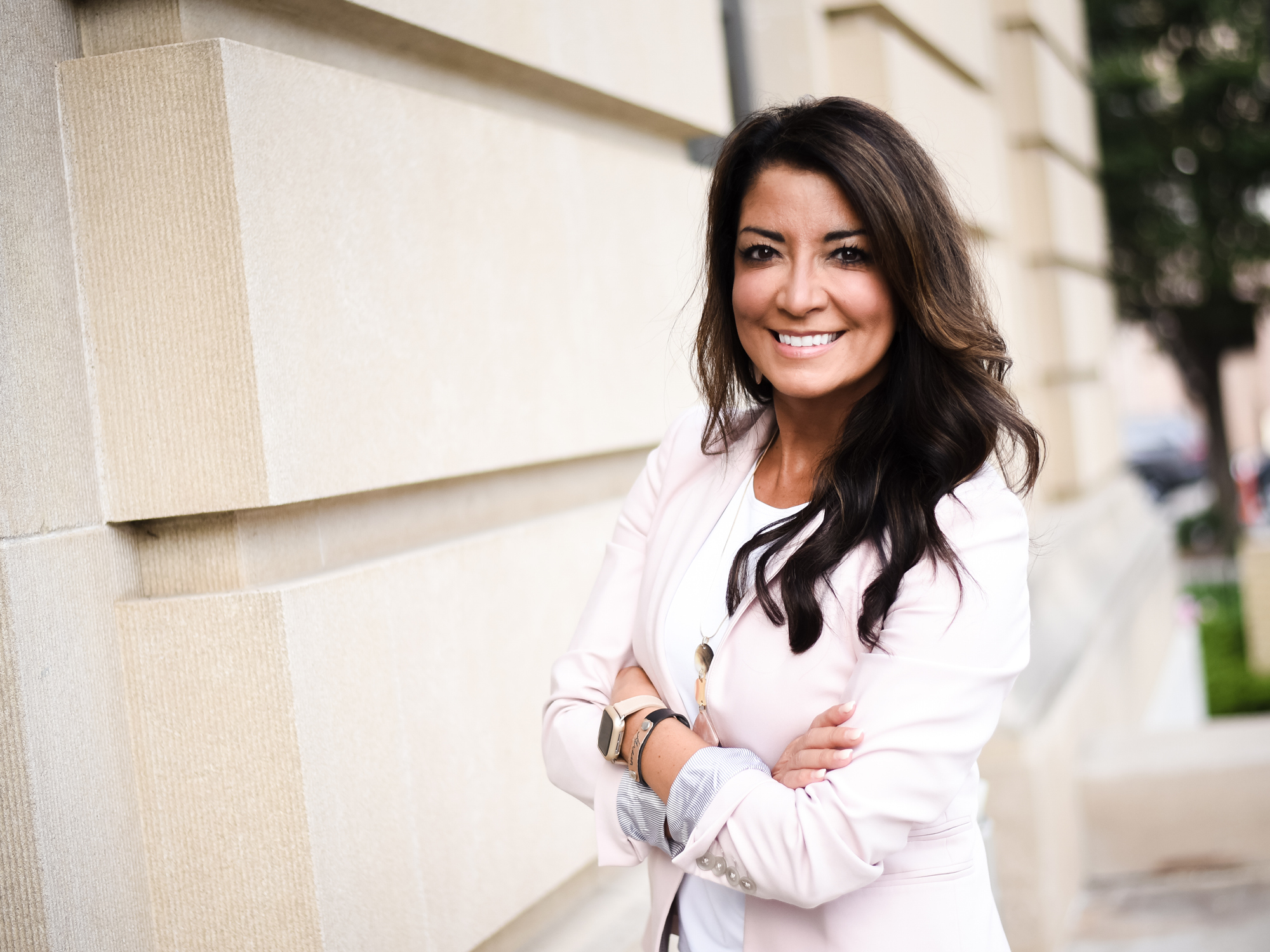
Ava Thomas does not forget.
She does not forget growing up poor, her family dependent on food stamps, welfare and community housing. She does not forget living with a grandmother who helped raise her, her brother – and many beloved cousins. She does not forget life as a child in poverty, while surrounded by family members who were nonetheless generous and giving.
In fact, as Thomas grew up, graduated from high school, attended college, and flourished in a 25-year newspaper career – she made it her mission to never forget.
“As I started earning a living, making money, I knew I had an obligation to give back,” she says today. “I knew that, as my family cared for me and gave what they could, I needed to give and take care of others.”
Thomas is now president and publisher of the Lincoln Journal Star, and has dedicated much of her personal life to addressing those childhood memories – donating to a spectrum of causes, helping found Hundreds of Women Who Care, volunteering as a “Big Sister,” serving and donating through the Lincoln Community Foundation.
“The people at the Foundation are so compassionate, their work is so compelling,” Thomas says. “They have an understanding about the incredible generosity in this community … Lincoln is indeed a big, small town. We are all about taking care of one another, taking care of community. That sense of giving, helping others, it’s in our DNA.”
She points to the recent and perhaps surprising Give to Lincoln Day – held smack dab in the middle of the pandemic. “We are in a time when there are increasing demands on non-profits, businesses are impacted by the pandemic, people are concerned about returns on their savings, jobs are in jeopardy.”
Yet the ninth annual Give to Lincoln Day was a record-setting year.
“It blew my mind,” Thomas says. “People opened their wallets, even though they were hurting themselves. Lincoln got it – they understood that this is such an important time to understand the sense of honoring the good of the community.”
She also attributes the day’s success to the many tools the Lincoln Community Foundation has created to inspire Lincoln citizens to give – particularly, for her, the “Donor Advised Fund.”
“I call it a charitable checkbook. It’s just so simple. You put money into an account and write ‘checks’ from that account for charities, anything 501(c)(3) … It not only makes it easy to give, it is all recorded, telling me who I gave to, how much and when … It’s all so simple. You log into your account, click on the charities you want to give – click, click, you have a complete record of everything.”
Her friends applaud her generous and benevolent spirit:
- • Anthony L. Goins, director of the Nebraska Department of Economic Development: “Ava is a dear friend and someone I consider to be a natural leader. She also has an incredible gift of generosity, kindness and social awareness that shines brightly through her philanthropy.”
- • Steve Kiene, CEO of Ocuvera: “While financial giving is noble, I find that Ava’s many other dimensions of giving are the truest definition of philanthropy. She in fact helped open my eyes to the struggles that are faced by women, people of color, immigrants and many others who were not born into advantage. She has made me a better community-minded person. We are lucky to have her as a quiet leader – and her hard work, perseverance and success are inspirational to everyone.”
- • Pete Ferguson, Youth Development Coordinator for Lincoln Public Schools: “What I find amazing is the intensity Ava has in her commitment to impact, empower and invest in other lives. Whether it be her children, grandchildren, philanthropic endeavors or ensuring marginalized and underrepresented people have a voice, it’s that intensity that fuels her generosity of time, talent and treasure.”
Indeed, Thomas believes in imparting a sense of giving from one generation to the next. “While we didn’t have a lot of money when I was growing up, my family was always kind and giving. I believe it is important to pass that on … I feel strongly about leaving Lincoln a better place than I found it.”
The Joy of Giving
Published on Dec 22, 2020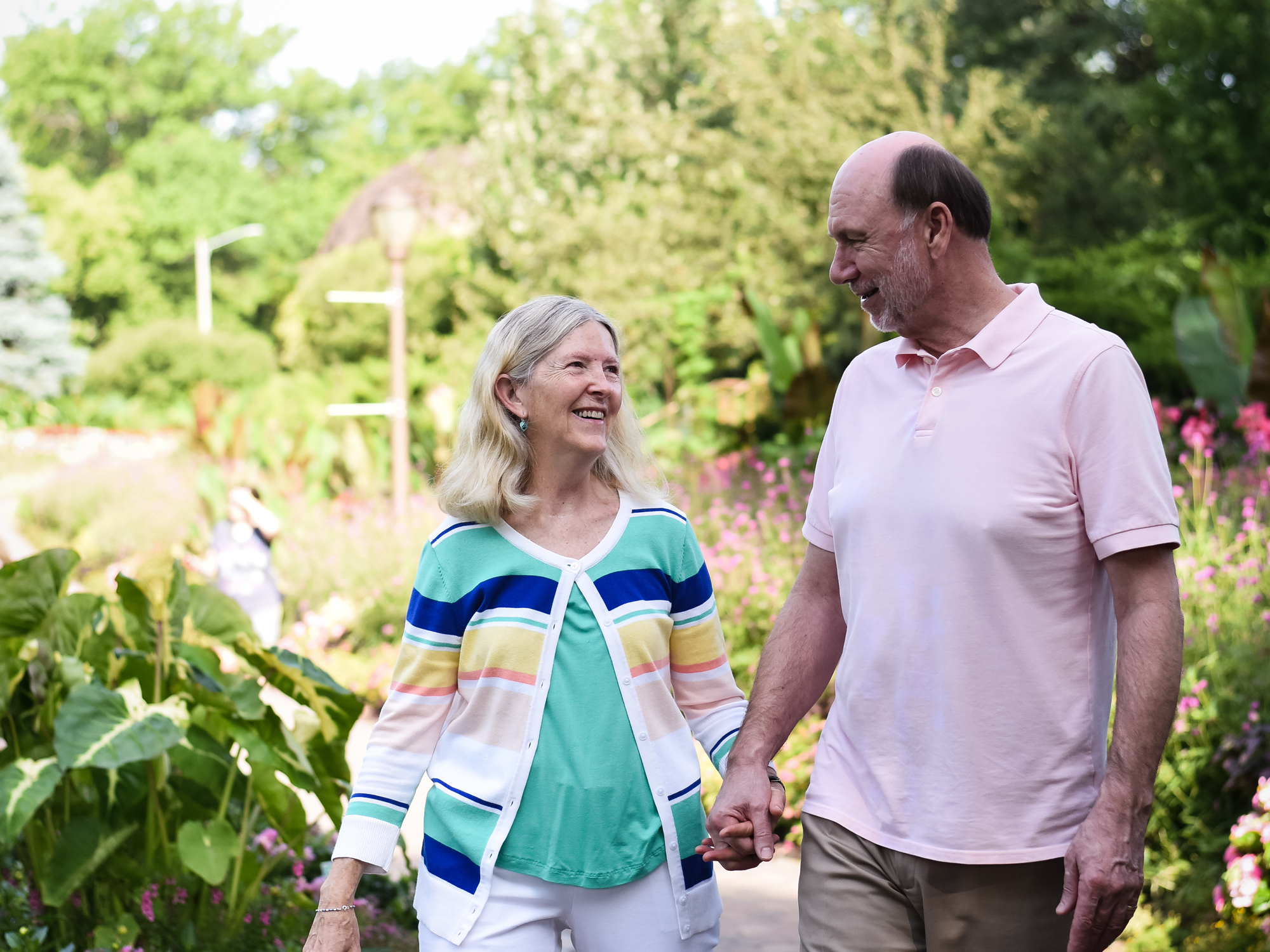
Richard Jones and Willa Foster Jones are compassionate community benefactors who have a distinct message to share about philanthropy: You don’t have to fit any sort of wealthy stereotype to believe in the spirit of giving.
“We are people of moderate means who have budgeted sensibly, believed in the importance of saving and invested wisely,” Rich says. “But we are also responsible citizens who believe in the spirit of community. Lincoln has been good to us, it has given a lot to us, and we want to be givers – not just takers. We believe in investing back into our community.”
Besides, he adds with a smile, “It appears to me that people who give, people who model altruism, seem to have happier lives.”
His wife, Willa, whole-heartedly agrees: “Yes, we live comfortably. But at some point, you ask yourself, ‘How much is enough?’ You can’t take it with you. We determined not to isolate ourselves from the needs of our community.”
So how do you make the best choices when it comes to charitable giving? Rich and Willa went to the Lincoln Community Foundation for guidance and support. They simplified their giving through their donor advised fund which they utilize to make multiple grants to local nonprofits on Give to Lincoln Day. Rich and Willa are also giving to Lincoln forever through planned gifts that make a commitment to our community beyond their lifetimes. They are both recognized as members of LCF’s Legacy Society.
Members of the Legacy Society are generous donors who have named the Foundation as the beneficiary of a future gift through their wills or estate plans. Future gifts to any fund qualify for Legacy Society membership and demonstrate the highest level of trust in the Lincoln Community Foundation.
- • Rich: “The Lincoln Community Foundation knows where the needs are in Lincoln … And they believe in what they do.”
- • Willa: “The Foundation gives us something to aspire to … They are mission driven. They care.”
Both Rich and Willa are talented professional musicians who have found meaningful work throughout their lives. They both teach music (now Zoom classes) through their Foster Jones Studios. Rich has been a member of at least three regional symphonies, has taught music at Nebraska Wesleyan and now handles integrative technology for Wesleyan. Willa has a broad background in music, something of a jack of all trades, but has focused on serving as musical director for several local churches.
As a result of those vocations and avocations, their donations specifically reflect patronage in just those areas: music, educational and religious organizations.
More recently, the couple has also chosen to increase their donations during the past months of the pandemic. “Everyone needs help right now,” Rich says, specifically citing food pantries and health care organizations, neighborhood centers as well as immigrant and refugee populations.
In fact, donation choices for good causes in Lincoln are varied and many, Willa continues. “I really appreciate the joy of giving here. For instance, when we make our choices on Give to Lincoln Day, I am amazed at the diversity in so many different and great charities in this community.”
“There are so many positives to giving,” Rich said, pointing out that their tax accountant adds another dimension to the value of generosity: Planned giving is a wise choice for your budget.
“We are at the age when we must take out annual funds from our savings, and making these kinds of contributions just makes sense,” he says.
But bank books aside, Rich stresses: “If you have ample resources, giving back to your community is simply the right thing to do … I would say it sure helps me sleep better at night.”
Live and Learn featuring Barbara Bartle
Published on Jan 4, 2021Customizing for the Best Fit: Blended Gifts
Published on Nov 23, 2020Have you ever heard of a barndominium? This custom-home concept uses the space available in a barn framework to provide endless and unique modifications designed to fit very particular needs and wants.
Donors looking for similar versatility and customization with their gifts can make a larger gift than would have otherwise been possible by turning to blended gifts, which combine two or more gifts to work together to address their financial situation and charitable goals. Blended gifts can broaden a donor’s philanthropic options as well, including immediate, deferred, and future gifts.
The Appeal of a Blended Gift
A blended gift is not a type of charitable gift, but rather a technique that combines two or more types of gifts that together uniquely address the donor’s financial situation and charitable goals. Finding this “perfect combination” lets donors make a more substantial gift than might otherwise have been possible, which benefits both the donor and the charity. And while there are no limits on possible gift combinations, most blended gifts pair an immediate donation with a future contribution.
With such tremendous flexibility, a donor at almost any age can choose gifts that work best within their own specific parameters—available assets, timing needs, tax considerations, and philanthropic goals. For example, a young, unmarried donor might make an immediate cash gift combined with a testamentary gift. A married donor with family commitments might combine an immediate gift of appreciated securities with a charitable remainder trust. A donor heading into retirement might pair a charitable gift annuity with a testamentary gift.
The first step for any donor seeking to design a blended gift is to understand the available options. Let’s review the most common giving tools along with the benefits they can provide to donors structuring a blended gift.
Immediate Gifts
Many donors want to make an immediate impact on the charities they value and support. This is the most common and straightforward part of a blended gift. For such gifts, deductibility is a consideration for donors who itemize. While most donors understand the charitable income tax deduction, some may need a reminder that they will need a record of the gift in order to take the deduction—and more substantial gifts require even more detailed recordkeeping.
Cash
The most common immediate gift is a simple cash donation to charity. For a cash donation, the donor must maintain a record of the contribution, such as a cancelled check, a receipt, a letter from the charity (showing the charity’s name, the date, and the amount of the contribution), or some other reliable written record documenting the same information.
Property
As the value of the donated property increases, so do the requirements for documenting the donation:
- • Over $500—the donor must include a description of the donated property with the tax return.
- • $5,000 or more—the donor must obtain a qualified appraisal and include an appraisal summary with the tax return. Additional records must be maintained for donations of non-publicly traded stock, certain publicly traded securities, or contributions by a C corporation. The taxpayer must also maintain the general substantiation records required by Treas. Reg. §1.170A-13(b)(2)(ii).
- • Over $500,000—the donor must obtain a qualified appraisal and attach a copy of the appraisal (not just an appraisal summary) to the income tax return for that year.
IRA Distributions
Qualified charitable distributions (QCDs) allow donors over the age of 70½ to make a gift up to $100,000 (aggregate annual amount) from an IRA directly to a qualified charity. This immediate gift does not qualify for a charitable income tax deduction, but the distribution is free of income tax and it counts toward the donor’s required minimum distribution (when one is due).
Deferred Gifts
Some donors can benefit greatly by including a deferred gift in a blended gift combination.
A charitable gift annuity (CGA) is a contractual agreement between the donor and the charity. In return for the donor’s gift, the charity agrees to pay a fixed amount periodically to the person designated by the donor. This is useful for donors who wish to create a steady stream of income. At the end of the payment period, the remainder of the gift goes to the charity.
A charitable remainder trust (CRT) is an irrevocable trust. The donor contributes property to the CRT, the trust makes annual distributions to the donor or other named beneficiaries for a specified period, and when the trust term ends, the trustee pays out everything that remains in the trust to a qualified charity. This is also useful for donors who want to create an income stream—especially when their charity of choice doesn’t offer charitable gift annuities.
A charitable lead trust (CLT) is also an irrevocable trust. However, after the donor contributes property to fund a CLT, the trust makes annual distributions to the named charity for a specified period. In general, the trust may not make payments other than to the charity until the trust terminates, at which point the trustee passes the remaining assets back to the grantor or other named beneficiaries (often the grantor’s children or grandchildren). This is a useful way to give when a donor wants his or her heirs to ultimately retain the assets.
Future Gifts
A blended gift often includes a testamentary gift in a will or a beneficiary designation of a retirement account, life insurance policy, or certain other assets.
Testamentary Gifts
Many people write a will as a fundamental part of estate planning—to dispose of their estate at death, direct their final affairs, or name a guardian for minor children. A will also makes it easy to direct a charitable bequest from the estate.
There are, of course, three types of bequests:
- • A specific bequest is the gift of a specific asset to a particular beneficiary—for example, a donor who gives a particular work of art to a museum.
- • A demonstrative bequest is one that identifies a specific amount of money from a particular source.
- • A general bequest is a gift from the general funds of the estate after all specific and demonstrative bequests have been made. This type of bequest can be a specific dollar amount or a specified percentage of the remaining estate.
When a donor makes a charitable bequest, the gift can be a specific dollar amount, a particular asset, a stated percentage of the available estate, or even the estate residue (what is left after all other payments and bequests have been made).
When making a testamentary gift, the donor and the donor’s legal counsel should make certain to identify the charitable recipient correctly and clearly, using the charity’s correct legal name and address. Clients who believe that “close enough is good enough” can create significant problems, possibly to the extent that the charity is not able to receive the bequest.
Donors and their estates obviously want to benefit from a tax deduction for the charitable gift whenever possible. A bequest made to a qualified charity is deductible by the estate for estate tax purposes if it meets the requirements set out in the Internal Revenue Code (IRC). To qualify for the estate tax charitable deduction under IRC §2055, a bequest generally must be:
- • Included in the decedent’s gross estate,
- • Transferred by the decedent by will, and
- • Made to a qualified charitable organization as defined under estate tax rules.
Of course, the term “qualified charitable organization” generally means any domestic or foreign “corporation or association organized and operated exclusively for religious, charitable, scientific, literary, or educational purposes” that will use the asset exclusively for charitable purposes.
Beneficiary Designations
One of the most efficient methods of adding a future gift to a blended gift is to designate a charity as the beneficiary of retirement assets or an insurance policy. This is an easy, straightforward, revocable gift. The donor fills out the beneficiary form and names the charity as beneficiary. At the donor’s death, the charity receives the assets or proceeds directly since the money does not pass through probate.
The donor has the flexibility to name the charity as the primary beneficiary (to receive the funds first) or the secondary beneficiary (to receive the funds only if the primary beneficiary cannot). The donor can also choose to pass a percentage to the charity and a percentage to heirs.
There is an additional tax benefit to gifting retirement assets to charity and passing other assets to heirs. Neither the donor’s estate nor the heirs will pay tax on retirement assets—the money will pass in full directly to the charity. In contrast, retirement assets left to heirs are considered income in respect of a decedent (IRD) and are taxable both in the estate and to the heirs who receive them.
Example: Carol, age 75, is looking for the best way to support her favorite charity. She wants to make an immediate impact, but worries that making a large gift now might cause her financial problems down the road. Since she’s comfortable enough not to need her required minimum distribution (RMD) from her IRA, she decides to use a qualified charitable distribution (QCD) to donate directly from her IRA to the charity. If she’s able, she can do this in future years, too. However, to make the larger gift that she wants to make, she also chooses to name the charity as the sole beneficiary of her IRA—a gift that she can change in the future if the need arises. Carol’s hope, though, is that at her death, all funds remaining in the IRA will go directly to the charity, undiminished by taxes.
Finding the Right Fit
The rise of online shopping created a corresponding expansion in the software used to help buyers find the best product to fit their needs. Many websites now go to great lengths to help shoppers find the most appropriate merchandise for their personal situation.
As consumers, we have begun to expect this level of customization, so it makes sense that charities would likewise go to great lengths to help donors find the right charitable gifts to fit their personal circumstances and goals. Blended gifts fill this need for customization by offering all the alternatives available in the charitable giving toolbox, letting donors create just the right combination of gifts for the maximum impact and benefit.
Ripples of Good
Published on Dec 22, 2020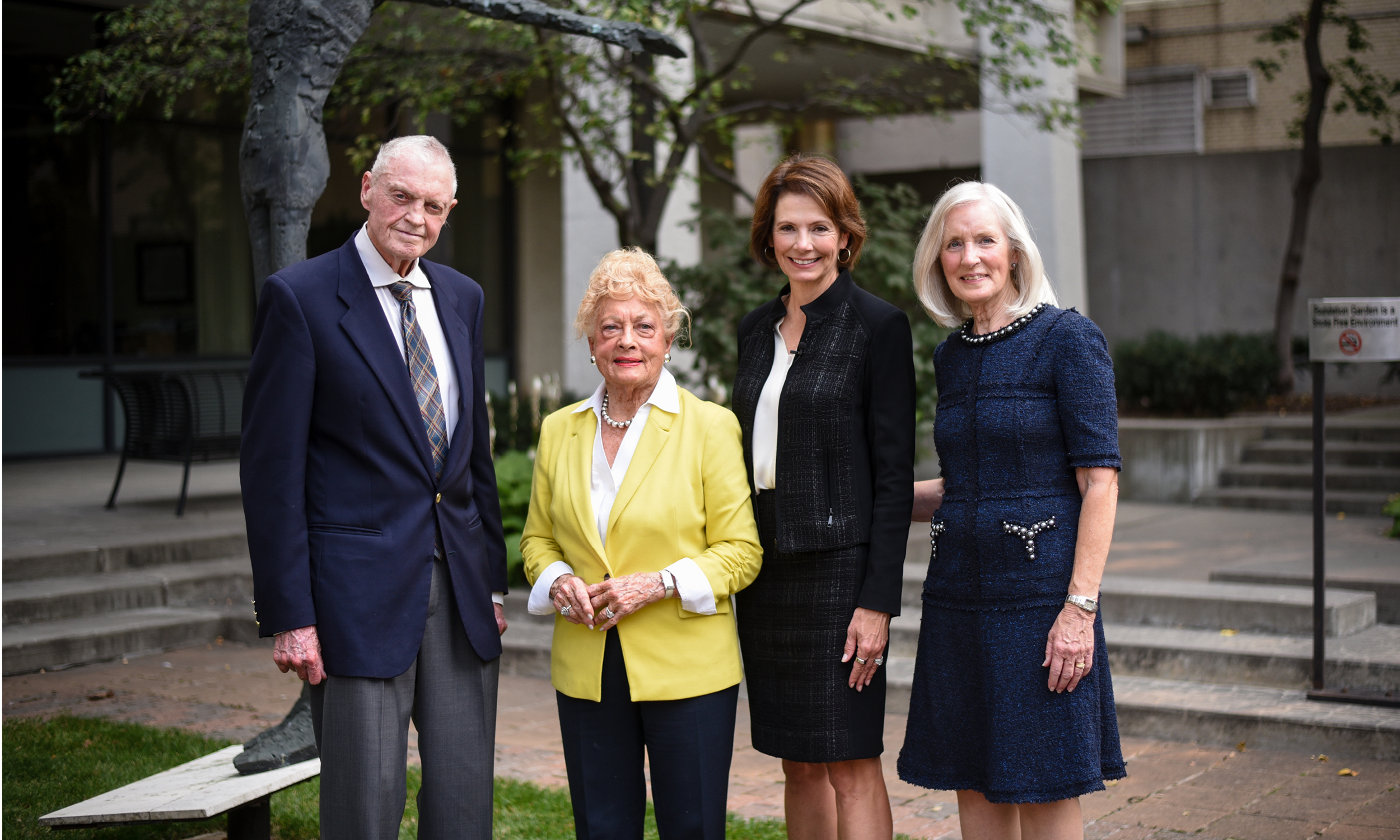
The Lincoln Community Foundation hosted its annual Donor Recognition virtually on October 22, celebrating donors from 2019 who are making Lincoln a better place to live – now and for future generations. The virtual event also included the presentation of the 2020 Charity Award to Duane and Phyllis Acklie on behalf of the community.
“We were thrilled to have more than 8,500 donors make gifts to the Foundation last year,” said LCF President, Barbara Bartle. “You are the people who are planting the seeds for the future of Lincoln.”
The presentation of the 2020 Charity Award followed the donor recognition portion of the event. The Charity Award was created for the community by the Foundation to recognize individuals for their leadership and philanthropy. The Foundation was honored to announce Duane and Phyllis Acklie as the 2020 Charity Award recipients.
“This is a family that stands as a very good example of what a family should be,” said Dr. Tom Osborne, recipient of the 2019 Charity Award. “They are made of the right stuff and they believe in the right things.”
From business to politics, faith to philanthropy, the Acklies have been pillars of the community for decades. They consider their community in the holistic sense and spread this love and kindness to many.
“They are not just focused on a single entity,” said Dr. Darrin Good, President, Nebraska Wesleyan University. “They want to lift up all of Lincoln and beyond by lifting up the people.”
Duane and Phyllis both grew up on farms in Madison County, Nebraska, their fathers both in banking. They purchased Crete Carrier in 1971 and two years later moved its headquarters to Lincoln. Today Crete Carrier is one of the nation's largest privately-owned trucking companies, and the Acklies’ business and philanthropic investments reverberate throughout Lincoln and across the state.
“As I got to know them more as individuals, I gained tremendous respect for the business that they built at Crete Carrier,” said Kim Russel, former CEO, Bryan Health. “They’ve been incredibly generous to organizations like Bryan Health and they are just very humble, very down to earth people.”
After Duane’s passing in 2016, he left a legacy of whole-hearted generosity. Phyllis and the family continue to give back to the community that surrounds them.
“I think their real legacy is the impact on their kids and their grandkids,” said Brian Hastings, CEO/President, University of Nebraska Foundation. “If you look at how selfless and how caring their children and grandchildren are to the community, that is the ultimate testament and ultimate legacy.”
Lincoln Community Foundation Board Chair, Kim Robak, and President, Barbara Bartle, presented the traveling Larry Roots “Charity” sculpture to Phyllis Acklie in the Foundation’s garden this fall. 2019 Charity Award Recipient, Dr. Tom Osborne, was also in attendance.
“On behalf of Duane and myself, I am honored to be recognized in a category with Tom and Nancy
Osborne and all of the earlier recipients of the Charity Award,” said Phyllis Acklie. “Duane and I felt strongly about giving back to the community that gave so much to us as we raised our family and grew our businesses. Thank you.”
The Acklies many contributions have impacted countless individuals and organizations in Lincoln and throughout Nebraska. Their servant leadership is an incredible reminder of the power of philanthropy.
“You meet a lot of people in your life,” said Angie Muhleisen, CEO/President, Union Bank & Trust. “but very few leave a lasting impact. The ripple effect of what Duane and Phyllis have done is going to be felt for generations.”
The full program can be accessed online at LCF.org.
Lincoln Littles Giving Day Set for February 12
Published on Jan 25, 2021Lincoln Community Foundation, in partnership with Lincoln Littles and Nebraska Children and Families Foundation, will host the third annual Lincoln Littles Giving Day on February 12, Abraham Lincoln’s birthday. The giving day will raise funds for tuition assistance, allowing more children from working, lower-income families to access quality early childhood education programs. Launched in 2019 and inspired by the Prosper Lincoln agenda on Early Childhood, the day has raised $1.3 million to assist more than 300 children.
“Access to quality early childcare is essential for our families and critical to Lincoln’s future,” said Barbara Bartle, President of the Lincoln Community Foundation. “Lincoln has come together for the past two years to support Lincoln Littles giving day. With the impact of the pandemic this year, the need is even greater.”
The community can make online donations now through February 12 at 11:59 p.m. at LincolnLittles.org. Donations may also be mailed to the Lincoln Community Foundation, 215 Centennial Mall South, Suite 100, Lincoln, NE 68508. Checks must be written to “Lincoln Community Foundation” with “Lincoln Littles” in the memo line.
The Lincoln Littles initiative strives to create equal opportunities for all children in Lincoln to learn and grow in their early years. Access to high-quality early childhood experiences enables children to be kindergarten-ready and to develop into successful community citizens. The National Chamber of Commerce Foundation says that quality early childhood education is important for today’s workforce as well as preparing the future workforce.
“We are a family of four and my husband lost his job recently. His income was the primary source of income for our mortgage, the cars, preschool, all the big things. When he lost his job my first thought was – what about our kids?” said one parent who received Lincoln Littles tuition assistance. “To say, ‘thank you’ wouldn’t even begin to describe our gratitude for the Lincoln Littles Scholarship we received.”
Matching fund sponsors: Mae Whitmer Early Childhood Fund (Lead Sponsor) – Buffett Early Childhood Fund – Nebraska Children and Families Foundation – Susan Sehnert Stuart – Krieger Family Foundation – Bettenhausen Family Foundation – In memory of Professor James D. Carr – Complete Children's Health – Kile & Virginia Johnson – Labenz & Associates LLC – Drs. Marilyn & David Moore – Nelnet – Helen Raikes in memory of Senator Ron Raikes – Drs. Bob & Lisa Rauner – Sue and Al Saathoff – Donald & Janice Svehla Family – Tom & Susan Tallman – Union Bank & Trust Company – Dr. Eileen & Richard Vautravers – Ross & Judy Wilcox
The Lincoln Community Foundation, established in 1955, strives to continually enrich the Lincoln community by promoting and achieving perpetual philanthropic support. The Foundation has distributed more than $168 million in grants to nonprofit organizations that have improved the lives of thousands of residents.
Lincoln Community Foundation Selected for National Cohort
Published on Jan 28, 2021The Lincoln Community Foundation (LCF) has been selected by the Community Foundation Opportunity Network (CFON) to participate in the inaugural cohort of foundations forming an aligned action network, NEON (Nexus for Equity + Opportunity Nationwide). CFON is a national leadership and action network of 45 community foundations committed to narrowing the opportunity gap in their communities. This work has been the focus of Prosper Lincoln since 2015 with LCF serving as a convener for the community.
“Connecting with fellow foundations to accomplish our work is invaluable,” said Barbara Bartle, President of the Lincoln Community Foundation. “The NEON group is an attempt to take lessons learned in local situations and apply them nationwide. This is an opportunity to elevate the impact of Prosper Lincoln.”
Open only to community foundations, this new cohort was selected for their leadership and standing in their community, track record of evidenced-based strategies resulting in measurable impact and support from donors and other funders. The other selected foundations include: Central Indiana Community Foundation, Cleveland Foundation, Hawaii Community Foundation, Seattle Foundation, and Silicon Valley Community Foundation. Fairfield County’s Community Foundation, Hartford Foundation for Public Giving, and the Community Foundation for Greater New Haven plan to work together as a state-wide consortium.
“These community foundations are highly regarded leaders in their communities, said Terry Mazany, network executive of CFON. “They will serve as exemplars for what we can do together.”
NEON’s long-term objective is to demonstrate the ability for community foundations to work in concert around specific goals and measurements to address poverty and racism and to attract significant national philanthropic investments that will allow this cohort’s results to go to scale across the country. The cohort’s objectives align with Prosper Lincoln’s shared community agenda.
Data from the 2019 Lincoln Vital Signs report show individuals from racial and ethnic minority populations struggle to achieve equity in education attainment, employment, and income in Lincoln. To address these new findings, the goal for Prosper Lincoln has been expanded to dismantle poverty and racism and achieve equity in social and economic mobility.
“We learned from Lincoln Vital Signs that Lincoln is growing stronger in many ways, but at the same time, not everyone is prospering,” said Bartle. “Being a member of the aligned action network will build upon our commitment to increase equity of opportunity in Lincoln.”
The Lincoln Community Foundation, established in 1955, strives to continually enrich the Lincoln community by promoting and achieving perpetual philanthropic support. The Foundation has distributed more than $168 million in grants to nonprofit organizations that have improved the lives of thousands of residents.
Summer 2021 Newsletter
Published on Aug 30, 2021To catch up on the latest Lincoln Community Foundation happenings click here to download the newsletter.
Distinguishing Nonprofits, Tax-Exempt Organizations, and Qualified Charities
Published on Mar 4, 2021Distinguishing Nonprofits, Tax-Exempt Organizations, and Qualified Charities
Nonprofits, tax-exempt organizations, and qualified charities are all entities created to achieve social good. It is possible that an entity could be all three at once, but for the purposes of the Internal Revenue Code (IRC), these are distinct types of organizations.
Nonprofits
As the name indicates, a nonprofit is created for purposes other than generating profit, so no part of the organization’s income can be distributed to its members, directors, or officers. Nonprofit status is conferred under state statute rather than federal law, so the requirements of and benefits to these organizations vary from state to state.[i] As an entity formed under state statute, a nonprofit must follow all state requirements and entity organizational filing requirements.
A tax-exempt organization is a nonprofit that is exempt from federal income taxation—a clear advantage indeed.[ii] To qualify for tax-exempt status, a nonprofit must be organized and operated exclusively for one or more exempt purposes as identified in the Internal Revenue Code. The types of organizations that can claim tax-exempt status are listed in IRC Sec. 501(c).
Qualified charitable organizations
For a donor to receive a charitable tax deduction for a contribution, the charity must not only be tax-exempt, it must be “qualified.” A charity may be qualified for income tax purposes, but not necessarily qualified for gift and/or estate tax purposes—IRC Secs. 170(c), 2522, and 2055(a) individually list the categories of qualified charities that allow a donor to deduct contributions for income, gift, and estate tax (respectively).
501(c)(3) organizations
There are 29 categories of tax-exempt organizations under IRC Sec. 501(c). A 501(c)(3) organization includes any corporation, community chest, fund, or foundation organized and operated for one of these purposes:
- • Religious
- • Charitable
- • Scientific
- • Testing for public safety
- • Literary
- • Educational
- • Fostering athletic competition at the national or international level (if no funds go towards the facilities or equipment)
- • Preventing cruelty to children or animals[iii]
No net earnings generated by a 501(c)(3) organization, in whole or in part, may benefit private shareholders or individuals. Furthermore, the organization is prohibited from participating in political elections or devoting a substantial part of its activities to influencing legislation (by propaganda or otherwise).
To become a 501(c)(3) organization, the charity must meet these IRC requirements and file IRS Form 1023. If the organization files Form 1023 within 27 months after the end of the month of legal formation and the IRS approves the filing, the organization’s tax-exempt status will be retroactively recognized to the date of formation.[iv] If the organization files Form 1023 after 27 months, the tax-exempt status will only be recognized starting at the date of IRS approval.
Income Tax Deductions for Gifts to Qualified Charities
Donors make charitable donations for any number of reasons—a personal connection to the charity, a desire to help a specific cause, a family tradition of support or a tradition of charitable giving in general. Though it may not be the primary reason donors give, the income tax charitable deduction plays a role in philanthropic decisions and is the nexus between philanthropic intentions and tax planning.
Under IRC Sec. 170(c), a contribution or gift must be to or for the use of:
- • The United States, a State, a possession of the United States, or any political subdivision, or the District of Columbia, but only if made for public purposes
- • A corporation, trust, or community chest, fund, or foundation organized for religious, charitable, scientific, literary, or educational purposes, or to foster national or international amateur sports, or for the prevention of cruelty to children or animals
- • A post or organization of war veterans
- • A domestic fraternal society, order, or association, operating under the lodge system, but only if contributions are used exclusively for religious, charitable, scientific, literary, or educational purposes, or for the prevention of cruelty to children or animals
- • A cemetery company owned and operated exclusively for members and not for profit, with no part of the earnings benefitting any private shareholder or individual
50% or 30%? That Is the Deductibility Question
Not every charitable contribution will be deductible in the same way for income tax purposes. There are distinctions to draw between the deductibility of contributions made to a 50% organization as opposed to a 30% organization.
50% organizations are the qualified charities expressly described under IRC Sec. 170(b)(1)(A):
- • Churches
- • Hospitals and medical research organizations
- • Educational organizations
- • Governmental units
- •Publicly supported charities
- •Certain private foundations
- •Supporting organizations
Concerning Publicly Supported Charities
There are two ways that an entity may be considered a publicly supported charity for purposes of IRC Sec. 170(b)(1)(A):
1. A charity that normally receives a substantial part of its support from governmental units and/or direct or indirect contributions from the general public. This support does not include income received in the exercise or performance of its tax-exempt purpose.[v]
2. A charity that normally receives more than one-third of its support annually from any combination of gifts, grants, contributions, or membership fees and gross receipts from admissions, sales of merchandise, performance of services, or the furnishing of facilities in an activity which is not an unrelated trade or business, and normally receives not more than one-third of its support from gross investment income and net unrelated business taxable income.[vi]
30% organizations are all the qualified charities not described under IRC Sec. 170(b)(1)(A). Generally speaking, this refers to private foundations as defined under IRC Sec. 509(a).
Deductibility Distinctions
A fundamental understanding of the differences between a 50% organization and a 30% organization provides the basis for looking at how donors may deduct charitable contributions. For the sake of clarity, 50% organizations and 30% organizations will be referred to as public charities and private foundations, respectively.
The contribution base is the donor’s adjusted gross income without regard to any net operating loss carryback to the taxable year.[vii]
Cash Gifts
- • A cash contribution to a public charity is deductible up to 60% of the donor’s tax contribution base. The Tax Cuts and Jobs Act of 2017 increased this from the original 50% for any taxable year beginning after December 31, 2017, and before January 1, 2026.[viii] Starting January 1, 2026, a cash contribution to a public charity is scheduled to revert to being deductible up to 50% of the donor’s tax contribution base.[ix] The Coronavirus Aid, Relief, and Economic Security (CARES) Act allowed individuals to deduct cash gifts to public charities up to 100% of their adjusted gross income in 2020, and the recently passed stimulus package has extended that for 2021.
- • A cash contribution to a private foundation is deductible up to 30% of the donor’s contribution base.[x]
Property Gifts
- • A contribution of property to a public charity is deductible up to 30% of the donor’s tax contribution base.[xi] Appreciated property is deductible at its full fair market value if the sale of the property would have resulted in long-term capital gain.[xii]
- • A contribution of property to a private foundation is deductible up to 20% of the donor’s contribution base.[xiii] It is deductible only at its tax basis as ordinary income property,[xiv] with one significant exception—a gift of qualified appreciated stock (defined as publicly traded stock that would produce long-term capital gain if sold) can be deducted at its fair market value.[xv]
An Option When Giving to a Public Charity
A donor who gives appreciated property to a public charity may choose to value the property at its income tax basis rather than its fair market value, as if the donor were giving the property to a private foundation rather than a public charity. In doing so, the donor gains the advantage of deducting the contribution at 50% of his or her tax contribution base as if it were a gift of cash.[xvi] This would be a sensible choice if the property had little appreciation and/or the donor wanted to deduct a greater percentage of the contribution base in that particular tax year.
Gifts “for the use of” a Charity
In most instances, a donor makes a gift directly to a charity. However, occasionally a donor may make a gift “for the use of” the charity instead. A gift made for the use of a charity has the same applicable percentage limitations as those for 30% organizations.[xvii]
For example, Alicia owns a life insurance policy, which she gives to her favorite charity. Alicia still owes a few additional premium payments on the policy, but she is concerned about making a gift that will require the charity to make a payment. To further benefit the charity, Alicia decides to make the necessary premium payments herself.
- • If Alicia sends a check in the amount of the premium to the charity, that is a gift to the charity, subject to the 60% limit (as previously noted).
- • If Alicia sends a check for the premium directly to the insurance company, that is a gift for the use of the charity, and therefore subject to the lower 30% limit.
Back to the Basics
Because of COVID-19, many of us have spent more time at home than ever before. More people are spending time cooking and baking from scratch, creating their own at-home fitness routines, even tackling home improvement projects. In many areas of life, we are rediscovering the fundamentals of doing things on our own.
In the spirit of returning to basics, advisors can also take their professional lives “back to the basics” by revisiting the fundamental concepts of charitable organizations. After all, this foundational knowledge holds the key to using techniques and planning tools that will best benefit charitably inclined clients.
[i] The first resource for researching nonprofit law will be the state statues of the state in which the entity is organized. Another resource may be the Revised Uniform Unincorporated Nonprofit Association Act—a law promulgated by the National Conference of Commissioners on Uniform State Laws—which governs all unincorporated nonprofit associations that are formed or operate in a state that adopts the Act.
[ii] IRC Sec. 501(a).
[iii] Reg. Sec. 1.501(c)(3)-1.
[iv] IRC Sec. 508.
[v] IRC Sec. 170(b)(1)(A)(vi). There are two tests to determine if a charity normally receives a substantial part of its support from governmental units and/or contributions from the general public. Meeting either test qualifies the charity. One, the charity normally receives at least one-third of its total support from governmental units and/or the general public. And two, the support from governmental units and the general public is at least 10% of the organization’s total support, and the charity is organized and operated so as to attract new and additional support from the government and the general public, and the charity can show a substantial degree of public support by various sources of support, the breadth of interests represented by the governing body, and the availability of public facilities and services.
[vi] IRC Sec. 170(b)(1)(A)(viii). See also IRC Secs. 509(a)(2) and (3).
[vii] IRC Sec. 170(b)(1)(G).
[viii] IRC Sec. 170(b)(1)(G).
[ix] IRC Sec. 170(b)(1)(A).
[x] IRC Sec. 170(b)(1)(B).
[xi] IRC Sec. 170(b)(1)(C)(i).
[xii] IRC Sec. 170(b)(1)(C)(iv).
[xiii] IRC Sec. 170(b)(1)(D)(i).
[xiv] IRC Sec. 170(e)(1)(B)(ii).
[xv] IRC Sec. 170(e)(5).
[xvi] IRC Sec. 170(b)(1)(C)(iii).
[xvii] Reg. Sec. 1.170A-8(a)(2).
Lincoln Littles Giving Day Set for February 9
Published on Jan 20, 2022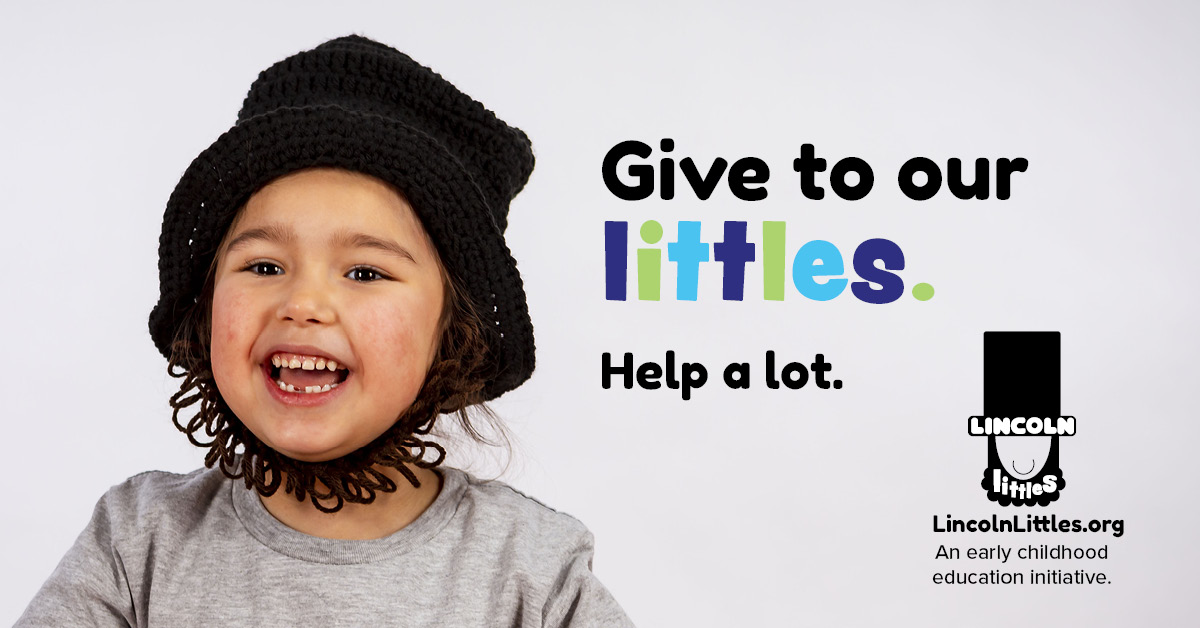
Lincoln, NE – Lincoln Community Foundation, in partnership with Lincoln Littles and Nebraska Children and Families Foundation, will host the fourth annual Lincoln Littles Giving Day on February 9. The giving day will raise funds for tuition assistance, allowing more children from working, lower-income families to access quality early childhood education programs. Launched in 2019 and inspired by the Prosper Lincoln agenda on Early Childhood, the day has raised $2.4 million to assist more than 400 children.
“These past two years have amplified how important it is for our children and our workforce to have quality early childhood education opportunities,” said Alec Gorynski, president of the Lincoln Community Foundation. “As a working parent myself, I appreciate the value of reliable childcare. Our community is facing unprecedented workforce challenges and ensuring every family can access childcare is one way we can address this issue.”
The community can make online donations now through February 9 at 11:59 p.m. at LincolnLittles.org. Donations may also be mailed to the Lincoln Community Foundation, 215 Centennial Mall South, Suite 100, Lincoln, NE 68508. Checks must be written to “Lincoln Community Foundation” with “Lincoln Littles” in the memo line.
“Every child in Lincoln deserves quality early education,” said Anne Brandt, executive director of Lincoln Littles. “Unfortunately, due to the economic impact of the pandemic, not every child, family, or childcare worker is feeling stable right now.”
The Lincoln Littles initiative strives to create equal opportunities for all children in Lincoln to learn and grow in their early years. Access to high-quality early childhood experiences enables children to be kindergarten-ready and to develop into successful community citizens. The National Chamber of Commerce Foundation says that quality early childhood education is important for today’s workforce as well as preparing the future workforce.
Matching Fund Sponsors: The Buffett Early Childhood Fund, Acklie Charitable Foundation, Harbor of Dreams, Inc., Mae Whitmer Early Childhood Fund, Bettenhausen Family Foundation, Drs. Bob & Stacie Bleicher, Rosalind K. Carr in memory of Professor James D. Carr, Shirley & Jerry Daugherty, Kile & Virginia Johnson, Kawasaki Motors Manufacturing Corp., U.S.A. Good Times Foundation, Kidwell Electric, Inc., Lincoln Industries, Robert & Cynthia Milligan, Drs. Marilyn & David Moore, Nebraska Children and Families Foundation, Drs. Bob & Lisa Rauner, Sue & Al Saathoff, Rhonda Seacrest, Dr. Bob & Dottie Shapiro, Tom & Lisa Smith, Tom & Susan Tallman, Temme Family Foundation, Sue & Ed Tricker, Dr. Eileen & Richard Vautravers and Ross & Judy Wilcox.
The Lincoln Community Foundation, established in 1955, strives to continually enrich the Lincoln community by promoting and achieving perpetual philanthropic support. The Foundation has distributed more than $195 million in grants to nonprofit organizations that have improved the lives of thousands of residents.
Spring 2022 Newsletter
Published on May 11, 2022To catch up on the latest Lincoln Community Foundation happenings click here to download the newsletter.
Cryptocurrency: What if your clients own it and you don’t think they should?
Published on Sep 6, 2022
Most advisors exercise extra caution when advising clients about cryptocurrency. Indeed, 68% of investment fund executives surveyed do not believe it is a good idea for their clients to own cryptocurrency in the first place. Still, according to some sources, 43% of clients hold cryptocurrency in their portfolios.
If you’re among the advisors who routinely caution clients about investing in cryptocurrency, what is the best way to navigate conversations with clients who are among the 43% who already own it?
In a case like this, consider talking with your client about giving cryptocurrency to a family fund at the Lincoln Community Foundation or other public charity. Gifts of cryptocurrency are similar to gifts of other highly-appreciated assets, including the documentation required to substantiate value. Be aware, though, that the IRS is watching cryptocurrency closely and considers it an area of potential underreporting and abuse. Recently, for example, for the very first time the IRS has targeted a cryptocurrency trading platform with a subpoena-like process to gather information about possible abusive transactions.
As cryptocurrencies’ profiles rise in the marketplace, the team here at the Lincoln Community Foundation is happy to work with you and if you determine that your community-minded clients should make a gift of their crypto holdings, we are here to help facilitate the gift.
Food Bank of Lincoln: Tears and gratitude in times of crisis
Published on Apr 9, 2020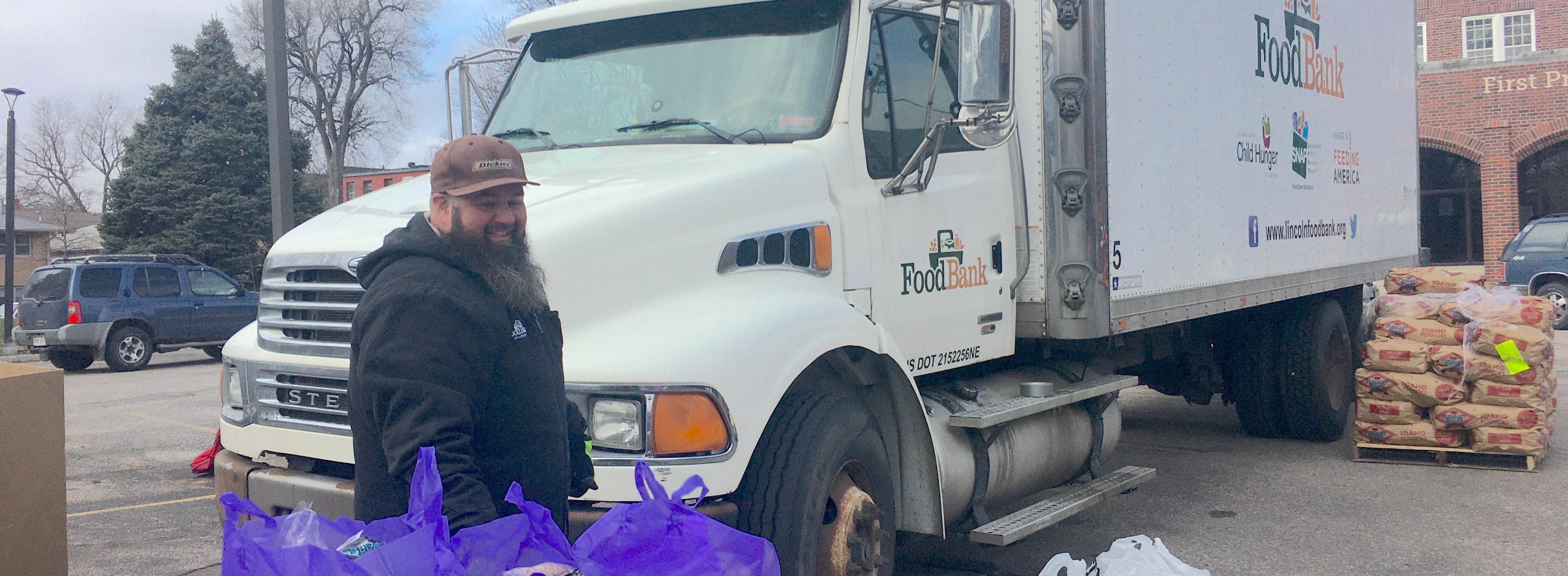
Last week the Food Bank of Lincoln held a special drive-through distribution, sharing hundreds of pre-packed bags of food. But they had such long lines, they were forced to extend the time slot by two hours.
“There was a lot of gratitude and tears in those cars,” said Scott Young, executive director of the community’s Food Bank. “So many people are only one-degree separation from financial disaster right now.”
Feeding America researchers project a 45 percent increase in Americans facing food insecurity in coming months as a result of COVID 19: People who already face daily hunger, but also those who have never faced it before.
“People are losing their jobs, face furloughs, people have so suddenly been thrust into a crisis situation,” Young said. “There’s indeed a generosity here, Nebraska strong. We’ll need it. We are sprinting right now, but this is definitely a marathon.”
The Food Bank will use Lincoln Community Foundation’s COVID19 Response funds to cover dramatically increasing food demands, as well as to pay additional labor costs.
For more information on the Lincoln COVID-19 Response Fund and to make a donation, click here.
Good Neighbor Community Center: Delivering food and hope
Published on Apr 9, 2020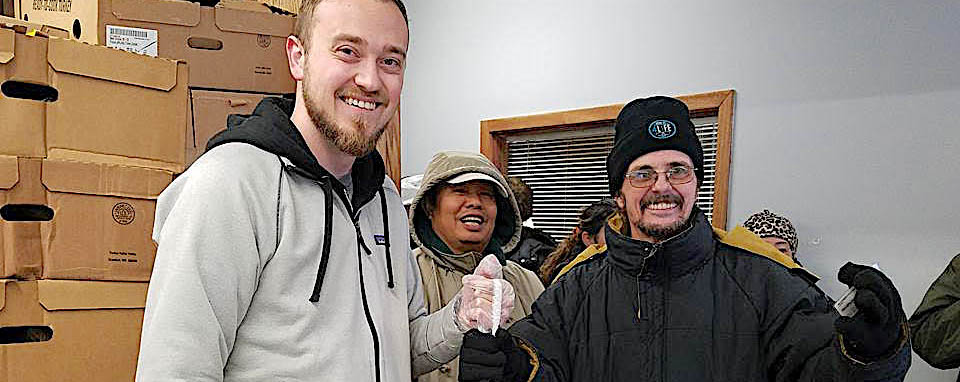
This week the Good Neighbor Community Center steered their van in the direction of hope, making the first door-to-door food delivery to a homebound woman in a wheelchair whose pantry was sparse.
“Once she saw the food on her porch she was really excited, and our staff was all smiles,” said Tom Randa, executive director of the Community Center.
That’s what the Lincoln COVID-19 Response funds mean to Good Neighbor families. “We can stock up on our dwindling food pantry, and then we can bring that food to our most vulnerable. We wanted to focus on the greatest need right now, and that means reaching out to families who cannot get to us.”
The Good Neighbor Community Center serves low-income people as well as offering services to many immigrants from the Middle East and North Africa.
“These are terrible times for many of our families,” Randa said. “They are confused about the future. Most of them have already lost jobs, they are worried about rent and utility bills. How will they feed their families? Well, we can make sure those pantries are full.”
For more information on the Lincoln COVID-19 Response Fund and to make a donation, click here.
Barnabas: Feeding Bodies and Souls
Published on Apr 9, 2020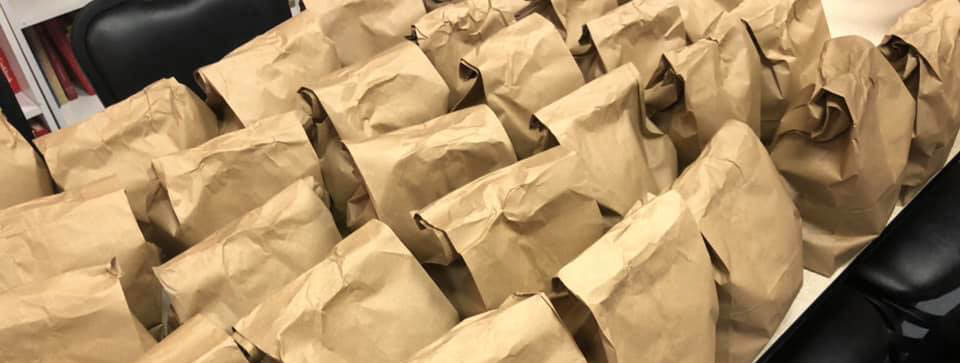
After advertising a Barnabas Community meal on Facebook, director Dwight Thiemann got a message from a man named Jim. “I have no way of getting there, but it sure looks good.” His words led to a new relationship between Barnabas and Oasis Inn, whose long-term residents include families that are struggling. “They were so excited about the meals,” Thiemann said.
Just last week, a new face found its way to Barnabas, which is located near 11th and Cornhusker. The man had lost his job and was living under a bridge.
“He came for the first time and was so thankful,” Thiemann said. Before he left with the food, Barnabas volunteers had given him a warm coat and some blankets, as well.
“Those who are already down are struggling more,” Thiemann said. “The pandemic just exacerbates an already tough situation.”
Thiemann said the Barnabas Community will use COVID-19 Relief Funds to buy food and to-go containers, so that their guests can take the home-cooked meals with them. And when the pandemic is over? “We hope folks will come back, sit down with each other and join us in community.”
For more information on the Lincoln COVID-19 Response Fund and to make a donation, click here.
Disaster philanthropy: Your clients and the important role of individual philanthropy
Published on Oct 6, 2022
Sadly, your philanthropic clients have likely grown accustomed to making charitable donations to support disaster relief. Individual donations provide critical resources to help communities recover from the many disasters–weather, fire, humanitarian, disease, war–that occur each year.
In the wake of Hurricane Ian, your clients may ask you about their options to support those affected by the storm. We encourage you to reach out to the team at the Lincoln Community Foundation. We can connect your donors with a variety of options for giving that are trustworthy and effective. Indeed, disaster relief funding is frequently coordinated by community foundations, which are widely viewed as one of the very best vehicles to help donors provide financial support to relief efforts. Individual giving is critically important to any disaster relief effort, and LCF can help your clients make an immediate, powerful, and positive impact on the lives of those affected by Hurricane Ian or any disaster.
Especially heartwarming is that many donors are now exploring ways to help improve a community’s readiness for disaster response, including building reserve funds for future disaster relief and bolstering emergency preparedness infrastructure for medical care, food, clothing, and shelter delivered by a network of local, on-the-ground nonprofit organizations. We are happy to work with your clients to establish field-of-interest funds or unrestricted funds at LCF to ensure that the people in our community remain as safe and supported as possible when disaster strikes. Disaster-preparedness field-of-interest or unrestricted funds at the community foundation can be especially attractive because these funds are qualified recipients of QCDs (Qualified Charitable Distributions) from clients’ IRAs.
We look forward to helping your clients improve the lives of those affected by disasters both here in Lincoln and across the nation and world.
It’s a big deal: Answering clients' questions about GivingTuesday
Published on Nov 2, 2022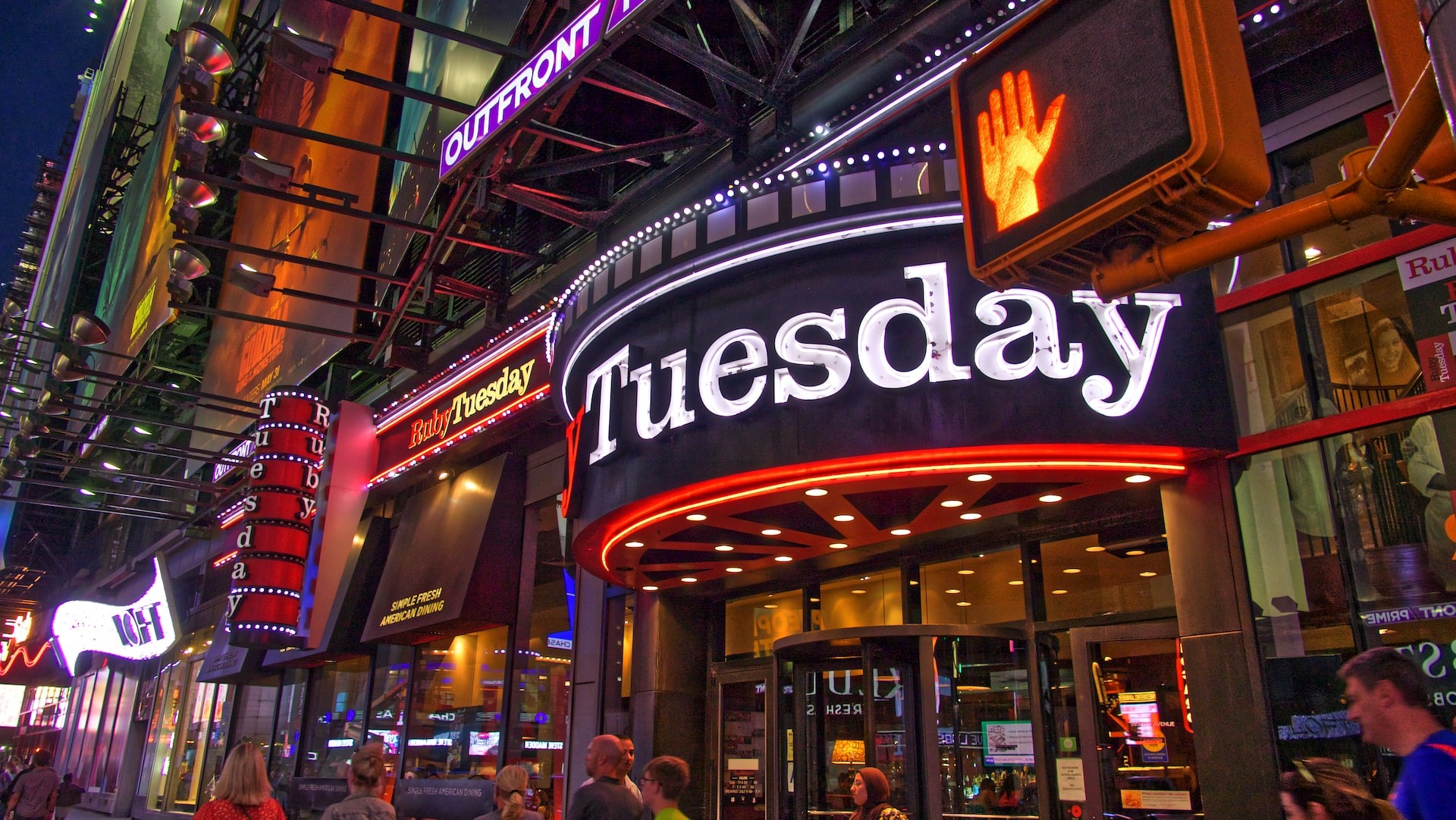
Among the many client questions you and other attorneys, accountants, and financial advisors can be prepared to answer as year-end approaches is, “What is Giving Tuesday? And why the hashtag that often precedes it in print or online?”
Giving Tuesday–or “GivingTuesday” to be more accurate–has become a philanthropic phenomenon of sorts, generating support and enthusiasm from a wide range of people and institutions. Many of your clients are likely reading about GivingTuesday in the media, especially after the Gates Foundation recently announced its $10 million gift to support the effort.
Celebrating 10 years in 2022—and vastly different from both the Black Friday and Cyber Monday that it follows—GivingTuesday is a day of generosity. Generosity of time, effort, money, concern or any other well-intended act of giving.
Facts about GivingTuesday:
–Started in 2012.
–More than a day, GivingTuesday is a movement and an organization.
–Founded at New York’s 92nd Street Y and celebrated globally.
–Falls on the first Tuesday following Thanksgiving, always.
–Though not strictly a fundraiser, money “moved” has grown from $28 million in 2013 to $2.7 billion in the U.S. in 2021.
Clients typically get involved in GivingTuesday by supporting their favorite charitable organizations. Many nonprofits promote GivingTuesday as an important source of funds for their organizations, and they frequently encourage their donors–your clients–to give via cash, check, online or even via cryptocurrency. Your clients also can participate in GivingTuesday by recommending grants from their donor-advised funds to favorite organizations.
Far beyond simple acts of benevolence, GivingTuesday is steeped in the idea of “radical generosity,” which the organization describes as giving to create systemic change, or to “recognize that we each can drive an enormous amount of positive change by rooting our everyday actions, decisions and behavior in radical generosity—the concept that the suffering of others should be as intolerable to us as our own suffering. Radical generosity invites people in to give what they can to create systemic change.”
Beyond monetary donations, systemic change comes from participating in activities like social media advocacy (the # in #Giving Tuesday that creates ripple-effect awareness online), sharing love, spreading kindness, supporting a food pantry, shopping local or hosting a food or coat drive.
Strong year-end giving in a bear market: Donor advised funds come in handy
Published on Nov 2, 2022
Giving appreciated stock to charitable organizations is certainly a highly-effective tax strategy. During years when highly-appreciated stock is in short supply, however, implementing this strategy may be easier said than done.
This is when donor advised funds come in especially handy. Now is the time to discuss charitable giving with those clients who regularly added to their donor advised funds throughout the market’s long bull run. If these clients intend to ride out today’s market conditions in their personal portfolios, this year’s bear market doesn’t mean the clients’ year-end charitable giving has to take a hit. These clients can use their donor advised funds to support their favorite organizations, sometimes even at levels consistent with prior years.
Similarly, for some clients, this may be a year to consider contributing cash to a donor advised fund instead of donating highly-appreciated stock (which has been the go-to gift for so many of the last several years). Gifts of cash could reduce the burden on a client’s personal stock positions that may have fallen in value dramatically, giving these positions more time to recover value and, at some point in the future, be contributed to a donor advised fund at a higher value (thereby resulting in a higher tax deduction for the client).
Now may also be a good time for clients to consider using their cryptocurrency in creative ways to meet their charitable giving goals. Clients holding cryptocurrency may have come to the conclusion that it does not necessarily provide the protection against inflation they thought it would. A client could, for instance, sell their cryptocurrency at a loss and contribute the cash to their donor advised fund. Then, the client can keep an eye on the cryptocurrency market and decide when–or whether–to wade back in.
Finally, consider encouraging your clients who’ve not yet established donor advised funds at the Lincoln Community Foundation to consider doing so now. Not only does a donor advised fund help organize charitable giving, but over the long term it can also protect a client’s ability to support favorite charitable organizations even when market conditions are rough.
The philanthropy services team at LCF is always happy to help your clients maximize both the philanthropic and financial elements of their charitable giving strategies. We look forward to hearing from you.
Spotting opportunity: Moving from a commercial fund to the community foundation
Published on Oct 4, 2023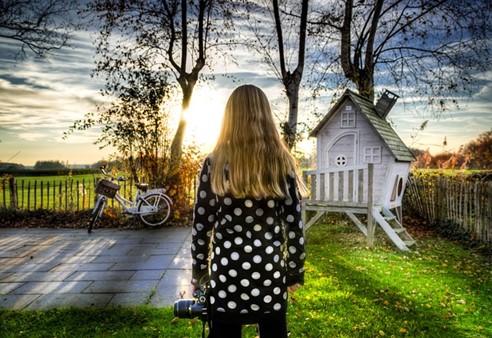
Although a donor advised fund, which is becoming a more and more popular charitable planning tool, can be established through a national financial institution, the Lincoln Community Foundation offers its donor advised fund holders broader services, more personal attention, and deeper connections to the nonprofits whose work is essential to effecting positive community change. Unfortunately, many attorneys, accountants, and financial advisors are simply not aware that a donor advised fund established at LCF is in many cases a far better fit for their clients than a donor advised fund set up at a “commercial gift fund.”
As you meet with your clients about year-end planning, be sure to ask whether they’ve established a donor advised fund and if so, where it’s housed. If a client’s donor advised fund was established through a national provider, please give us a call. We would be happy to talk with you and your client about the ease and benefits of moving the donor advised fund to LCF.
The Lincoln Community Foundation offers donor advised fund holders the same tax and administrative benefits as a commercial gift fund, including:
–Online access to the donor advised fund to view balances, contributions, and grants
–Simple process for requesting grants to favorite charities
–Streamlined tax reporting, often represented by just one letter to provide to an accountant at tax time, even when the donor advised fund is used to support dozens of individual charities throughout the year
–All back-office administration, tax receipts, recordkeeping, and other requirements for the donor advised fund’s 501(c)(3) status
–Favorable tax-deductibility of contributions to the fund
Unlike standard commercial gift funds, though, the Lincoln Community Foundation offers high-level, customized services to its donor advised fund holders, including:
–Concierge-level service by knowledgeable staff to structure estate gifts to charities and accept gifts of appreciated stock or complex assets such as real estate or closely-held stock
–In-house experts who have a finger on the pulse of community needs, the strengths of specific nonprofits, and how to structure grant making for the highest possible community benefit
–Opportunities to collaborate with other donors who care about similar issues and forums to tap into local and national subject matter experts
–Opportunities to go deep into specific issue areas, both through education and hands-on involvement
–Assistance with structuring and measuring the impact of grants
–Family philanthropy and corporate giving services to foster a well-rounded, holistic approach to philanthropy
–Administrative fees that are reinvested into the Lincoln Community Foundation, a 501(c)(3) public charity itself, to help support operations, grow our mission, and help even more donors support the causes they care about
--Sponsorship of Give to Lincon Day, supporting all nonprofits in the community and grant processing from donor advised funds without any administrative fees
--No-fee options for uninvested donor advised funds
–Hands-on assistance from local experts who understand both local and distant needs, and welcome the opportunity to research and identify causes aligned with donors’ goals and priorities
–Staff members who live in the community they serve and often personally know the leaders and staff of grantee organizations and regularly hear about their needs first-hand
Keep an eye out for clients’ donor advised funds at commercial gift funds. You’ll be doing a tremendous service for your client, and you’ll be helping our community. You will also be fulfilling your own professional responsibilities by exploring the opportunity for a client to move a donor advised fund to the Lincoln Community Foundation. At LCF, hard-earned assets receive the attention they deserve as your clients strive to make a difference in the causes they care about the most.
Donor advised funds: Recommended reading
Published on Mar 6, 2024
On an ongoing basis, the team at LCF tracks legislation, legal developments, trends, news, and innovative strategies for all types of charitable giving so that we can keep fund holders and their advisors up to date.
Recently, donor advised funds have been the subject of conversation within financial and estate planning circles, as well as a trending topic in philanthropy, related to a set of proposed regulations issued by the IRS late last year. The IRS has scheduled public hearings on the proposed regulations, set for May 6, 2024.
As just one of many types of funds your clients can establish at LCF, the donor advised fund is popular because it allows your client to make a tax-deductible transfer of cash or marketable securities that is immediately eligible for a charitable deduction. Then, the client can recommend gifts to favorite charities from the fund to meet community needs as they emerge.
Our team has compiled a list of articles we’d recommend if you’d like to dig deeper into the topic of donor advised funds. Of course, we welcome your questions and comments, so please reach out anytime!
–The Donor Advised Fund Research Collaborative’s recently-released study of donor advised funds reported that the majority of donor advised funds make at least one grant per year, and the national average annual “pay-out rate” for all donor advised funds is 18%. Donor advised funds are frequently deployed as a tool to help philanthropists who have a wide range of financial capacity, from a little to a lot, organize their charitable giving; consistent with that function, the study found that nearly half of all donor advised funds carry balances less than $50,000.
–The proposed IRS regulations related to donor advised funds are attracting significant interest in legal circles. To dig into the legal issues, you might check out this article in Financial Advisor because it includes commentary from professionals in the field, as well as this article if you are a Bloomberg subscriber. You can also check out the Council on Foundations’ comments for additional insight.
–For a big-picture look at the state of donor advised funds, including the relevance of recent research and the status and implications of the proposed regulations, check out this article in Wealth Management and this article in Think Advisor.
While these materials are useful to gain an understanding of the current situation, at this point, no one can predict what will happen with the proposed regulations--whether and how they will be revised or when they might become effective, if ever. As always, our Philanthropy Services Team is staying on top of the issues. We’ll keep you posted!
People’s City Mission: On a mission to serve
Published on Apr 16, 2020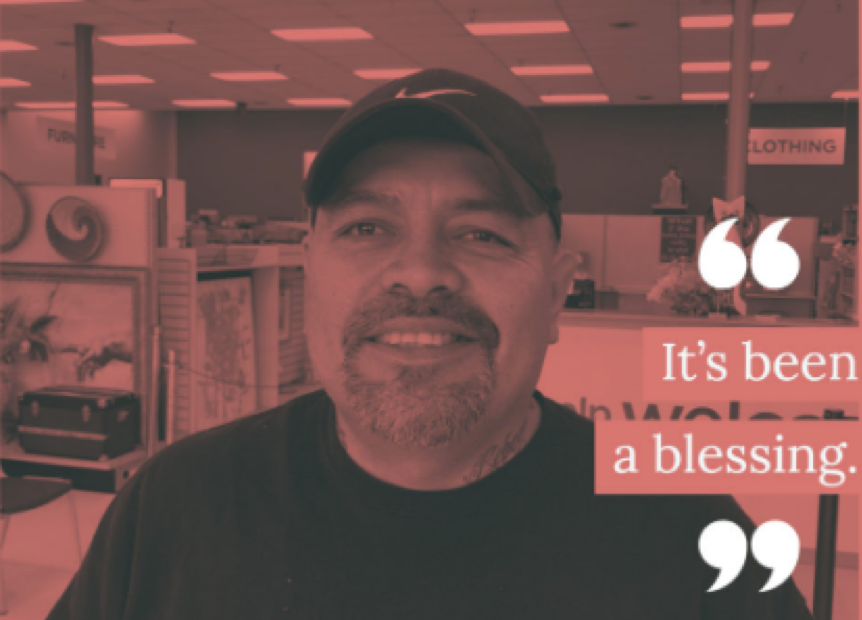
The number of homeless individuals and families will increase. “It’s like being on a cruise ship, except our guests don’t have their own rooms and a third of them have underlying conditions. It’s a dangerous place right now, more so than a nursing home.” That’s how Pastor Tom Barber describes the situation at the People’s City Mission these days. Because of its layout, it’s hard to be socially distant at the mission.
“It’s a big challenge. Every day, there are new issues.” Guests wipe down the facility with bleach 3 times a day and practice good hygiene, while staff members take guests’ temperatures before dinner. “People are more nervous. Everyone’s more cautious and careful.”
As a result, Barber said staff are doing a lot more counseling. Being homeless is stressful enough. Add in a pandemic and it’s amplified.
The pandemic has been especially hard on volunteers, a group the mission relies upon. Barber said volunteer numbers are down 80 percent right now. For a place that served 28,000 people at its shelter and drop-in sites last year, that loss of help is palpable.
Money from the Lincoln COVID-19 response fund will help address some of the People’s City Mission most immediate needs. “We appreciate the help,” said Barber, who noted that the mission costs about $25,000 a day to run.
For more information on the Lincoln COVID-19 Response Fund and to make a donation, click here.
YAZDA: Helping their community find their way
Published on Apr 16, 2020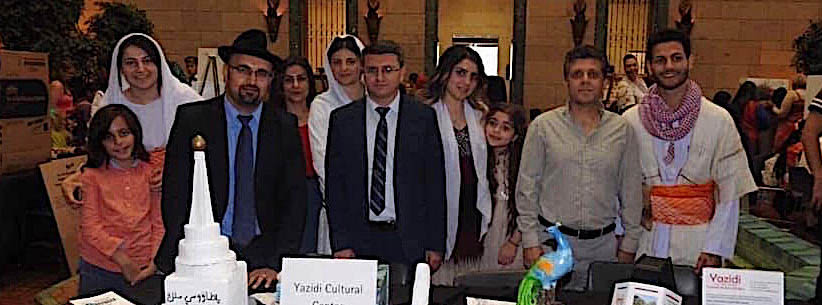
Many Yazidis in Lincoln are a bit lost right now. They often don’t speak English and are floundering to grasp what is happening in the face of the pandemic. They are worried about the well-being of families here, but also about loved ones back home in refugee camps in Iraq where a viral outbreak would be tragic.
“Our job is to untangle their confusion,” said Laila Khoudeida, a member of the community Yazda group – and an active participant in the Yazidi Cultural Center.
“First we must concentrate on making sure Yazidis understand the current crisis and how they should protect themselves and their families,” she explained. “Then we must help them find health and economic assistance, food stamps, unemployment assistance and other resources. They need support in working out what is happening with school closure and online teaching.”
The Lincoln COVID-19 Response funds will help the Cultural Center strengthen the communication network that guides families through these challenges and demands.
“The financial support is amazing. It makes us feel like we are all trying to help each other. People are adrift, they need guidance through this crisis, they need to know someone is here to help them. And we are.”
Salvation Army: Helping families retain their dignity
Published on Apr 16, 2020
Last week the Salvation Army of Lincoln sent out a call. They had extra food available. More than 100 families showed up and lined up.
“You know, it was something of a miracle,” according to Major Mark Anderson, chief administrator for the Salvation Army in Lincoln, “We actually had enough to go around.”
The Lincoln COVID-19 Response funds will mean there is much more to go around. “These funds are a really big deal. Our doors will remain unlocked and open … We can provide diapers, household items, gas and laundry vouchers, clothing, bus passes and rent assistance …We can help families navigate unknown waters and give them a brighter day. We can help them keep their serenity and their dignity.”
Over the past weeks, the Salvation Army has seen a 40 percent increase in new applications. “And we are seeing individuals who would not normally come through our doors. Food and financial insecurities are a heartbreaking struggle that is affecting the Lincoln community.”
And this is only the beginning. “People are managing horrendous situations, knowing there is more hardship to come. This allows us to give them a hand-up, not a handout.”
For more information on the Lincoln COVID-19 Response Fund and to make a donation, click here.
Adopt a “donor beware” attitude when clients make non-marketable gifts
Published on Nov 2, 2022
Market declines and inflation have made 2022 a more challenging year for some clients to fulfill their traditional giving objectives or early-year gifting intentions.
With annual inflation hovering at 8% (and no relief in sight) and liquidity perhaps less than ideal, cash may be hard for donors to part with. Giving stock may also be hard to swallow, at least psychologically, in a down market. For example, assume shares of a client’s stock have dropped 15% over the last quarter, from $200 per share to $170. If the client has been intending to make a $10,000 gift to charity this year, last quarter the client could have accomplished that with a gift of 50 shares. Now, though, the client will need to give nearly 59 shares to hit that $10,000 target. Realizing that it will "take more shares to do the same good,” your clients may be less inclined to give depreciated stock shares to their donor-advised funds and other charitable recipients.
So, with money tight and stock perhaps painful to give, your clients may be considering alternatives to cash or securities for their gifts to charity. You and your clients need to be aware of the rules—meaning the IRS’s rules—to both meet the clients’ objectives and stay in Uncle Sam’s good graces.
A high-level understanding starts with the $5,000 threshold for documentation that appears on IRS Form 8283, titled Noncash Charitable Contributions. This form is required to be filed with any tax return claiming such a deduction.
Substantiation of value up to $5,000 is routine and consistent with securities (i.e., acquisition and contribution dates, fair market value of the item(s) and method of value determination). Requirements for gifts up to $500 are less stringent.
Real estate, closely-held stock, art, jewelry, vehicles or baseball card collections, for example, valued at $5,000 or greater require more specifics. They’re also subject to greater scrutiny if the donor is audited or questioned.
Consider the additional documentation requirements:
–From the donor (your client): the type of gift, description, physical location and a third-party appraisal of value.
–From the appraiser: a signed declaration on the tax form describing their qualifications and identification number; that they do this work regularly; and where they can be located.
–From the recipient (the charity, sometimes known as the “donee”): signed confirmation of qualification, receipt, federal identification number and a commitment to document and notify if disposition occurs within three years. (LCF is accustomed to filing this documentation for donors' gifts to funds.)
Your clients also need to know that meeting the requirements for declaring value rests with them and not their tax preparer, recipient organization or appraiser. In the recent case of Heinrich C. Schweizer v. Commissioner, a donor/taxpayer was found liable for reimbursements and penalties related to a decade-old donation of art first valued at $600,000—later reduced by more than 50%—and exacerbated by the IRS’s determination of participants’ roles and responsibilities. Tax advisors continue to be reminded of the intricate requirements to substantiate hard-to-value gifts such as conservation easements, watching carefully to see how taxpayers can win valuation arguments with the IRS.
So while a high-value donation of real property to your client’s donor-advised at the Lincoln Community Foundation or a little-used auto to benefit a charity is admirable and relieves the pressure on making traditional cash or securities gifts, patrons should take a vigilant and “donor beware” approach to alternative gifting. While beauty is in the eye of the beholder, value and deductibility are determined by others.
How NFTs are connecting makers, investors and donors with causes they love
Published on Dec 6, 2022
As if advisors didn’t have enough financial acronyms to explain to their clients—DAF, RMD, IPO and ETF come to mind—along comes NFT to stir the multi-letter madness further. Even under the shadow of recent turmoil in the cryptocurrency marketplace, “non-fungible tokens,” or “NFTs,” are still creating quite a buzz.
The IRS has not directly addressed the tax rules governing NFTs, but it has issued guidance on the broader asset category of virtual currency. A comprehensive look at the tax rules and trends related to NFTs and charitable giving is eye-opening, both because of the complexity as well as because of the creative ways charities are leveraging the NFT phenomenon to engage NFT creators in unique fundraising efforts.
NFTs defined
Context is useful here, so let’s take a step back.
A fungible item is one that can be freely exchanged or interchanged. For example, a refrigerator can be exchanged for dollars or another item; companies may have interchangeable customers, one replacing another. Differently, a non-fungible item is not interchangeable or easily replaced. They’re represented as tokens on a blockchain and designated as non-fungible tokens or NFTs. Examples are a piece of art, a musical score or a video that can be authenticated as unique and cannot be duplicated. Like the unique history traceable to a car or truck’s VIN number, NFTs have unique serial numbers or ownership details. Their data is recorded on a decentralized blockchain and can be verified by network participants.
NFTs are digital, not tangible or physical. They are the online and portable equivalent of a traditional collectible, like a baseball card, that can gain value, particularly over time, and largely due to scarcity. In August 2022—70 years following original production—a 1952 Topps Mickey Mantle rookie card became the most highly valued trading card when it sold for $12.6 million. Its value was enhanced by pristine condition and scarcity (fewer than 1,800 are said to still exist, with many worn or frayed). Similarly—but in the digital era—NFTs are valued for their controlled availability, always-new condition, and appeal among buyers or collectors.
History of NFTs
Only about 10 years old, even the early history of NFTs is still being written. Quantum, a digital animation by the artist Kevin McCoy in 2014, is said to be the first NFT. NFTs often appear as other art forms, games and memes circulating on the internet.
The term “NFT” appears to have been coined in 2017 and was popularized by the game Cryptokitties, where players breed, sell and trade digital cats, adding value through customization of up to 12 “cattributes,” including their fur, mouth shape and eye color that can change through “family” generations. Hosted on the Ethereum network, game activity was so robust following the December 2017 introduction that it congested the network with a record number of transactions.
Overall, 2021 NFT sales were estimated at $24.9 billion, including artist McCoy’s Quantum for $1.47 million, up from just $94.9 million in 2020.
NFTs have grown through the popularity of sites and apps like NBA Top Shot, where video highlights and memorable moments (think buzzer-beating basket or championship celebration) featuring current and former basketball players can be acquired for as little as $3.00 or well into the thousands. The site’s inventory includes both the National Basketball Association and Women’s National Basketball Association alike. Buyers can acquire, sell and earn specific “moments” and can use them within online challenges or other interactive activities.
For football enthusiasts, NFL All DAY “is where fans come to buy, sell and play for officially licensed NFL video collectibles.” And according to the site, “Your collection of NFL All DAY Moments is with you anywhere you go, will never lose quality, and is yours to own forever.”
Those same types of attributes have made art, where pieces are as unique as the artists themselves, a popular source of NFTs. Traditionally a “make one, sell one” proposition, art has become more easily scalable via digital, where a maker can offer a limited quantity of the same work, allowing one or multiple admirers or investors to own a piece. In March 2021, a digital collage with thousands of colorful images was sold by auction house Christie’s for nearly $70 million.
How can philanthropy benefit?
NFTs’ broad reach via digital offers organizations many fundraising opportunities; therefore, your clients will be more and more likely to encounter NFTs in their involvement with charities.
Charity advocates with artistic abilities can offer their works through NFT marketplaces like Open Sea, Magic Eden and Nifty Gateway, and then direct buyers’ proceeds to their preferred organization, such as their fund at the community foundation. Platforms like The Giving Block help charities both fundraise and receive funds via crypto. They often help organizations meet donors or creators aligned with their purpose wherever that sponsor is on their giving journey.
The philanthropy services team at the Lincoln Community Foundation would love to hear from you if you’re working with clients at the intersection of NFTs and philanthropy. We can help design a charitable giving strategy to maximize the impact of NFT proceeds and facilitate sale transactions to be processed through The Giving Block or another provider. What’s more, our team can help you and your clients envision the enormous philanthropic potential of digital assets, both in terms of clients using valuable NFTs assets to generate funds for charitable causes and creators using the power of NFTs to boost the profile of worthy causes.
Finally, while caution is always advised in leveraging new types of assets to further charitable giving, the team at the community foundation is also committed to staying on the cutting edge of strategies and techniques to fuel the growth of philanthropy. Indeed, we need only think back to when donations were largely made by cash or check—and then consider the advances enabled by technology. Whether by debit or credit card, EFT or ACH, digital has become a preferred donor payment method that increases reach, efficiency and cash flow. For thousands of philanthropically-minded individuals, NFTs and crypto are the latest technological pipe to further the causes they care about and help important nonprofit organizations secure mission-critical financial support.
Counseling your clients about nonprofits: The good, the bad, and the big leaps
Published on Oct 6, 2022
The nonprofit sector accounts for more than 12 million jobs in the United States, and job growth in the nonprofit sector in recent years has outpaced job growth in the private sector. As an advisor, you are more likely than ever to represent clients who hold executive positions at nonprofits, serve in key roles on nonprofit boards of directors, or do business with nonprofit organizations.
Please reach out to the Lincoln Community Foundation staff as a resource when questions about nonprofit matters arise in your client discussions. Here are three examples of the types of issues that come up in the nonprofit arena:
- The good: The application process for exempt status has improved dramatically in recent years, thanks to IRS enhancements to its Form 1023. This is important for you to know when you are advising clients who are involved with a new charity. For those familiar with the application process, the new Form 1023 was a huge win and a major IRS accomplishment.
- The bad: Watch out for exempt status issues. At the heart of a nonprofit’s favored tax treatment is the concept of “exempt purpose” --meaning, essentially, operating for the public good, not to further private interests. For charitable entities organized under Internal Revenue Code Section 501(c)(3), exempt status is crucial for an organization to remain exempt from paying income tax. Exempt status under Section 501(c)(3) also allows contributions to the organization to be eligible for income tax deductions (as well as estate and gift tax deductions). A bitter case in point is described in a recent private letter ruling outlining the reasons a healthy juice enterprise lost its exempt status.
- The big leaps: The nonprofit sector, powered by private philanthropy, can be, and has been, transformational for our society. If you’ve not spent some time reading up on the major societal changes that have their roots in the nonprofit sector, you might consider doing so. As always, the development team at LCF would welcome an opportunity to provide big picture background and inspiration to support the ongoing service you provide your clients who are involved in the nonprofit sector.
Beautiful Beginnings
Published on Dec 12, 2022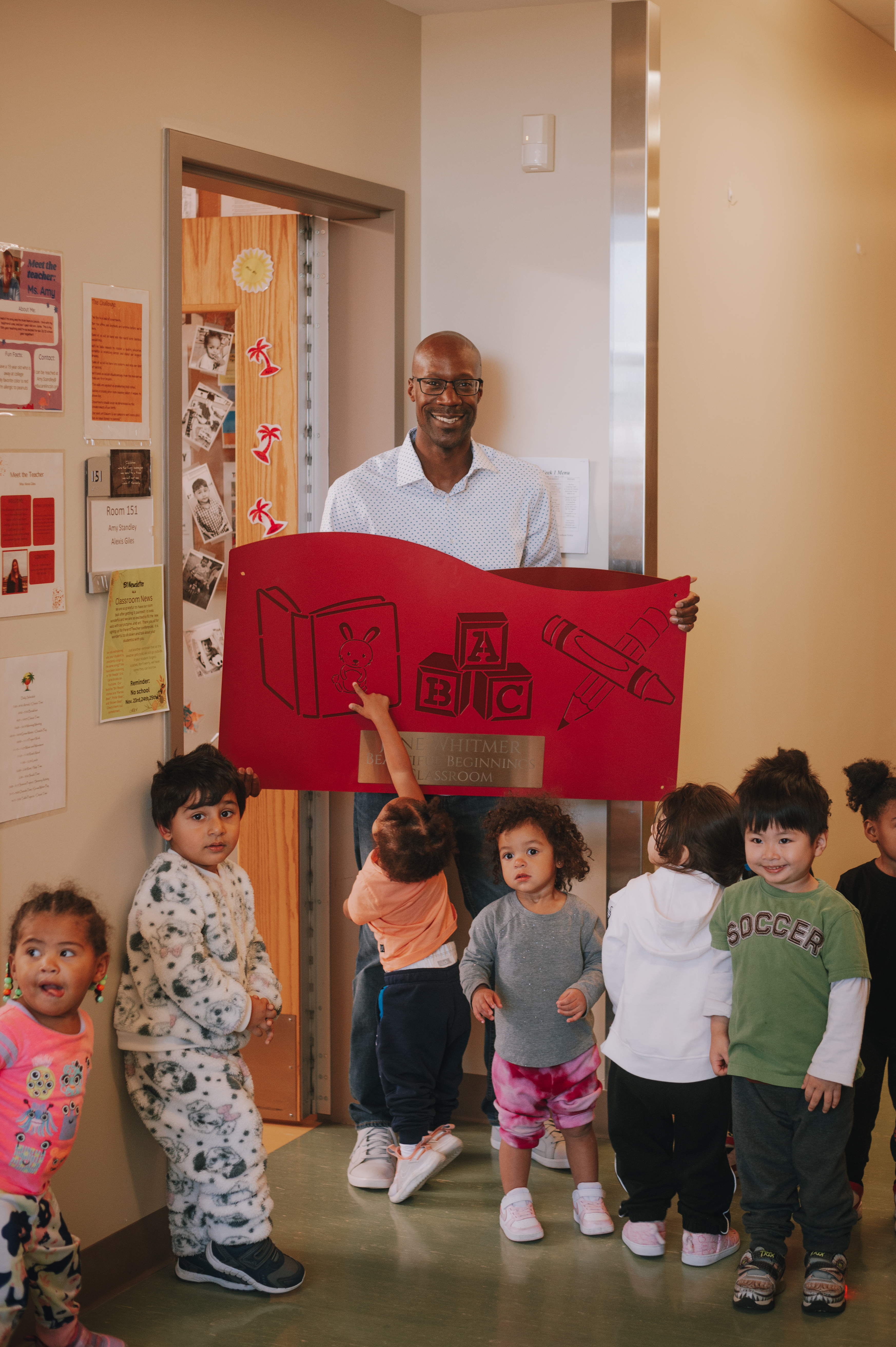
There were happy dances and happy tears at Educare Lincoln on September 14 as Mae Whitmer toured the new early childhood classroom opened in memory of her sister-in-law, Jane (Erickson) Whitmer, who passed away in 2019 after a courageous battle against cancer.
“Every child deserves a beautiful beginning,” said Mae. “I’m just so happy it’s finally happening. Jane’s doing her happy dance.”
Mae credits Jane with igniting her passion for early childhood. Jane dedicated her life to working with young children, particularly those facing the greatest odds. During her career she taught Head Start, kindergarten and first grade.
In the 1980’s, Jane co-created the SRI/St. Elizabeth Child Development Center, which became the Gallup Child Development Center. With Helen Raikes, Jane co-authored Beautiful Beginnings, a comprehensive curriculum for infants and toddlers.
What could be more fitting to honor her memory than making sure that more children in Lincoln have the opportunity for a beautiful beginning? And even more fitting, Jane’s dear friend Helen Raikes made the key introduction that started Mae on her philanthropic path with Educare Lincoln.
Mae reflected on her first meeting with Executive Director, Quentin Brown, where everything clicked into place.
“Quentin told me about a conversation he had with his wife when he was about to take this job that would relocate them to Lincoln,” said Mae. “He told her they were ‘going to Nebraska to change lives’ – that’s how I knew this was the right fit.”
Read more.
Educare Lincoln is a research-based early childhood education program that serves children with the highest need in our community. As a no-cost provider, Educare is both a cutting-edge learning facility and community center that instills the importance of the first five years of every child’s life. Educare Lincoln is the third Educare school built in Nebraska and is connected to Belmont Elementary School.
“Thanks to Mae, we were able to reach full capacity this August,” Quentin shared. “This gift literally opens doors to children who otherwise would not have been served.”
To make Mae’s philanthropic dream a reality, she worked with LCF Vice President and General Counsel, Tracy Edgerton. Mae will utilize qualified charitable distributions (QCD’s) from her IRA in support of this new classroom at Educare Lincoln. With her initial distribution supporting classroom resources, renovations, and staff, her generosity will create an endowment that will support the classroom forever.
“I’m struck by Mae’s humility and her passion,” said Tracy. “Her desire to ensure that every child in Lincoln has what they need to really thrive in our community is truly inspiring. Mae has created an extraordinary opportunity for a whole new group of children that will pay dividends into the future.”
Mae was joined by her family and friend Helen Raikes as she toured the “Beautiful Beginnings” classroom.
“There is something very special when a donor makes a transformational gift during their lifetime,” reflected Tracy. “Getting to see Mae’s gift in action with the smiling faces of the children looking up at us in their new environment was extremely moving.”
“Generosity is what got us here today,” said Alec Gorynski. “Year after year, the lives of 12 families will be enriched with the education and care they’ll receive in this classroom. I can’t think of a better way to honor Jane’s beautiful spirit than this awesome expression of philanthropy.”
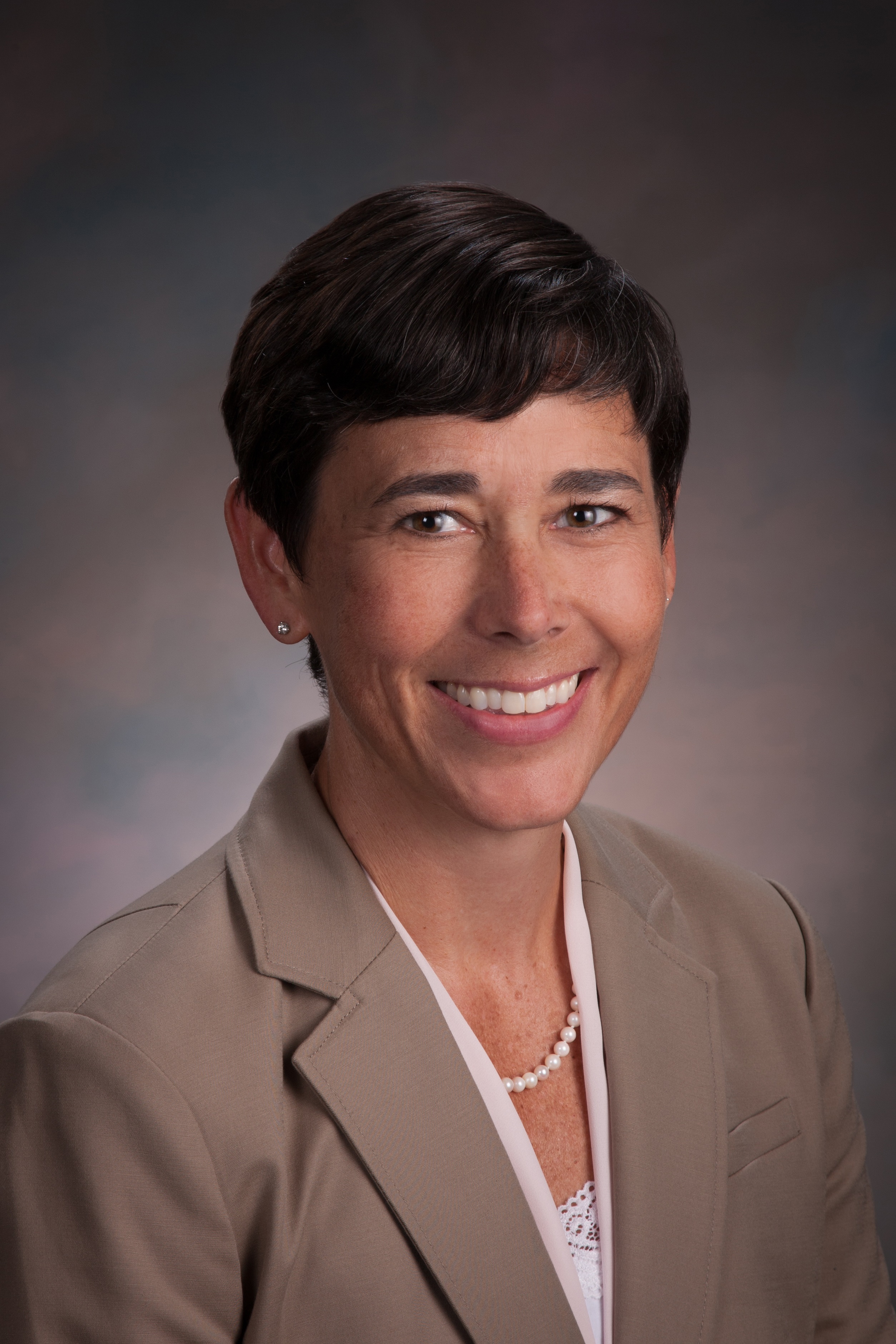
Turn your passion into action with a transformational gift for our community. Contact Tracy Edgerton at 402-474-2345 or tracye@lcf.org.
Lincoln Community Foundation Grants $1.6 Million
Published on Dec 14, 2022Thanks to the foresight of generous donors, Lincoln Community Foundation made grants in November of $1.6 million for 181 nonprofit organizations, 101 of which were local. These grants came from designated funds created by donors to support their favorite nonprofits and houses of worship. These endowed funds provide annual financial support to the organizations specified by the donors, helping the community and the nonprofits grow and thrive forever.
Charitable planning and female clients: Three mini-case studies
Published on Oct 4, 2023
Women’s spending power has been in the news over the last several weeks as Taylor Swift’s and Beyonce’s tours continue to break records and the Barbie movie looms large. As you’ve worked with female clients over the years, you’ve likely noticed a few trends:
–Women frequently take on caregiving roles within a family, including caring for both their parents and their own children, and often while also working full-time or owning businesses.
–Women often take the lead on charitable giving decisions.
–Women often find themselves living alone at some point in their lives, whether because of a spouse’s death or because of divorce.
–Women often have a difficult time putting themselves first.
At the Lincoln Community Foundation, we are always up-to-date on the trends in philanthropy that affect women as they build charitable components of their estate and financial plans. Our team is happy to provide helpful resources if you’d like to learn more about how philanthropy plays a role in your female clients’ lives.
Here are three examples of cases where the community foundation team can help:
Family philanthropy vehicle funded with tax-efficient assets
We can work with you and your client to establish a donor advised fund that includes your client and her children as advisors so that they can all learn together about nonprofit organizations in our community and jointly decide on grant recipients, tapping the knowledge and connections of the LCF team. We can help you identify the most optimal assets for your client to transfer to the donor advised fund, including highly-appreciated stock, real estate, or even an interest in a closely-held business.
Funds dedicated to a specific area of interest funded with IRAs
Our Philanthropy Services team can provide deep research and expertise on a client’s specific areas of interest, whether that’s the arts, education, emergency assistance, medical research, or another cause that is important to your client. Then, we can work with your client to establish a field-of-interest fund at LCF to receive Qualified Charitable Distributions from your client’s IRAs. Your client can also name the field-of-interest fund as the beneficiary of the IRA to receive the remaining assets at her death. Your client will enjoy the confidence of knowing that her charitable priorities will continue to be supported for years to come, even beyond her lifetime.
Organization-specific support formally incorporated in estate plan
For a client who has dedicated many years of her life to supporting a particular charitable organization, including perhaps even serving on the organization’s board of directors, our team can work with you to help the client understand what that organization needs to be successful for many generations. Then, we can work with your client to help fill those gaps. For example, grants from the client’s donor advised fund could provide the money needed to hire a new staff person or purchase new technology that will improve the charity’s ability to deliver on its mission. Your client could even leave a bequest in her will or trust to establish a designated fund at LCF that provides supplemental income each year to the organization’s operating budget.
We look forward to working together as you help your female clients achieve both their financial and charitable goals.
Asian Center: A Vital Bridge for Refugees & Immigrants
Published on Apr 16, 2020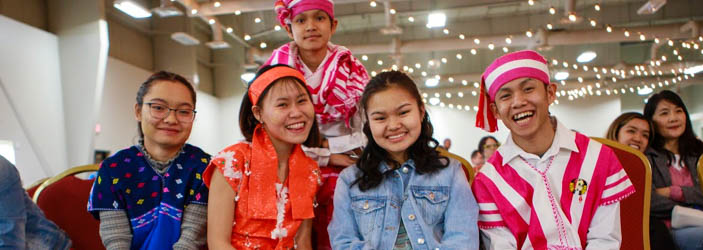
Immigrants and refugees new to Lincoln have an incredible resource in the Asian Community and Cultural Center. “We are a holistic agency,” said executive director Sheila Dorsey Vinton. “Our clients, on average, get help with seven services, often in one visit.” Those services include health support, English Language Learner classes and programs for seniors, youth, families and women.
The pandemic has brought in-person visits to an end. Addressing everything from health needs to hate crimes, via phone and computer, has required both innovation and energy. “The staff is really talented. We’re just trying to be adaptable in meeting everyone’s needs,” she said.
Dorsey Vinton recalls one client who is recovering from knee surgery and has kids to feed but no way to shop for them. “We’re trying to find ways to make partnerships with other agencies to meet those needs,” she said. “We’re working hard to fill those gaps.”
The COVID19 grant will help the agency continue its services, including translating Corona virus updates for their clients, as well as addressing the loss of a health-services contract. “There’s a lot of need out there and we’ll keep doing what we’re doing. The grant will certainly help,” said Dorsey Vinton.
For more information on the Lincoln COVID-19 Response Fund and to make a donation, click here.
Coddington Learning Center: Calming family fears
Published on Apr 20, 2020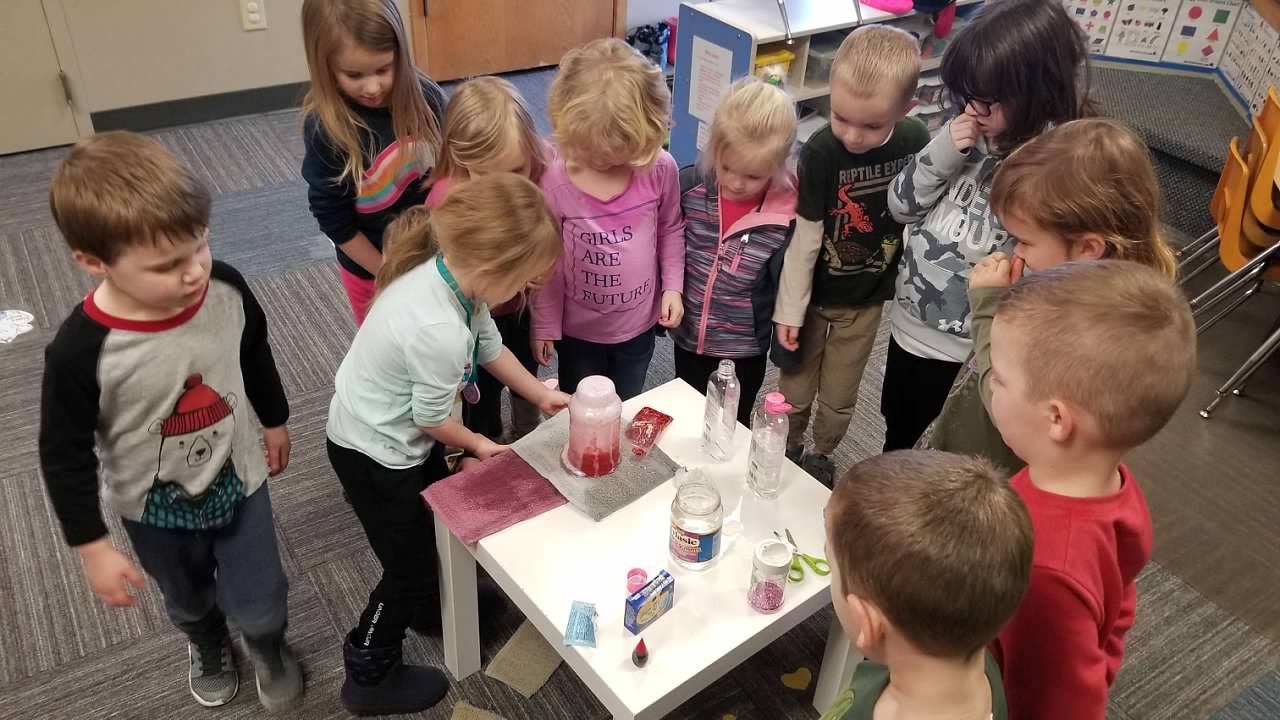
When the first waves of the pandemic started impacting Lincoln, children at the Coddington Learning Center were scared. Learning Center teachers calmed their fears and soothed their worries. Their parents, however, continue to face fear, stress and challenge.
Less than half the families using the childcare center are able to pay full tuition at this point, said Sue Oltman, administrator and owner. “Our parents have expressed sadness at being unable to cover child care. They would love to be able to pay, but they face job loss and uncertainty. At the same time, they are nervous that when they return to work – they won’t have these child care openings anymore. That’s a lot of anxiety.”
Lincoln COVID-19 Response funds allows the Coddington Learning Center to remain open and provide child care now while also holding openings for those who cannot pay. In addition, Oltman said she can continue to pay her own staff and help them remain financially stable.
“We are able to ease a lot of worries from staff and families,” she said. “We are allowing so many families to stay afloat.”
For more information on the Lincoln COVID-19 Response Fund and to make a donation, click here.
Faith Lutheran Touching Hearts: Open and easing childcare worries
Published on Apr 20, 2020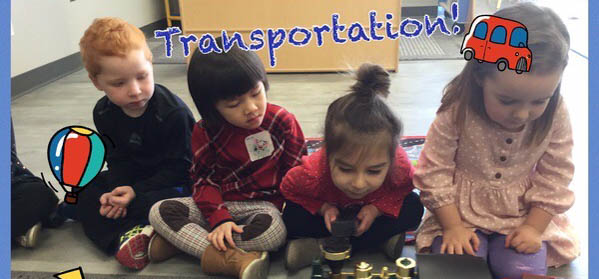
Faith Lutheran Touching Hearts believes in the mission of a family friendly center open to the entire community, a place that accommodates unusual schedules so typical for workers like fire fighters and nurses.
But keeping doors open is difficult these days, as the recent pandemic has caused significant funding challenges for places like Touching Hearts. Numbers have dwindled from 215 to 35, as parents are often keeping their children home.
“It is so essential that we stay open for our families,” said Liz Schultz, director of the childcare program. “But many of our parents are scared right now and are trying to make the best decisions they can under very difficult circumstances.”
Lincoln COVID-19 Response funds will allow Touching Hearts to stay viable financially.
“We are so thankful, this eases a great burden,” Schultz said. “This money means families can count on us to stay open, and that includes parents who are filling those essential jobs. It also means parents whose children are home now can rest easy. When this is over, we will welcome them back.”
For more information on the Lincoln COVID-19 Response Fund and to make a donation, click here.
Masks For All
Published on Dec 22, 2020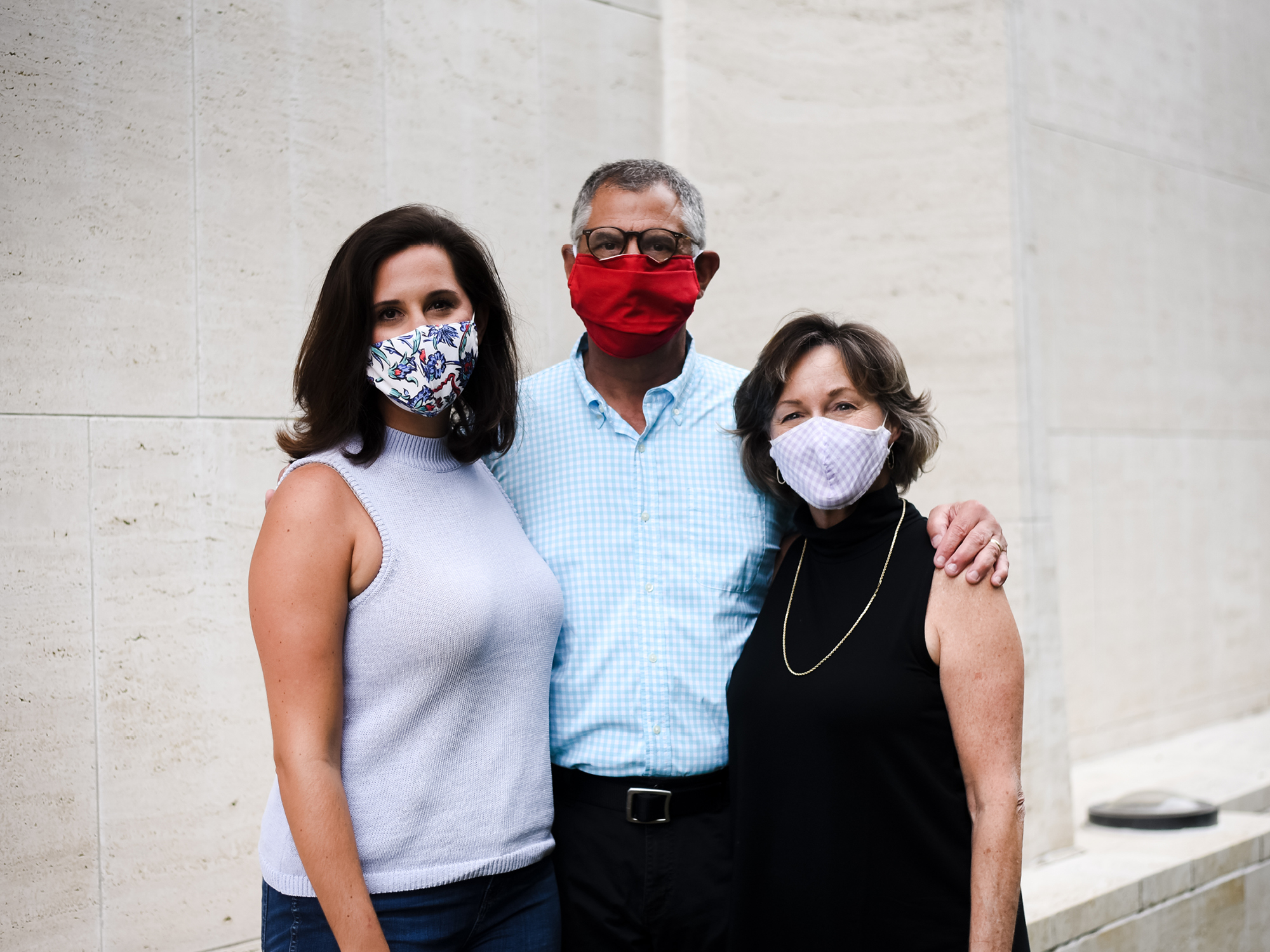
The Gade Family Spreads Love with Masks for Vulnerable Neighbors
“What can we do to make this happen in Lincoln?” That’s the question Steve and Nancy Gade asked when Nancy read articles earlier this spring describing how other communities were providing washable masks for vulnerable residents.
As businesses began to reopen in May, the Gade’s understood that Lincoln needed to have additional conversation about masks. “It’s about more than keeping people healthy,” Steve said. “It’s also about the economy and getting people back to work safely.”
So, the Gade’s got to work. As an executive at Duncan Aviation, Steve knew the company was cutting fabric for masks at no charge and distributing to various groups around the community for final stitching. Nancy reached out to the city of Lincoln, who responded immediately with support for the Gade’s efforts and connected them with the Lincoln-Lancaster County Health Department. And that’s when their simple inquiry blossomed into a comprehensive program focused on providing underserved community residents with washable, reusable masks.
“We learned that the primary barrier to ensuring that masks can be made available was money to buy material,” said Nancy. And as they immersed themselves in the process and continued their outreach, the Gade’s were overwhelmed by the community response.
“All the way along the line, everyone said, ‘Yes, how can we help,’” Nancy said. “It was phenomenal how this partnership came together, and it reminded us how special Lincoln is.”
The next step was raising money. Nancy and Steve were ready to reach out to their professional and personal networks and involved their daughter Paige as well. “Although we are novices when it comes to fundraising, it was very fun to come together and work on this as a family,” Nancy said.
Steve asserted that partnering with the Lincoln Community Foundation to create a fund supporting their fundraising efforts has been critical to their success. Paige agreed. “It’s been such a good educational experience to realize how LCF makes it so easy to serve a need in the community,” she said. “You don’t have to have a ton of money to create a fund that can truly make a difference.”
To date, local businesses and community members have contributed more than $10,000 to LCF’s Washable Masks For All Fund, and the health department continues to connect with local nonprofits regarding their needs for additional masks. “Right now, our goal is $12,000,” said Nancy. “We are still trying to keep pace with the identified needs.”
In the end the Gade’s are grateful for the chance to serve the community. “It’s been so rewarding to work on this because Lincoln is such a supportive town,” Steve said. “So many people have said, ‘I am in a position to help, and this is a great cause.’”
If you are interested in learning more about how to support the Washable Masks For All Fund, please contact Tracy Edgerton at tracye@lcf.org, or go to https://my.lcf.org/washablemasks.
Coming Together
Published on Dec 22, 2020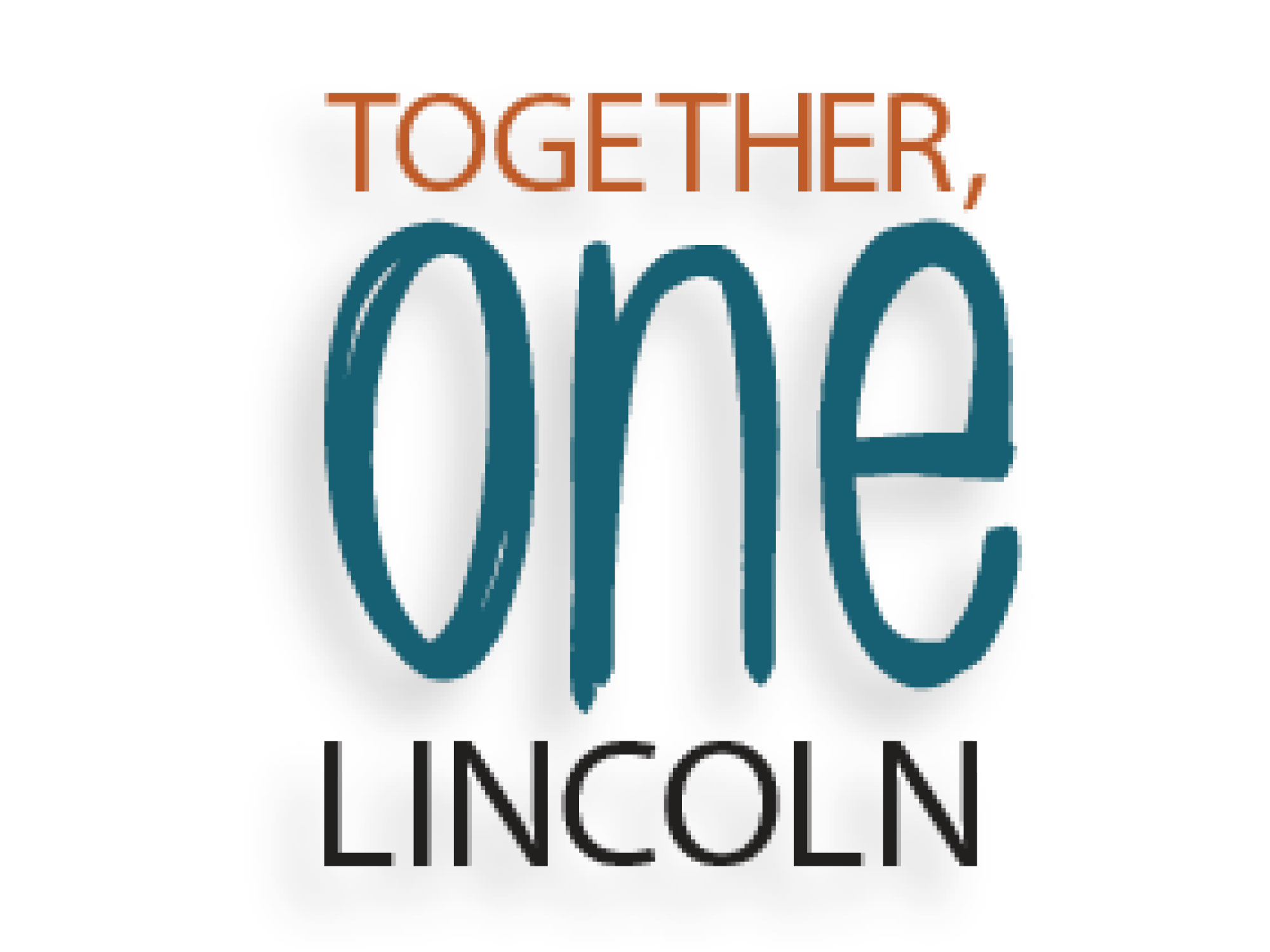
Lincoln City Councilwoman, Sändra Washington, did not set out to build an organization when she had the idea for Together, One Lincoln. But as racial equity came to the forefront of many conversations sparked by the Black Lives Matter protests, Sändra knew that folks needed the tools and resources to facilitate change.
“My hope is that we start these conversations where we feel safest,” she said. “The whole idea is to move us toward a place where we can have conversations anywhere, and we can see that we are more alike than different.”
When Sändra realized that what she was creating was much more than a public service announcement, she reached out the Lincoln Community Foundation to set up a fund for the initiative. Together, One Lincoln focuses on how each person can help create a community of racial equity by starting a conversation.
At TogetherOneLincoln.org you’ll find tips for how to have difficult conversations, including opening questions and links to organizations ready to host community conversations. In conversations around a table, on the front porch, and at the end of the driveway, a small group of people can come together to get to know one another in a more meaningful way.
“I love living in Lincoln because we care for each other,” said Sändra. “We are a community that can have conversations across boundaries.”
Guided by a simple format found on the website, participants practice being open and curious about all perspectives, with a focus on learning from one another, rather than trying to debate the topic at hand.
The website also contains reading lists to facilitate conversations supported by Lincoln City Libraries. At TogetherOneLincoln.org you will find a link to library materials for adults, teens and youth.
Moving forward, Sändra hopes to keep TogetherOneLincoln.org active for two to three years while the platform continues to help facilitate important conversations.
“People are asking, ‘What do we do? What should we be thinking about as an organization?’” said Sändra. “This website is an excellent place to start. Knitting together not insurmountable.”
Contributions to the Together, One Lincoln Fund will provide free trainings for organizations as well as supporting materials available in multiple languages.
“I couldn’t be more grateful to the Lincoln Community Foundation,” said Sändra. “I didn’t have the tools on hand to manage the funds coming in and out, so I reached out to LCF because they are an organization looking out for the community’s good. They are the fit!”
To learn more about the Together, One Lincoln Fund, visit https://my.lcf.org/together-one-lincoln-fund or reach out to Tracy Edgerton at 402-474-2345 or tracye@lcf.org.
Open Door Grant Helps Clinic With a Heart Keep the Doors Open
Published on Apr 19, 2021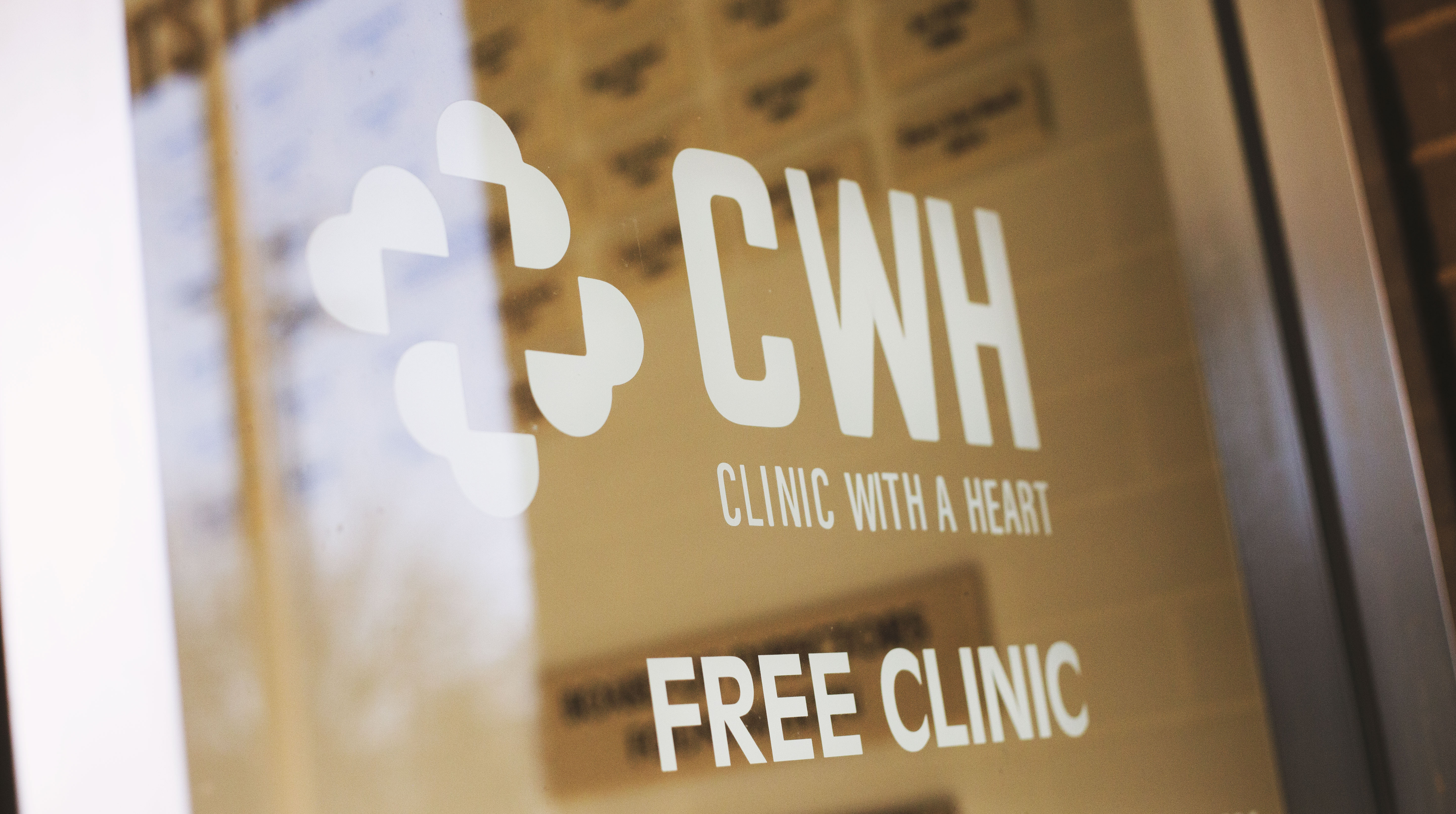
Clinic with a Heart (CWH) is more than a clinic. Since 2003, they have been providing hope and healthcare to uninsured and underinsured patients in the community. Their volunteers provide a variety of clinic offerings, from medical and dental, to mental health and dermatology.
To continue being a bright light in the community, meant keeping the lights on and the doors open. This was no easy task when nonprofit organizations were struggling to hold usual fundraisers. Annual events that were once held in-person, had to be altered or cancelled completely. Nonprofits needed help to continue operating and serving their communities. For CWH this was possible, in part, thanks to an Open Door Grant from the Lincoln Community Foundation.
“The people we serve are the most vulnerable in the first place,” said Teresa Harms, the Executive Director of the clinic. “If you close this door, what are you doing to them? Those were some hard conversations to have.”
In February of 2020, CWH received a $7,500 Open Door Grant from the Lincoln Community Foundation to assist with operational expenses. Open Door Grants are designed to respond to the needs and opportunities within the community in a timely manner for local nonprofits.
For CWH, the timing could not have been better. Due to the pandemic, the organization was forced to cancel their annual Prescription for Hope fundraiser and went through significant transformations to operate safely. The Open Door Grant enabled the clinic to continue meeting the needs of the community’s most vulnerable patient populations.
The clinic provided 2,938 visits to patients, and volunteers contributed 239 telehealth visits to patients and more than 10,500 total hours of service. They adopted electronic forms and telehealth services that asked patients questions about social determinants of health. These are variables that impact overall health, such as access to food, clothing, and shelter. Based on patient responses, the clinic was able to provide information on available resources to mitigate negative health outcomes. They also invested in air purification systems to allow dental visits to resume safely.
“In a time like this, when our organization was disrupted considerably, we were able to continue serving some of the most vulnerable members of the community,” said Harms.
This service has been around for nearly two decades, but at a time when hospitals and emergency rooms were overburdened, the importance of reducing hospital stress while addressing health disparities could not be overstated.
“That has always been the role of Clinic with a Heart since the beginning,” explained Harms. “But I would say it is even more so at this time.”
A Legacy of Love
Published on Apr 26, 2021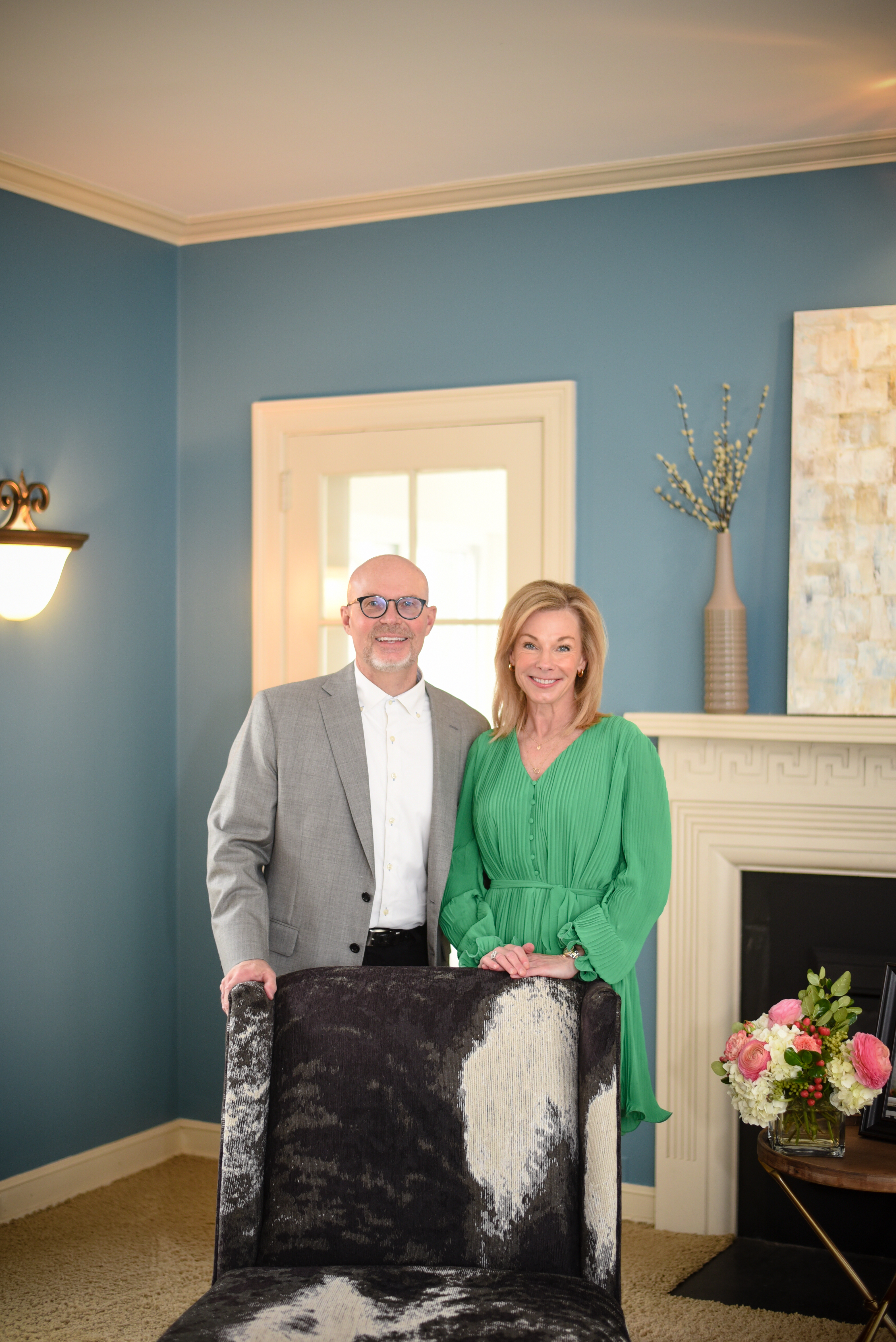
Seeds of giving were sown early for John & Kris Bergmeyer – with precious family lessons about paying it forward and leaving a legacy of kindness. Now they are passing on that generosity and grace through the Lincoln Community Foundation by supporting the community needs of today as well as legacy plans for the future.
John Bergmeyer grew up in a small town in Nebraska. The kind of town where everyone was instilled with community values of pitching in and working together. John’s dad was the community banker – always involved, always willing to share his time, treasure, and talent.
Kris Bergmeyer was raised in Sioux Falls, South Dakota, where she watched her dad give back to the community – both through volunteerism and financial support.
“My dad was a silent giver because he was always there, supporting, but always from behind the scenes,” said Kris. “I loved that he helped so many, but they never knew it was him. He gave, quietly, in his own wonderful way.”
The Bergmeyers first came to Lincoln for college. A small-town boy and a South Dakota gal meeting at the University of Nebraska-Lincoln and falling in love – eventually getting married and making Lincoln their forever home.
“Everything they say about Lincoln is true,” said John. “This is a great place to raise a family, form friendships and find success in business.”
John, a business law attorney/shareholder at O’Neill, Heinrich, Damkroger, Bergmeyer & Shultz, P.C., L.L.O., acknowledges how the support from his community impacted his professional success.
“People treat you well here, they do the right thing,” said John. “We were fortunate to get so much support over the years, and we want to make sure that others have an opportunity for that same kind of support.”
Both Bergmeyers agree it was a wise choice to customize their legacy giving plan through the Lincoln Community Foundation.
“We have both been so impressed with the Foundation’s very visible impact on our community – and how, in turn, the community trusts the Foundation,” said John. “Their track record speaks for itself. They are held in such high esteem in our community. They have outstanding leadership and a great team of professionals.”
The Bergmeyers feel incredibly thankful for everything Lincoln has given them: family, friends, a home.
“We were blessed to be able to build a career and life here in this wonderfully diverse and growing city,” said John. “We are happy to be able to give a little back to this organization and community. We love Lincoln.”
This spring, they are helping their daughter, Allison, move to California where she will learn about serving as a vet tech. “She is an animal lover who believes in saving the world, one animal at a time,” said Kris.
“Lincoln is our home, and we love giving back to our community,” said Kris. “We also both believe strongly in giving, quietly, without recognition. Our reward is knowing that someone is receiving something they would otherwise not have received. It is meaningful to be part of making that happen – to be quietly part of the solution. And that makes us very happy.”
LCF’s Legacy Society
As you develop your legacy plans, remembering your favorite organizations and community can provide a lasting legacy in your name. The Lincoln Community Foundation has created the Legacy Society for those who love Lincoln and have made plans to leave an end-of-life gift through their estate or beneficiary designations via a retirement plan, investment account or insurance policy.
Legacy Society members are special friends of LCF and their future gifts, memorialized in their name or the name of a loved one, recognize their thoughtfulness and leadership for the community for generations to come.
“We are so fortunate to be able to give back, we decided to go ahead and get started,” said Kris. “The Foundation provides access and resources to such a depth and breadth of non-profits in our community.”
“We decided that making decisions early in life about our giving plans meant we would be able to enjoy and see the results, impact and benefits of the gifts,” said John. “The Lincoln Community Foundation provided a wide variety of giving options. Working with them is definitely a win-win.”
If you are interested in learning more about legacy planning, contact Tracy Edgerton at 402-474-2345 or tracye@lcf.org.
American Families Plan: A “Called Shot”…or Not
Published on Sep 7, 2021Babe Ruth stood out for his talent and showmanship, even on a Yankees team with eight other future Hall of Famers. Ruth set hitting records and inspired legends—especially his “called shot” in the 1932 World Series against the Chicago Cubs.1
The score was 4-4 in the fifth inning. In response to heckling from the Cubs players, Ruth stepped up to the plate and pointed to center field with a boldness that defied baseball’s unwritten rules of decorum. Even for the Babe, hitting a homer was no sure thing. However, in this case, a legend was born, as Ruth blasted the ball out of the deepest part of the stadium for a home run, and the Yankees went on to win the World Series.
Unlike Babe Ruth, candidates running for office are typically vague when indicating their future plans. However, during the 2020 election campaign, Joe Biden boldly announced that if he won, he would enact tax policies that resulted in “the rich” paying more. Biden took office in January 2021 and, much like Ruth’s called shot, began to issue executive orders and introduce legislation to further his agenda. In direct opposition to President Trump’s tax cuts in 2017, the Biden Administration released details of the American Families Plan.
Although this legislation must still get through Congress, we’ll look at the potential increases to both income and capital gains taxes that this legislation could bring and, more specifically, how these changes might affect charitable giving.
The American Families Plan
The Biden Administration’s American Families Plan (AFP) is a $1.8 trillion spending proposal that features $1 trillion in stimulus spending and $800 billion in tax cuts that benefit lower and middle-income workers and families through permanent and expanded credits and closing or reducing tax loopholes.2
According to the Administration, the overarching goal is for the bill to be largely deficit-neutral. This means it won’t result in any additional federal government spending despite the hefty price tag, since spending will be funded by substantially increasing taxes on households making more than $1 million along with households in the highest income tax bracket. Theoretically, the American Families Plan budget will be fully paid for over 10 years by increasing both income and long-term capital gains taxes.
Of course, as this tax plan makes its way through Congress, it is sure to be challenged in both chambers by Republicans defending the Trump tax cuts and more progressive Democrats who believe the plan does not go far enough. However, while we wait to see what the final version may contain, we can examine key aspects of the AFP and begin considering how these changes might impact clients and their philanthropic plans.
Income Tax
In 2017, the Trump administration introduced the Tax Cuts and Jobs Act (TCJA), which significantly reformed the Internal Revenue Code (IRC). From an individual income tax perspective, the TCJA kept the same number of tax brackets but lowered the rates and widened the ranges for tax years 2018–2025.
Under the proposed AFP, the highest tax bracket will return to the pre-TCJA 39.6% from the current 37%. These taxpayers would pay the increased rate:
- • Single taxpayers (and head of household) with incomes over $518,400
- • Married filing jointly with incomes over $622,050
- • Married filing separately with incomes over $311,025
DONOR IMPACT
Taxpayers that lie just within the income range of this bracket may feel the impact more during this COVID-affected economy than they would have during an economic boom. This combination (a slightly greater tax burden and an uncertain economy) may cause donors to feel hesitant about continuing with certain planned gifts or making new gifts. Affected donors may appreciate an exploration of charitable giving tools that can provide future income.
Capital Gains Tax
The TCJA did not change the capital gains tax rate or the net investment income tax (NIIT) rate. It did change the brackets for capital gains, so that the top 20% rate no longer lines up with the top bracket, but instead has its own threshold that falls in the middle of the 35% income tax bracket.
Long-term capital gains rates for 2021 are:
|
Tax Rate |
Single |
Married Filing Jointly |
Head of Household |
Married Filing Separately |
|
0% |
Up to $40,400 |
Up to $80,800 |
Up to $54,100 |
Up to $40,400 |
|
15% |
$40,401 - $445,850 |
$80,801 - $501,600 |
$54,101 - $473,750 |
$40,401 - $250,800 |
|
20% |
Over $445,850 |
Over $501,600 |
Over $473,750 |
Over $250,800 |
Biden’s proposed increase to the capital gains tax is even more significant than the proposed increase to the income tax. If the AFP passes successfully, the top rate for long-term capital gains tax will increase from 20% to 39.6% for those making $1 million or more. According to the White House, this increase will affect around 500,000 households.
It is important to note that the AFP does not include any change or adjustment to the net investment income tax created in the Health Care and Education Reconciliation Act of 2010.3 The NIIT is typically associated with items of passive income in three categories:
- Gross income from interest, dividends, capital gains, non-qualified annuities, royalties, and rents—income that is not derived in the ordinary course of a trade or business
- Gross income derived from a business that is either a passive activity (within the meaning of IRC §469) or a business that trades in financial instruments or commodities as defined in IRC §475(e)(2)
- Net gain (to the extent taken into account in computing taxable income) attributable to the disposition of property other than property held in a business that is neither a passive activity nor trades in financial instruments or commodities
When adding the net investment income tax (NIIT) to the proposed AFP’s increased capital gains rate, taxpayers with income over $1 million face a maximum capital gains tax rate of 43.4%.
DONOR IMPACT
If the AFP increases the tax on long-term capital gains, it may make long-term capital gain property an even more desirable option for charitable giving. Typically, these gifts are simple to make, with the donor transferring possession of the asset to the charity using any document of title. The gift is deductible at fair market value (FMV) up to 30% of adjusted gross income (depending on the donee), with a five-year carryover of any excess deduction. Because the donor does not owe any capital gains tax on appreciation, significantly appreciated property is a tax-wise giving choice that may allow for a more substantial gift.
Example. Michael owns appreciated property with a fair market value of $5,000—property he purchased years ago for $1,000.
If Michael sold the property and donated the cash, he would have to pay a capital gains tax of approximately $800 (a gain of $4,000 taxed at 20%) plus the net investment income tax of $152 (3.8% on capital gains for taxpayers with MAGI above $200,000 or $250,000 for joint filers). The cash donation would be $4,048—well short of the property’s $5,000 FMV.
However, if Michael makes a gift of the appreciated property, the qualified charity receives property worth the full $5,000, and Michael’s net cost of making that charitable donation is far less:
Gift amount (FMV of property) $5,000
Tax savings from the charitable income tax deduction ($1,850)
(assuming a 37% income tax bracket)
Tax savings (capital gains tax + NIIT) ($952)
Net Cost of Gift $2,198
An increase in the highest income tax bracket would increase Michael’s charitable deduction, and an increase in the capital gains tax (if it applied to Michael) would result in greater tax savings for his gift.
Child Tax Credit
If signed into law as it stands, the AFP will expand the Child Tax Credit that was passed in the TCJA and make it permanently refundable. The White House notes that the proposed legislation “expands the Child Tax Credit from $2,000 per child to $3,000 per child for six-years old and above, and $3,600 per child for children under six. It also makes 17-year-olds eligible for the first time and makes the credit fully refundable on a permanent basis, so that low-income families—the families that need the credit the most—can benefit from the full tax credit.”4 The AFP would also make this a credit that is “delivered regularly,” meaning that a family claiming this credit would receive regular payments during the year rather than waiting to claim the credit at tax time each year.
DONOR IMPACT
Those in the upper tax brackets are typically the focus for larger charitable donations, but those in the lower and middle-income tax brackets may still be consistent and faithful charitable givers. While these donors may not be able to make a large one-time gift, a lifetime of smaller weekly or monthly donations can still result in a significant overall gift. For some of the families who will receive this expanded tax credit, the decrease in their financial burden could result in an increase in regular donations.
Home Run or Big Miss?
Perhaps the opposite of Babe Ruth’s “called shot” is Mighty Casey’s misplaced certainty in Ernest Lawrence Thayer’s poem “Casey at the Bat.” Up to bat in the final inning and fully intending to bring his team to victory, Casey was not as fortunate as the Babe:
Oh, somewhere in this favored land the sun is shining bright,
The band is playing somewhere, and somewhere hearts are light;
And somewhere men are laughing, and somewhere children shout,
But there is no joy in Mudville—mighty Casey has struck out.
President Biden has stepped up to the plate and is taking a proverbial swing at changing our nation’s tax policy. Though the contents and specifics of the bill will certainly change over the course of the debate, the Democrat-controlled House and the presence of Vice President Harris as a tiebreaker in the Senate makes it possible that, with enough party-line maneuvering, it could pass almost as proposed.
At this point, there is no clear answer as to whether the American Families Plan will be a home run, a big miss or something in between. What is certain is that knowledge, planning, and preparation are the keys to navigating any tax policy that comes out of Washington.
Endnotes
- John Horne, “The Babe’s Called Shot,” Baseball History Series, National Baseball Hall of Fame. baseballhall.org/discover-more/stories/baseball-history/called-shot
- “Fact Sheet: The American Families Plan,” The White House Briefing Room, April 28, 2021. whitehouse.gov/briefing-room/statements-releases/2021/04/28/fact-sheet-the-american-families-plan/
- IRC §1411.
- “Fact Sheet: The American Families Plan,” The White House Briefing Room, April 28, 2021. whitehouse.gov/briefing-room/statements-releases/2021/04/28/fact-sheet-the-american-families-plan/
Open Door Grant helps Rabble Mill move forward towards opening of “Bay High”
Published on Aug 17, 2021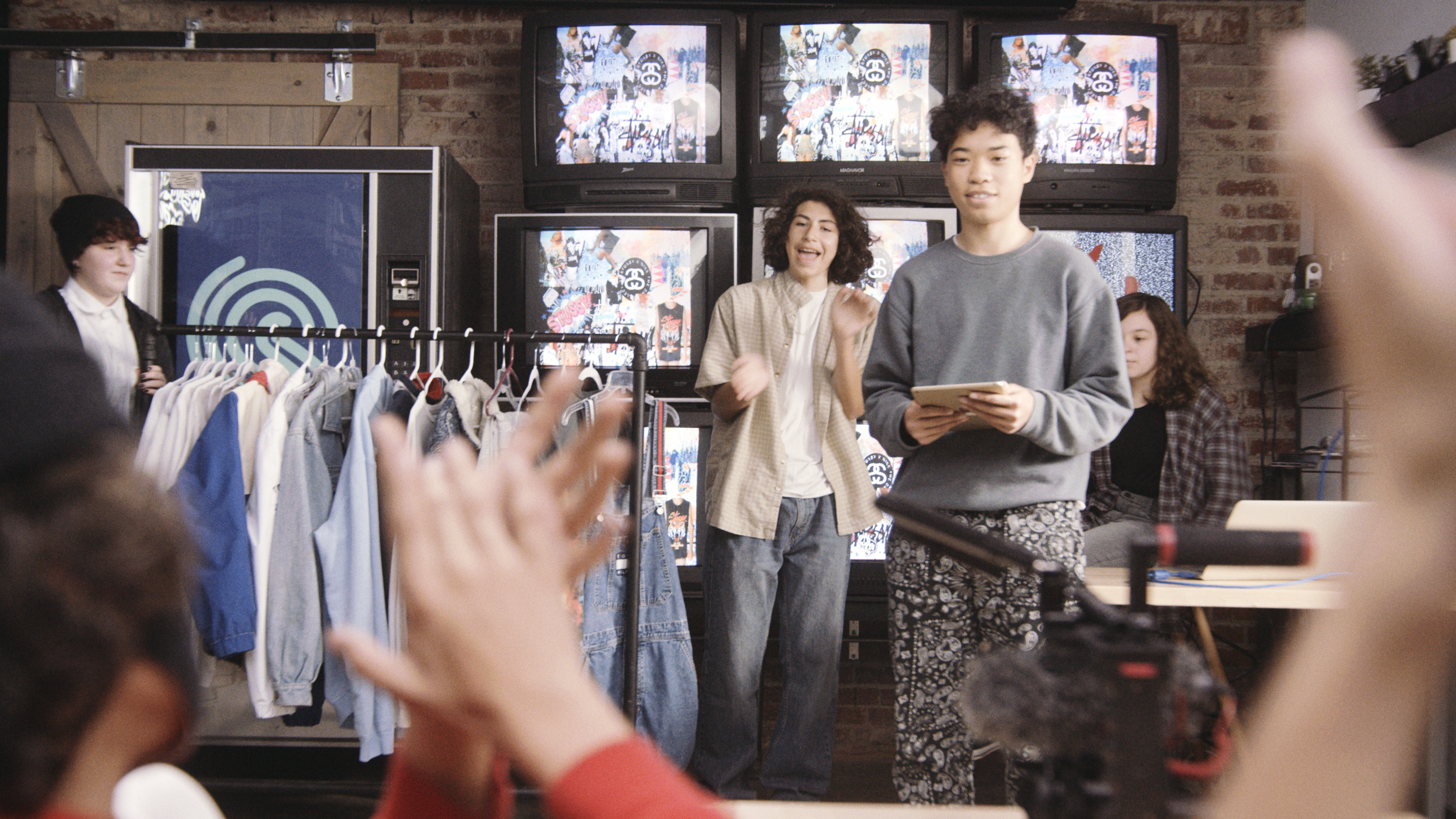
Since 2010, The Bay has been a safe space for Lincoln’s youth. The one-of-a-kind community space features the state’s only public indoor skatepark as well as a music venue, digital art lab, and Goldenrod Coffee. The space will soon be home to an LPS Focus Program, Bay High, that aims to equip highly diverse high school juniors and seniors with the confidence, network, social-emotional, and technical skills to ensure agency and upward mobility.
With the help of an Open Door Grant from Lincoln Community Foundation, Bay High will be able to continue making a significant positive impact on the Lincoln community. The new Focus Program, centered around Content Creation and Emerging Media Technology, will serve approximately 100 youth each year, with focus areas in skateboarding, music, art, and fashion. Teacher and student applications for Bay High will be opening this fall, in preparation for a Fall 2022 launch.
Rabble Mill, the nonprofit behind projects like The Bay and Bay High, plans to use the Open Door Grant to help offset operating expenses, such as hiring teachers and curriculum builders. The organization is currently fundraising for building renovations in order to create a space that will further inspire learning and creativity.
Leadership within the organization says that the skills and education students receive will enable them to contribute to Lincoln’s thriving tech workforce. The Bay is collaborating with local businesses to aid in curriculum development and build internship opportunities, creating a direct pipeline from Bay High to Lincoln’s workforce.
“Not only are the students going to get first-hand experience in a field that they’re passionate about, but they are also building a strong network of professionals in the Lincoln community,” said Rabble Mill’s Development Director, Morgan Kazanjian.
Open Door Grants, launched in January 2020, serve as an unrestricted and flexible way for local nonprofits to meet existing needs or address challenges and opportunities facing the community. Grants may be applied to operations, programs or capital projects.
“The new Open Door Grant application has been simplified and streamlined in a way that makes it so easy,” said Kazanjian. “I love it.”
Lincoln Community Foundation Awards More Than $765,000 to Support Nonprofits & Students
Published on Sep 16, 2021To date this year, Lincoln Community Foundation (LCF) has distributed more than $765,000 in Open Door Grants to local nonprofit organizations and scholarships for students. Open Door Grants support efforts by nonprofits in Lincoln and Lancaster County to meet existing needs or address challenges and opportunities facing our community. These grants are made possible by contributions from the Lincoln Forever Fund and LCF donor endowment funds. In addition, LCF awarded upwards of $565,000 in scholarship funds to more than 300 students.
Organizations that that received grant funding include:
Big Brothers Big Sisters Lincoln
General support
Cause Collective
Nonprofit board training and capacity building for local nonprofits
Child Advocacy Center
General support
City of Lincoln - Urban Development
Lead mitigation matching grant
Do More Good Movement
Sponsorship of the 2021 Do More Good virtual conference
Eastridge Presbyterian Church Food Pantry
Restocking the pantry with food, personal hygiene, and household items
Food Bank of Lincoln
Support for capital campaign
Food Fort
Director of Education office resources
Foundation for Lincoln Public Schools
Technology & equipment for deaf and hard of hearing students (Frank H. Woods Telephone Pioneer Association Fund)
Friendship Home of Lincoln
Inclusive Communities Project R.E.A.D.I. trainings for staff
Good Neighbor Community Center
General support
Heartland Bike Share
Sponsorship of BikeLNK bicycles
Lancaster County Medical Society
Support of outreach campaign
Lied Center
Support for 30th anniversary Jazz in June season
Lincoln Arts Council
Support for 2021 Lincoln Arts Festival & sponsorship of Mayor's Arts Awards
Lincoln Calling
Launch of Lincoln Calling TV streaming platform
Lincoln Children's Zoo
Support for horticulture department
Lincoln Crossroads Music Festival
Sponsorship of 2nd Lincoln Crossroads Music Festival
Lincoln Parks Foundation
Support for Cascade Fountain renovation
Lincoln's Symphony Orchestra
Support for Harmony in Healing program
LUX Center for the Arts
Replacement of building elevator and support for EMERGE LNK, mural project for North Lincoln
Madonna Foundation
Community Medical Transportation program support
Meadowlark Music Festival
General support
Nebraska Appleseed
Policy solutions to address benefit overpayments and collections
Nebraska Peace Foundation
Collaborative initiative, Roots of Local Justice: Historical Truth and Fair Reconciliation
Nebraska Veterans of Foreign Wars Foundation (for Veterans Advisory Group)
Outreach to veterans, guidance with government systems, and veteran fellowship
NeighborWorks Lincoln/Community Crops
Support for renovation of NeighborWorks Lincoln facility to re-locate Community Crops offices
Partnership for a Healthy Lincoln
Support for Streets Alive! project revitalizing the 3rd & F Street pedestrian tunnel
Proyecto Cultural/Grupo Folklorico Sangre Azteca
Support for Mural and building renovation project
Rabble Mill
New LPS Focus Program, "Bay High"
Southern Heights Food Forest
General support
Transformative Life (Contemplate Lincoln)
Care Packages for the Quarantined
UNL Board of Regents for International Quilt Museum
Collaboration with Lincoln NAACP Youth Council on social justice movements and associated art forms
Wellbeing Initiative
Support for mental health awareness campaign
Yazda/Yazidi Cultural Center
General support
About Lincoln Community Foundation
The Lincoln Community Foundation, established in 1955, strives to continually enrich the Lincoln community by promoting and achieving perpetual philanthropic support. The foundation has distributed more than $168 million in grants to nonprofit organizations that have improved the lives of thousands of residents. For more information, visit www.LCF.org.
Lincoln Community Foundation Names New CEO
Published on Oct 12, 2021 The Lincoln Community Foundation’s Board of Directors today announced the selection of Alec Gorynski as its new President & Chief Executive Officer. The Foundation’s board voted unanimously to approve the search committee’s recommendation in naming Gorynski to the position. He will succeed Barbara Bartle who has served as president for the past 12 years and will retire at the end of December.
The Lincoln Community Foundation’s Board of Directors today announced the selection of Alec Gorynski as its new President & Chief Executive Officer. The Foundation’s board voted unanimously to approve the search committee’s recommendation in naming Gorynski to the position. He will succeed Barbara Bartle who has served as president for the past 12 years and will retire at the end of December.
Throughout his career, Gorynski has led efforts to maximize community impact through philanthropy, planning, and collaboration. He has more than 15 years of experience working across private, nonprofit, and government sectors.
“Alec brings the right energy and experience to continue the positive direction that the Lincoln Community Foundation has taken under Barbara Bartle’s leadership,” said Foundation Board Chair, Kim M. Robak. “His skills in developing relationships and building coalitions will help continue the growth of the Foundation.”
Before his appointment to lead the Foundation, Gorynski served as the Vice President of Community Development and Corporate Philanthropy for First National Bank of Omaha and was President of the First National Community Development Corporation. He headed the bank’s efforts to be an agent of positive change in the communities they served in a seven-state region. Previous roles include Vice President of Regional Community Affairs for Bank of the West and Deputy Grant Administrator in the Omaha Mayor’s Office.
Complementing his professional experience, Gorynski is a co-founder and board member of Spark and Spark Capital, affiliated community development and lending organizations. He has served on boards and committees for many nonprofit organizations including Omaha 100, Nebraska Arts Council, the Nebraska Highway Commission, the Omaha Community Foundation, and the Lincoln Community Foundation Affordable Housing Fund advisory committee.
“I am honored to be selected to lead the Lincoln Community Foundation for its next chapter and generation of impact,” said Gorynski. “The Foundation has a great reputation and strong track record, which is due to the leadership of Barbara and her team. I hope to honor her, the staff, the donors, and all the stakeholders of the Foundation with my work ahead.”
Originally born and raised in Lincoln, Alec moved to Kansas in his teen years and returned to Nebraska to attend college. He holds a Master of Public Administration from the University of Nebraska at Omaha, and a Bachelor of Science degree in Psychology and Criminal Justice from Peru State College. Alec and his wife Laura have three young children.
Gorynski’s appointment concludes a four-month national search process completed by a search committee. He will assume the role of President/CEO in December 2021.
Meet the Next Generation of LCF’s Legacy Society
Published on Dec 6, 2021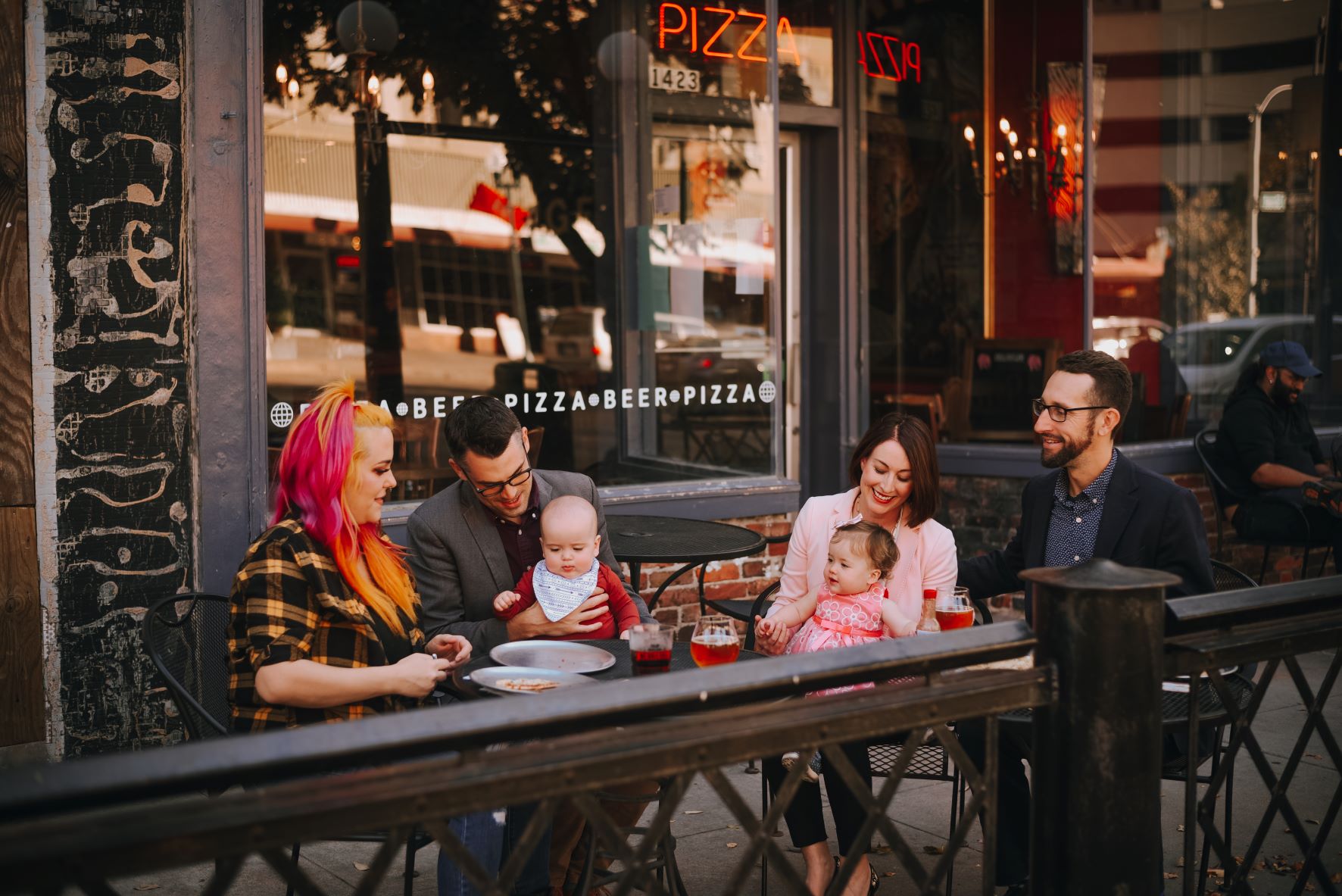 What does the word “community” mean to a group of working professionals who are building their careers and families here in Lincoln? A few young members of LCF’s Legacy Society recently came together to discuss just that.
What does the word “community” mean to a group of working professionals who are building their careers and families here in Lincoln? A few young members of LCF’s Legacy Society recently came together to discuss just that.
Beyond the bike trails, restaurants, businesses, and venues that make up our great city, the consensus was that community is more of a feeling. A “big-small town.” A place where you want your kids to feel safe to learn, grow and ultimately give back to.
“There is something special about Lincoln,” said Kyle Cartwright. “It is the perfect mix of urban and rural.”
His wife Koren agreed. “I always thought that I wanted to leave, but the more I travelled, the more I realized it is really nice to come home to Lincoln.”
The Cartwrights have both recently taken entrepreneurial plunge. Koren co-owns a new salon set to open next year and Kyle is the co-founder & COO of SEAchange, LTD which he will be pursuing full-time in 2022. They met in high school when they both participated in the Lincoln High Marching Band. The Cartwrights are raising their son Porter in the city they grew up in and are experiencing the magic that Lincoln has to offer young families.
Janell Walther, senior research manager at the University of Nebraska Public Policy Center, and her husband Bryan Seck, Chief Talent Strategist at Kawasaki Lincoln, didn’t grow up in Lincoln, but their love story started here. In fact, they met in front of an elevator at the Lincoln Community Foundation building. They chose Lincoln as the place to start their family and enjoy getting out on its many bike trails with daughter Miriam.
Law school brought Max and Reagan Rodenburg together. Originally from Omaha, Reagan is currently a benefits advisor with UNICO Group. Her husband Max, a partner in Rembolt Ludtke’s business services and estate planning practice groups, was first introduced to LCF in 2015 when his parents were going through their estate planning process.
“I was really impressed by the opportunities to utilize LCF through planned giving,” said Max. “At the time, joining the Legacy Society was as simple as listing the Foundation as a beneficiary on a retirement account. Now as we grow in our lives, we can make our legacy plans a little more formal and have a little more weight to them than when I was a law student.”
All three couples have made plans either through a will, trust, or beneficiary designation to establish legacy gifts now, to be funded at end of life. As the conversation turned to giving back, the young philanthropists agreed that establishing their legacy giving plans through the Foundation offered both ease and peace of mind.
“There are many young working professionals out there without a current will or estate plan that care deeply about their community,” said Reagan. “Working with LCF is an easy and simple way to allocate funds to the causes you care about.”
When asked about the benefits of establishing legacy plans at a young age, Max laughed. “Well, you’re talking to an estate planning attorney here.”
“It’s an important exercise to go through for a plethora of reasons,” he continued. “It challenges you to think about the causes that you want to support and what you want your legacy to look like. You can really find the joy in giving back.”
Finding joy in giving back resonated with the Cartwrights as well.
“You start giving and you feel good about that, and you give a little more. It’s contagious, and that really translates well into planned giving,” said Kyle. “Down the road, you are going to be glad you started the process early, identifying what matters to you and creating your values in a community sense.”
The flexibility that the Foundation offers in terms of legacy planning was also important to all three couples. Especially after already experiencing so many “unprecedented” events in their lifetime.
“As the community grows and as needs change, we know that we will be working with an organization that can pivot and address issues as they come up,” said Bryan. “Nobody would have seen Covid coming in 2018. Who knows what the future will bring. With this gift, we know the Foundation will be there to address needs we may not have even thought of before.”
Janell agreed. “I think that philanthropy has the opportunity to be really nimble and flexible,” she said. “LCF’s philosophy and professional staff allow it to pivot quickly, in partnership with government and private sector leaders, to meet community need.”
Ultimately, all three couples felt that LCF was an institution they can count on to achieve their charitable goals throughout their lifetimes.
“We believe in the mission of the Foundation,” said Bryan. “We feel very confident that whether it’s now, or 50 years from now, the dollars that are in our gift will be used to improve the community.”
Turning Lincoln Vital Signs Data into Action
Published on Dec 12, 2022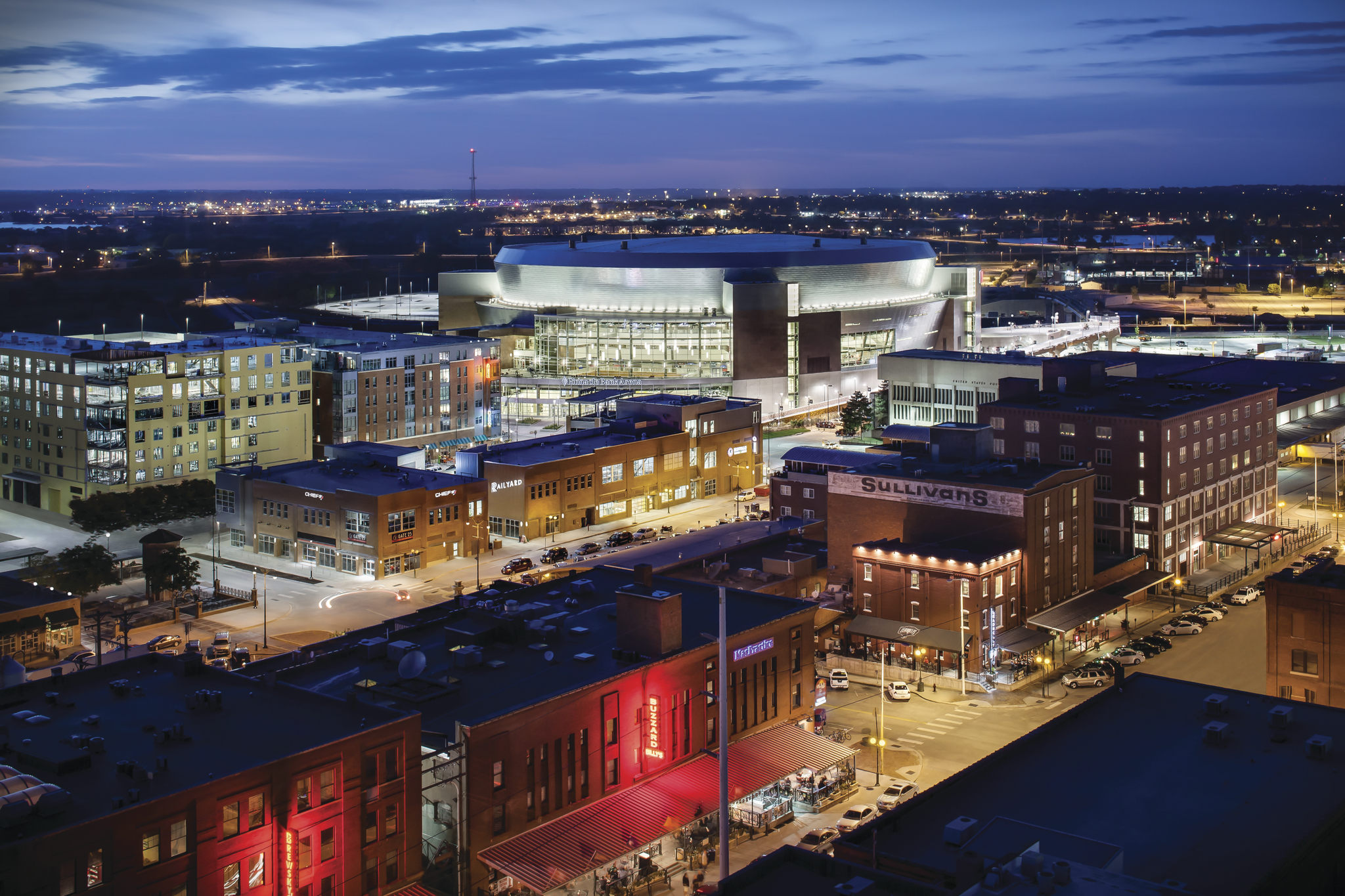
Strong communities use data to make collective changes that ensure everyone has the opportunity to succeed and thrive. Lincoln’s data report – Lincoln Vital Signs – informs Lincoln residents about trends affecting our city and invites collaboration across all sectors of our community to address its findings.
In 2014, a group of public and private organizations commissioned the first Lincoln Vital Signs report to educate folks about the socio-economic conditions of our community and inform funding decisions. Now in its fifth iteration, the recently published 2022 Lincoln Vital Signs report provides us with a shared understanding of our community strengths, persistent concerns, and overall population shifts.
“This information is critically important as our community leaders continue to work toward our shared economic and social prosperity,” said Alec Gorynski.
“Lincoln Vital Signs is actively informing organizations such as Lincoln Chamber of Commerce, United Way, Lincoln Community Foundation, and many other agencies as we work on the long-term needs and goals of our community.”
The data from Lincoln Vital Signs inspires and shapes giving strategies of both individual donors and institutional foundations and helps nonprofit organizations orient their programs toward clearly articulated needs. Lincoln Vital Signs also substantiates Prosper Lincoln’s community agenda, which continues facilitate collaborative efforts to address early childhood, affordable housing, strong neighborhoods, and an innovative workforce.
Overall, the recent report tells us that Lincoln continues to flourish in many ways. Lincoln has a high-quality workforce with low unemployment. Lincoln is a safe place to live, as evidenced by low property and violent crime rates compared to cities across the country of a similar size.
Our city has increasingly become more diverse, with persons of color now comprising 21% of the population. Poverty, homelessness, and food insecurity are all lower since the original Vital Signs report in 2014; and we saw a reduction in the number of census tracts experiencing extreme poverty.
Although many trends are moving in a positive direction, there are still some areas for concern. Per capita income adjusted for cost of living continues to trail the nation’s average, and this gap is increasing. The cost of early childhood education continues to rise, an issue of critical concern for working families.
Lincoln’s unemployment rate for racially minority populations is higher than Lincoln’s total unemployment, and the poverty rate among black residents is more than double the rate for white residents.
General population shifts will shape future demand for services and programs. People moving into Lincoln currently drives our overall population growth, and half of those moving here are young adults 18 to 24 years of age. However, Lincoln’s overall population is aging, as the 65+ population has grown more than four times faster than any other age group in the past decade.
Local funders and institutions, in partnership with the University of Nebraska Public Policy Center, have continued to invest in and produce Vital Signs to ensure the community operates under a comprehensive and consistent set of metrics.
“For our community to become all we know it can be, we need to work together to address the Lincoln Vital Signs findings,” said Alec.
“That means fewer people living in poverty. It means access to affordable housing and high-quality childcare and early education. It means a strong workforce and strong neighborhoods. It means together – we thrive.”
Explore the data and download the full report at LincolnVitalSigns.org.
Merry Manor: Keeping things as normal as possible
Published on Apr 20, 2020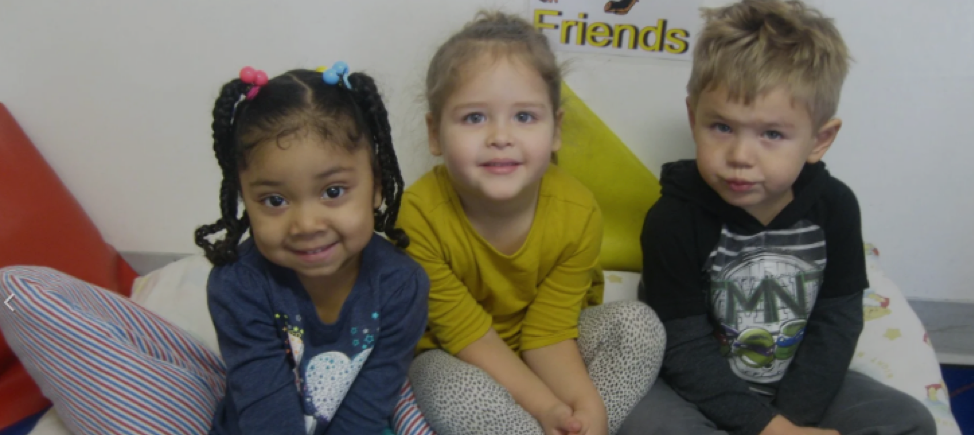
Since the pandemic, Merry Manor School of Childhood has seen its enrollment cut in half.
Some parents are now working at home, others have lost their jobs, or school-age siblings are picking up their care.
Older students who used to come for before-and-after school care are now at Merry Manor all day long, which puts additional pressure on the school’s resources. . “The grant funds will help support those school-aged kids who now aren’t at school,” said school administrator Tina Wright. “We want to keep those kiddos on top of their studies.” That includes providing computer tablets, internet access and full-time school-age teachers, who once were just working part time.
“This has just upped our game,” said Wright. “We have parents who work in the medical field who can’t miss work.
The COVID-19 Response Fund will help Merry Manor make up for lost income, as well as provide additional resources. “We’re trying to keep everything as normal as possible for all of our kids, because there is so little else that is normal right now,” Wright said.
For more information on the Lincoln COVID-19 Response Fund and to make a donation, click here.
It just keeps getting better: Why charitable gift annuities are having a moment
Published on Jan 5, 2023
Charitable gift annuities (CGAs) are becoming more attractive to philanthropists, making this planned giving vehicle a good fit for your clients who like the idea of an up-front tax deduction, a steady lifetime income stream, and a remainder gift to charity.
If you are not already doing so, now is a good time to consider talking with clients about CGAs. A CGA, like any other annuity, is a contract. Your client agrees to make an irrevocable transfer of cash or assets to a charitable organization. In return, the charitable organization agrees to pay the client (or a designated beneficiary such as a spouse) a fixed payment for life. Your client is eligible for an immediate income tax deduction for the present value of the future amount passing to charity.
The popularity of CGAs is increasing for a few reasons.
Increase in payout rates
First, in late November 2022, the American Council on Gift Annuities voted to increase the rate of return assumption used in its suggestions for maximum payout rates for CGAs. Effective on January 1, 2023, the rate of return assumption moved from 4.50% to 5.25%. This increase translates to a significant boost in payout rates for annuity contracts and is therefore good news for a client’s income stream. The new rates are now available on the ACGA’s website.
New Legacy IRA opportunities
Second, with the December 2022 passage of the Legacy IRA enhancements to the Qualified Charitable Distribution (QCD) rules, CGAs could become even more attractive. This is because the new Legacy IRA rules allow for a once-in-a-lifetime, $50,000 QCD from an IRA to a split-interest vehicle. While the law allows a taxpayer to make a QCD to a charitable remainder trust, the $50,000 statutory maximum for a Legacy IRA gift may be a deterrent. This is because minimums for CRTs are usually at least $100,000; that is not the case, however, for CGAs, which typically can be set up at much lower minimums. Because of the difference in minimums, the CGA may be more attractive for taxpayers who want to take advantage of the one-time Legacy IRA gift as part of a QCD strategy.
Note that CGAs created to receive a QCD contribution are different from other CGAs in a few important respects under the new law. For example, annuity payments are taxable, and must be at least 5%. Although the 5% requirement is not an issue at the moment due to the new, higher payout rates, this stipulation could present a challenge in the future.
Tax planning with appreciated assets
Third, gifts of appreciated assets are always a strong planning technique, especially to a CGA. For example, when a taxpayer contributes highly-appreciated stock in a public company, to a CGA, the taxpayer typically is eligible for an income tax deduction at the stock’s fair market value on the date of the gift. When the recipient charity sells the stock, the charity pays no capital gains tax. Note that the taxpayer would have paid capital gains tax had the taxpayer sold the stock. Especially if the stock was paying low or no dividends, the CGA has enabled the taxpayer to unlock a low-income producing asset and convert it to a vehicle that pays an income stream. Plus, the taxpayer gets the benefit of the upfront tax deduction, presumably in a tax year where income is higher (and therefore taxed in higher brackets) than it will be when the taxpayer retires at a future date.
Give to Lincoln Day Raises More Than $7.5M For Local Nonprofits
Published on Jun 1, 2023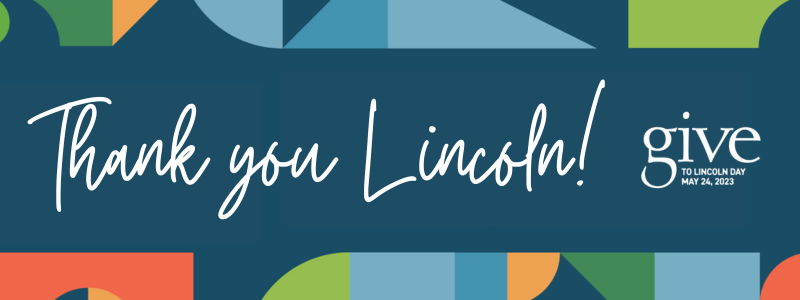
The 12th annual Give to Lincoln Day on May 24th raised more than $7.5 million for 456 local nonprofits. The funds are designated to help support charitable organizations that serve Lincoln and Lancaster County. All participating nonprofits will receive a proportional share of a $500,000 match fund based upon the organization’s percentage of the total dollars raised, provided by LCF and sponsors including Presenting Sponsor, West Gate Bank.
“Year after year, Give to Lincoln Day offers us the chance to give back to the organizations that are near and dear to us,” said Alec Gorynski, LCF president. “Organizations that provide art and cultural experiences, teach and guide our youth, support those who are experiencing hard times, care for our four-legged friends and much more.”
Nearly 25,000 donations were received for the 12th annual Give to Lincoln Day. The event has raised more than $57 million for local nonprofits in its 12-year history.
“The collective impact of 25,000 individual acts of generosity, along with the $500,000 matching fund, will empower the missions and fuel the critical work of 456 nonprofits for the year ahead,” said Gorynski. “We are thrilled with this year’s successful results that demonstrate the awesome power of philanthropy. When neighbors come together to on Give to Lincoln Day, we give everyone in our community the opportunity to thrive.”
For more information and to see gifts received for each nonprofit, visit www.GiveToLincoln.com.
Match Sponsors include: West Gate Bank (Presenting Sponsor), Assurity, Bill & Mae Whitmer Family Fund and ABC Electric, Bill & Marilyn Cintani, Cornhusker Bank, DA Davidson, Davis Design, HBE, Kawasaki, Kubly Family Foundation, Lutz, Mail Management, The Family of J. Gates and Daisy Minnick, William J. Mueller & Kim M. Robak, Olsson, Pepsi, Pinnacle Bank, Runza, Joe W. & Ruth K. Seacrest Fund, Tom & Lisa Smith, Talent Plus, Mark H. Tallman and WRK Family Foundation.
Closing the Housing Affordability Gap
Published on Oct 6, 2023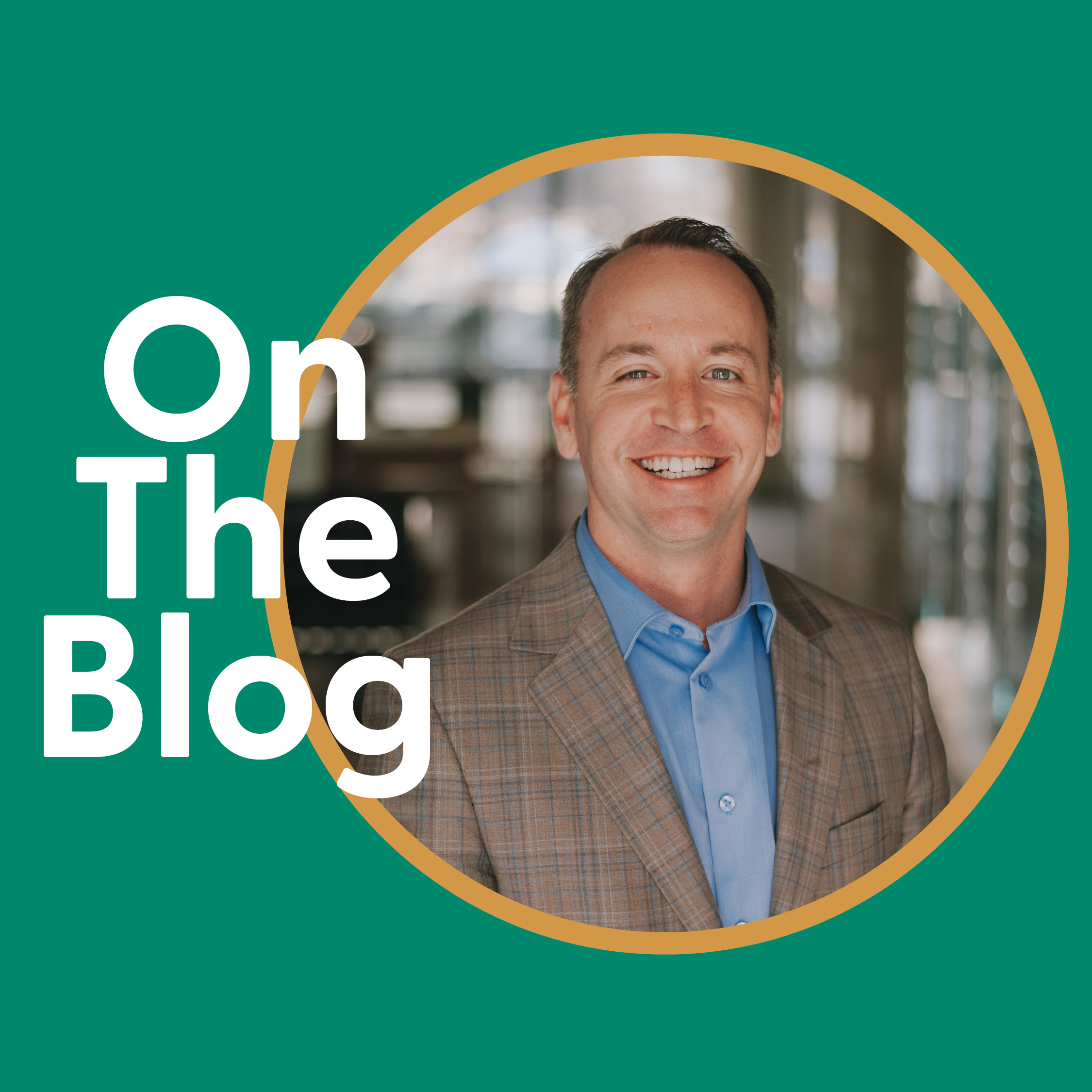
by Alec Gorynski
With the need for affordable housing on the rise, advocates from across our community continue to sound the alarm and call for solutions. Our business community calls for more housing to provide a place for their employees to sleep at night; our government officials recognize the role housing plays in recruiting and retaining people in our state; and human service organizations advocate for safe and stable housing environments so that families can live healthy lives.
With a chorus of voices calling for action, we wanted to help folks in our community participate in the discussion by clarifying the current challenges and laying out potential solutions. And the biggest challenge, as we see it, is something called the affordability gap.
The concept of the affordability gap helps us embrace the idea that access to housing for low, moderate, and even middle-income families is not feasible in the free market given some common realities. A universal standard is that a family, regardless of income, should not need to contribute more than 30% of their income toward housing, otherwise they are considered housing cost burdened.
For example, the amount needed to build a very modest, single-family home is hovering around $300,000. At $76,000 per year, which is 80% of the median family income in Lincoln, a moderate-income family could only afford to borrow around $200,000 to be able to afford the monthly mortgage payment with escrow. This leaves at least a $100,000 gap between what is affordable for this moderate-income family and the cost to build the home.
The cost to develop housing, single family or multifamily, does not permit low-, moderate-, and middle-income families the ability to afford the rent or the mortgage of those homes given that universal standard of 30%. This is not a new problem, yet the problem has gotten significantly worse with rising labor and material costs.
A higher income certainly means an increased ability to afford, but it is not until a family reaches closer to $100,000 per year, 120% of our median family income, that they can afford a nonconventional mortgage with only 5% downpayment on that $300,000 home.
A multifamily development creates a similar gap between affordability and cost of construction. For example, a family earning $58,000 per year, or 60% of the median family income in Lincoln, which is a pretty common affordable housing beneficiary, can only afford a monthly total housing cost of $1,300, which includes rent and utilities; and many housing advocates feel this number is still too high given the rising costs of everything else in our life. However, the rent the developer would need to charge to cover operating expenses and their annual loan payments on the building would need to be much higher.
As noted, both cases above create an affordability gap that leaves thousands of Nebraskans with limited and poor options for housing. In fact, 44% of Nebraska’s low-, moderate-, and middle-income families are housing cost burdened and fall into the affordability gap. The gap needs to be filled with some form of subsidy which can either be directly applied to the cost of development, which ultimately is passed onto the family in the form of an affordable purchase price or rent payment, or is also directly applied to owner, which then is passed onto the developer by paying them what it costs to develop.
This is not altering the market, and rather is funding participation in the housing market, a human need, for families that simply cannot afford to participate.
Private philanthropy, from individual donors, foundations, and even corporations, has been investing in affordable housing to close this affordability gap. Charitable grants from these private institutions are used to contribute directly to affordable housing in several ways.
At LCF, we recently awarded a grant to fund a portion of the development costs for a 10-unit housing for refugee families. Our grant was paired with other grants that will reduce the cost of the development so that only an affordable rent is charged to these families. We also awarded a grant to fund down payment assistance for a low-income family, so they can afford the monthly mortgage payment on the home while the developer is able to recoup its full cost into the home.
These are of course just two examples of many instances of private individuals and institutions funding the housing affordability gap. Generous individuals and organizations are investing in housing development costs across the state. More is likely to come as our community continues to work towards solutions that make housing affordable for all.
Planning Your Year-End Giving
Published on Nov 2, 2023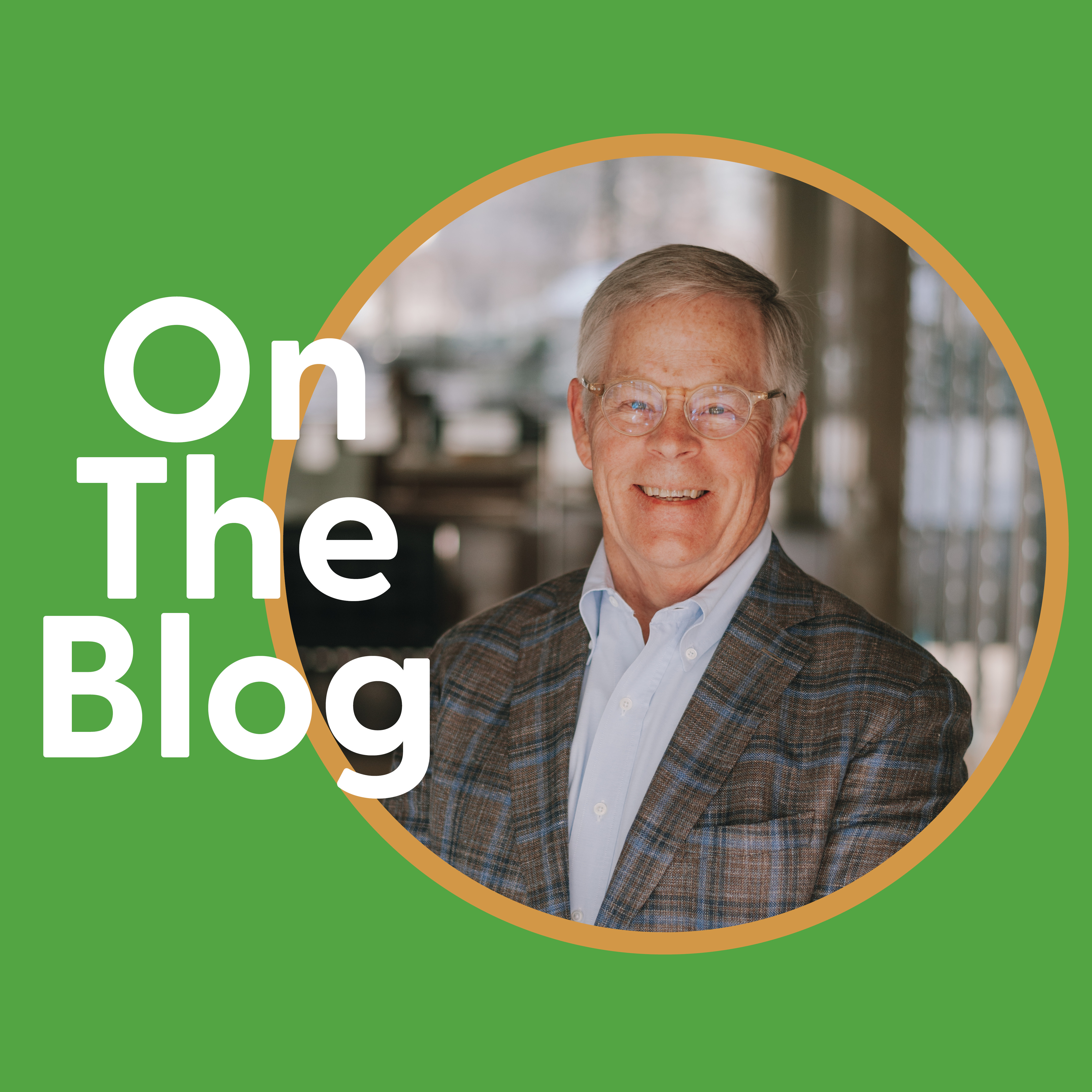
By Chip DeBuse
The end of the year always seems to sneak up on us, doesn’t it? One minute, we’re watching fireworks on the fourth of July and then next – the season of giving thanks and gathering with friends and family is upon us. Many folks use the end of the year as a special time to give back to their community through charitable gifts and acts. Since 1955, the Lincoln Community Foundation has been privileged to serve as a steward for this year-end generosity, connecting donor passions to local needs.
Of course, there are many ways to make a meaningful year-end charitable gift. A gift of appreciated stock or mutual fund shares provides an enhanced tax benefit when compared to a gift of cash. The donor receives an income tax charitable deduction for the full value of the donated shares and pays no long-term capital gains tax on the appreciation.
For example, Elena purchased stock for $3,000 ten years ago that is now valued at $10,000. If she sells the stock, she will incur a capital gains tax of $1,050 ($7,000 appreciation x 15% capital gains tax rate). Instead, Elena chooses to use the stock to make a charitable gift. In her 28% tax bracket, she enjoys a deduction of $2,800 for the full fair market value of the stock ($10,000). She also avoids the $1,050 capital gains tax liability she would have paid if she sold the stock. Therefore, the net cost of her gift is only $6,150 ($10,000 – $2,800 – $1,050) compared to $7,200 for a cash gift of $10,000.
There’s another giving technique that’s gaining traction lately for folks of a certain vintage. An IRA charitable rollover allows donors of a certain age to make a tax-free transfer from an IRA directly to a qualified charity. The amount transferred is not eligible for a charitable income tax deduction, but it counts toward the donor’s annual required minimum distribution (RMD). This is an especially attractive option for donors that must take IRA withdrawals they do not need.
Donors can use these taxwise giving methods to benefit the charitable organizations that reflect their interests and passions. Your financial advisor or the Lincoln Community Foundation can help you make these creative gifts. Please let us know if we can be a resource as you reflect on how best to make an end of year gift that is meaningful to you and your family. I can be reached at (402) 474-2345, or chipd@lcf.org.
Tips for clients’ year-end giving
Published on Nov 3, 2023
Year-end giving makes up a significant portion of total revenue for most charitable organizations. Research even shows that a whopping 25% of online giving occurs in December! What this means is that there’s a pretty good chance your clients are already considering end-of-year gifts to support causes they care about, are being asked by at least one nonprofit for an end-of-year gift, or both. That’s why it’s important for you to talk with clients well in advance of the year-end giving rush.
Here are six tips to help jumpstart your client conversations over the next few weeks. Please give us a call if you’d like to dive deeper! We are here for you.
Check in on goals. By discussing your clients’ overall charitable goals, you can ascertain which causes your clients are passionate about and why they care, how much they’d like to contribute in the short term and over time, the impact they’d like to see, and whether they intend to provide for their favorite charities in their estate plan. Against this backdrop, year-end giving strategies become easier to develop.
Explore a wide variety of fund types. Donor advised funds are very popular vehicles, and community foundations are ideal providers of donor advised funds for clients who want to keep their philanthropy local and benefit from the community foundation’s focus, expertise, and mission-driven 501(c)(3) status. But donor advised funds are not the only types of funds that LCF offers. Your clients can also establish field-of-interest funds, designated funds, unrestricted funds, or scholarship funds. Our team will help you evaluate what type of fund (or funds) is best suited for a particular client. For example, a client considering a Qualified Charitable Distribution from an IRA is a great candidate to establish a field-of-interest or designated fund.
Understand the Lincoln Community Foundation’s donor advised fund advantages. As you work with clients for whom a donor advised fund is appropriate, be sure you understand why the Lincoln Community Foundation is such a great fit for so many philanthropic individuals and families. Indeed, LCF is truly the local option for donor advised funds. Large, national providers associated with financial institutions also offer donor advised funds, but those vehicles are typically not a fit for clients who care about our community and want to support the region’s nonprofits in a meaningful way.
Know how a donor advised fund works. It’s easy for a client to establish a donor advised fund at LCF. After completing simple paperwork, your client will make a tax-deductible gift (of cash or, ideally, stock or other highly-appreciated asset) to the Lincoln Community Foundation to fund their donor advised fund. The funds can then be granted out to eligible charities at the client’s recommendation over time. Many clients find that a donor advised fund operates almost identically to a private foundation, but without the sometimes hefty administrative overhead costs and burdensome restrictions. A donor advised fund can be named after the client (e.g., Smith Family Fund) or named to reflect the purpose of the client’s giving (e.g., Fund for the Future of Anytown), or even structured to enable the client to give anonymously.
Supercharge both tax benefits and giving. Giving through a donor advised fund at the Lincoln Community Foundation may allow a client to tap a helpful technique called “bunching,” which maximizes the client’s itemized deductions for the tax year, while still ensuring that the client can give strategically over the next few years to achieve charitable goals and support favorite organizations when they need it the most.
Don’t default to cash. Many clients naturally think of cash as the source for their year-end giving. That’s a missed opportunity! Most of the time, highly-appreciated marketable securities (or other highly-appreciated, long-term assets) are a better gift to a client’s fund at the Lincoln Community Foundation or other public charity because the client is eligible for a tax deduction at the assets’ fair market value, and the proceeds from the sale of the assets will flow into the client’s fund at LCF free from capital gains tax. That means more funds are available to support the client’s favorite causes.
Philanthropy is an important topic of conversation with your clients, not just at the end of the year, but always. Our Philanthropy Services team is here to help you ensure that your clients can meet their financial and charitable goals through year-end giving and beyond.
The Season of Gratitude and Giving
Published on Dec 11, 2023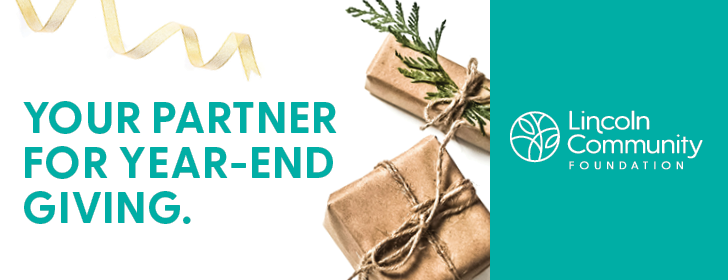
Your Guide to Year-End Giving
2024 is just around the corner but there’s still time to make a difference this year! To assist your year-end giving, here are a few helpful reminders:
1. If you have an LCF donor advised fund, any donations you make to your fund through your donor portal between now and December 31st at 11:59 pm central time will be credited to 2023. Please submit any grant recommendations as soon as possible so they can be fulfilled by the end of the year. For support in donating to your fund or requesting a grant, please contact Rhonda Page at 402-474-2345 or rhondap@lcf.org.
2. Online gifts may be made now through 11:59 pm central time on New Years Eve to be credited as a 2023 contribution. Click here to make your year-end gifts to any LCF fund.
3. Notify us now of any gifts you may send via stock or IRA distributions as these require extra time and coordination. Stock gifts must be received in one of our brokerage accounts by the close of the markets on December 29th. Contact Chip DeBuse with questions at 402-474-2345 or chipd@lcf.org.
4. Gifts mailed through USPS must have a visible postmark of no later than Saturday, December 30, 2023, to receive credit in 2023. Please make all gifts payable to “Lincoln Community Foundation,” with the fund name noted on the memo line. Gifts arriving via UPS or FedEx must be received at the Foundation by 5:00 pm on December 29, 2023, to be credited in 2023.
Lincoln Community Foundation
215 Centennial Mall South
Suite 100
Lincoln, NE 68508
402-474-2345
5. Need help deciding where you want your year-end gifts to go? Consider a gift to Lincoln’s future. LCF’s Lincoln Forever Fund supports the ever-changing needs and opportunities in our community. You can also open a donor advised fund before December 29th to make your 2023 year-end gift now and decide later how you want the funds to be distributed.
6. Our office will be open December 26-29 from 8:00 am – 5:00 pm. LCF is proud to be your philanthropic partner in 2023 and beyond. Please let us know how we can assist you.
Thank you again for your support throughout this past year. Together, we are building a better tomorrow. Cheers to a prosperous 2024!
Celebrating Community Foundation Week
Published on Nov 14, 2023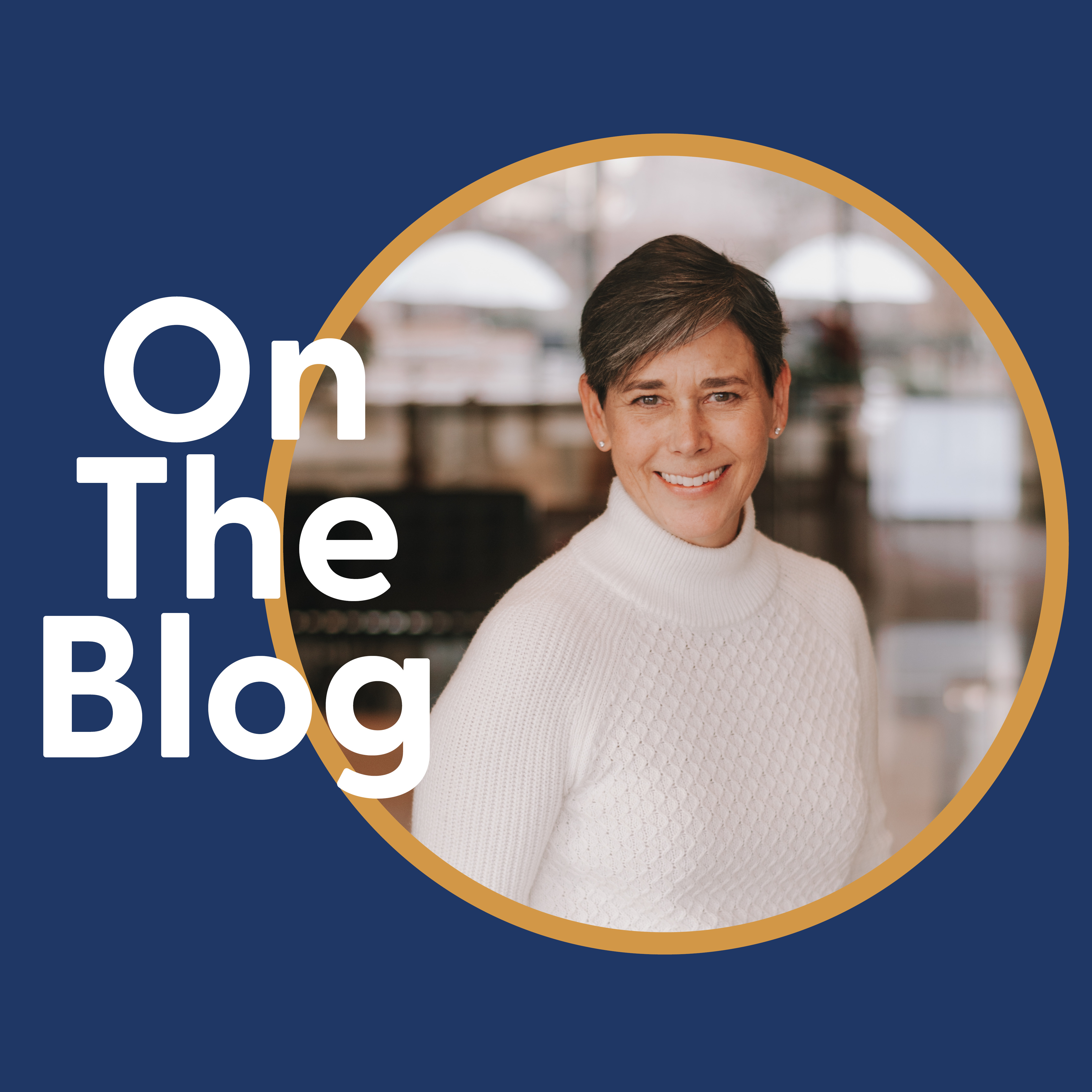
By Tracy Edgerton
Since 1914, community foundations have provided resources and support to improve the lives of residents and create vibrant neighborhoods through their mission-driven work.
This week, Lincoln Community Foundation will join in a nationwide celebration, November 12-18, 2023, to recognize the increasingly important role that philanthropic organizations play in guiding and empowering their communities toward a common good.
Community Foundation Week was created in 1989 by former president George H.W. Bush to recognize the work of community foundations throughout America and their collaborative approach to working with the public, private, and nonprofit sectors to address community problems.
At LCF, we wanted to take a moment during this time to share a little bit more about who we are and how we facilitate positive change for the common good.
A group of visionaries with a sincere affection for Lincoln and dedication to its constant improvement founded the Lincoln Community Foundation back in 1955. The first grant awarded in that year was $539.70 to support a movie and slide projector for Pinewood Bowl. With gifts of all sizes from thousands of donors over the years, the assets of LCF have grown exponentially, and our work has expanded as well.
We serve as faithful stewards for many types of philanthropic gifts and help donors create a legacy of giving. We act as community leaders to identify needs and opportunities and convene diverse voices from all sectors of our city to craft responses and solutions. We encourage and support the many nonprofit organizations in our community that contribute so much to our quality of life.
This Community Foundation week, we celebrate the many accomplishments and highlights of the past year.
Together we…
- Rallied around local nonprofits to raise $7.5 million on Give to Lincoln Day
- Unveiled new grant programs to support affordable housing and strong neighborhoods
- Honored generosity and leadership at our annual donor recognition event
- Fueled student success by awarding nearly $550,000 in scholarships
- Invested in the important work of Lincoln Littles by raising $667,400 in community support of early care and education
- Welcomed new members of LCF’s Legacy Society, Lincoln Benefactors and Board of Trustees
We know that this success is thanks to people like you who care about improving our community. We are so grateful to our generous community and look forward to continuing this important work together.
Clinic with a Heart: Offering a lifeline
Published on Apr 20, 2020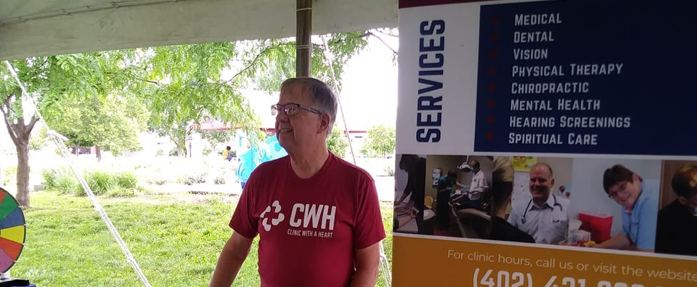
For years, Lincoln’s under- and uninsured residents have turned to Clinic with a Heart for free health care. Delivering that care with hospitality, dignity and grace is a mission for the clinic. COVID-19, however, has changed the way they carry out that mission.
“It’s changed every single thing we do,” said Executive Director Teresa Harms. Clinic services have been reduced, based on CDC restrictions and in order to reduce patient numbers at the clinic.
“This has all been heartbreaking,” said Harms. The clinic’s patients, many of whom are homeless, have been hit hard by the pandemic. “They are more afraid than most of us, because they are the people working at the fast-food drive thru and the grocery store,” she said. “They can’t miss work but they don’t have access to health care. Their stress is palpable. Everything that was helping them has changed and is now less than it was.”
Like many nonprofits, the clinic had to cancel its upcoming fundraiser, where they’d hoped to raise over $100,000. The grant from the Lincoln COVID-19 Response Fund will help the clinic keep afloat. “These funds will sustain us through the near future,” said Harms.
For more information on the Lincoln COVID-19 Response Fund and to make a donation, click here.
Lincoln Literacy: Creating new tools in changing pandemic world
Published on Apr 20, 2020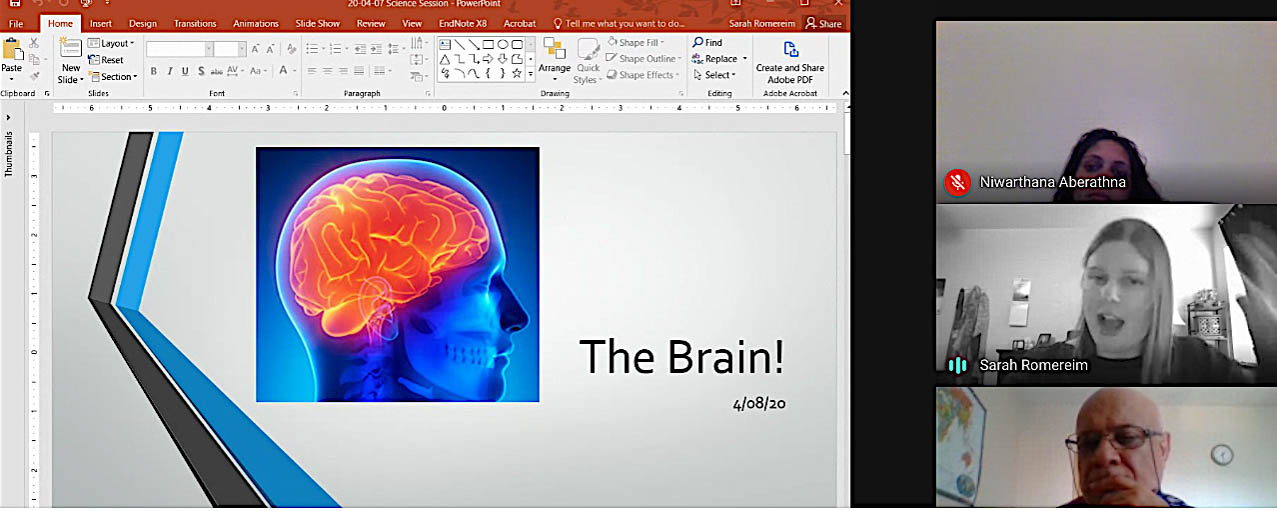
Life changed in an instant and although Lincoln Literacy paused to regroup, they have bounded back fast, according to Clayton F. Naff, executive director. “This pandemic changed everything and we needed to change with it.”
“We serve some of the most vulnerable in this community, people who don’t have English as a first language, those who are not as literate as the general population. We needed to reach out immediately to help them understand what was going on and get them critical, reliable information about the pandemic.”
Last week Lincoln Literacy took some enormous strides:
- Restoring educational services with 38 online classes
- Restarting GED prep classes
- Reviving classes on becoming a Certified Nursing Assistant
- Re-starting online English language classes
- Creating multi-lingual videos in key languages
- Adding virtual field trips
“I’ve never been prouder to live in Lincoln than now,” Naff said. “We have really demonstrated that we are a community and that we care about one another. Despite our individual worries, we are willing to pitch in and help one another. And that’s beautiful.”
For more information on the Lincoln COVID-19 Response Fund and to make a donation, click here.
For Good
Published on Dec 12, 2022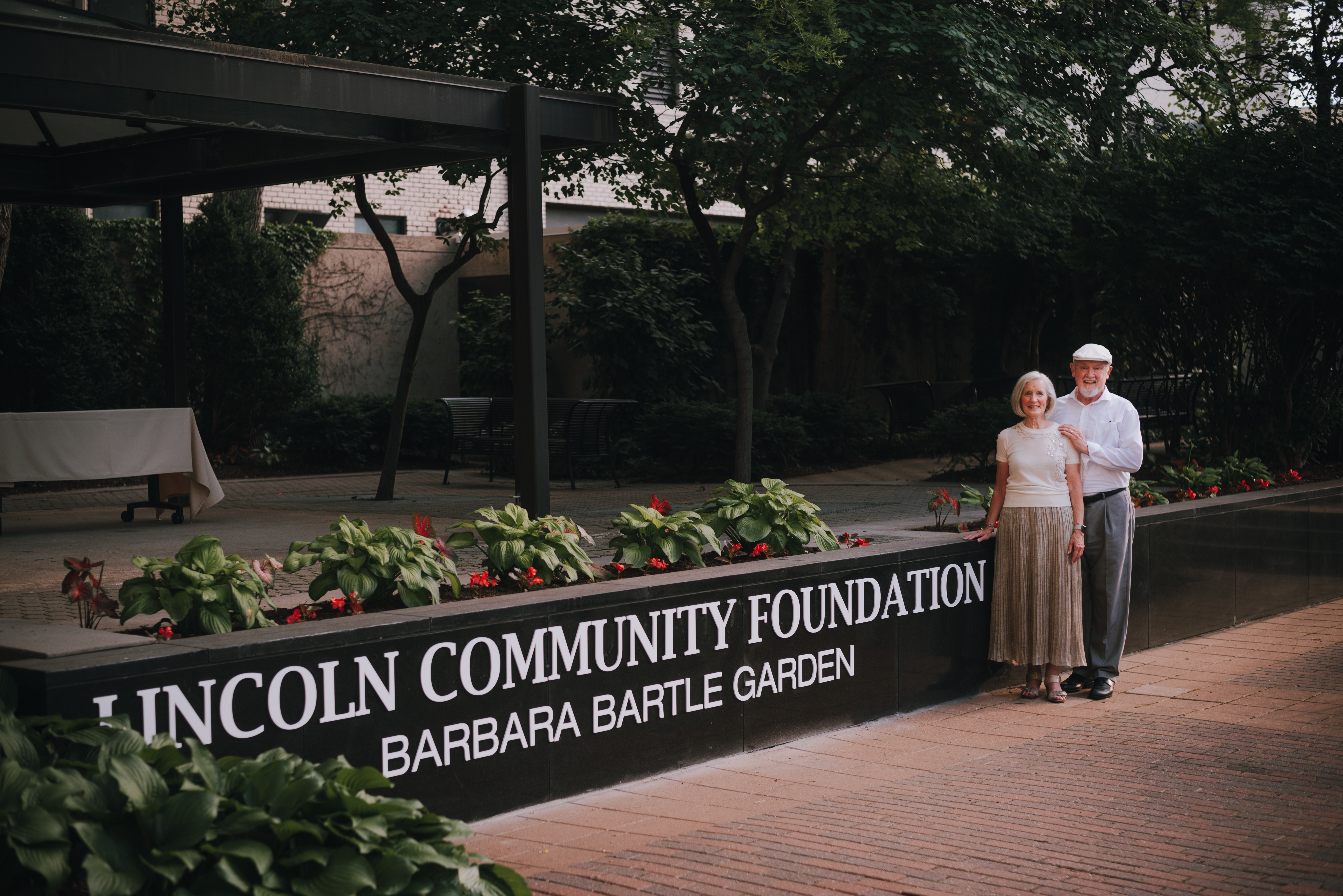
At the close of 2021, Lincoln Community Foundation’s board of directors prepared to celebrate President Barbara Bartle’s retirement and for a moment, members of the board were stumped. How do you honor a 12-year tenure of leadership such as Barbara’s? The board decided it needed to be something as impactful as her time at the Foundation – something that truly would leave a mark.
In June, the board unveiled and dedicated the newly named Lincoln Community Foundation Barbara Bartle Garden at LCF’s annual Legacy Society, Benefactor and Trustee celebration.
“Barbara’s impact on the Foundation will last for generations,” said Alec Gorynski, president. “With the Barbara Bartle Garden we are able to permanently memorialize her leadership.”
Barbara and her husband Bob recently set up the Robert F. and Barbara M. Bartle Garden Program Endowment Fund at the Foundation to support and fund programming in the Barbara Bartle Garden in perpetuity.
The evening also celebrated and welcomed new Benefactors, Legacy Society members and Trustees. These folks are passionate leaders of the Lincoln community who inspire others through their investment in its future.
Lincoln Benefactors
The establishment of LCF’s Benefactor Society many years ago formed the backbone of the Lincoln Community Foundation. These gifts provide long-term stability for the Foundation and significant benefits to our community nonprofit organizations.
The Benefactor Society recognizes current or future gifts of $50,000 or more to the LCF Operating Fund, gifts of $500,000 or more to any endowed fund, and gifts of $1 million or more to any LCF fund made during a 12-month period.
Legacy Society
Many donors document their charitable plans in a will or trust, establishing a gift now and funding it at end of life. These legacy gifts are highly honored by the Foundation.
THANK YOU TO OUR NEW BENEFACTORS AND LEGACY SOCIETY MEMBERS
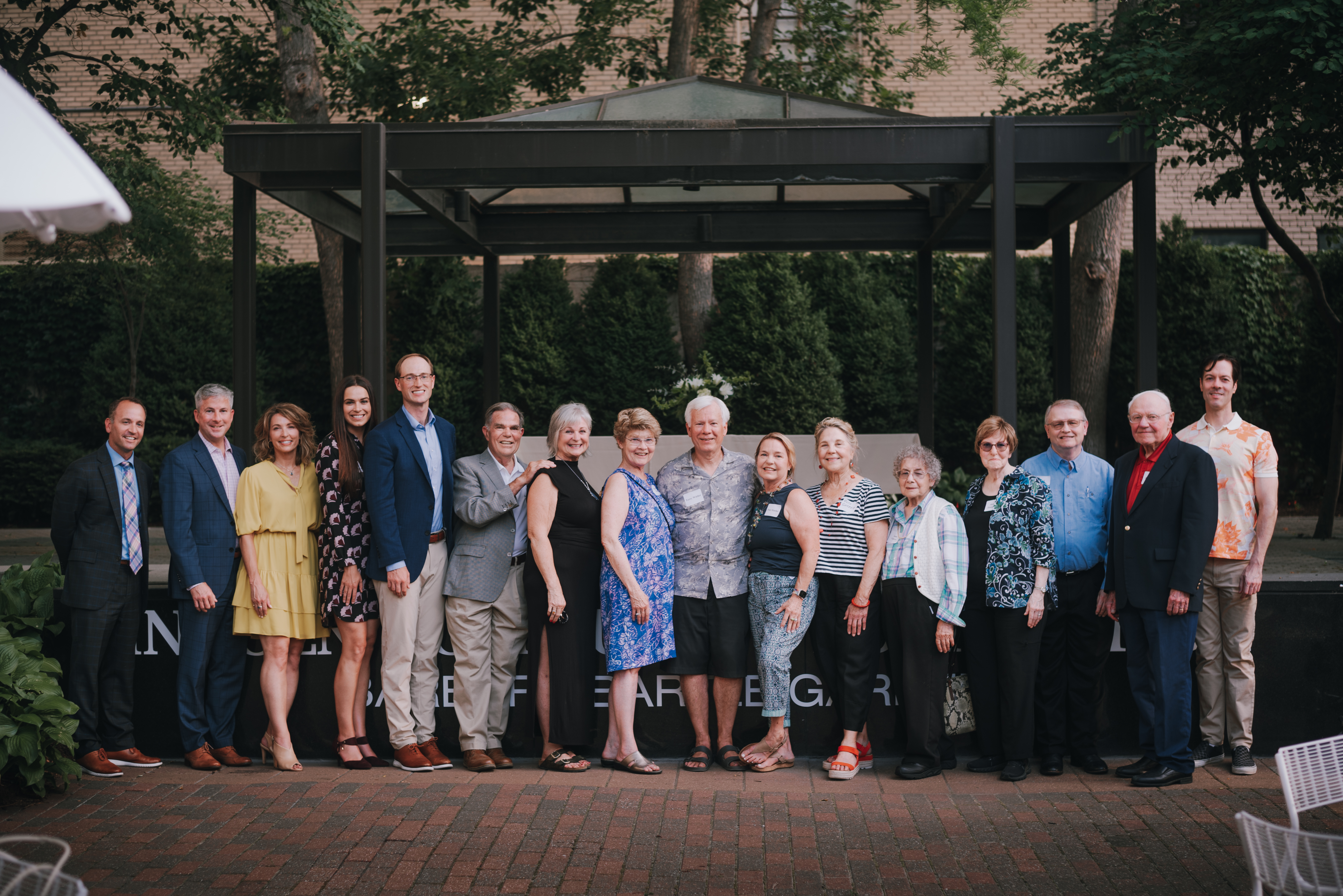
New Benefactors, members of LCF’s Legacy Society and Trustees gathered for a garden celebration on June 23. From left to right: Alec Gorynski, Todd & Amy Peterson, Reagan & Max Rodenburg, Fred & Julie Hoppe, Margaret Bartle & Terry Wittler, Pam Manske, Ruth Gerber, Anne Vidaver, Shirley Daugherty, Derrel Martin, Bill Woito, and Robert Hinrichs.
New Benefactors
Jim & D’Arcy Blosser
Rosalind & James* Carr
Pam Manske & Marty Adkins
JoAnn* & Derrel Martin
Linda Rossi
Scott & Jane Stuart
Art & Chris Zygielbaum
New Legacy Society Members
Cory & Lynné Bergt
Rosalind Carr
Jenny Chapin
Lyle* & Doris Jones
Dale E. & Janice E. Kimes
Pam Manske & Marty Adkins
Linda Rossi
Dr. Bruce & Debra Taylor
Anne Vidaver
Richard Vierk
Bert & Susan Wilkinson
Barbara* & Bill Woito
Art & Chris Zygielbaum
*honored posthumously
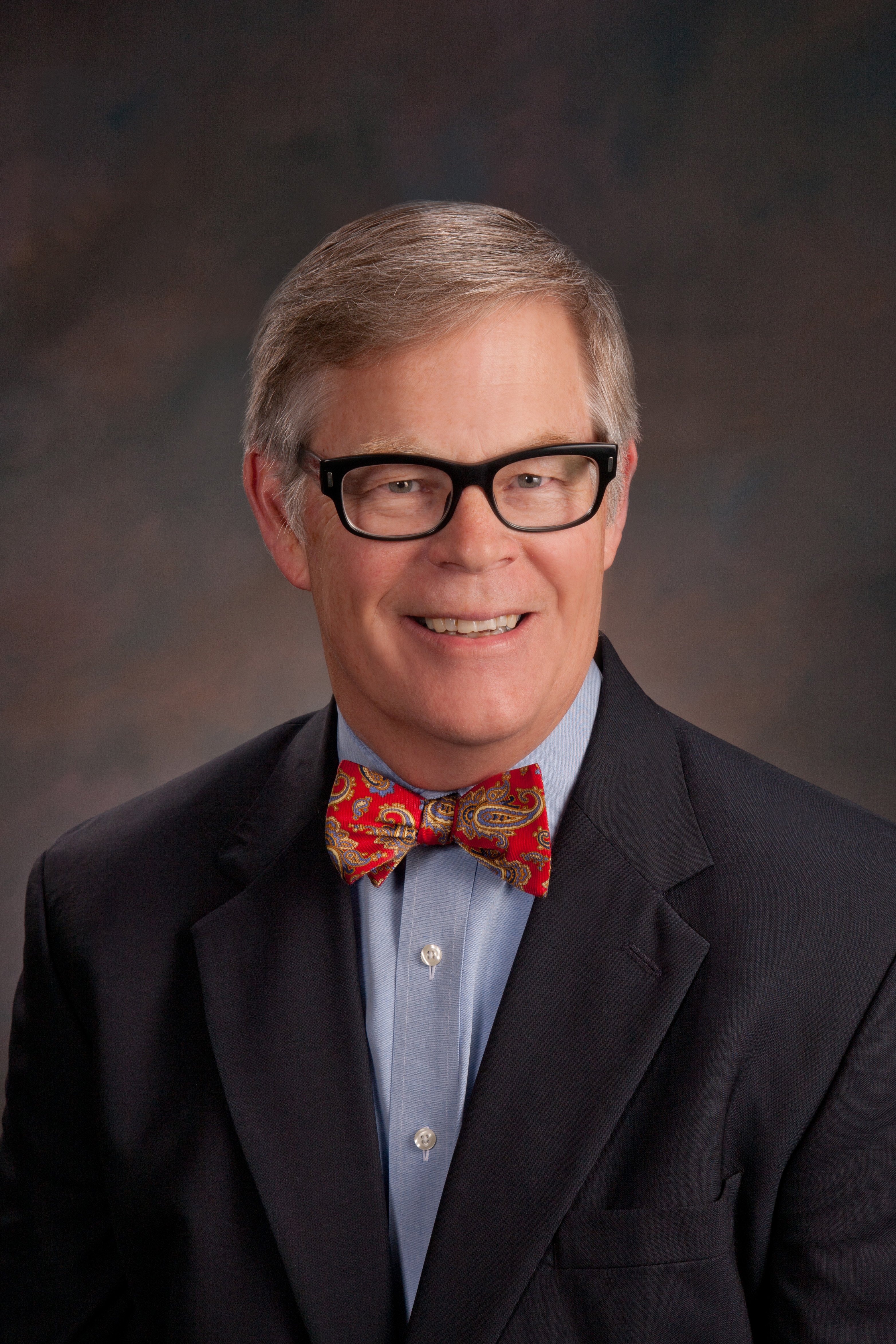
To learn more about planning a gift that leaves a lasting mark on Lincoln, contact Chip DeBuse, Vice President for Development, at 402-474-2345 or chipd@lcf.org.
Valuable conversations: Why it's smart to talk with your clients about charitable giving
Published on Jan 5, 2023
January is a good time to start helping your clients plan for their annual giving. With the year-end flurry of donations still fresh in many clients' minds, you may discover that clients will welcome your suggestion to make 2023 the year to get organized early, particularly as economic headwinds make planning especially important.
A conversation that benefits everyone
Among the many benefits of discussing charitable giving with your clients is that your clients will see you as an expert about local community needs and nonprofits, especially when you have a close working relationship with the LCF team. Your philanthropic clients want to learn how they can make a difference through their charitable activities, and they are expecting their advisors to be ready to help them structure and plan their giving. Indeed, for years research has shown that a proactive advisor who offers options for incorporating philanthropy into financial and estate plans inspires client loyalty, even across client generations.
Lincoln Community Foundation advantage
Advisors frequently comment that they’re surprised to discover the many ways LCF can help their clients, especially when compared with national donor-advised fund programs affiliated with brokerage houses or financial services firms. Sometimes the greatest needs are right here at home, and working with the community foundation is often the very best option for ensuring that your clients are informed and impactful philanthropists. Our LCF team works with local nonprofits every single day and understands how organizations are meeting community needs.
In addition, LCF is unparalleled in its ability to be flexible and responsive, providing outstanding personal service designed around your clients' needs. And we always respect and appreciate your role as your client's primary advisor.
Options for every client's unique situation
Our team welcomes the opportunity to work with you and your clients to implement their charitable giving goals. Here are just a few of the ways we can work with you as you plan for 2023:
Wills and trusts
A client can create a bequest to a fund at LCF through a will or trust or through a beneficiary designation on a qualified retirement plan or life insurance policy. LCF will provide proper bequest language.
Retirement plan beneficiary designations
Bequests of qualified retirement plans can be extremely tax efficient. Funds flowing directly to a client’s fund at LCF from a retirement plan after the client’s death are not subject to income tax or estate tax.
Family philanthropy
Consider encouraging clients to involve their children and grandchildren in philanthropy, especially when the clients are working with LCF through a family donor-advised fund or other collaborative giving vehicle.
Income tax planning
Remind clients that they are eligible for an income tax deduction for lifetime charitable gifts, and the gifted assets are no longer subject to future estate taxes.
Complex giving
Consider more complex giving vehicles, including charitable remainder trusts, charitable gift annuities, and gifts of real estate or closely-held stock. LCF can work with you to establish these structures to help facilitate your clients’ charitable giving goals and meet the clients’ financial and tax goals at the same time.
We look forward to working with you in 2023!
Story of Impact: Truth & Reconciliation History Project
Published on Dec 12, 2022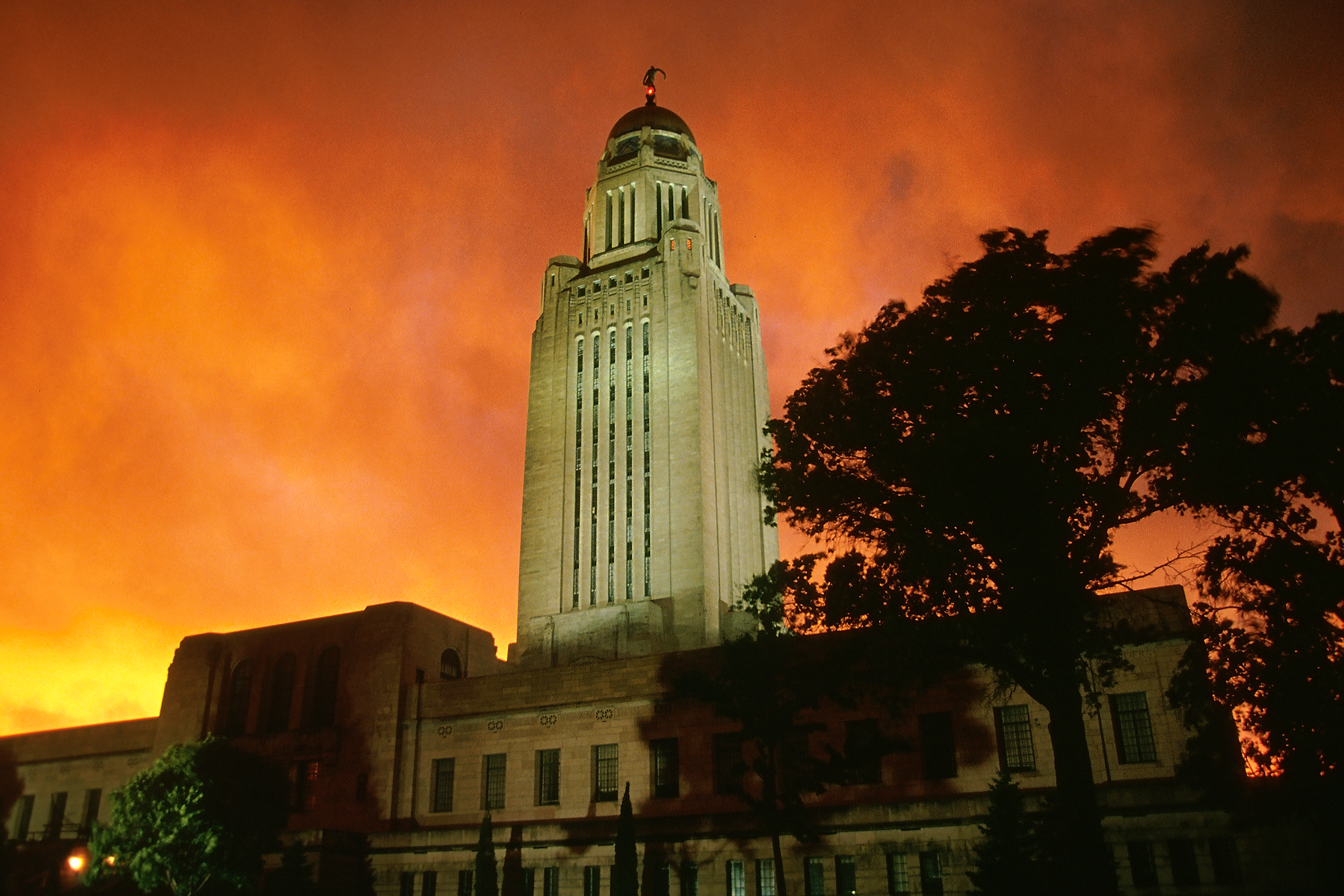
Uncovering the racial history of Nebraska and Lincoln’s last 170 years is not an easy task – but getting us closer to the truth is just what a group of community members have set out to do.
Initiated by the Lincoln NAACP and Nebraskans for Peace, Roots of Local Justice: Historical Truth and Fair Reconciliation aims to create a well-documented history of race in Lincoln and Nebraska. In 2021, the Foundation granted $7,500 to the project through our Open Door Grants program.
The idea came to life during discussions at a recent Nelson Mandela picnic, a celebration these groups host in Trago Park each year to honor Mandela’s civil rights work and his efforts towards truth and reconciliation.
“What initially started as a fun social event led to some forthright conversations about race and racism in Lincoln and the state of Nebraska,” recalled William Arfmann, co-president of the local Nebraskans for Peace chapter and member of the project’s steering committee.
“We decided we need to do more than have meetings,” added Dewayne Mays, president of the Lincoln NAACP, and chair of the committee.
As the conversation turned local, the idea took shape to tell the story of race and racism in Lincoln and Nebraska. The steering committee organized the project into researching and sharing the stories of Nebraskans from five distinct groups: African American, Latino, Asian American, Native American, and Refugees since 1975.
The Foundation’s Open Door Grant enabled the group to hire a graduate student to assist in the collection and compilation of stories for the project’s bibliography. Students at Lincoln Public Schools are already using this bibliography, which is currently available on the University of Nebraska-Lincoln’s Digital Commons webpage.
The project’s goal is that by the end of 2023, these five bibliographies will reflect a comprehensive narrative to help folks understand the history of our community, where we have gone astray, and what we can do to bring about reconciliation in our community and in our state. The committee is currently hosting local community listening sessions on Nebraska and Lincoln’s history.
“We needed to be able to do something for our community to bring people together and to talk about the truth, justice and reconciliation,” said Dewayne.
To learn more about the Roots of Local Justice program and book a speaker, contact Dewayne Mays at 402-429-4477 or mdmays402@gmail.com. Read more stories of impact at LCF.org.
Gifts of cash or stock: Is it a toss-up?
Published on Jun 6, 2023
As your charitable clients can likely attest, the going has been rough for many of the nonprofit organizations they support. Turbulent economic conditions, concerns about inflation, and challenges in the banking sector are just a few of the factors that are causing donors to be more financially conservative and perhaps begin to evaluate whether to keep their charitable giving at the levels of years past.
At the same time, many of your clients deeply understand the need to support the nonprofit sector and continue giving to the charities they love. Philanthropic support to these organizations is critical to maintaining and improving the quality of life in Lincoln and beyond. This is especially true as the number of households giving to charity has declined by more than 16% during the last three years.
As we head into the summer months, it’s a good idea to touch base with your clients about their charitable giving budgets for 2023 and help them evaluate the types of assets that are best suited to give to charity. In some cases, it may be best for your clients to give cash. In others, stock may be more appropriate.
For example, as interest rates and inflation continue to increase clients’ concerns about their household finances, you and your clients may decide that preserving cash is a priority. This means that some of your clients who typically give cash to their favorite charities or donor advised funds may be reluctant to do so this year. There’s a silver lining here, because giving appreciated, publicly-traded stock to charitable organizations is a highly effective tax strategy in any economy. The client is typically eligible for an income tax deduction at the fair market value of the securities, and when the charity sells the securities, the charity does not pay capital gains tax. It’s a win-win! And even in a rocky stock market, not all stocks are down. Many of your clients are no doubt holding long-term stock positions that have appreciated substantially since they were purchased, even with the current stock market malaise.
For some clients whose portfolios are down significantly, this may be a year to consider contributing cash to an LCF donor advised fund instead of donating appreciated stock. Gifts of cash could reduce the burden on a client’s personal stock positions that may have fallen in value dramatically, giving these positions more time to recover value and, at some point in the future, perhaps contributed to a donor advised fund at a higher value.
In turbulent times like this, donor advised funds may come in especially handy. Now is the time to discuss charitable giving with those clients who regularly added to their donor advised funds throughout the market’s long bull run. If these clients intend to ride out today’s market conditions in their personal portfolios, an up-and-down stock market doesn’t mean the clients’ 2023 charitable giving must take a hit. They can use their LCF donor advised fund to support their favorite organizations, sometimes even at levels consistent with prior years.
As always, please reach out to discuss options for your clients’ charitable giving. We are happy to help you help your clients achieve their goals, even in a year as bumpy as 2023 appears to be!
Bridging the gaps in multi-generational family philanthropy
Published on Jun 6, 2023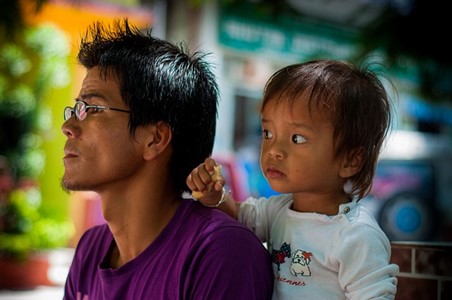
Differing views within families are nothing new. For generations, common topics of disagreement have included popular culture, politics, religion and parenting, just to name a few. Frequently outranking all is money, and how it’s made, spent or saved—or not.
How benevolent families share money is a topic all its own. It may even be more relevant now given the current reality: up to four generations living simultaneously; longer lifespans; more willingness to discuss family finances; differing social views; and the desire of older generations to set a good example while retaining some control of assets built over many years.
And the “share” discussion will likely continue for decades.
According to figures cited in a May 2023 New York Times article (subscription required), total U.S. family wealth of $38 trillion in 1989 more than tripled to $140 trillion in 2022, with Baby Boomers and Generation X holding 90% of that. By 2045, older Americans will pass down a projected $84 trillion to Millennial and Gen X heirs, with $16 trillion transferring by 2033. With more wealth circulating, both ideas and conflicts about its use will likely result.
As an advisor, you work diligently to help your clients achieve their goals for their estate plans, financial plans, and charitable objectives. As you work with your multi-generational philanthropic clients, you have no doubt noticed that even philanthropy can lead to lively discussions and disagreements. To fulfill your responsibilities, you may need to lean on strategies to navigate conversations about charitable priorities when not everyone is on the same page.
You can also lean on Lincoln Community Foundation–and we encourage you to do so! We can provide a unique perspective in the midst of the unprecedented wealth transfer now underway and serve as an arbiter, guide and even peacemaker among benevolent multi-generation families. In addition to understanding the needs of the community and the nonprofits and programs that are addressing those needs, our team is deeply experienced in facilitating productive dialogue among people who bring valuable, diverse viewpoints to the table.
As a secure, convenient, and trusted partner to help a family invest wealth in charitable causes, LCF can help you work with your philanthropic clients in a variety of ways:
–Our team focuses on listening to understand the cross-generational family values.
–We ask a lot of questions about what matters most to your clients and the origins of those preferences, both historically and now.
–We pair our team members with each family so that we can foster more intimate, empathetic, and meaningful discussions.
–We seek to understand a family’s values, and we will then research and suggest potential grantee organizations or causes if the family desires such input. We can also deeply research organizations the family is already supporting.
–LCF can provide general education about the tactical opportunities for charitable giving, including donor advised funds, designated funds, and anonymous giving, among others.
–Our team is happy to develop options for multi-cause allocations that meet the needs of the entire family.
We are here for you and the philanthropic families you serve. As the needs, capabilities, and opinions around wealth expand, Lincoln Community Foundation can facilitate conversations, connections, and contributions among well-intended but independently-minded families and help you accomplish your professional responsibilities.
Lincoln Community Foundation Awards $546,000 in 2022 to Support 87 Local Nonprofits
Published on Apr 19, 2023The Lincoln Community Foundation distributed $546,000 in community grants to local nonprofit organizations through Open Door Grants. These grants are made possible by contributions from the Lincoln Forever Fund and from LCF donor endowment funds. Organizations that received funding include:
Abendmusik at First-Plymouth
Operational support for 2023-2024 season concerts
Aging Partners
Capital funding for Aging Partners relocation to Victory Park
Autism Family Network Lincoln
Swimming lessons for children with autism
Banisters Leadership Academy
Night LIFE program at F Street Rec Center
Barnabas Community
Operating support
Big Brothers Big Sisters Lincoln
Operating support
BLIXT Locally Grown
Support for the launch of The BLIXT Storefront Theater and School for Performing Arts
Bryan Foundation
Pandemic commemorative art on both campuses
Camp Floyd Rogers
Scholarships for Lincoln children with diabetes to attend camp
Capital Humane Society
General purposes
Cause Collective
Board capacity building programming and Successful Transitions cohort
Cause Collective
Network for Good Jumpstart program cohort for 2022-23
Center for Legal Immigration Assistance
Operating support
Center for People in Need
New passenger lift for accessibility of upper level classroom
CenterPointe
Serenity Garden at new facility
Child Advocacy Center
Operating support
City of Lincoln, Parks & Rec Department
Pilot grant program for low-income property owners to replace diseased/dying trees
City of Lincoln, Urban Development
Lead mitigation matching grant
Civic Nebraska
Afterschool tutoring programs at Lincoln High School and Lincoln Northeast High School
Clyde Malone Community Center
Operating support
Community Action Parntership of Lancaster/Saunders Counties
Basic care items for families impacted by COVID-related Head Start program closures
Community Crops
Operating support
Cornhusker Council, Boy Scouts of America
ScoutReach Program in Lincoln CLCs
Cultural Centers of Lincoln
Campaign Design Study support
DreamCatchers Ride
Tuition for director to attend equine-based emotional support training
Educare Lincoln
New early learning classroom support
El Centro de las Americas
Latino Leadership Youth Program
F Street Neighborhood Church
Renovation of 1873 building for a community art studio and gallery
Food Fort
Operating support
Forward - Trinity Lutheran Church
Funds for diapers and wipes for families attending Forward
Fresh Start
Operating support
Give Nebraska
Conversion to updated CRM Lite cloud-based database
Good Neighbor Community Center
Operating support
Heartland Bike Share (BikeLNK)
Sponsorship of bikes
Heartland Cancer Foundation
Financial assistance to Lincoln cancer patients for home, auto, utility expenses
Jazz in June (NU Board of Regents)
2022 season sponsorship
Junior Achievement of Lincoln
JA Job Shadow program for 8th and 11th grade students in LPS
Karen Society of Nebraska
Operational support
Lancaster County Emergency Management
Weather radios for low-income residents and emergency preparedness materials
Legal Aid of Nebraska
Set Aside clinic in Lincoln
Lincoln Animal Ambassadors
Pet food bank
Lincoln Arts Council
Sponsorship of 2022 Lincoln Arts Festival
Lincoln Arts Council
Annual sponsorship of LCF Arts for Kids Award at Mayor's Arts Awards
Lincoln Children's Museum
Operating support
Lincoln Children's Zoo
Animal care
Lincoln Council of St. Vincent de Paul
Operating support
Lincoln Crossroads Festival
2023 festival support
Lincoln Flying Disc Club
New Beal Slough Disc Golf course--tee pads and trees
Lincoln Literacy
Operating support
Lincoln Parks Foundation
ADA-accessible boat and fishing dock at Holmes Lake
Lincoln Stormwater Study Fund
Support for a study of impacts of increased rainfall and stormwater, and development of potential solutions and regulations.
Lincoln Veterans Parade Group
Parade sponsorship
Lincoln Youth Complex
Capital funding for building Lincoln Youth Complex
Lincoln-Lancaster County Human Services Administration
Community assessment of victim/survivor services in Lancaster County
Madonna Foundation
Purchase of PCeye Mobile device
Matt Talbot Kitchen & Outreach
Support for building expansion
Meadowlark Music Festival
2022 season support
Mentor Nebraska
Expanding access to mentoring for youth in Lancaster County
Mercy Housing Midwest
Resident Services Program
MilkWorks
Clinical lactation support for Lincoln-Lancaster County families
Mourning Hope Grief Center
Purchase of a HIPAA compliant database and hard copy materials for community members
Nebraska Appleseed
Funding for Community Assistance Line
Nebraska Children's Home Society
Operational support
Nebraska Housing Developers Association
Online version of RentWise, a Renter and Housing Provider Community Education tool
Nebraska Juvenile Justice Association
Operational support
Nebraska Writers Collective
Support for teaching artists for All Writes Reserved Youth Spoken Word activities at LPS
NextGen Lincoln Fund
2022 grantmaking and operations
Our Village Collective
Operating support
OutNebraska
Canvassing support to build relationships and knowledge on issues impacting transgender Lincolnites
Partnership for a Healthy Lincoln
Double Up Food Bucks program in Lincoln through Nebraska Extension
Pickleball Lincoln, Inc
Development of Pickleball courts at Ballard Park
Planned Parenthood of the Heartland
Sex education in partnership with LPS, universities, and community organizations
Project Connect - Lincoln Homeless Coalition Fund
Animal care at Project Connect event
Rabble Mill
Operating support for Lincoln program
RISE
Operating support for Lincoln work
School District 145 Foundation for Education
Viking Support Station renovations (student emergency needs)
ShelterMe Nebraska
Operating support
Special Olympics Nebraska
Support for Unified Champion Schools programming
Tabitha
Meals on Wheels program
Union College
Foot Clinic at Matt Talbot Kitchen & Outreach
United Way of Lincoln and Lancaster Co.
Ride United: Last Mile Delivery Program
United Way of Lincoln/Lancaster County
Lincoln Resettlement Fund for refugee needs and opportunities
University of Nebraska Foundation (University Honors Program)
Support for Operation Brain Gain for internships with Lincoln nonprofits at the Foundry
UNL Military & Veteran Success Center
General purposes
Vision Maker Media
2022 Native Filmmakers Summit held in Lincoln
Wellbeing Initiative, Inc.
Operational support
Willard Community Center
Operational support
How “catch-up” contributions can boost clients’ giving
Published on Jul 6, 2023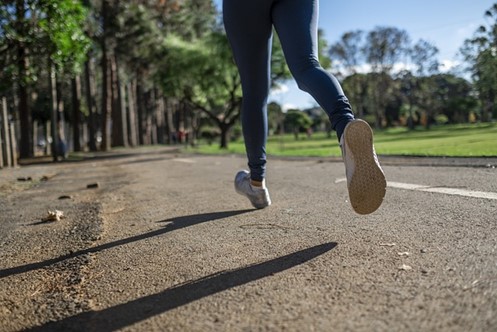
At the Lincoln Community Foundation, we regularly work with legal, financial, and tax advisors like you to help clients reach their charitable goals.
As a professional who regularly works with charitable clients, you are no doubt well aware of the tremendous benefits to both clients and charities when a client names a charity as the beneficiary of an IRA or other qualified retirement plan.
So how can you help a client plan ahead to maximize a bequest of retirement fund assets, as well as support increased giving during the client’s lifetime?
A great way to do this is by encouraging clients to maximize their IRA contributions—for many reasons:
–Taxable income “suppression” in the year of the contribution.
–Tax-deferred growth until distribution—and now not required until age 73.
–Ease of changing a beneficiary designation to name the client’s fund at LCF, which will remove the assets from the client’s taxable estate at death and avoid income tax.
–With retirement plans flowing to charity, leaning into highly-appreciated stock and other property at stepped-up values to make bequests to family or others, effectively erasing the unrealized capital gains for the recipients.
Make sure your charitable clients don’t overlook an important tool in retirement savings maximization (and ultimately charitable giving) known as the “catch-up” contribution. This is the “extra” money that retirement savers aged 50 or older can stash away into their retirement accounts—and into more than one account as applicable.
Advisors and clients might better think of this as a bonus opportunity rather than a “catch-up,” especially if a client has been maximizing their retirement savings all along. Additionally, of course, the catch-up contribution allowance helps a client make up for years when retirement contributions fell short due to earnings or savings interruptions due to layoffs, caregiving, high-expense years or similar circumstances.
Thanks to the SECURE Act, catch-up contributions have created even more buzz about opportunities for retirement savings, especially as the rules are set to shift in 2024 and 2025. In any event, the effects can be impactful. For example, an extra $1,000 deposited annually from age 50 through 65 earning 6% on average could potentially deliver an extra $27,000 in retirement income at age 65.
From a charitable giving perspective, the greater the IRA balance, the more opportunity there is for a client to give later to a fund LCF. What’s more, higher IRA balances can motivate your clients to deploy a Qualified Charitable Distribution strategy, with its many benefits:
–Beginning at age 70 ½, your client can make Qualified Charitable Distributions (QCDs) up to $100,000 in 2023 ($200,000 for married couples) and indexed for inflation beginning in 2024.
–QCD assets can be distributed to a designated or field-of-interest fund at the Lincoln Community Foundation or to another qualifying public charity.
–QCDs can count toward Required Minimum Distributions for clients who are required to take them.
All in all, IRAs are the most prolific retirement savings vehicle in the United States, accounting for nearly 33% of the $33 trillion of total retirement assets as of December 2022. But regardless of the retirement savings vehicle, contribution maximization—and aided by so-called catch-up contributions—is a winning strategy for wealth building, family gifting, and charitable giving.
Hawai’i On Fire – Ways to Help
Published on Aug 14, 2023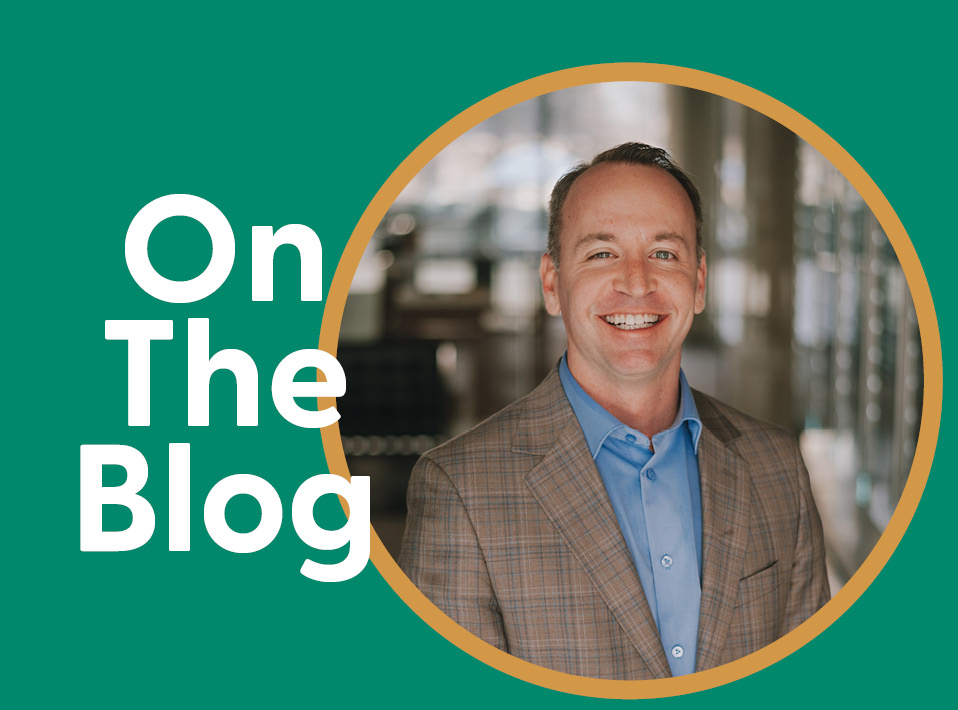
by Alec Gorynski
We have seen the news reports and perilous videos of the wildfires that have devastated Maui in recent days. Many organizations are galvanizing quickly to provide resources for immediate basic needs as well as longer-term recovery efforts.
Here at Lincoln Community Foundation, we have had the opportunity to forge relationships with our counterparts at the Hawai’i Community Foundation. Our friends at HCF moved quickly to activate their Maui Strong recovery fund to ensure the folks on the ground have access to financial resources as they are needed. We wanted to share the important work of our colleagues in Hawaii via their news release.
Donations to the Maui Strong Fund may be made online at https://www.hawaiicommunityfoundation.org/maui-strong.
If you are a donor advised fund holder and would like to recommend a grant from your donor advised fund to aid in this relief and recovery effort, you may submit a grant request for Hawai’i Community Foundation. We will ensure it is directed to the Maui Strong campaign.
Community foundations, such as the Hawai’i Community Foundation, are uniquely positioned to lead fundraising efforts and often play an essential role in disaster relief and recovery. Foundations are natural community conveners and can assist organizations and local government during the three stages of the post-disaster environment: immediate relief, short-term recovery, and long-term rebuilding.
Community foundations act quickly in partnership with government and private sector leaders to steward donor dollars from around the world toward the greatest need – proving how nimble and flexible philanthropy can be when it’s needed most.
Helping your clients get organized: Structure is a critical step in multi-generational philanthropy
Published on Aug 8, 2023
Instilling the idea of charitable giving in children and grandchildren may appear to be easy, but where to begin, and how to make it ongoing? More and more, wealth advisors are being asked by their clients to weigh in on strategies for fostering a family’s financial values, which frequently include charitable giving traditions.
An important first step in creating any multi-generational philanthropy plan is to advise clients to consider organizing their charitable giving, such as through a family donor advised fund at the Lincoln Community Foundation.
The process of organizing charitable giving itself creates much-needed clarity around the family’s philanthropic purpose. This is because without an organized approach to family giving, it is easy for children and grandchildren to get confused about their parents’ and grandparents’ processes for making decisions about which nonprofits to support.
Consider this scenario:
"Before we got everything organized through our community foundation, our family seemed to take a shotgun approach to charitable giving," commented the daughter of an entrepreneur who formed a family donor advised fund upon the sale of a business.
Her mother, the entrepreneur, had underestimated the confusion: "Nearly every check I’d ever written to a charity was aligned with my commitment to supporting a healthy workforce in our community. Without a healthy workforce, my business would never have been successful. Now, though, I see that because I was not involving the rest of my family in my giving and explaining why I was supporting certain causes, it might have looked chaotic to them."
Establishing a fund at LCF can be a very effective solution for many of your clients who are launching a multi-generational giving strategy. Here’s why:
–Charitable funds at Lincoln Community Foundation are extremely flexible and can be used to engage an extended family in the process of charitable giving. Donor advised funds (DAF), for example, are popular because they allow your client to name children and grandchildren as successor advisors.
–When your client organizes charitable giving through a DAF at LCF, the client can make a large transfer of cash or marketable securities that is immediately eligible for a charitable deduction. Your client then can recommend gifts to favorite charities from their fund when the time is right. This is especially useful in the case of clients who sell a business or for another reason experience a large influx of taxable income in a single tax year.
–Establishing a donor advised fund at LCF can be a much better choice for your family-oriented clients than a donor advised fund offered through a brokerage firm (such as Fidelity or Schwab). That is because, at Lincoln Community Foundation, your clients, as well as their children and grandchildren, are part of a community of giving and have opportunities to collaborate with other donors who share similar interests.
–LCF staff can work with your client and the client’s family on a charitable giving plan that extends for multiple future generations. That is because the experienced philanthropy services team at LCF supports strategic grant making, family philanthropy, and opportunities to gain deep knowledge about local issues and nonprofits making a difference.
–Finally, the Lincoln Community Foundation’s tools and resources make it much easier for families to communicate across generations about the family’s charitable giving purpose and goals for long-term impact.
We welcome the opportunity to collaborate with you and any of your philanthropic clients to establish an enduring and rewarding family philanthropy program that is customized to meet each client’s unique purpose.
Life insurance: A key charitable planning tool for certain clients
Published on Nov 3, 2023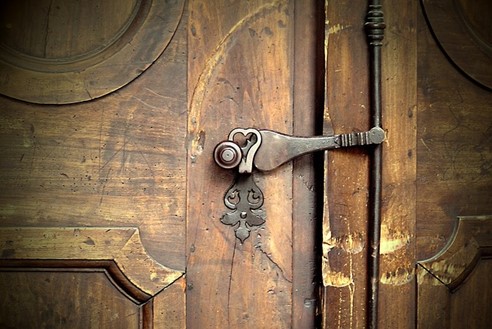
As an advisor, you often talk with your clients about life insurance–how much is enough and which policies are best suited for a client’s particular situation. As you counsel your clients about risk management and the role of life insurance in their estate plans, don’t forget that life insurance can be an effective charitable giving tool in some situations.
Many advisors overlook the ease of naming a charity as the beneficiary of a life insurance policy. Certainly, qualified plans and IRAs are a more tax-effective vehicle to leave to a charity via a beneficiary designation, but some clients might want to do even more than that. For instance, “second-to-die” life insurance policies are a common hedge or shield against anticipated estate taxes. These policies may become more popular as the estate tax exemption drops back down at the end of 2025.
Some clients may not be fully aware of how important beneficiary designations really are. Of course, many policyholders will first want to provide for family members in either specified dollar amounts or percentages. What some clients may not realize is that they can also designate insurance proceeds to support the causes they care about, whether by naming a charity directly or naming a fund at LCF to carry out their charitable wishes.
Increasing the coverage under an existing policy may present an additional charitable giving opportunity for some clients. Because policy premiums generally do not rise proportionately to benefit amounts, expanding the benefits can be cost efficient. For example, if a client would like each of four family-member beneficiaries to receive $250,000 from a million-dollar life insurance policy, adding $250,000 of benefit will typically not increase the premium by 25%. In fact, the benefit-to-premium ratio may improve. In a case like this, the client can name the four family-member beneficiaries and the charity to each receive ⅕ of the policy benefits. Depending on the client’s overall financial and estate planning picture, a technique like this might truly deliver bang for the buck.
And although deploying life insurance as a charitable planning technique may not be a fit for every client, it’s certainly worth considering in edge cases. Indeed, the global market for term insurance is growing—from $850 billion in 2021 to an expected $1.3 trillion by 2028. Many people buy term insurance with its relatively low fixed-rate premiums for 20 - 30 years as a hedge for potentially lost income during high-expense times in life, such as children’s college years, or to pay off a mortgage. But if those years pass uneventfully (fingers crossed!), and amid an improved personal financial position, it’s an opportune time to reassess and even continue the policy.
Past term insurance policy premiums can then be viewed as sunk or unrecoverable costs, and future premiums can be seen as a relatively moderate “investment” relative to the benefit. Of course, all of your clients want to outlive their policies. But as long as a policy is in effect, the policy offers many potential opportunities, including for charitable giving. Reach out to us at LCF to explore this further. We’d love to talk!
A Happy Future for Lincoln
Published on Aug 14, 2023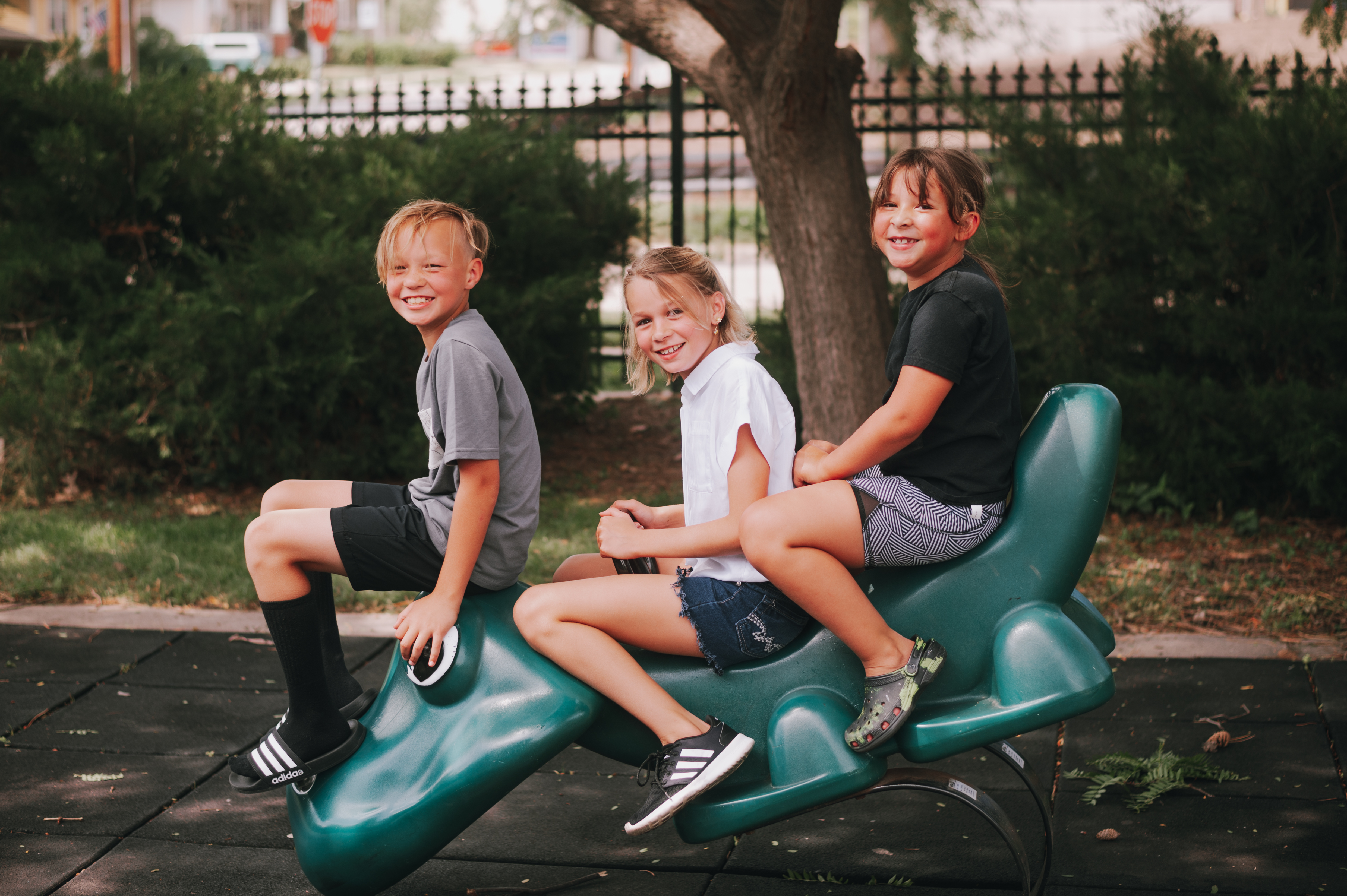
The Trust for Public Land recently reported that 90 percent of Lincolnites live within a ten-minute walk of public green space. That may be surprising, until you reflect on the supporting statistics:
Lincoln has 136 city parks, 180 miles of trails, 9 city pools, 5 public golf courses, 4 dog runs and 4 disc-golf courses . . .
Clearly, this city and its residents value Lincoln’s parks and public spaces.
“People in Lincoln love their parks,” said Lincoln Parks Foundation Fund Development Specialist Susan Larson Rodenburg. “They take ownership of their neighborhood parks.”
LCF grants have helped support and create those valued outdoor spaces since 1955, when the founding board of directors made its very first grant for $539.70 to Pinewood Bowl for the purchase of a movie and slide projector.
Long after that first grant, green spaces in the Lincoln area continue to receive boosts from LCF donors. Kenneth J. Good and Sheila Dickinson Dinsmore Graf both established significant endowments that have enhanced and helped create public spaces, large and small.
Sheila Dickinson Dinsmore Graf, who at one time was a single mother of five, was a lifelong volunteer who found her joy in serving others, often with a focus on helping the environment and those in need. She kept her endowment’s focus broad, trusting that the foundation would use it to make Lincoln a better place to live.
Kenneth J. Good grew up exploring the hilly woods around Peru, Nebraska. He studied Agronomy at UNL and spent the next 30 years working for the Soil Conservation Service. His beloved dogs, gardens, travels, and friends filled his days. When he died, he took care of those communities through endowments, including one at Lincoln Community Foundation.
“Their endowments have allowed us to do transformational projects,” said Michelle Paulk, LCF’s vice president for community development and outreach.
One of those transformational projects – Union Plaza – is a six-acre urban green space in Antelope Valley. A generous grant from Graf’s endowment helped fund the Union Plaza amphitheater, where residents can enjoy live music and community activities.
“We wanted to make Union Plaza a place for gathering, celebration and discovery,” said Susan. “Our vision really did become reality. It’s been a great catalyst.”
In addition, that green space tucked into the Antelope Valley floodplain project acts as a trail hub and has helped spur development and widespread neighborhood revitalization in the Telegraph District and beyond.
“It changed the transition between downtown and the rest of the city,” said Randy Gordon, who became executive director of the Lincoln Parks Foundation in October 2022.
By way of their endowments, both Graf and Good recognized that robust public spaces can help enhance the quality of Lincoln. And ensuring a happy future for Lincoln was something each of them wanted to support.
“Lincoln Community Foundation is here to carry out our donors’ wishes,” Michelle commented. “We’re fortunate that Graf and Good were forward-thinking and considered the future in broad ways, so that we can respond as Lincoln’s needs change.”
At times, grants from their endowments have helped in the early stages of projects that are new to Lincoln, such as the creation of Lincoln’s Bike Share program, BikeLNK, or the Southern Heights Food Forest.
“These grants can help bring public focus to ideas that are new to the community,” Michelle said. “Having the Foundation make a grant to a project can add legitimacy to it. And if the grant comes early in the process, it can give the project a lift and additional public exposure.”
Susan Larson Rodenburg said that these grants can have reverberating effects within the larger community. “LCF grants have been so important for so many projects–not only financially but also because they add credibility to the projects,” she said.
One of the longest ranging projects that both the Graf and Good endowments have supported is the Prairie Corridor on Haines Branch. This tallgrass prairie corridor will eventually stretch 12 miles from Pioneers Park to the Spring Creek Prairie Audubon Center, southwest of Denton.
Grants from these endowments helped lay the groundwork and purchase trailside easements and will provide maintenance funds for long into the future.
“I’m especially proud of the Prairie Corridor because it’s long term and an important project locally,” said Michelle.
The Prairie Corridor is an environmentally important project.
“We have an opportunity to help preserve some of the last remaining tallgrass prairie and to make sure that the land between Pioneers Park and Spring Creek Prairie remains a prairie,” said Susan. “Such an undertaking requires leadership from all kinds of groups.”
“It is all about partnerships and collaboration,” Randy agreed. “When you tie together what the Lincoln Community Foundation, the Parks Foundation, private donors and others can do, things succeed.”
Additional significant grants from Good and Graf have supported LCF’s Tower Square, the airport entryway corridor, maintenance at Rudge Park, the South Haymarket Park development, and the new Lincoln youth baseball/softball complex. Grants have also funded smaller local projects, including the Beal Slough disc-golf course, Ballard Park pickleball courts, and an ADA-accessible boat and fishing dock at Holmes Lake.
“I think some of these small grants can be really powerful. Disc golf and pickleball are taking off, and the Holmes dock is up and running,” said Michelle. “When the need arises, these groups can come to us and seek support.”
Another project Michelle points to is the Air Park Recreation Center in northwest Lincoln.
“We helped finish the fundraising for the Air Park Rec Center,” she said. “It’s an underserved neighborhood, and during the pandemic the costs of completion had gone up, so it was great to be able to help out in this growing area of Lincoln.”
Randy pointed to the city’s commitment to improve parks and recreation areas throughout Lincoln. That commitment has a profound effect on people’s lives.
“Parks are the great equalizer,” he said, “There’s a real commitment towards equity in Lincoln, including in its parks. All of our neighborhood and larger parks are well maintained, which helps keep the community connected. And that’s what gives Lincoln its small-town feel.”
Are you interested in making a lasting gift for Lincoln? Contact Vice President for Philanthropy Services Tracy Edgerton, at 402-474-2345 or tracye@lcf.org to learn more.
Tabitha: Embracing drastically new landscape with caring hearts
Published on Apr 20, 2020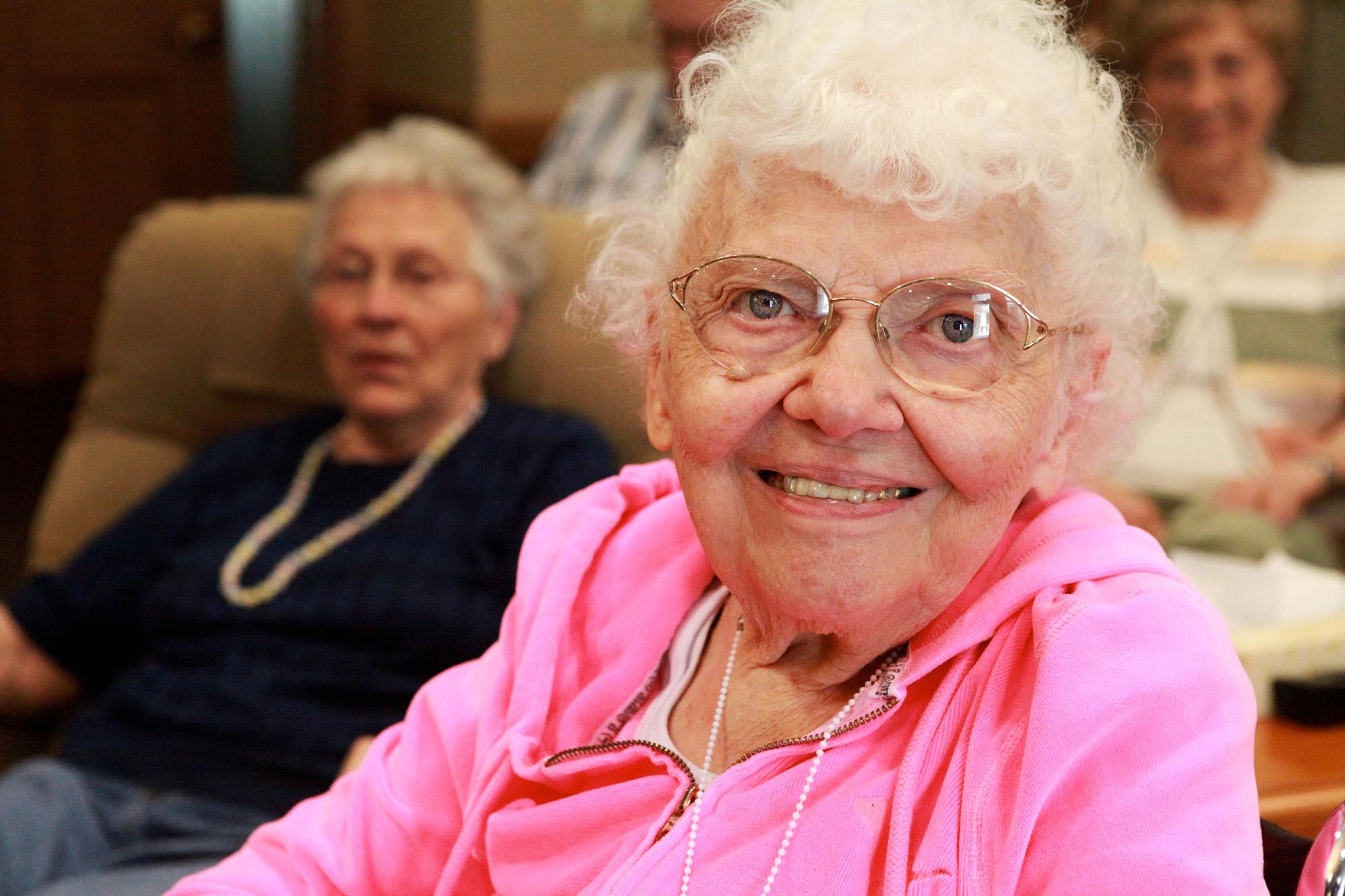
Toni Rupe has a new job description beyond grant coordinator for the Tabitha Foundation. These days, she makes regular rounds to have a warm chat with residents and patients who can no longer have visitors, take them for a stroll through the courtyard, and set up Zoom and Facetime with families they are dearly missing.
“We’re all someone’s daughter, someone’s granddaughter, and we know this is really tough on people,” Rupe said. “We want our residents and patients to know they are not alone in this.”
Tabitha’s entire landscape drastically changed overnight with intensive preparation for the unknown that lies ahead: Designating an entire wing for potential isolation of COVID patients, searching valiantly for full protective clothing and equipment, and closing the campus to all outside visitors. “You have to prepare for the worst, and it is costly.”
The Lincoln COVID-19 Response Fund will help cover those significant costs for preparation and also support operations. Tabitha is facing a drastic decrease of income from reduced numbers of Rehab and Home Health Care patients due to the coronavirus and plus cancelled fundraising events.
“Please assure the community we are as prepared as we can be,” Rupe said, “but their love, support and prayers are all welcome.”
For more information on the Lincoln COVID-19 Response Fund and to make a donation, click here.
El Centro: Helping Latino population navigate basic human needs
Published on Apr 20, 2020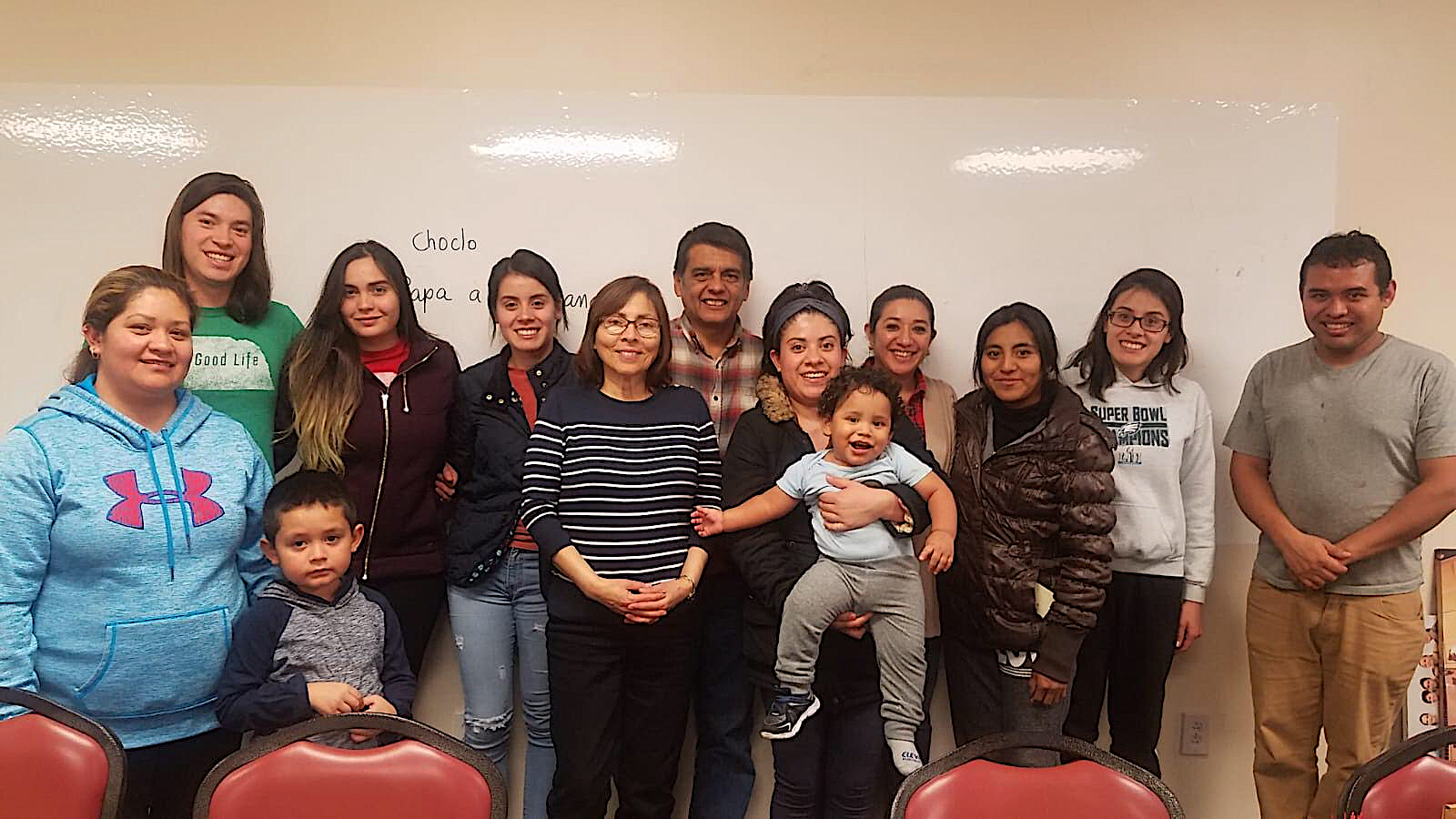
Trust brings Lincoln’s Latino citizens to El Centro, where they can find help in navigating the path to find basic human needs.
“We are especially seeing dramatic increases in requests from people who have been laid off,” said Romeo J. Guerra, executive director of El Centro, explaining the pandemic is specifically hitting industries where Latinos often work: Hotels, construction, restaurants, food processing.
“Right now, due to safety precautions, we must do everything online, or over the phone, and it can take an hour and a half just to help someone fill out forms for unemployment compensation.”
“People are just looking to survive this, get through this, so they need everything,” Guerra said. “We are getting requests for housing assistance, food, utilities. We have people coming to us who are already two months behind on rent.” Lincoln COVID-19 Response funds will help pay for additional staff hours, as well as fund items such as grocery store gift cards and rent.
He cautions that needs will continue: “God willing, the pandemic will be over soon. But that will only be the beginning for many of our families. Normal times are a long way off.”
For more information on the Lincoln COVID-19 Response Fund and to make a donation, click here.
Center for People in Need: Seeing tears of gratitude
Published on Apr 22, 2020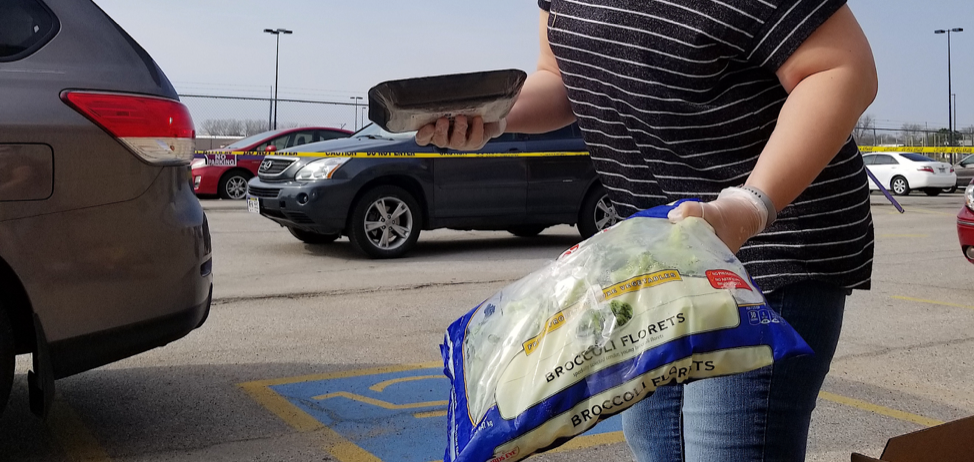
As families line up to receive food and diapers in the parking lot of the Center for People in Need, “there are people who are crying, tears running down their cheeks. They are so grateful we are still here,” said Christine Funk, executive director of the Center.
“There are so many people who are desperate right now – struggling, barely living paycheck to paycheck – so we feel fortunate we can stay open.”
Since the deadly pandemic struck, the Center has directed most of its efforts toward providing food and easing identification procedures to address dramatically increasing numbers. “Since this new system started, we have issued more than 1,000 temporary cards. The people we are seeing are diverse, young and old, immigrants and refugees, seniors, laid-off workers, people living on the edge.”
COVID-19 Response funds will help cover additional food, ease costs of specially bagging all food, and pay for equipment to help distribution in an open parking lot. Thanks to new support, the Center will continue to serve. “This is a very generous community, everyone is looking to find ways to help.”
For more information on the Lincoln COVID-19 Response Fund and to make a donation, click here.
We Can Do This’ will not let children go hungry
Published on Apr 22, 2020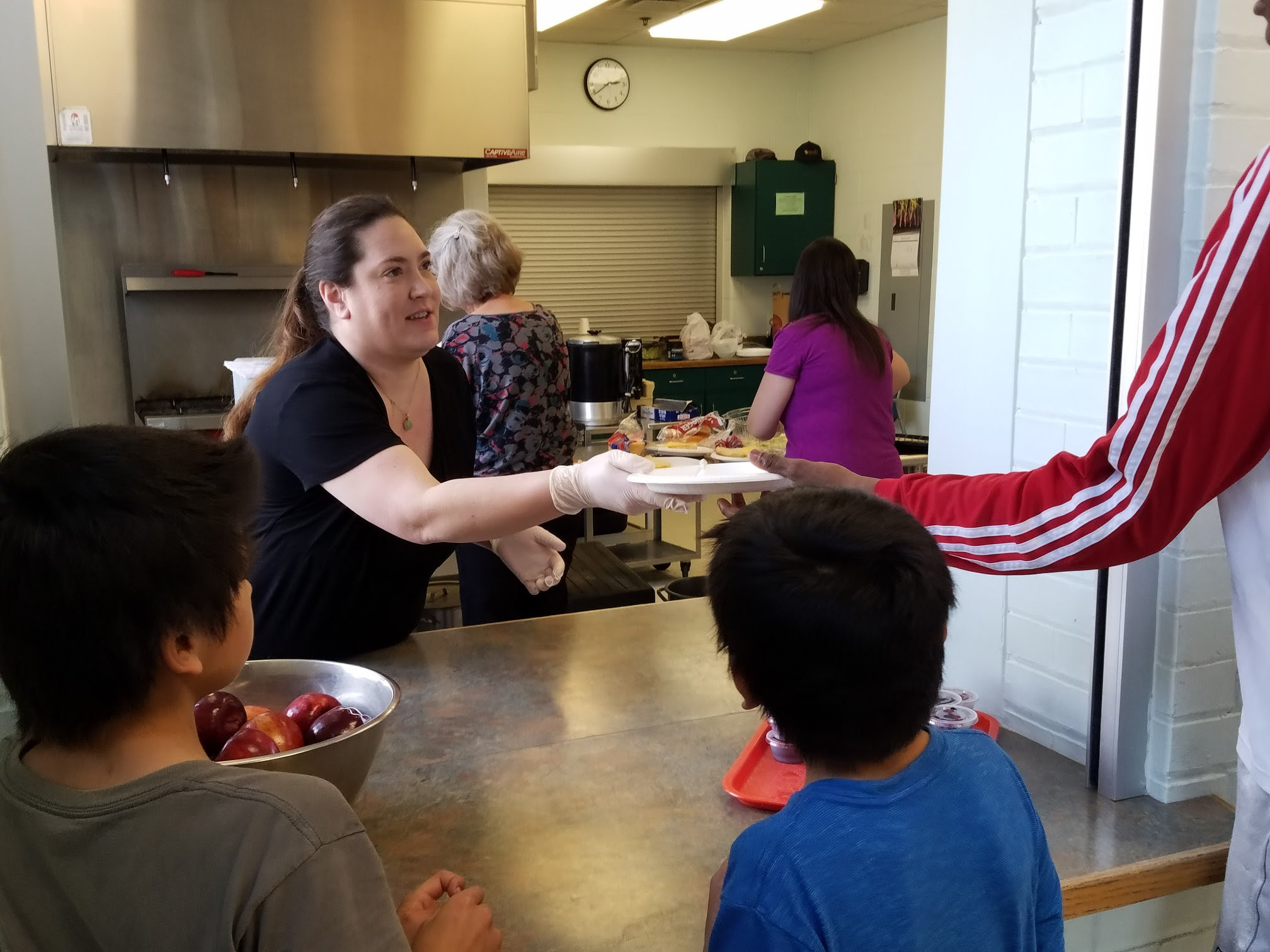
“We Can Do This” started as a small group of Lincoln women who fed children over the weekends at the F Street Recreation Center, because they believed in spreading love and support through food.
But overnight, they have started spreading a whole lot more love, now handing out weekly, prepackaged grab-and-go seven-day supplies.
“They want to assure that children and families do not go hungry,” said Adam Rhoads, executive director of Mystic Rhoads Productions, which serves as the fiscal sponsor for “We Can Do This.”
The increased need is astonishing. “We Can Do This” once served about 140 meals a weekend and now they are providing 1,400 meals per week.
They won’t be turning anyone away, thanks to the Lincoln COVID-19 Response Fund. “There are so many people out there right now who don’t have access to food, especially healthy food,” Rhoads explained. “Families need so much more, and we are here to make sure they have enough to eat.”
For more information on the Lincoln COVID-19 Response Fund and to make a donation, click here.
December 2020 Newsletter
Published on Dec 22, 2020To catch up on the latest Lincoln Community Foundation happenings click here to download the newsletter.
Lincoln Takes Action
Published on Apr 26, 2021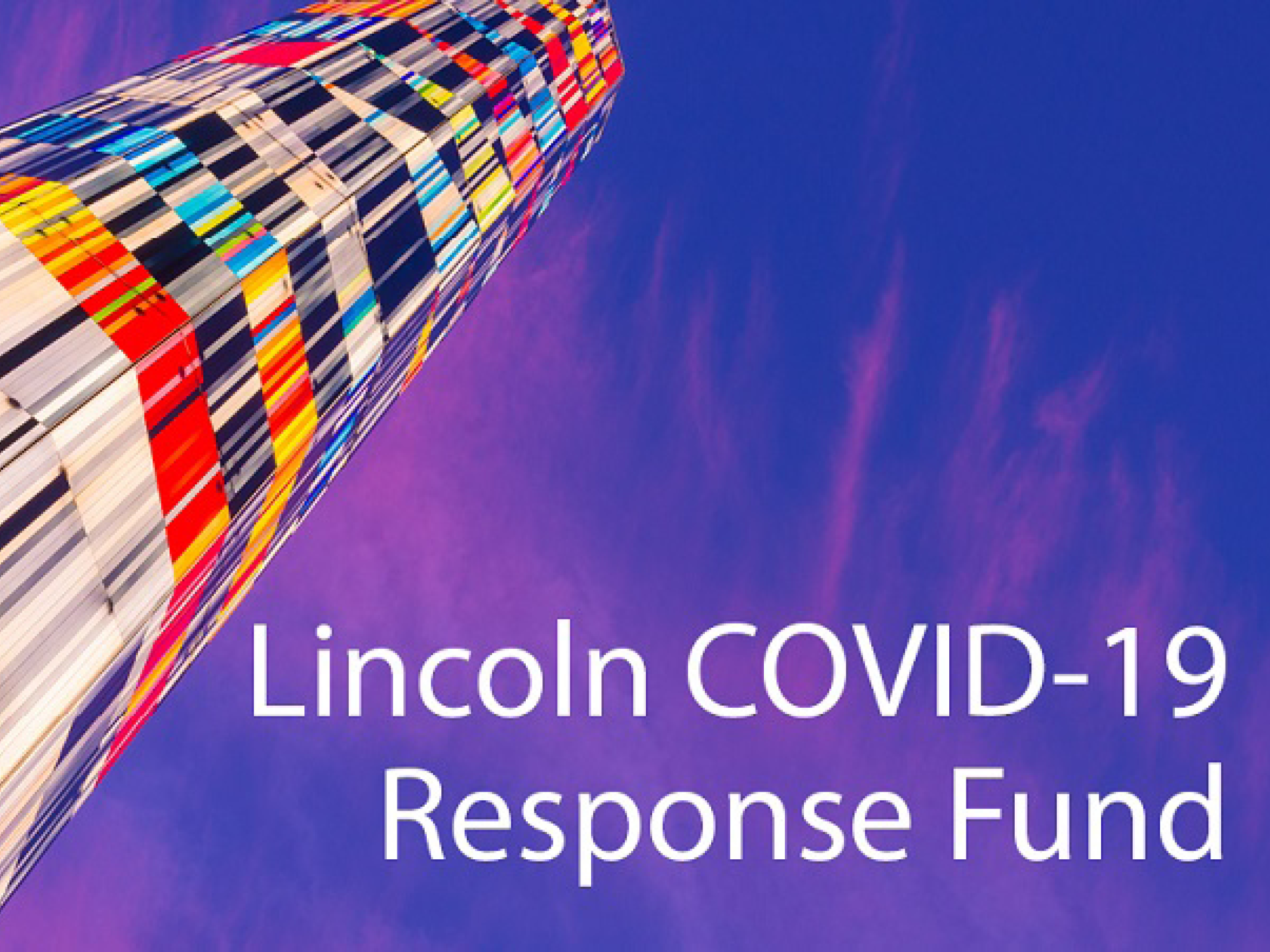
Time was of the essence in early March 2020. Communities across the country were grappling with how to support their vulnerable residents in the first wave of the pandemic. Lincoln had not yet reported a confirmed case of the novel coronavirus. As uncertainty loomed, LCF President, Barbara Bartle, was prepared.
“Our colleagues from Seattle to Pittsburgh shared how rapidly the situation was evolving,” said Barbara. “As a community convener, we knew this was the time to come together and mobilize public, private and philanthropic support.”
A coalition of partners including LCF, the City of Lincoln, the United Way of Lincoln and Lancaster County, the Lincoln Partnership for Economic Development (LPED), the Community Health Endowment, and other philanthropic and business partners quickly formed to address how Lincoln would respond to the crisis. The Lincoln COVID-19 Fund was created to rapidly deploy flexible resources to nonprofit organizations in Lincoln that are working with communities disproportionately affected by the coronavirus pandemic.
Since the Fund was launched on March 20, 2020, more than $1.2 million has been awarded to 66 local nonprofits. The grants have been a coordinated response to help support the basic needs of vulnerable and newly vulnerable Lincoln residents, including access to food, housing, medical information, childcare, and other support. The fund received nearly 800 individual donations from this generous community.
“This fund has made a real difference for many Lincoln individuals and families over the past year,” said Mayor Gaylor Baird. “Thank you to all those who contributed to the fund to help friends, neighbors and co-workers impacted by the pandemic. Lincoln residents and businesses again have demonstrated that we live in a compassionate community where we take care of each other.”
Grant recipients were identified by a committee, chaired by Bryan Seck, Director of Workforce Development for LPED. Meagan Liesveld, Executive Director of the United Way served as Vice Chair. The committee moved quickly to distribute funds to nonprofits as fast as donations were coming in. Committee Chair, Bryan Seck, reflected on the experience one year later.
“This is how we operate in Lincoln,” said Bryan. “We work together, we identify a solution, and we do our absolute best to help each other. Nonprofits on the frontlines of the pandemic were supporting many residents who had never needed assistance before. It has been an honor to serve as chair and to see first-hand the impact these grants made in our community.”
The rapid response and flexibility of the grants made a difference for nonprofits during such a challenging year. Laura McCulley, Grant Manager at the Clyde Malone Community Center, explained how the funds helped fill the gaps for their organization.
“If we’re missing supplies, or people, or things within the program that aren’t covered by restricted funds, these grants helped us go full-circle,” said Laura. “Without unrestricted funds, we would not be able to do the extra, and we did a lot of extra this year.”
In the latest round of grant-making decisions this February, the committee also recommended a $50,000 grant to the Lincoln Prevention Assistance Common (LPAC) Fund. LPAC is a partnership among LCF, the City Urban Development Department, and the UNL Center for Children, Families, and the Law to distribute housing and utility assistance to Lincoln residents in need due to the impacts of COVID-19. Future contributions to the Lincoln COVID-19 Response Fund will also be directed to LPAC.
"Grants from the Lincoln COVID-19 Response Fund have impacted hundreds of children, families and individuals in our city the past year,” said Barbara. "So many caring donors in our community have contributed. Thank you, Lincoln. These donations have truly been gifts of love.”
For more information on the Lincoln COVID-19 Response Fund, visit LCF.org/covid19.
A Lovely Day
Published on Aug 14, 2023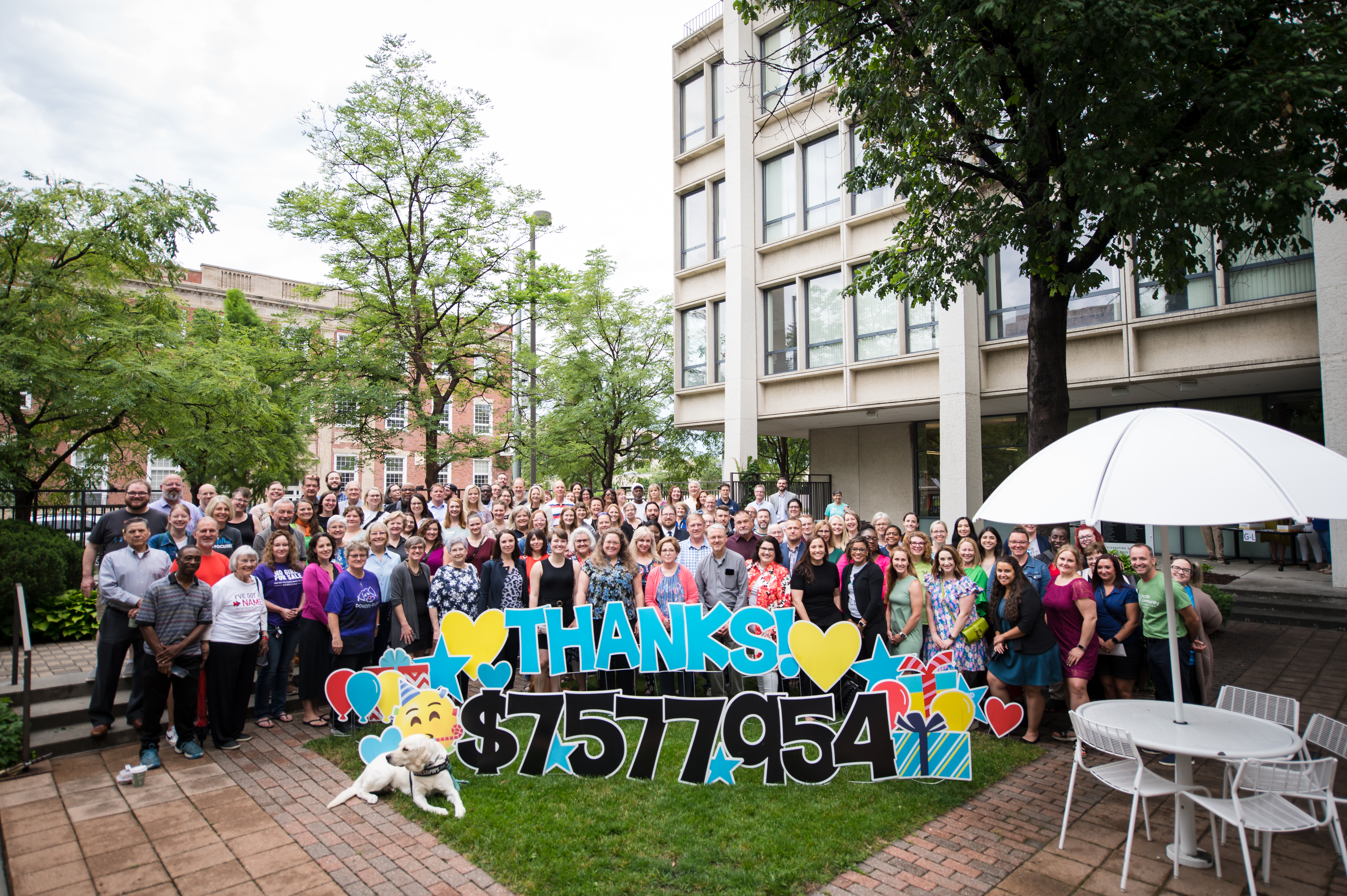
The 12th annual Give to Lincoln Day on May 24th raised more than $7.5 million for 456 local nonprofits. The funds are designated to help support charitable organizations that serve Lincoln and Lancaster County. All participating nonprofits received a proportional share of a $500,000 match fund based upon the organization’s percentage of the total dollars raised, provided by LCF and sponsors, including Presenting Sponsor West Gate Bank.
“Year after year, Give to Lincoln Day offers us the chance to give back to the organizations that are near and dear to us,” said Alec Gorynski, LCF president. “Organizations that provide art and cultural experiences, teach and guide our youth, support those who are experiencing hard times, care for our four-legged friends and much more.”
Nearly 25,000 donations were received for this year’s giving day. The event has raised more than $57 million for local nonprofits in its 12-year history.
“The collective impact of 25,000 individual acts of generosity, along with the $500,000 matching fund, will empower the missions and fuel the critical work of 456 nonprofits for the year ahead,” Alec continued.
“We are thrilled with this year’s successful results that demonstrate the awesome power of philanthropy. When neighbors come together on Give to Lincoln Day, we provide everyone in our community the opportunity to thrive.”
For more information and to see gifts received for each nonprofit, visit www.GiveToLincoln.com.
Thank You, Match Sponsors!
Thanks to these generous match fund sponsors, gifts on Give to Lincoln Day go even further for participating nonprofits.
West Gate Bank (Presenting Sponsor)
Assurity
Bill & Mae Whitmer Family Fund and ABC Electric
Bill & Marilyn Cintani
Cornhusker Bank
DA Davidson
Davis Design
HBE
Kawasaki Motors Manufacturing, U.S.A.
Kubly Family Foundation
Lutz
Mail Management Services, Inc.
The family of J. Gates and Daisy Minnick
William J. Mueller & Kim M. Robak
Olsson
Pepsi
Pinnacle Bank
Runza
Joe W. & Ruth K. Seacrest Fund
Tom & Lisa Smith
Talent Plus
Mark H. Tallman
WRK Family Foundation
Catholic Social Services: Keeping the faith
Published on Apr 22, 2020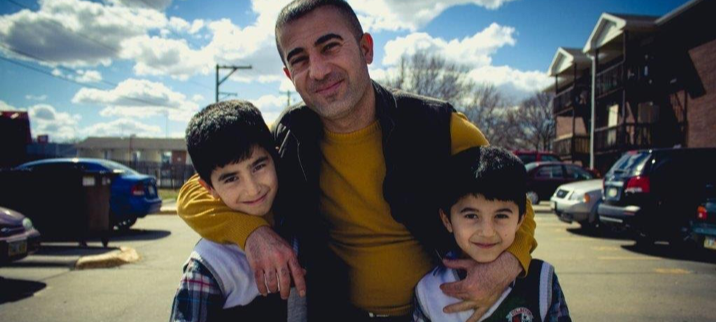
With a mission to perform works of mercy, Catholic Social Services helps people of all faiths. That help comes in the form of food, funds, emergency shelter and immigrant support. The pandemic has added a new layer to carrying out those services.
“It’s changed everything. We’ve expanded our food and emergency services, and changed our distribution hours and methods,” said Advancement Director Michelle Birkel. “What hasn’t changed are the needs of the poor, vulnerable and homeless.” Support has expanded to include outreach and delivery to the elderly and home-bound, as well as those who are now out of work.
“Many have lost their jobs. They can’t afford to pay their rent anymore and we can’t keep up with all of the calls,” she said. “It’s been really challenging.”
Funds from the COVID-19 grant help address those challenges. “We are combating homelessness before it happens and the grant will help substantially as we provide emergency services to our most vulnerable,” Birkel said.
For more information on the Lincoln COVID-19 Response Fund and to make a donation, click here.
Milkworks: Supporting New Parents in Difficult Times
Published on Apr 22, 2020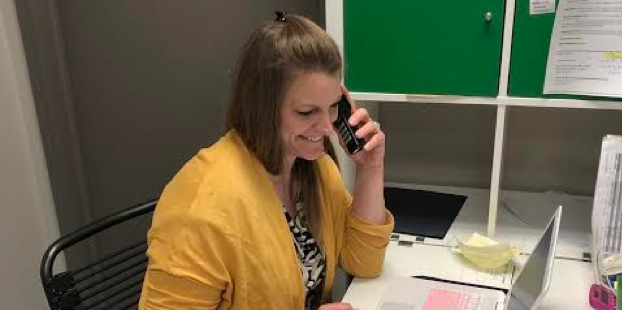
These are tricky times for new parents and their babies.
“Most moms going through labor and delivery these days are in and out of the hospital in 24 hours,” said Milkworks executive director Angie Miller. That quick turnaround makes it hard for moms to get help with breastfeeding, which is one of Milkworks’ main areas of focus.
“We’re here to help families create healthier communities through breastfeeding,” said Miller. Milkworks supports families with myriad services, from providing consultations and support groups to connecting families with breast pumps.
Milkworks’ free online support groups have been a lifeline for new parents. “Those support groups are vital as families with newborns are even more isolated than ever,” said Miller.
MilkWorks has moved to telehealth consultations, ensuring families and staff receive care while protecting public health. Lincoln COVID-19 Response funds help reimburse the newly-offered telehealth costs and keep it as a viable option.
“We are really thankful for the funds,” said Miller. Those funds also support free shipping, which has helped several clients, from health-care workers who need to maintain social distancing to those for whom money is tight. “We don’t want a shipping fee to prevent low-income families from getting the help they need.”
For more information on the Lincoln COVID-19 Response Fund and to make a donation, click here.
2020 Garden Performance Series
Published on May 11, 2020In 1973, the Lincoln Community Foundation began a long tradition of free public garden concerts throughout the summer. Neighboring businesses, Nebraska Arts Council and other local foundations work together to schedule family-friendly performers that appeal to all ages. Due to current restrictions on social gathering, the Foundation Garden Summer Performance series will be suspended until further notice. Local musicians will continue to be scheduled by ARTS, Inc. and compensated by Lincoln Community Foundation and sponsors, regardless of whether they perform.
“The Garden Summer Performance Series has become a beloved tradition of our downtown community,” said Barbara Bartle, LCF President. “Although we cannot gather physically, we are pleased to band together with Arts, Inc. to support local musicians who add so much to the spirit and culture of our great city.”
The series will resume when restrictions are lifted. Free performances are typically held every Wednesday at noon from May through the end of September. Updated information on the status of weekly concerts can be found on the Lincoln Community Foundation Garden Performance Series Facebook Page.
2020 sponsors include: Dietze Music, Eagle Printing & Sign, Farmers Mutual Insurance Company, Lincoln Community Foundation, Nebraska Arts Council, UB&T, Pearle Francis Finnigan Foundation, Pinnacle Bank, Union Bank & Trust Company, Inc and US Bank.
Fall 2022 Newsletter
Published on Dec 12, 2022To catch up on the latest Lincoln Community Foundation happenings click here to download the newsletter.
Celebrating the new Legacy IRA and a boost for QCDs
Published on Jan 5, 2023
Congress passed the much-anticipated, $1.65 trillion omnibus spending bill known as the Consolidated Appropriations Act of 2023 (“CAA”) on December 23, 2022, followed by President Biden signing the Act into law on December 29, 2022. At more than 4,000 pages, the Act includes a wide range of provisions that affects multiple sectors.
Of particular interest to attorneys, accountants, and wealth managers who advise philanthropists are the provisions starting midway through the bill. The bipartisan legislation often referred to as “SECURE 2.0” is included in the CAA legislation. As background, SECURE 2.0’s provisions build on the original SECURE Act of 2019 (“SECURE” stands for “Setting Every Community Up for Retirement Enhancement). SECURE 2.0 includes the Qualified Charitable Distribution (QCD) enhancements that have been in the works for many months.
Here are three key provisions affecting philanthropists in the new law:
–Taxpayers may now make a one-time $50,000 QCD transfer to a charitable remainder trust (CRT) or other split-interest gift such as a charitable gift annuity (CGA). These are the “Legacy IRA” provisions. Note that the law effectively mandates that the CGA or CRT be created solely for the purpose of receiving a QCD because the new statute requires that the vehicle contain only IRA assets.
–The required minimum distribution (RMD) age (previously 72) increased to 73 on January 1, 2023. The age will increase to 75 beginning on January 1, 2033. While this provision is not directly tied to charitable giving, it will nonetheless affect your clients’ overall financial plans as well as the timing and strategy of their philanthropy. As a reminder, “required minimum distribution” (RMD) refers to the mandated amount that a taxpayer must withdraw from qualified retirement plans, which include IRAs as well as 401(k)s and other tax-deferred retirement accounts.
–The annual per-taxpayer $100,000 QCD cap is now slated to be indexed for inflation, which will allow taxpayers to give even more from their IRAs directly to charity.
Here’s what has not changed:
–Eligibility for making a QCD still starts at 70 ½. This allows taxpayers who are not yet required to take IRA distributions under the RMD rules to still take advantage of the QCD technique without the income tax hit on the distributed funds while also removing those funds from liability for future estate taxes.
–Taxpayers required to take RMDs can still count QCDs toward their RMDs, thereby avoiding the usual income tax hit on RMD dollars.
–Charities eligible to receive QCDs include designated funds, field-of-interest funds, and scholarship funds at the community foundation, but not donor-advised funds.
Lincoln Community Foundation Awards $307,571 in 2021 to Support 63 Local Nonprofits
Published on Dec 30, 2021The Lincoln Community Foundation distributed $307,571 in community grants to local nonprofit organizations through Open Door Grants. These grants are made possible by contributions from the Lincoln Forever Fund and from LCF donor endowment funds. Organizations that received funding include:
American Cancer Society
Road to Recovery free ride program
Autism Family Network
Float 4 Life swim lessons for children with autism
Banister's Leadership Academy
Implementation of Night LIFE program at the Malone Community Center
Big Brothers Big Sisters Lincoln
Support for operations
Bluestem Health
Community Baby Shower event
Board of Regents, U of Nebraska, UNL
13th annual Human Trafficking and Migration Initiative
Bridge Behavioral Health
Replacement of commercial dishwasher
Camp Floyd Rogers
Scholarships for children with diabetes in Lancaster Co. to attend camp
Cause Collective
Nonprofit board training and capacity building
Center for Legal Immigration Assistance
General support
Child Advocacy Center
General support
City of Lincoln
Portrait exhibit at the Lincoln American Jobs Center
City of Lincoln - Urban Development
Lead mitigation matching grant
Clinic with a Heart
Operating support
Clyde Malone Community Center
Operating support
Common Threads Sewing Team
Materials for volunteers to create human care items
Disrupting Traffick
Operating support
Do More Good Movement
2021 Do More Good virtual conference sponsorship
Eastridge Presbyterian Church Food Pantry
Restocking the pantry with food, personal hygiene and household items
Food Bank of Lincoln
Capital Campaign
Food Fort
Director of Education office resources
Foundation for Lincoln Public Schools
Technology & equipment for deaf and hard of hearing students; Creation of the Aviation and Technical Education Focus Program at North Star High School
Friendship Home of Lincoln
Inclusive Communities Project R.E.A.D.I. trainings for staff
Girls Incorporated of Omaha dba Girls Inc. of Lincoln
Eureka! STEM program for 8th-12th grade girls
Good Neighbor Community Center
General support
Great Plains Art Museum (NU Board of Regents)
Support for juried exhibition, "Contemporary Indigeneity 2022"
Heartland Bike Share
Sponsorship of BikeLNK bicycles
History Nebraska Foundation
Youth and community engagement programming around BISON exhibit
Husker Fans Salute The Troops Foundation
Salute to the Troops Annual Fall Weekend event
Jazz in June (Lied Center)
Support for 30th anniversary season
Lancaster County Medical Society
Outreach campaign to encourage COVID-19 vaccination
Lincoln Arts Council
Support for 2021 Lincoln Arts Festival; Sponsorship of Mayor's Arts Awards
Lincoln Calling
Launch of Lincoln Calling TV streaming platform
Lincoln Children's Zoo
Horticulture department support
Lincoln Crossroads Music Festival
Sponsorship of 2nd Lincoln Crossroads Music Festival
Lincoln Parks Foundation
Cascade Fountain renovation
Lincoln Public Schools - Arts & Humanities Focus Program
Support for therapy dog, Sonny
Lincoln's Symphony Orchestra
Harmony in Healing program
LUX Center for the Arts
Replacement of building elevator; EMERGE LNK, a mural project for North Lincoln
Madonna Foundation
Community Medical Transportation program support
Meadowlark Music Festival
General support
MilkWorks
Operating support
National Museum of Roller Skating
Renovations to building entrances
Nebraska Appleseed
Policy solutions to address benefit overpayments and collections
Nebraska Children's Home Society
Operating support for Lancaster County programs
Nebraska Civic Engagement Table
Get Out The Vote (GOTV) efforts in Lancaster County
Nebraska Peace Foundation
Roots of Local Justice: Historical Truth and Fair Reconciliation
Nebraska Veterans of Foreign Wars Foundation (for Veterans Advisory Group)
Outreach to veterans, guidance with government systems, and veteran fellowship
Nebraska Wesleyan University
Lift As You Climb STEM enrichment program
NeighborWorks Lincoln/Community Crops
Renovation of NeighborWorks Lincoln facility to co-locate Community Crops offices there
Partnership for a Healthy Lincoln
Streets Alive! project revitalizing the 3rd & F Street pedestrian tunnel
Pinewood Performing Arts
Summer 2022 musical sponsorship
Proyecto Cultural/Grupo Folklorico Sangre Azteca
Mural and buildling renovation project
Rabble Mill
New LPS Focus Program, "Bay High"
Southeast Community College - Lincoln
Educational support for qualified student
Southern Heights Food Forest
General support
Sunday Farmers' Market at College View
Strategic planning using local consultant
Transformative Life (Contemplate Lincoln)
Care Packages for the Quarantined
UNL Board of Regents for International Quilt Museum
Collaboration with Lincoln NAACP Youth Council on social justice movements and associated art forms
Visionary Youth
Support for Community Impact Program events
Wellbeing Initiative
Mental health awareness campaign
Wyuka Historical Foundation
Restoration of Rudge Chapel
Yazda/Yazidi Cultural Center
Support for operations
Finding Hope and Inspiring Generosity in the New Year
Published on Jan 20, 2023Alec Gorynski
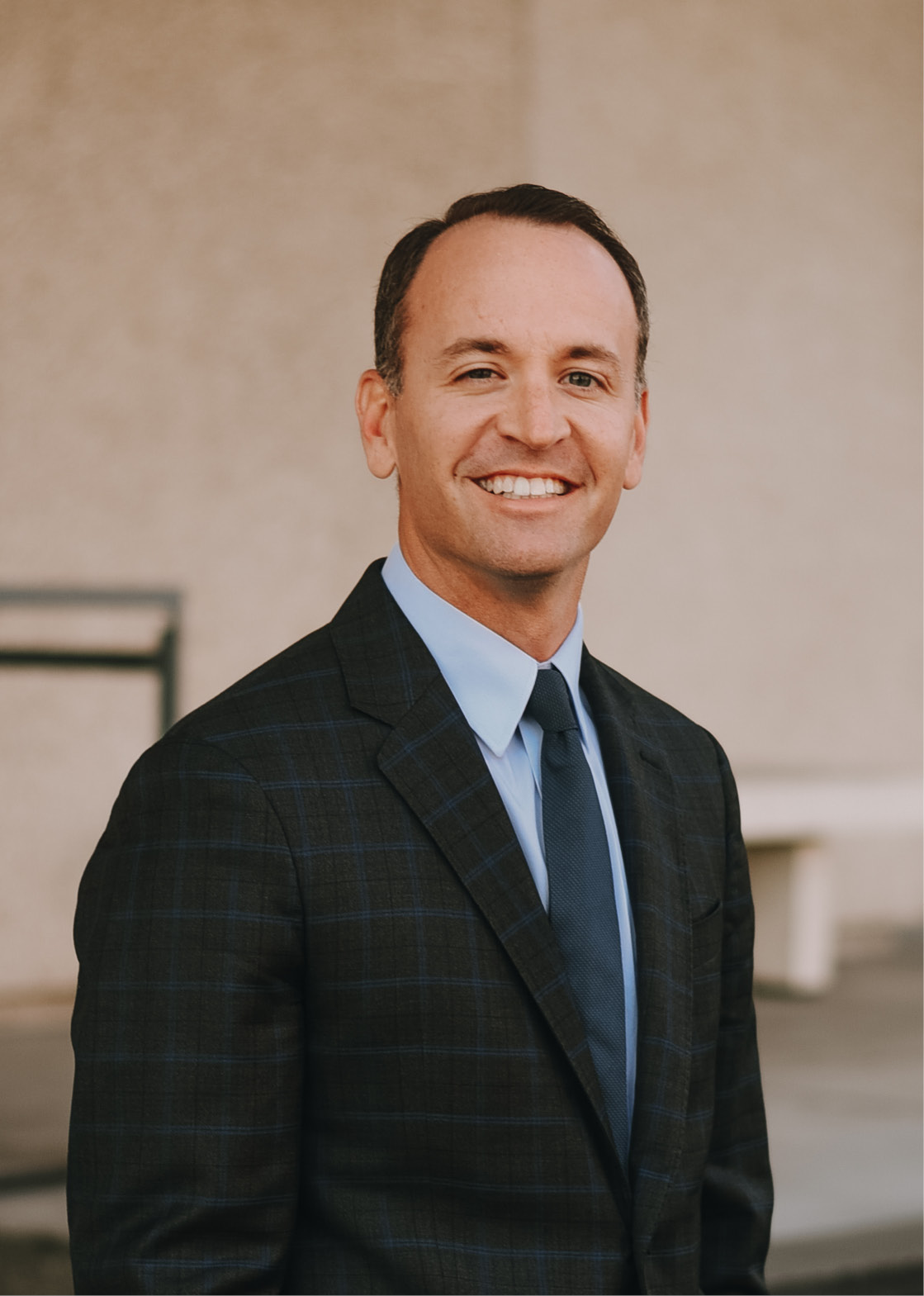
The new year tends to bring about commitments to do more and to do better. Whether it’s a new fitness routine or eating out less – New Year’s resolutions can be good for our mind, body, and soul. They not only produce physical results but more importantly, they offer hope for the future. We have hope that with some intention and effort, the change we expect will be realized.
Another source of hope in the new year can come from extending the focus past ourselves. Generosity, or sharing our gifts with others, just makes us feel good. When we are generous with our time, our talents, and even our treasure – we feel pride and a sense of purpose in our ability to do something good for someone else.
Being generous can mentally and physically benefit you in the new year. According to the Cleveland Clinic, giving back activates the reward centers in our brain and releases the chemicals that give us feelings of happiness and love, which can help lower depression. Our physical well-being can also be impacted, as this chemical response in the brain reduces stress and lowers your blood pressure.
As you think about your intentions for 2023, here are some examples of how generosity can make you more hopeful in the new year:
• Connect with a friend:
Generosity can be as simple as checking in with someone who may be struggling, or who you simply have not connected with in a while. Hearing from you may be an opportunity to talk out a problem or serve as a bright spot in their day. Giving our time to one different person each month can create a wonderful sense of purpose.
• Lend a hand:
By offering a helping hand, such as shoveling a driveway or helping with an assignment at work, that little bit of assistance to a friend, family, coworker, or neighbor, can provide a big relief, and an even bigger feeling of pride.
• Volunteer:
While this may seem obvious, for many, volunteering can seem daunting or like we don’t know where to start. Consider how much time you have available, what you are good at, and who or what you’re passionate about. This will help you narrow your intentions to a specific organization and task.
• Donate the tangible stuff:
Extra clothes, used toys and books, even donating blood are all tangible things that produce real value to those who receive them.
• Make a financial contribution:
Of course, many of the causes and organizations that give us hope for the future are only able to do their work with financial support. Consider setting up an automatic recurring donation or opening a new donor advised fund. Your philanthropic goals can be realized without you even noticing!
Generosity is a value we hold dear at Lincoln Community Foundation, and quite simply the root of our existence. We get the opportunity to help make good happen in our community, and each instance of good is an opportunity to inspire others to do the same. This new blog is one example of the ways in which we plan to inspire generosity through the act of storytelling in the new year. Stay tuned!
Lincoln Littles Giving Day Expanded to Month of February
Published on Feb 1, 2023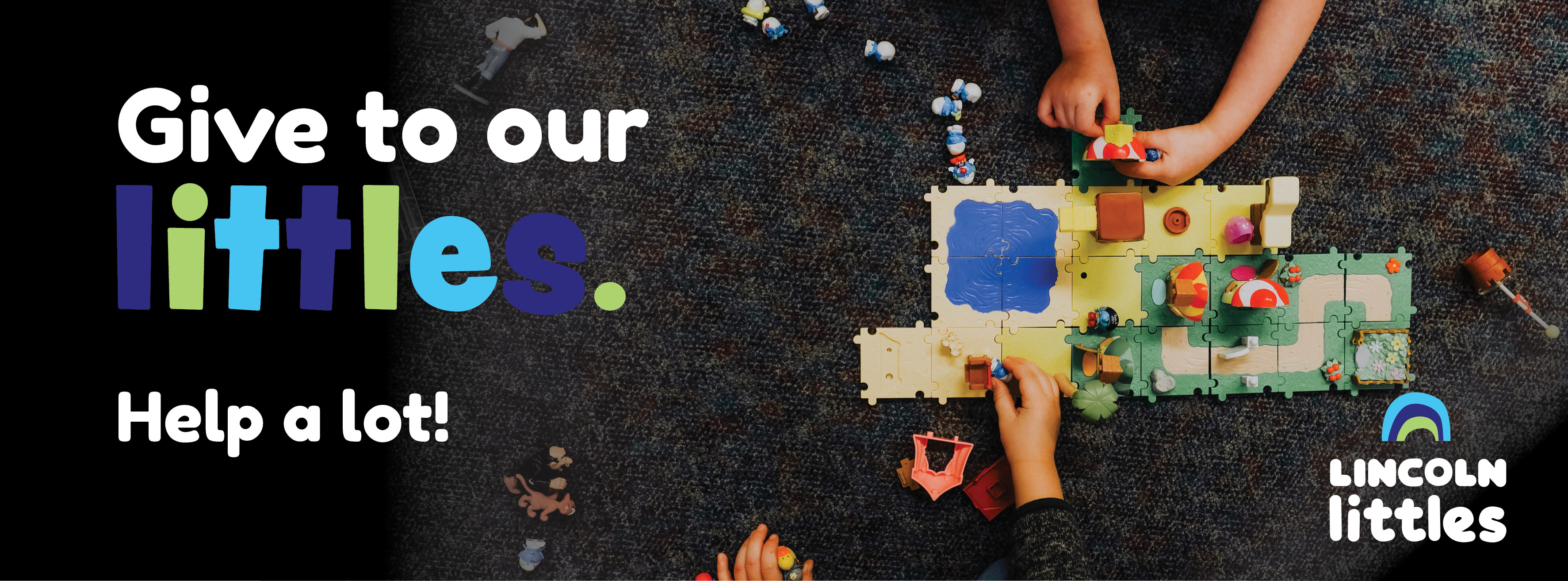
Lincoln Community Foundation is excited to announce that the annual Lincoln Littles Giving Day has been expanded to a month-long campaign raising funds and awareness for Lincoln Littles work in early childhood education. Launched in 2019 and inspired by the Prosper Lincoln community agenda, the giving day has raised $3.1 million for tuition assistance, providing affordable and quality early childcare to nearly 600 children.
“An investment in the important work of Lincoln Littles means more children will receive the quality education and care they deserve at a level their families can afford,” said Alec Gorynski, president of the Lincoln Community Foundation. “As the complexities surrounding early childhood continue to affect our community and our workforce, it is a natural fit to expand Lincoln Littles Giving Day to a month-long effort that will provide much needed relief to working families.”
The community can make online donations now through February 28 at LincolnLittles.org. Donations may also be mailed to the Lincoln Community Foundation, 215 Centennial Mall South, Suite 100, Lincoln, NE 68508. Checks must be written to “Lincoln Community Foundation” with “Lincoln Littles” in the memo line.
“The current economic climate and rising costs at the grocery store make it difficult for families to stay afloat,” said Anne Brandt, executive director of Lincoln Littles. “Access to quality, affordable childcare is life-changing for children and families and ultimately, good for business and our community.”
According to Lincoln Vital Signs, the average annual cost of childcare increased 87% between 2019 and 2021. Currently, the cost of care for an infant in a childcare center is nearly twice as expensive as resident tuition and fees at the University of Nebraska-Lincoln. In response, Lincoln Littles work focuses on solutions to four key challenges related to early childhood: increasing quality in early care and education, increasing affordable childcare options, engaging businesses and the larger community, and influencing policy change to meet the needs of children and families.
Lead Donors: Acklie Charitable Foundation, Robert & Barbara Bartle, Bettenhausen Family Foundation, Drs. Bob & Stacie Bleicher, The Buffett Early Childhood Fund, Rosalind K. Carr in memory of Professor James D. Carr, Shirley & Jerry Daugherty, Bob & Jan FitzSimmons, Larry Frederick & Robyn Sitzman, Harbor of Dreams, Inc., Barb Hoppe Johnson & Bruce Johnson, Kile & Cuz Johnson, Kawasaki, Jim & Penny Krieger Family Foundation, Drs. Marilyn & David Moore, Mike Munro & Susie Keisler-Munro, Nebraska Children and Families Foundation, Pinnacle Bank, Drs. Bob & Lisa Rauner, Sue & Al Saathoff, Rhonda Seacrest, Dr. Bob & Dottie Shapiro, Susan Sehnert Stuart, Tom & Sue Tallman, Temme Family Foundation, Art & Carol Thompson, Sue & Ed Tricker, Dr. Eileen & Richard Vautravers, Mae Whitmer and WRK Family Foundation.
Legacy giving: A conversation that’s full of opportunity
Published on Aug 8, 2023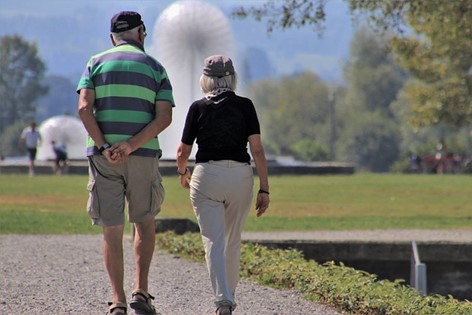
August is National Make-A-Will Month. This means your clients may be reading articles and hearing about estate planning more this month than usual, which makes the next few weeks an especially good time to prompt your clients to review their estate plans–or get their wills and trusts in order if they haven’t done so yet.
Charitable giving is an important part of any estate planning conversation. Certainly, bold, legacy-making plans are frequently in the news because of the high-profile people who establish them. Your clients may not realize that they, too, and nearly anyone, really, can leave a legacy to support favorite charitable causes.
By discussing what legacy charitable gifts are, how they work, what the client has in mind, and then formalizing the client’s plan with the proper legal and financial documentation, you can help your clients tie up a few of “life’s loose ends” far in advance of when that legacy gift is actually made—and give your client the peace of mind of knowing it will actually get done.
Clients’ charitable giving intentions and the possibility of establishing legacy gifts should be a routine and standard topic of any financial or estate planning discussion, right alongside provisions in an estate plan for family and loved ones.
Here’s a primer that may help you simplify key principles as you convey to your clients what they need to know about leaving a legacy:
Q: What is a legacy gift to a charity?
A: Encourage your clients to think of leaving a charitable legacy as a post-life gift that the client structures in advance. Legacy gifts are often referred to as planned giving.
Q: What assets can be used to make a legacy gift?
A: Like the gifts to charity that your clients are already making during their lifetimes, cash, stock (especially highly appreciated stock), real estate, life insurance, an IRA beneficiary designation (which is extremely tax effective), are examples of assets that can be the subject of a legacy gift. A legacy gift can be expressed in a client’s estate planning documents as a dollar amount, percentage of the whole, or a legacy gift of the assets themselves. Your client will want to choose assets carefully, enlisting your expertise to do so.
Q: How is a legacy gift actually made?
A: Legacy gifts are typically spelled out in detail in a client’s will or trust documents. This is especially important because after the client is gone, too much is otherwise potentially subject to hearsay or conflict. To attorneys, accountants, and financial advisors, this is common sense. But do not overestimate your clients’ understanding of estate plans and how they work. A surprising 2 out of 3 Americans have no estate planning documents!
Q: How can a discussion about legacy gifts help motivate clients?
Estate planning can be an uncomfortable topic because, by definition, it requires a client to contemplate mortality. This is likely part of the reason that 40% of Americans say they won’t even consider putting a will in place unless or until their life is in danger. Most clients think charitable giving, though, is a much more pleasant topic than discussing the end of their own lives. That is why legacy giving is a topic that can help break the ice and pave the way for the broader, essential conversation about overall estate planning.
Q: What are some particulars to be aware of?
A: Most legacy gifts can be revoked or altered through beneficiary or will changes while the client is alive. This is an important feature to mention to clients who want to include charitable giving in their estate plans but like the idea of flexibility as the overall family and financial picture changes over the years.
Q: What tools does the Lincoln Community Foundation offer to help?
A: A particularly useful technique is for a client to establish a fund at the Lincoln Community Foundation that spells out the client’s wishes for charitable distributions upon death to specific organizations. The client’s estate planning documents can, in turn, simply name the fund at LCF as the beneficiary of charitable bequests. The client can adjust the terms of the fund anytime during the client’s lifetime to reflect evolving charitable priorities.
We look forward to working with you and your charitable clients as they firm up their legacy giving plans, whether in August or any time of year!
Lincoln Vital Signs Data Walks
Published on Aug 14, 2023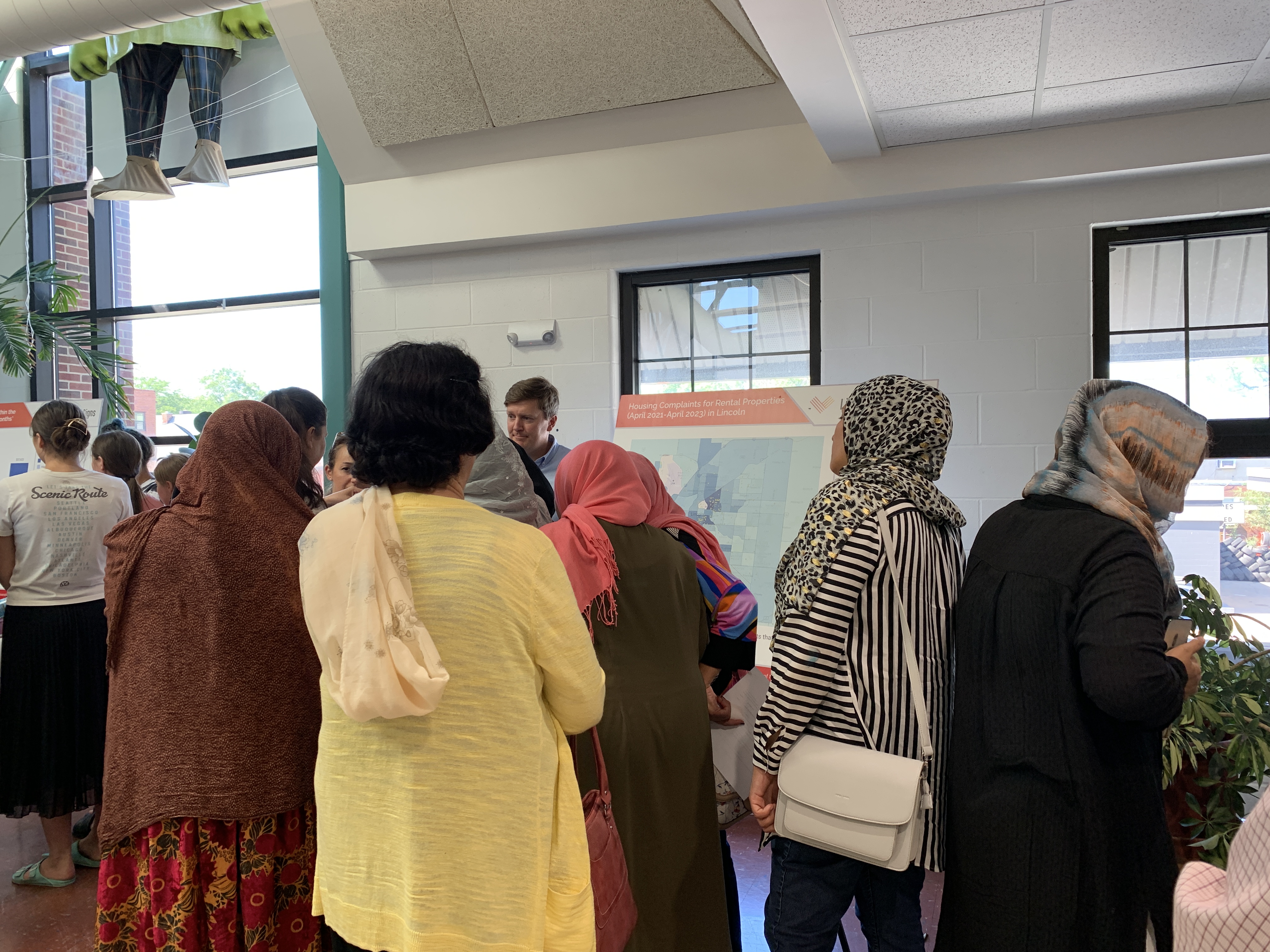
Strong communities use data to make collective changes that ensure everyone has the opportunity to succeed and thrive. Lincoln’s ongoing data report, Lincoln Vital Signs, informs residents about trends affecting our city and invites collaboration across all sectors of our community to address the findings.
Utilizing a new research method to share data and center community members with lived experiences as co-experts in the process, University of Nebraska Public Policy Center (PPC) and the Foundation recently hosted multiple data walks in different neighborhoods throughout our community.
Modeled after a tool developed by the Urban Institute Housing Opportunity and Services Together (HOST) initiative, the objective of the data walks was to share and discuss local key data findings with community residents to help inform both the strengths and needs in our community as it relates to race and equity.
At each of the four data walks, community residents and stakeholders were invited to share a meal, engage with other residents, and provide their thoughts on Lincoln’s community information. Eight key data points were presented on large posters as facilitators helped explain the data, answer questions, and engage participants while taking notes on discussions.
The process was well-received and educational for participants and facilitators alike.
“It is important to be aware of the different issues and disparities we have when it comes to minorities in our community,” said Sandra Rojo of Lincoln Literacy.
Sandra assisted the process as an English/Spanish translator and interpreter for each data walk. She found the innovative approach to increased awareness and understanding of our community data very promising.
Having an accessible conversation around data and receiving buy-in from community members with lived experience was exciting for PPC Research Director and data walk coordinator, Dr. Janell Walther.
“One participant exclaimed they initially thought looking at data would be dull,” she shared. “However, they quickly realized it was interesting to learn and talk about our local data.”
Data points covered six areas of findings: Financial Well-being and Work, Housing and Neighborhoods, Safety, Education, Health, and Local Governance. Insights from these conversations will help inform an upcoming special issue of Lincoln Vital Signs focusing on race and equity in Lincoln.
To learn more and stay up to date on the upcoming special issue of Lincoln Vital Signs, visit LincolnVitalSigns.org.
Annual Donor Appreciation and Charity Award Presentation
Published on Oct 22, 2020To view the event, please click here.
Community Connections
Published on Jan 21, 2021State of Early Childhood Education in Lincoln
Keynote Speaker: Jessie Rasmussen President, Buffett Early Childhood Fund
Panel Discussion: Anne Brandt, Executive Director, Lincoln Littles
Janice Anderson, Administrator, West A KinderCare
Diane Temme Stinton, CEO, TMCO
About the Speaker: Jessie Rasmussen’s career has focused on improving outcomes for children and families, first as an early childhood practitioner and administrator and later as a Nebraska state senator and state human services director in both Nebraska and Iowa. At the Nebraska Children and Families Foundation, she played an instrumental role in the development and passage of legislation that established a $60 million early childhood endowment funded through a public and private partnership. She is now president of the Buffett Early Childhood Fund, where she manages early childhood investments.
Lincoln Community Foundation Welcomes New Board Members
Published on Feb 8, 2023
The Lincoln Community Foundation welcomes four new members to its board of directors: Mike Boyle, Kawasaki; Juan Carlos Huertas, First Plymouth Church; Ben Kiser, Nelnet; and Makenzie Rath, Talent Plus. Steve Schaffer, Lutz, joins the board as the incoming president of NextGen Lincoln.
Officers for 2023 include Marilyn Moore, board chair, retired Bryan College of Health Sciences; Mark Hesser, vice-chair, Pinnacle Bank; Ryan Beckman, treasurer, Olsson; Linda Major, secretary, retired University of Nebraska-Lincoln, and Kim M. Robak, past chair, Mueller Robak LLC.
The Lincoln Community Foundation, established in 1955, strives to continually enrich the Lincoln community by promoting and achieving perpetual philanthropic support. The Foundation has distributed more than $214 million in grants to nonprofit organizations that have improved the lives of thousands of residents.
Culinary Kitchen Emerges from Legacy of Korn Popper
Published on Aug 14, 2023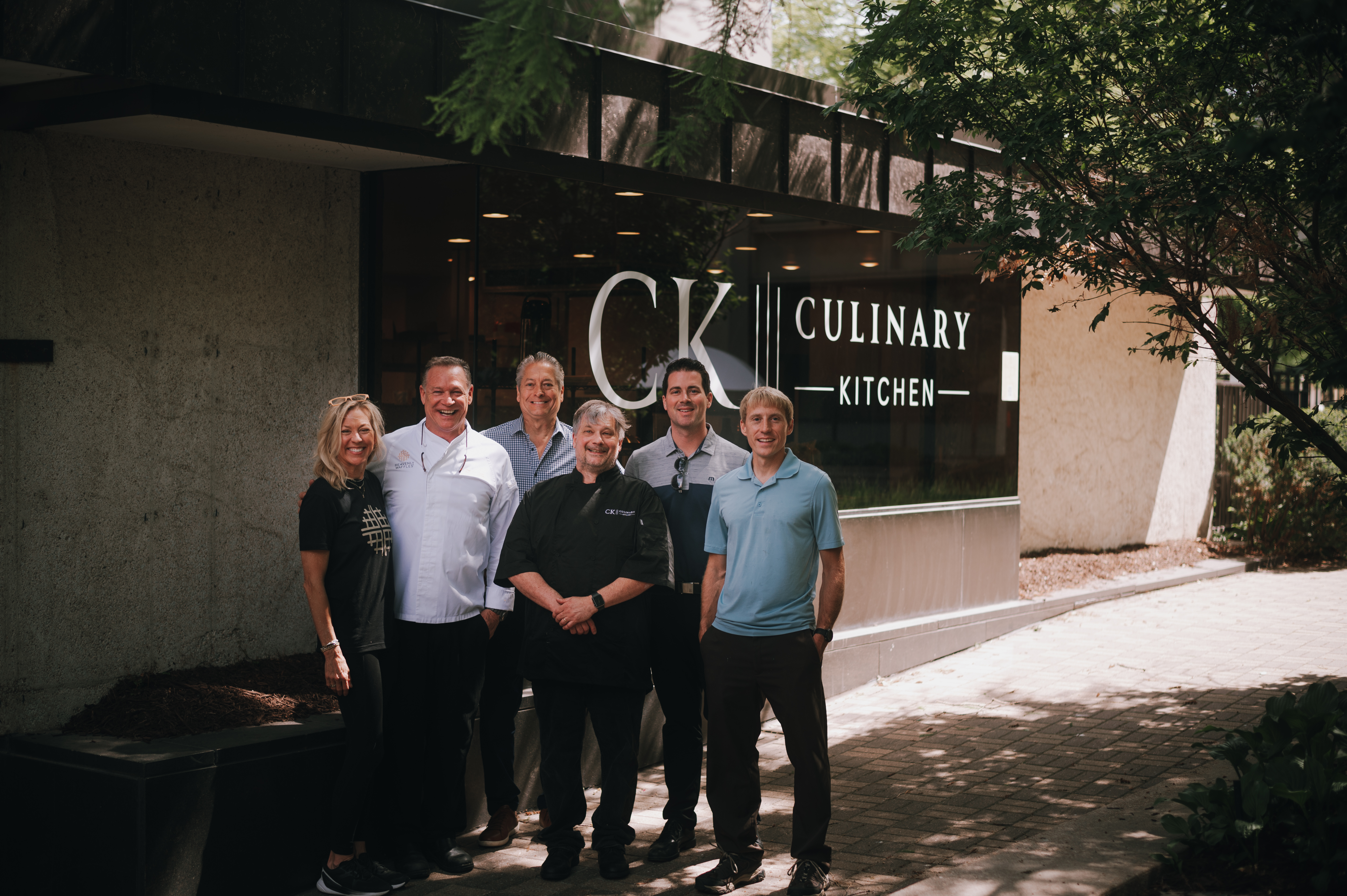
History meets innovation, that’s how the new owners of Culinary Kitchen describe the transition of the old Korn Popper building into a test kitchen featuring a luscious menu of breakfast, brunch, and lunch waffles.
Kevin Knudson, the new owner, said he fully understands the meaningful legacy of the Korn Popper at 14th and N streets – the official entryway into the timeless Lincoln Community Foundation Barbara Bartle Garden.
“It’s a Lincoln tradition, it’s Lincoln history,” Kevin said. “We look upon this as a new story that starts now, a contemporary Lincoln tradition, the old meeting the new.”
And that “new” is a different sort of downtown offering called Heavenly Waffles, a distinctive waffle that serves as the basis for all types of meals, from waffle sliders (such as smoked ham, pepper jack cheese, avocado and tomato) to delectable dessert waffles topped with fresh strawberries and blueberries, sprinkled with powdered sugar and maple syrup, or lemon zest waffles topped with passionfruit sorbet.
Bob Haney, founder and executive chef for Heavenly Waffles, described his “revolutionary waffle mix” as a modified waffle recipe with yogurt making up 40 percent of the dry mix. This creates a unique, light and fluffy texture and adds only 110 calories with 8 grams of protein.
“This is definitely not your hotel waffle. In fact, we will completely change your concept of a waffle,” Bob promised.
“I love Lincoln, this is a foodie town with people who love the opportunity to try something new,” Kevin said. “This is a different taste they’ve never had before. And what a perfect venue and location! I believe they call Foundation’s Garden the people’s park, so we are located in paradise.”
Visit the Culinary Kitchen Monday through Friday, 8 a.m. to 3 p.m.
Philanthropy keeps your clients sticky
Published on Dec 11, 2023
Regardless of your business or industry, retaining your clients or customers is a key to success. And as the saying goes, it’s easier and less costly to retain or get more work from a current client than it is to find a new client.
As an attorney, accountant, or financial advisor who helps clients with tax and estate planning matters, you’re well aware of the fragile transition phase after a client passes away. Not only are many tax planning techniques activated (and validated!) after a client’s death, but you’re also navigating the understandably stressful and emotional factors that impact your work with the heirs to administer the estate, transfer assets, and file tax returns.
It’s no wonder that the death of a client presents business retention challenges. You’d love to continue representing the client’s children, but that can be a difficult discussion immediately following their parents’ death. It’s no surprise that the rate of advisor disconnect and abandonment from one generation to the next is remarkably high. The numbers behind this churn are staggering. Historically, studies have found that 75% of parents report that their advisor had never met their children, and 10% or fewer of heirs retain their family’s advisor post-inheritance.
The solution is, of course, for the advisor to establish a connection with the next generation well in advance of a client’s death. Certainly there are many ways to cultivate a next-generation connection—starting young, sending birthday or holiday cards, encouraging clients to include children in meetings where appropriate, offering to counsel children on career choices, and making networking introductions or job referrals. Few touchpoints, however, are as substantive and meaningful as philanthropy. After all, in most clients’ view, inheritances are about more than money. They’re about values, humanity, multi-generational connections, understanding wealth’s origins, and more.
Children who get to know their parents’ advisors begin to appreciate the advisors’ roles in not only making family wealth last across generations, but also leaving a family legacy to the community. Lincoln Community Foundation can help advisors create opportunities to discuss philanthropy with clients and their children and grandchildren. Here are a few examples:
– Suggest that your clients consider working with LCF to establish easy-to-understand charitable giving tools, such as a family donor advised fund, field-of-interest fund, or designated fund.
– Encourage your clients to take advantage of LCF’s services for families, which include researching family members’ favorite causes, arranging site visits at local charities, and educational sessions about the basics of charitable giving and what’s going on in the community.
– Share with your clients and their children materials provided by LCF describing tax-savvy charitable giving, including the benefits of giving highly-appreciated stock instead of cash to a fund at LCF to avoid capital gains taxes.
– Ask Lincoln Community Foundation to help facilitate family discussions so that all family members see how they can support causes that have been important to their parents and grandparents over the years as well as causes that are contemporary, relatable, or meaningful to them.
While any conversation with a client’s child or grandchild can increase the likelihood of retaining the family as a client across generations, the topic of philanthropy is an especially effective tool to create a common bond that keeps the family from becoming your former client.
FAQs: A snapshot of clients’ tax-time charitable giving questions
Published on Feb 9, 2024
The year is in full swing. Attorneys, accountants, and financial advisors are asking clients to start gathering tax documents and related paperwork for 2023 tax returns and 2024 planning. Now is a good time for advisors to review a few basic tax principles related to charitable giving. Here are three questions that are top of mind for many advisors, along with answers that can help you serve your clients.
How important is it to high net-worth clients to get a tax deduction for gifts to charity?
Among clients who own investments of $5 million or more, 91% of those surveyed reported that charitable giving is a component of their estate and financial plans. In another study, most affluent investors cited reasons for giving well beyond the possibility of a tax deduction and would not automatically reduce their giving if the charitable income tax deduction went away. What this means for your practice is that it’s important to be aware of your clients’ non-tax motivations for giving, such as family traditions, personal experiences, compassion for particular causes, and involvement with specific charitable organizations. This also means it’s critical to talk about charitable giving with all of your clients because it’s likely that most consider it to be important.
Why do clients so often default to giving cash?
Many clients simply are not aware of the tax benefits of giving highly-appreciated assets to their donor advised or other type of fund at LCF or other public charity. Even if they are aware, they forget or are in a hurry and end up writing checks and making donations with their credit cards. It’s really important for advisors to remind clients about the benefits of donating non-cash assets such as highly-appreciated stock, or even complex assets (e.g., closely-held business interests and real estate). When clients give highly-appreciated assets in lieu of cash, they often can reduce–significantly–capital gains tax exposure, and they can calculate the deduction based on the full fair market value of the gifted assets.
What are the basic deductibility rules for gifts to charities?
It’s important to know that the deductibility rules are different for your clients’ gifts to a public charity (such as a fund at Lincoln Community Foundation) on one hand, and their gifts to a private foundation on the other hand. Clients’ gifts to public charities are deductible up to 50% of AGI (and up to 60% for cash gifts), versus 30% for gifts to private foundations. In addition, gifts to public charities of non-marketable assets such as real estate and closely-held stock typically are deductible at fair market value, while the same assets given to a private foundation are deductible at the client’s cost basis. This difference can be enormous in terms of dollars, so make sure you let your clients know about this if they are planning major gifts to charities.
So what’s the first step? Reach out to the Philanthropy Services Team at LCF and make it a habit to mention charitable giving to your clients. From that moment on, whatever the clients’ charitable priorities, consider our team to be your behind-the-scenes back office and support department to handle all of your clients’ charitable giving needs.
Sine Die: LCF's role in public policy advocacy during this past legislative session
Published on May 9, 2024
By Alec Gorynski
Last year, I had the chance to speak with the Lancaster County Board of Commissioners to advocate for funding to support early childhood education in our community. I'd like to think it was my well-reasoned argument that compelled them to vote in support of the appropriation, however, I think these two helped seal the deal.
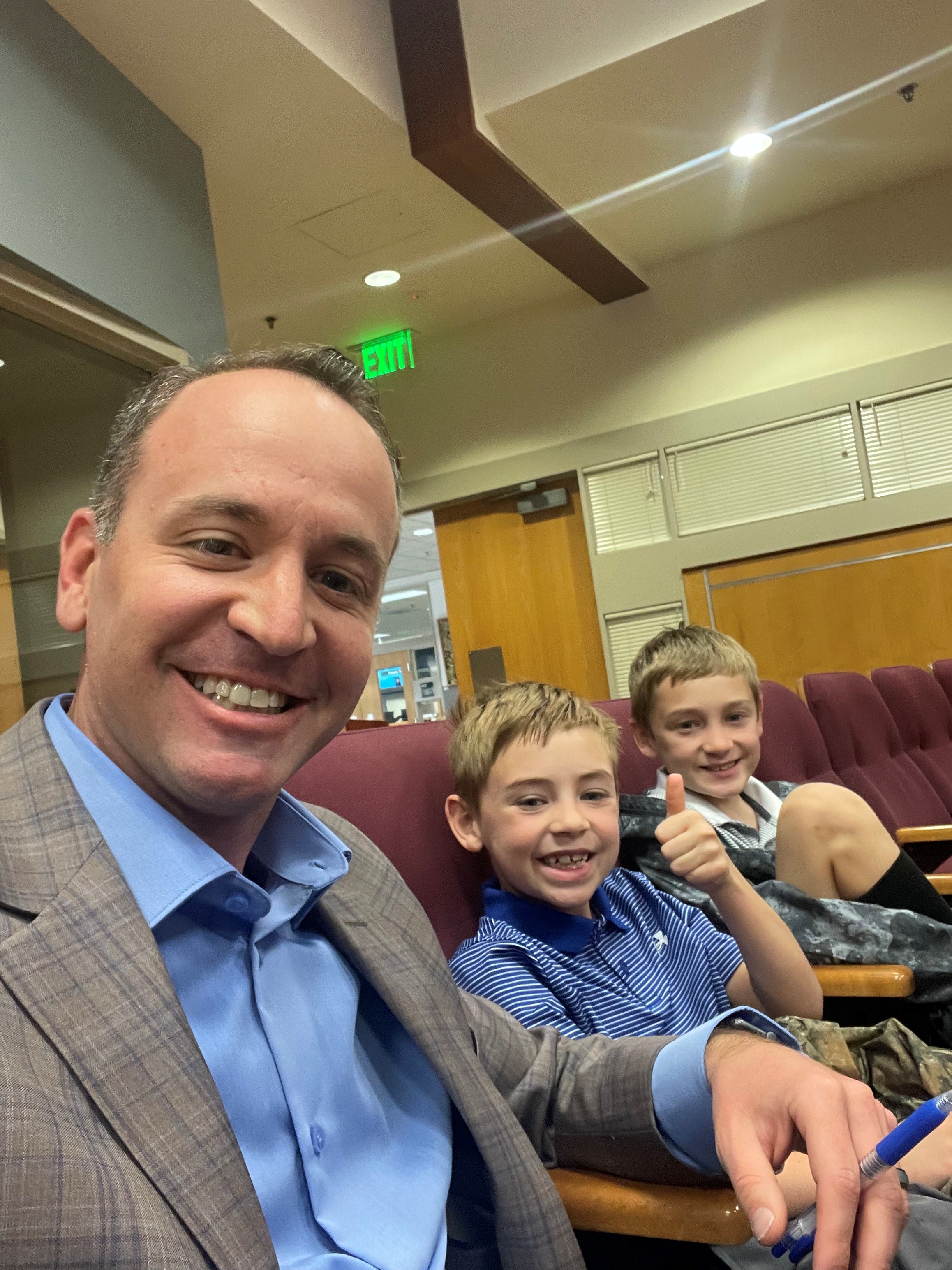
My boys, Jamie and Ben, were out of school for the day, and my wife and daughter were out of town. I decided they needed a civics lesson, so I told them to put on a nice shirt (I forgot to have them comb their hair), and we headed downtown.
After making my comments and responding to a few questions, one of the commissioners asked who the two young men were. Not missing a beat, I said that my sons had to join me because we didn't have care, and while my job can accommodate this, not everyone's can. For many in our community, care is too expensive or there are not enough slots to support all the working moms and dads in our community.
This was the start of LCF's engagement in public policy advocacy. As a community leader, we recognize that public policy is a tool that can have a profound impact on the prosperity of Lincolnites, and that LCF is in a unique position to serve as an advocate for community priorities which we have been leading for years now. Because of this, last year our board of directors established and seated a public policy advocacy committee to set policy goals and approve positions on legislative bills that align with those goals.
For this most recent legislative session LCF promoted the introduction of, lobbied for, and collaborated with peers from across Lincoln and the state in advocacy for a set of bills would make an impact on our work in the areas of philanthropy, affordable housing, and early childhood education.
Here are how things turned out come sine die:
Affordable Housing
Housing is made affordable because of government and philanthropic investments that allow housing units to be sold or rented for an amount that is affordable for low, moderate, and even middle-income families. The Nebraska Affordable Housing Trust Fund and the Middle-Income Workforce Housing Fund are the two main Nebraska sources of funding, and the focus of the legislature this session.
The Middle-Income Housing Fund supports the construction of owner-occupied homes in urban communities, including Lincoln. Housing developers partner with nonprofit housing agencies to borrow the funds, which permit them to build and sell homes to middle-income families, for whom the traditional "starter home" is currently in low supply.
The legislature approved a $12.5 million appropriation to this program and made some much-needed improvements that will make it more effective for housing development in Lincoln. This outcome was made possible because of a well-coordinated advocacy effort among Lincoln and Omaha housing organizations who were able to argue for a portion of what was originally allocated to a rural housing program.
The Affordable Housing Trust Fund helps pay for a portion of the development of housing projects, including single family homes and multi-family buildings, so that they can in turn be rented or sold to low-income families at an affordable rate. Unlike the Middle-Income program, the Affordable Housing Trust Fund is much more flexible and geared toward developments that will impact low-income families. During this last session, though, the legislature did not advance several bills to increase funding for affordable housing trust fund. We will continue to encourage support for this program in the next session.
The legislature approved a couple of measures to sustain and enhance property valuations and equitable tax treatment of affordable housing, thereby ensuring that the homes can continue to be offered at affordable rates for working, low-income families. One approved measure will help the Lincoln Housing Authority develop new housing using Federal funding programs, a practice which previously would have resulted in an inequitable and burdensome property tax bill.
Another bill preserves and expands valuing affordable housing in order to minimize the property tax bill and keep rents affordable. This practice came under threat following actions by Lancaster County as mentioned in this article. Developers challenged Lancaster County's decision which was argued before the State Supreme Court, and LCF filed an amicus brief arguing that the practice will harm affordable housing plans. The legislature acted swiftly to enshrine this practice and allow for continued affordable housing creation.
Early Childhood Education
The challenges facing the early childhood education system are vast, impacting families and providers alike. Lincoln Littles, a fiscally sponsored organization of LCF, has been working in these areas for years. Their work served as a model or example for several measures introduced this past session to support the childcarle workforce, to make it easier for providers to operate, to provide for the safety of children in the care of a provider, and to offer support for families.
LCF, via Lincoln Littles, worked in collaboration with several organizations including First Five Nebraska to share how the proposed policies could positively impact Lincoln, and the state as a whole.
Notable measures that passed include bills to increase the capacity of childcare providers. Providers are stretched thin, financially, and otherwise, and enhancing their capacity should help open slots so they can serve more families. This includes changes to the subsidy calculation which will result in greater reimbursement rates for providers, who can recoup an amount closer to their actual cost of providing care.p
Another measure will remove certain eligibility requirements for childcare employees and owners to access subsidy for their own children, which will help stabilize the childcare workforce while also ensuring quality care for these kids. Other bills smooth out licensing requirements, and provide for the portability of background checks, so that employees can change childcare jobs without having to wait for another background check.
A final bill worth mentioning is the Governor’s priority bill on early childcare education. The Childcare Capacity Building and Workforce Act was passed, which establishes a matching grant program for childcare capacity, workforce, and family support programs. The work of Lincoln Littles aligns very closely with the identified activities, and due to the generous support of our donors, Lincoln Littles would easily meet the matching requirements.
While there was some ground gained, there was still much that was left on the table for future legislatures to consider. Most notably, a number of the bills that passed did so without the funding necessary to realize their full potential. For example, the Childcare Capacity Building and Workforce Act has no funding available to award any grants, and there were proposed enhancements to the state subsidy program that would allow more families to participate. Additionally, several other bills did not advance out of committee.
Philanthropy
LCF, along with a cohort of community foundations and affiliated funds from across the state, sparked the introduction of the Endow Nebraska Act. If adopted, the Endow Nebraska Act would provide for a state income tax credit for charitable contributions made to endowments held at community foundations.
The rational for this measure is simple: Nebraska is facing a massive generational transition of wealth, and community foundations are in the best position to preserve a portion of the wealth for the long-term benefit of local communities. The bill, as proposed, would have incentivized $200 million in endowment funds at community foundations throughout the state, resulting in an estimated $230 million in community grants over the next 20 years.
The bill had broad support from members in the body, as well as a strong showing of support at the committee hearing, with no opposition. Despite these positives, the bill was not advanced out of the Revenue Committee. LCF and its peers from across the state are prepared to give it another run in 2025.
Public policy advocacy will continue to be a tool for realizing socioeconomic prosperity for all of Lincoln. If you are involved with a nonprofit organization, be it as board member or employee, consider how public policy influences your mission, and if advocacy should be a part of your strategy.
Feel free to contact me to see how we might collaborate, working together for the good of Lincoln.
Lincoln Littles Giving Day Raises More Than $1M For Early Childhood Education
Published on Mar 1, 2021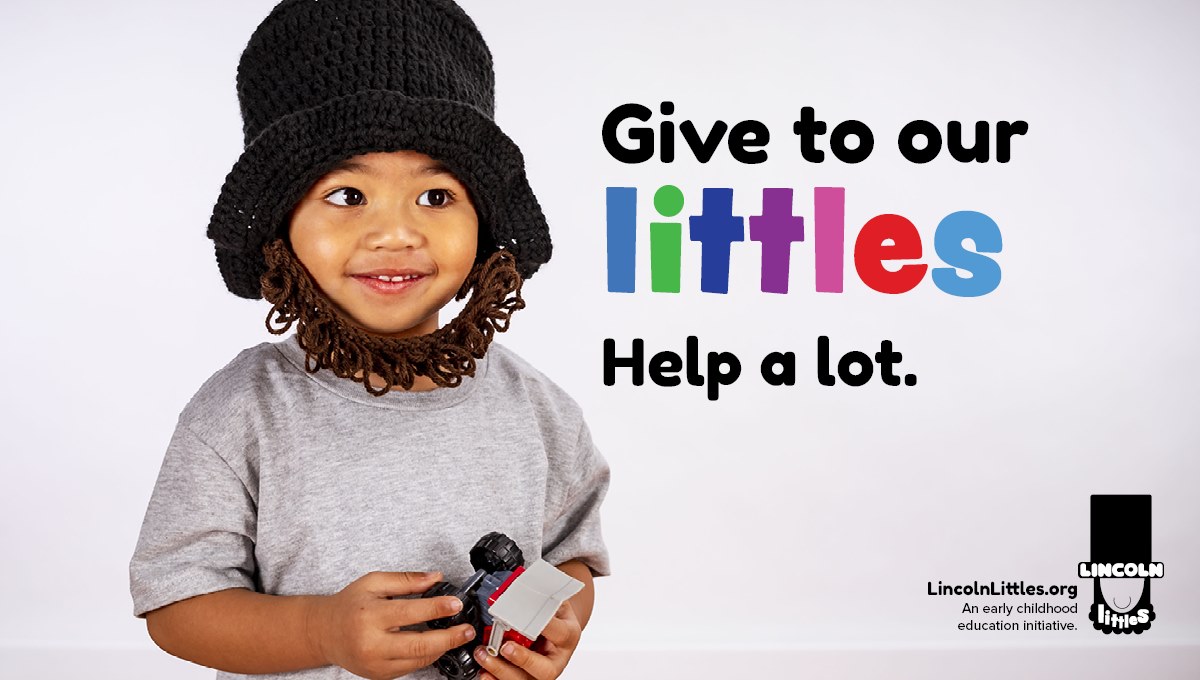
The third annual Lincoln Littles Giving Day, held on February 12, Abraham Lincoln’s birthday, raised 1,072,088. Hosted by the Lincoln Community Foundation (LCF), the giving day raised funds for tuition assistance, allowing more children in need to access quality early childhood education. The fund is inspired by the Prosper Lincoln Early Childhood community agenda goal of increasing accessible and affordable high-quality early childhood education.
“Hats off to you, Lincoln!” said LCF President, Barbara Bartle. “The community stepped up for our little ones during such a critical time and your generosity was absolutely heart-warming.”
This year, Mayor Leirion Gaylor Baird issued the “Mayor’s Big Challenge for Lincoln Littles,” to encourage community donations. The City identified one-time funds totaling $500,000 from the recent federal stimulus bill to contribute to Lincoln Littles. Matching Sponsors provided backbone funding for the giving day and together with the community surpassed the Mayor’s challenge to raise an additional $500,000.
“We extend our gratitude to the Mayor for this incredible commitment and show of support,” said Bartle. “Our matching fund sponsors and generous community answered the call with their donations. These funds will help so many working families and will give our littlest residents the best possible start.”
Lincoln Littles Giving Day matching sponsors include Mae Whitmer Early Childhood Fund, Lead Sponsor; Buffett Early Childhood Fund; Bettenhausen Family Foundation, in memory of Professor James D. Carr; Complete Children’s Health; Kile and Virginia Johnson; Krieger Family Foundation; Labenz & Associates LLC; Drs. Marilyn and David Moore; Nebraska Children and Families Foundation; Nelnet; Helen Raikes, in honor of Senator Ron Raikes; Drs. Bob and Lisa Rauner; Sue and Al Saathoff; Susan Sehnert Stuart; Donald and Janice Svehla Family; Tom and Susan Tallman; Union Bank and Trust Company; Dr. Eileen and Richard Vautravers; Ross and Judy Wilcox; and WRK Family Foundation.
Barbara Bartle Selected as Local Partner Champion by the Bob Woodruff Foundation
Published on Mar 15, 2021The Bob Woodruff Foundation (BWF) has selected Lincoln Community Foundation (LCF) President, Barbara Bartle, as a Local Partner Champion. BWF partners with community and national programs, organizations, and the military community & advocates to create healthy positive futures for our service members and their families. Local Partners are community-based groups of stakeholders from all sectors, collaborating in support of veteran well-being. Barbara was selected as a Local Partner Champion for her leadership in LCF’s Veteran Support Initiative.
“Serving veterans and their families has become a fundamental part of our work at the Foundation,” said Barbara. “Through implementation of the Veteran Support Initiative, we have the opportunity to work with and support a broad range of community organizations who provide direct services to these exceptional men and women and their families. We are honored to partner with the Bob Woodruff Foundation on this important work.”
The Lincoln Community Foundation created the Veteran Support Initiative to support areas of need for military members and their families transitioning home from their service. Since 2011, LCF has awarded more than $343,000 to 50 organizations and initiatives that support veterans in our community. In addition, LCF received a grant from the Council on Foundations to convene seven community foundations from across the country to develop a blueprint to assist other community foundations develop veteran support initiatives in their communities.
In Lincoln, task force committees were created around the greatest needs of returning veterans: Employment, Education, Basic Needs, Mental Health, Legal, Faith and Arts & Culture. Barbara was invited along with three other organizations to present at the Pentagon to the spouses of the Joint Chiefs of Staff. LCF in partnership with the Council on Foundations and three other foundations in the country launched the Veteran’s Philanthropy Exchange to connect foundations around the country with needs in communities. In 2014, philanthropists participating in the Exchange, including LCF, were honored at the White House Joining Forces celebration.
The Lincoln Community Foundation, established in 1955, strives to continually enrich the Lincoln community by promoting and achieving perpetual philanthropic support. For more than 11 years, LCF has shown through collaboration and leadership that Lincoln is committed to helping create positive futures for veterans returning home. If you are interested in supporting LCF’s Veteran Initiative, contact Chuck Williams at 402-474-2345 or chuckw@lcf.org.
Client conversations: Why your 2023 agenda must include charitable giving
Published on Feb 9, 2023
No doubt, your news feed includes far more articles about philanthropy as a planning tool for your clients than it did just a few years ago. Charitable giving has always been an important subject of client discussions for attorneys, accountants, and financial advisors. What’s changed is that widespread coverage of both major charitable gifts and the ease of making online donations has prompted more of your clients to pay attention to philanthropy.
Among the dozens of reasons to talk with your clients about their charitable giving plans are what many advisors consider to be the top three: tax strategies; serving clients across generations; and responsibility to assist clients with their charitable goals.
Tax strategies
This is a no-brainer on the list, but still, don’t assume that tax strategies will be the driving force for every client. After all, even if the tax savings on dollars donated reaches 35% or even 40%, your client will still wind up with less money in their pocket after making the donation than they would have if they’d never made the donation in the first place.
Happily, though, most Americans are charitable, with at least 50% reporting that they give to one or more charitable organizations each year. That means it’s likely that at least half of the clients walking into your office are giving to charity, so you need to be able to address the tax aspects of charitable planning. Keep in touch with the community foundation to stay current on the basics of tax deductibility, including AGI limitations, understanding the differences between public charities such as a donor-advised fund at LCF versus a private foundation, and the benefits of donating highly-appreciated assets to charity. The Lincoln Community Foundation is also the go-to resource for more complex giving, such as bequests, Qualified Charitable Distributions where retirement-age clients can give money from their IRAs to charity, and even gifts of real estate or closely-held assets.
Serving clients across generations
Surveys indicate that the majority of children inheriting their parents’ estates will fire their parents’ financial advisor. An aging client base can be extremely dangerous to an advisor’s business. Whether you are an attorney, accountant, or financial advisor, you’re certainly aware that you need to build relationships with the next generation to stand a chance of retaining the business long-term. That’s easier said than done, though, with client confidentiality rules and even just plain old awkwardness frequently standing in the way.
Enter philanthropy. When you work with your clients on their charitable giving plans, there are several ways to include the clients’ children and grandchildren in the planning, thereby giving you the opportunity to build strong, multi-generational relationships. By helping your client plan an overall charitable giving strategy, including, for example, naming children and grandchildren as successor advisors to a donor-advised fund at LCF, you’ll get to know the family dynamics as well as build relationships with other family members.
Responsibility to assist clients with their charitable goals
Many advisors take philanthropy seriously, adopting a disciplined approach and believing that it is their responsibility to understand their clients’ charitable goals and implement them to the best of their abilities using the very best tools available in the market. This is frequently the reason so many advisors turn to the Lincoln Community Foundation for assistance as they serve their charitable clients, whether that assistance is behind-the-scenes or working together with the client.
LCF’s purpose is to serve philanthropic individuals and families, as well as the organizations they support, to maximize overall positive impact on the community’s quality of life. The philanthropy services team at LCF is not only well-versed in the tax rules governing charitable giving, but it is also deeply familiar with the programmatic elements that are critical for a nonprofit organization to deploy a financial donation into meaningful, tangible improvement in the quality of life of the people the nonprofit serves. For advisors, LCF’s expertise and due diligence offer peace of mind that a client’s favorite nonprofits have been well-vetted and are in good standing, and that their programs are legitimately serving a community need.
By keeping these three reasons in mind, you’ll be better prepared to proactively raise the subject of charitable giving in your upcoming client meetings. We look forward to working together to serve your charitable clients.
LCF Grants $650k in Support of Community Priorities
Published on Mar 30, 2021![]()
The Lincoln Community Foundation (LCF) continues to maximize the impact of their discretionary grant-making in 2021 by committing $650,000 in support of Prosper Lincoln’s community agenda. These grants will be leveraged by other entities including local banks, city, corporate and individual philanthropists to continue the work of the community agenda. Prosper Lincoln seeks to improve the prosperity of all residents of Lincoln. Prosperity for all will mean a stronger and growing, more diverse, more innovative community, harnessing local assets, building to meet future challenges, and creating economic and social opportunities. Prosper Lincoln’s areas of focus are Early Childhood, Innovative Workforce, Affordable Housing, Strong Neighborhoods and Civic Investments.
To address Affordable Housing, LCF granted funds to provide gap funding needed to purchase, renovate, or build affordable housing in Lincoln. In support of Strong Neighborhoods, LCF approved funding to the Lincoln Community Learning Centers for a community builder in each quadrant of the city and mini grants to facilitate resident community engagement in neighborhoods. A grant for Early Childhood funded Lincoln Littles marketing and tuition assistance for lower-to moderate-income children to attend quality early childhood education. LCF continues to support this collaborative work in the community by providing backbone funding for the Prosper Lincoln initiative. This is second year funding from LCF toward the five-year plan of support for the community’s agenda, Prosper Lincoln.
The Lincoln Community Foundation, established in 1955, strives to continually enrich the Lincoln community by promoting and achieving perpetual philanthropic support. The Foundation has distributed more than $168 million in grants to nonprofit organizations that have improved the lives of thousands of residents.
The Boldest of Dreams
Published on Dec 6, 2021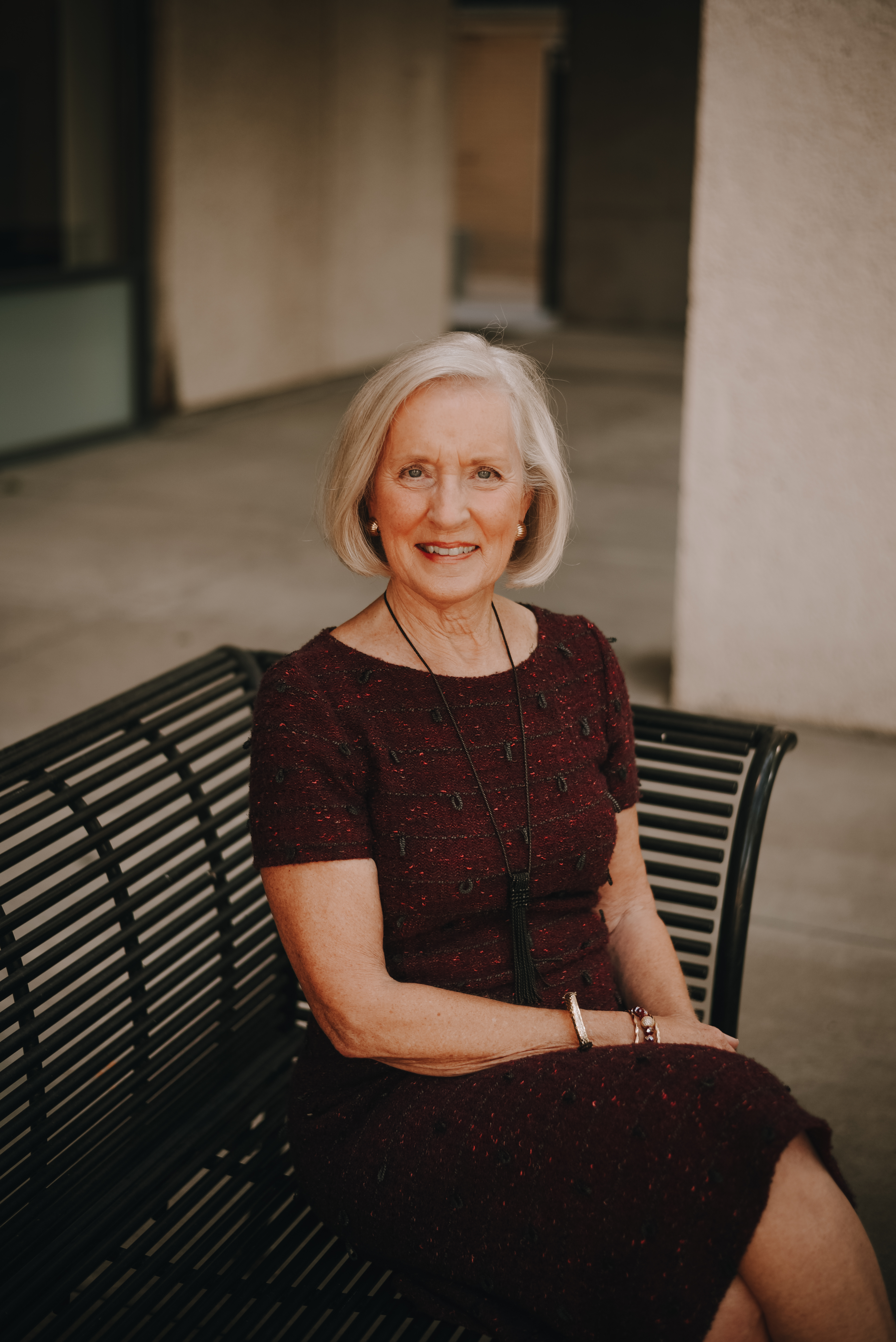 Barbara Bartle chooses her words carefully, always poised and composed, an Apple watch on her wrist and, at all times, a lengthy list inside her head. Yet underneath that calm lies a small-town girl who grew up to be a woman of grace and grit – a woman who has poured sweat and love into the Lincoln community, most notably over the past decade as president of the Lincoln Community Foundation.
Barbara Bartle chooses her words carefully, always poised and composed, an Apple watch on her wrist and, at all times, a lengthy list inside her head. Yet underneath that calm lies a small-town girl who grew up to be a woman of grace and grit – a woman who has poured sweat and love into the Lincoln community, most notably over the past decade as president of the Lincoln Community Foundation.
“The Foundation is truly the heart of Lincoln, a place where public, private, non-profit and philanthropy intersect,” she said. “It’s been a gift to serve for so many years.”
Barbara retires at the close of 2021, leaving behind a decade of vast change and achievement touching every facet of the community. In fact, it’s tough to wrap your arms around everything she has accomplished since arriving at the Foundation in 2010. For example, the number of donor funds has more than quadrupled during her time, assets have nearly tripled, and Give to Lincoln Day was born.
Barb distinctly remembers the birth of the first Give to Lincoln Day, launched during the recession when non-profits were struggling to raise operating dollars. “Give to Lincoln was a great way to help them get through the summer months,” she said.
The result, of course, was a phenomenal success that has raised more than $40 million, reaching a record-breaking $8 million in 2021 despite a global pandemic. “We have so many people in Lincoln who can get energized,” Barb said. “It takes all of us to make things happen here, so we help each other in Lincoln.”
Indeed, this is a woman who dreams big dreams – who sees paths open everywhere.
Tony Goins, director of the Nebraska Department of Economic Development and a member of the Foundation’s Board of Directors, described Barb as a visionary whose legacy is engraved 6
in stone. “She influences people to see a path in the midst of challenges and inspires enthusiasm so that her team and constituents want to take the hill,” he said. “Barb is the master at leveraging relationships. You can’t tell her ‘No.’”
Clearly Barbara’s vision, mission and values-driven leadership helped facilitate a bold strategic plan,” Tony elaborated. “Then she recruited the right people to support execution of that plan.”
Barb routinely shrugs off credit, however, pointing instead to the collective action of generous donors, steadfast citizens and leaders, and dedicated staff. “I cannot tell you what tremendous staff we have,” she said. “They have such high missions and care so deeply about this community.”
Barb grew up in Cozad, Nebraska, with a mom who urged her to find purpose and who told stories of a pioneering great grandmother, a single mother who raised five children in the Sandhills and modeled a life of true grit. Barb never forgot those stories.
Beginning her career as a small-town teacher, Barb eventually moved to Lincoln where she landed at the Lied Center for Performing Arts as volunteer coordinator, spearheading the Friends of Lied Program. She then moved to the Foundation for Lincoln Public Schools, where she started its Fund-A-Need initiative and helped create the Community Learning Centers.
But Barb believed she could paint on a larger canvas at the Lincoln Community Foundation. “I have always wanted to impact children, and now I could impact children and their families – an entire community,” she said.
After arriving in the spring of 2010, Barb made magic throughout the next decade.
• Foundation assets grew from $62 million to more than $190 million.
• Annual grants to the community grew from $4 million to more than $21 million.
• The first Community Land Trust in Nebraska was established to address affordable housing.
• New initiatives were launched, spearheading support for veterans, early childhood, downtown revitalization, and capital improvement projects.
• LCF facilitated the wildly successful community-building efforts of Lincoln Vital Signs and Prosper Lincoln.
Barb is especially proud of Prosper Lincoln. Her leadership ensured the Foundation not only had a seat at the table but stepped up and took the lead. As Barb described, Prosper Lincoln required much of LCF and the community. “Faith and hope. Working together. Trusting and leading with the boldest of dreams.”
As Paula Metcalf, the Foundation’s Vice President for Gift Planning and General Counsel, noted, “Barb is always connecting people through improved partnerships and community conversations. Her tireless efforts helped create heightened awareness and strategies that support affordable and quality early childhood education programs, more affordable housing.”
“Barbara’s personality exudes optimism,” said Paula. “She is a free thinker who is always coming up with new ideas to make Lincoln a better community for all of its residents.”
Barb certainly stirred hope and optimism when she developed a remarkable pandemic plan that resulted in more than $1.2 million for 66 non-profit organizations through the Lincoln COVID-19 Response Fund, established through a partnership with Mayor Leirion Gaylor Baird and United Way of Lincoln and Lancaster County.
I knew we had to work together and work fast,” Barb said. “I was paying attention to what other cities were doing and knew it worked better to have one community fund. We were definitely ready, and the support from this community was overwhelming.”
Barb recognizes there is work ahead. “We have to think about ensuring our great city for the next generations,” she said. “We can do what we do now because in 1955 our founders literally built a solid foundation, and since then we have stood on their shoulders to carry that mission forward.”
Advice for her successor?
“You inherit a generous-giving community. Now you have the responsibility and honor of making a difference.”
Barb admits it is tough to walk away. At the same time, she is ready to spend time with grandchildren, serve as district governor for Rotary International, and look for a few new adventures.
She loves the advice contained in the words of Meister Eckhart. “And suddenly you know: It’s time to start something new and trust the magic of beginnings.”
“I am ready for a little magic,” Barbara said. “I am ready for something unexpected.”
Barbara Bartle Forever Fund
Barbara Bartle will forever be known as a catalyst for community development and positive change.
While she is retiring as president of the Lincoln Community Foundation at the end of 2021, her work will remain steadfast through the Barbara Bartle Forever Fund.
To honor her career, Barbara’s children have established the Barbara Bartle Forever Fund. By contributing to Barbara’s fund, you will help ensure a perpetual stream of grants for the ever-changing needs and opportunities in our community.
Donate to the Barbara Bartle Forever Fund at LCF.org.
Lincoln Littles Giving Day Raises More Than $670,000 For Early Childhood Education
Published on Feb 14, 2022
The fourth Lincoln Littles Giving Day, held on February 9 raised $670,123. Hosted by the Lincoln Community Foundation (LCF), the annual giving day raises funds for tuition assistance, allowing more children in need to access quality early childhood education. The day is inspired by the Prosper Lincoln Early Childhood community agenda goal of increasing accessible and affordable high-quality early childhood education.
“Year after year, Lincoln Littles Giving Day harnesses the awesome power of philanthropy” said LCF President, Alec Gorynski. “This community sees the critical need for all children in Lincoln to receive the quality early childhood education and care that they deserve. Thank you, Lincoln!”
This year, the City identified $100,000 Community Development Block Grant funds to contribute to the Lincoln Littles effort. Mayor Leirion Gaylor Baird once again issued the “Mayor’s Big Challenge for Lincoln Littles,” to encourage community donations. Matching sponsors provided backbone funding for the giving day.
“We extend our gratitude to the Mayor for her support of Lincoln Littles,” said Gorynski. “Our generous matching fund sponsors and community answered the call with their donations. These funds will serve working families and make a long-term impact on their children's success, stability, and development.”
Since 2019, the giving day has raised nearly $3.1 million for the Lincoln Littles Early Learning Fund. Grants from the fund are distributed to early childhood education providers in Lincoln that are on Step 2 or higher of the state guidelines for Step Up to Quality and who serve children in need. Since Lincoln Littles launched, there has been a 146% increase in early childhood education providers in Lincoln participating in Step Up to Quality.
Lincoln Littles Giving Day Matching Sponsors include: The Buffett Early Childhood Fund, Acklie Charitable Foundation, Harbor of Dreams, Inc., Mae Whitmer Early Childhood Fund, Bettenhausen Family Foundation, Drs. Bob & Stacie Bleicher, Rosalind K. Carr in memory of Professor James D. Carr, Shirley & Jerry Daugherty, Barbara Hoppe & Bruce Johnson, Kile & Virginia Johnson, Kawasaki Motors Manufacturing Corp., U.S.A. Good Times Foundation, Barbara Hoppe Johnson & Bruce Johnson, Kidwell Electric, Inc., Lincoln Industries, Robert & Cynthia Milligan, Drs. Marilyn & David Moore, Nebraska Children and Families Foundation, Drs. Bob & Lisa Rauner, Sue & Al Saathoff, Rhonda Seacrest, Dr. Bob & Dottie Shapiro, Tom & Lisa Smith, Tom & Susan Tallman, Temme Family Foundation, Sue & Ed Tricker, Dr. Eileen & Richard Vautravers and Ross & Judy Wilcox.
The Lincoln Community Foundation, established in 1955, strives to continually enrich the Lincoln community by promoting and achieving perpetual philanthropic support. The Foundation has distributed more than $195 million in grants to nonprofit organizations that have improved the lives of thousands of residents.
Giving a business to charity: Stack the odds in your client’s favor
Published on Mar 8, 2023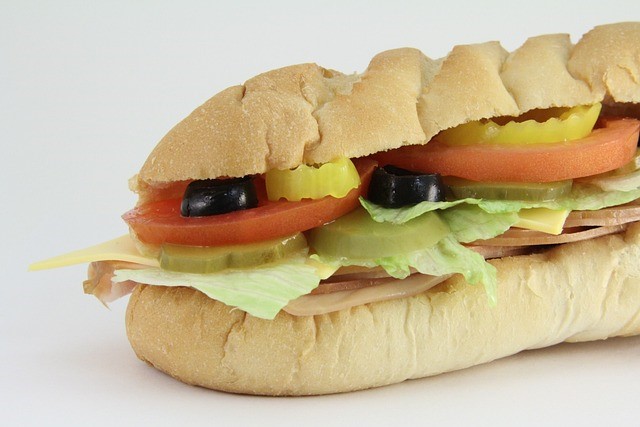
Energy incentive extends to nonprofit organizations
Despite recent reports of a 55% decline in charitable giving by the top 50 U.S. donors in 2022, high profile giving by donors associated with well-known businesses has maintained its place in the limelight, even amid recent market volatility and tenacious concerns about inflation and interest rates. Recent examples abound, including last year’s gift of Patagonia by founder Yvon Chouinard; the well-reported generosity of philanthropists Melinda French Gates and MacKenzie Scott; and the portion of the proceeds, potentially worth $5 billion, from the eventual sale of Subway restaurants that are set to flow to a charitable foundation.
As an advisor to business owners—and collaborating with LCF—you can help your clients leverage potential future liquidity events to support the community causes they care most about.
Advance planning is critical. The LCF team is happy to get involved as early as possible in your discussions with a client about giving part (or all) of a closely-held business to charitable causes. These transactions carry with them layers of complexity, largely around the timing of the charitable gifts in relation to the sale transaction. The best outcomes are achieved through a thoughtful, multi-step process.
Many successful closely-held exit transactions occur only after several years of planning—and most of that planning occurs well before potential buyers are even engaged. This planning period is an important time for your client to consider giving ownership shares of the company to a donor advised fund at LCF, especially knowing that under certain circumstances, the proceeds of the shares held by the donor advised fund will be immune from capital gains taxes if the business eventually does sell, leaving more money to support the client’s favorite causes.
You might even consider encouraging your client to give shares to a donor advised fund not all at once, but in increments over time during the business exit planning period (before a buyer is identified). This can help avoid the appearance that the gift is merely a function of the business sale and as such intended to be a tax dodge. If the IRS determines that the stock gifts to charity and the sale of the company are really one and the same event–a “step transaction”--the tax benefits of the charitable deduction could be disallowed.
Another essential part of the process is to secure a proper valuation of the stock by an independent and qualified appraiser for charitable deduction purposes when the ownership is gifted to the donor advised fund at the Lincoln Community Foundation.
Please reach out to the philanthropy services team at LCF to discuss how we can help your business owner clients who intend to maximize their future ability to support the charities they love.
QCDs: Good news and important reminders
Published on May 5, 2022
Qualified Charitable Distributions, or “QCDs,” have been in the news a lot lately, especially in light of proposed SECURE Act 2.0 legislation that passed the House of Representatives in March and is now pending in the Senate.
Through a QCD, starting at age 70½, your client can instruct the administrator of an IRA to direct up to $100,000 per year to a qualified charity. This helps your client’s tax situation because the client does not need to report the amount of the QCD as taxable income.
Here are four important reminders about QCDs:
- •Even though the SECURE Act changed the Required Minimum Distribution (RMD) age to 72 from 70 ½, the QCD age is still 70 ½.
- •QCDs cannot be made to donor-advised funds, but your client can set up a designated, field-of-interest or unrestricted fund at Lincoln Community Foundation to receive a QCD.
- •Under a version of the proposed SECURE Act 2.0 legislation, QCDs would be indexed for inflation. In addition, proposed legislation would allow a client to make a one-time QCD of up to $50,000 to a charitable remainder trust or other split-interest entity.
- •Finally, be sure to help your clients coordinate their QCDs with their Required Minimum Distributions. Proper planning will help avoid troublesome tax pitfalls.
Please reach out to the team at LCF to learn more about QCDs and how your client can establish a fund to support financial and tax goals as well as charitable giving goals.
Tom and Lisa Smith Honored with 2022 Charity Award
Published on Apr 28, 2022
In the offices of DA Davidson, overlooking an ever-developing Canopy Street in the Haymarket, Tom and Lisa Smith recently reflected on what drives their personal missions to serve their community.
“I just love Lincoln. I love Nebraska,” said Lisa.
“People in Lincoln are good people – as good as you can find in the country,” Tom agreed. “It’s simple, this is home.”
Together, Lisa and Tom have established a legacy as heart-forward philanthropists who give freely of their time, talent, and treasure to the many causes and organizations they care about. This spring they will be honored with the 2022 Charity Award at the Lincoln Community Foundation’s annual Donor Recognition Event.
The Charity Award was established by the Foundation as a gift to the community. The award recognizes Lincoln’s most generous citizens for their leadership and philanthropy.
“As a community, we’re indebted to Tom and Lisa Smith for their many contributions,” said Alec Gorynski, Foundation president. “The Charity Award is a meaningful demonstration of our appreciation for their dedication and commitment to the growth and prosperity of Lincoln.”
Married in 2004, both Tom and Lisa have always had a passion for philanthropy, and this commitment became even stronger as a couple. Tom hails from Hastings, Nebraska, and came to Lincoln on a football scholarship from the University of Nebraska. Upon graduation from the College of Business in 1968, he called Lincoln his home permanently and has grown his family and businesses here for the past 55 years.
Lisa was born and raised in northeast Lincoln and grew up learning the value of kind and charitable gestures towards fellow community members.
“My mother was very charitable and said something that stuck with me,” Lisa reflected. “We didn’t have a lot of money, but we would do things always, always for other people. And she would say, ‘We’re doing it just because we can.’”
Like Tom, Lisa also graduated from the University of Nebraska’s College of Business – a philanthropic thread that ties them together. The University was Tom’s entry point for giving back to the community. In 1983, Woody Varner reached out to Tom and his business partner, Chuck Burmeister, about contributing to the first computer laboratory at the University.
“Woody was certainly a mentor to me,” said Tom. “He helped me see the path of philanthropy.”
That philanthropic path with the University led to longstanding relationships with, and contributions to, the University of Nebraska Foundation (both currently serve as Foundation Trustees and Lisa served as founding chair for Women Investing in Nebraska), College of Business (both serving on the Alumni Advisory board with Lisa currently serving as chair), Lied Center, Sheldon Art Gallery, and Nebraska Athletics.
Service is a strong pillar of Tom and Lisa’s philanthropy. Madonna was the first organization they worked with together and has become one of their great philanthropic passions for the past 27 years. Tom first joined the Madonna Hospital board in 1995 and served nine years as chairman, then came back a year later and served an additional term as chairman. Lisa served on the Madonna Foundation board for 10 years.
Lisa remains passionate about senior care and currently serves on the Tabitha Hospital board.
“The seniors in our community have been impacted by the pandemic in ways I can’t explain,” she said. “Aging can be terribly lonely. Bringing back joy to our seniors is close to my heart.”
The Smith’s charitable impact and service can be felt throughout our community. For example, the Child Advocacy Center is the first stopping point in Lincoln for children who have been victims of sexual abuse, child abuse, witnessed a violent crime or are victims of a violent crime. Lisa is very passionate for the work of the Child Advocacy Center, currently serving as a board member and actively fundraising for a much-needed building expansion.
Art is another passion for the couple. Lisa is the current treasurer for the Joslyn Art Museum board and has also served Public Art Lincoln and the Sheldon Museum of Art. Being extremely involved in several organizations has never phased Lisa. In fact, she hopes to lead by example and inspire others to get involved in their community.
“When I first started working in banking, I met others by serving on boards and volunteering,” she said. “Taking the time to give back to the community has made all of the difference.”
Tom echoed this sentiment. “Attending the meetings, showing up, and doing the work really sets the tone for your service and for others,” he said. “When I serve on a board, I implore myself to make the meetings.”
Tom has certainly set the tone for leadership as past chair of the Lincoln Community Foundation board of directors and in his work developing South of Downtown. His involvement with South of Downtown started on the ground level – partnering with fellow philanthropists, consultants, and the Lincoln Community Foundation to make improvements to the neighborhood, including investments in housing.
What resulted was the creation of the South of Downtown Community Development Organization (SODO), which enriches quality of life for residents of Near South and Everett neighborhoods through collaboration, economic opportunities, and community development. Tom currently serves as SODO board chair.
Seeing brick-and-mortar housing projects and improvements come to life through his philanthropy is not the only impact of his work in South of Downtown that hits home.
“The most notable impact for me has been understanding the community,” he said. “If you speak with someone who lives in the area, they know that SODO has their back and their interest at heart. This work is not only about affordable housing but addressing the many elements that make a community successful.”
Beyond city neighborhoods, Tom and Lisa’s interests also expand to conservation-based organizations including Audubon Nebraska, the Jackson Hole One Fly Foundation, and Ducks Unlimited.
“We are so fortunate to have Tom and Lisa investing their time and hearts into the organizations and causes that improve our quality of life in Lincoln,” said Alec Gorynski. “Their charitable impact has shaped this city for the better and will be felt for generations to come.”
Previous Charity Award honorees include:
Ed and Mary Copple – 2012
James and HK Stuart – 2013
James and Rhonda Seacrest – 2014
Alice Dittman – 2015
Jim and Mary Able and the Abel Family – 2016
Donna Woods – 2017
Robert and Karen Duncan – 2018
Dr. Tom and Nancy Osborne – 2019
Duane and Phyllis Acklie – 2020
Community of Lincoln – 2021
Farms, tax planning, and funding a family legacy
Published on Aug 3, 2022
Given that there are more than 2 million farms in the United States, most advisors have at least one client who owns farm property. Although the number of farms has been dropping slowly but steadily since 2000, still, millions of dollars of wealth are tied up in farms as agricultural land continues to be valuable.
Farmland, like many other hard-to-value assets, tends to carry with it a lot of emotional attachment. Farmland also can be hard to deal with in an estate plan because of the challenges of multiple owners and the complexity of the estate tax as it’s applied to farm-related assets. For these reasons, it is worth exploring philanthropic options with your clients who own farmland.
Multiple ways to structure a gift
A fund at the Lincoln Community Foundation can receive a tax-deductible gift of farmland in a variety of ways. An outright gift is always an option; lifetime gifts of farmland held for more than one year are deductible for income tax purposes at 100% of the fair market value of the property on the date of the gift, which also avoids capital gains tax and reduces the value of the client’s taxable estate. Other ways to give farmland include a bargain sale or a transfer to a charitable remainder trust which produces lifetime income for your client.
Keeping the family together
A gift of farmland to a fund at LCF doesn’t just provide tax benefits. The gift also helps your client overcome the emotional challenges associated with letting go of an asset that in many cases has been in the family for generations.
By donating farmland to a fund at LCF, a client can work with us to extend the emotionally important, family-related dynamics that were previously linked to the land, even after the foundation sells the farmland and the client’s fund holds the proceeds. For example, multiple generations of family members can serve as advisors to a donor advised fund and collectively recommend grants to charities that carry on the values held by the family during the years it operated the farm, such as funding scholarships for students pursuing a career supporting agriculture, promoting sustainable farming, or supporting programs that educate entrepreneurs about how to build a successful farming operation.
A cautionary note
Closely related to gifts of farmland to charity are conservation easements. Conservation easements can be a tax-effective way for a client to fulfill charitable intentions with real estate, but these vehicles must be carefully constructed to avoid landing on the IRS’s radar.
We are happy to help you and your client structure a gift of farmland to a fund at LCF so that the client’s family members can continue to work together even after the farm is sold. Please reach out anytime!
Record-Breaking Give To Lincoln Day Raises Nearly $8 Million
Published on Jun 1, 2021
The 10th annual Give to Lincoln Day on May 25th raised a record-breaking $7,928,241, almost $1 million over the previous record set last year. The funds are designated to help support 456 local nonprofits that serve Lincoln and Lancaster County. All participating nonprofits will receive a proportional share of a $500,000 match fund based upon the organization’s percentage of the total dollars raised, thanks to many generous sponsors including Presenting Sponsor, West Gate Bank.
“We’ve seen from the past 10 years that when Lincoln comes together records can be broken,” said Barbara Bartle, LCF president. “Our nonprofits have been on the front line serving our most vulnerable for over a year. To surpass last year’s record-breaking event shows the compassion of our community.”
Nearly 30,000 donations were received for the 10th annual Give to Lincoln Day. The event has raised more than $40 million for local nonprofits in its 10-year history.
“Give to Lincoln Day represents the strength of our community,” said Bartle. “The modern symbol for the 10th anniversary is a diamond. The 10th annual Give to Lincoln Day was a spectacular gem for our community!”
For more information and to see gifts received for each nonprofit, visit www.GiveToLincoln.com.
10th Annual Give to Lincoln Day Raises Nearly $8 Million
Published on Aug 30, 2021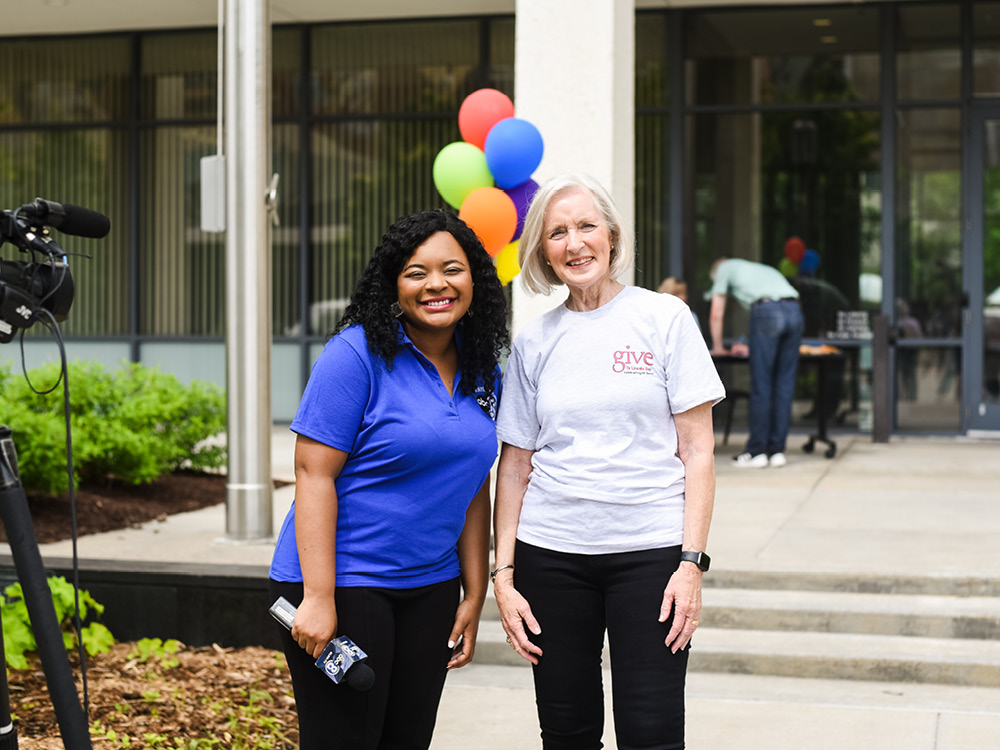
The 10th annual Give to Lincoln Day on May 25th raised a record-breaking $7,928,241, almost $1 million over the previous record set last year.
The funds are designated to help support 456 local nonprofits that serve Lincoln and Lancaster County. All participating nonprofits will receive a proportional share of a $500,000 match fund based upon the organization’s percentage of the total dollars raised, thanks to many generous sponsors including Presenting Sponsor West Gate Bank.
“We’ve seen from the past 10 years that when Lincoln comes together records can be broken,” said Barbara Bartle, LCF president. “Our nonprofits have been on the front line serving our most vulnerable for over a year. To surpass last year’s record-breaking event shows the compassion of our community.”
Nearly 30,000 donations were received for the 10th annual Give to Lincoln Day. The event has raised more than $40 million for local nonprofits in its 10-year history.
“Give to Lincoln Day represents the strength of our community,” said Barbara. “The modern symbol for the 10th anniversary is a diamond. The 10th annual Give to Lincoln Day was a spectacular gem for our community!”
For more information and to see gifts received for each nonprofit, visit GiveToLincoln.com.
Making a Collective Impact
Published on Dec 6, 2021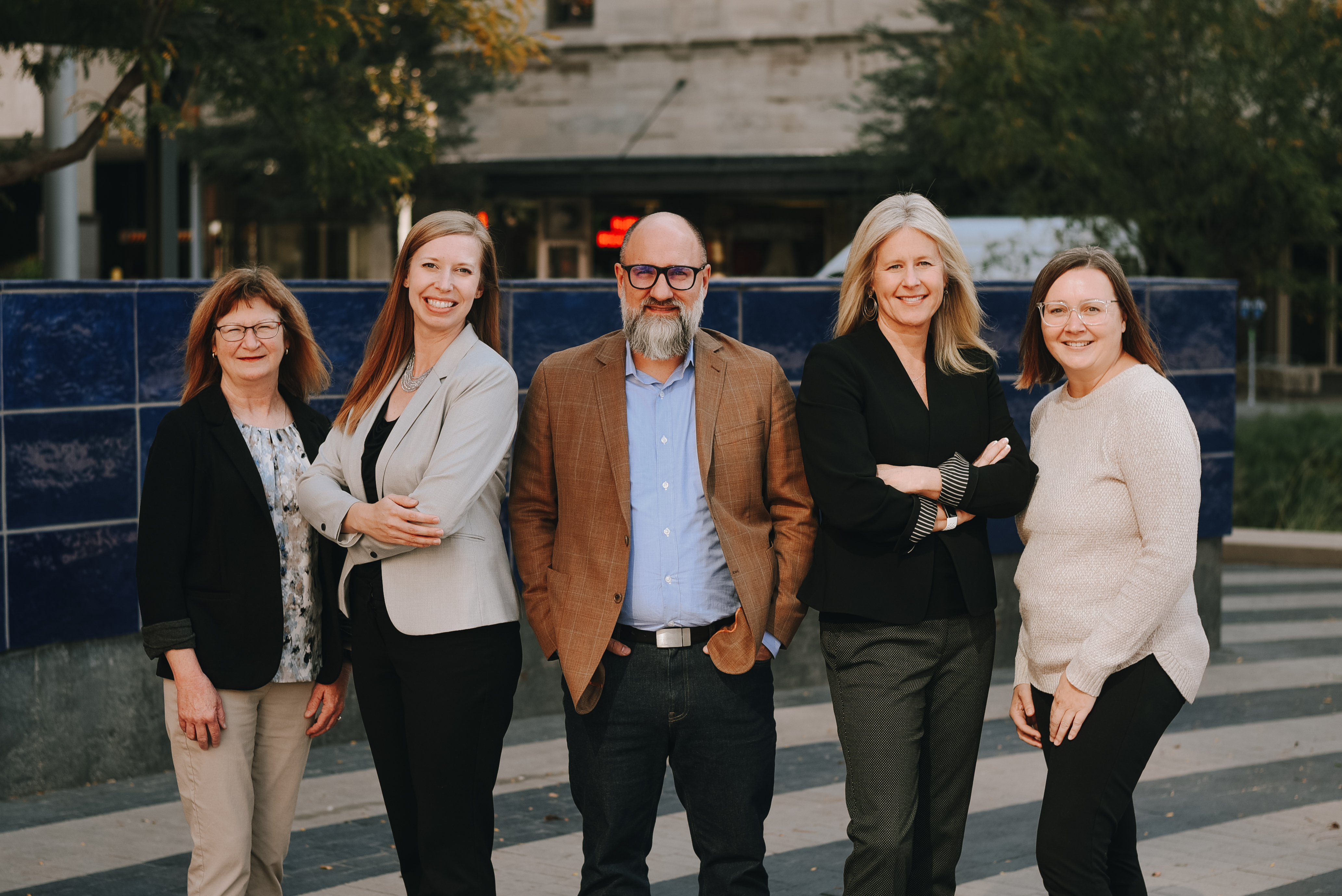 Ninety minutes pass quickly as Prosper Lincoln drivers gather once a month to provide updates and collaborate on the many community-wide efforts taking place to lift Lincoln higher.
Ninety minutes pass quickly as Prosper Lincoln drivers gather once a month to provide updates and collaborate on the many community-wide efforts taking place to lift Lincoln higher.
What started as 2,100 ideas to address the 2014 Lincoln Vital Signs findings has evolved into a focused community agenda. LCF has provided backbone funding for Prosper Lincoln since its inception. The first phase of the agenda included three focus areas and three developers. Now in its second phase, the work of Prosper Lincoln has been embedded within the community through the drivers – leaders from different organizations who wake up every day thinking about the phase two focus areas.
Anne Brandt, executive director of Lincoln Littles, is the driver of Early Childhood. Anne’s work focuses on ensuring access to high-quality early childcare for all children in Lincoln through business and community engagement, policy change, collaboration, and awareness.
Nola Derby-Bennett, director of Community Learning Centers (CLC) at Lincoln Public Schools, is the co-driver of Prosper Lincoln’s Strong Neighborhoods focus area. Nola oversees the 29 CLC’s located throughout the community and works with four new community builders.
Allison Hatch, director of workforce development at the Lincoln Partnership for Economic Development, is the new driver of Innovative Workforce, following Bryan Seck. Allison works with local employers and agencies to connect individuals to full-time careers.
Wynn Hjermstad, community development manager with the City of Lincoln, is the driver for the Affordable Housing focus area. Wynn implements Lincoln’s Affordable Housing Coordinated Action Plan while also managing the pandemic-related Housing and Utility Assistance funds, Lead Based Paint Hazard Reduction efforts, and federally funded housing assistance programs.
Shawn Ryba, former executive director of South of Downtown Community Development Organization, served as the co-driver for Prosper Lincoln’s Strong Neighborhoods. Shawn worked on South of Downtown’s redevelopment and strategy plan and responded to community residents’ priorities.
Janell Walther, senior research manager at the University of Nebraska Public Policy Center, is a consultant for Prosper Lincoln and facilitates monthly meetings with the drivers. This provides a rich opportunity for overlap and collaboration. Discussion topics range from rent and utility assistance for residents impacted by Covid to workforce needs related to childcare, from community health events providing hiring opportunities and free physicals for students, to new affordable housing developments.
A common thread that runs throughout the drivers’ work is the effort to achieve equity in social and economic mobility in our community. This year LCF was selected to participate in NEON, a cohort of seven community foundations working to develop common measurements and share strategies and progress reports with each other as they work to dismantle structural and systemic racism and achieve equity in their communities.
“We learned from Lincoln Vital Signs that Lincoln is growing stronger in many ways, but at the same time, not everyone is prospering,” said LCF President Barbara Bartle. “Being a member of the NEON cohort is building upon our commitment to increase equity of opportunity in Lincoln.”
Another benefit of being a part of the NEON cohort is the opportunity to engage in ground-breaking work with Urban Institute as they develop ways to measure outcomes for systemic change.
The Prosper Lincoln drivers bring their experience and passion to the table and work together to solve complex issues facing our community. The opportunity to collaborate both deepens and strengthens their work to build a more prosperous future for all Lincolnites.
Thank you to Shawn Ryba for his dedication to the South Downtown community. He has recently been named Executive Director for Big Brothers Big Sisters Lincoln. Congratulations!
To learn more about the community agenda and work of Prosper Lincoln, visit ProsperLincoln.org.
Where the Heart Is
Published on May 11, 2022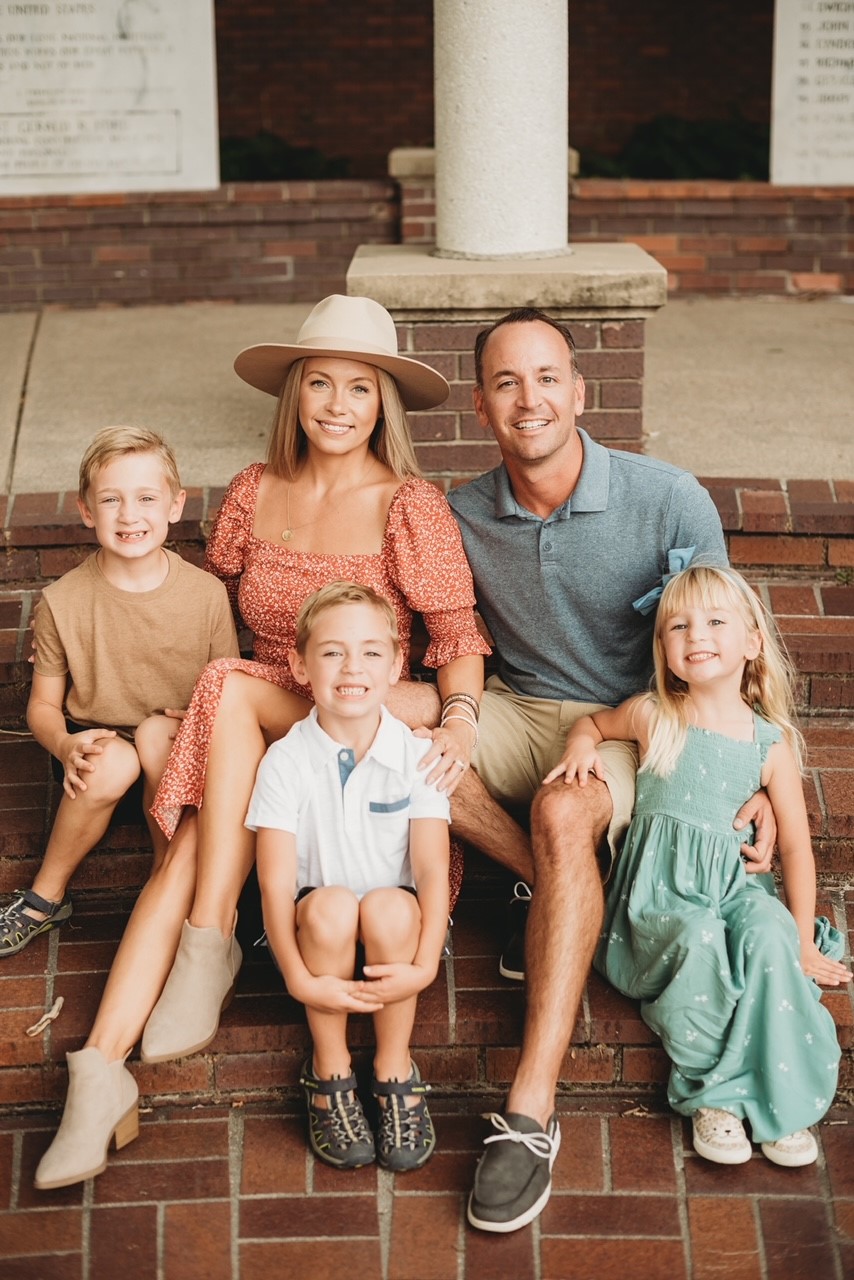 Before he leaves his house in the morning, the new president of the Lincoln Community Foundation drinks an entire pot of coffee – then pours a couple more cups when he arrives at work.
Before he leaves his house in the morning, the new president of the Lincoln Community Foundation drinks an entire pot of coffee – then pours a couple more cups when he arrives at work.
“That may be where my energy comes from,” laughed Alec, who officially became the new president and chief executive officer on the cusp of 2022. “Or perhaps it’s because I go to bed pretty early. Or because one of my major Gallup strengths is ‘achiever’.”
Something must be working.
Four months into the job, and Alec Gorynski (pronounced GOR-EN-SKI) is feeling inspired and optimistic. “I’ve said that my whole job right now is meeting people, listening, and learning – and that’s what I’ve been doing. And wow, what a welcoming and warm reception to this community,” said Alec. “In many ways this part of the job will never stop. Building relationships will always be fundamental to my role. But the conversations will evolve over time.” Meanwhile, Alec and his wife, Laura, and their three children – Jamie (8), Ben (6), and Claire (4) – officially moved from Omaha to Lincoln this spring.
“There was a day when my wife dropped off kids at school, painted our daughter’s bedroom, and then wrote a grant,” Alec mused. “I was in awe of her.”
“So, yes, it has been chaotic. But it honestly feels like we’re coming home. Lincoln is the city where I was born and raised. It’s kind of fun to drive around and see things that are familiar to me, see things from when I was a kid,” Alec said. “We grew up in Eastridge neighborhood and spent a lot of time at the St. Teresa parish, volunteering, doing service.” In fact, Alec believes many of the fundamental values that he brings to LCF originated in those early years. “It is how I developed my sense of the world, how I developed the values that continue to guide me professionally and personally,” he reflected. “A belief in equity and equality, opportunity and hope, trust, transparency, and accountability. These are the values that guide how I live, how Laura and I raise our children.”
Earnest and conscientious, Alec possesses a seemingly endless supply of energy and a bedrock sense of the values that guide his life. “I have always been focused on civic and civil service,” he said. “In my undergraduate years, I wanted to be a police officer. In fact, I have a degree in criminal justice.”
Most recently he worked in Omaha serving as vice president of community development and corporate philanthropy for First National Bank of Omaha.
Why change?
“Somewhere along the line, your heart steps in. This job just felt right.” Alec believes Lincoln is quite unique in how it has approached the concept of public good. “Everyone here – the business community, civic institutions, the universities, philanthropic organizations – they all come together collaboratively in what’s best for the community. They ask questions in a unified voice: Where are our needs? What does the data tell us? How does that inspire change?”
He also believes Lincoln Community Foundation is unique in the way it maximizes the power of every donor. “The Foundation here serves and meets a donor where they are, no matter how much they have to give. That doesn’t happen everywhere,” Alec emphasized. What’s important now, he said, is to step up as a steward of the community, listening and learning.
So, what has he learned so far? “I am seeing three dominant themes emerge,” Alec said.
ONE
“What I hear, more than ever, is the strong and favorable reputation of the Lincoln Community Foundation. There is a fondness for the organization, an appreciation for who they are. Everyone I meet – board members, donors, strong and capable staff – is doing everything possible to set me up for success. They are in my corner. I believe everyone wants the Foundation to win, because then the entire community wins.”
TWO
“Second, and just as important as the first, folks love the people of the Lincoln Community Foundation. There is such respect and appreciation for everything they do and the stewardship they provide.”
THREE
“There is an incredibly solid base of community giving in Lincoln, and our work is to maintain that momentum while also looking ahead to the next generation. I believe we need to consider how we grow the practice of philanthropy in our community and think more broadly.” Alec is up for the challenge, and his professional and educational experience to date have prepared him for this role. With an undergraduate degree from Peru State College and a master’s degree in public administration from the University of Nebraska at Omaha, Alec has 15 years of experience in community development, working across the private, nonprofit, and government sectors.
“I believe the Foundation is well positioned to navigate into the future. Our work ahead is to build a Foundation for long-term growth and impact,” Alec said. “We will define and develop our playbook going forward. And we will work together to develop a strategic plan for the next five years, growing our ability to serve our donors and expanding our role as a community leader and convener.”
First, Give to Lincoln Day lies ahead. So do more community conversations. And probably a lot more coffee.
LCF Open Door Grants: Shedding Some Light on South Salt Creek
Published on May 11, 2022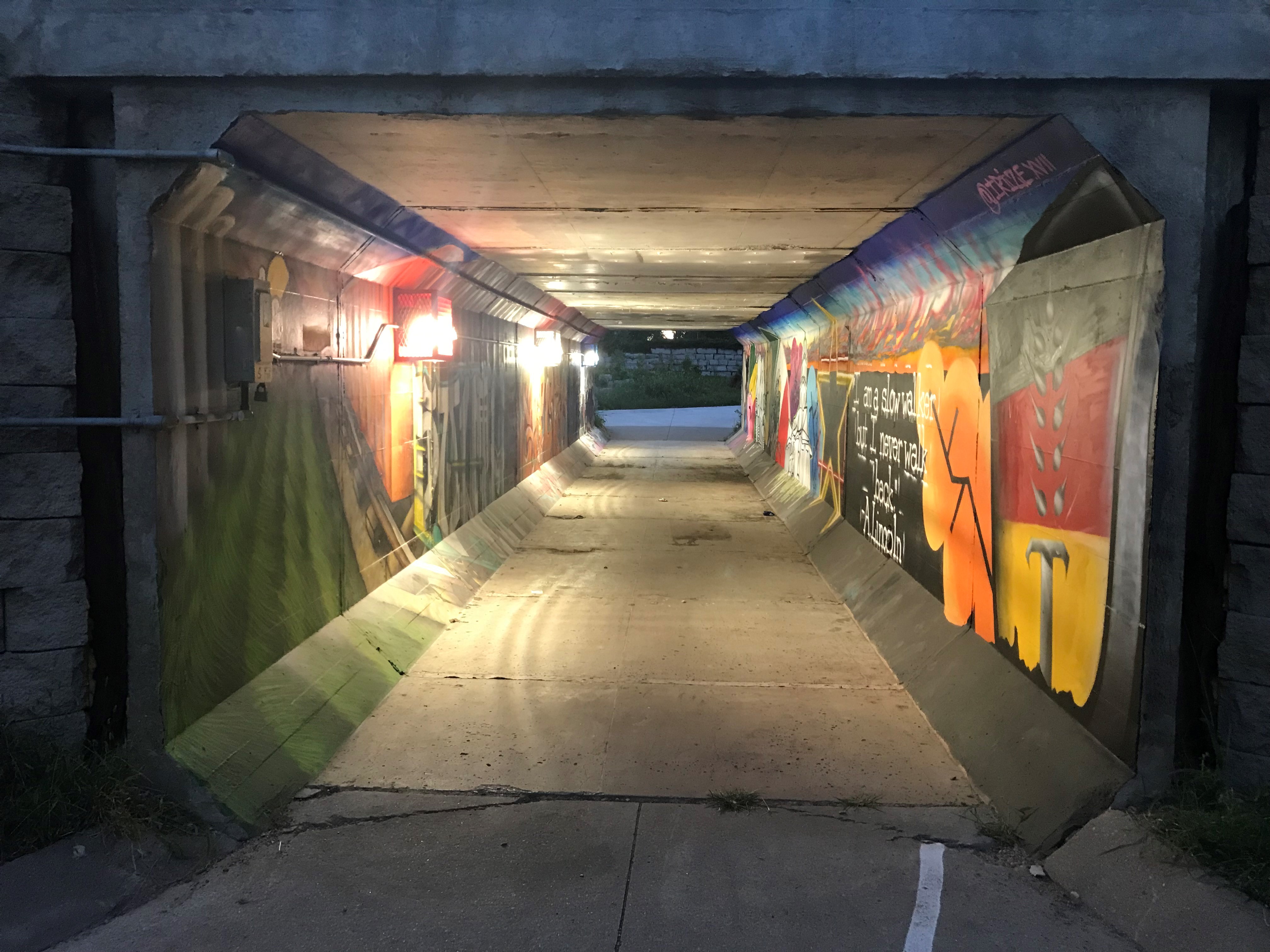
LCF’s Open Door Grants support efforts by nonprofits in Lincoln and Lancaster County to meet current needs or address challenges and opportunities facing our community. These grants provide flexible and critical funding to nonprofit operations, programs, and capital projects. One such capital project making our community healthier and safer is in the South Salt Creek neighborhood.
Partnership for a Healthy Lincoln (PHL) is a non-profit organization dedicated to improving the health, wellness, and fitness of communities, thousands of people at a time.
PHL recently received an Open Door Grant to support their Streets Alive! campaign. PHL identified a Streets Alive! project in the South Salt Creek neighborhood to improve the condition of the railroad tunnel on 3rd and F Street. BNSF Railroad owns the tunnel, one of only three safe pedestrian passageways across the railroad tracks in the neighborhood.
The maintenance of the tunnel had been severely neglected over the years, with overgrown landscaping, leaking walls, and poor lighting. When the tunnel became an unsafe option for residents, the Salt Creek Neighborhood collaborated with others to improve the passageway.
After the City improved the retaining wall as part of another project, BNSF repaired the tunnel walls and ceiling. Local artist Micah Mullins was then selected to create a new vibrant mural in the tunnel, reflecting the history and culture of the neighborhood through colorful graffiti. LCF awarded an Open Door Grant to PHL to help fund the project.
“The Open Door Grant we received almost perfectly matched the cost of upgrading the lighting in the tunnel,” said Veronica Cockerill, PHL program coordinator.
Veronica hopes projects like this will shed some light, not only on South Salt Creek but on what people can do to improve their own neighborhoods. She feels projects like this can generate positive attention and have a snowball effect.
“This neighborhood doesn’t get much economic development or positive attention,” said Veronica. “We hope this project inspires other potential funders and partners to see what was done and think about what they can accomplish in other parts of the city.”
For more information on Open Door Grants, visit LCF.org/helping-nonprofits/open-door-grants.
Inherited IRAs: Big headache, or big opportunity?
Published on Sep 6, 2022
Don’t be surprised if your clients are walking into your office in a state of bewilderment over something they’ve read recently about the IRS’s distribution rules for inherited IRAs.
What’s the back story?
Until the law changed a few years ago, a client who was named as the beneficiary of a parent’s IRA, for example, could count on a relatively straightforward and tax-savvy method of withdrawals called the “stretch IRA.” With the passage of the SECURE Act, that changed for many clients who inherited an IRA after December 31, 2019. Instead of taking distributions over their lifetimes, affected clients would need to withdraw the entire inherited IRA account within a 10-year period as calculated under the law.
What’s the problem now?
Too bad about the loss of the stretch IRA, but we’ve all had time to adjust to the new IRS rules, right? Wrong. Unfortunately, the IRS rules are, at the moment, clear as mud. Concern escalated when the IRS issued proposed (but not yet final) regulations earlier this year. Advisors and clients are facing an acute discrepancy between what had been understood by practitioners immediately after the SECURE Act was passed, on one hand, and what the IRS has included in the proposed regulations, on the other hand.
Specifically, some non-spouse beneficiaries of an inherited IRA may not be able to wait until the 10-year post-inheritance mark to fully withdraw the funds in a lump sum, but instead, according to the proposed regulations, must begin taking annual distributions immediately following the inheritance and throughout the statutory 10-year period during which all funds must be withdrawn. This is a hard pill to swallow for clients who were counting on years of additional tax-free growth and who had hoped to defer an income tax hit until a lower-income year.
The situation is complicated but worth understanding (we like this very clear article) because of the potential headaches the proposed regulation could cause for your clients who are caught in the gray area.
A charitable giving opportunity?
The current state of confusion could present a golden opportunity to serve your philanthropic clients.
First, anytime you are talking about IRAs, inherited or not, you’ll want to make sure your client knows about Qualified Charitable Distributions (QCDs). As tax enthusiasts, we may feel we talk about QCDs all the time. Hearing the message multiple times, though, is crucial in order for clients–who are likely not tax experts–to truly appreciate the benefits of the QCD.
As a reminder, through QCDs, a client who is 70½ or older can use a traditional IRA to distribute up to $100,000 ($200,000 for a couple) per year, which happily counts toward satisfying Required Minimum Distributions, to a qualified charity, including certain types of funds at the Lincoln Community Foundation. The distribution is not reported by the client as taxable income because it goes straight to charity.
Second, for your clients owning inherited IRAs who are caught in the confusion of SECURE Act proposed regulations, a QCD could come in very handy. The IRS does permit taxpayers to make QCDs from inherited IRAs, not just their own IRAs. This option could be a welcome relief to clients who are facing the more stringent proposed IRS regulations governing the payout requirements for inherited IRAs.
Please contact us if you have questions about how your clients can use their IRAs to support their favorite charitable causes. We’d be glad to help.
Highly-appreciated stock: If your client missed the ideal window, it’s still not too late to support charity
Published on Sep 6, 2022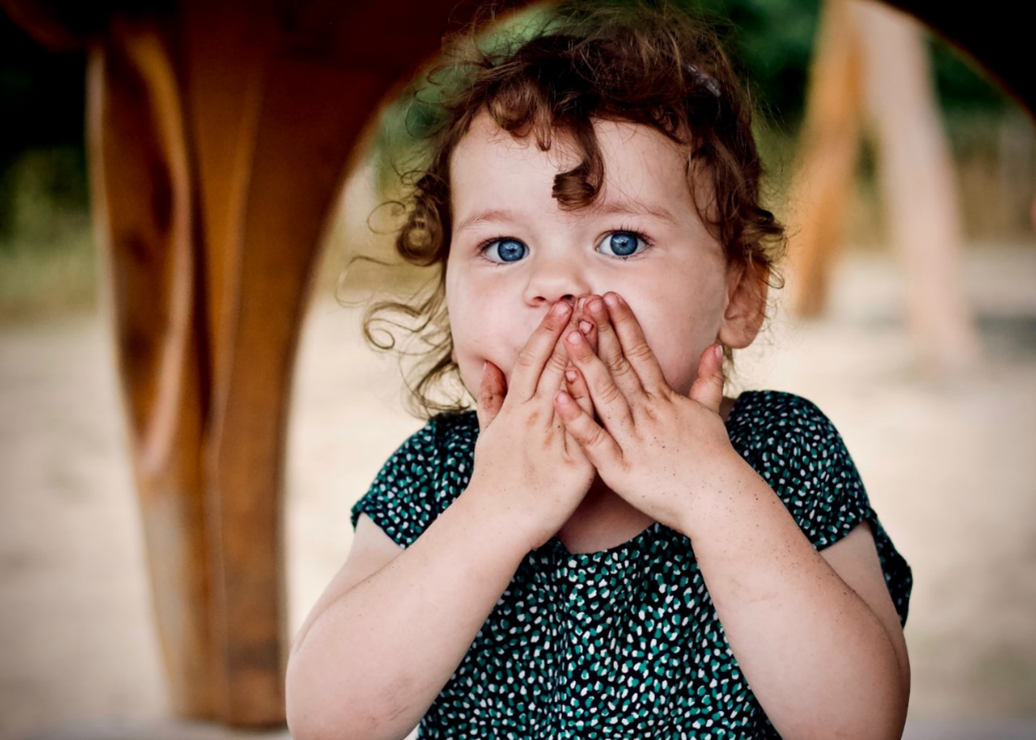
During a routine check-in meeting, your client casually mentions that the client’s employer, a local company, was just acquired. The client and dozens of fellow employee shareholders are now flush with cash. “I’d like to use some of the money to give to charity,” the client tells you. “Let’s talk about a family fund at the Lincoln Community Foundation.”
You try not to flinch as you mentally calculate the capital gains taxes your client could have avoided if the client had given some of those shares to a fund at the Foundation years ago when the company was clearly growing fast, making it a natural target for acquisition or IPO, but well before an exit was in the works.
All is not lost. You can still help the client establish a donor advised, field-of-interest, unrestricted, or other type of fund at the Lincoln Community Foundation to fulfill the client’s charitable intentions. Your client’s gifts to the fund qualify for a charitable tax deduction in the current tax year, helping to offset the income from the sale of the shares.
Still, this situation is all too common and a good reason to regularly remind clients about their options for making gifts to charity and the tax benefits of each.
Giving cash to a public charity, which is what your client in this situation will be doing (!), is always a viable option. The general rule is that your client can deduct cash gifts to up to 60% of their adjusted gross income (AGI) in any given year. While this may not completely offset large gains from the sale of the stock, it will help to reduce the client’s taxable income.
Giving appreciated stock, which is what you wish your client had done, is a very tax-effective method of supporting public charities. Clients who donate stock outright avoid all capital gains tax that would be levied on a sale of the stock if it were sold prior to making the donation. Even with the 30 percent of AGI limitation imposed on gifts of highly-appreciated, long-term capital gains property to a public charity, your client likely will still come out ahead because the client’s AGI is presumably a lot lower than it will be in the year of a future stock sale.
11th Annual Give To Lincoln Day Breaks Records
Published on May 27, 2022
The 11th annual Give to Lincoln Day on May 26th raised a record-breaking $8,010,304, $80,000 over the previous record set last year. The funds are designated to help support 479 local nonprofits that serve Lincoln and Lancaster County. All participating nonprofits will receive a proportional share of a $500,000 match fund based upon the organization’s percentage of the total dollars raised, thanks to many generous sponsors including Presenting Sponsor, West Gate Bank.
“This year’s Give to Lincoln Day was an awesome expression and celebration of generosity for this community,” said Alec Gorynski, LCF president. “To surpass last year’s record-breaking event is tremendous and we could not be more grateful for everyone who came together to make this such a special day!”
Nearly 28,000 donations were received for the 11th annual Give to Lincoln Day. The event has raised nearly $50 million for local nonprofits in its 11-year history.
“Our local nonprofits enhance our lives and lift our spirts,” said Gorynski. “Today’s results are a collective ‘thank you’ for the incredible work that they do.”
For more information and to see gifts received for each nonprofit, visit www.GiveToLincoln.com.
Match Sponsors include: West Gate Bank (Presenting Sponsor), ABC Electric, Assurity Life Insurance Company, Bill and Marilyn Cintani, Cornhusker Bank, Davis Design, The family of Alfred A. Duteau, Bob and Jan FitzSimmons, HBE Becker Meyer Love LLP, KidGlov, Mail Management Services, Inc., William J. Mueller & Kim M. Robak, Olsson, Pepsi Cola of Lincoln, Pinnacle Bank, Runza National, Joe W. and Ruth K. Seacrest Fund, Tom and Lisa Smith, Talent Plus Inc., Mark H. Tallman, Bill and Mae Whitmer Family Fund and WRK Family Foundation.
Planning for retirement and giving to charity: Intertwined solutions in economically puzzling times
Published on Jun 3, 2022
Retirement planning no doubt is an important discussion topic during client meetings every year. In recent months, though, you may have observed an uptick in clients’ questions about their plans for retirement, perhaps related to:
–Required minimum distributions (“RMDs”) from qualified retirement plans, including questions prompted by media coverage of pending legislation known as SECURE 2.0;
–Stability of retirement investments, a topic that is widely covered in mainstream financial news; and
–Rising interest rates and what that means for retirement, which is also a frequent topic in the media, along with inflation’s impact on retirees.
Against this backdrop, the issues become particularly complex for philanthropic clients. Here are answers to questions you may be asking:
What’s going on with updates to the charitable giving components proposed in the SECURE 2.0 Act?
Right now, SECURE 2.0 includes a provision that would index the $100,000 Qualified Charitable Distribution (“QCD”) allowance for inflation and also expand the technique to allow for a one-time transfer of $50,000 to a charitable remainder trust or other split-interest vehicle. But those enhancements are not the law, yet. Overall, the legislation appears to stand a good chance of becoming law. Still, a lot can happen as the House and Senate reconcile their respective bills before the legislation heads to President Biden for signature.
So what should I be telling my clients about the potential changes to the Qualified Charitable Distribution rules? Or should I say nothing?
For clients who are seriously considering a QCD, it may be worth mentioning these potential enhancements. But in general, it’s usually more confusing than helpful to bring up pending legislation, no matter how exciting. Instead, consider placing your focus on the QCD rules as they currently stand. The QCD already is a strong planning tool.
When should I reach out to LCF for help with QCDs?
The answer is, anytime! Lincoln Community Foundation can help establish a qualifying fund to receive your client’s Qualified Charitable Distribution, regardless of whether the SECURE 2.0 enhancements become law. The recipient fund can’t be a donor-advised fund, but there are other very effective options.
With interest rates rising, are there particular techniques that I should be discussing with my clients who are planning for retirement and are charitably inclined?
Yes. Now is a good time to consider talking with these clients about charitable gift annuities. A charitable gift annuity, like any other annuity, is a contract. Your client agrees to make an irrevocable transfer of cash or assets to a charitable organization. In return, the charitable organization agrees to pay the client (or the client’s designated beneficiary) a fixed payment for life. Your client is eligible for an immediate income tax deduction for the present value of the future amount passing to charity.
What if my client needs the tax deduction this year but won’t be retiring for several years?
Charitable gift annuities offer flexibility, in that your client may choose to structure the contract as a “deferred gift annuity,” meaning that the client starts receiving payments at a future date (or upon a future event such as retirement), rather than immediately while the client's effective income tax rate may still be high. In this way, the charitable gift annuity can be a tax-savvy component of an overall retirement plan.
How do rising interest rates factor in?
Client discussions about charitable gift annuities are especially timely because the American Council on Gift Annuities recently voted to increase the “rate of return assumption” used as guidelines for maximum payout rates. Effective on July 1, 2022, the return assumption will increase from 3.75% to 4.5%. This means that the Council’s suggested payout rates will be going up. That’s good news for a client’s income stream.
What’s the bottom line on this?
The net-net here is that rising interest rates make the charitable gift annuity an even more attractive tool for clients who want to combine charitable planning with retirement planning. The development team at LCF can help you evaluate this option to determine if it is a good fit for your client.
Bunching, long-term appreciated assets, and the fruits of helping younger clients plan their charitable giving
Published on Jul 5, 2022
Developing a thorough estate plan isn’t important only for Baby Boomers and Gen Xers. Millennials, who now make up nearly a quarter of the population in the United States, may prove to be more enthusiastic planners than their parents and grandparents, according to the 2022 Estate Planning Study: Millennial Estate Planning Continues in a Pandemic.
What does this mean for planning gifts to charity?
Your millennial clients may be interested in setting up charitable gift vehicles earlier in their lives than some of your older clients. And because millennials tend to be better savers than their elders, it’s never too soon to discuss philanthropic intentions with your younger clients.
What’s an example of a giving technique that is well-suited for millennials?
As they build careers, switch jobs, and start businesses, millennials’ incomes may ebb and flow from year to year. This makes “bunching,” or “bundling,” through a donor advised fund (DAF) at the Lincoln Community Foundation very useful. Because contributions to DAFs are eligible for an immediate tax deduction--but are not required to be granted from the fund to charities right away--your client can “front load” donations into a DAF at a level that takes advantage of itemizing deductions during a high-income year, and then contribute less to the DAF in lower income years. Each year, your client can recommend grants from their DAF to favorite charities, including taking advantage of Give to Lincoln Day, according to the timeframe that aligns with your client’s goals for supporting those organizations, regardless of the client’s income in that particular year.
Does bunching work with long-term appreciated assets?
Yes! Although it may seem obvious to professionals in the financial world, it’s not always top of mind for your clients to remember to donate long-term appreciated assets to their DAF. This is especially true of millennial clients who only now might be reaching a point in their lives when they own stock or other assets that have gone up in value. Donating an appreciated asset is tax efficient because the asset given to a DAF or other public charity typically is deductible at the asset’s fair market value. The charity, in turn, pays no capital gains tax on its sale of the asset, thereby generating more dollars to support charitable causes than your client would have had if the client had sold the asset and given the proceeds to charity.
Does it work to give real estate?
Yes! Real estate is an excellent long-term asset to donate to a DAF at the Lincoln Community Foundation, especially now. In late 2021, buying a second home appeared to be a strengthening trend. While higher interest rates and inflation might dampen that trend in the short-term, the ability to work from anywhere is a reality that’s unlikely to disappear. This means even your younger clients, not just retirees, may be buying and selling second homes and even rental properties. These clients could be good candidates to donate real estate to a DAF. As with gifts of other long-term appreciated assets, a client’s gift of real estate to a DAF at the Lincoln Community Foundation avoids capital gains taxes and generates more money for charitable causes than selling the property first and donating the proceeds.
Any fun facts here?
Millennials’ end-of-life planning preferences have departed from the previous generations’ traditions, according to the study, right down to the most popular songs played or performed at a memorial service. Sought after titles now include Beyonce’s “I Was Here” in addition to Frank Sinatra’s “My Way.”
It’s not too early for spring cleaning: Make 2023 the year to help clients get organized
Published on Feb 9, 2023
If you’re already dreading asking your clients to pull together their receipts and other documents for 2022 tax filings, this may be a good time to take proactive steps to avoid these conversations next year.
When it comes to charitable giving, your clients may find that organizing their giving through one or more funds at LCF will make their lives easier. Establishing a fund at Lincoln Community Foundation is an easy way to organize and track charitable giving. A client can take advantage of this feature by making a single, tax-deductible contribution each year to LCF, to be added to their donor-advised, field of interest, or other type of fund.
An especially tax-savvy technique is for the client to make this contribution using highly-appreciated stock. After the stock has been transferred to LCF, the proceeds from the foundation’s sale of the stock–free from capital gains tax–are then used for distributions to support your client’s favorite charities. No matter how many different charities receive support from the fund, the client still has just one receipt to keep track of charitable donations for income tax deduction purposes.
The subject of gathering up tax receipts for charitable donations is often a prompt for clients to get organized with the rest of their financial lives, too. At the very least, the subject of charitable giving can pave the way for a discussion about the basics of estate planning. Many clients are simply not aware of the meaning and importance of critical elements, such as:
--The difference between a will and a living trust and how charitable wishes fit in to these documents
--Why it’s critical to be intentional about how each and every asset is titled so that the assets actually pass as intended (which requires making a comprehensive list of assets in the first place)
--The dangers of hurriedly filling out life insurance and retirement plan beneficiary designations and why these documents are absolutely critical components of a financial, estate, and charitable plan
--Reasons for having both a “living will” and a durable power of attorney, both of which (or the lack thereof) have a major impact in the event of incapacity
--A reminder to make sure someone in the family knows where to find a list of logins and passwords
Charitable planning is one of many steps in your work with clients, but it can be an excellent catalyst for helping clients understand why they need that comprehensive estate and financial plan you’ve been encouraging them to complete. All of us at LCF are happy to help with the charitable components of your service to clients. We look forward to making it easier for you to address all of your clients’ needs.
Back to basics: Reminding clients about wills, trusts, and charitable bequests
Published on Aug 3, 2022
August is national Make a Will Month, and the publicity surrounding this designation may prompt your clients to ask you about establishing or updating their will.
Despite the many cautionary tales arising out of the Covid-19 pandemic, most Americans do not have a will. Even those clients who do have estate plans in place may not truly understand the difference between a will and a trust (and the reason they still need a will even if they have a revocable living trust). A client also may not understand that a charitable bequest can be part of an estate plan whether the client’s main estate planning vehicle is a will or whether it is a trust.
Of the $485 billion given to charity by Americans in 2021, according to Giving USA, 9.5% of that giving came from bequests–that’s $46 billion. Giving USA’s data visualization tool illustrates the ebbs and flows of bequest giving, which has long been a significant component of philanthropy.
Research reveals fascinating psychological factors behind a person’s decision to leave a bequest in the first place, which helps to understand the motivation for leaving a gift to a charitable organization in a will or trust. Not surprisingly, altruism has long been one of those factors. Bequests to charity are not a new idea. Examples of high profile estate gifts date back centuries. Some of your clients may be familiar with the bequests of Benjamin Franklin, who established testamentary charitable trusts dedicated to supporting Boston and Philadelphia tradesmen, and George Washington, who left bequests in his will to colleges and trade schools.
Our team welcomes the opportunity to work with your clients to establish bequests to your clients’ funds at LCF through a will or trust or through a beneficiary designation on a qualified retirement plan or life insurance policy, including providing you with proper bequest language to ensure alignment with your client’s intentions. Make a Will Month is also a good time to remind your clients that bequests of qualified retirement plans can be extremely tax efficient. Funds flowing directly to a client’s fund at the Lincoln Community Foundation from a retirement plan after the client’s death will not be subject to income tax or estate tax.
We look forward to working with you to establish your clients’ philanthropic legacies.
Hidden no more: Designated funds and field-of-interest funds
Published on Mar 7, 2023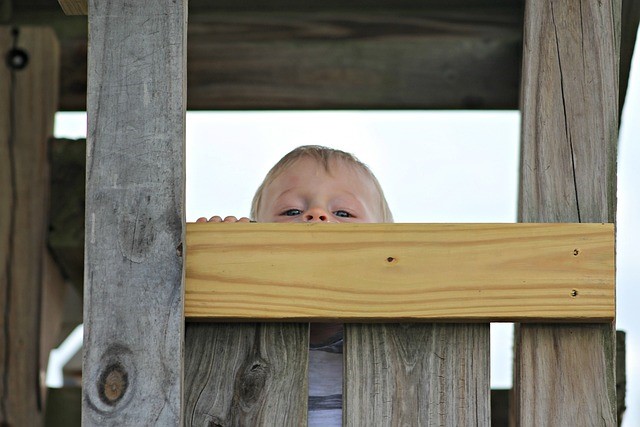
Most attorneys, accountants, and financial advisors are well-aware of donor advised funds and the reasons behind their popularity. Especially when a donor advised fund is established at LCF, this vehicle is an excellent way for your clients to organize their charitable giving and get even more connected to the causes they care about.
Enter the Qualified Charitable Distribution
Your clients can give nearly any type of asset to a donor advised fund at the Lincoln Community Foundation. A notable exception, though, is the Qualified Charitable Distribution (QCD). A QCD allows a taxpayer 70 ½ or older to make a direct transfer of up to $100,000 annually from an IRA to a qualifying charity. A donor advised fund is not considered to be a qualifying charity.
Although donor advised funds cannot accept QCDs, LCF offers other types of funds that can accept QCDs. For example, designated funds and field-of-interest funds held at LCF are ideal recipients of QCD transfers. These fund types are often overlooked, despite the high value they can deliver to your client and to the community.
What is a field-of-interest fund?
The Council on Foundations defines a “field of interest fund” as, “A fund held by a community foundation that is used for a specific charitable purpose such as education or health research.” Perhaps your client is passionate about rare-disease solutions, feeding the food insecure or preserving works of art, for example. Your client selects the name of the fund (family, cause-related or even nondescript) and then, the knowledgeable team at LCF distributes grants from the field-of-interest fund in a way that is aligned with your client’s values and charitable wishes outlined in the fund documentation.
What is a designated fund?
Designated funds are defined as, “A type of restricted fund in which the fund beneficiaries are specified by the grantors.” These are a good choice for a client who knows they want to support a particular charity or charities for multiple years. The client names the fund and LCF fulfills the distributions. Made over time, these funds can help the charity’s or charities’ cash flow planning. Distributions are aligned with your client’s wishes set forth in the original fund document.
QCD reminders
For the client aged 70 ½ through 72, a QCD removes funds from an IRA before the client reaches the age-73 threshold for Required Minimum Distributions (RMDs). This can lessen the eventual income tax hit that accompanies RMDs. And for RMD-applicable clients, the QCD counts toward their RMD. In both cases, the QCD transfers do not fall into the client’s taxable income.
QCDs are even more popular now that the $100,000 cap will be indexed for inflation under the new laws. Also, under the new laws, a one-time, $50,000 distribution to a charitable remainder trust or charitable gift annuity is now permitted.
Lincoln Community Foundation Grants $1.5 Million
Published on Nov 11, 2021Thanks to the foresight of past generous donors, Lincoln Community Foundation made grants in November of $1.5 million for 195 nonprofit organizations, 116 of which were local. These grants came from designated funds created by donors to support their favorite nonprofits and houses of worship. These endowed funds provide annual financial support to the organizations specified by the donors, helping the community and the nonprofits grow and thrive forever.
Established in 1955, the Lincoln Community Foundation strives to continually enrich the Lincoln community by promoting and achieving perpetual philanthropic support. The foundation currently manages more than $190 million in assets and has distributed more than $189 million in grants to nonprofit organizations that have improved the lives of thousands of residents.
In case you missed it: Three tax tips worth smiling about
Published on Feb 9, 2023
Energy incentive extends to nonprofit organizations
Nonprofits and other exempt entities are often omitted from discussions when new tax incentives are proposed in Congress, primarily (and logically) because these organizations don’t pay tax. Fortunately, nonprofits are not left out of a recently enhanced tax provision known as the 179D deduction, intended to encourage incorporating energy efficiency measures into new or renovated buildings. While a nonprofit itself can’t use the deduction because it does not pay taxes, this incentive is still valuable because the nonprofit can transfer the deduction to the architect or engineer on the project who then uses the deduction.
The takeaway here? If you represent nonprofit executives or board members at organizations that have undertaken capital projects (universities, for example), you’ll want to be aware of this potential benefit, in addition to generally keeping up on sometimes tricky tax rules related to exempt entities.
This again? More crypto crack down
The ups and downs (and downs) of cryptocurrency continue! If your clients are involved in the cryptocurrency market, and especially if they are contemplating giving these assets to support charitable endeavors, be aware that the IRS continues to formalize its guidance and requirements for a qualified appraisal. Recently, the IRS confirmed that an appraisal is required to claim a deduction of $5,000 or above for a gift of cryptocurrency.
A must-know: Reviewing the QCD
You’ll recall the buzz at the end of 2022 when Congress passed sweeping omnibus legislation that included a version of the long-awaited Legacy IRA provisions that expand a tool called the Qualified Charitable Distribution, or QCD. A QCD is a financially-savvy way for your clients to support the charities they care about.
As a reminder, if your client has reached the age of 70 ½, the client may be eligible to make annual distributions of up to $100,000 from IRAs directly to an unrestricted or field-of-interest fund at the community foundation or other qualifying public charity. QCD transfers count toward satisfying clients’ Required Minimum Distributions and therefore avoid the income tax on those funds. Plus, distributed assets are no longer part of a client’s estate at death, which avoids estate taxes, too. The new law expands the QCD rules to allow for a one-time, $50,000 QCD to a split-interest vehicle, such as a charitable gift annuity or charitable remainder trust, as well as indexing the QCD cap for inflation in future years.
Punchlist: What the IRS may be up to in 2023
Advisors of philanthropic clients are keeping an eye on the IRS’s list of priorities for the fiscal year, which includes a focus on several sections of the Internal Revenue Code that impact charitable giving. The team at LCF is also watching closely, and, as always, we’ll keep you posted as issues bubble up that may lead to potential charitable giving-related legislation.
Mission Investing for Local Community Benefit
Published on Jan 4, 2024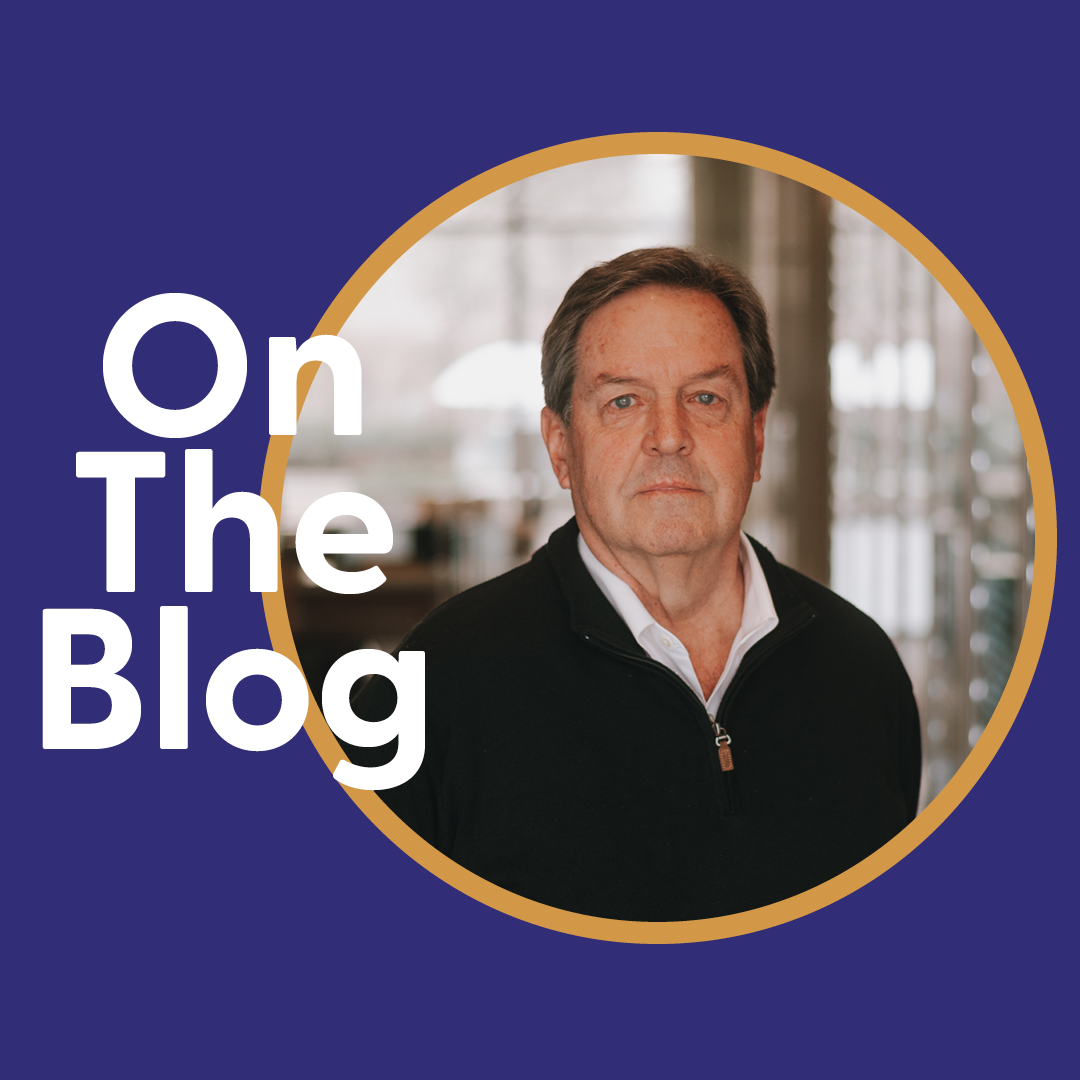
By Scott Lawson
In our pursuit to be solution-oriented when facing community challenges, it’s important that we use every tool at our disposal. We have found many ways to use our assets at the Foundation to contribute to our community – the most recognizable being our endowed funds.
At LCF, we have more than 460 endowed funds that provide meaningful grant funding to support nonprofit programs and operations impacting all corners of our community. Endowments are invested in equity and bond markets, which have historically grown these funds and as a result, increased grants awarded.
Mission Investing is a practice where a portion of the endowment is invested locally, as opposed to being invested strictly in the financial markets. As a result, a mission investment generates a local social and economic impact while producing a return on its principal investment.
Mission investments provide organizations with the capital to advance projects and programs that help our community thrive. For example, mission investments through LCF have supported the creation of affordable housing, helped entrepreneurs start and grow their businesses while simultaneously providing jobs, and developed real estate in emerging neighborhoods.
These investments are structured as loans, loan guarantees, or equity interest which results in a return of principal and interest. Financial return is not the primary purpose, so a lower interest rate can be offered. Mission investments are also complementary to financing being provided by traditional sources, such as banks.
LCF’s Mission Investment Committee oversees our mission investing activities. The committee reviews and approves all proposed mission investments based on the projected social impact and financial viability of the organization and monitors the mission investment portfolio. LCF seeks mission investment opportunities that lift up historically marginalized communities where traditional financing may not be available.
The committee recently approved an increase to the volume of our mission investments as well as a mechanism for donors to co-invest alongside LCF’s endowment. We pool investments from participating donor advised funds and our endowment, and these funds are then awarded to the organization for the intended use. With this new guidance, LCF – along with three donor advised funds – co-invested in a venture capital fund supporting start-up businesses that are creating jobs in our community.
LCF recently hosted an educational forum on Mission Investments. The event featured a keynote presentation from Lisa Richter with Avivar Capital, a leading expert on mission investing, and a panel of local organizations that have used a mission investment from LCF for a community project. The goal of the event was to catalyze mission investing by both LCF donors and peer foundations.
Through the practice of mission investing, LCF seeks to create a healthier and more sustainable community. For more information on mission investing, click here.
The Best Investment a Community Can Make
Published on Mar 15, 2023
by Marilyn Moore
I remember a conversation several years ago when I was asked by a community leader what change we could make in public education that would have the biggest impact on student success. My answer then, and my answer today, is to invest in quality childcare and preschool for every child from birth to five in the community.
The person asking the question seemed surprised, because most people don’t think about children as “school children” until they start kindergarten at age five or six. And that’s true, in Nebraska and throughout the United States.
While there are a few groups of young children for whom public schools have both responsibility and funding, it’s very few, generally including those children with moderate to severe disabilities and those children with other factors that may impede their success in school when they enter kindergarten, factors like extreme poverty, low birth weight, and living in a home where English is not spoken. Even for those children, the school program may not be all-day, and it certainly isn’t all year.
But the fact of the matter is, all children, from birth on, need daily, consistent, high quality, childcare. In some homes, that’s provided by a stay-at-home parent. But that’s not the case in most homes; in Lincoln, about 77% of children under the age of five live in a home where all parents are in the workforce so childcare is a must. And that became even more evident during the past three years of the pandemic, when public schools closed and childcare providers struggled to stay open, and many parents were trying to work from home while also caring for their children.
Some in the community see childcare as a necessity for employment; I agree, it is. But first and foremost, I see quality childcare and preschool as essential for the children themselves.
During those first five years, children grow in every possible way…physically, cognitively, socially, emotionally. Their bodies grow, their brains grow, the neural pathways in their brains practically explode with new connections. They learn to talk, they learn to respond, they learn to love, they learn to assert themselves, they learn to get along with others.
It’s a time of growth unlike any other they will experience. And it happens in a space that encourages them to play, to move, to explore, to draw and paint and create, to listen to stories and make up their own stories, and to talk with adults. It doesn’t happen in front of screens.
Because most parents in Lincoln are working, quality childcare is an essential, for the family’s livelihood, and for the child’s development. Quality childcare is expensive; in fact, childcare for an infant can be more expensive than a year in public college. And it’s solely up to parents to figure out how to manage it.
There are many quality childcare providers in Lincoln; but the community’s need for childcare exceeds what the current marketplace can offer. There are waiting lists for many of those providers. And there’s not much support for parents to navigate the major issues of finding a childcare provider that works for them and figuring out how to pay for it. It’s not like kindergarten, where every neighborhood has an elementary school, and a guarantee that every child who lives in that attendance area will have a place in the classroom.
So, a critical need, and not much support for parents in filling that need. Except, of course, in Lincoln, where we have Lincoln Littles, an organization whose mission includes just that, helping parents with information about available childcare, close to home, or close to work, or convenient in some other way.
And as for cost, Lincoln Littles administers a tuition assistance fund that provides support to families struggling with the cost of college for an infant. These funds for working families are either granted or donated, donated by organizations and members of this community, those who recognize that supporting young children and their parents as they are just getting started as a family is the best investment a community can make. I support Lincoln Littles, and I hope you will, too.
Big gifts, bullish portfolios, and kids who move away
Published on Jan 8, 2024
If you’re not talking about charitable giving with your high net-worth clients, 2024 is the year to start doing it! Recent studies show that 85.1% of affluent households give to charity. Certainly many of your clients are among them.
Take a few minutes this month to scan your client list for three common scenarios and related opportunities for charitable giving solutions.
- Clients who made significant charitable gifts at year-end.
- Clients whose stock portfolios have rallied.
- Clients whose children have moved away.
Clients who made significant charitable gifts at year-end.
You’re probably aware of at least a few clients who increased their charitable giving at the end of 2023. Perhaps you worked with a client to establish a donor advised or other type of charitable fund at LCF, or maybe you helped a client structure a Qualified Charitable Distribution to a field-of-interest or designated fund at Lincoln Community Foundation. Now that the dust has settled on year-end planning activities, go back to these clients to find out more about their overall philanthropic plans. You may discover that a client would like to work with you to update their estate plan to include a bequest to their fund at LCF, set up a charitable remainder trust with highly-appreciated stock, or proactively plan their charitable gifts for 2024 to get a jump on tax strategies.
Clients whose stock portfolios have rallied.
2023 brought good news and record highs for the stock market As always (and perhaps especially now!), giving appreciated, publicly-traded stock to charitable organizations is a highly effective tax strategy. This is because capital gains tax is avoided when your client transfers long-term, marketable securities to a fund at Lincoln Community Foundation or other public charity. The client is typically eligible for an income tax deduction at the fair market value of the securities, and when the charity sells the securities, the charity does not pay capital gains tax. This is a win-win for your client and the charity. Scan your client list for clients who are holding long-term stock positions that have appreciated substantially since they bought them, especially with the market’s latest rally.
Clients whose children have moved away.
Children of affluent parents tend to move away. This means many of your clients may be seeking ways to stay in close communication with their children. Remember that while Lincoln Community Foundation can help your clients maximize the impact and tax benefits of their local giving, LCF’s tools are also very geographically flexible. This means, for example, that your clients can use their donor advised fund to support 501(c)(3) organizations across the country, including in communities where their grown children are living. When you demonstrate your interest in your clients’ charitable giving priorities, you not only are strengthening your client relationships, but you’re also helping clients strengthen relationships with their children.
LCF Grants Funds for Four Community Builders
Published on Dec 6, 2021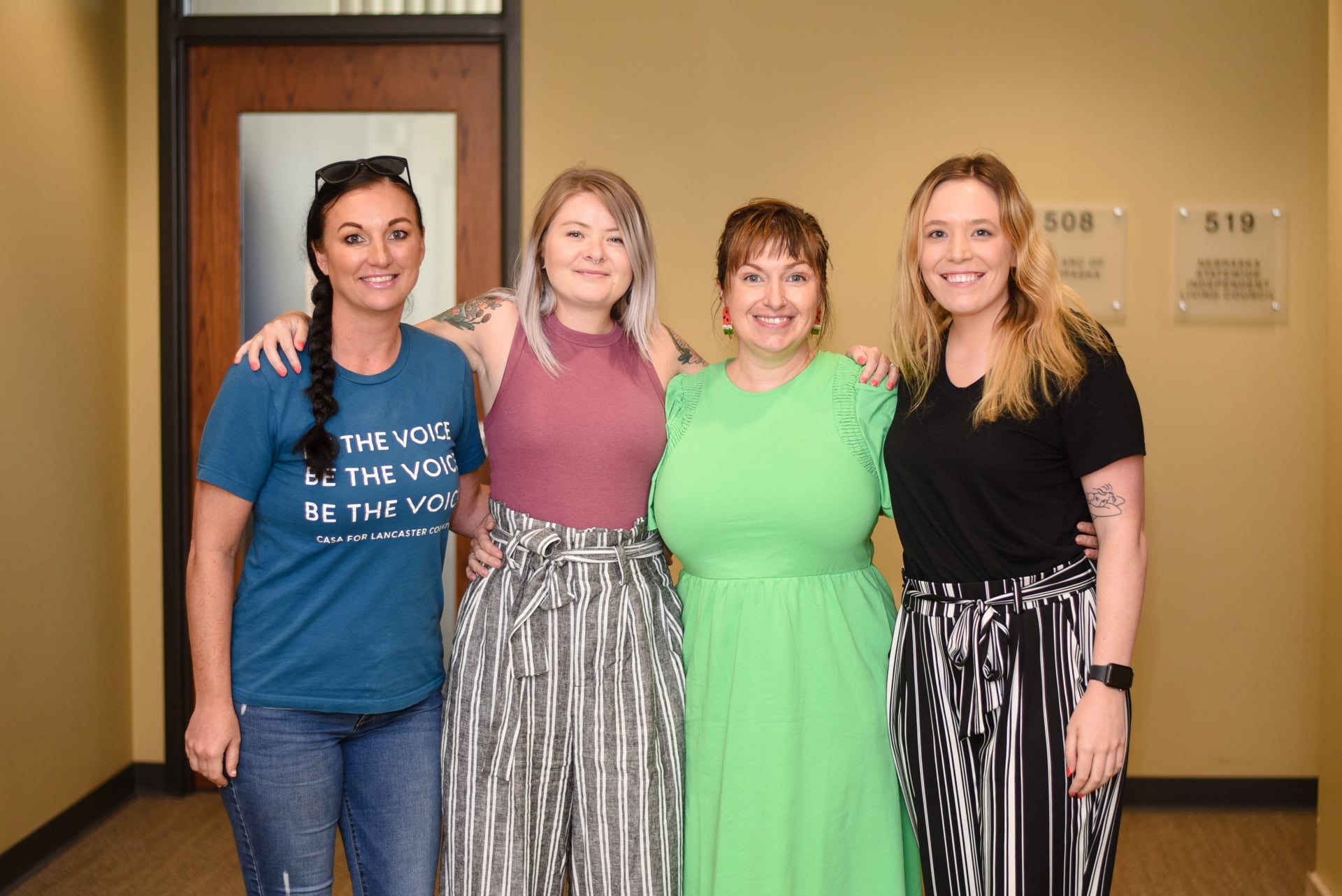 LCF continued to maximize the impact of its discretionary grant-making in 2021 by committing to Prosper Lincoln’s community agenda. In support of the Strong Neighborhoods focus area, LCF approved funding to the Lincoln Community Learning Centers (CLC) for a community builder in each quadrant of the city as well as mini grants to facilitate resident community engagement in neighborhoods.
LCF continued to maximize the impact of its discretionary grant-making in 2021 by committing to Prosper Lincoln’s community agenda. In support of the Strong Neighborhoods focus area, LCF approved funding to the Lincoln Community Learning Centers (CLC) for a community builder in each quadrant of the city as well as mini grants to facilitate resident community engagement in neighborhoods.
Using an Asset Based Community Development (ABCD) framework, these Community Builders work with CLC schools, families, and neighborhoods to build relationships, make connections, and elevate community/resident voices. Lincoln Community Learning Centers strive to promote successful students, thriving families, and strong neighborhoods.
The ABCD framework taps into the assets of residents and uses existing community strengths to build stronger neighborhoods for the future. Do not be surprised to see your Community Builders attending Neighborhood Association meetings, working with businesses and local community organizations to plan and execute neighborhood events, or meeting and connecting with people who live and work in our neighborhoods at your local coffee shops.
Fall 2021 Newsletter
Published on Dec 6, 2021To catch up on the latest Lincoln Community Foundation happenings click here to download the newsletter.
A Message from LCF’s New President/CEO, Alec Gorynski
Published on Jan 4, 2022 Thank you for your continued generosity toward the Lincoln Community Foundation. I am honored to carry out the foundation’s inspired mission as its next president/CEO. The new year gives us time to reflect and move forward with a renewed sense of optimism.
Thank you for your continued generosity toward the Lincoln Community Foundation. I am honored to carry out the foundation’s inspired mission as its next president/CEO. The new year gives us time to reflect and move forward with a renewed sense of optimism.
Over the past few weeks, I have reflected on the impactful work the Lincoln Community Foundation has accomplished under the visionary leadership of my predecessor Barbara Bartle.
I am grateful for the foundation's philanthropic partners, board, and team whose steadfast work has created a sound financial position for a future of shared community prosperity.
Being born and raised in Lincoln, I am honored to bring my passion for community wellbeing, and my more than 15 years of leadership experience, back home for good.
As I embark on this new chapter, you can expect me to be immersed in the community to better understand the important role the foundation has to play in Lincoln’s future.
Again, thank you for holding Lincoln forever in your hearts. I look forward to meeting you and finding more ways the foundation can help you accomplish your philanthropic goals.
Kind Regards,

Alec Gorynski
President
Winter 2023 Newsletter
Published on Mar 15, 2023To catch up on the latest Lincoln Community Foundation happenings click here to download the newsletter.
Unveiling Our New Strategic Plan
Published on Mar 30, 2023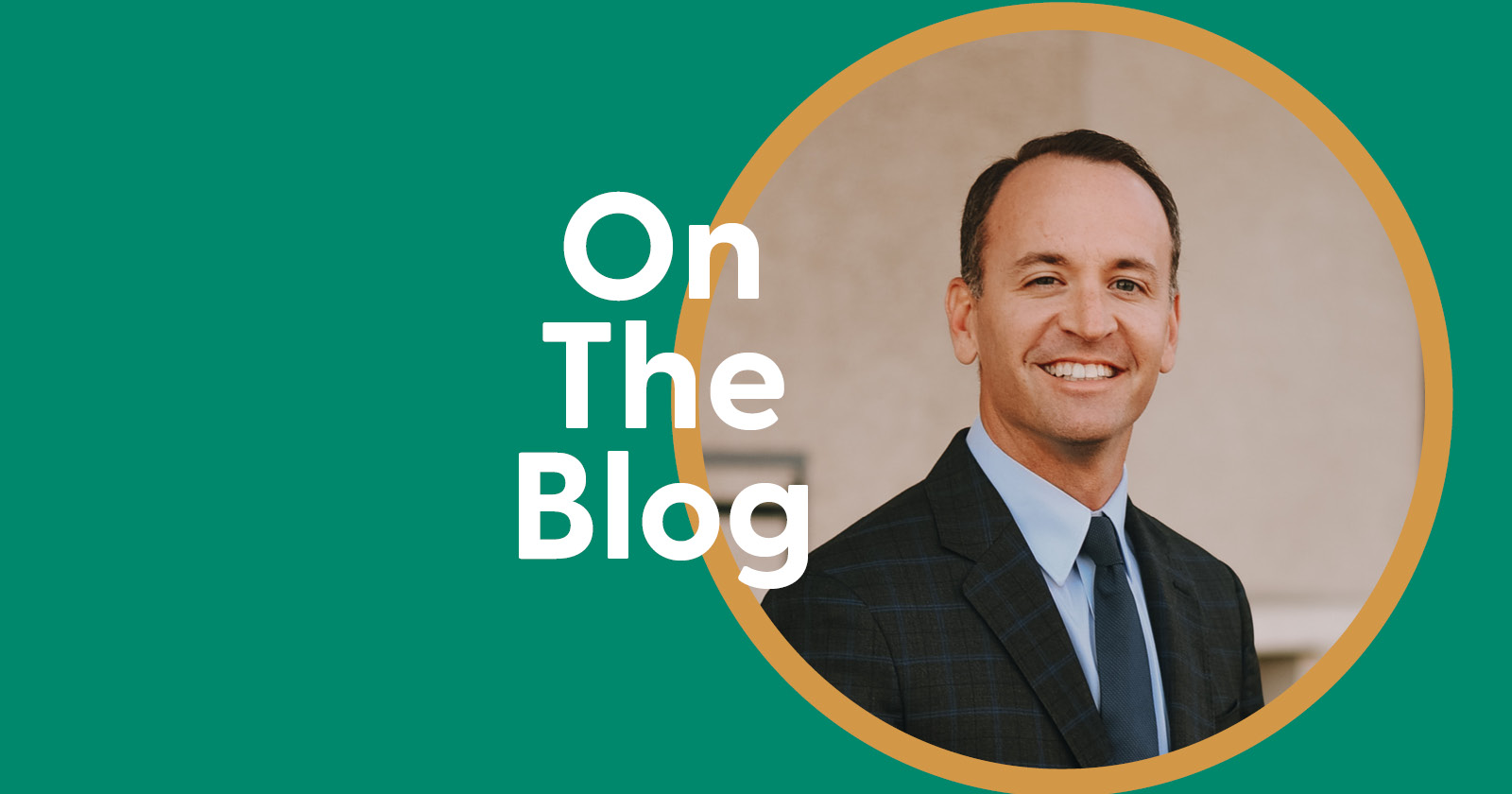
by Alec Gorynski
I am excited to share with you Lincoln Community Foundation’s (LCF) 2023-2025 Strategic Plan. Dating back to our founding in 1955, LCF has an extensive history of serving local families’ philanthropic goals. LCF’s more modern history turned our focus toward our community, leading efforts to identify and address complex challenges to assure the socio-economic prosperity of Lincoln. LCF has experienced significant growth over the years in the scope of our philanthropic relationships, the depth of our charitable assets, the span of our community leadership, the size of our team, and the range of our perceived purpose.
With the transition to new leadership, we embraced the unique opportunity to pause and evaluate our strengths, take stock of our constituents’ perceptions, and reflect on the changing ecosystem around us to make a definitive commitment on our responsibility to our community.
Our new strategic plan establishes a clear and unified organizational purpose, articulates a set of practical visions and strategic priorities for the next few years, and outlines the pathways that will lead to successful fulfillment of our purpose. It allows us to acknowledge that our respective roles, that of a philanthropic partner and of a trusted community leader, are dependent upon one another for our flywheel to perpetually run.
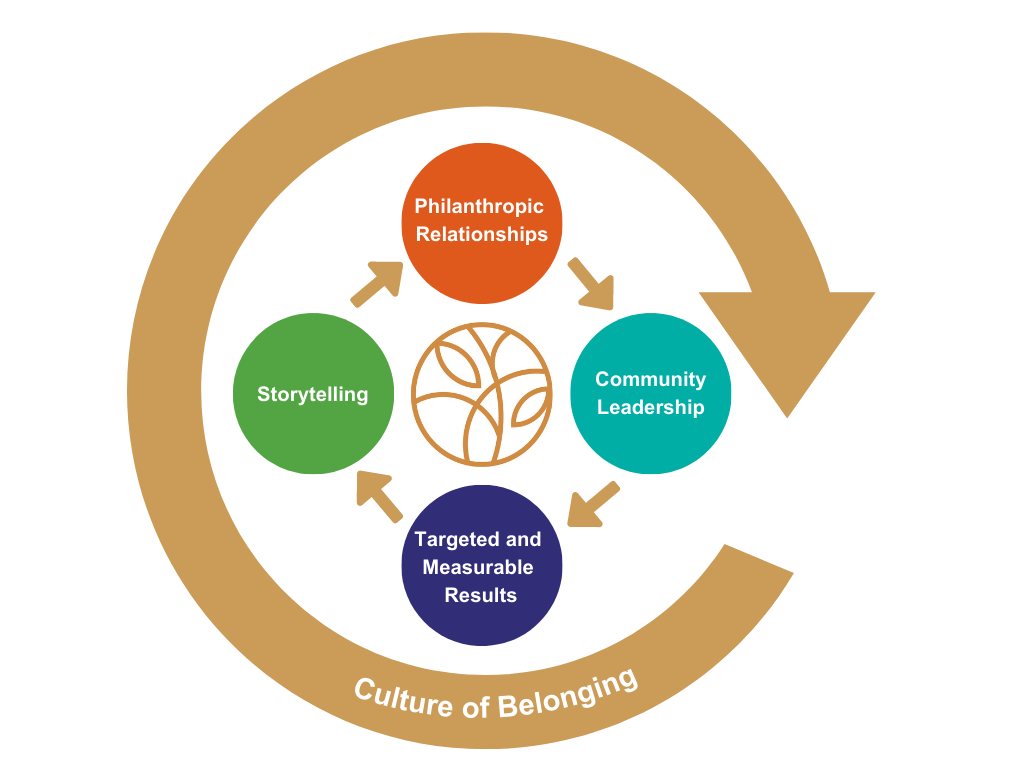
The plan also allows LCF to focus on and enhance our core competencies, deepening our philanthropic relationships and enhancing the value we provide to the community we serve. This plan is a product of a six-month planning process that included a mix of stakeholders each playing a different and meaningful role in the creation of vision for the future.
I want to thank the LCF board of directors, the strategic planning committee, the staff, and the various individuals and organizations who provided valuable perspective that shaped our strategic priorities. LCF is the community’s foundation, and you helped assure we remain accountable to our community.
You will note the plan and some of our other marketing assets are sporting a new brand logo, including a new tagline. Concurrent to our strategic planning process we went through a brand refresh process, with the intention that we release our new vision and brand at the same time. Stay tuned for a future post from our Vice President of Marketing, Jenny Chapin, for more about our new look and messaging!
Turmoil in banking and technology: Optimism for charitable giving?
Published on Apr 5, 2023
And, the wild ride continues! It’s been three years since the Covid-19 pandemic swept the globe and wreaked wide-ranging havoc on so many areas of the economy. Then came inflation, rising interest rates, and a volatile stock market. Now, in early 2023, advisors and clients are also dealing with concerns about the health of the banking system in the wake of Silicon Valley Bank’s collapse.
Your philanthropic clients may seek your advice on how the recent events in the banking world could impact their approach this year to charitable giving. We’re sharing three factors to keep in mind as you counsel charitable individuals and families.
The outlook is chilly for tech start ups and the venture capital firms who fund them.
“It feels like winter is here,” according to tech sector leadership. When tech was hot and it sometimes appeared that many start ups could do no wrong, you might have noticed an uptick in conversations with entrepreneurs and venture capital clients about planning for pre-IPO gifts of closely-held stock of a tech company or even investing in tech companies using philanthropic assets. Right now, though, opportunities like this may be rare. A silver lining may emerge, however. As both the failure of Silicon Valley Bank and the overall tech sector malaise shake out, what may emerge is a “more sustainable and streamlined asset class,” which, in turn, could lead to more stable future opportunities for your clients to make gifts of highly-appreciated closely-held shares.
Nonprofit organizations should closely examine their reserve funds.
A nonprofit’s accounts at a bank are subject to the same FDIC rules as a for-profit company, with a few additional twists that could allow a nonprofit to diversify. Many of your clients who serve on the boards of directors of their favorite nonprofits are well aware of this and may be working with fellow directors and nonprofits’ executives to ensure that the money is safe. This is an excellent time for any nonprofit to review its reserve funds and consider whether establishing a fund at the Lincoln Community Foundation might be a wise move to maximize a nonprofit’s financial position–whether through a rainy-day reserve fund, an endowment, or both–to ensure that the organization can meet community needs for the long term. A fund at LCF can be a cost-effective option for a nonprofit to access investment options that might not otherwise be available.
Focus on the positive effects of technology on philanthropy.
Indeed, the softening of the tech sector may very well negatively impact tech stocks (and bank stocks!), at least in the short term, and therefore could diminish enthusiasm for your clients to transfer those assets to their donor advised or other funds at LCF. That said, there is plenty of evidence to suggest that technology itself is increasing the opportunity and efficiency of charitable giving overall. In addition, even in the midst of an industry downturn, tech companies have made many people very wealthy, and their charitable giving stories are likely just beginning to be told. If your client base includes tech entrepreneurs and executives, it’s most certainly appropriate (and likely expected) that you would include charitable giving in your conversations.
As always, the Lincoln Community Foundation is here to help. Contact our Philanthropy Services team anytime to discuss your clients’ options for meeting their charitable giving goals, even in today’s challenging economic climate.
Community Raises More Than $667,000 for Early Care and Education
Published on Apr 13, 2023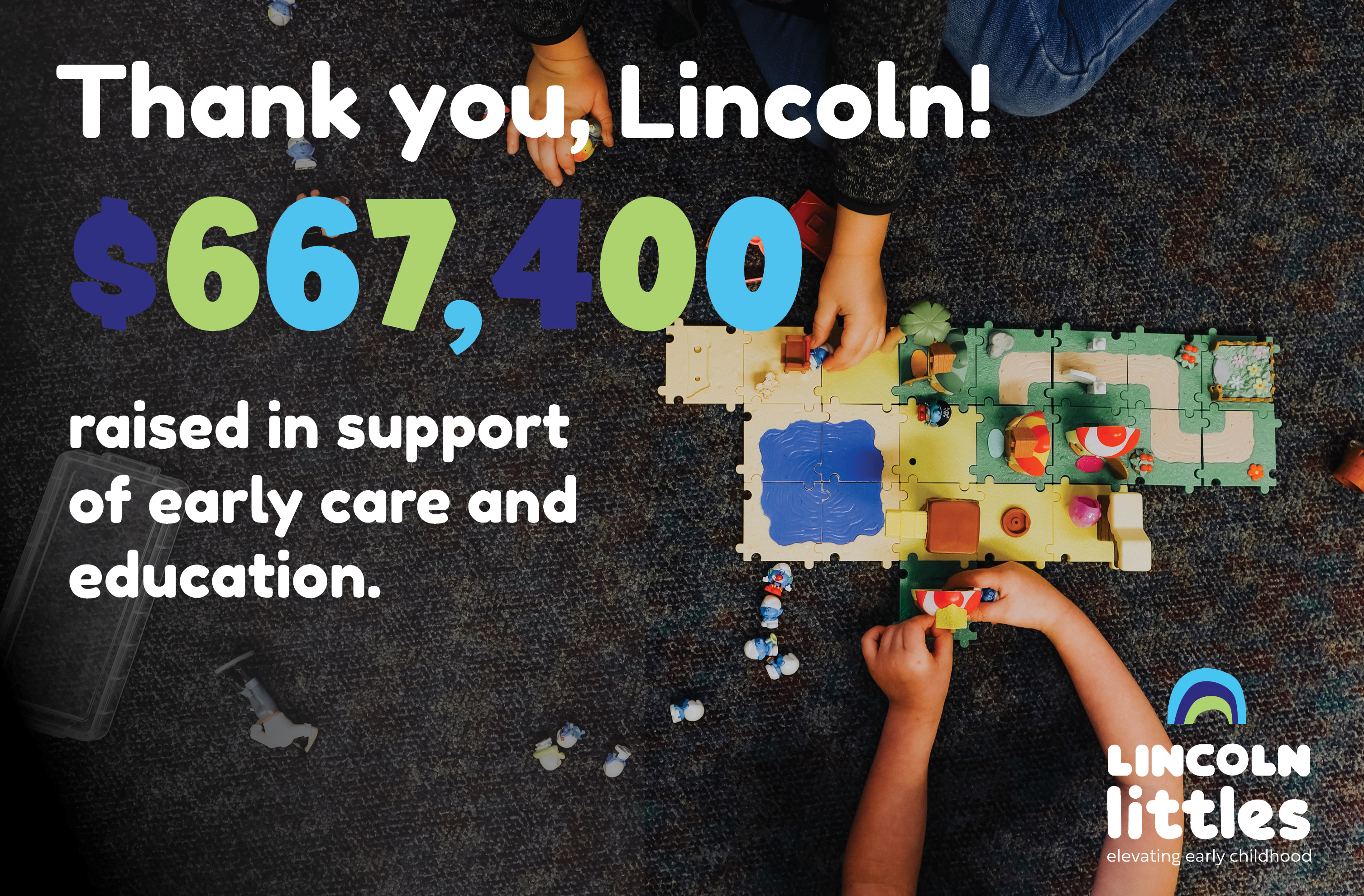
The Lincoln Community Foundation (LCF) announced that its recent annual giving campaign for Lincoln Littles raised $667,400 in community support of early care and education. Launched in 2019 and inspired by the Prosper Lincoln community agenda, LCF has raised nearly $4 million in support of Lincoln Littles programs, operations, and initiatives – including tuition assistance for infants, toddlers, and preschoolers to attend quality early care and education programs throughout the community.
“Once again, generous donors and organizations showed their support for our youngest residents,” said Alec Gorynski, LCF president/CEO. “With this community investment, Lincoln Littles can continue the important work of addressing the complexities surrounding early childhood and raising opportunities for every child to access quality care and education.”
Additionally, Lincoln Littles received a $300,000 Workforce Development Grant from the Nebraska Department of Labor, bringing this year’s total funding to $967,400. The grant program supports the recruitment and retention of teachers, including childcare and early childhood education providers. Lincoln Littles will use this grant funding to offer tuition assistance for those with young children who want to pursue or continue a career in early childcare.
“Many of Lincoln’s children and families will breathe a sigh of relief in the next year,” said Anne Brandt, executive director of Lincoln Littles. “These funds will allow us to continue to fill a critical need: affordable, high-quality early care and education for working families.”
In addition to increasing affordable childcare options for families, Lincoln Littles has expanded its work to focus on solutions to additional challenges: increasing quality in early care and education, educating and engaging businesses and the larger community, supporting workforce development in the childcare sector and influencing policies to be responsive to the needs of young children and their families.
Lead Donors: Acklie Charitable Foundation, Robert & Barbara Bartle, Bettenhausen Family Foundation, Drs. Bob & Stacie Bleicher, The Buffett Early Childhood Fund, Rosalind K. Carr in memory of Professor James D. Carr, Shirley & Jerry Daugherty, Donlan Foundation, Bob & Jan FitzSimmons, Larry Frederick & Robyn Sitzman, Harbor of Dreams, Inc., Barb Hoppe Johnson & Bruce Johnson, Kile & Cuz Johnson, Kawasaki, Jim & Penny Krieger Family Foundation, Drs. Marilyn & David Moore, Mike Munro & Susie Keisler-Munro, Nebraska Children and Families Foundation, Pinnacle Bank, Drs. Bob & Lisa Rauner, Sue & Al Saathoff, Rhonda Seacrest, Dr. Bob & Dottie Shapiro, Susan Sehnert Stuart, Tom & Sue Tallman, Temme Family Foundation, Art & Carol Thompson, Sue & Ed Tricker, Dr. Eileen & Richard Vautravers, Mae Whitmer and WRK Family Foundation.
Together For Good
Published on Apr 14, 2023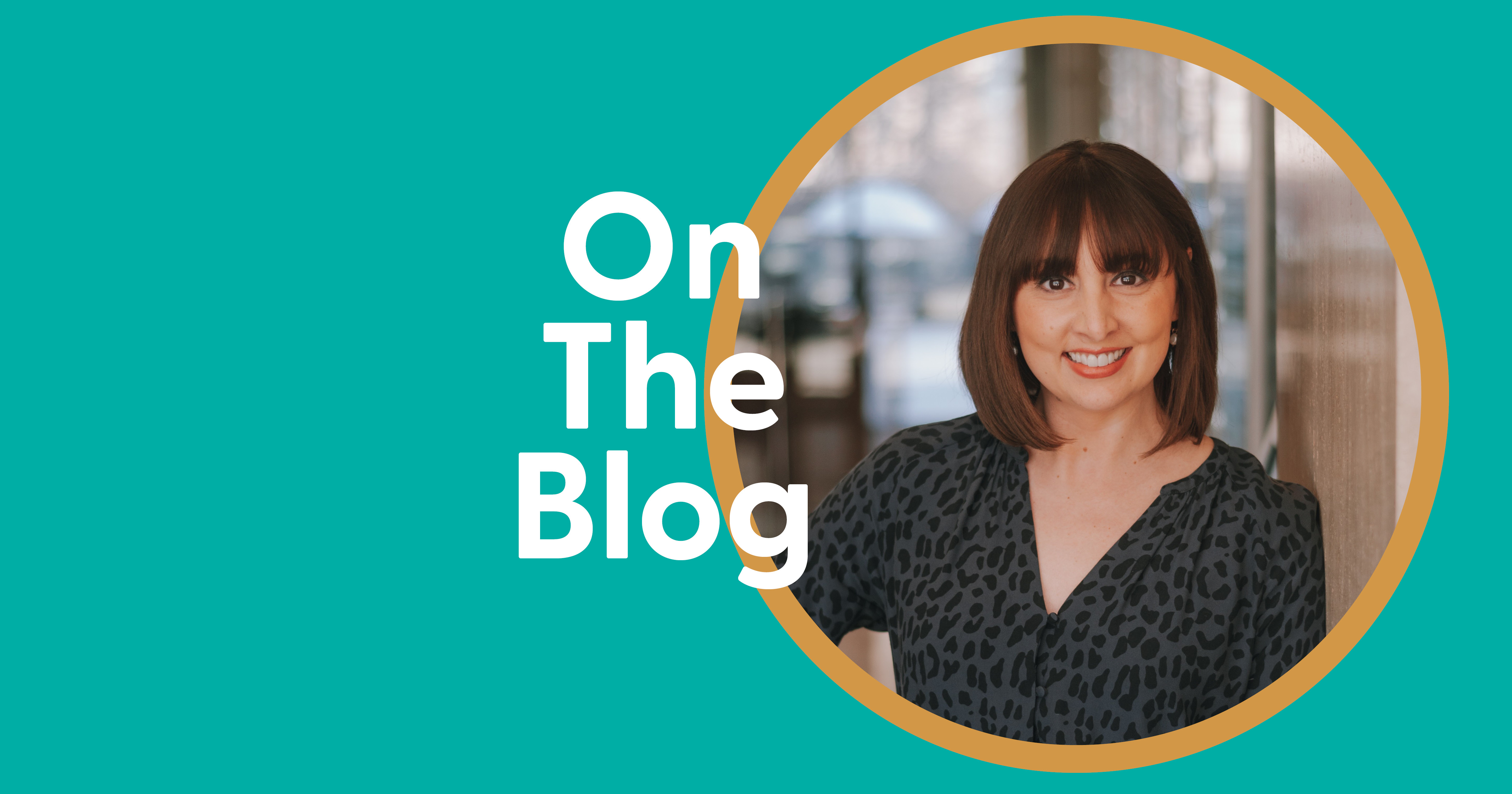
Jenny Chapin, Vice President for Marketing
Since 1955, Lincoln Community Foundation has been privileged to be part of many wonderful legacies by matching community needs with the passions of our donors. We have served as a faithful steward for many types of philanthropic gifts and have helped donors create lasting legacies of giving. With gifts of all sizes from thousands of donors over the years, the assets of LCF have grown to more than $150 million.
Yet even with that great legacy, and the hard work and significant assets that are being channeled into the community, many in Lincoln are either not aware of this organization or do not understand what we do.
For that reason, we have decided to take this moment in time to elevate our brand. We have been working with our friends at KidGlov to add some intentionality around our visual identity and the messaging that surrounds our name.
We are excited to share the results of this work with you.
We are enthusiastic for how this work is going to help us be more impactful into the future. Nonprofit organizations with strong brands have the advantage of boosting recognition and recall, lifting fundraising efforts, strengthening connection to the mission, and enhancing internal cultures.
Over the past several months we have engaged with KidGlov in a very strategic process that included brand exploration, understanding our competitive space, validating perceptions, defining our brand archetypes, assessing our brand strategy, and creating our messaging and visual identity.
We found that our brand archetype profile is Lover, Magician and Sage. While those words might make you snicker a little, this profile reveals that we are passionately connected to our transformative work – and that we are experts in what we do.
The process pulled together comments from a multitude of stakeholders. Some of my personal favorites are:
- • “[Lincoln Community Foundation has a] singular commitment to marshalling civic pride and collective resources to take on difficult challenges and advance Lincoln.”
- • “Rather than just hold and distribute money, LCF searches for problems, develops solutions and incentivizes positive change.”
- • “LCF is a place where anyone can be a philanthropist. From those with a few dollars to give and want to support causes that resonate with them, to those who can make transformational gifts, all have a home here.”
Our new foundational messaging statement reads as follows:
Through partnerships and collaboration, Lincoln Community Foundation facilitates positive change for the common good.
Lincoln Community Foundation provides leadership and tools that connect donor generosity to local needs and passions.
The success of Lincoln Community Foundation is measured by the quality of life achieved for people today and generations to come.
Those 51 simple words get to the essence of who we are and what we do in such an eloquent and memorable way.
Then, our new tagline does it in an even shorter more impactful way.
Lincoln Community Foundation. Together for Good.
This tagline supports the messaging statement by highlighting partnerships, collaboration, positivity, and generosity with an eye toward the future.
Inspired by the Lincoln Community Foundation Barbara Bartle Garden right outside of our building, the new logo represents us both as organic and growing and as being the gold standard of our type of work and the best of our community. The font is both distinguished and approachable. Our new color palette represents the life and diversity of the work that we do. The new graphical identity and graphical elements represent LCF as being knowledgeable, nurturing, established, forward leading and innovative.
You’ll start to see your new branding roll out over the coming weeks and months. Thank you for supporting us in so many ways. We hope you see yourselves reflecting in our new branding.
Give to Lincoln Day Connects Donor Generosity to Community Needs
Published on May 1, 2023
Lincoln’s 12th annual giving day is scheduled for Wednesday, May 24th. Coordinated by the Lincoln Community Foundation (LCF), Give to Lincoln Day is an online event encouraging donations to support the local nonprofits and causes people care about. More than 450 local charities have registered for this year’s event. Every participating nonprofit organization will receive a proportional share of the $500,000 match fund, based upon its percentage of total dollars raised, thanks to LCF and sponsors including Presenting Sponsor, West Gate Bank.
Last year’s event raised $8 million for local nonprofits. The event has raised $50 million in its 11-year history.
“Give to Lincoln Day represents what makes our community special,” said LCF President, Alec Gorynski. “The incredible results year after year show the power of generosity. When neighbors come together to support the critical work of local nonprofits, we improve our quality of life in Lincoln and give everyone the opportunity to thrive.”
Donors may search participating nonprofits and give online at GiveToLincoln.com. Donations must be made before 11:59 p.m. on May 24 to count toward the giving day and the match fund. The minimum donation is $10 per charity.
Gifts may also be mailed to the Lincoln Community Foundation if postmarked by May 17. Donors may also drop off donations between May 1 and May 24 at all Lincoln West Gate Bank branches via the lobby or the commercial drop drawers.
- Lincoln Community Foundation’s mailing address, 215 Centennial Mall South, Lincoln, NE, 68508.
- Presenting Sponsor, West Gate Bank, Lincoln Branch Locations, visit https://westgate.bank/locations for lobby hours.
On May 24 donation totals can be viewed throughout the day at GiveToLincoln.com.
Match Sponsors include: West Gate Bank (Presenting Sponsor), Assurity, Bill & Mae Whitmer Family Fund and ABC Electric, Bill* & Marilyn Cintani, Cornhusker Bank, DA Davidson, Davis Design, HBE, Kawasaki, Kubly Family Foundation, Lutz, Mail Management, The Family of J. Gates and Daisy Minnick, William J. Mueller & Kim M. Robak, Olsson, Pepsi, Pinnacle Bank, Runza, Joe W. & Ruth K. Seacrest Fund, Tom & Lisa Smith, Talent Plus, Mark H. Tallman and WRK Family Foundation.
Retirement plans to charity: Understanding the “trifecta” of tax benefits
Published on May 8, 2023
Over the last few months, many advisors have noticed an uptick in client inquiries about leaving their IRAs and other retirement plans to charity. If you’re wondering why, it likely has a lot to do with the buzz about Qualified Charitable Distributions, which allow those who’ve reached the age of 70 ½ to direct up to $100,000 annually to qualified charities (such as a designated or field-of-interest fund at the Lincoln Community Foundation), avoiding both the need for an RMD (if they’ve reached age 73) and the income tax hit.
It’s probably more than just the QCD, though, that has spurred your clients to ask questions. More and more, charitable planning with IRAs and other qualified retirement plans is a topic in financial and mainstream media. A case in point is a September 2022 article in the Wall Street Journal, irresistibly titled “Win an Income-Tax Trifecta With Charitable Donations.” If you subscribe to the Wall Street Journal, the article is well worth your time.
When your client names a public charity, such as a donor-advised or other fund at the Lincoln Community Foundation, as the beneficiary of a traditional IRA or qualified employer retirement plan, your client achieves extremely tax-efficient results. Here’s why:
First, the client achieved tax benefits over time as the client contributed money to a traditional IRA (or to an employer-sponsored plan). That’s because contributions to certain retirement plans are what the IRS considers “pre-tax”; your client does not pay income tax on the money used to make those contributions (subject to annual limits).
Second, assets in IRAs and qualified retirement plans grow tax free inside the plan. In other words, the client is not paying taxes on the income generated by those assets before distributions start in retirement years. This allows these accounts to grow rapidly.
Third, when a client leaves a traditional IRA or qualified plan to a fund at the Lincoln Community Foundation or another charity upon death, the charity does not pay income taxes (or estate taxes) on those assets. By contrast, if the client were to name children as beneficiaries of an IRA, for example, those IRA distributions to the children are subject to income tax, and that tax can be hefty given the tax treatment of inherited IRAs.
So, if your client is deciding how to dispose of stock and an IRA in the client’s estate plan, intending to leave one to children and the other to charity, leaving the IRA to charity and the stock to children is a no-brainer. Remember, the client’s stock owned outside of an IRA gets the “step-up in basis” when the client dies, which means that the children won’t pay capital gains taxes on the pre-death appreciation of that asset when they sell it.
Here’s the net-net:
Traditional IRAs are often poor vehicles for your clients to use for a family legacy. Instead, if a client is charitably inclined, traditional IRAs are likely better deployed to posthumous philanthropy if other assets, such as appreciated stock, are available to leave to children and other heirs.
The philanthropy services team at LCF is always happy to work with you to ensure that your clients are maximizing their assets to fulfill their charitable giving goals.
Agency for Change Podcast
Published on May 3, 2023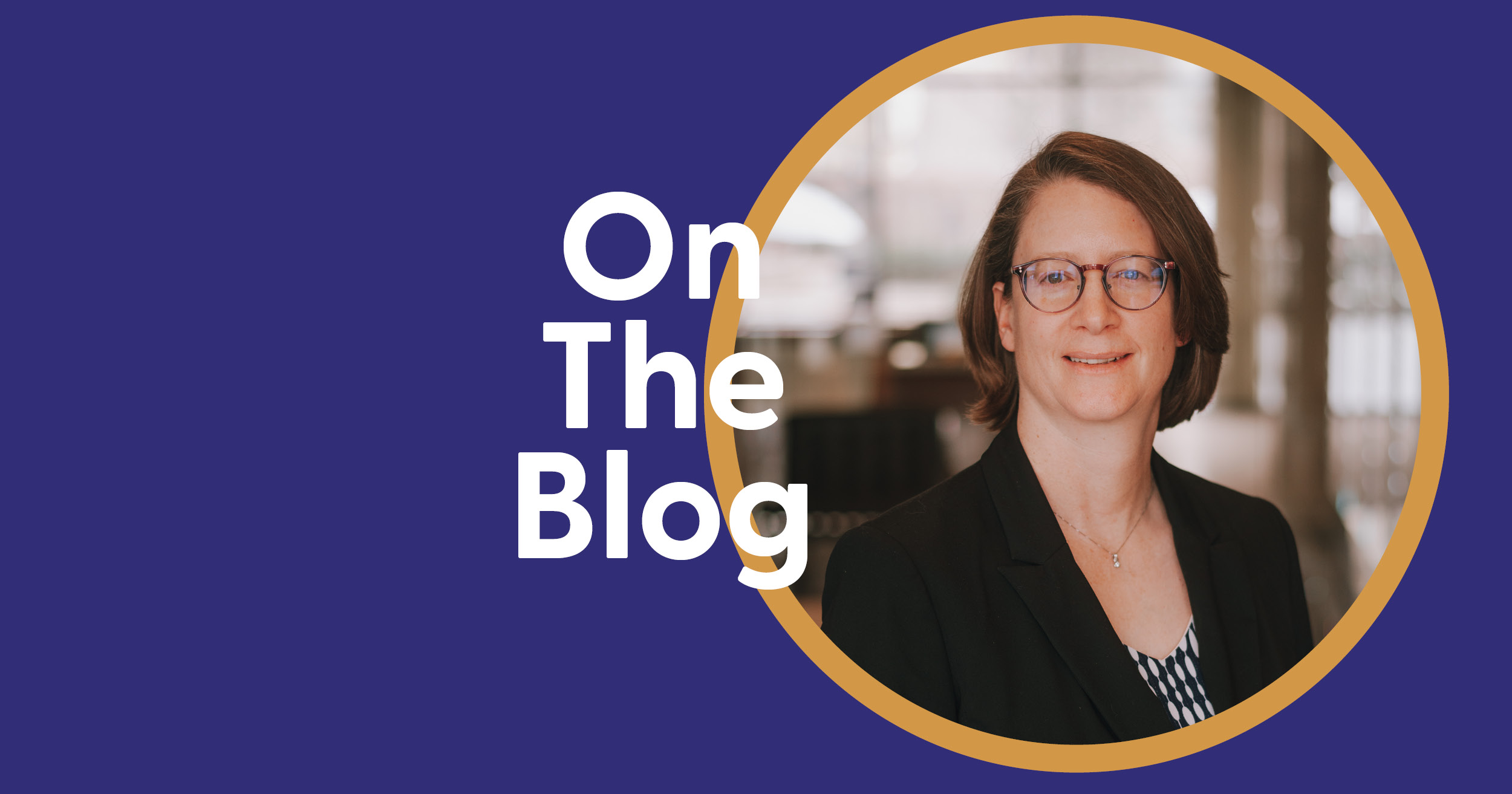
Vice President for Community Development and Outreach, Michelle Paulk, recently sat down with Kelley Peterson from KidGlov to discuss the Lincoln Community Foundation, Give to Lincoln Day and why everyone can be a philanthropist. Access Michelle’s Agency for Change podcast episode below.
Transcript:
MICHELLE PAULK:
The community and the world are constantly evolving. And to keep up, I think we have to be lifelong learners.
ANNOUNCER:
Welcome to Agency for Change, a podcast from KidGlov that brings you the stories of changemakers who are actively working to improve our communities. In every episode, we’ll meet with people who are making a lasting impact in the places we call home.
KELLEY PETERSON:
Hi, everyone. This is Kelley Peterson, chief creative officer at KidGlov. Welcome to another episode of Agency for Change. Today, we’re talking about an organization that has been connecting donor generosity to local needs and passions for nearly 70 years: the Lincoln Community Foundation. One of the foundation’s claims to fame is spearheading a community-wide philanthropic event fondly called Give to Lincoln Day, 11 years ago. In 2022, this remarkable event raised over $8 million to help 479 nonprofit organizations. Join us as we talk with Michelle Paulk, vice president of community development and outreach, about what makes the foundation and this one big day of giving so special. Michelle, I’m eager to talk with you and learn more about the great impact you are making in the world.
MICHELLE PAULK:
Me, too. Thanks, Kelly.
KELLEY PETERSON:
You bet. Michelle, let’s go way back in time to 1955. What brought the founders of your organization together a mere 68 years ago?
MICHELLE PAULK:
The Lincoln Community Foundation is the oldest community foundation in Nebraska. And so, the founders of this community foundation were such visionaries to start this organization and really think about in perpetuity that these funds would be around forever, helping our community forever. And so, they started a benefactor’s program, which created an operating endowment so that our community foundation is not out fundraising for operating funds along with all of our thousand nonprofits who are located in Lancaster County. So, we’re really well-positioned there. They had great vision back in 1955, and they had a great love of Lincoln. And so, I think that was really the spark for it. And we’ve been on this great path ever since. One of the cool things is we did find out the first grant made from the Community Foundation was for a projector in Pinewood Bowl out in Pioneers Park. And so that’s how it all got started.
KELLEY PETERSON:
I love that planning. I’ve been to Pioneers Park and Pinewood Bowl so many times myself. And this summer, I believe, looking forward to seeing The Doobie Brothers. So, the fact that Lincoln Community Foundation made it was the spark of even making that happen and the great artists that do come to that space something, you are part of it all. I think perpetuity sometimes, one, it’s a hard word to say, but it’s a great word. But I love the one you said even more, and that is ‘forever’ because that is truly what this means. So, what do you think the secret is behind what the Lincoln Community Foundation’s continued success is in making an impact?
MICHELLE PAULK:
I think a big component is that we don’t represent any one cause or any one organization or nonprofit. We represent the entire community of Lincoln, and our service area also includes Lancaster County. And so, we just exist to connect donors who want to do good with the causes they care about and the causes they’re passionate about in the community. It’s a really unique position to be in, that community foundations are in. We’re this flexible entity that just really exists to increase generosity in our community and connect those donors to what they want to fund and what they really care about.
KELLEY PETERSON:
Wow. That is quite a footprint. Lincoln and Lancaster County, lot of good things happening there. When did Give to Lincoln Day become a fixture in our community’s calendar, almost like a citywide holiday that happens every year? How did it all get started?
MICHELLE PAULK:
It’s an interesting story. So, Barbara Bartle, who is our former president, started it in 2010, and giving days were starting to catch fire across the country about that time. And some of our board members and Barb went to a conference and heard about these giving days that were going on in fall of 2011. And they came back, and they said, “We need to do this. This would be great for Lincoln. We need to try this. And the Community Foundation is in the perfect position to do it.” And so, we planned that first one in about six months from idea to running the Giving Day in May of 2012. And we didn’t know what to expect. We had, I think, 130-some nonprofits participate. We raised $1.3 million. And it was great. The community stepped up.
The nonprofits that sat on the sideline and waited to see what was going to happen here, really came in, in the next year. And we thought, “Let’s continue this.” And now, we’re on our 12th one. And it feels like it hasn’t been 12 years. It’s fresh every year and it’s fun every year. It really has become an event in May for our community. And so, people do look forward to it, donors look forward to it. Anecdotally, we hear that donors learn about new nonprofits, which is one of the goals of the giving day, is we want to raise awareness of all of our nonprofit community, and we want to introduce donors to new nonprofits that are working in town and the causes that they care about. It’s been that connector again, for the Community Foundation in a different way, connecting donors to those causes they care about.
KELLEY PETERSON:
Twelve years. I love those stories where you think, “Okay. In 2011, this is in six months, this great idea.” And then 12 years later, who would’ve ever imagined the huge success that Give to Lincoln Day has had and will continue to have? So how is Give to Lincoln Day matchlessly different from giving days in other communities? What’s the big deal?
MICHELLE PAULK:
I think one of the things we did right out the gate was we kept it simple. We invite all the nonprofits in, but we do have a match. So, the Community Foundation and our sponsors throughout the community come together and create a match for this event, and it’s a proportional match. So, every dollar a donor gives is increased by that challenge match, that proportional match that we have. In 2011, we started with a $200,000 challenge match. This year, we have a $500,000 challenge match. I think that’s one of those sparks, too, for Give to Lincoln Day. The match really brings in donors. They understand this is a great opportunity to support the causes they care about. And then their nonprofit is going to get a little piece of that match dollars to increase every donation.
And so, some giving days have gone away from a match depending on the size of their giving day, but there are some really successful giving days across the country and in the state of Nebraska. North Texas has a really big one. Minnesota has a statewide giving day that’s been going on longer than ours. And I also always like to give a shout-out to Lexington, Nebraska, because they had the first giving day in Nebraska. They beat us out the gate. And we talked to them before we launched Give to Lincoln Day and got some insights from them as well on how they were running theirs. And I know there are several now across the state of Nebraska. Grand Island has one, Hastings, Phelps County, Fremont area, and even my hometown, my home county of Thayer County has a giving day as well. So, it’s really cool to see these launch across the state because they’re great ways for donors to participate in their community and give back.
KELLEY PETERSON:
I agree that the… First of all, yay, Lexington, what a great piece of history that is and that it just is this ripple effect of helping communities clear across the state is so neat, just so great. In addition to Give to Lincoln Day, what other ways do you connect donor generosity to local needs for people today and for generations to come?
MICHELLE PAULK:
That really comes back to the flexibility of a community foundation. And because we’re here forever in perpetuity, we have lots of different ways for donors to plug in and practice their philanthropy through the Community Foundation. So, we have some donors who are interested in specific nonprofits, and they might give an estate gift to support 5, 10 nonprofits in perpetuity with an endowed fund. We have other donors who are interested in maybe children and youth or animals or basic needs in our community. They want to leave that decision up to the Community Foundation. And so, they might create an endowment for what they’re passionate about and leave it to our board of directors to decide what the most pressing need in the community is.
And then we have other donors who really recognize that the needs and opportunities in our community evolve over time. And so those donors have left unrestricted funds to the Community Foundation. So, the board of directors really has discretion then to say, “Here are the things in our community that we need to work on, and then our dollars would be most impactful in these areas.” And so those donors who had that foresight to put those dollars in unrestricted funds, we can respond to evolving and emerging needs and opportunities in the community with those. And then really, Give to Lincoln Day is anybody can be a philanthropist. So, anybody can use the Community Foundation for their philanthropy, whether it’s $10 or $10 million and everywhere in between.
KELLEY PETERSON:
I love that saying, “anyone and everyone can be a philanthropist,” because it’s true. And Give to Lincoln Day is one of my favorite ways to do that because I usually, “Okay. I’m going to have a top ten list. I’m going to have a top 20 list. And I get to give to all of them and make a difference.” And that’s so fun for me. It’s like Christmastime and getting the toy catalog in the mail, so you can go on the website and pick and choose which, “Oh, I forgot about that one. And I’m going to make them on my list and mark them up and figure that out.” It’s super fun to do that and have been doing that. I know that Give to Lincoln Day is probably one of your favorites, but do you have another favorite or a story to tell about something that touches you in the heart about what Lincoln Community Foundation has done?
MICHELLE PAULK:
Part of it is the Prosper Lincoln Community Agenda. That has been really, really interesting to see that evolve and come out of the Lincoln Vital Signs Report and be this community-wide, “Here are the things that we need to work on and to make our community even better than it already is.” Recently, I’ve had the opportunity to be involved with our Community Builder Coalition, and that’s a group of individuals who are working for many different agencies in Lincoln, and they are community builders or organizers in neighborhoods. So, they’re working with residents, raising up resident voice, and really bringing that grassroots change up to the forefront in our community. And so that’s been a really inspiring component of our work and of Prosper Lincoln’s work to be involved with, to really raise up the voices of our neighbors.
KELLEY PETERSON:
Wow. I love that initiative. And that may be one that I’m new to hearing. Prosper Lincoln Vital Signs, you’ve mentioned some of those as well, are such great bodies of work that activate community members to have their voices be heard. It’s such good work. So, all of this has happened already and will continue, but what’s on the horizon for Lincoln Community Foundation?
MICHELLE PAULK:
Kelley, we just did a new strategic plan. We have a new leadership. As of about a year ago, Al Gorynski is our new president. And we really looked at it was a good time to look at our strategic initiatives, our strategic plan, and think through where we’re heading for the next three years. It involved a new tagline, a new logo, a new mission statement. And so, I think our new mission statement really embodies what we’re doing here. It’s inspiring the community to give, act and lead. Very simple, but really gets to the heart at what the community foundation does and why we exist in Lincoln.
KELLEY PETERSON:
Michelle, you just said all the words that speak to my love language, all of that marketing stuff. What? New tagline, new logos, new strategy, those are all just music to my ears. Because when you have an opportunity to have that interjection of new energy within your organization, it just instantly changes the trajectory of where you’re going to go. Of course, that new leadership and all of the leaders surrounding that strategic plan for the next three years is all great and phenomenal. I think what’s fun too is that I used to be in strategic conversations, and they would say, “This is our strategic plan for the next ten years.”
And then after a little while, it was like, “No, this is our strategic plan for the next five years.” And I love it that we’re at, “You know what? No one has a crystal ball and we shouldn’t let this thing live on the shelf for ten years. We need to keep this active,” which is a word you just used about the foundation, “keep this active and going and address the needs that are happening now with a mind for the future.” And I love that the Lincoln Community Foundation does that and is going to have a great, great future with all of that on the horizon. So, Michelle, let’s switch our focus to talk about you for a bit. How did you fall into and fall in love with nonprofit work?
MICHELLE PAULK:
Well, I have a degree in history of all things, and so I am trained for anything and yet nothing specific. I thought about being a teacher, moved up to Lincoln to get teaching certificate, decided that was not for me, couldn’t picture myself in the classroom. I set out to get a job and I applied at Martin Luther Home Society, which had their headquarters here in Lincoln at the time. I got hired there, luckily. My other prospects were as a receptionist at a veterinary clinic and a job at a library. So that’s why I say I fell into nonprofit work. Martin Luther Homes looked like the best prospect at the time, and it was. I was an administrative assistant for several years. I learned databases and moved up, worked in the foundation there, and just loved the work. So, Martin Luther Homes then became Mosaic, which has a large presence in Nebraska, and they work with individuals with intellectual disabilities. Getting to interact with the clients we served and the employees we had. It was just fulfilling.
You went home every day feeling like you made a difference and feeling really good about the work you were doing. From there, I moved to the Foundation for Lincoln Public Schools. Public education has always been a passion of mine, and that’s where I met Barb Bartle. She was the president there at the time. Barb was really a mentor and took a chance on a young person who had some database skills and needed some more experience. We did some wonderful things there. And then this opportunity at the Community Foundation came up and I was really excited to… Barb had come into more of a reactive, a little bit sleepy organization that the Community Foundation was in 2010 and really had a vision for it to be a community leader and an active participant in our community. I loved that excitement. And I had lived in Lincoln for a long time by then, and so I love this community and it was just a great fit. Again, I still go home every day feeling like I’ve done some good in the world at my job, and that’s just the best feeling ever.
KELLEY PETERSON:
Well, you mentioned Barb, and I don’t think about Barb Bartle without thinking visionary. I think it’s just synonymous with that name. So, I love that. You also mentioned a four-letter word that is interwoven throughout nonprofit and for-profit business and you know so much about it, and that word is ‘data.’ So, can you help the listeners understand how important data is in your work at the Lincoln Community Foundation?
MICHELLE PAULK:
Yeah. We have a fairly significant database, and really, that’s how we connect people to the causes, to the things they care about. And even at a nonprofit like Martin Luther Homes, it’s the way we communicate to those donors. We keep track of what they’re interested in and their email address, and we make sure we communicate with them. And so good data allows you to communicate with those folks who care about your mission, in our case, who care about Lincoln. And it allows us then to tell them stories, so tell them what’s happening in the community, and give them opportunities to give.
Because donors do want opportunities. They want the opportunity to give and support the things they care about, and data helps us do that. And so, it’s a really important component of what we do at the Community Foundation. It’s really important to us that we have good data and do it right and do it well. And it’s a customer service component too, of making sure that we’re tracking all of that data in the best way, in the most efficient way, so that we can talk to those donors and raise more dollars for our community.
KELLEY PETERSON:
I get in the visual, in the words so much, and sometimes forget to give a hats off to the data that we need in order to communicate, just as you said, too. There’s a lot of data too, that goes into our cities to see what the needs are out there. And so, one of my favorite projects too is Vital Signs, and that is completely data-driven in all regards to the community to say, “Hey, these are some things that we’re great at, and here are some things that we have challenges with and that we need to work on.” And so, I always liked that project that the Lincoln Community Foundation supports too, to use data. As a nonprofit leader, what advice do you have for those who want to make a difference in the world?
MICHELLE PAULK:
That’s a tough one. I really think just show up, work hard, and do something that’s fulfilling. When you find your passion, it’s not work. Most days, it can be very fulfilling, especially working in the nonprofit sector. But it is hard work and there are some ups and downs as well. But just showing up and showing up for our community is really, I think, the key.
KELLEY PETERSON:
I think that is key: showing up. And I appreciate you showing up today for our listeners to hear more about the Lincoln Community Foundation and Give to Lincoln Day as well. But as I’ve mentioned, I am in love with words. And so, Michelle, could you give us a few of your own words of wisdom for our listeners?
MICHELLE PAULK:
I talk to my kids sometimes about being a lifelong learner. I like to read. I always want to be learning and evolving and doing new things. I think about hustle. We want to get things done and work to our capacity and what we can do. And just never stop learning and evolving. The community and the world are constantly evolving. And to keep up, I think we have to be lifelong learners.
KELLEY PETERSON:
I’m going to write the word hustle really big and tape it above my computer screen because that is a brilliant word. And you’re so right, just constantly learning and being open-minded and bringing the things in and hopefully sharing some of those things out that changed the world. So, I have to ask, you talked about learning, do you read for enjoyment, too? Are you just a reader reader?
MICHELLE PAULK:
A little bit of both, yeah. Fiction, non-fiction, a podcast every once in a while. Yeah.
KELLEY PETERSON:
I hope you do podcasts too, because this is going to be a good one. So, Michelle, for our listeners who would like to learn more about the foundation and Give to Lincoln Day, how can they find out more?
MICHELLE PAULK:
We’ve got a website, very simple, givetolincoln.com. Go there to learn more about how the Giving Day works and all the nonprofits that are registered. But then there’s just good information about how it works, what types of donations are accepted on Give to Lincoln Day, and lots of information there. And then I would encourage folks too to check out our website, lcf.org, and the ways that, again, anyone can be a philanthropist through the community foundation. And so, lots of information on lcf.org to about what we’re doing and just the ways that you can give.
KELLEY PETERSON:
So great. And just to make this podcast a little more evergreen, that Give to Lincoln Day always happens in May, right? So, anyone that comes across this podcast can get those specific dates at any time by going to that great website and learning about the nonprofits that are involved for sure. So, as we wrap up our time together today, what is the most important thing you would like our listeners to remember about the work you’re doing?
MICHELLE PAULK:
I think it’s that anyone can have an impact in their community. I talked about the $10 donor to the $10 million donor, and any of those, any donor can fit into the Community Foundation. But I also touched on the community builders and the work with residents and neighbors in our community. It’s time, talent, and treasure. And there’s all kinds of different ways that you can give back to your community, and I hope that the community foundation is able to help and convene and facilitate any of that that’s happening.
KELLEY PETERSON:
Michelle, I fully believe that the world needs more changemakers like you. Thank you for taking the time to share with us today.
MICHELLE PAULK:
Thank you, Kelley.
ANNOUNCER:
We hope you enjoyed today’s Agency for Change podcast. To hear all our interviews with those who are making a positive change in our communities, or to nominate a changemaker you’d love to hear from, visit KidGlov.com at K-I-D-G-L-O-V.com to get in touch. As always, if you like what you’ve heard today, be sure to rate, review, subscribe, and share. Thanks for listening, and we’ll see you next time.
An Inspiring First Day
Published on May 23, 2023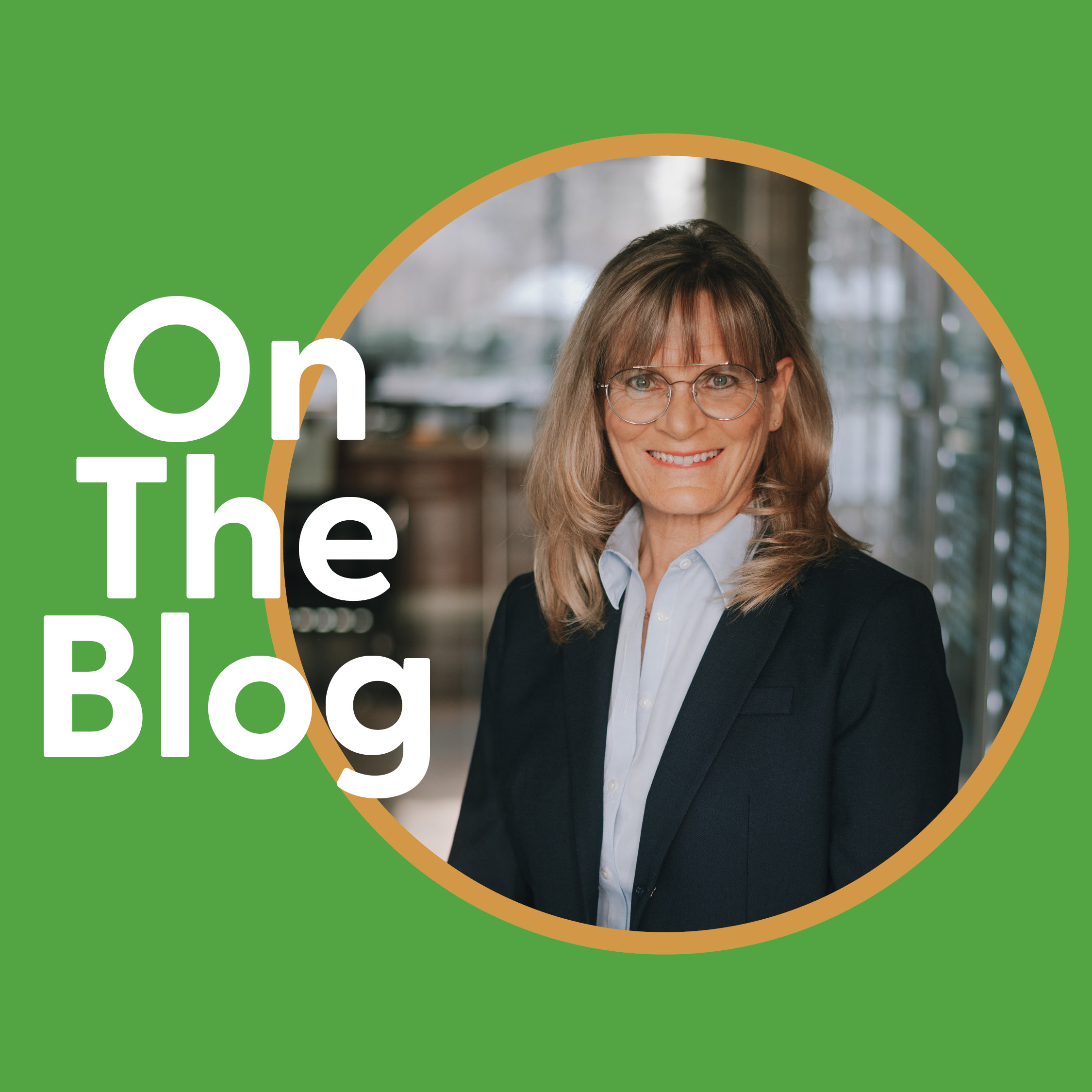
by Diane Mendenhall
Your first day at a new job is always a mix of nerves and excitement. There are new introductions to make, information to digest and spaces to navigate. I have had several notable first days in my career but one that sticks out is my first day at the Lincoln Community Foundation. It was May 28, 2020 – the ninth Give to Lincoln Day held during the peak of the Covid-19 pandemic.
I was introduced to Give to Lincoln Day when I served on LCF’s board of directors back in 2012. We were fortunate enough to be a part of the launch of Lincoln’s One Big Day of Giving. It was truly satisfying as a board member to watch the community embrace a local day of giving and see it grow year after year.
When I returned to LCF as a staff member and my first day as Vice President of Development approached – I was not sure what to expect. This was an extraordinary time for our community. Learning and business had gone remote, and our nonprofits were being called on like never before. What I witnessed that day really demonstrated how lucky we are to live in a community that cares.
Since public gatherings were not an option in May of 2020, LCF’s staff had a to pivot several elements of Give to Lincoln Day. Instead of an in-person festival in Tower Square, our Presenting Sponsor, West Gate Bank, offered the option for the first time for folks to drop off their donations at their Lincoln branches. Part of my role that day was venturing around town to pick up donations.
I remember returning to the office from these runs and opening the envelopes. One might include a check written for $5,000. The next looked as if someone had cleaned out their piggy bank. Whatever they have – they gave. Lincoln was there to answer the call during such a critical time for local nonprofits.
I have lived in Lincoln for 23 years and working for LCF has provided me with the opportunity to discover our network of nonprofits. You think you’re ingrained in the community and then you see the outpouring of support to more than 450 nonprofits on Give to Lincoln Day. Some may be small but mighty operations but because of Give to Lincoln Day – their missions get to be amplified.
On Give to Lincoln Day, everyone in our community can participate and be a philanthropist. We see this each year as we accept donations at our office building. One year a group of children approached our table, beaming with the $80 they had collected going door to door in their neighborhood. We also had a person who was currently experiencing homelessness stop by and hand us a dollar bill. These incredible displays of generosity fill you with a deep appreciation that we have a special day of giving to rally behind.
This year’s Give to Lincoln Day on May 24th offers us another opportunity to come together and support the nonprofits that give so much back in return. I, for one, can’t wait to get to work.
A Golden Gift for Our Community
Published on May 11, 2023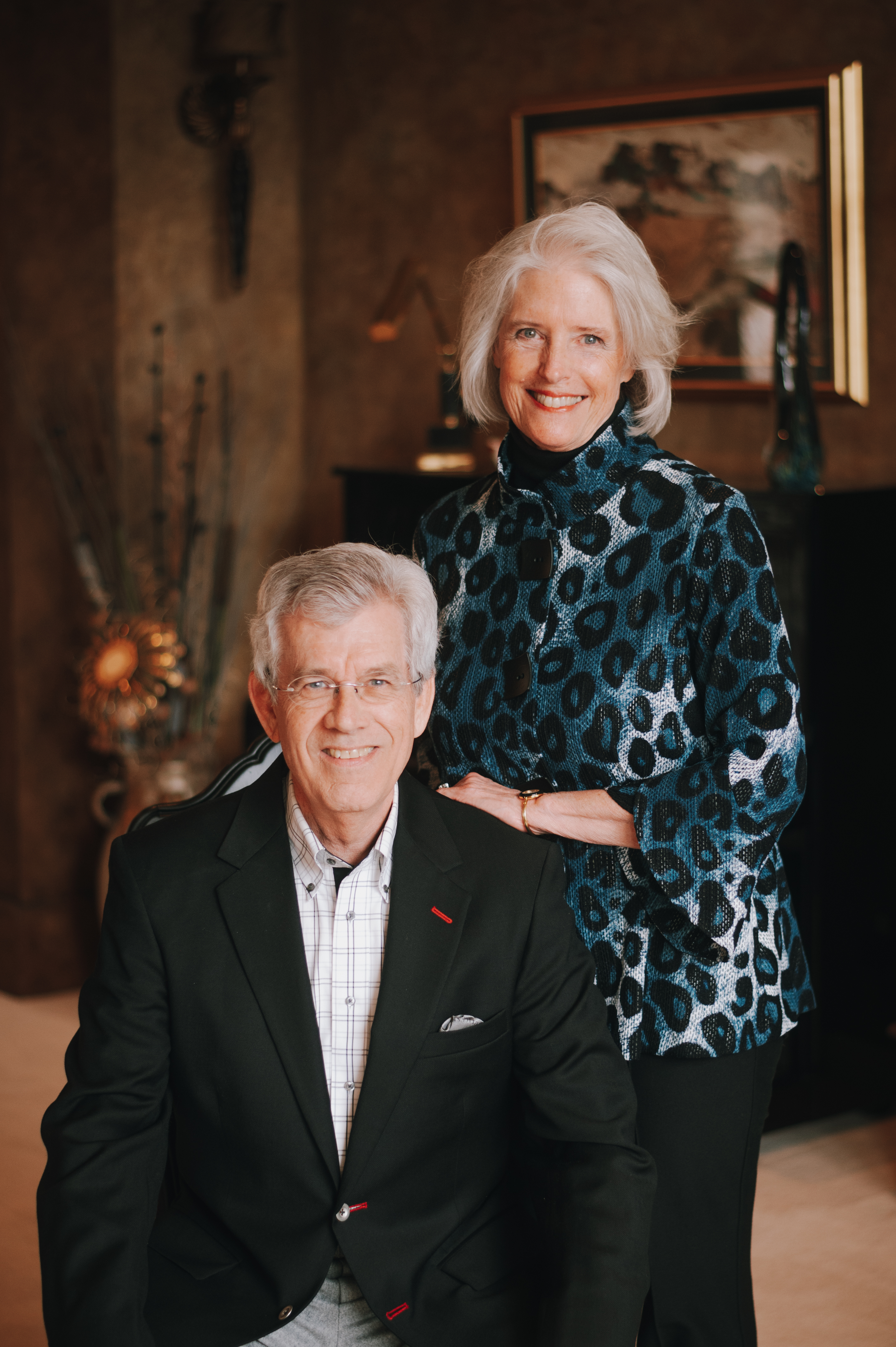 July 7, 1973 - A special date for Gene and Kristen Stohs. Gene was on a two-week break after wrapping up his first year of medical school. The two married in Kristen’s hometown of Hastings. Gene joked about the timing of their nuptials.
July 7, 1973 - A special date for Gene and Kristen Stohs. Gene was on a two-week break after wrapping up his first year of medical school. The two married in Kristen’s hometown of Hastings. Gene joked about the timing of their nuptials.
“After one year of living by myself in medical school, I was ready for married life,” he laughed.
Earlier this year the couple began to discuss how to celebrate their 50th wedding anniversary. Rather than hosting a party or taking a grand vacation, they decided to honor those who were a part of that special day with a donation in each one’s name to a nonprofit that is meaningful for them. From the wedding party to the guest book attendant, they started reaching out.
“We got in touch with everyone from our wedding,” said Kristen. “Even the minister, who is now retired in Iowa. So, we’ve had fun with this endeavor.”
Originally from Grand Island, Gene came to Lincoln to study chemistry at University of Nebraska-Lincoln (UNL). While at UNL, he was a member of the Sigma Alpha Epsilon Fraternity and starting pitcher and outfielder for the Husker baseball team for all four years.
He and Kristen met at a fraternity-sorority social, and the rest, as they say, is history.
Gene went on to receive his medical degree at University of Nebraska Medical Center, and he completed his residency in Obstetrics and Gynecology at Wesley Medical Center in Wichita, Kansas. When the opportunity arose to join a practice with Dr.’s Russell Gorthey and Palmer Johnson in Lincoln, Gene and Kristen were eager to put down roots.
“We both agreed that Lincoln would be an ideal community for us,” said Gene.
For Gene and Kristen, nonprofit board service was a catalyst for their philanthropy. Kristen is an active community volunteer, particularly within the senior community. In 2022, Kristen received the Keystone Award, reflecting her years of service with the Seniors Foundation, including a stint as president in 2007-2008. She also served as board president of the Friends of Lied from 2004 – 2005.
“The people in the nonprofit sector are so wonderful,” she said. “With board service, you find out how much our nonprofits give back to the city.”
Gene was Chief of Staff at Bryan Health from 2006-2007 and served on the Bryan Medical Center Board from 2004-2018.
“I met many business leaders during those years that expanded my outlook on the day to day lives of the people in Lincoln,” Gene reflected. “You don’t realize that even in a prosperous city like Lincoln, many are struggling.”
Now retired, Gene and Kristen enjoy spending time with their grandchildren and giving back to the city where they have lived since 1979. They are drawn to Lincoln Community Foundation’s Give to Lincoln Day every May.
“Every year we end up supporting more nonprofits because of Give to Lincoln Day,” said Kristen. “Looking through the list is wonderful, as it broadens our giving to nonprofits that are new to us.”
Gene and Kristen have opted to distribute a portion of their Individual Retirement Account (IRA) for this year’s giving day, using what is called a Qualified Charitable Distribution (QCD).
The federal government requires you to withdraw and pay taxes on a portion of your IRA fund balance when you reach a certain age. However, by using a QCD, those funds may be distributed directly to charitable organizations without paying taxes on the amount transferred.
"We have participated every year and with LCF offering the option of supporting nonprofits through a QCD – it’s an easy route to go,” said Gene.
With their anniversary quickly approaching, the Stohses can enjoy their golden gift to the community, knowing that their contributions go further through the Give to Lincoln Day matching funds.
“We look forward to Give to Lincoln Day because it just makes us feel good,” said Kristen.
“With more than 450 nonprofits participating, just think about what that says,” Gene reflected. “There’s so much need but also so much opportunity to do good together.”
Participate in Give to Lincoln Day via IRA QCDs
When you reach a certain age, the federal government requires you to withdraw or distribute a portion of your IRA investment and consequently pay taxes on the amount withdrawn. By using a Qualified Charitable Distribution (QCD) to support a qualified charity, those funds are transferred directly to that charitable organization, tax-free.
This year’s Give to Lincoln Day is Wednesday, May 24. Join Lincoln’s one big day of giving by using Qualified Charitable Distributions (QCDs) from your IRA to support your favorite registered nonprofits.
It is as easy as 1, 2, 3…
- Contact your IRA administrator about your annual distributions. Decide your total donation for Give to Lincoln Day this year.
- Request your IRA administration distribute an IRA QCD directly to Lincoln Community Foundation, mailing the distribution to the Foundation at 215 Centennial Mall South, Suite 100, Lincoln, NE 68508. Please request your IRA administrator to include your name on the check.
- Complete the LCF form for IRA QCDs gifts, listing the amount for each nonprofit you wish to support, and return it to the Lincoln Community Foundation. This form is available on the LCF website, or by contacting the Foundation.
For more information and other examples o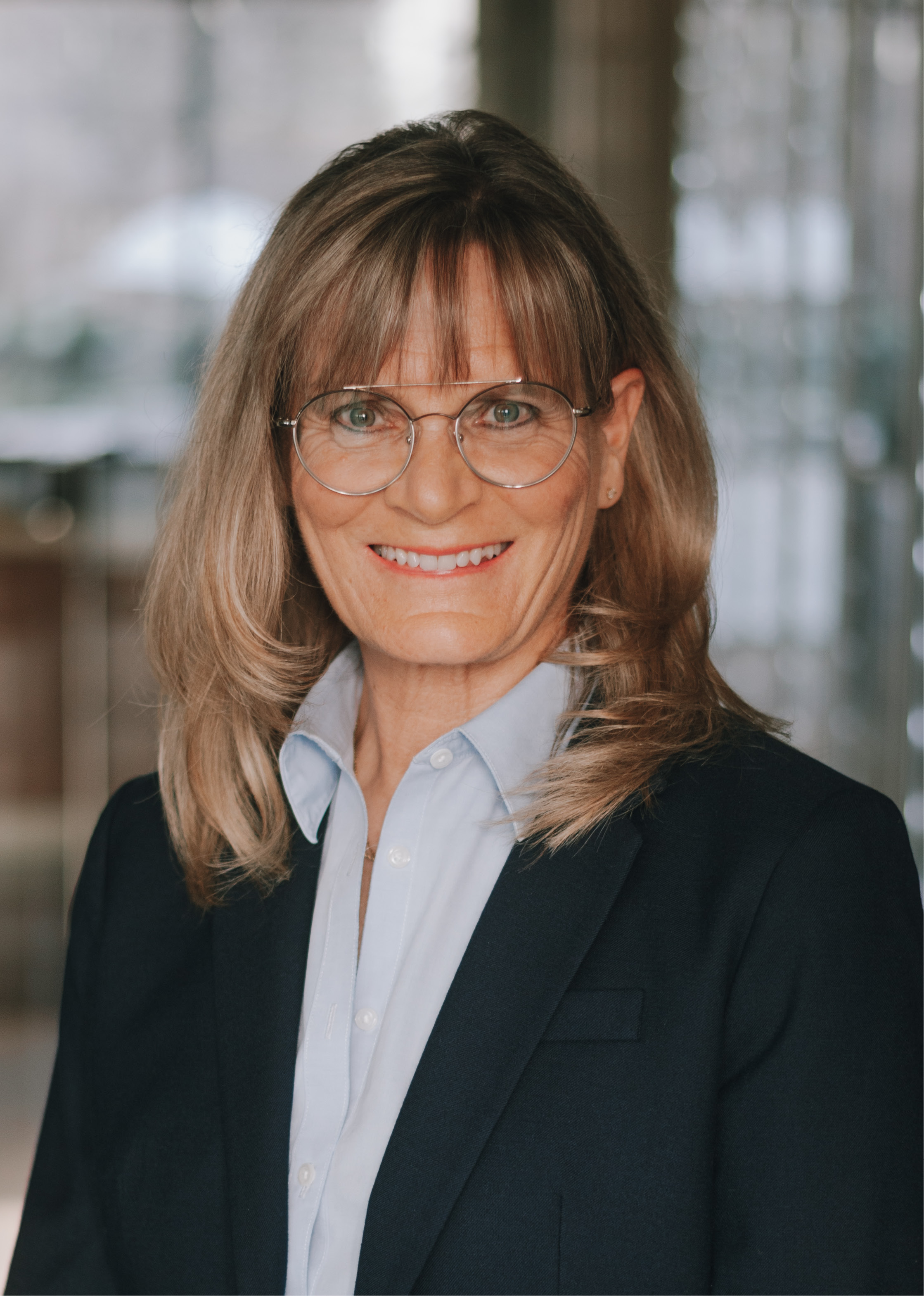 f ways you can use a Qualified Charitable Distribution to achieve your charitable goals, contact Diane Mendenhall at 402-474-2345 or dianem@lcf.org.
f ways you can use a Qualified Charitable Distribution to achieve your charitable goals, contact Diane Mendenhall at 402-474-2345 or dianem@lcf.org.
LCF Open Door Grants: Supporting Wellness in Our Community
Published on May 31, 2023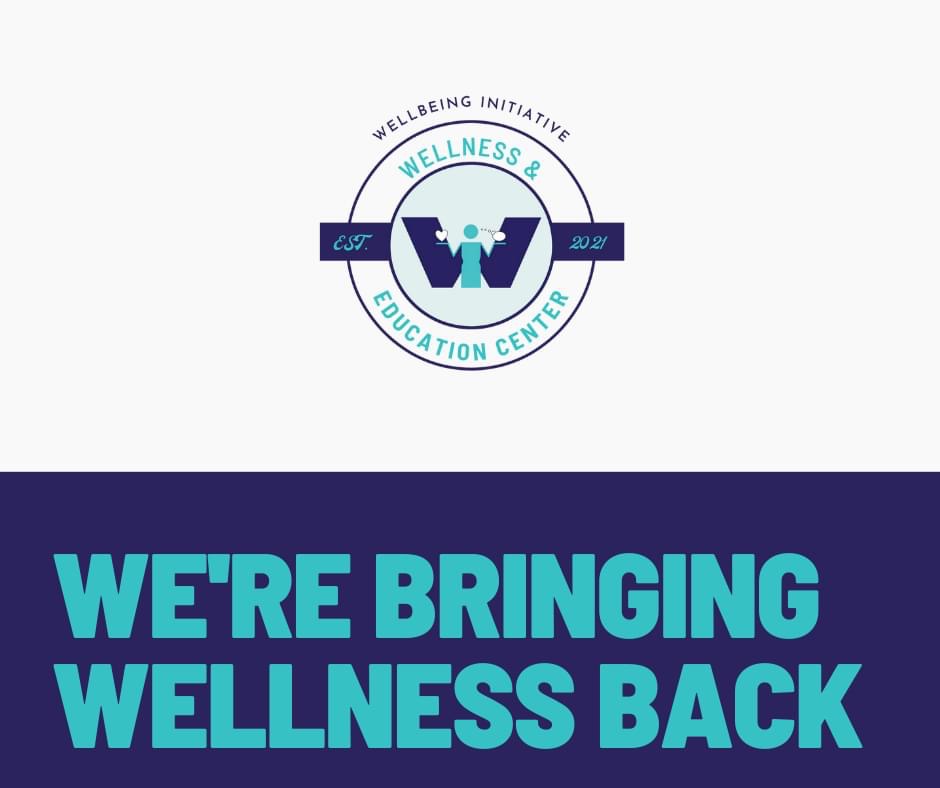
As the data reflected in the most recent Lincoln Vital Signs demonstrates, the need for mental health services is on the rise in our community.
“With everything that’s going on in our world, especially the last few years, people are reporting an increase of experiencing mental health and substance use challenges, and feelings of overload and burnout,” said Kjerstin Egger, Wellness and Education director for the Wellbeing Initiative.
“We see how this crisis directly impacts our community, and it just so happens that we have services that can be a great support to people,” she said.
The Wellbeing Initiative, a nonprofit organization developed, driven, and run by peers, is empowering individuals living with mental health and substance use challenges to reach their fullest potential.
“It is a place that is truly dedicated to making this world, our community, a better place to be,” said Kjerstin. “Every person that works here is committed to their own personal wellness and recovery and is sharing the possibility of recovery with others. We believe recovery and a sense of wellbeing is possible for everyone.”
The newest expansion of the Wellbeing Initiative is the Wellness and Education Center, created in 2021. The Center enables folks to come together and learn, grow, move, and connect in an environment that is warm, welcoming, safe, and inclusive.
In support of this important work, LCF recently awarded the Wellbeing Initiative an Open Door grant for increased operational expenses resulting from its rapid expansion. The grant will enable Wellbeing Initiative to continue to provide high quality services through each of its low-barrier programs with adequate human resource management, continuous quality improvement, and programmatic oversight.
“Recovery looks different for everyone, and includes people who experience challenges with substance use, mental or physical health, or people who are supporters of anyone experiencing those challenges,” said Kjerstin.
The center is free to the community and seeks to support individuals who are looking to explore whole health education and provide a space for community engagement in the face of recent isolation.
“Our community is calling on us at an increased time of need,” said Kjerstin. “We recognize that people are multidimensional, and wellbeing is multidimensional. We seek to offer space, education, and a community that supports all dimensions of a person’s wellness.”
Summer 2023 Newsletter
Published on Aug 15, 2023To catch up on the latest Lincoln Community Foundation happenings click here to download the newsletter.
Shifting the Power in Philanthropy
Published on Aug 25, 2023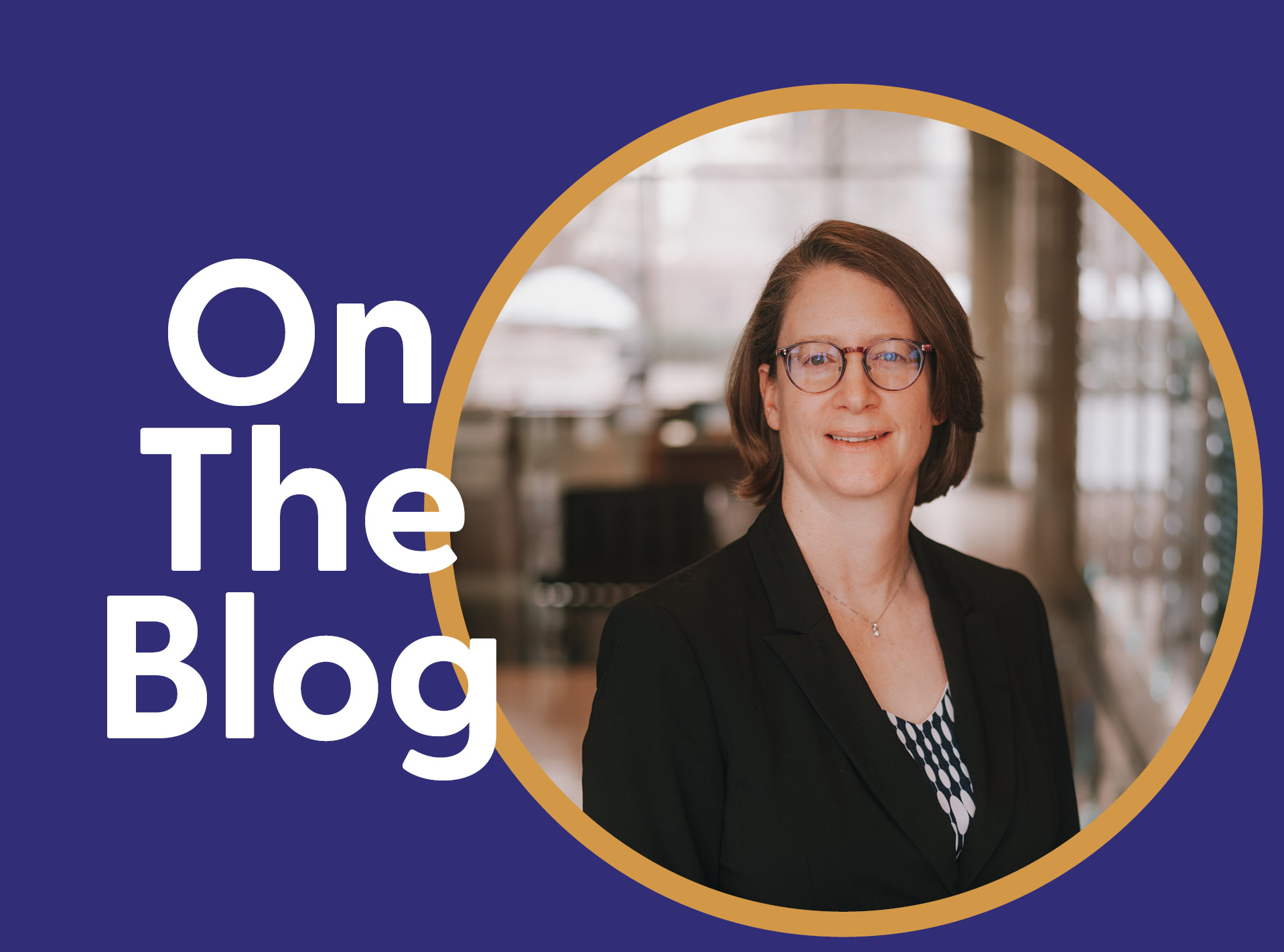
By Michelle Paulk
When grantmaking is grounded in our community, everyone has the opportunity to thrive.
In 1955, the Lincoln Community Foundation’s founding board of directors made our organization’s very first grant of $539.70 to Pinewood Bowl for the purchase of a movie and slide projector. Since then, LCF has continued to partner with local nonprofit organizations that contribute so much to our quality of life. We help people who love Lincoln direct charitable gifts to support our local nonprofits and make grants from discretionary funds held at LCF.
Although our intent to support the nonprofit community has remained steadfast since 1955, more recently, LCF has been taking an updated approach to giving by incorporating a practice known as trust-based philanthropy in our internal grantmaking processes.
Trust-based philanthropy reimagines the relationship between funders (like LCF), nonprofits and the communities they serve by addressing the power imbalances that can exist within our ecosystem. By making the commitment to building relationships and learning from the community, LCF seeks to make a healthier and more equitable grantmaking process.
One of the important steps we took towards becoming a trust-based funder was shifting our discretionary grantmaking process in 2019 to our Open Door Grants program. Open Door Grants provide flexible operating and program grants to support compelling needs and opportunities for our Lancaster County nonprofit partners. Through unrestricted funding, grants may be applied to operations, programs, or capital projects. This gives our grantees the flexibility to apply for funding when it makes sense for their organization and apply for where the dollars are needed most.
Applicants can apply for funding up to $10,000 through a simplified, low-barrier application process. With Open Door Grants, there is no need for nonprofits to hire a grant writer. Applications are reviewed on a monthly basis which supports innovation, emergent access and sustainability.
Participatory grantmaking is another way foundations are reshaping philanthropy. Funders are recognizing that they are not the experts in the challenges and potential solutions for their communities. By giving community a direct role in funding decisions, power is shared with community members who know what is needed and best for the community.
A great example of participatory grantmaking is the Strong Neighborhoods Grants program. LCF and Civic Nebraska along with members of the Community Builder Coalition recently unveiled the new program to support neighborhood-based, resident-led programs and projects across Lincoln. LCF granted $25,000 to support and equip neighborhood stakeholders to achieve their neighborhood development goals.
Strong Neighborhoods grants may include neighborhood events that bring neighbors together and strengthen relationships in the community, projects that enhance the safety, beauty or social connections within a neighborhood or develop leadership skills and roles of neighborhood residents. Each project may receive a grant of up to $1,000.
The first round of grants included funding for sustainable landscaping in the Near South neighborhood, a free community workshop day on rewilding yards with the South Salt Creek Community Organization, and a community art space and screen-printing studio at Proyecto Cultural – a nonprofit dedicated to the preservation of local Hispanic Culture.
68 years after our very first grant, I am proud of our current board of directors’ commitment to this journey. We will continue to do our homework, learn about our community and act in a responsive and equitable way as a funder. This will require continuous examination of our culture and practices to be the best resource and authentic partner for our local nonprofit organizations.
Lincoln Community Foundation Welcomes New Board Members
Published on Mar 1, 2022The Lincoln Community Foundation welcomes five new members to its board of directors: Eric Buchanan, Buffett Early Childhood Fund; Mark Hesser, Pinnacle Bank; Kile Johnson, Johnson Flodman Guenzel & Widger Law Firm; Susie Keisler-Munro, Assurity Life Insurance Company and Lauren Pugliese, Nelnet.
Officers for 2022 include Marilyn Moore, board chair, retired Bryan College of Health Sciences; Mark Hesser, vice-chair, Pinnacle Bank; Ryan Beckman, treasurer, Olsson; Linda Major, secretary, retired University of Nebraska-Lincoln and Kim M. Robak, past chair, Mueller Robak LLC.
The Lincoln Community Foundation, established in 1955, strives to continually enrich the Lincoln community by promoting and achieving perpetual philanthropic support. The Foundation has distributed more than $195 million in grants to nonprofit organizations that have improved the lives of thousands of residents.
LCF recognized for national philanthropic standards
Published on Mar 24, 2022Lincoln Community Foundation recently received re-accreditation with the nation’s highest standard for philanthropic excellence. National Standards for U.S. Community Foundations® establish legal, ethical, effective practices for community foundations everywhere.
The National Standards for U.S. Community Foundations® program requires community foundations to document their policies for donor services, investments, grantmaking and administration. With more than 500 community foundations already accredited nationwide, the program is designed to provide quality assurance to donors, as well as to their legal and financial advisors.
"When donors make a charitable bequest or establish a fund, they are putting their trust in us," said Alec Gorynski, president of Lincoln Community Foundation. "They are counting on us to manage the investment wisely and honor their charitable wishes. The accreditation says our house is in order."
The National Standards for U.S. Community Foundations® program was established in 2000 in cooperation with the Council on Foundations. For more information about National Standards, visit www.cfstandards.org.
Garden Performance Series Returns May 17
Published on May 15, 2023The Foundation Garden Performance Series will present its annual series of events on Wednesdays from May 17th through September 13th. All performances will be held from 12:00-1:00 pm at the Lincoln Community Foundation Barbara Bartle Garden (1415 N Street) with the exception of the Give to Lincoln Day performance on May 24th, which will be held at the Lincoln Community Foundation Tower Square at the corner of 13th street and P street.
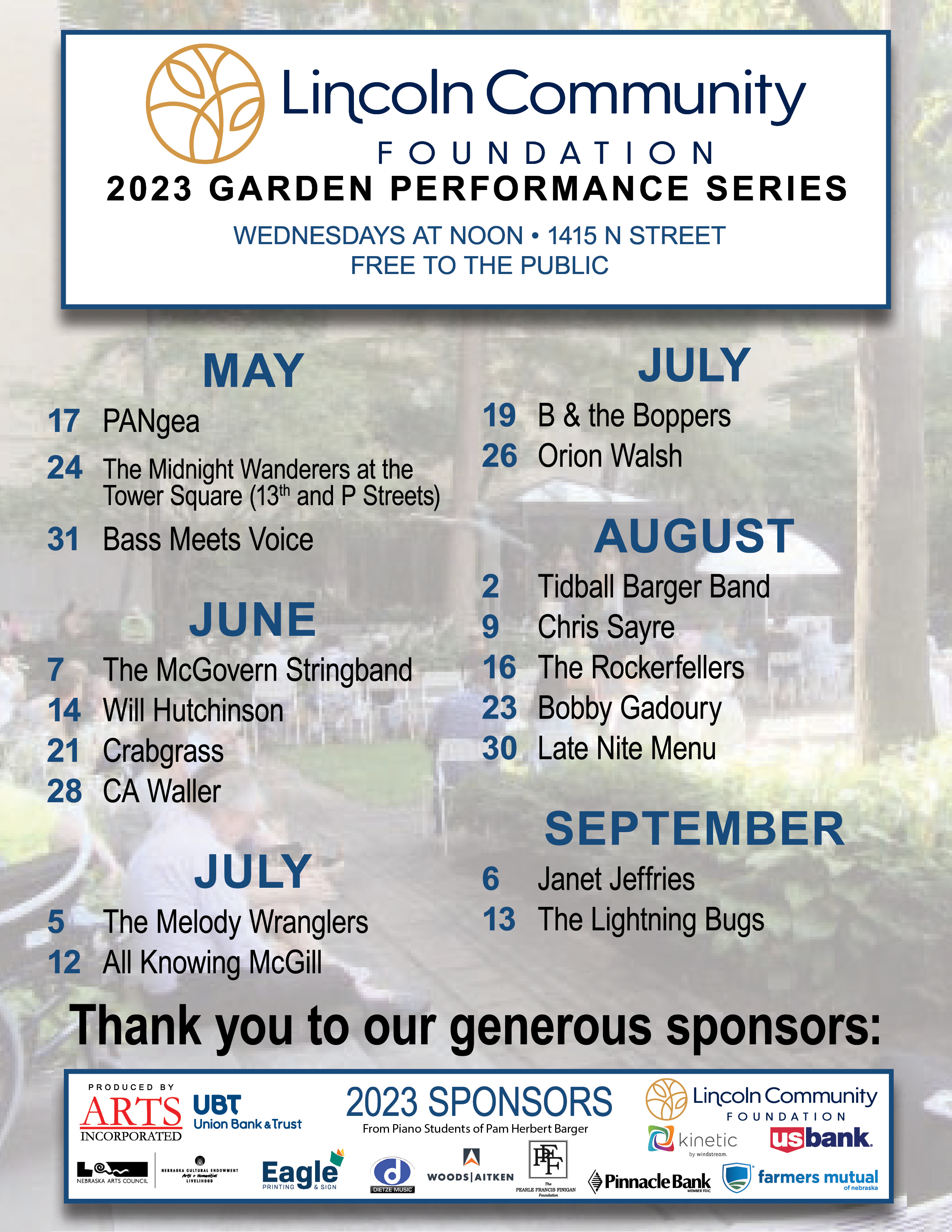
An Absolute Win-Win
Published on May 11, 2022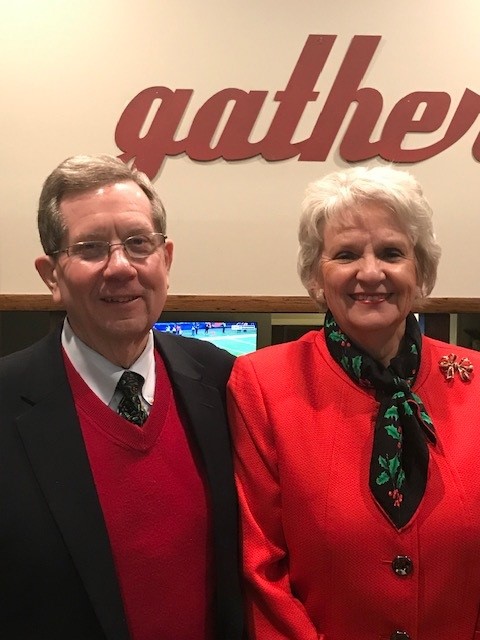 Craig and Devon Ames both grew up amidst a spirit of generosity – always aspiring to an “attitude and heart that are open to helping others.”
Craig and Devon Ames both grew up amidst a spirit of generosity – always aspiring to an “attitude and heart that are open to helping others.”
“Devon and I believe you find joy in giving, seeing how you can use your time, talent and treasure to support your community,” said Craig.
In fact, Craig remembers his mother sitting down on a Saturday night, stuffing cash into an envelope for the offering plate on Sunday morning. “Devon and I have been married for 50 years, but we both grew up in households that modeled the spirit of philanthropy, and we have never forgotten how our parents showcased those lessons,” he said.
Craig stressed that one person can do so much with a simple contribution. “No, I cannot change generational poverty, but I can give money to an organization like City Impact,” he emphasized. “I can’t cure cancer, but I can give to the American Cancer Society, knowing they are working on a cure.”
Craig and Devon are drawn to the Lincoln Community Foundation’s annual Give to Lincoln Day each May because it is such a meaningful opportunity.
“It is a great event, and its success has grown so much in the amount raised and number of participating organizations, and the match that the Foundation provides,” Craig said. “Our family has been blessed with a certain amount of disposable money, and we see it as the Lord’s money. Give to Lincoln Day offers a chance to use it where it makes an impact.”
Devon and Craig first met as college students at Wheaton College, just outside Chicago. Eventually Craig enrolled in the Army ROTC and served in Vietnam, while Devon taught high school. After returning from service, Craig used the GI Bill to earn his master’s in hospital administration. After first working in Minneapolis, the Ames’ moved to Lincoln, and Craig took a position at Bryan Hospital in 1988.
Craig and Devon had two children when they moved to Lincoln, and they found Lincoln to be a wonderful place to balance family and work. “Lincoln’s such a big-small town, a state capital, with a university, parks, cultural events.”
He served as Chief Operating Officer at Bryan until his retirement in 2009 but wasn’t ready to play golf every day. Instead, Craig volunteers, serves on a variety of community boards, and has focused on giving back to the community.
Devon and Craig encourage people to support Give to Lincoln Day by exploring all the possible philanthropic tools available now. He and Devon have chosen to distribute a portion of their Individual Retirement Account (IRA) for the giving day, using what is called a Qualified Charitable Distribution (QCD).
Craig explained that the federal government requires you to withdraw and pay taxes on a portion of your IRA when you reach a certain age. However, by using a QCD, those funds can be transferred directly to charitable organizations without paying taxes on the amount transferred.
“It’s kind of a no-brainer,” Craig said. “You support something you care about and reduce your tax burden. We give money to charity, and we save on taxes, and we also support a cause dear to us. It’s an absolute win-win, such a great deal.”
For more information and other examples of ways you can use a Qualified Charitable Distribution to achieve your charitable goals, contact Diane Mendenhall at 402-474-2345 or dianem@lcf.org.
Celebrating Leadership & Generosity
Published on Aug 14, 2023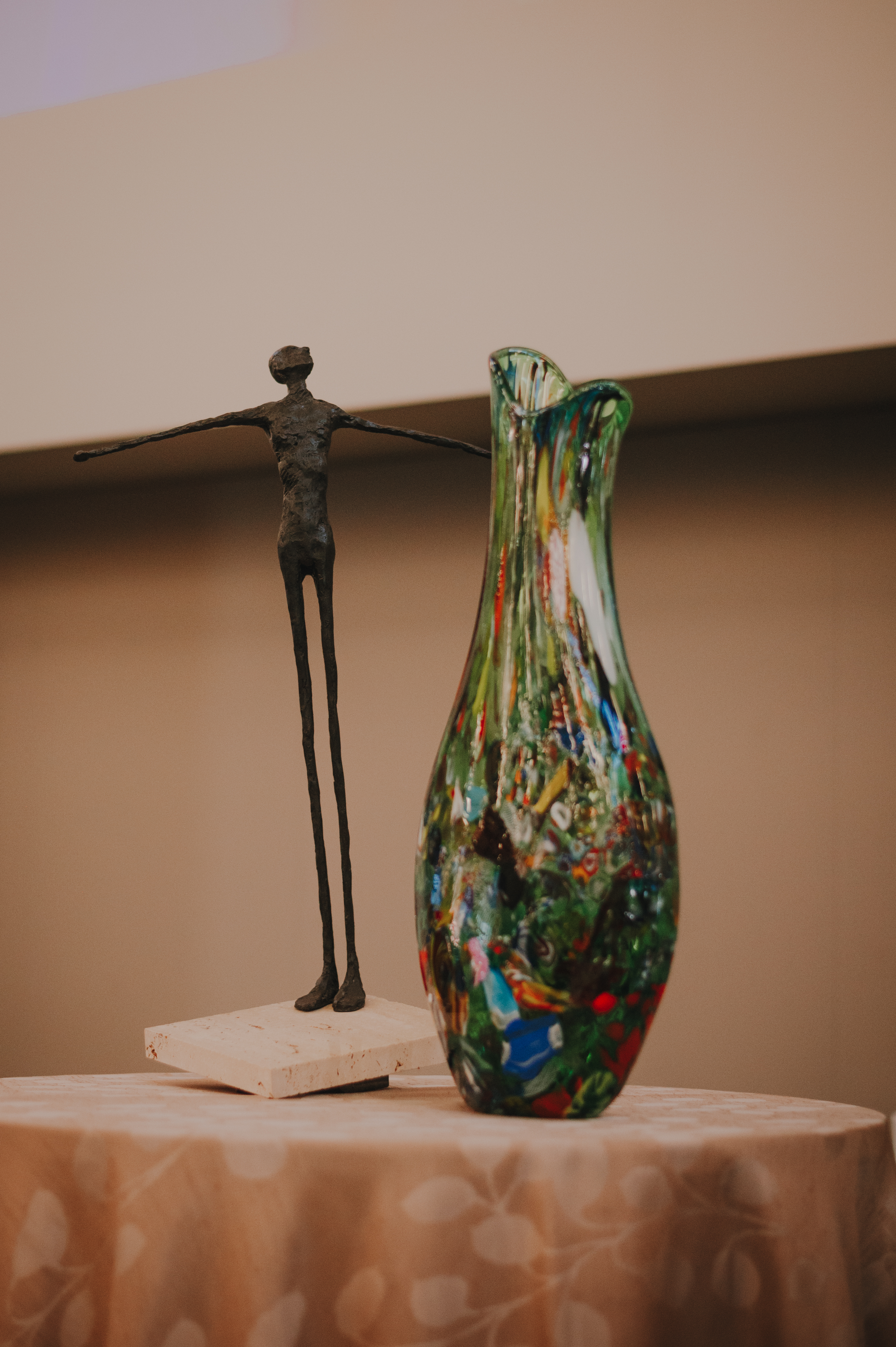
The Charity Award (left) by artist Larry Roots and the JoAnn Martin Civic Leadership Award (right).
Nearly 300 community members gathered in early May at the Nebraska Innovation Campus Conference Center for the Foundation’s annual donor recognition event. This year the event included two awards that celebrate extraordinary displays of generosity and leadership.
Presented to Bill and Marilyn Cintani, the Charity Award recognizes the outstanding philanthropic contributions of an individual or couple in our community. And this year the Foundation added a new award, the JoAnn Martin Civic Leadership Award, presented to Dr. Mae Colleen Jones, which recognizes and celebrates exemplary community leadership. The honorees for both these awards were selected by the Foundation’s Nominating Committee from an extensive list of worthy leaders in our community.
The Charity Award
Bill and Marilyn Cintani became the 12th recipients of the Charity Award. Bill and Marilyn are known for their generous contributions to so many areas of the community, and for their work in partnership with the Lincoln Community Foundation.
With the help of Tom and Lisa Smith, the Foundation approached Bill and Marilyn about the award before Bill’s passing in December.
“We are honored they accepted, and that we have the opportunity to celebrate Bill’s legacy as a community leader and philanthropist and as our trusted advisor and friend,” said LCF President/CEO Alec Gorynski. “His deep love for Lincoln is carried on through Marilyn, their children, and their grandchildren, who are here with us today.”
Bill brought his vision and leadership to the Foundation’s board from 2012-2017. During this time, he saw the positive influence matching gifts can have in encouraging donations via Give to Lincoln Day. Inspired by this concept of leverage, Bill and Marilyn pledged matching dollars from their personal fund for new donor advised funds established at the Foundation.
Bill and Marilyn’s son, Brian, shared that leverage was often something Bill would consider with his charitable giving.
“It was important to him that there be a multiplier effect on the some of the donations he’d make,” said Brian. “He felt like if he could use the money at the Raikes school to fund a summer internship, it would function as an investment and not just a grant. He wanted to see it grow and multiply.”
By contrast, Marilyn’s heart guides the issues she supports, focusing her philanthropy on children and young families by extending resources to support those enduring challenging situations.
“My dad had passion in philanthropy, and so does my mom, but they varied,” said daughter Laura Frantz. “My mom’s main passion in her life is her family so I think that trickles down to where she’s passionate about giving.”
Bill and Marilyn’s understated approach to philanthropy has been steady and caring, emphasizing new opportunities for those who might not otherwise have them. They epitomize what it means to give, act and lead.
“The Charity Award was really established so the community had a way to thank an individual or a couple for their wonderful leadership, their philanthropy and their service,” said former LCF President Barbara Bartle. “When I think about those criteria, I can think of no one more deserving of this award than Bill and Marilyn. They fit in every category.”
The JoAnn Martin Civic Leadership Award
The JoAnn Martin Civic Leadership Award was established to recognize an individual who has demonstrated a strong commitment to civic leadership. The Nominating Committee defined this as an individual that possesses servant leadership qualities and expresses their servant leadership through volunteer service to our community, including leadership service with nonprofit and civic organizations.
A group of community leaders, including leaders from Ameritas and NRC, first approached the Foundation about presenting this award to JoAnn Martin shortly before her passing in 2021. NRC also created an endowed fund at the Foundation to sustain JoAnn’s leadership legacy. This endowment will grow and sustain the Women in Business Leadership program in partnership with the Lincoln Chamber of Commerce.
JoAnn Martin was a member of the Foundation Board of Directors and was to serve as board chair in 2022. For this reason, and in recognition of the Foundation’s emphasis on community leadership, the award founders and the Martin family agreed that the Foundation’s annual donor recognition event was the perfect backdrop for the JoAnn Martin Civic Leadership Award.
Now retired, Dr. Mae Colleen Jones devoted her career to academia, serving most of those years at UNL. Dr. Jones’ legacy of leadership throughout her professional career as well as her extensive history of extraordinary community service qualified Dr. Jones as the ideal candidate for this award.
The Nominating Committee identified nearly 20 unique instances of Dr. Jones’ formal community service, including volunteer leadership roles with the United Way, Leadership Lincoln, Friendship Home, the Sheldon Art Museum, the Lied Center, and the Lincoln Community Foundation.
“In fact, in early conversations about Dr. Jones as the potential recipient of this award, we would often hear folks exclaim, ‘Of course, Colleen is involved in everything’,” said Alec.
Colleen is a founding chapter member and officer with her sorority, Alpha Kappa Alpha, and President of UNL’s Melvin W. Jones Scholar Community, named for her late husband. Cynthia Milligan, who served as Dean of UNL’s College of Business Administration when Colleen was a faculty member in the Management Department, commented on her impact and her influence.
“I think her major contribution was the Jones Scholars,” Cynthia said. “I suspect if one had the opportunity to talk to those students, they would say that she was one of the major people in their lives giving them the impetus to stay and do well at the University and to move on.”
As Dr. Jones became the second recipient of the JoAnn Martin Civic Leadership Award, she reflected on the journey that brought her and Melvin to Lincoln. They had both decided early on to support one another’s professional paths and “bloom where they were planted.”
“When Melvin died, I was reminded of a Maya Angelou quote, ‘You may not control all the events that happen to you, but you can decide not to be reduced by them’,” she said. “It was not difficult for me to step up and become more visibly active in Lincoln – because the perspectives of Black people, women and ‘transplanted’ new Nebraskans are essential to the health, growth, and future of this community.”
Colleen’s sorority sister, Karen Williams, commented on how Colleen’s leadership mirrors that of the award’s first recipient and namesake.
“I believe one of the things that JoAnn Martin said was that it only takes one person to volunteer to make things happen, and Colleen is definitely proof of that,” Karen said. “The philosophy that she shares with so many people, the hard work that she’s done for so many organizations and just the woman that she is with the biggest heart and the kindest spirit – I can’t think of anyone more deserving.”
Playbook: Helping clients organize their giving through a donor advised fund
Published on Jun 3, 2022
Your clients will arrive in 15 minutes. You’re reviewing the file. Everything is in order. The estate planning documents are up to date, you’re ready to share the latest investment results, and you are prepared to debrief the 2021 tax season and make tax planning recommendations for the remainder of this year. It sounds pretty typical up to this point, right?
As you continue to scroll through the materials, you see the names of several charitable organizations that your clients have supported every year for at least a decade. Ah ha! This is an opportunity to add even more value to your clients. Easy for a busy advisor to overlook, charitable giving habits are actually an important window into helping a client make planning decisions around their philanthropic intentions.
Here’s a simple playbook to guide you through a client conversation to begin establishing a charitable giving plan using a donor advised fund at LCF.
–Call your clients’ attention to their charitable giving history. They might not even be aware of how much they are giving or how long they’ve been supporting their favorite charities.
–Gather more information about why the clients support those particular causes. Family tradition? Past involvement as a beneficiary of an organization’s services? Desire to impact a particular area of need?
–Talk with your clients about their community involvement. Do they serve on any boards of directors? Do they volunteer at local organizations?
–Review any charitable giving provisions in the current will or trust. Are the clients leaving a bequest to favorite charities?
–Ask your clients if they’ve ever considered organizing their giving through a donor advised fund. If they are not familiar with donor advised funds, perhaps offer a quick primer, and certainly offer to introduce the client to a member of our team.
–Briefly mention that a donor advised fund can be an effective alternative to a private foundation, thanks to fewer expenses to establish and maintain, maximum tax benefits (higher AGI limitations and fair market valuation for contributing hard-to-value assets), no excise taxes, and confidentiality (including the ability to grant anonymously to charities).
–Also mention that a donor advised fund at LCF is frequently a more effective choice than a donor advised fund offered through a brokerage firm (such as Fidelity or Schwab). That’s because, at Lincoln Community Foundation, the donor is part of a community of giving and has opportunities to collaborate with other donors who share similar interests. In addition, the donor is supported in strategic grant making, family philanthropy, and opportunities to gain deep knowledge about local issues and nonprofits making a difference.
Lincoln Littles: Building Relationships to Elevate Early Childhood
Published on Mar 15, 2023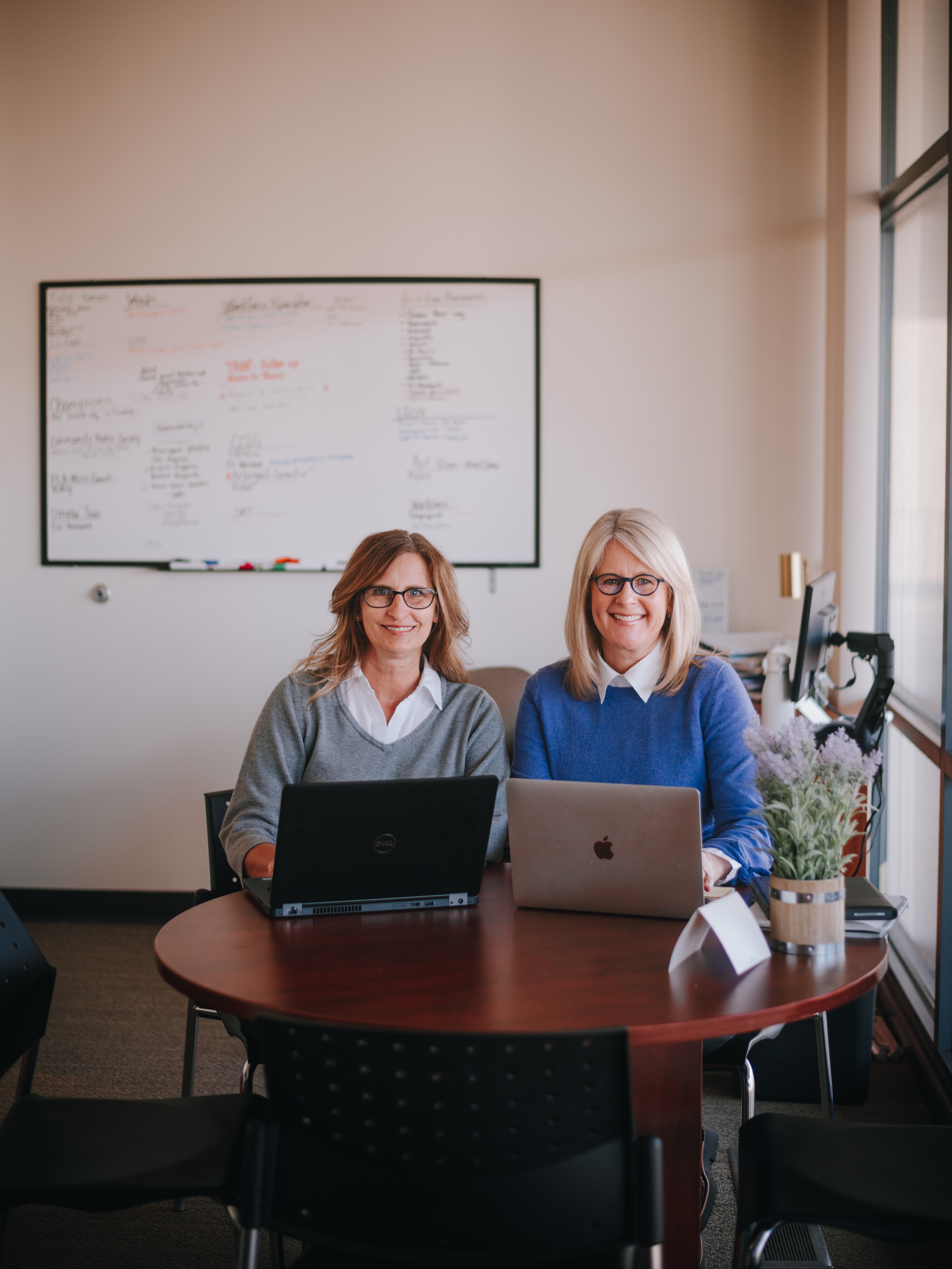
The office of Lincoln Littles is bright and bustling, overlooking the skyline of downtown Lincoln. On the wall, a whiteboard notes the magnitude of work and collaboration being done to enhance Early Childhood Education in our community via meetings, projects, and to-do lists.
What might feel inundating to some – especially as an office of two – energizes Anne Brandt and Suzanne Schneider. As they speak about their work, their passion is palpable. After two years of helping Lincoln childcare providers navigate the pandemic, Anne and Suzanne are back together and working full steam ahead on complex issues surrounding early childhood.
“In many ways it feels like we are starting over,” said Lincoln Littles Executive Director Anne Brandt. “We’re getting back to the broader work of affordability and quality. It’s great because we know so much more now than we did before.”
Associate Executive Director Suzanne Schneider agreed.
“So much of our work has been supporting childcare providers through the challenges of the pandemic,” said Suzanne. “How could we build quality when folks were struggling to keep their doors open? Now we feel that we can dig in and strengthen that focus.”
The mission of Lincoln Littles is to provide opportunities for all children to have access to high quality early care and education, ensuring they are ready for school and a life of learning. Lincoln Littles is transforming the landscape of early childhood by expanding high-quality choices and supporting families, early childhood providers, teachers, businesses, and our community.
One way Lincoln Littles plans to deepen their focus on quality early childcare is by adding a new position to the office. Thanks to funding from the Buffett Early Childhood Fund, Community Health Endowment and Woods Charitable Fund, a full-time Wellness and Workforce Navigator position will focus on assisting childcare providers with staff retention and recruitment.
“Childcare providers are the workforce behind our community’s workforce,” said Anne. “If we don’t have places for children to go, we can’t work, and ultimately our community isn’t as vital. This position will wake up every single day and think about how they can help the childcare workforce.”
For Anne and Suzanne, addressing the issues of quality and affordability doesn’t stop with providers. They also consult with local businesses on how they can include childcare as an employee benefit through their Employee Engagement program, a partnership with First Five Nebraska. They work with employers to survey their employees and determine their needs.
“Businesses might not be aware their employees are struggling with childcare,” said Suzanne. “There are many options available for employers to help, including subsidizing the cost of childcare, starting a new on-site program or connecting employees with a current local provider.”
Anne and Suzanne’s efforts throughout the past two years have embedded their role as a key collaborator.
“We connect folks to resources, much like a district office or a chamber of commerce for early childcare,” said Anne.
The outcomes of their relationships have been life changing for the people Lincoln Littles has helped.
“Recently we had a father call who suddenly found himself in a situation where he was a single parent. This left him in need of childcare so that he could continue working,” said Suzanne.
“We were able to contact a provider, who made an adjustment to get the family in. And with the help of our tuition assistance program, the provider could cover their tuition while the family waited to receive state subsidy. We also worked with his employer to let them know this family had support during such a difficult transition.”
As reflected on the office whiteboard, the vision for Lincoln Littles is to continue supporting our community’s early childcare landscape while ultimately building capacity for a more robust organization.
“When it comes to ages zero to five, we want to be the focal point,” said Anne. “With community investment, we can certainly grow this work.”
To learn more and donate, visit www.LincolnLittles.org.
Proposed legislation: Is better deductibility back on the table?
Published on Apr 5, 2023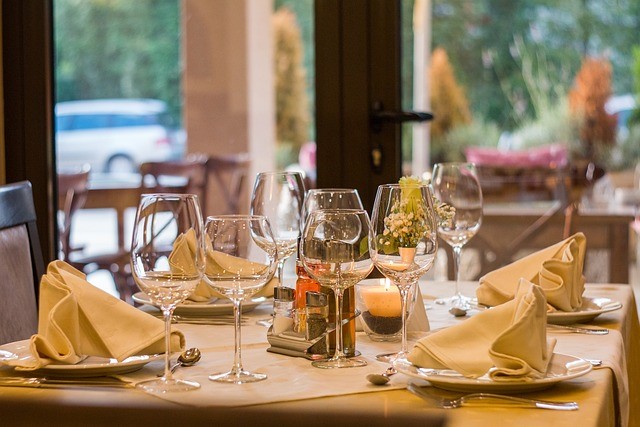
Charitable deduction legislation ebbs and flows. Proposed reform efforts come and go, resulting in the occasional change to the provisions of the Internal Revenue Code governing charitable giving. At the same time, popular charitable giving techniques evolve and grow over time, frequently creating new opportunities for your clients to support the causes they love.
For instance, donor advised funds (DAFs) were first deployed as a charitable giving technique in the 1930s—long before their popularity ascended in the 1990s—and recently reached record highs.
Similarly, Qualified Charitable Contributions (QCDs) were codified in 2006 through legislation that initially approved the technique for just about a year, followed by several legislative extensions before QCDs were made permanent by the Consolidated Appropriations Act of 2016. And while QCD annual limits ($100,000 per person and $200,000 for couples) have remained constant in the past, those will change when indexed for inflation under the new laws passed at the end of last year.
Now, like then, legislation pending in Washington—if realized—may influence the techniques your clients deploy to meet their charitable goals.
Donor advised funds and private foundations
Currently, contributions to donor advised funds by private foundations fall under the same rules as contributions to donor advised funds by individuals, in that the funds are not subject to any particular timing requirements to be distributed to charities. Despite the lack of a formal pay-out requirement, however, the 10-year average aggregate pay-out rate from all donor advised funds is a whopping 22.2%, and the 2021 aggregate pay-out rate was a record 27.3%.
In contrast, private foundations are subject to a 5% annual distribution rule. Under proposed legislation (see page 139 of the Treasury’s explanation document), while it would not affect contributions to donor advised funds by individuals, contributions to donor advised funds by private foundations would need to be distributed “by the end of the following taxable year,” and documented as such, to qualify for the 5% private foundation distribution requirement. Time will tell whether these proposed changes make it into law.
Beyond the standard deduction
Tax deductibility of donations has changed with the times, and another piece of in-process legislation, if passed, would again reward charitable-minded tax filers who do not itemize, at least for tax years 2023 and 2024.
The Charitable Act, as it is known, would allow deductions of up to one-third of the applicable standard deduction for non-itemizers. As background, under the higher standard deduction passed as part of the Tax Cuts and Jobs Act of 2017, many donors who’d previously deducted their charitable donations lost that ability. Indeed, to the dismay of many nonprofits, tens of millions fewer households itemized their deductions in the years following the increased standard deduction, removing part of the incentive to make charitable gifts. The Charitable Act would strive to alleviate some of the negative impact on charities.
Recent history shows that taxpayers respond positively to deductibility opportunities, with 42 million taxpayers taking advantage of the $300 "universal" charitable deduction offered in 2020, and 24% of those having gross income of less than $30,000. That opportunity was extended in 2021 but discontinued for 2022. Notably, polling has shown strong support for restoring the universal charitable deduction.
With potential restored deductibility in the works—and again, it’s early in the process and not yet law—keep in mind that the Lincoln Community Foundation is here to help your clients organize their charitable giving through a donor advised or other type of fund.
As the tradition of change continues for charitable giving, LCF will continue to be your source of smart, efficient and secure gifting.
Summer legislative updates–and looking ahead to sunsets
Published on Aug 3, 2022
Reconciliation legislation is back in play, and while it includes a few tax provisions (e.g., adding a corporate minimum tax and eliminating the carried interest tax break), the proposed legislation is far less sweeping than reforms proposed in earlier versions. Notably, though, the proposal includes $80 billion in budget increases for the Internal Revenue Service, which will help shore up the IRS’s expertise and pay for enforcement efforts to collect taxes. Taxpayers and their advisors can likely expect greater scrutiny from the IRS on complex or aggressive transactions in the years ahead if this legislation passes.
Philanthropic individuals and families and their advisors also continue to watch the status of SECURE 2.0 because of the enhancements it proposes to the rules for Qualified Charitable Distributions. SECURE 2.0 could pass through Congress by the end of the year.
While potential tax reform through budget reconciliation legislation may be top of mind for taxpayers and advisors, it’s also important to remember that the Tax Cuts and Jobs Act of 2018 (which seems like a long time ago!) included several changes to the tax rules for individuals that are set to expire after the close of the 2025 tax year. Unless those provisions are extended, the sunsets could impact tax planning for philanthropic families and individuals. For example, the standard deduction will decrease by nearly half, adjusted for inflation. This means some clients may once again itemize their deductions, thereby influencing charitable giving income tax strategies. In addition, the estate and gift tax exemption amount, increased under the Tax Cuts and Jobs Act, will be cut down so that in 2026 the exemption amount will be approximately $6.2 million adjusted for inflation. This will impact not only estates valued above the current exemption amount of $12.06 million but also estates valued in the $6 to $12 million range. Because assets transferred through lifetime gifts and bequests to charitable organizations are not subject to gift or estate tax, philanthropy may be an effective tax planning tool for even more taxpayers after 2025.
As your clients begin to set their philanthropic goals for the next several years, the development team at LCF is happy to help structure long-term strategies to maximize not only your clients’ tax benefits, but also the benefits to the community. Our team at LCF is deeply familiar with the short-term, mid-term, and long-term needs of our community, as well as the nonprofits that are working to address those needs. We will work with you to help your clients support community needs now and in the future through donor advised funds, unrestricted (Lincoln Forever) funds, field of interest funds, designated funds, and other vehicles established at the Lincoln Community Foundation. We strive to align the interests of everyone involved: your client, the charities your client wants to support to improve our community, and you in your trusted role as your client’s advisor.
The “i’s” have it: Two key topics for client meetings
Published on Sep 6, 2022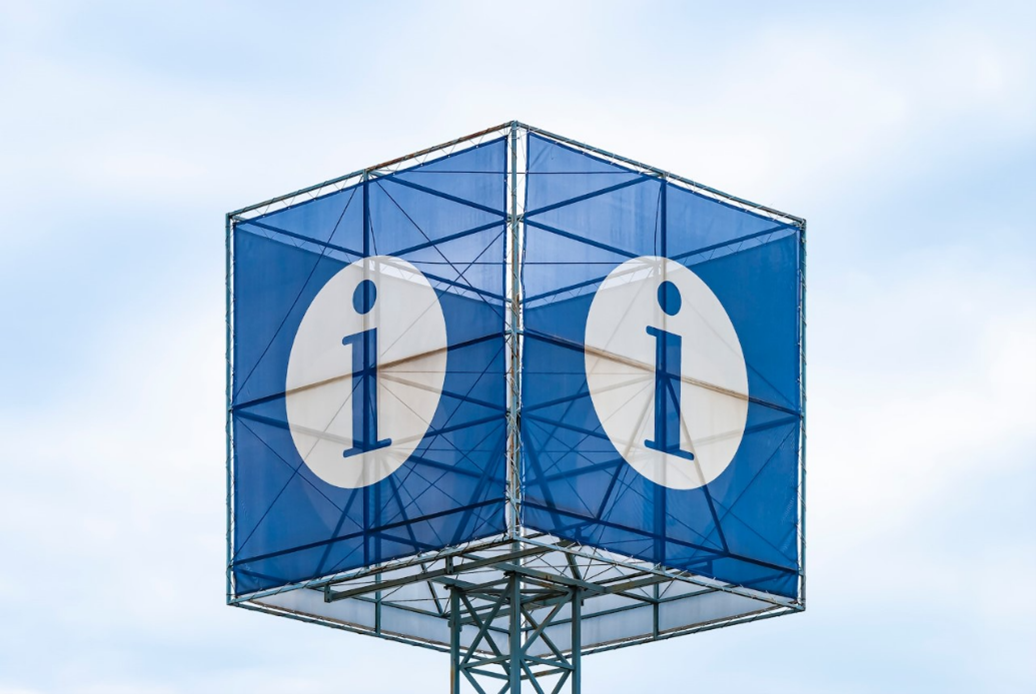
Inflation, interest rates, income tax, and the IRS are ever-present topics during discussions with your clients. Right now, there’s a lot to talk about, especially related to charitable giving.
Let's look at two examples of hot topics that may take a front seat in your client conversations this fall as you are helping them consider their options for structuring charitable giving and philanthropic legacies in the current economic environment.
Our first hot topic is the notion that rising interest rates can increase the attractiveness of certain charitable remainder gift vehicles.
Clearly, wealth planning priorities are impacted by interest rates. Charitable components of estate and financial plans are no exception. When interest rates are high, your clients may want to look closely at annuity vehicles that leave a remainder gift to charity, such as a charitable remainder annuity trust or a charitable gift annuity.
Creating a charitable remainder annuity trust in a high interest rate environment, versus a low interest rate environment, drives down the present value of your client’s income stream, which means that the value of the remainder passing to charity is relatively high and therefore so is the client's upfront tax deduction for the charitable portion of the gift.
Charitable gift annuities also are becoming more attractive to philanthropic clients, for different reasons. Thanks to the recent increase in rate of return assumptions for charitable gift annuities, this planned giving vehicle is now more attractive to donors who like the idea of a higher payout rate for their lifetime annuity.
Our second hot topic relates to the IRS. Projected increases in the IRS’s ranks may be raising more advisors’ and clients’ eyebrows than actual tax hikes. The much anticipated Inflation Reduction Act is now law, and while the Act did include changes to a few income tax provisions, many tax professionals are viewing the Act’s $80 billion in funding increases for the IRS to be the bigger headliner.
Some commentators worry that the IRS still may not be able to build its staff and update technology as quickly as the legislation anticipated. Nonetheless, financial advisors, attorneys, and accountants are taking note. In all likelihood, shoring up the IRS’s operations means that the chances of client audits will increase. Your clients may even be reading up on this in the mainstream media, which frequently cites unusually large charitable deductions as a potential trigger for an IRS audit.
Now is the time to make sure your clients understand the rules for charitable deductions and commit to keeping track of their donations in detail. Establishing a fund at the Lincoln Community Foundation is an easy way for clients to organize and track their annual giving.
Some clients, for example, make a single, tax-deductible transfer of highly-appreciated stock each year to their fund at the Foundation. The proceeds from the sale of that stock are then used for distributions from the fund to the client’s favorite charities. In this situation, no matter how many different charities benefit from the fund, the client still has just one receipt to keep track of charitable donations for income tax deduction purposes.
Please reach out to learn more about ways we can work with you and your clients to navigate the ever-changing economic factors that influence their charitable giving plans.
Tax scrutiny: Should clients worry about the IRS’s bigger budget?
Published on May 8, 2023
A major portion of the $80 billion scheduled to be invested in Internal Revenue Service upgrades is earmarked to “increase tax compliance among wealthy taxpayers and businesses,” according to the IRS’s plan. Indeed, the IRS is investing upwards of $47 billion toward enforcement efforts, an amount that towers over the next-largest item on its spending plan, which is just over $12 billion, slated for technology enhancements.
Little doubt remains that your high income-earning clients can expect more oversight and less room for error. This reality also concerns attorneys, accountants, and financial advisors who are responsible for helping their clients adhere to the tax laws with integrity.
If you’d like to dig into the details about the IRS’s newly-secured tens of billions of dollars, you can peruse the agency’s Inflation Reduction Act Strategic Operating Plan submitted April 5, 2023 by IRS Commissioner Daniel I. Werfel. The 150-page plan covering 2023 - 2031 speaks primarily to five areas of priority spending:
- $47.4 billion to increase tax compliance among wealthy taxpayers and businesses.
- $12.4 billion for technology enhancements.
- $8.2 billion to recruit and retain a highly skilled, diverse workforce.
- $7.5 billion targeting taxpayer service improvements.
- $3.9 billion for cybersecurity.
Significant operational efficiencies are anticipated, and the heightened compliance efforts will generally apply to taxpayers making more than $400,000 annually. What’s raising eyebrows is that high-income earners and thus, donors to charity—and the financial professionals who serve them—should likely expect more in terms of attention, oversight, and audits.
According to the plan, “segments of taxpayers with complex issues and complex returns where audit rates are minimal today, such as those related to large partnerships, large corporations, and high-income and high-wealth individuals,” will be areas of focus.
The new-hire ramp up and technology implementation will take some time, per experts, with some believing that 2022 tax returns will be less subject to scrutiny than those in future years. But the agency also has a three-year window to initiate an audit, giving it time to look back.
Of specific importance to the charitable community is Objective 3, Initiative 4 (PDF page 66 of the plan), which states: “The IRS will increase enforcement activities to help ensure tax compliance of high-income and high-wealth individuals.”
Increasing right along with the enhanced scrutiny is the need for solid charitable planning advice to assist your high net-worth clients. The Foundation is an ideal partner, offering secure and efficient vehicles for charitable giving—including the precise tax documentation and compliance that the IRS expects.
Indeed, a silver lining for advisors and their clients who work with LCF may be that the added potential IRS oversight plays to the foundation’s strengths. By offering donors fully-vetted grantee organizations, plus gift execution, documentation and compliance services, your charitable clients who’ve established donor-advised, field-of-interest, designated, or other funds at LCF can rest more easily knowing that their philanthropy is being handled as intended and able to withstand questioning, whether your clients are funding their contributions with Qualified Charitable Distributions, highly-appreciated stock, or complex assets such as closely-held businesses and real estate.
We look forward to working with you and your clients as we navigate a new era of IRS scrutiny.
Sponsor Spotlight: WRK Family Foundation
Published on May 11, 2023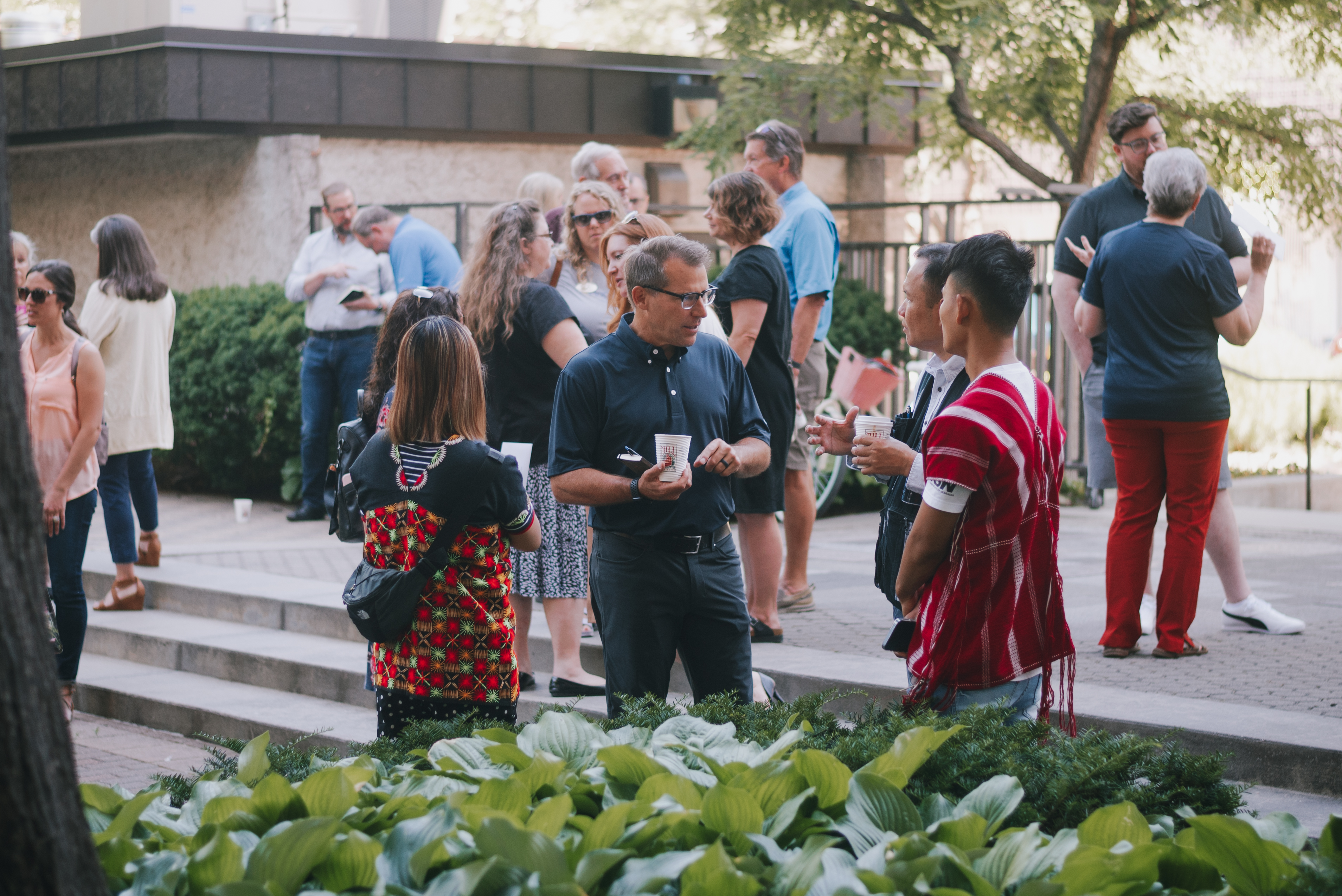
Thank you for taking the time to chat with us! Tell us a little bit about your family’s philosophy behind giving back.
Growing up, my parents and grandparents emphasized the importance of community and philanthropy. We lived just west of Denver, CO but made trips east to visit family in Lincoln. On these trips to Nebraska, I recall my grandmother’s consistent example, taking us along sometimes when she would volunteer. When my brother Robert and I decided to attend the University of Nebraska for college, we recall visiting my grandmother in downtown Lincoln. She would take us to the Lincoln Children’s Museum in the lower level of the Miller & Paine Building and would reach into her wallet and hand over a little cash to support them. We grew up learning that it was important to always be thinking about contributing our time, resources, and imagination to make our community better.
WRK is the name of your business and family foundation. Can you share the background behind it?
WRK is the first initial of the names of my siblings and I – William, Robert, and Katherine (Kit). Kit was our older sister and a great role model and friend. She was super talented, just an awesome gal and a proud University of Nebraska graduate. She worked in New York City; for Prudential, setting up insurance companies in Third World countries. When she was 28, she was traveling for work in Argentina when she tragically passed away from an asthma attack that led to respiratory arrest. The world stopped for us in that moment, also solidified that life is short and life is precious. We all have to make the most of the time while we are here. She definitely did that in her 28 years.
WRK Real Estate LLC is our family-owned real estate development and investment firm. Robert and I founded the Company in 2003 and we are celebrating 20 years in business this year. Our business philosophy closely mirrors the community focus engrained in us growing up – we can do well by doing good. We are a mission-driven company that tries to focus on private-public projects, and we try to find ways to make things better by being intentional and thoughtful. There’s always the opportunity with every project to help someone or something. Whether it’s attracting dynamic companies to Lincoln through development of Hudl’s HQ, converting lower-level commercial space for entrepreneurial start-ups or renovating a historic building, each project is an opportunity to have a positive impact.
What was the impetus behind starting your family foundation, and what are some of the benefits you’ve seen from it?
The WRK Family Foundation provides us an opportunity to directly give back to organizations working to better our community and to honor our sister’s legacy. Kit volunteered at a NYC penitentiary to assist pregnant inmates, she was in Junior League, and was always willing to help with community-oriented projects. Her passions were children, reading, and childhood development so that’s been a key focus for us as well with the WRK Family Foundation.
Our goal with the WRK Foundation is to grow it and do more good. There are so many needs and opportunities in Lincoln. It’s also been fun getting our kids involved where they are part of the process. The Woods Foundation was helpful in assisting us to create more structure for our grant processes. We feel so lucky to be a part of this awesome community, and we hope to leave it better than we found it.
WRK Family Foundation is a Match Fund Sponsor once again for Give to Lincoln Day. What excites you about being a part of Lincoln’s One Big Day of Giving?
Give to Lincoln Day has gone beyond our wildest expectations! This day is something that really brings the community together. It’s enlightening to hear about the different nonprofit organizations and the great things they are doing. I think that the fundamental value of generosity behind Give to Lincoln permeates through all of our city. A lot of other communities would love to have something like this – and I hope they do.
It’s not how much you give; it’s being intentional in your giving. It truly does empower everyone in our community to improve our neighborhoods and support all of our residents. What a powerful moment for everybody to rally around something positive. Give to Lincoln Day is a fantastic catalyst for deliberate change, making Lincoln an even better place to live.
100’s of Women Who Care Lincoln
Published on May 11, 2023100 women. $100 checks. A big impact for the community.
That was the simple yet powerful idea behind 100’s of Women Who Care Lincoln. Now in its eighth year, the giving circle has donated more than $236,700 to local nonprofits. Recently some of the group’s founders sat down to discuss its history and what has them excited for the future.
“When we started 100’s of Women Who Care Lincoln, our goals were simple. We aimed to bring women together and give in a significant manner to local nonprofits,” said founding member, AshLea Allbery. “Today, we are still giving, learning, and networking with some of the most generous and kind women in our community. For that, I am thankful for and proud of what we have accomplished together.”
100’s of Women Who Care Lincoln hosts quarterly networking events where members pitch support for local nonprofits. Those attending then vote for their favorite cause, and the selected organization receives 100% of the proceeds raised from the event.
The first event was held in October of 2015 with more than 200 women attending. The idea was conceived a few months before, after the 100’s of Men Who Care group launched. AshLea and Brett Ebert were inspired to organize a similar group for women in Lincoln. They reached out to friends and acquaintances and gathered a diverse group together to brainstorm about how to grow support for Lincoln’s nonprofits.
Ellen Beans was another founding member.
“It was one of those fun things where you take a leap of faith, walk in the door and learn,” she said. “I didn’t know many women in the room that first evening, but it’s become a very close-knit group in the past eight years.”
Of course, those years included navigating the challenges of the pandemic. The group still met (socially distanced) and with the help of several generous sponsors, raised $10,000 for the Lincoln Covid-19 Response Fund.
“It was an unprecedented time for nonprofits,” said Ava Thomas. “The matching funds expanded our efforts to give back to the organizations that were on the frontlines of the pandemic. I think Lincoln is unique because giving back is part of the fabric of our community and you really saw that in 2020.”
100’s of Women secures a sponsor for each event that covers food and beverage and any costs associated with the venue. The group encourages all women interested in learning more about our nonprofit community to attend.
“One of the greatest joys of the group is learning about the work nonprofits are doing in our community,” said AshLea. “Each event offers the opportunity for attendees to hear from three non-profits, learn about their mission, and ultimately their areas of need. Post-event, many women visit with the winning nonprofit to learn even more. Those visits provide tremendous exposure we may not otherwise have had.”
Ashley Abramson is thrilled with what they’ve accomplished to date.
“There was one event where the donations matched the nonprofit’s yearly budget,” she said. “I think it’s inspiring to see a strong group of women make such an impact.”
The Lincoln Community Foundation accepts all contributions for 100’s of Women Who Care Lincoln, which makes it so much easier for the selected nonprofit because they receive one check rather than hundreds.
“When we first started, we were handling checks from every attendee and it was very difficult to manage,” said Ava. “Working with LCF has simplified this process for us, our participants and the nonprofits.”
Looking forward to their 8th anniversary event on June 8th at Robbers Cave, the 100’s of Women founders are re-energized for continued growth and connection.
“The last eight years have been a wonderful journey,” said Ann Willet. “As we look ahead to the next eight, we hope to increase our support for the community. All are welcome! Women can grab their friends, coworkers or family members and join us.
“There’s so much need in our community,” reflected Ellen. “This is a great way to not only network with a wonderfully diverse group of women, but also to educate ourselves on those needs and ultimately make a big difference.”
To learn more, visit 100sofwomenlincoln.org.
Lincoln Community Foundation grants more than $1.5 Million
Published on Aug 29, 2023Thanks to the foresight of generous donors, Lincoln Community Foundation made grants in August of $1,566,787 for 195 nonprofit organizations, 112 of which were local. These grants came from designated funds created by donors to support their favorite nonprofits and houses of worship. These endowed funds provide annual financial support to the organizations specified by the donors, helping the community and the nonprofits grow and thrive forever.
Smart disaster giving can offer predictability to the unpredictable
Published on Sep 12, 2023
Sadly, rarely does a month go by without the news of another disaster or humanitarian tragedy. Most recently, the Maui fires and Hurricane Idalia are making the headlines–and also generating widespread charitable support. Indeed, many of your clients are no doubt supporting relief efforts through monetary donations.
Disasters are both unpredictable yet, sadly, predictable. Multi-billion-dollar damage events occur annually and, not surprisingly (and thankfully), natural disasters and humanitarian tragedies consistently attract much-needed philanthropic support.
Understandably, most of the charitable dollars following a disaster flow toward essential and immediate relief efforts. Your clients might be interested to know, however, that dollars for efforts related to rebuilding and future mitigation are also critically important. Affected communities need both immediate philanthropic support for people affected by a disaster and long-term support to address ongoing ramifications. Ongoing support, for example, is needed not only for rebuilding after a fire or hurricane, but also to fund preparedness to blunt the effects of the next fire, hurricane, or pandemic.
The team at the Lincoln Community Foundation is happy to work with you and your charitable clients to explore ways to address future humanitarian disasters. Many people, for instance, use their donor advised funds at LCF to support disaster relief efforts. And with rebuilds and recoveries often occurring long-term, a bunching strategy could help clients support disaster relief efforts through their donor advised funds for several years. This allows clients to plan in advance to provide support, while also being smart about the tax advantages in the year of the transfer to their donor advised fund.
Not limited to disaster responsiveness, the Lincoln Community Foundation is an ideal partner for disaster preparedness. Encourage your clients to consider endowments, field-of-interest funds, designated funds, and other perpetual structures established through the Lincoln Community Foundation to ensure that the community we love is protected for generations to come. Field-of-interest or unrestricted funds can be especially attractive because, for people who’ve reached the age of 70 ½, these funds are eligible recipients of QCDs (Qualified Charitable Distributions) from IRAs. Creating a field-of-interest or unrestricted fund allows a client to make charitable gifts in advance of disasters so that LCF can deploy resources immediately when urgent needs occur.
As disasters and hardships across the country inevitably occur, the team at LCF is honored to serve as your valuable resource as you help your clients deploy the power of philanthropy as a helping hand to those who need it most.
Unrestricted giving, the trust factor, and why it matters to your clients
Published on Jan 8, 2024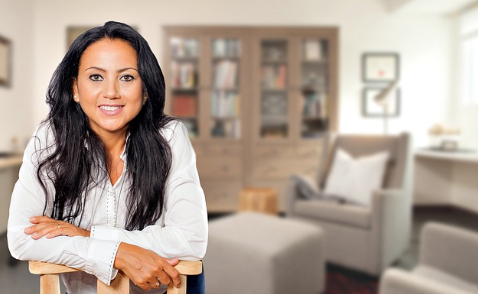
The gifts Americans give to charity every year provide critical support for more than a million organizations that are helping sustain the quality of life in our communities. Philanthropy equates to 2% of GDP–that’s a little more than the home health care services sector! And, trust is growing as a must-have prerequisite before your clients decide to give to an organization, increasing from 63.9% to 69.9% between December 2021 and December 2022.
With trust in charitable organizations driving so many giving decisions, it’s important for you and your clients to be aware of Lincoln Community Foundation’s role and commitment to stewardship. Every day, the team at LCF connects with members of our board of directors, civic leaders, and nonprofit organizations to deeply understand the areas where the people in our community need the most help. Today, the most pressing needs might be for emergency assistance in response to a disaster. Tomorrow, our community might need scholarships for youth who are seeking to be first-generation college students, or investments in programs to improve access to healthcare for systematically marginalized communities and populations. Indeed, the needs of our community are ever-changing. Lincoln Community Foundation always has its finger on the pulse of the community’s top priorities and the best way to address them. Through its convening power, community knowledge, and perpetual mission, Lincoln Community Foundation is an unparalleled resource to make our community better for everyone.
As you talk with your clients about their philanthropic plans, keep in mind that many individuals and families establish multiple funds at LCF to meet all of their various charitable giving needs. For example, a family might establish a donor advised fund to organize their regular annual giving, making it easy to track gifts of appreciated stock and support for a large number of individual charities. A member of this family might also set up a charitable remainder trust with LCF to accept a gift of highly-appreciated real estate and retain an income stream for life. And, this family might also establish an unrestricted fund or make gifts to existing funds that are specifically designated by LCF and our board of directors to address the most critical needs of our community. For example, your client may decide to:
– Contribute to the Lincoln Forever Fund, our unrestricted grantmaking fund to support ever-changing needs and opportunities in our community.
– Donate to Lincoln Community Foundation’s operating endowment fund to support the foundation’s mission for years to come.
– Support a special initiative fund to help people who need assistance right now to get back on their feet, relying on LCF’s network and expertise to invest the dollars where they’re needed most critically.
Whatever ways your clients choose to get involved, you’ll know that you and your clients can trust Lincoln Community Foundation to make a lasting difference in the community we all love.
Income timing: A NIMCRUT could hold the key
Published on May 5, 2022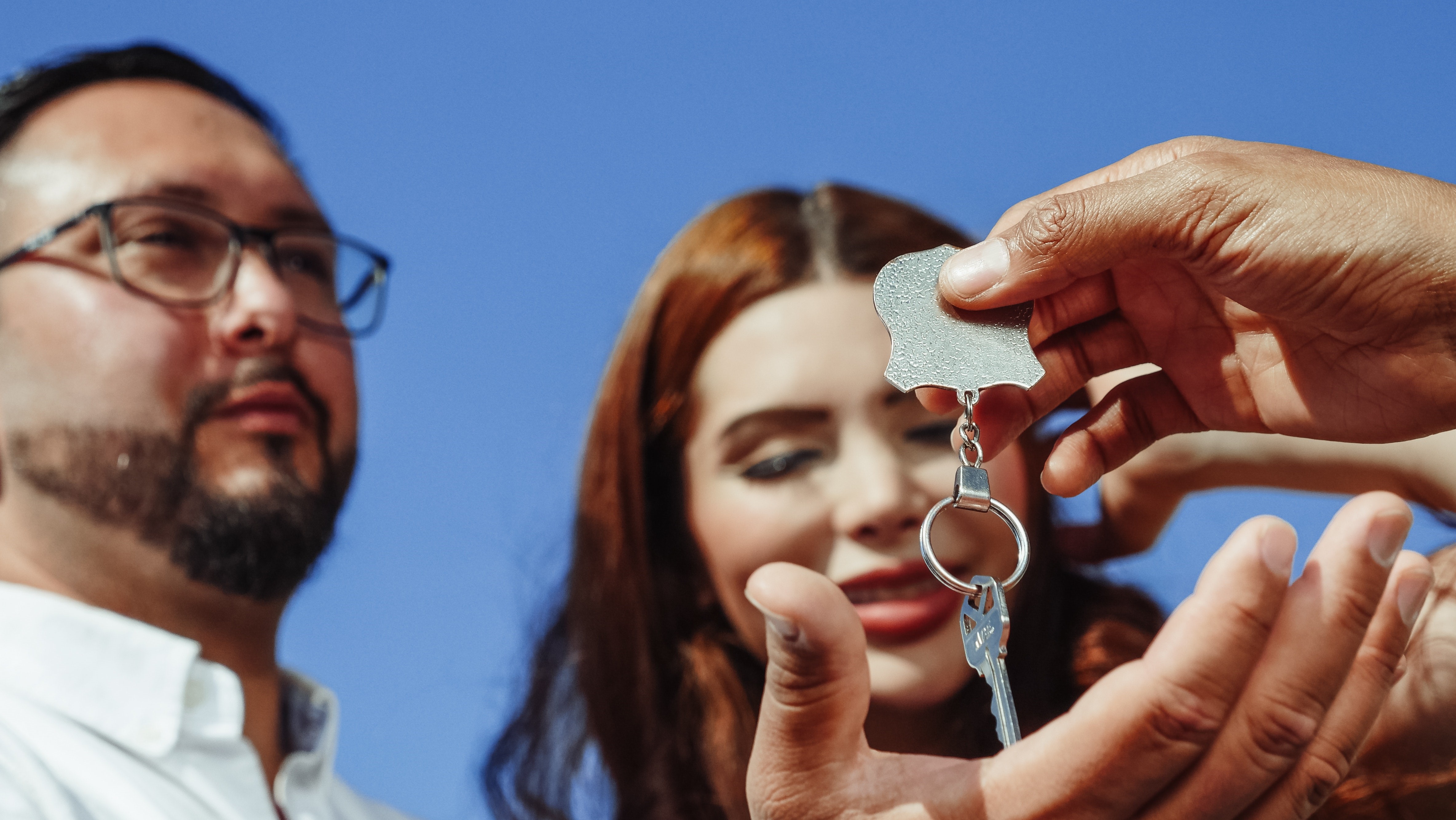
Clients who own closely-held businesses, real estate, or even cryptocurrency may be good candidates for a particular type of charitable remainder trust known as a NIMCRUT, which is short for “Net Income with Makeup Charitable Remainder Unitrust.”
The way it works is that your client transfers a highly-appreciated asset to a trust. The trust terms provide for the payment of a fixed percentage (at least 5%) of the trust’s value, revalued annually, to your client or another beneficiary.
Here’s the key with the NIMCRUT: The terms of this type of trust also provide that if the trust’s income is less than the designated fixed percentage, the trust will only distribute the actual income. Later, upon the liquidation of the highly-appreciated asset, for example, the income distributions will be made up.
In this way, not only does the NIMCRUT keep the highly-appreciated asset growing under favorable tax conditions inside the trust until it is sold, but it also allows your client to receive the higher income in later years, such as retirement, when the client’s tax bracket is likely to be lower. As with other types of charitable remainder trusts, when the term of the NIMCRUT expires, the remainder passes to charity.
Some NIMCRUTs deploy a “FlipCRUT” feature which removes the net income limitation upon a triggering event (such as the sale of an asset or a date). This creates even more flexibility in timing income for your client.
Note that it’s wise to consider naming a public charity, such as a donor-advised fund at LCF, versus a private foundation, as the charitable remainder beneficiary of a NIMCRUT or other charitable remainder trust. This optimizes the amount of your client’s up-front charitable deduction when the trust is funded.
Social consciousness: Today's expectations of advisors
Published on May 5, 2022
Especially over the last few years as social consciousness has increased, many of your clients have no doubt become more interested in how they can make a difference through their philanthropic activities, whether those activities include giving to favorite charities, volunteering, serving on boards of directors, purchasing products that support a cause, and respecting a sustainable environment.
As clients grow more in tune with social impact, they are expecting their advisors to be ready to help them structure and plan their charitable giving. What’s more, clients who receive charitable planning advice from their advisors tend to be more loyal and more willing to recommend their advisor to others, especially when that advisor is proactive in bringing up options for incorporating philanthropy into financial and estate plans.
With that in mind, Lincoln Community Foundation is here to help you stay up to date with philanthropy topics so you can, in turn, have the conversations and deliver the services your clients are seeking. To that end, for an insightful look into the inner workings and current state of the philanthropy industry, we suggest skimming the written testimony that the Council on Foundations recently provided to the Senate Finance Committee. The Council, a major voice and advocate for philanthropy in the United States, notes that the current economic and legislative environment has created a “pivotal moment for nonprofits and their philanthropic partners.”
Record Number of Nonprofits Registered for 11th Give to Lincoln Day
Published on May 2, 2022Lincoln’s 11th annual giving day is scheduled for Thursday, May 26th. Coordinated by the Lincoln Community Foundation, Give to Lincoln Day is an online event encouraging donations to support the local nonprofits and causes people care about. A record total of 480 local charities have registered for this year’s event. Every participating nonprofit organization will receive a proportional share of the $500,000 match fund, based upon its percentage of total dollars raised, thanks to many generous sponsors including Presenting Sponsor, West Gate Bank.
Last year’s event raised nearly $8 million for 456 local nonprofits. The event has raised more than $40 million for local nonprofits in its 10-year history.
“On Give to Lincoln Day, anyone and everyone can be a philanthropist,” said LCF President, Alec Gorynski. “Lincoln’s one big day of giving represents what makes our community special – neighbors coming together year after year to break records and support the nonprofits that add so much to our quality of life.”
Donors may search nonprofits and give online at GiveToLincoln.com. Donations must be made before 11:59 p.m. on May 26 to count toward the giving day and the match fund. The minimum donation is $10 per charity.
Gifts may also be mailed to the Lincoln Community Foundation if postmarked by May 18. Donors may also drop off donations between May 1 and May 26 at all Lincoln West Gate Bank branches via the lobby or the commercial drop drawers.
- Lincoln Community Foundation’s mailing address, 215 Centennial Mall South, Suite 100, Lincoln, NE, 68508.
- Presenting Sponsor, West Gate Bank, Lincoln Branch Locations, Visit https://westgate.bank/locations for lobby hours.
On May 26, donation totals can be viewed throughout the day at GiveToLincoln.com.
Match Sponsors include: West Gate Bank (Presenting Sponsor), ABC Electric, Assurity Life Insurance Company, Bill and Marilyn Cintani, Cornhusker Bank, Davis Design, The family of Alfred A. Duteau, Bob and Jan FitzSimmons, HBE Becker Meyer Love LLP, KidGlov, Mail Management Services, Inc., William J. Mueller & Kim M. Robak, Olsson, Pepsi Cola of Lincoln, Pinnacle Bank, Runza National, Joe W. and Ruth K. Seacrest Fund, Tom and Lisa Smith, Talent Plus Inc., Mark H. Tallman, Bill and Mae Whitmer Family Fund and WRK Family Foundation.
2022 Garden Concert Series Announced
Published on May 24, 2022Lincoln Community Foundation is pleased to announce the return of its Garden Performance Series. Enjoy performances from local musicians every Wednesday from May 25th through September 14th from 12:00 p.m. to 1:00 p.m. in the Foundation Garden (1415 N Street).
The Foundation Garden Summer Performance Series has been in existence for more than 40 years and continues to be a popular Downtown Lincoln tradition.
Up to date information can be found on the series Facebook Page.
Bring your lunch and enjoy live music downtown every Wednesday through mid-September!
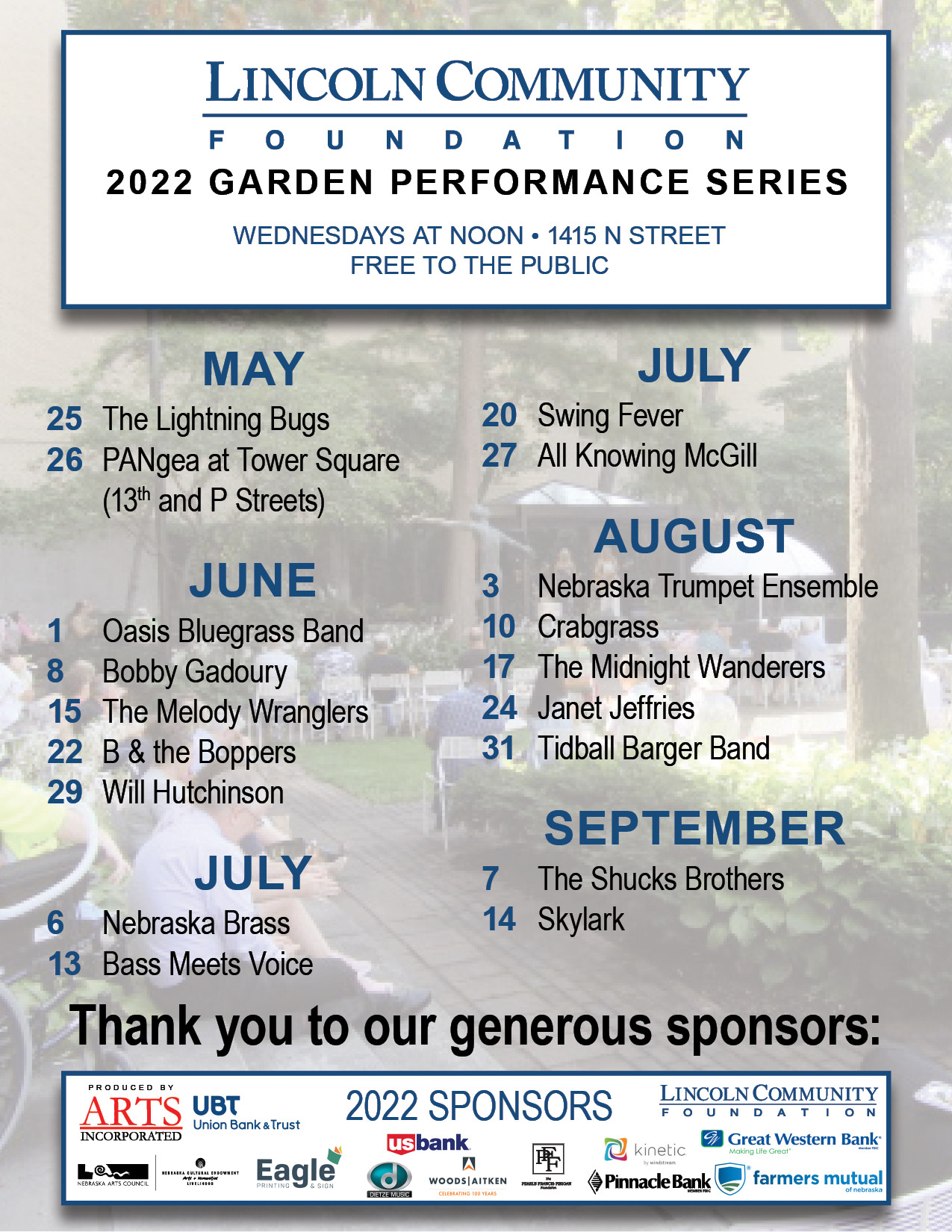
Making a Difference: Kile and Cuz Johnson Create Endowment Supporting Early Childhood
Published on Mar 15, 2023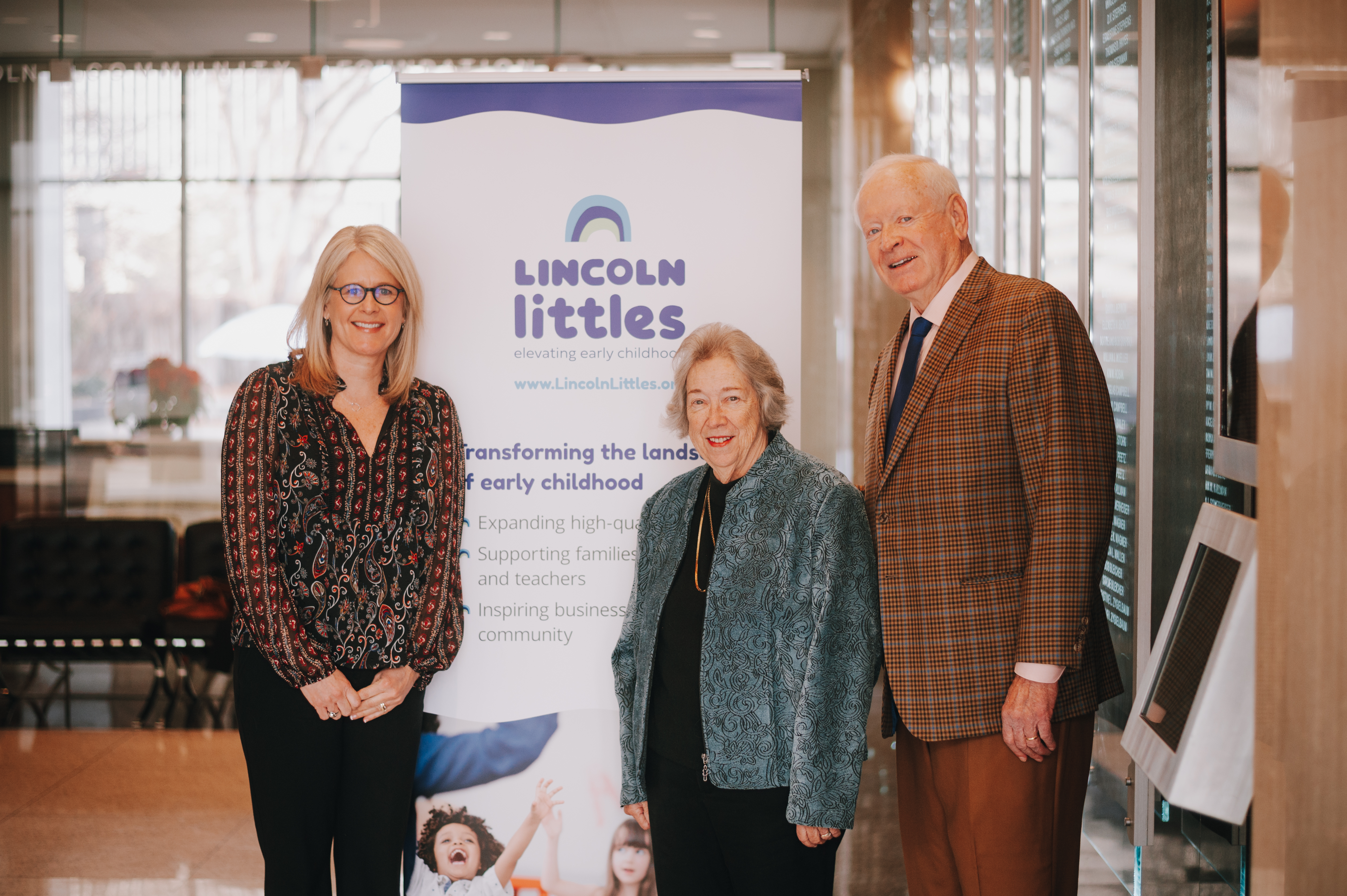
Sitting across from Kile and Cuz Johnson, you can feel their great affection for our community. The couple met during their junior year at Lincoln Southeast High School, married, began and grew their family and their businesses, all in Lincoln. Their fondness for one another and for the place they call home is a ‘forever’ kind of love – so much so that they’ve made an extraordinary investment supporting Lincoln’s youngest residents beyond their lifetimes.
Kile and Cuz worked with Lincoln Community Foundation to create an endowment that will prioritize early childhood education and care. The mission behind the Lincoln Early Childhood Education Support Fund is to support the work of Lincoln Littles as the organization tackles the complexities surrounding early childhood.
The forever nature of an endowment fund made sense to Virginia “Cuz” Johnson. “It was my parents who influenced my thinking on endowments,” she said. “When you’re interested in making a difference, an endowment gives back much more than the initial investment, and it’s there in perpetuity.”
Kile agreed. “Endowments guarantee that your gift will continue and grow over time,” he said.
The Johnsons’ philanthropic passion for early childhood peaked when they learned more about the work of Lincoln Littles. With three children and seven grandchildren of their own, they understand the difference that quality early education and care can make in a person’s life.
“It is so important that everyone has that opportunity,” said Cuz.
“The early years are critical for future success,” continued Kile. “One of the things we hope to do is help these kids and their parents and make a true difference in their lives.”
Both Kile and Cuz hope that their endowment will inspire others to contribute and support Lincoln Littles or start their own fund that is meaningful to them. The Johnson’s also supported LCF’s current fundraising efforts as Lead Donors for Lincoln Littles.
“The endowment will help the children of the future,” said Kile. “But we don’t want to lose track of the families going through this now.”
Anne Brandt, executive director of Lincoln Littles, reflected on the Johnsons’ generosity and what it means for children and families in Lincoln.
“We are so fortunate that Kile and Cuz see why this work is vital to our community,” said Anne. “They understand the return on this type of investment. Their gifts will have the power to change lives now and into the future.”
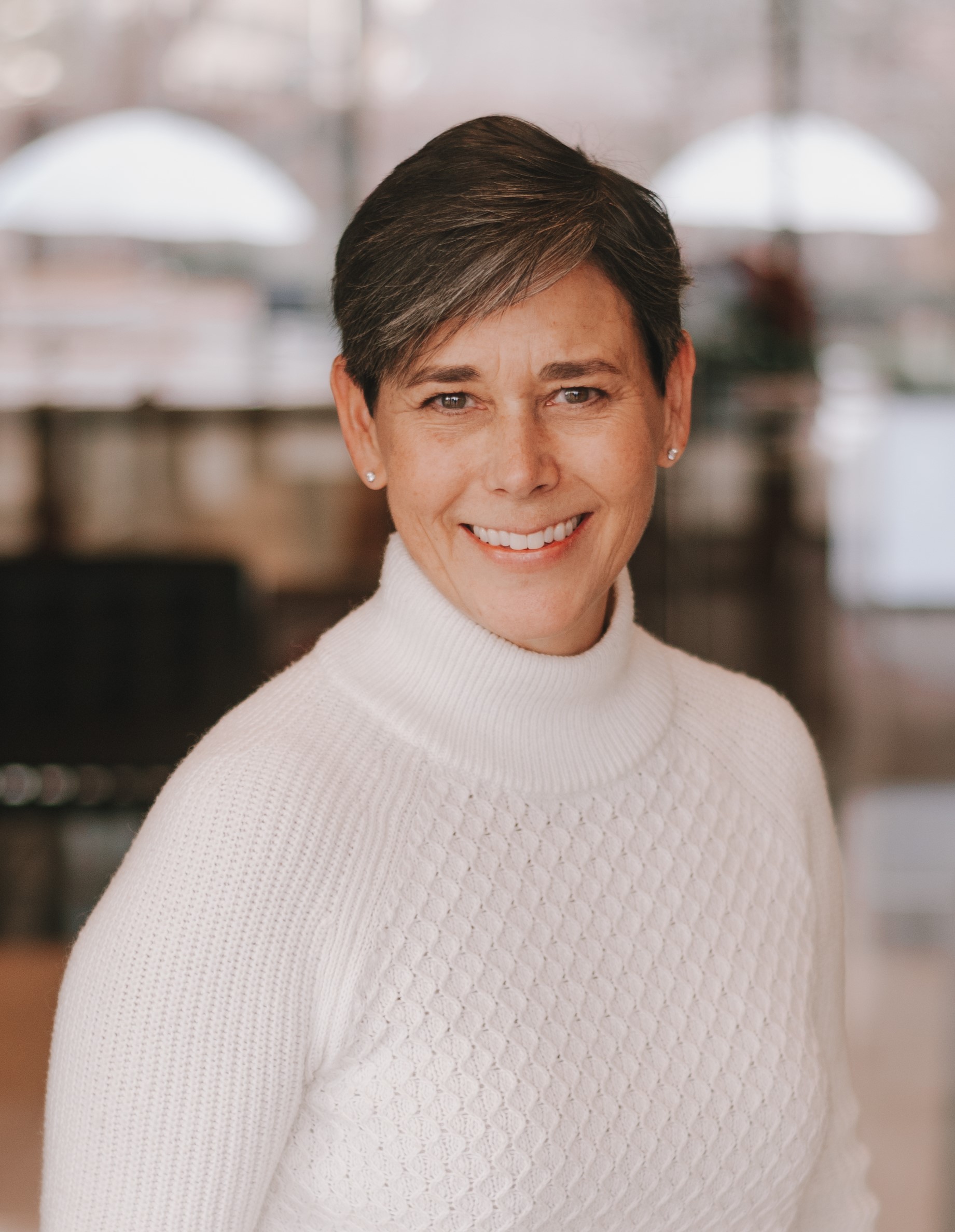
Are you interested in a Forever gift to Lincoln?
Contact Vice President for Philanthropy Services Tracy Edgerton at 402-474-2345 or tracye@lcf.org.
Doubling Down
Published on May 11, 2023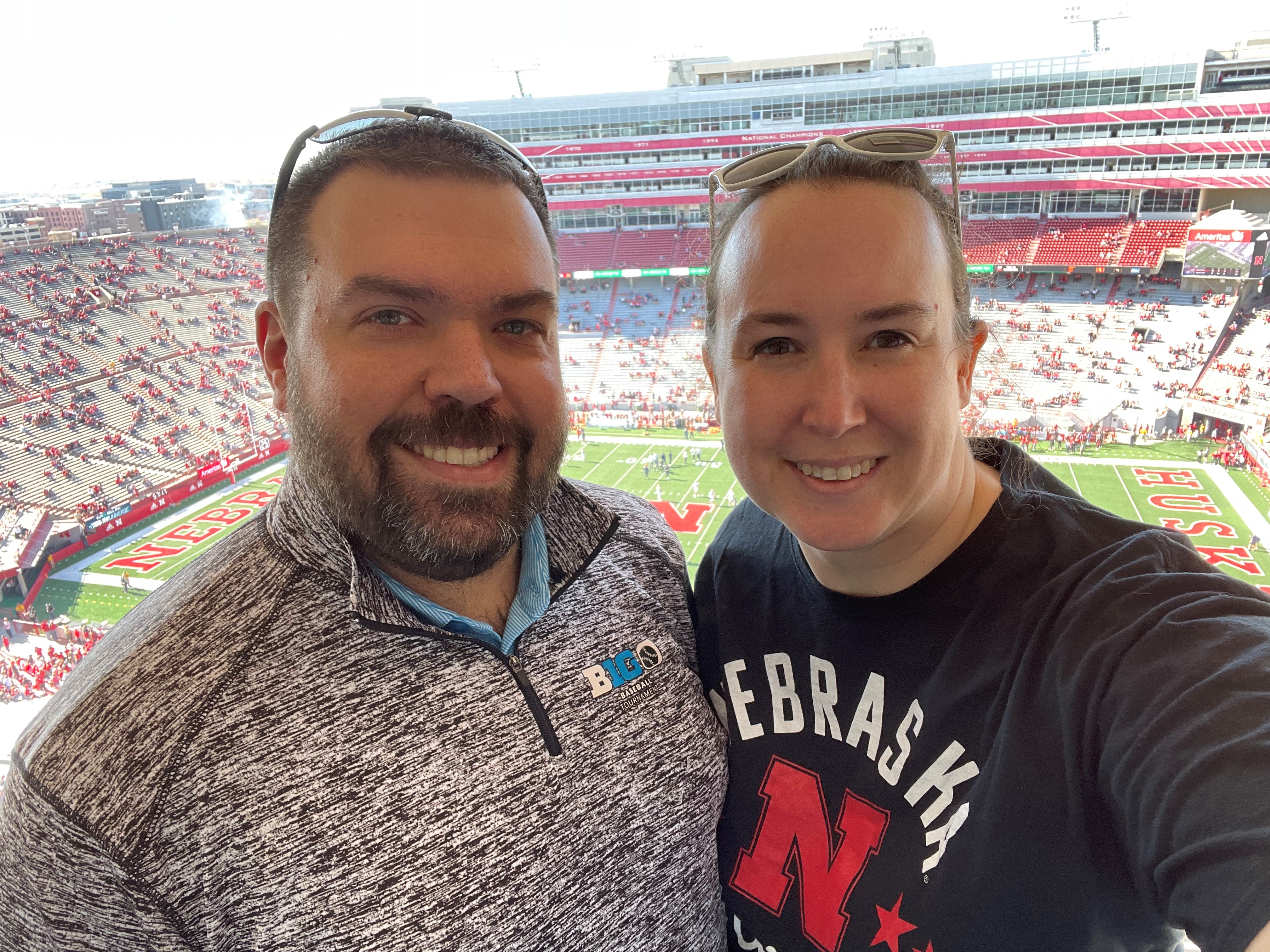
Ryan and Erin Dobesh aren’t ones to take a back seat when it comes to their community. Passionate professionals, the Dobesh’s have intentionally sought out opportunities to get involved and give back despite their busy schedules.
“Both service and philanthropy are important to us,” said Erin. “When we were looking to get more involved in Lincoln, we found there are so many different groups that you can join to make an impact.”
“It’s great for meeting people as well,” agreed Ryan.
Erin moved to Lincoln in high school and has a deep appreciation for Lincoln’s ability to feel like “a big, small town or a small, big town.”
She earned her Master of Architecture from the University of Nebraska Lincoln in 2009 and joined the Davis Design team in 2015, where she is Associate Principal and Senior Architect. An active member of Rotary Club #14, Erin has served on the board and will become president in 2024-2025.
Ryan is originally from Kearney and came to Lincoln for his undergraduate degree in journalism at UNL. This November, Ryan shook things up professionally and became an Operations Producer at ESPN. His work takes him on the road for several days at a time, but his home and his heart are always in Lincoln with Erin and their dog, Ty.
Both Erin and Ryan were introduced to LCF through its giving circle for young professionals, NextGen. During their first year with NextGen, they learned about the benefits of opening a Donor Advised Fund (DAF), which is a popular tool that simplifies annual giving and recordkeeping. Ryan and Erin appreciated the ease of setting up and using their fund.
“The donor advised fund, overall, is a very simple process,” said Erin. “It’s quick and easy to set it up, and then it’s just a matter of adding to it or using the online donor portal to make your grant recommendations.”
Ryan also remarked on the estate planning advantages of opening a DAF.
“It’s a big part of our will at this point,” Ryan continued. “If something should happen, plans are in place, and we can change plans with LCF without having to amend our will.”
With Give to Lincoln Day quickly approaching on May 24, the couple will be utilizing their DAF to support their favorite participating nonprofits. Fees are waived on gifts made through LCF donor advised funds during Give to Lincoln Day.
“Give to Lincoln Day is always fun and with a donor advised fund at LCF, it’s a win-win,” said Erin.
Ryan and Erin concluded that the only difficult part of the donor advised fund process was deciding whose name would be listed first on their fund agreement.
And how did that decision turn out?
“Erin is first, of course,” Ryan said with a smile.
There’s still time to open a donor advised fund before Give to Lincoln Day!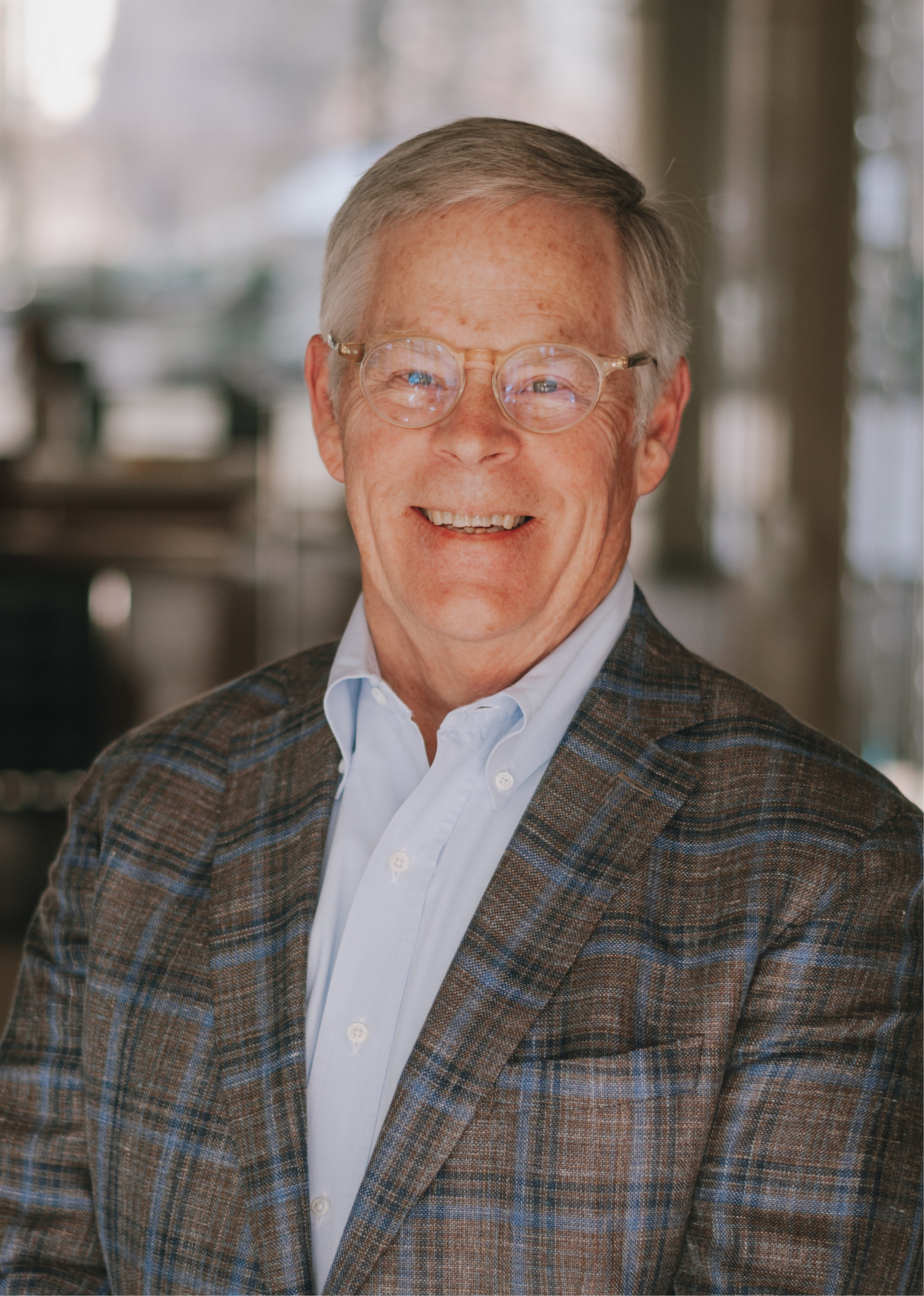 Contact Chip DeBuse at 402-474-2345 or chipd@lcf.org to create your fund.
Contact Chip DeBuse at 402-474-2345 or chipd@lcf.org to create your fund.
Spring 2023 Newsletter
Published on May 11, 2023To catch up on the latest Lincoln Community Foundation happenings click here to download the newsletter.
Keep your eye on clients’ appreciated stock–always
Published on Sep 12, 2023
Such a difference a year makes–maybe!?
By August 2022, markets were down 12% for the year and inflation was up 8.3% year-over-year. Perhaps consequently, but then unknown, annual charitable giving was on its way to a rare (fourth time in 40 years) year-over year decline of some 4% according to Giving USA. Certainly this decline was due in part to donors not wanting to give stock at depressed values. You likely even discussed this with your clients!
Nearly 12 months later, as of July 2023, markets were up 7.28% year to date and inflation was roughly half at 4.7% year–over-year. Even though the stock market still shows signs of volatility, hopefully, charitable giving will rebound.
No matter the times, and even in down markets, some stocks will still out-perform. These holdings are of course excellent candidates for your clients to give to charity and avoid taxes on the capital gains. This year is no different, with stocks like Microsoft, Apple, Nvidia, among others, enjoying banner years. Indeed, Microsoft, Apple, and Nvidia were up 38%, 36% and 228%, respectively through mid-August. For some of your clients, these gains have created concentrated stock positions where you, as an advisor, may believe that portfolio allocations have become imbalanced under the investment strategy you are pursuing. Your clients who support charities through their donor advised funds at the Lincoln Community Foundation can consider potentially alleviating this situation through charitable gifts of highly-appreciated stock.
Your clients who give appreciated stock to a donor advised fund can:
–Enjoy the ease of the donor advised fund as an account for current and future charitable giving
–Conveniently support the causes they and their families care most about
–Benefit from an up-front income tax deduction, avoid capital gains on the assets’ sale within the fund, and grow the proceeds for future grantmaking
–Leave a legacy for children and grandchildren to continue their philanthropic commitments
–Reduce the value of their taxable estate, potentially reducing estate taxes
–Comply with IRS charitable gifting guidelines
–Enjoy supporting charities in the client’s name, the fund’s name, or anonymously
–Receive a single year-end tax document that summarizes all gifts for tax purposes
By establishing a donor advised fund at the Lincoln Community Foundation, your client is part of a community of giving and will have opportunities to collaborate with other donors who share their interests. In addition, your client is supported in strategic grant making, family philanthropy, and opportunities to gain deep knowledge about local issues and nonprofits making a difference.
So while it’s nice to see the market’s performance improve, a bonus opportunity lies in your clients’ transferring appreciated stock to donor advised funds at LCF. We are here to help!
LCF Open Door Grants: Girls Inc. Eureka! Breaks Down Barriers for Girls in STEM
Published on Sep 27, 2023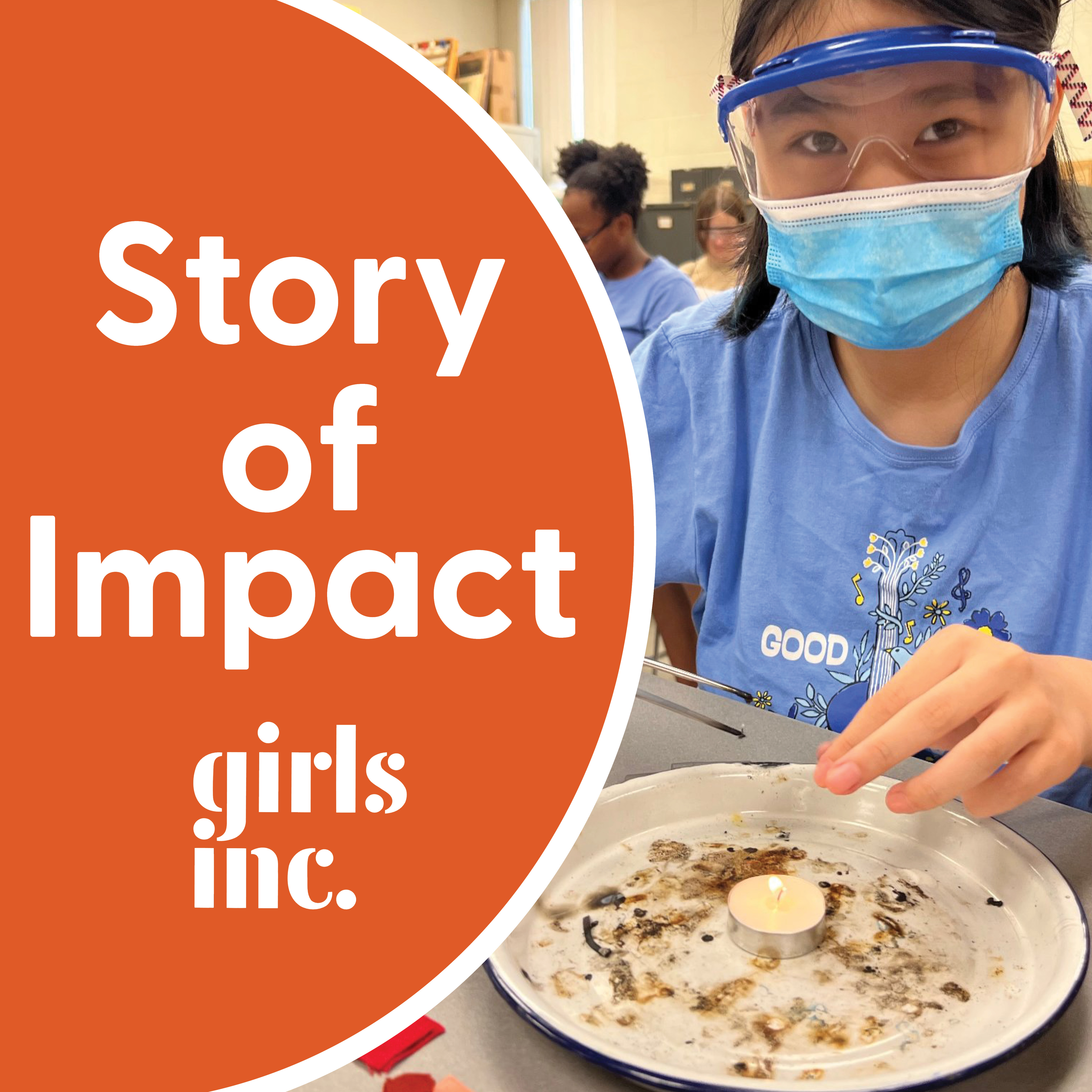
Nearly 80 “strong, smart and bold” Lincoln girls now have a new future career path to explore with confidence, tools, and connections by participating in the Eureka! STEM (Science, Technology, Engineering and Math) program through Girls Inc. of Lincoln. Eureka!, a five-year college and career prep program for middle school girls, recently wrapped up its an annual summer camp at the University of Nebraska-Lincoln (UNL).
A member of the 2022 Eureka! cohort, Harper, reflected on her two years in the program with excitement about newfound ideas, opportunities, and connections with peers.
“It has shown me a bunch of career opportunities I didn’t know were options, until now,” she said. “I liked the Journalism College, we got to do a mock “Husker Highlights” using film and scripts. That is something I’d like to do more of.”
Founded in 1864, Girls Inc. focuses on the development of the full girl by providing a combination of long-lasting mentoring relationships, a pro-girl environment, and research-based programming to equip girls for fulfilling and productive lives – empowering them to become role models in their community.
Girls Inc. programs are being implemented in cities across the United States and Canada. The affiliate program in Omaha has been operating for nearly 50 years. In 2018, Girls Inc. Eureka! was brought to Lincoln.
The Lincoln Community Foundation awarded an Open Door grant to Girls Inc. in support of operations for this year's Eureka! Summer STEM program. This funding supported operations for staff salaries and camp transportation.
Eureka! provides opportunities for girls to perform hands-on projects and activities, learn how STEM is incorporated into everyday life, and explore potential career fields they may not otherwise be exposed to.
“Many girls don’t realize what they are already passionate about relates to STEM,” said Eureka! program manager, Lexi Linder.
Research has indicated that STEM careers are important to communities because they offer high wage jobs that will result in reinvestments back into local economies. Lincoln Vital Signs 2020 data reports Lincoln having a slightly higher than average amount of individuals working in STEM occupations. However, national data shows women are underrepresented in STEM careers. While women make up 47% of the overall workforce, they represent fewer than 25% of employment in high-paying science and engineering fields. Women of color make up 4% in those fields (Pew Research Center, 2021).
Eureka! cohorts continue to participate in year-round education and experiences through senior year, with career development and summer externships. A great example of a cohort member who experienced opportunities that are open to Eureka! members is graduating senior, Julia Steffensmeier.
“Julia was one of our most active seniors in Eureka!,” Lexi shared.
Not only did Julia show commitment to the five-year program, but she also had strong interests in STEM-related opportunities throughout her Eureka! career such as AP high school classes like physics and psychology, and a summer internship working alongside post-doctorate researchers at the Nebraska Center for Materials and Nanoscience.
“Last summer, she completed a summer research program on nanoscopic materials and different microscopy methods alongside doctoral students at UNL, and her research group's poster was presented at UNL’s Summer Research Symposium,” said Lexi. “Going forward, Julia will attend UNL and major in Chemical Engineering.”
On a national survey, 89% of Girls Inc. members reported, “I know I will graduate from college.” One of the ways Girls Inc. increases college success in alumnae is to ensure that active teen members have access to college campuses, faculty, students, and facilities. UNL helps Lincoln girls with that critical component of Eureka!
Community members like Jen Landis, assistant professor of practice in graphic design and author of Skip the Bad Songs, a book for tweens and teens, have volunteered their time and talents to facilitate group activities within the cohorts. The program coordinators in Lincoln work to establish and sustain collaborative partnerships which help enrich the girls and the Eureka! experience.
“I'm inspired by how Girls Inc. empowers girls, fostering self-belief and positivity, enabling them to lead remarkable, successful lives,” said Jen. “They're not just breaking down barriers; they're revealing a world filled with endless possibilities!”
The community foundation edge: Personal knowledge, QCD eligibility, and public support
Published on Jul 5, 2022
Advisors frequently comment that they’re surprised to discover the many ways a community foundation can help their clients, especially compared with national donor advised fund programs affiliated with brokerage houses or financial services firms. Here are three examples of the types of comments community foundations have heard over the years from attorneys, accountants, and financial advisors:
“I didn’t realize that the community foundation’s DAF offering was so much more than just an online account. My clients have loved getting to know other donors, accessing first-hand knowledge about what’s going on in the community and how their favorite charities are making a difference, and being able to involve their children in philanthropic events and activities.”
“I’m amazed at the variety of funds the community foundation can administer. Many of my clients have established DAFs and have also augmented their philanthropic planning with a specialized fund such as a designated fund, field-of-interest fund or a scholarship fund. A big bonus for my retirement-age clients is that the IRS allows the community foundation to receive a Qualified Charitable Distribution from a client’s IRA and place it into one of these specialized funds.”
“My clients who sit on boards of directors of start-up charities have been so happy that grants from DAFs–their own and others’--count toward the IRS’s public support test. That’s really helped new organizations in our community get off the ground.”
Paula Metcalf Honored with the J. Robert Sandberg Distinguished Service Award
Published on Mar 15, 2023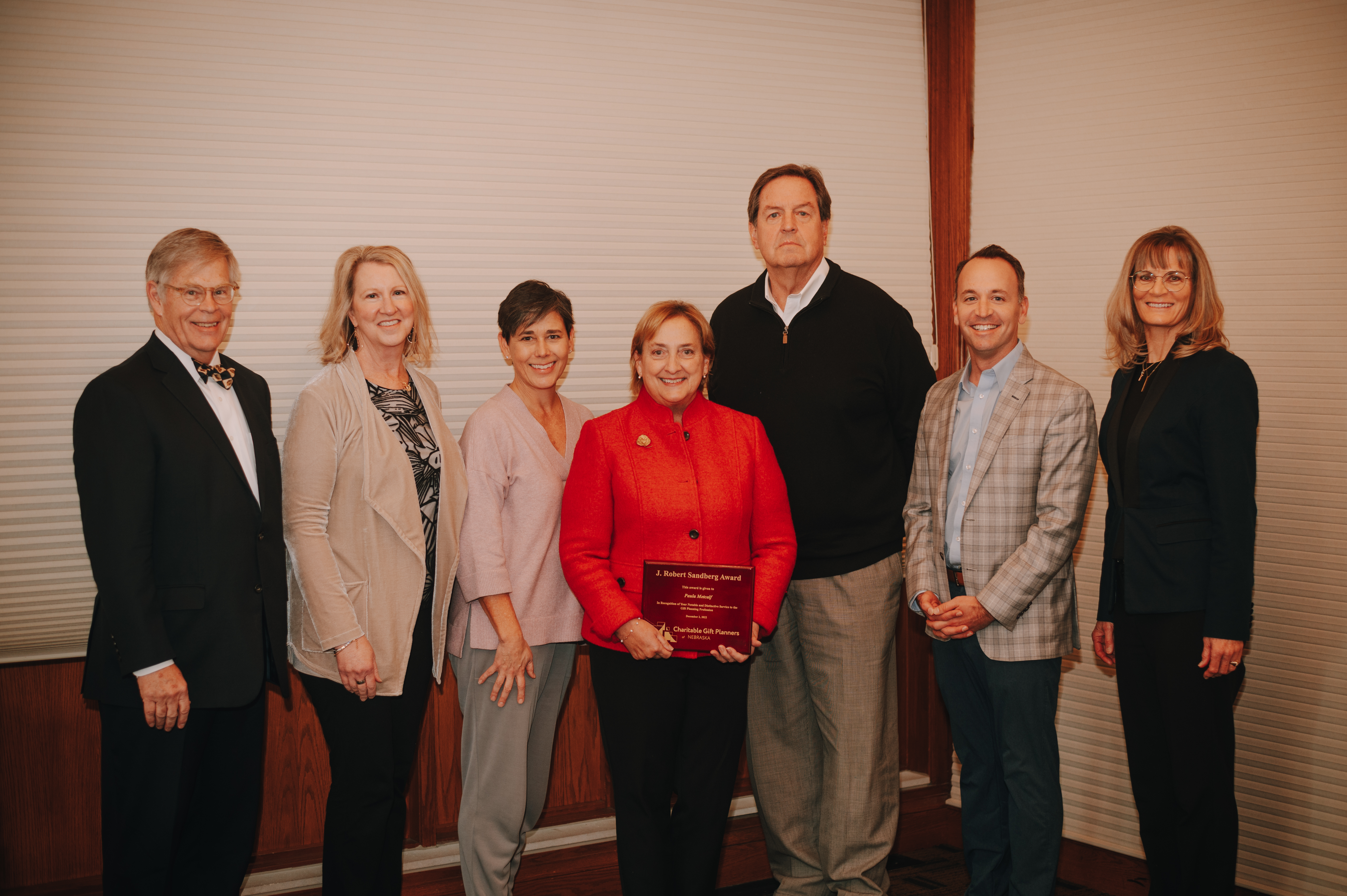
LCF’s former Vice President for Gift Planning and General Counsel, Paula Metcalf, was honored with the J. Robert Sandberg Distinguished Service Award at the 2022 Charitable Gift Planners of Nebraska’s luncheon on December 2nd.
“Paula’s leadership and efforts were essential to the Foundation’s growth in the last decade,” said LCF President Alec Gorynski. “She is so deserving of this award, which celebrates distinctive service within the planned giving profession.”
Paula worked with donors and their advisors during a period of tremendous growth for LCF, as contributions increased from $800,000 in 2010 to $25 million in 2019, and funds increased during this same timeframe from 284 to 1,132. Paula retired from the Foundation in 2020.
NextGen Selects 2022 Nonprofits
Published on Mar 15, 2023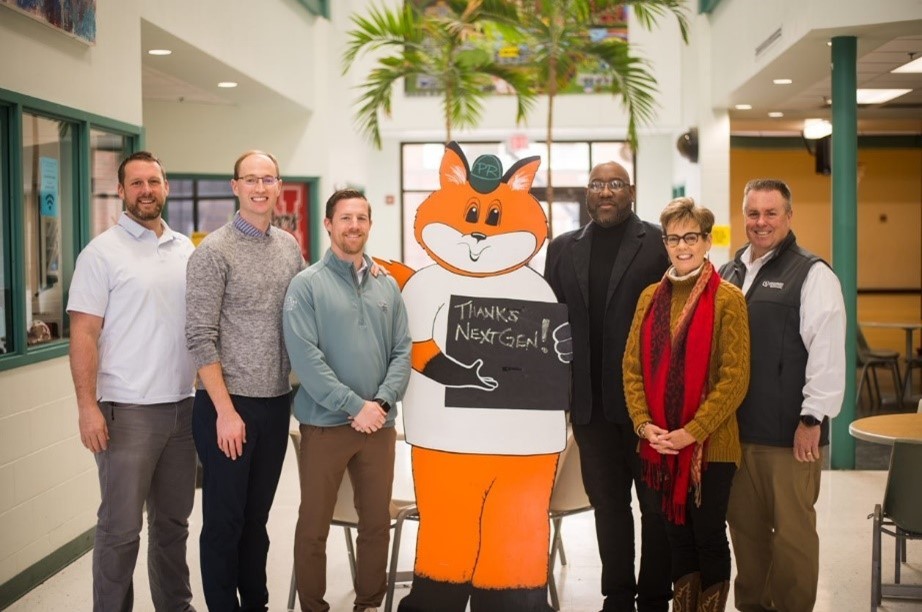
NextGen Lincoln recently granted a total of $15,000 to three nonprofit organizations serving our community. Representatives from the nonprofit finalists gathered with NextGen members in October 2022 and gave pitches to share more about the great things they do for our community.
Lincoln Parks Foundation was selected to receive $7,500. The grant will go towards a new entrepreneurship program for middle and high school youth at the F Street Community Center.
NextGen is LCF’s affiliated giving circle of young professionals who donate their time and treasure to local nonprofits. To learn more, visit Facebook.com/NextGenLincolnNE.
For clients who may sell a business, the time to think charitably is right now
Published on Sep 12, 2023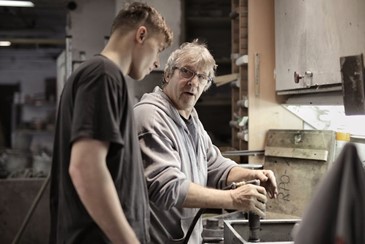
Business owners who’ve enjoyed summertime’s more relaxed energy can deservedly daydream about the “extended vacation” that comes with selling the business!
While it all sounds good, business brokers will tell you that many business owners fail to optimize—and they sometimes even compromise—the value of their business’s proceeds by rushing the process, hastily determining an asking price, or not fully assessing the value of their business to a potential buyer. In their haste, owners often miss strategies that can deliver an improved post-sale result and a true reward for their years of work.
The Lincoln Community Foundation can be a valuable resource as you guide a business owner client through a pre-sale preparation process. This is especially true for a business that has operated for many years and has accumulated significant unrealized capital gains in its valuation that are likely to be heavily taxed at the time of the sale.
Many closely-held business owners and their advisors may not be fully aware of the advantages of giving shares to a donor advised fund at LCF well in advance of any external discussion about a potential sale of the business. With prudent planning, the gifted shares will be free of capital gains at sale time, allowing the proceeds to flow into the donor advised fund, ready to be deployed to meet the business owner’s charitable goals. The business owner also benefits because they’ve reduced the value of their taxable estate. This can have huge repercussions given the anticipated reduction of the estate tax exemption slated for 2025.
Remember that it will be important to secure a proper valuation of the business at the time the business owner makes a gift of shares in order to comply with IRS requirements for documenting the value of the charitable deduction.
Critically important to successfully executing this strategy is to ensure that your client avoids even any preliminary discussions about sale, let alone negotiations, before consulting with advisors, including looping in the Lincoln Community Foundation early on. Otherwise, your client might get caught in the IRS’s step-transaction trap, a risk with any pre-sale gift to charity of real estate, closely-held stock, or other alternative asset. Definitely, the devil is in the details!
By the way, if you routinely advise owners of closely-held businesses, and if you like to go deep into tax law, you might enjoy reviewing the issues related to the business itself supporting charitable causes, totally unrelated to its eventual sale.
Please reach out to the Philanthropy Services Team at the Lincoln Community Foundation if a business owner client would like to explore the idea of potentially giving a portion of the business to a donor advised fund or other type of fund at LCF. We can work alongside you and the client to help optimize the exit and maximize the resulting proceeds.
LCF Grants $850,000 for Affordable Housing
Published on Sep 27, 2023
The Lincoln Community Foundation (LCF) recently awarded $850,000 in grants from its Affordable Housing Fund to seven organizations working to create and preserve affordable housing. These organizations include Community Development Resources, Family Service Lincoln, Habitat for Humanity Lincoln/Lancaster County, Lincoln Housing Authority, Nebraska Housing Resource, NeighborWorks Lincoln and South of Downtown Community Development Organization.
“Housing that is affordable leads to healthier and more stable families and neighborhoods and promotes economic mobility,” said LCF President/CEO, Alec Gorynski. “These grants serve as a demonstration of all the ways in which grant funding can support access to affordable housing.”
The City of Lincoln’s Affordable Housing Coordinated Action Plan calls for the addition of 5,000 rental units and 4,000 ownership options of affordable housing by 2030. Recognizing the complexity and significance of the program, affordable housing was identified as a focus in the Prosper Lincoln community agenda.
In alignment with this priority, LCF created and seeded an Affordable Housing Fund with the purpose of supporting the development of affordable housing to include the purchase, renovation, and construction of single-family and multi-family, rental and owner occupied, housing that is affordable for low-, moderate-, and middle-income families in Lincoln. Housing is defined as affordable when the annual housing cost does not exceed 30% of a family's annual income.
Eleven local banks also contributed to the Affordable Housing Fund including Cornhusker Bank, Exchange Bank, FNBO, Five Points Bank, Frontier Bank, First Interstate Bank, i3 Bank. Pinnacle Bank, Security First Bank, Union Bank & Trust, US Bank and West Gate Bank.
Locally, for-profit, and nonprofit housing developers are working to create and preserve quality affordable housing for the community. In order to keep rental and mortgage payments at a level affordable for low-, moderate-, and middle-income families, various forms of subsidy are required, including government funds, philanthropic grants, and low-interest loans.
The organizations that received grants from the Affordable Housing Fund support a wide array of housing types, including single-family owner occupied housing and multi-family rental. The grants are being used in a variety of ways such as funding a portion of development costs, property acquisition costs, down payment assistance, and funding for loan funds to, in turn, provide financing for housing development.
Community Development Resources (CDR) is a local Community Development Financial Institution (CDFI). In 2021, CDR expanded its mission to include affordable housing lending in the city of Lincoln. LCF funds will support a loan/loss reserve for capital pools that will be used for construction of multi-family affordable housing. The target population for these multi-family units are households at 60%-80% of AMI, and they hope to generate sufficient capital to build 50 units of housing per year.
Family Service Lincoln has been working in Lincoln for more than 100 years. In a new venture, they are developing the block bounded by 51st and Holdrege Streets into FiftyOne Commons, a project that will include a neighborhood center, 10 row-style homes, a community garden and green space. LCF’s grant will support the construction of the row-style homes which will be owned by Family Service Lincoln and leased to low-income renters, with a focus on immigrant and refugee households.
Habitat for Humanity Lincoln/Lancaster County has built or repaired nearly 200 homes in Lancaster and Seward Counties since the local chapter was founded 1988. Habitat for Humanity will provide down payment assistance and closing costs to buyers of their homes with this LCF grant. This assistance fills the gap between the cost to construct or rehabilitate the home and the amount of mortgage for which the buyer qualifies. Habitat homes prioritize buyers who earn 30%-80% of AMI and they anticipate closing on six homes through 2024.
Lincoln Housing Authority (LHA) is a governmental entity established under state law with a mission to provide affordable housing to the residents of Lincoln. They currently own and/or manage 1,400 units of rental housing and administer programs for tenants and homeowners. This LCF grant will support construction of the Emerald View Apartments at South Folsom Street and West Old Cheney Road in west Lincoln. The project will contain 64 units of multi-family housing. Their target population is 60% AMI for this new development.
Nebraska Housing Resource (NHR) assists home buyers with down payment assistance and provides funding for builders and developers creating local affordable housing. Funds granted from LCF will help capitalize NHR’s Middle Income Workforce Housing new construction revolving loan program for builders. This program will be ongoing and is anticipated to provide construction loans for five single-family homes annually within their target population of households earning less than 150% AMI.
NeighborWorks Lincoln (NWL) is a community housing development organization that actively partners locally to increase the supply of affordable housing and strengthen neighborhoods. Funding from LCF will create a sales loss reserve fund, a Community Land Trust (CLT) property tax bridge fund, and a CLT affordable home preservation fund. CLTs preserve investments and create permanent affordable housing in the community. NWL’s projects target households at less than 80% AMI, and they anticipate creating or rehabilitating at least 25 units of affordable housing with this grant.
The South of Downtown Community Development Organization focuses on affordable housing and redevelopment work in the neighborhoods south of downtown in Lincoln. LCF’s grant will fund acquisition, pre-development and development expenses for “troubled properties” in the South of Downtown neighborhoods. Housing in this area will be purchased and rehabilitated to a safe and quality standard, and the affordability of the property will be maintained for current and future tenants.
Lincoln Community Foundation, established in 1955, provides leadership and tools that connect donor generosity to local needs and passions. The Foundation has distributed more than $230 million in grants to nonprofit organizations that have improved the lives of thousands of residents.
Tax law twists and turns: Five developments impacting charitable giving
Published on Jan 8, 2024
2023 was a busy year! We understand that charitable giving topics may not always be at the top of your reading list. That’s why we're here! The Philanthropy Services team at Lincoln Community Foundation is committed to keeping you up-to-date on what you need to know. Here’s a recap of five key developments last year that are most certainly worth keeping an eye on in 2024.
NIL Collectives
The IRS has had a lot to say lately about NIL collectives. In addition to offering insights for athlete recipients of NIL (name, image, and likeness) dollars, the IRS has also issued guidance pertaining to organizations that help develop NIL opportunities for athletes, suggesting that the activities of these entities, known as “collectives,” may not qualify as “charitable.” This development could be problematic for your clients who believe that their contributions to NIL collectives will qualify for a charitable tax deduction.
Donations of Cryptocurrency
It’s still a thing! At least a few of your clients are likely still invested in cryptocurrency, despite the whirlwind in that industry over the last year or so. You should know that in early 2023, the IRS published guidance confirming that a taxpayer cannot take a charitable deduction for a gift of cryptocurrency over $5,000 without submitting a qualified appraisal. Cryptocurrency, in the eyes of the IRS, is treated as property, not cash. And it is not a security, either. Note that the IRS also said that a price quotation from a cryptocurrency exchange (such as FTX!!) doesn’t count; a qualified appraisal is still required.
Charitable Act
Senate Bill 566, which is still pending, was introduced in early 2023 to address what is sometimes called the “universal charitable deduction,” meaning that even taxpayers who do not itemize their deductions would be able to claim a charitable deduction, potentially in an amount up to one-third of the taxpayer’s standard deduction. Keep an eye on this; the bill enjoys broad support and, if it becomes law, could be a real perk for both your clients and the charities they care about.
Exempt Purpose
It seems that at least once a year, the IRS issues guidance on what it means for an organization to be organized for an exempt purpose under Section 501(c)(3). In Private Letter Ruling 202349014, we are once again reminded that personal activities that have no direct public benefit simply will not be viewed by the IRS as exempt. While private letter rulings are of course not binding, they are nevertheless useful tools to provide to a client to show specific examples of what the IRS considers to be non-exempt. Estate planning attorneys and CPAs tell us that every few months, a client comes to them with an idea for starting a nonprofit, and it’s easier to tell a cautionary tale than it is to recite Internal Revenue Code sections!
Proposed Regulations
Proposed regulations issued by the IRS are not binding, and often they are revised–or even shelved or canceled entirely–before they go into effect. Still, Lincoln Community Foundation is always keeping an eye out for these and other forms of IRS rulemaking that could potentially affect your work with your charitable clients. A recent example of this type of IRS activity is a set of proposed regulations concerning donor advised funds, issued in November 2023. The public comment period ends in mid-January 2024, and then the IRS will take time to review the comments, so we won’t know anything definitive for quite some time. For those who are interested, we like the detail provided in this podcast series on the topic. You can take a long winter walk and learn everything you want to know about what’s being proposed! And of course, you’ll hear from us when (and if) the proposed regulations ever go into effect and what to do about it.
Lincoln Community Foundation Announces Annual Campaign for Lincoln Littles
Published on Feb 1, 2024
Lincoln Community Foundation (LCF) recently announced the sixth annual giving campaign for Lincoln Littles. Inspired by the Prosper Lincoln community agenda, the month-long campaign will raise funds and awareness for Lincoln Littles’ work in early childhood. Since the first giving day in 2019, the community has contributed more than $4 million in support of Lincoln Littles, providing affordable and quality early childcare to more than 1,000 children.
“Year after year, Lincoln continues to see the return on its investment in early childhood through the work of Lincoln Littles,” said Alec Gorynski, LCF president/CEO. “Together, we are supporting solutions for the complexities surrounding early care and education that continue to impact our community and our workforce.”
The community can make online donations now through February 29 at LincolnLittles.org. Donations may also be mailed to the Lincoln Community Foundation, 215 Centennial Mall South, Suite 100, Lincoln, NE 68508. Checks must be written to “Lincoln Community Foundation” with “Lincoln Littles” in the memo line.
“Early childhood access for our youngest residents should be on all our minds because a thriving community begins with quality early care and education,” said Anne Brandt, executive director of Lincoln Littles. “Research tells us children who receive quality early care are more prepared academically, more likely to graduate high school, attend college, and are more successful in the workforce. The ripple effect across the community is undeniable.”
According to Lincoln Vital Signs, there are roughly 20,000 children under six in Lincoln. Lincoln has a higher percentage of families with all parents in the workforce than the national average and childcare costs as reported by providers have significantly increased since 2019. Center-based childcare for children younger than school age is more expensive than resident tuition and fees at the University of Nebraska–Lincoln. Despite the increase in the cost of care, childcare workers continue to experience low wages.
In response, Lincoln Littles work focuses on solutions to four key challenges related to early childhood: increasing quality in early care and education, increasing affordable childcare options, engaging businesses and the larger community, and influencing policy change to meet the needs of children and families.
Lead Donors: Acklie Charitable Foundation, Bettenhausen Family Foundation, Drs. Bob & Stacie Bleicher, Candy & Bob Campbell, Rosalind K. Carr in memory of Professor James D. Carr, Community Health Endowment, Shirley & Jerry Daugherty, Donlan Foundation, Bob & Jan FitzSimmons, Larry Frederick & Robyn Sitzman, Harbor of Dreams, Inc., Barb Hoppe Johnson & Bruce Johnson, Kile & Cuz Johnson, Jim & Penny Krieger Family Foundation, Lincoln Chamber of Commerce, Drs. Marilyn & David Moore, Mike Munro & Susie Keisler-Munro, Drs. Bob & Lisa Rauner, Sue & Al Saathoff, Rhonda Seacrest, Susan Sehnert Stuart, Tom & Sue Tallman, The Buffett Early Childhood Fund, Sue & Ed Tricker, Dr. Eileen & Richard Vautravers, and Woods Charitable Fund.
Lincoln Community Foundation, established in 1955, provides leadership and tools that connect donor generosity to local needs and passions. The Foundation has distributed more than $238 million in grants to nonprofit organizations that have improved the lives of thousands of residents. To learn more, visit www.lcf.org.
Passion with a Purpose
Published on Jan 24, 2024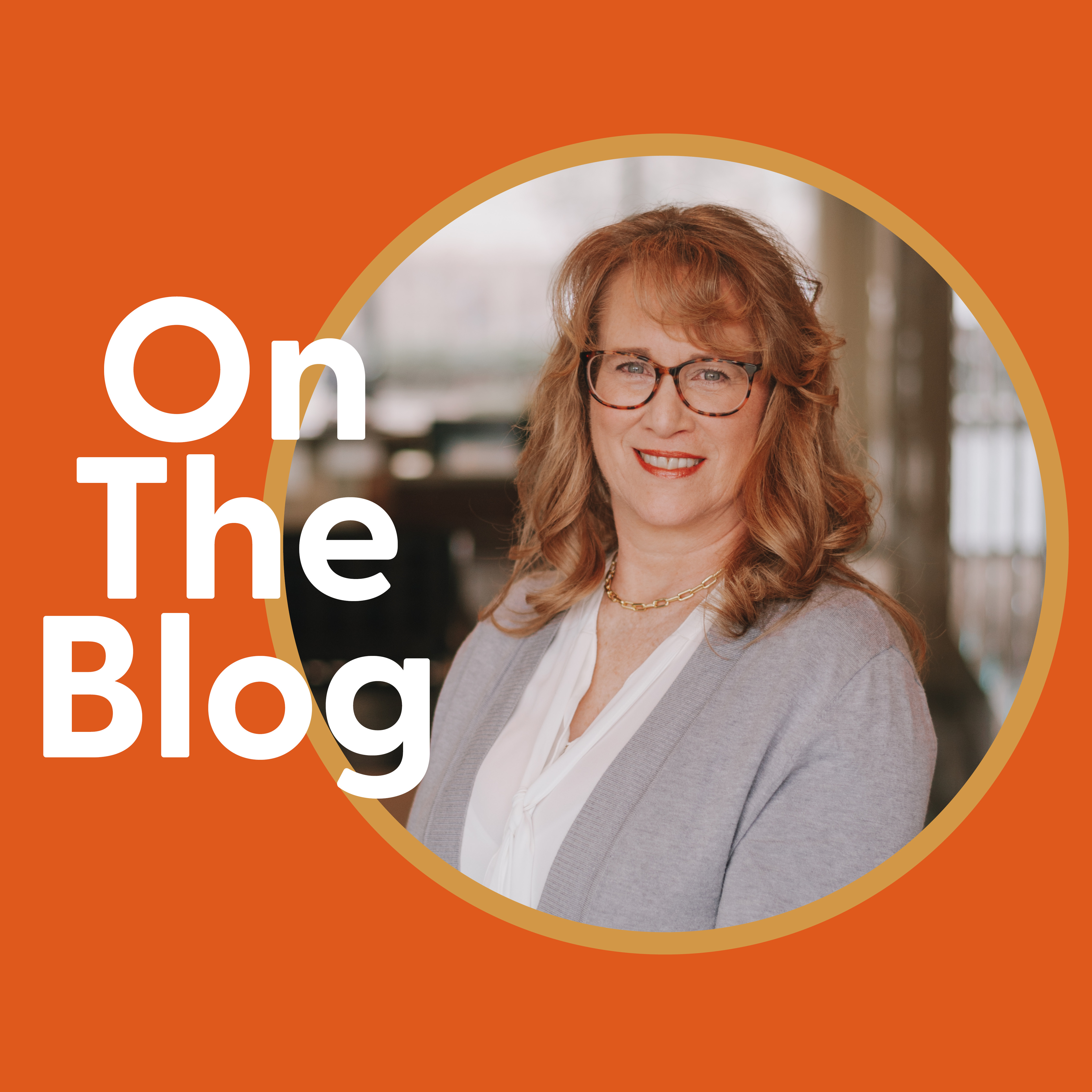
By Trish Reimer
Many of us are familiar with the scholarship application process from the student perspective, but there is also a great deal happening in tandem with the student process.
There are other individuals who are preparing for this season – the scholarship selection committee members. These inconspicuous groups of individuals are the behind-the-scenes volunteers who have tremendous passion for helping students attain higher education and dedicate hours of their time to ensure that deserving recipients are selected.
Lincoln Community Foundation manages 88 scholarship funds and oversees 55 review committees comprised of more than 250 individuals. These volunteers are an integral part of the scholarship selection process, assisting LCF with its responsibility of granting scholarships to more than 325 students each year.
The reviewers work diligently each spring to read through every application and evaluate them in accordance with the criteria of the scholarship. All reviewers take this responsibility very seriously and are dedicated to protecting the integrity of the selection process.
While applications are being received, LCF is finalizing selection committee members so that reviews can begin promptly after the application deadline. Chairs of the committees confirm their committee rosters, new reviewers are recruited, and instructional documents are updated.
Early in the review period, training sessions are offered to help new reviewers become familiar with the scholarship software and returning reviewers are coached on changes. Reviewers learn how to evaluate applications and utilize a rubric in which different components of an application can be scored. Many tools are used to evaluate applications seeking to provide un-biased, robust assessments from several viewpoints.
Throughout the 5-week review period, correspondence occurs amongst reviewers seeking additional guidance or needing clarification about an application. It is a collaborative, team effort. On average, a first-time read of an application takes about 10 minutes and a reviewer will spend a total of 8-10 hours evaluating applications prior to the selection meeting.
The next step in the process occurs in late April when committees convene to make selections. I cannot convey how impressed and appreciative I am when I witness the meticulous appraisals of applications and the passionate advocacy for the students. Coming to a consensus on the recipients is challenging but is always done with respect and polite debate. Members strive to maintain objectivity but also recognize they are tasked with making important decisions that can affect a young scholar.
The biggest frustration that is common among most committees is that there are simply too many deserving students and not enough scholarships to award. I find it a great honor to work with such dedicated people who demonstrate their sincere desire to help students.
Serving on a scholarship selection committee is challenging but also very fulfilling. Although one may not receive great public recognition, there is a considerable amount of satisfaction knowing your work helped students move closer to attaining their educational goals. Most reviewers are pleased to return each year to commit to this work for which they have so much passion.
We are always looking for those who share this passion and have the desire to volunteer in this capacity. If this sounds like you, please contact me at trishr@lcf.org. You may also refer to this document that provides more specific information about our scholarship selection committees.
LCF Supports Strong Neighborhoods Grants
Published on Aug 14, 2023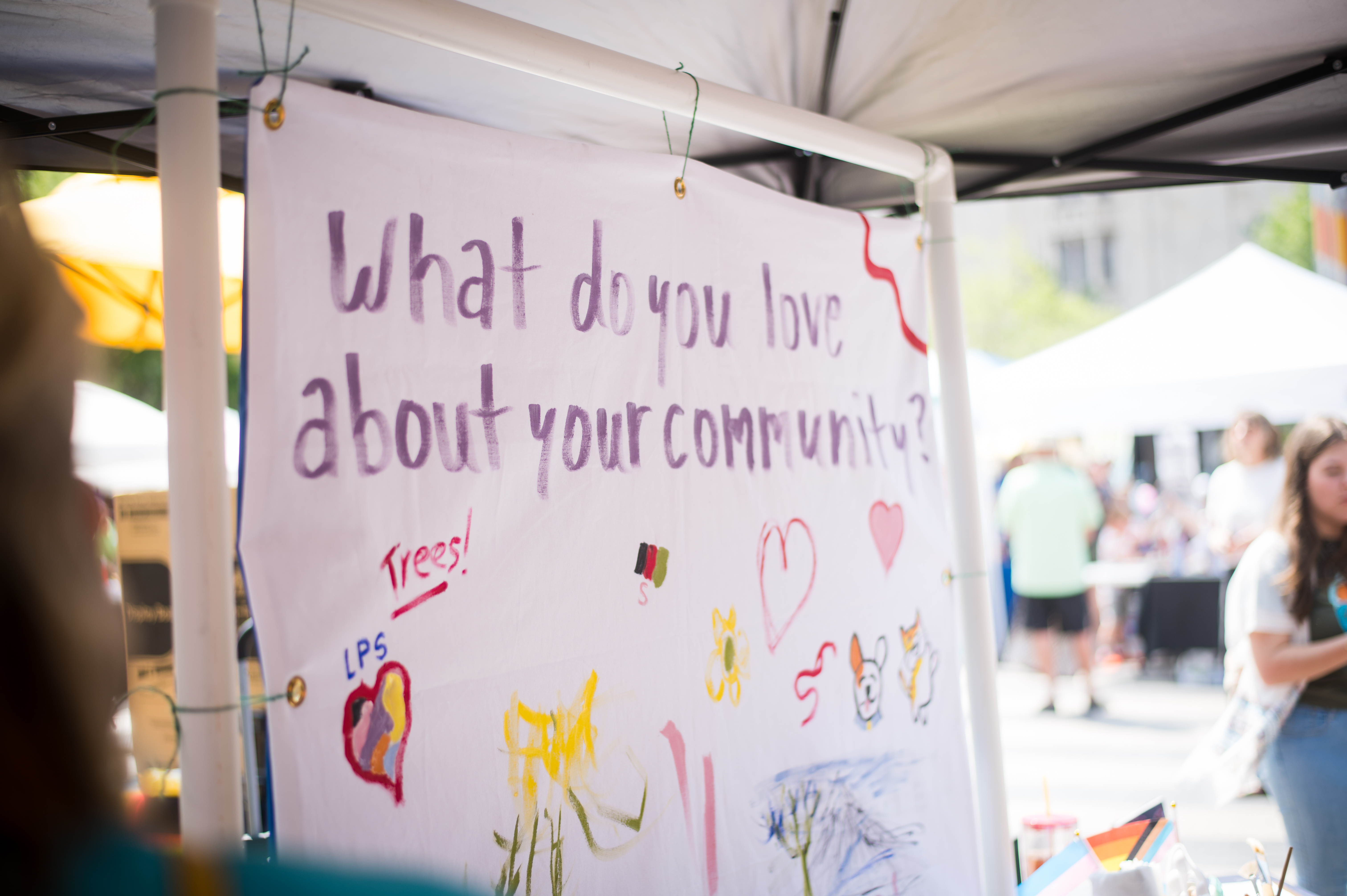
Lincoln Community Foundation and Civic Nebraska along with members of the Community Builder Coalition recently unveiled the Strong Neighborhoods Grants program to support neighborhood-based, resident-led programs and projects across Lincoln. LCF granted $25,000 to support and equip neighborhood stakeholders to achieve their neighborhood development goals.
Civic Nebraska will serve as the fiscal agent and distribute the funding at the discretion of the Community Builder Coalition, a group of community builders and organizers from local organizations that formed via Prosper Lincoln’s Strong Neighborhoods initiative.
“This grant opportunity is very unique,” said Allie Christianson, a senior community organizer with Collective Impact. “It demonstrates how neighbors and neighborhoods are already vital. These grants can put money back in people’s pockets and help neighbors continue to drive positive change.”
Strong Neighborhoods grants may include neighborhood events that bring neighbors together and strengthen relationships in the community, projects that enhance the safety, beauty or social connections within a neighborhood or develop leadership skills and roles of neighborhood residents. Each project may receive a grant of up to $1,000.
The first round of grants included funding for sustainable landscaping in the Near South neighborhood, a free community workshop day on rewilding yards with the South Salt Creek Community Organization, and a community art space and screen-printing studio at Proyecto Cultural – a nonprofit dedicated to the preservation of local Hispanic Culture.
To learn more about the Strong Neighborhood Grants program, visit CivicNebraska.org.
Lincoln Community Foundation Welcomes New Board Members
Published on Feb 7, 2024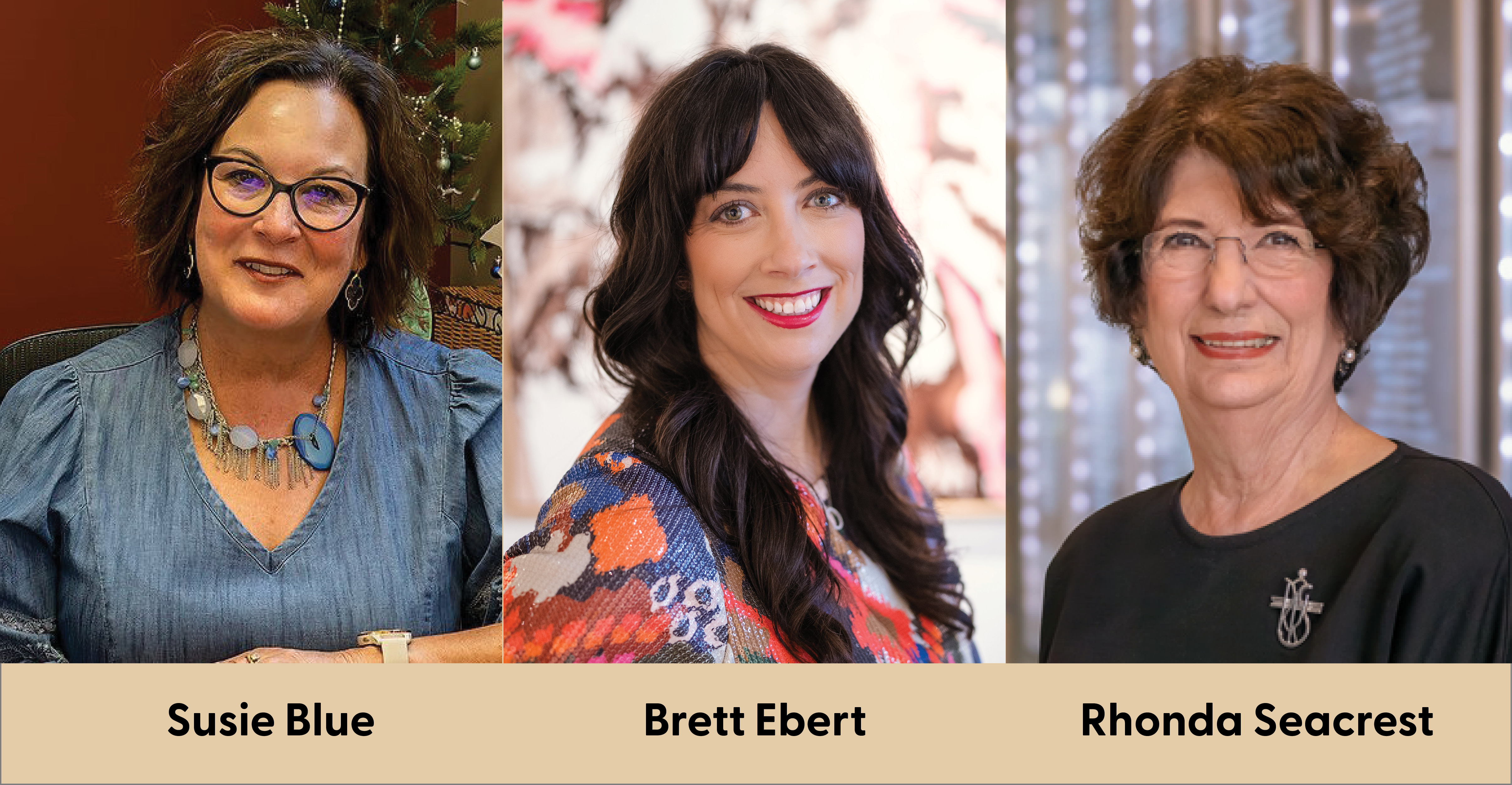
The Lincoln Community Foundation welcomes three new members to its board of directors: Susie Blue, retired Matt Talbot; Brett Ebert, Ball, Loudon, Ebert & Brostrom, LLC and Rhonda Seacrest, Community Advocate.
Officers for 2024 include Mark Hesser, board chair, Pinnacle Bancorp, Inc.; Lauren Pugliese, vice chair, McCarthy Capital; Jasmine Kingsley, secretary, Hudl; Ryan Beckman, treasurer, Olsson, and Marilyn Moore, past chair, retired Bryan College of Health Sciences.
Lincoln Community Foundation, established in 1955, provides leadership and tools that connect donor generosity to local needs and passions. The Foundation has distributed more than $238 million in grants to nonprofit organizations that have improved the lives of thousands of residents. To learn more, visit www.lcf.org.
LCF Open Door Grants: Empowering Individuals to Break Free from Abuse
Published on Dec 1, 2023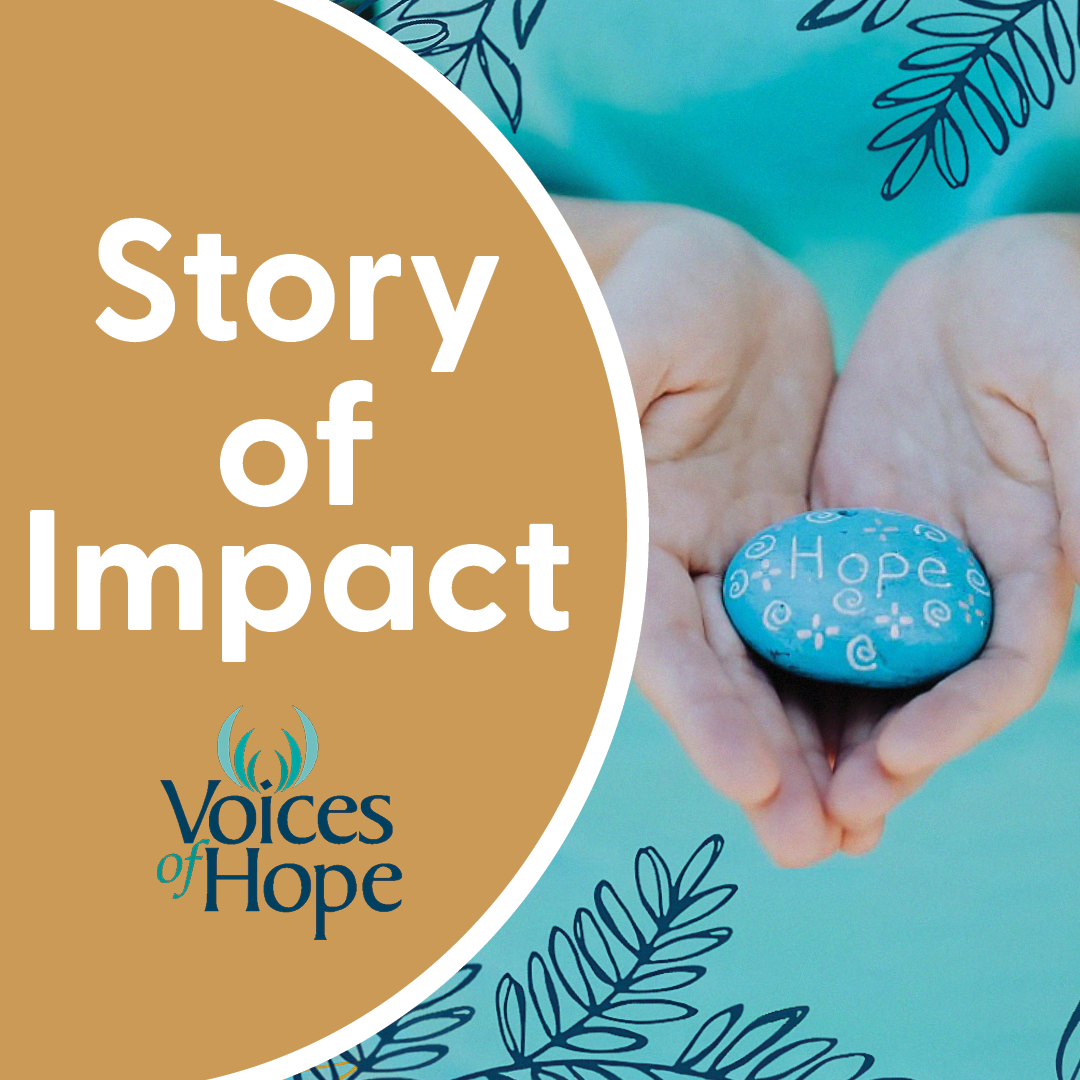
Voices of Hope has been a vital part of our community, providing services and empowering individuals who have experienced domestic violence, sexual assault, and other forms of abuse for more than 48 years. In the last year alone, Voices of Hope served 2,500 unduplicated clients and answered 8,000 crisis line calls.
“Ultimately, we empower individuals to make decisions for their own lives and give them a voice and hope,” said Yaqueline Cisneros, resource development coordinator at Voices of Hope.
Voices of Hope recently received an Open Door Grant from Lincoln Community Foundation to assist in operations for client and community needs, including 24-hour crisis intervention and advocacy services.
Yaqueline appreciated the flexibility in the Open Door application process and that the grants support operational needs.
“We were able to apply when we needed it,” she said. “Having operational dollars from grants and donations is crucial, this allows for more staff time to assist clients.”
Early discussions with clients at Voices of Hope typically include education on the Power and Control Wheel. The Power and Control Wheel was created by the Domestic Abuse Intervention Project to show the common tactics abusive partners use to keep survivors in a relationship.
Voices of Hope uses this Power and Control Wheel to help educate victims and to advocate for decisions on next steps, like leaving the relationship and potentially making a report to law enforcement.
“We find it important to help clients advocate for themselves and encourage them to be masters of their own lives,” expressed Yaqueline.
Additionally, Voices of Hope provides information to our community to increase citizen awareness, enhance sensitivity and prevent domestic violence, sexual assault, and other forms of abuse.
After more than four decades, Voices of Hope continues to build strong community relations with local organizations and businesses. Services are free of charge and rely on individual and business donations and grants for funding. Community members can also volunteer for the crisis line and provide drives for needed items.
Yaqueline shared how their services create hope and how that hope lights the way for a path forward.
“Often times survivors become donors and or volunteers themselves,” she said. "My hope is that anyone dealing with abuse will know that Voices of Hope is here to help them break free from abuse".
2024 Summer Series Application is Open
Published on Mar 18, 2024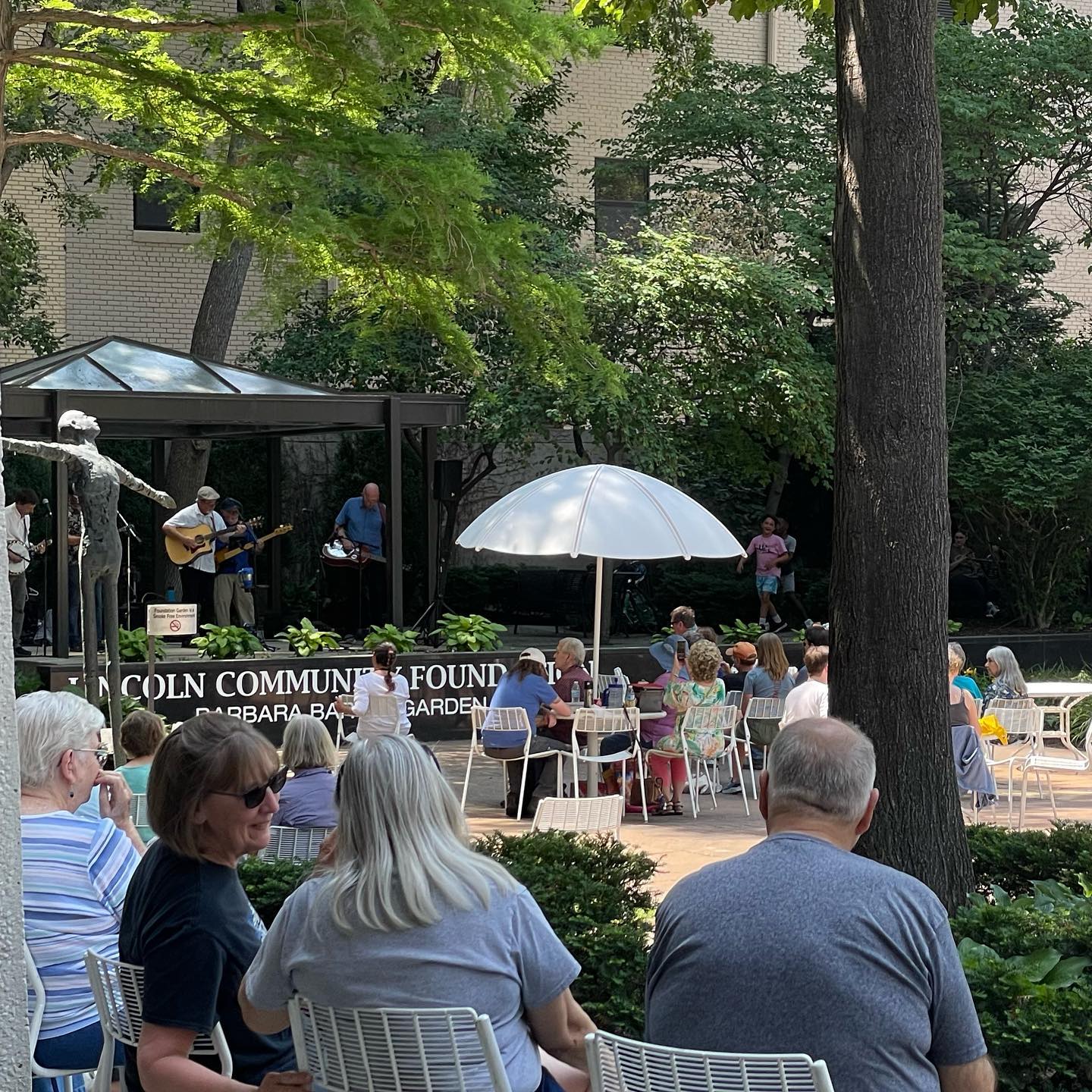
Calling all performers! The Lincoln Community Foundation Garden Performance Series is now accepting applications for the Summer 2024 Concert Series.
The Lincoln Community Foundation Garden Performance Series, a 50-year tradition, is preparing for the 2024 series of free summer concerts and seeking a variety of high-quality, family-friendly performances for the public. Groups will be selected based on variety, quality, availability, and cost/funding available.
Performances will be on Wednesdays from 12:00-1:00pm, May 22nd through September 18th at the Lincoln Community Foundation Barbara Bartle Garden, 1415 N Street in Lincoln. May 30th is Give to Lincoln Day, so the performance that day will be held at the Lincoln Community Foundation Tower Square at the corner of 13th Street and P Street.
Interested performers should download and complete the form below and email it to fgps@artsincorporated.org or mail it to 315 South 9th Street, Suite 110, Lincoln, NE 68508. Please submit this form by Monday, April 1st.
The series is produced by Arts Incorporated.
LCF Announces 50th Anniversary of Summer Concert Series
Published on May 13, 2024The Lincoln Community Foundation (LCF) is excited to announce the 50th Anniversary of their summer concert series taking place May 22 to September 18.
The Foundation Garden Performance Series will present its annual series of events on Wednesdays from May 22 through September 18. All performances will be held from Noon to 1 p.m. at the Lincoln Community Foundation Garden (1415 N St.) with the exception of the Give to Lincoln Day performance on Thursday, May 30, which will be held at the Lincoln Community Foundation Tower Square at the corner of 13th and P St.
The concerts are produced by Arts Inc. and free to the public!
Visit facebook.com/LincolnCommunityFoundationGardenPerformanceSeries for continual updates about the concerts.
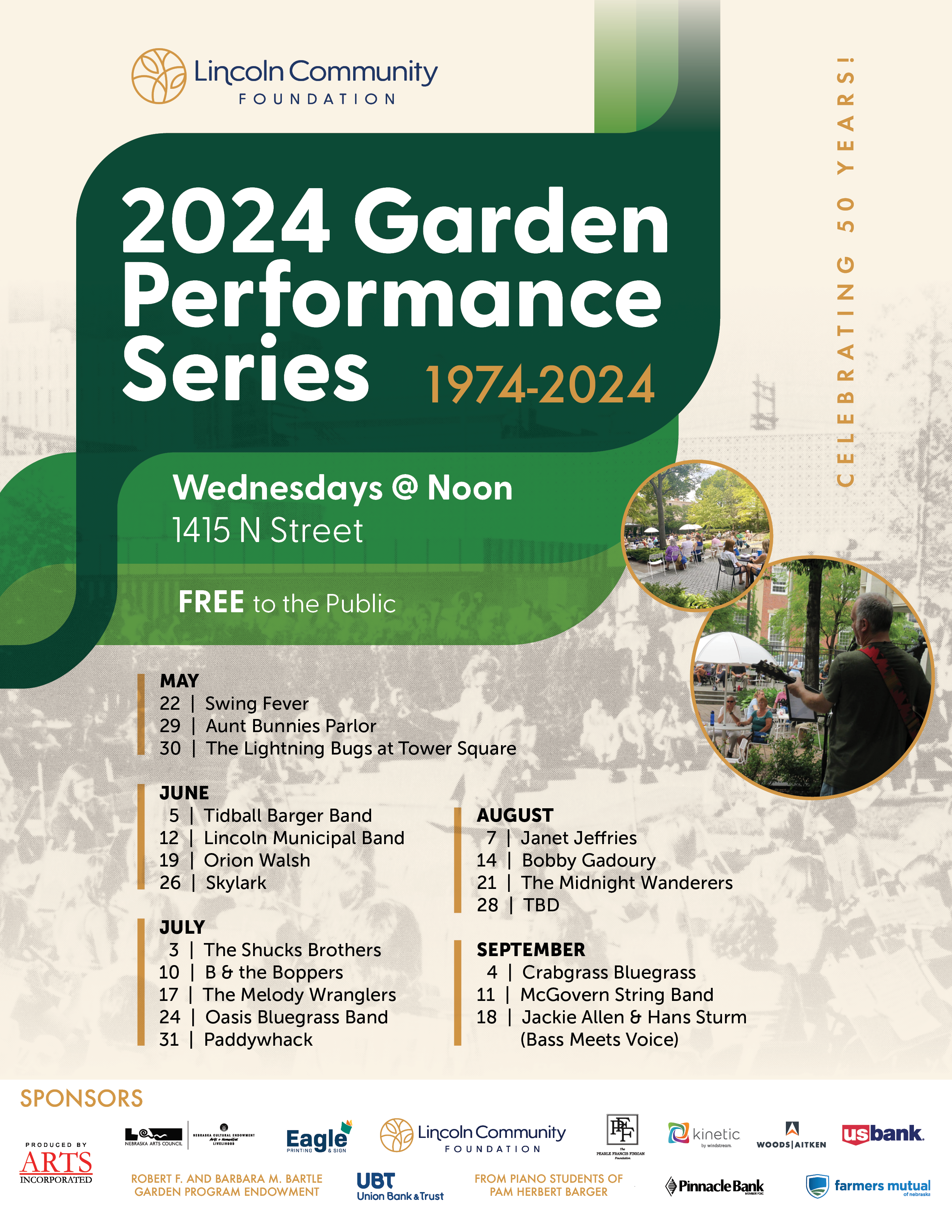
Hansen joins Lincoln Community Foundation
Published on Nov 17, 2023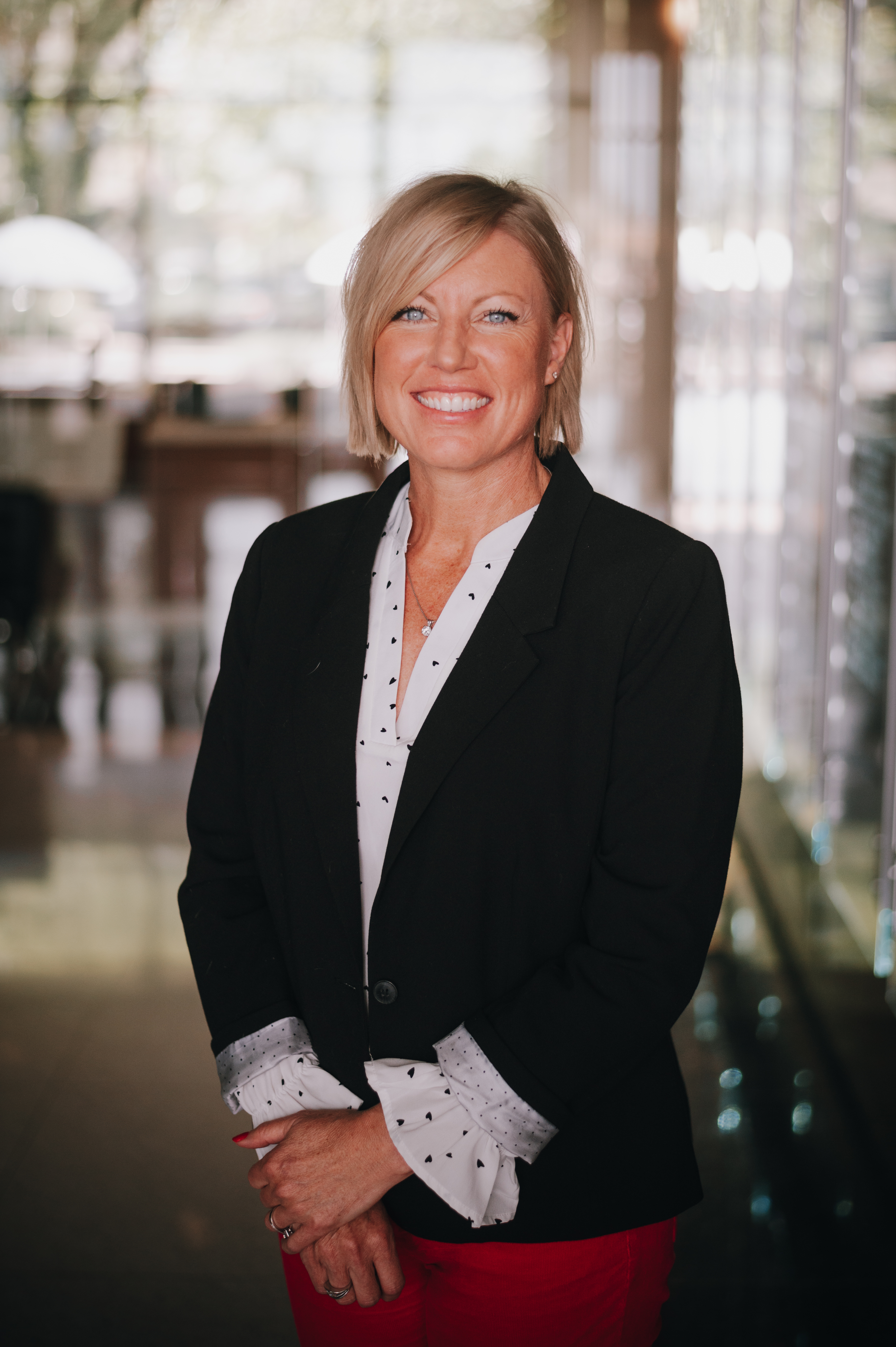
The Lincoln Community Foundation (LCF) is pleased to welcome Sandi Hansen to its team of professionals who are committed to building a better, stronger community for people today and generations to come.
As LCF’s new Senior Director of Development, Major and Strategic Giving, Sandi will lead efforts to support community initiatives and cultivate strategic philanthropic partnerships. Hansen has more than 15 years of major giving experience, most recently with Arbor Day Foundation. Sandi is passionate about creating and fostering meaningful relationships to build the Lincoln community and is a graduate of the University of Nebraska-Lincoln.
“We are thrilled to have Sandi join our team,” said LCF President/CEO, Alec Gorynski. “Her energy, experience, and expertise are a significant boost to the Foundation as we take important steps to facilitate strategic philanthropic investments so that everyone in Lincoln has the opportunity to thrive.”
Since 1955, LCF has been privileged to be part of many wonderful legacies by connecting donor generosity to local needs. The organization serves as a faithful steward for many types of philanthropic gifts and helps donors create lasting legacies of giving. LCF has distributed more than $230 million in grants to nonprofit organizations that have improved the lives of our residents.
The Power of Storytelling
Published on Jul 11, 2023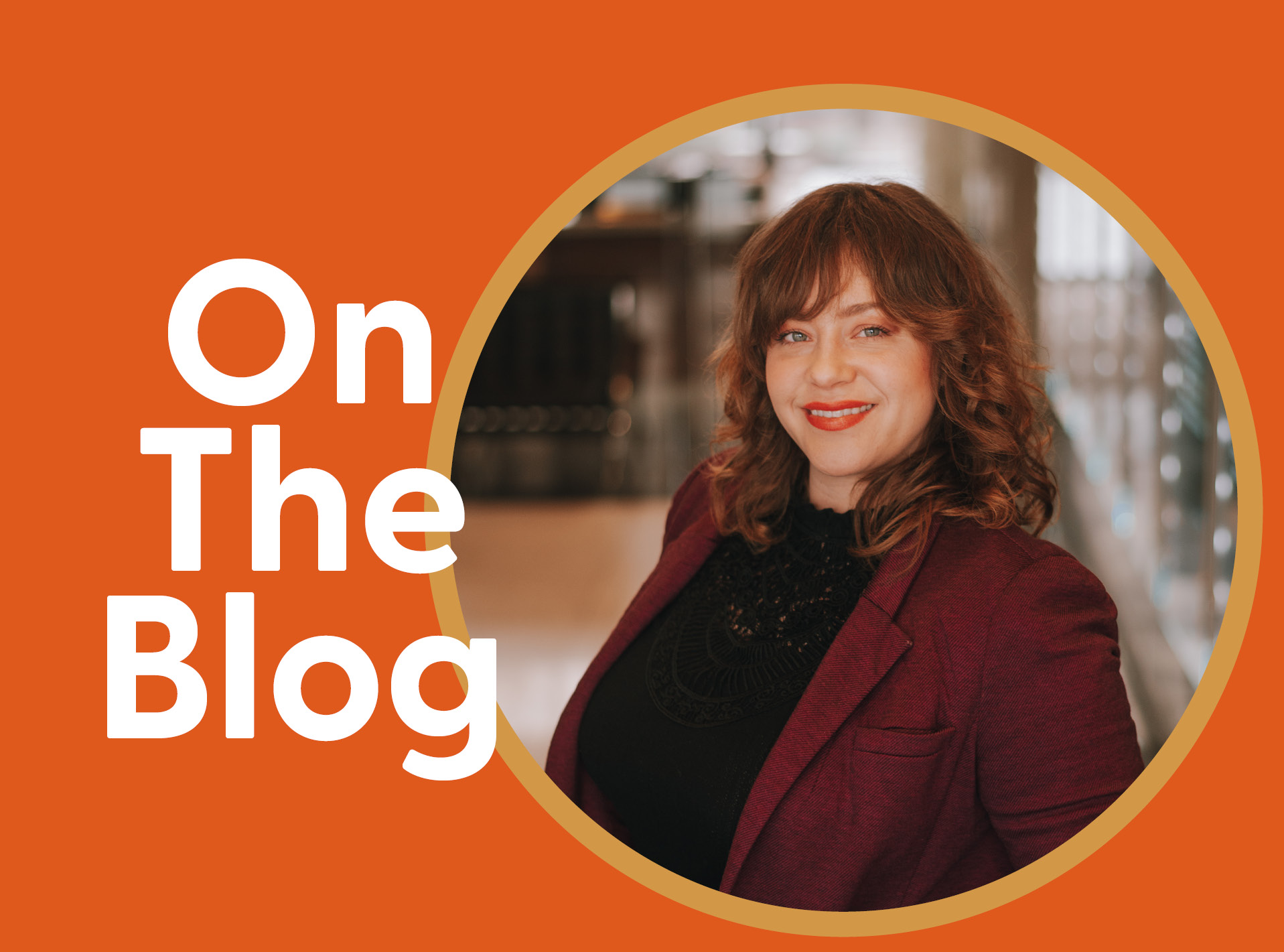
by Carly Grutel
At the Lincoln Community Foundation, we believe in the power of storytelling. So much so, that we incorporated storytelling into our internal culture through our new mission, vision, and values. In my role of Brand and Content Manager, I get to inspire our community to give, act and lead by amplifying the stories of nonprofits, donors, and community members.
I recently had the opportunity to attend a storytelling workshop for nonprofits. I learned how powerful sharing your truth can be for your organization. It inspired me to utilize our blog as a vehicle to tell my story and how my life path has been impacted by our nonprofit community.
I grew up here in Lincoln and I have often asked myself; if it weren’t for the organizations and programs in our community, would I be who I am and where I am today?
As a child, my family experienced poverty, mental health challenges and, at times, homelessness. My mother worked full time and fought for us to have our needs met however, she wouldn’t have been able to do it without community resources.
I remember going to churches to receive supplemental groceries so that we could have a meal to eat. I remember a time when we didn’t have a place to live, and we slept on our family friends’ couches. Many of the other places we lived were not suited for raising children and there were times we would boil water on the stove just to take a warm bath because we didn’t have gas.
Around the age of 12, my family finally had a place to call home. It wasn’t any home; it was an affordable and safe home that was built just for us by Habitat for Humanity. Two huge components of this program are volunteerism and sweat equity. Volunteers give their time and resources to build homes for families in the community they also reside in. Families who move into these homes also need to put in volunteer hours to qualify for the program. I helped my mom provide childcare for parents who were filling out paperwork to get into the program and worked alongside volunteers to build the home that was going to be ours.
At the time, I didn’t know exactly how this would impact our life but I could feel my mother’s sense of hope and relief. I was most excited about finally having my own bedroom and being able to invite my friends over from school. As an adult, I realized it was a key factor in helping me reach my fullest potential.
A few years prior to living in our new home, I had the opportunity to be paired with a mentor, through the TeamMates Mentoring program. For the last 23 years, my mentor has been guiding and influencing how I show up in the world. Ultimately, she showed me a career path I didn’t know was possible, nor existed, for a girl like me. She helped me set goals, create plans, and connected me to people and organizations who could help me get closer to reaching my goals in each stage of my life.
I was the first in my family to graduate from college. As I navigated my bachelor’s degree at the University of Nebraska – Lincoln, I found myself asking more why questions. Why did I experience the life I experienced so far? Why did I get the opportunity to go to college? Why are so many of my peers I graduated high school with not on this higher education journey with me? Why are some of my peers struggling with addiction and in jail?
Those questions led me to the courses that would help me answer, or at least further investigate the many why’s that I possessed. I had a thirst for knowledge and wanted to take on the challenge of changing the world. That is when I decided, whichever career path I follow, it will be tied to helping create a better life for people in my community.
Our experiences influence our values, who we are, who we want to be, and the kind of community we want to live in. Our stories connect us all and guide how we give, act and lead. I am humbled to now have the opportunity to give the microphone to our generous community and share how we are coming together to give everyone in Lincoln the opportunity to thrive.
By the numbers: What’s around the corner in 2024
Published on Dec 11, 2023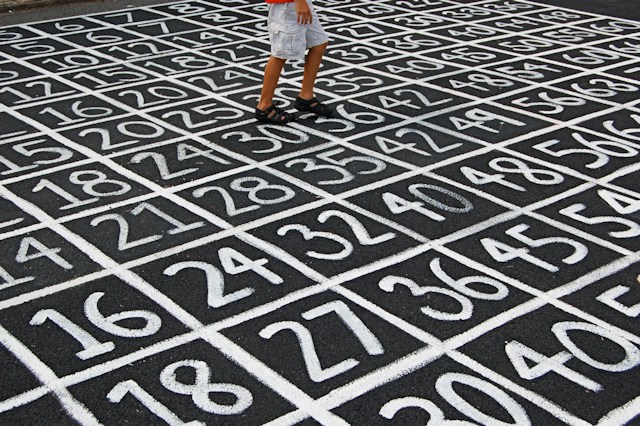
As 2023 makes way for 2024, you’re no doubt inundated with information about the various IRS thresholds that are subject to adjustment. But have you thought about how each of these thresholds might be connected with your clients’ charitable giving? Here are a few pointers to keep handy as you inform your clients about changes for 2024 and also help them tee up their charitable giving plans for the coming year.
1. Social Security COLA increases
The Social Security Administration announced a cost-of-living adjustment (COLA) increase of 3.2% that will take effect in January. This increase is less than half of 2023’s COLA increase (which was the highest since 1981) and reflects inflation’s decline in recent months.
Connection to charitable giving: Remember that retirees are a unique group when it comes to tools and techniques related to charitable giving. Remember also that 72% of Baby Boomers (and 88% of the Silent Generation!) give to charity every year, so if your clients include retirees, you’re almost certainly dealing with philanthropic individuals. When you talk about the Social Security increase, it’s a logical time to also bring up charitable giving plans for 2024.
2. Standard deduction increases
The standard deduction will increase in 2024 by approximately 5.5 percent to $14,600 for single tax filers and $29,200 for married couples filing jointly.
Connection to charitable giving: The standard deduction is an important factor in charitable giving. Your clients whose gifts to charity, plus other deductions, total more than the standard deduction are eligible to itemize deductions. You know this, of course, but it is worth talking with your clients about their 2024 charitable giving plans (and their last-minute plans for 2023!) to evaluate whether a “bunching” strategy, working with Lincoln Community Foundation, could be helpful to maximize a client’s intended support of favorite charities over the next few years.
3. Tax brackets
Though tax rates in each tax bracket, ranging from 10% to 37%, aren’t changing, the income levels that define each bracket are increasing. Generally speaking, your clients can earn up to about 5% more in 2024 and remain in their 2023 tax bracket.
Connection to charitable giving: Reviewing tax brackets with your clients is a good time to bring up pending legislation known as the Charitable Act, which would create a “universal deduction” even for taxpayers who do not itemize. A similar, pandemic-era law that has since expired helped boost giving following the drop in giving that occurred after the standard deduction increased in 2018.
4. Qualified Charitable Distributions
Each taxpayer aged 70½ and older may direct up to $105,000 in distributions from an IRA to a qualified charity in 2024, up from $100,000 in 2023. Note that your client can make a once-in-a-lifetime QCD to a charitable remainder trust or charitable gift annuity in the amount of $53,000 in 2024 (adjusted for inflation from $50,000 in 2023).
Connection to charitable giving: With the ability to give more in 2024 than 2023, your clients can further escape income tax via QCDs and satisfy a greater portion of their Required Minimum Distributions (RMDs). Field-of-interest and designated funds at LCF are very effective recipients of QCDs.
Charitable giving tips for clients’ golden years
Published on Dec 11, 2023
The rising popularity of the Qualified Charitable Deduction –” QCD” appears to be inspiring an increasing number of retirees to re-evaluate their charitable giving plans. Before the clock winds down on 2023 giving opportunities, be sure you’re familiar with the various charitable giving techniques that are most appealing to retirees and the various ways Lincoln Community Foundation can help.
Greater connection to community. Retirees often feel a greater connection to their community and favorite charities than your clients who are not retired. Whether it’s because a retiree’s income and corresponding giving capacity are more predictable, or because a retiree has more time, getting involved with favorite charities can help retirees stay active and even avoid loneliness. The team at Lincoln Community Foundation stays connected with the many nonprofit organizations in Lincoln and Lancaster County, and we are happy to serve as a sounding board for your retired clients who want to get involved.
Less likely to itemize deductions. Many retirees apply the standard deduction on their income tax returns because they don’t have many expenses that qualify for itemization, such as business expenses and mortgage interest deductions. Help your retired clients evaluate whether itemizing deductions in certain years could be beneficial. Through a donor advised fund at Lincoln Community Foundation, your clients may be able to concentrate charitable contributions into particular tax years and benefit from the deductions above and beyond the standard deduction. This is called “bunching,” and a donor advised fund can help your client take advantage of itemizing tax deductions while still allowing them to provide steady support to nonprofits in years that follow the itemizing year.
More interested in involving children and grandchildren in their philanthropy. LCF is happy to help your retired clients fulfill their desire to stay connected with their children and grandchildren, including formalizing roles for these family members as advisors and successor advisors of the retiree’s donor advised fund at LCF or assisting with your clients’ private philanthropy. This is often an excellent and easy way to structure philanthropic priorities for generational wealth as well as create positive, authentic communication channels across an extended family.
Excellent candidates for Qualified Charitable Distributions. Your clients who are at least age 70½ can direct a tax-free distribution (up to $100,000 per individual in 2023) from an IRA to a qualified charity such as a field-of-interest or designated fund at Lincoln Community Foundation. For your clients who must take Required Minimum Distributions (RMDs), the Qualified Charitable Distribution (QCD) is especially beneficial. This is because the distribution to charity counts toward the RMDs and therefore never lands in the client’s taxable income.
LCF Awards More Than $1 Million to Support Nonprofits and Students
Published on Jan 19, 2024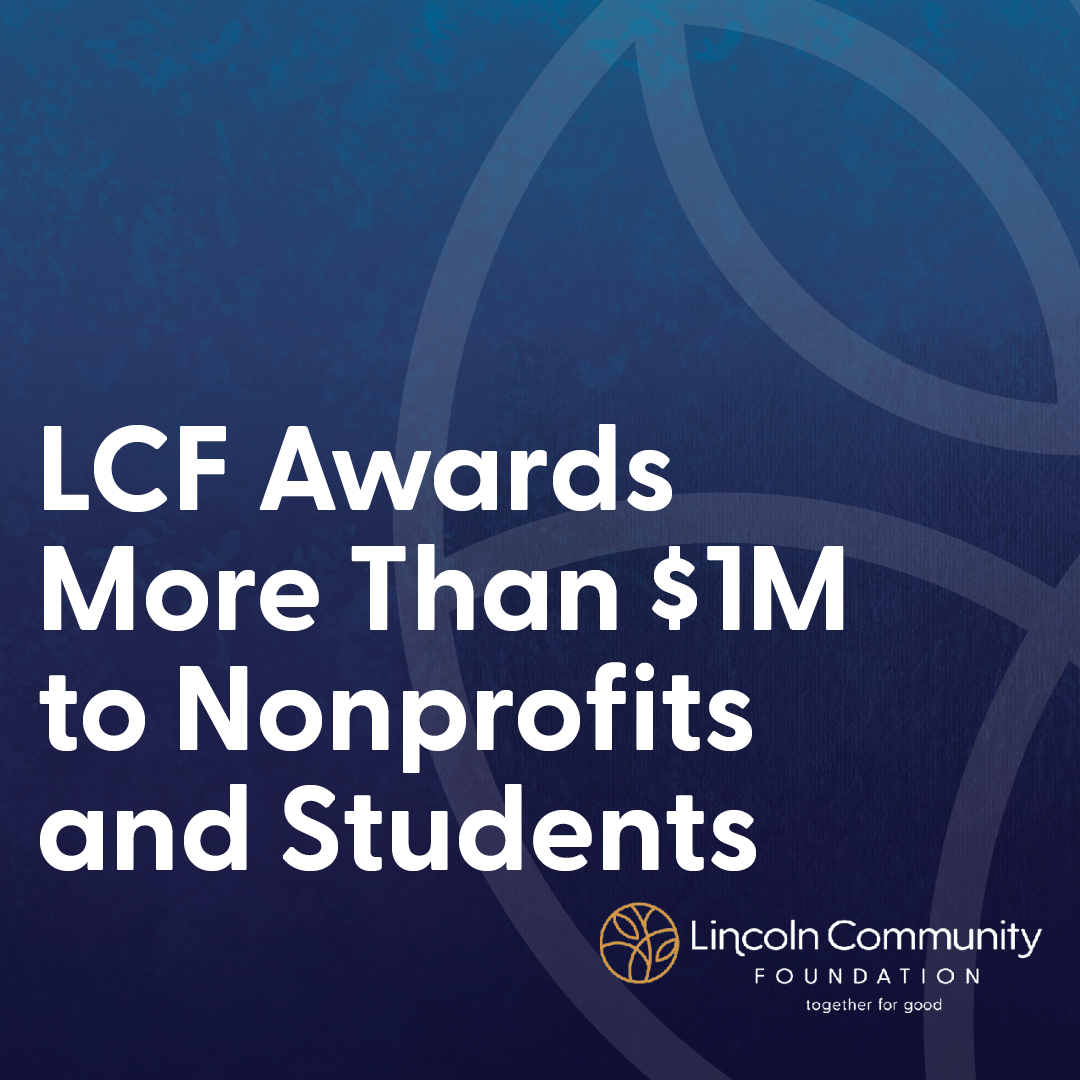
In 2023, Lincoln Community Foundation (LCF) distributed nearly $1,025,000 in Open Door Grants to local nonprofit organizations and scholarships for students.
Open Door Grants support efforts by nonprofits in Lincoln and Lancaster County to meet existing needs or address challenges and opportunities facing our community. These grants are made possible by contributions from the Lincoln Forever Fund and LCF donor endowment funds. In 2023, LCF granted $474,786 to 81 local nonprofits. The full list of grants awarded may be viewed at https://www.lcf.org/impacting-community/grants-awarded.
Generous donors to Lincoln Community Foundation have established 87 scholarship funds that benefit students in Lancaster County and across the state of Nebraska. For 2023, there were 291 scholarship recipients who received awards that totaled nearly $550,000.
Lincoln Community Foundation, established in 1955, provides leadership and tools that connect donor generosity to local needs and passions. The Foundation has distributed more than $238 million in grants to nonprofit organizations that have improved the lives of thousands of residents.
Committing to Our Core Values
Published on Apr 5, 2024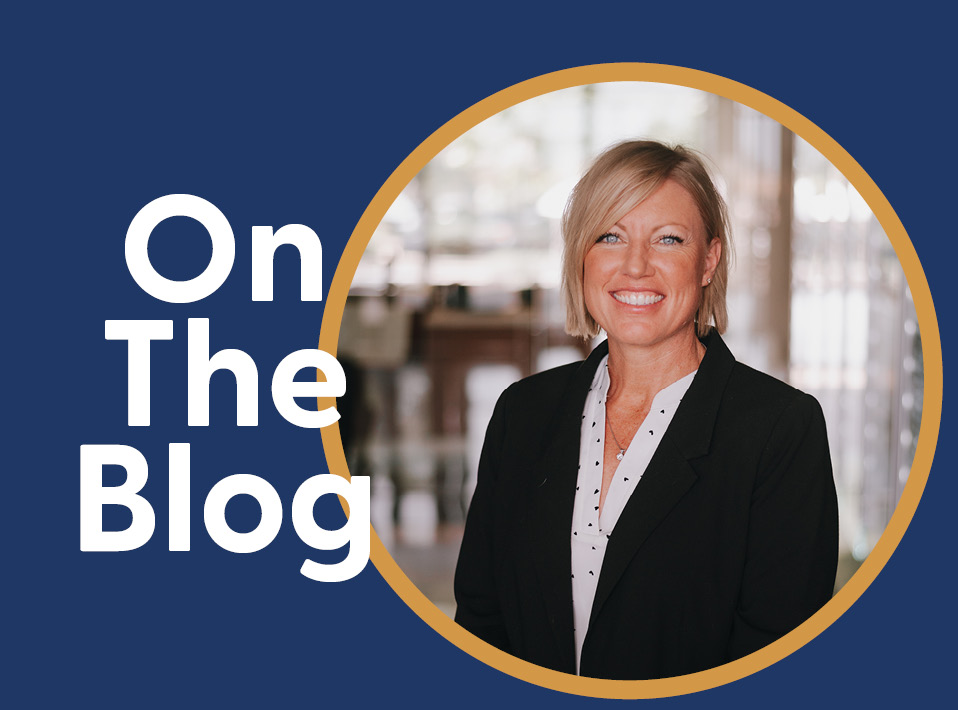
By Sandi Hansen
“If we can get to the place where we show up as our genuine selves, and let each other see who we really are, the awe-inspiring ripple effect will change the world.” -Terrie M. Williams
I learned from a very young age that I was terrible at being anyone other than myself. As I grew and developed, I found freedom in truly being authentically me in all situations. After spending almost two decades in my line of work of major giving, I’ve realized that my main core value of authenticity has been behind the scenes – guiding my actions, decisions and ultimately my success.
Understanding and articulating my personal core values has led me to a more purpose-driven life. What do I mean when I say, “core values”? Core values are a simple way for me to think about my code of behavior – a personal set of standards that allow me to say yes, and more importantly, signal me when to say no.
Service is how I show love to others. I’m naturally helpful towards others and over time I’ve learned to hone my servant leader skills. Curiosity and humor are both my elixir to life. There have been few challenges in my life that weren’t fixed through staying curious or at the very least having the ability to laugh at myself.
Being able to acknowledge and verbalize my values has helped me remain focused on the things that are most important to me. They help me decide how I want to spend my time and who I want to spend that time with.
I joined LCF in October 2023 as a Senior Director of Major and Strategic Giving. All that really means is that I’m a professional dot connector. I help connect people I care about with the organizations and missions that they care about. What’s even more exciting in my role is having the opportunity to help others discover their personal values and connect them with people and organizations that have the same shared values.
Now why do collective values for an organization matter?
When I was looking to join the team at LCF last fall, I immediately combed the website for the Foundation’s values:
Integrity, Belonging, Leadership, Collaboration and Stewardship
I believe working for an organization with a shared sense of values helps to collectively align our focus and create an even larger impact. I’ve seen how being transparent in our core values has allowed donors to see themselves as part of our LCF family.
Our staff recently participated in a core value exercise where we had the opportunity to learn more about ourselves and each other. We were each presented with a list of core values and spent time identifying those that resonated most with us. We also shared how the work we do day-to-day fits into our collective core values as an organization. Giving time and space for folks to be vulnerable, transparent, and curious in the process creates a safer, more secure work environment.
If you haven’t taken the time to think about your core values, I encourage you to follow a similar exercise. When you are clear about what you believe, your thoughts, actions and words will start to align with those beliefs as well. It is in this place of alignment that we can connect with ourselves and each other to leave our biggest mark on the world.
Tips for serving clients who love local
Published on Feb 9, 2024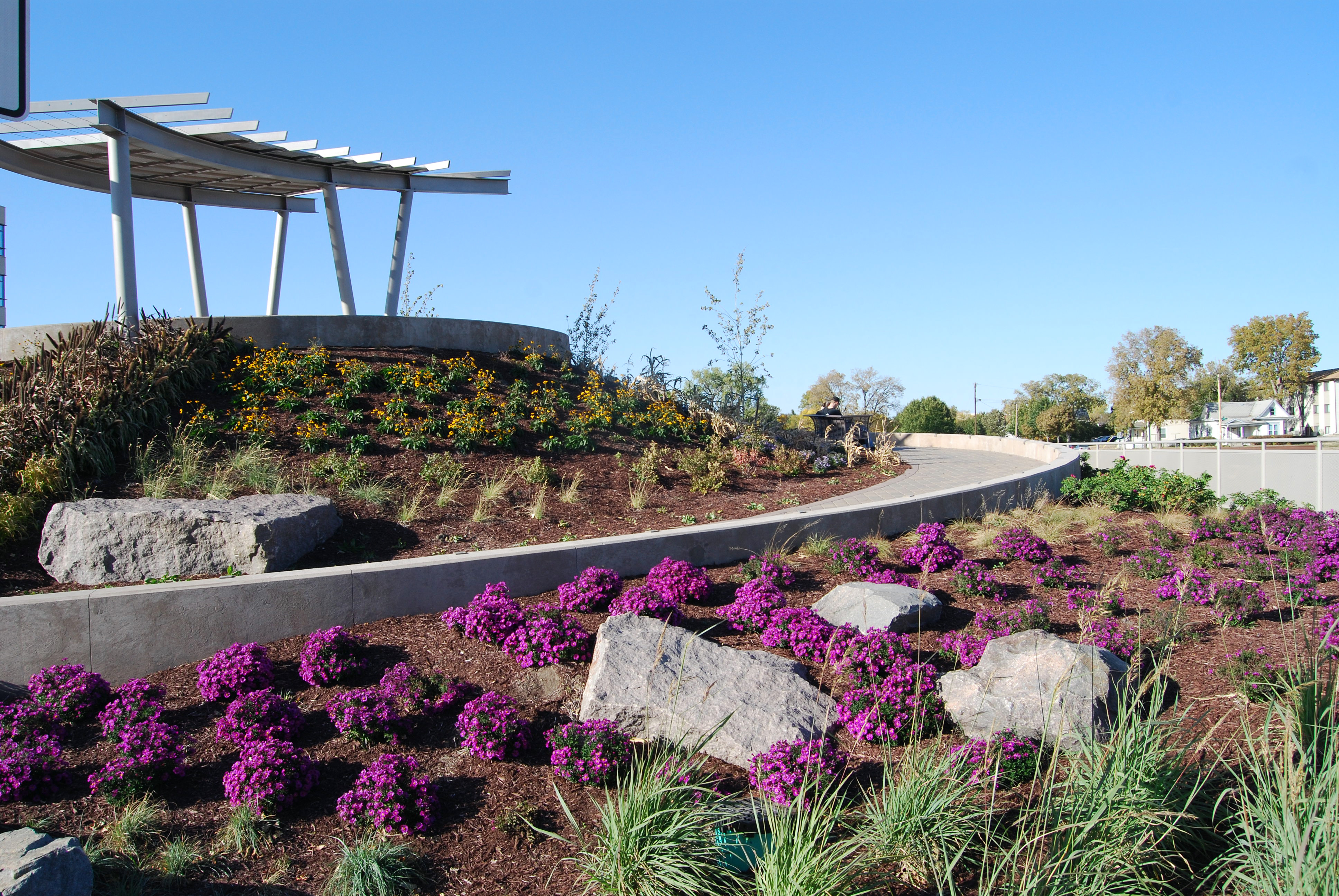
Your charitably-minded clients certainly have no shortage of options for their philanthropic dollars. Many clients use their donor advised funds, for example, at LCF to support favorite charities across the country, including alma maters, organizations in the communities where they’ve lived in the past or have a second home, or charities in communities where their grown children are now living.
Many clients, though, are also deeply committed to the local community where they’re living now, where they’ve raised their children, and where they’ve built a business. That’s why it’s helpful to remind clients that they can reach out to us at Lincoln Community Foundation when they want to make sure their dollars are making the biggest difference possible, right here in Lincoln. Indeed, local giving satisfies many clients’ commitment to “take care of our own.” The unfortunate steady flow of crises and even disasters, coupled with decreasing state and federal funding to local nonprofits, means that philanthropy is playing an increasingly important role in our region. LCF, through our wide variety of fund types available to your clients (including endowment funds to support the community forever), can help your clients achieve their goals for local support, whether that takes the form of disaster recovery, supporting families in need, funding critical workforce development, or paving the way for historic preservation initiatives.
LCF’s Philanthropy Services Team is always happy to provide insight into the challenges our community is facing right now and which organizations are delivering services to alleviate those needs so that your clients can provide immediate support through their donor advised funds.
In addition, an unrestricted endowment fund (we call them Lincoln Forever Funds) may be a good fit for clients who want to improve lives, right here in Lincoln and Lancaster County, for generations to come, whatever challenges our region may face at any given point in time. A Lincoln Forever Fund may be particularly compelling for your clients who are 70 ½ or older. These clients may be eligible to make annual distributions up to $105,000 per spouse from their IRAs directly to a LFF or other permanent fund at LCF. This transfer is called a “Qualified Charitable Distribution,” or “QCD.” Not only do QCD transfers count toward satisfying Required Minimum Distributions, but your client also avoids the income tax on those funds. Furthermore, those assets are no longer part of the client’s estate upon death, so the client can avoid estate taxes, too.
Please reach out to the team at Lincoln Community Foundation for more information on how your clients can support both current and future local needs, and also meet their own financial, tax, and generational legacy goals.
Tackling Early Childhood Challenges Together
Published on Feb 16, 2024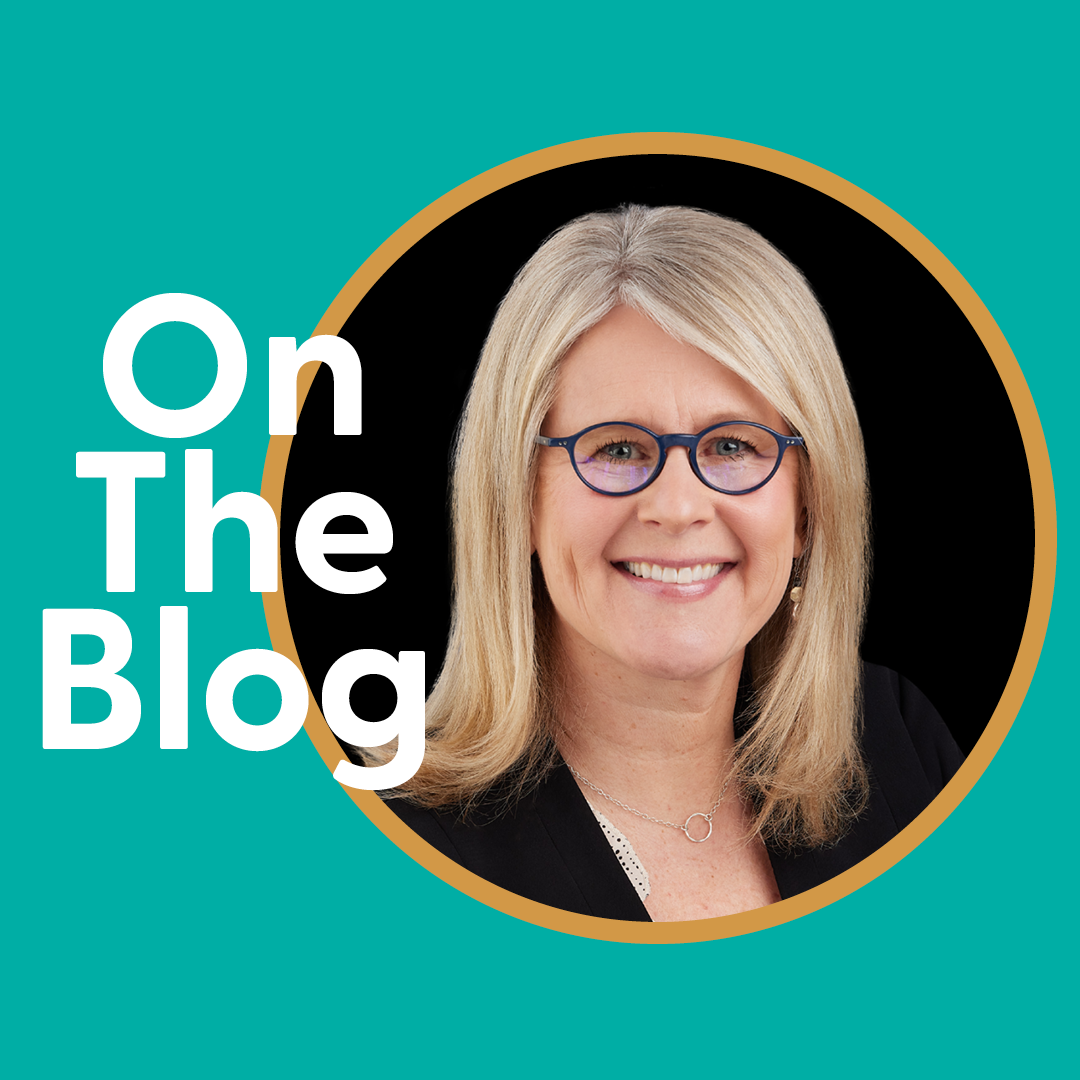
By Anne Brandt, Executive Director, Lincoln Littles
A year ago, we received an email from a teacher at Lincoln Public Schools. She was referred to Lincoln Littles by a colleague trying to help her stay employed. You see, she was a single mother with three children in childcare. She loved her job and wanted to stay but was considering resigning to qualify for state subsidy. She simply couldn’t afford the cost of childcare.
We receive these types of calls and emails from parents weekly.
Did you know we have roughly 20,000 children under six in Lincoln? Many live in single parent households, many attend childcare of some sort, and the average cost of care is between $10,000-$13,000 a year per child. Yet, the average median income of a family with children under 18 is $80,000 a year.
Early childhood access for our youngest residents should be on all our minds because a thriving community begins with quality early care and education. Research tells us children who receive quality early care are more prepared academically, more likely to graduate high school, attend college, and are more successful in the workforce. The ripple effect across the community is undeniable.
At Lincoln Littles, we believe all children should have access to affordable, high-quality early care and education.
Our work is immediate and systemic in scope and focuses on solutions to four key challenges. Our goal is to remove barriers and provide opportunity for all children birth to five access affordable quality early care and education.
So, let’s go back to my example of the average cost of care going with the lower end of $10,000 per year, per child. Let’s say you have two children under six – that’s $20,000 a year which is 25% of a typical family’s income. Far more than the 7% to be considered “affordable” as recommended by the Department of Health and Human Services.
That’s where Lincoln Littles comes in. Thanks to generous donors, we help families who don’t qualify for state subsidy, but still cannot afford quality childcare. We also assist those with emergencies and fund quality improvements for childcare providers using public and private dollars.
We have an early childhood workforce crisis in our community and in our country, which has a ripple effect on other industries. We’ve developed countless partnerships to address these issues in a variety of ways.
Our first childcare workforce survey identified key challenges leading to a new position within our organization dedicated to the support and sustainability of our early childhood workforce. In March of last year, Lameakia Collier joined Lincoln Littles as our Workforce Development Program Administrator.
Preliminary results from our second workforce survey indicate that early childhood providers and teachers are continuing to see challenges. There are growing numbers of children on waitlists –in fact, our survey indicated more than 900 children are on waitlists and that is just from the programs who responded.
Most providers indicated challenges with staff shortages. These shortages further exaggerate challenges by limiting the number of children that can attend a program, increasing exhaustion among staff, and increasing behavioral challenges in young children.
Lincoln Littles also partners with local businesses to help them understand the childcare needs of their employees. Implementing low cost-no cost solutions, near-site childcare partnerships, on-site centers, and resource support. Employers win by keeping key employees, improving productivity, reducing missed hours, and boosting morale. Employees benefit from reduced stress, increased job satisfaction, and peace of mind.
We are proud to be included in the Lincoln’s Chamber of Commerce new strategic plan, leveraging one of their key initiatives to expand local early care capacity.
We continue to play a role in systems change by influencing policy to better meet the needs of children and families, working with all sectors of our city to tackle these complex issues.
Remember the teacher who was going to have to quit her job to receive state subsidy? We were able to help her reapply and because of a policy change increasing the subsidy threshold, she qualified. Today, she remains employed as a teacher, impacting young lives while supporting her own family’s childcare needs.
These types of public-private partnerships are key to realize our goal of all children in Lincoln having access to affordable early care and education. Data has identified it would take $17 million to make this happen. It’s a heavy lift and philanthropy can’t do it alone.
Luckily, we live in Lincoln. We are innovative, we care, and we have people – like you – who want to work together to make a difference. You can make that difference today by supporting our community-wide work at www.LincolnLittles.org.
Tax return reviews help clients level up charitable giving plans
Published on Mar 6, 2024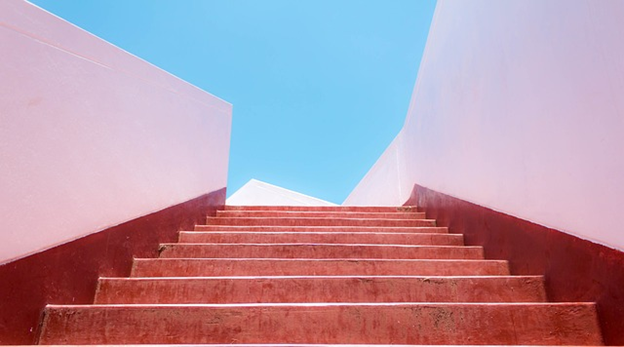
Tax time has its silver linings! Going over a tax return with a client helps start a productive conversation about ways to plan gifts to charity more effectively. As you scan 2023’s charitable contributions, talk with the client about whether those charitable gifts were made with cash or with other assets and then steer the conversation toward discussing the most effective assets to give to charity during 2024 and beyond.
Here is a four-point checklist that can help you advise your clients about the range of charitable giving options.
–Remind clients that cash is not king when it comes to charitable giving. Cash is typically not the most tax-effective form of charitable giving. Instead, encourage clients to consider giving highly-appreciated assets, including publicly-traded stock, to their fund at the community foundation to support their favorite charities.
–Think even beyond stock. Encourage clients to explore not only highly-appreciated stock as a potential gift to charity, but also the various forms of “noncash” assets that can make great charitable gifts. After all, American households’ most valuable assets are retirement accounts and personal residences, not cash. Examples of assets that could be excellent charitable gifts depending on the client’s circumstances include gifts of real estate, closely-held stock, collectibles, and, for clients who are age 70 ½ and older, direct transfers from an IRA (known as a Qualified Charitable Distribution) to a field-of-interest or unrestricted fund at Lincoln Community Foundation.
–Make it easy on yourself and your client. Reach out to the team at LCF for assistance! We are happy to help you and your client evaluate the best assets to give to a donor advised or other type of fund at LCF to achieve the client’s charitable goals.
–Close the loop on IRS reporting. Remember that the reporting requirements are different for noncash gifts to charity versus cash gifts. Make sure you are familiar with IRS Form 8283, which must be filed with any tax return claiming a deduction for noncash assets valued at $500 or more. The IRS expects strict adherence to the terms of the form, especially the requirement for a qualified appraisal. On our end, LCF will handle the confirmation of receipt and a commitment to document and notify the IRS if disposition occurs within three years.
Opening up the full range of charitable giving options for a client can help you structure a holistic estate and financial plan that meets the client’s objectives for family wealth, philanthropy, and tax effectiveness. Reach out anytime to the Philanthropy Services Team at LCF to discuss techniques and strategies.
Fund types tailored to your client’s charitable goals
Published on Mar 6, 2024
Just as each of your clients has a unique estate plan and financial plan to meet the client’s particular situation and goals, each of your philanthropic clients needs a unique charitable giving plan. For example, for some clients, giving shares of highly-appreciated stock consistently every year to their fund at Lincoln Community Foundation makes the most sense for their charitable goals and their mix of assets. For other clients, leaving a bequest to LCF to support specific areas of interest is the best fit for the client’s financial situation and community priorities.
Lincoln Community Foundation offers charitable giving vehicles to meet a wide range of clients’ needs. In many cases, a single client can benefit from setting up multiple funds of different types.
Here’s a quick primer on a few of the most popular fund types.
Donor advised Fund
A donor advised fund enables your client to establish a specific account for charitable giving. Your client makes tax-deductible contributions of cash (or, ideally, stock or other highly-appreciated assets) to the fund, and then recommends grants to favorite charities.
Unrestricted Fund
LCF has its finger on the pulse of the community’s most pressing issues. An unrestricted fund (we call them a Lincoln Forever Fund) gives your client the opportunity to support community needs that can’t be identified until the future. One of the biggest benefits of a community foundation is its perpetual structure that allows clients and their families to offer support to nonprofits that evolves over time as priorities in the region shift.
Field-of-interest Fund
Clients who want to target their giving to specific areas of community need (such as education, health, environment, or the arts) can set up a field-of-interest fund to establish parameters for grant making under the ongoing guidance and expertise of LCF’s staff.
Designated Fund
A designated fund allows a client to direct giving to a specific agency or purpose. Over time, LCF’s staff manages the distributions from the fund according to the terms established by your client.
Agency Fund
An agency fund is similar to a designated fund, except in the case of an agency fund, the source of the initial contribution is the beneficiary nonprofit organization itself, not a donor or donors as is the case with a designated fund. If your client serves on boards of directors of charities, they’d likely be interested in learning more about agency funds. Indeed, if you represent nonprofit organizations and their board members in your practice, it’s helpful to keep in mind that organizations frequently establish agency funds at LCF to set aside endowment reserves or rainy day funds. The team at the Lincoln Community Foundation is adept at navigating the specific accounting standards that are unique to this type of arrangement.
Scholarship Fund
Clients can set up funds to support students’ educational pursuits based on the parameters and application requirements they outline with help from the experts at LCF.
Here’s a pro tip: If you represent clients who are age 70 ½ and older, consider recommending a Qualified Charitable Distribution from a client’s IRA to a fund at Lincoln Community Foundation. All of the fund types noted above are eligible recipients, with the exception of only the donor advised fund.
We look forward to working together to discover the type of fund (or funds!) at LCF that could be a good fit for each client’s unique charitable giving needs.
Community Raises More Than $685,000 for Early Childhood Education
Published on Mar 12, 2024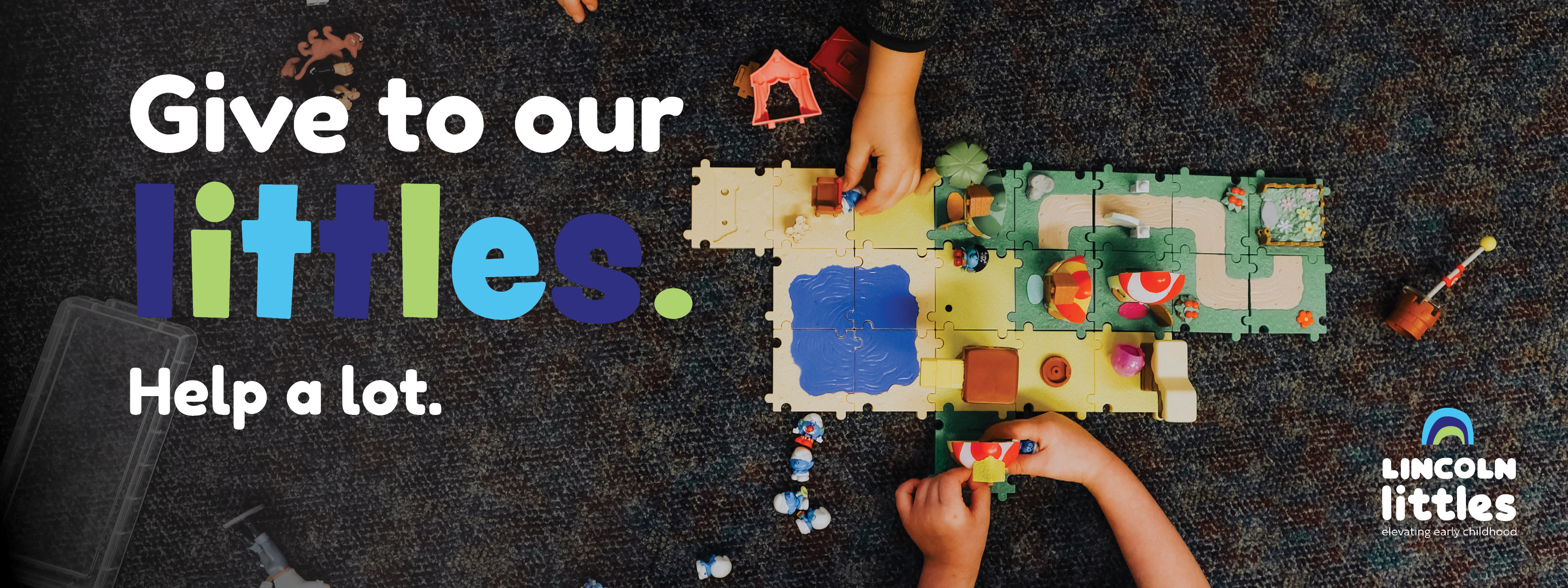
The Lincoln Community Foundation (LCF) announced that its recent annual giving campaign for Lincoln Littles raised more than $685,000 in community support of early care and education. Since 2019, nearly $4.7 million has been raised in support of Lincoln Littles programs, operations, and initiatives – including tuition assistance for infants, toddlers, and preschoolers to attend quality early childhood education programs throughout the community.
“In Lincoln, we know that access to quality care and education means healthy growth and development for our children, a more available workforce, and ultimately more opportunities for our families to thrive,” said Alec Gorynski, LCF President/CEO. “Our community continues to make this a priority with their generous support of Lincoln Littles.”
In addition to increasing affordable childcare options for families, Lincoln Littles’ work focuses on increasing quality in early care and education, educating and engaging businesses and the larger community, supporting workforce development in the childcare sector and influencing policies to be responsive to the needs of young children and their families.
“This community investment means the world to Lincoln’s children and families,” said Anne Brandt, Executive Director of Lincoln Littles. “With childcare costs at an all-time high, these funds will allow us to continue to fill the critical need of affordable, high-quality early care and education for working families.”
Lead Donors: ABC Electric, Acklie Charitable Foundation, Bettenhausen Family Foundation, Drs. Bob & Stacie Bleicher, Becky & Gale Breed, Candy & Bob Campbell, Rosalind K. Carr in memory of Professor James D. Carr, Community Health Endowment, Shirley & Jerry Daugherty, Donlan Foundation, Bob & Jan FitzSimmons, Larry Frederick & Robyn Sitzman, Harbor of Dreams, Inc., Barb Hoppe Johnson & Bruce Johnson, Kile & Cuz Johnson, Jim & Penny Krieger Family Foundation, Lincoln Chamber of Commerce, Drs. Marilyn & David Moore, Mike Munro & Susie Keisler-Munro, Drs. Bob & Lisa Rauner, Sue & Al Saathoff, Rhonda Seacrest, Susan Sehnert Stuart, Tom & Sue Tallman, The Buffett Early Childhood Fund, Sue & Ed Tricker, Dr. Eileen & Richard Vautravers, Bill & Mae Whitmer Family Fund and Woods Charitable Fund.
Story of Impact: Opening New Doors for Open Harvest
Published on Apr 11, 2024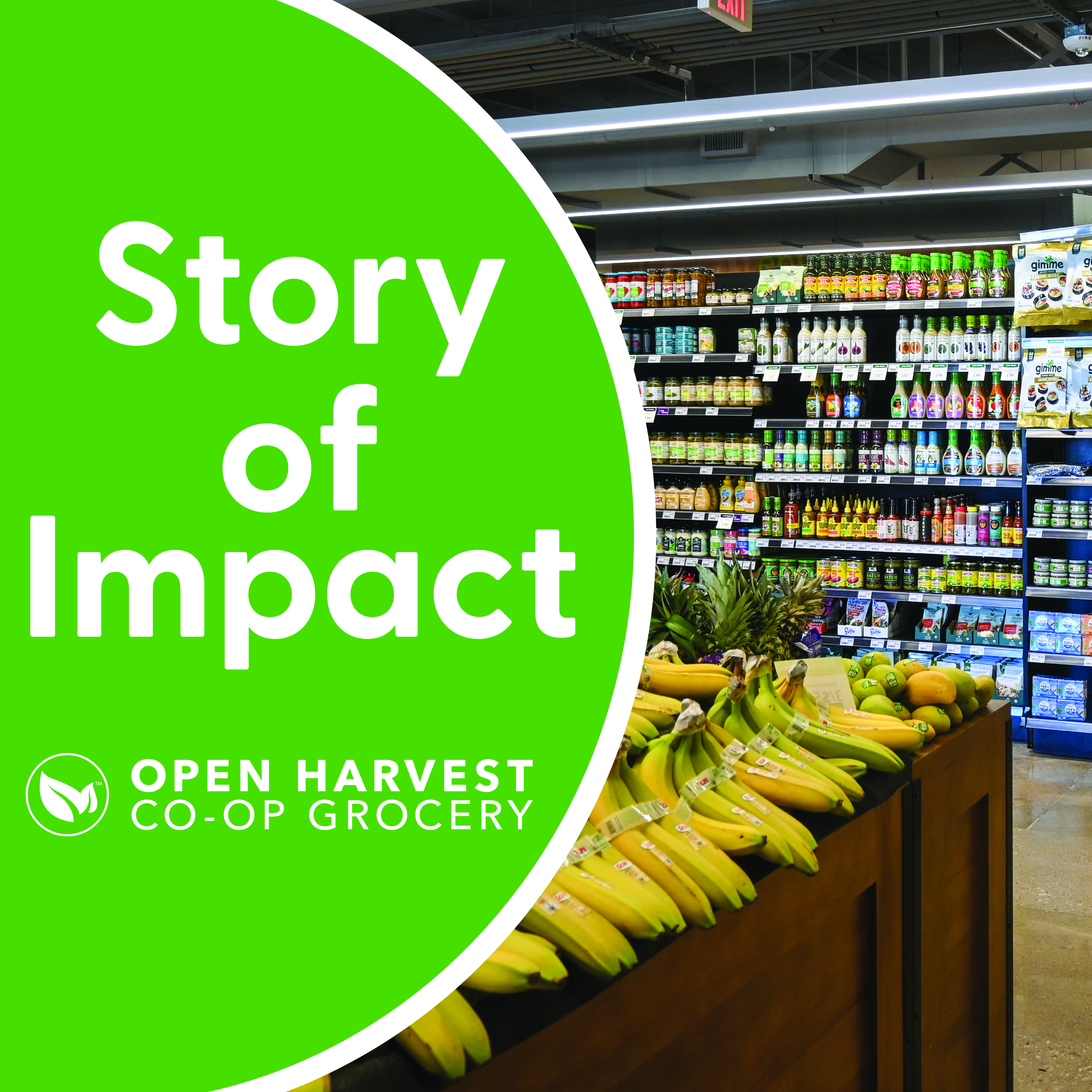
Open Harvest Co-op Grocery has found a new home, now perched right smack in the middle of the Telegraph District in the heart of Lincoln.
That’s only 1.6 miles from the store’s longtime home at 17th and South streets. But it’s one giant leap for this feel-good co-op grocery store, landing in an airy 10,000-square-foot space nestled in one of the city’s newest iconic, historic districts.
“This is a dream come true,” said Amy Tabor, general manager of Open Harvest. “And it’s finally starting to feel real. The store is filled with our merchandise and our people, and I’m no longer tempted to accidentally drive to the old location.”
But the dream may never have become a reality without a boost from Lincoln Community Foundation, which served as fiscal sponsor for funds raised to support the move and space renovation.
“We’re a beloved organization, and I think we underestimated how Open Harvest has touched so many people,” said Carla McCullough Dittman, chair of the Open Harvest Board. “What a gift our community has given us. And gratitude to the Foundation. We hoped they might help us raise maybe $100,000, and their fund came closer to $400,000.”
Established almost half a century ago in 1975, Open Harvest is an authentic co-op grocery store that boasts, “Real Food. Real Local. Real Community.” The store moved to its South Street location in 1990, and despite an expansion or two, was running out of space when the lease was set to expire a few years ago. It was then that the team began to explore raising money for a capital campaign.
“Sitting in the store today, it’s amazing to think back when we were only dreaming about this possibility,” Amy remembered. “How I would ride my bike past this space and feel sure this was the place for us. And suddenly to have it all come true, because so many people gave so graciously and generously.”
Amy emphasized that Open Harvest is not a traditional grocery store, but rather a full-service cooperative with support from 3,000 dedicated, diverse and engaged member-owners. In planning the best path forward for raising funds, the store’s financial consultant suggested that other co-ops across the country had worked with their local community foundations.
Open Harvest approached the Foundation and made the case that the project fit within the Foundation’s mission of serving and enhancing the community. And upon careful review, the Foundation agreed.
Tracy Edgerton, vice president and general counsel for the Foundation, was excited to support Open Harvest’s fundraising efforts. “Providing equitable access to healthy food lines up perfectly with the Foundation’s core vision, and it was such an honor to work with them,” she said.
In determining the best location for the new store, the leaders of Open Harvest sought feedback from the community. And one message came through loud and clear: it was essential to remain close to the central city core.
“We were serious about listening to our member-owners in this major decision,” Carla said. “We conduct annual customer surveys, and it was clear that the majority did not want us to move far.”
Amy agreed and was absolutely thrilled at the results of the fundraising campaign. “I think it speaks to our community and the impact Open Harvest has had over the past 50 years,” she said, “that people clearly wanted to invest in a community grocery store.”
Open Harvest is now open for business at the new location, while adding final touches like digital signage and outdoor seating.
“I’m just so excited that we’ve been able to continue and can now pass on this co-op for the next generation,” said Carla.
DETAILS: Open Harvest, 330 S. 21st St., is open 8 a.m. to 9 p.m. daily.
Michael and Susan Ferris: Embracing Lincoln’s bountiful opportunities for giving
Published on Apr 26, 2024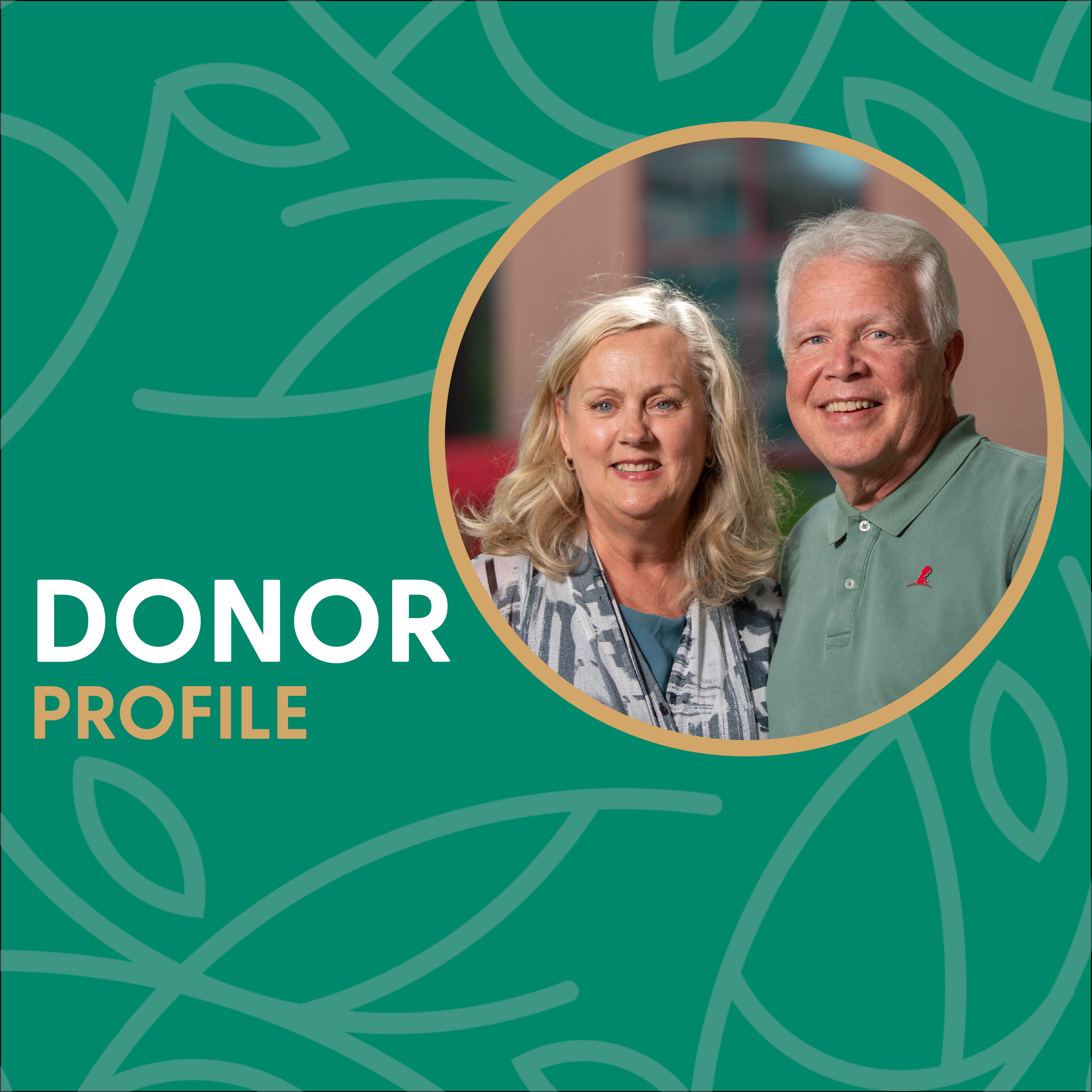
Susan and Michael Ferris met as she approached her senior year of college and he was ready to start medical school. Eventually they married and, like families of so many beginning physicians, lived in various cities across the country – Michigan, California, Wisconsin – eventually landing in Lincoln.
Thirty-one years later, they have never looked back from this decision. Michael and Susan are delighted they made Lincoln their forever home, working and raising their four children here. And thanks to their trust in Lincoln Community Foundation, they have lived a life of philanthropy and giving back.
Susan shared that she and Michael believe strongly in demonstrating their pride of place. “Deep in our hearts, we believe in paying it back and paying it forward, to support the community we love.”
Michael agreed and is grateful that Lincoln Community Foundation has enabled them to learn so much about how best to support their adopted home town.
“I’m not sure everyone realizes how many areas of need there are in this city,” Michael said. “But the Community Foundation helps you see the big picture, identifying where your dollars can make a difference and where your community benefits the most.”
Truly, Michael and Susan adore this city, professionally and personally.
Susan currently leads a team of eight Realtors alongside her daughter, Jenna, for RE/MAX. When working with a family, she often shows them Lincoln instead of simply focusing on a specific home.
“When we get in the car, I don’t just sell them on a home. I sell them on the city, a wonderfully safe place where you know your neighbors and can get anywhere in under 20 minutes,” Susan said. “A place with fine arts, libraries, parks, trails. Entertainment and restaurants. Wonderful public and private schools, colleges and universities. The Children’s Museum and Children’s Zoo.”
Michael said Cornhusker football and sports are exciting and fun, but he’s even more impressed with the resources the University brings to the community. “Our son is now a professor, but when he was in fifth grade, he took a physics class at the University of Nebraska-Lincoln.”
Indeed, the community has offered their family countless possibilities, including bountiful opportunities for giving. The couple remembered when they first crossed paths with the Foundation.
“We were contributing to a standard list of charities, approaching our year-end donations and realized we wanted to look for something different to broaden our view,” Michael said. “What we found was a one-stop shop for giving, a place that stays abreast of all charities and can offer new ideas.”
Over the years the Foundation has helped them set up a donor-advised fund to maximize what they give and channel their gifts to local programs that support the things they care about the most. “Along the way, we believe that the more we give, the more we are blessed with to give anew,” Michael said.
For instance, they consistently support St. Jude Children’s Research Hospital, their church and, through the Foundation, a variety of charities in Lincoln.
“We have a soft spot for children and families in need, and the Foundation supports us in finding the charitable options that tug and speak to our heart,” Susan said. “We have been fortunate and recognize God’s blessings in our own lives, while recognizing there are so many people who are hurting, hungry, homeless.”
Their charitable hearts are tied directly to experiences from their childhood. Susan’s family was hit by tragedy when she was only 12 years old, and her father suffered an aneurysm.
“Somehow friends and family came together and raised enough money to send him to a specialist in Switzerland,” Susan shared. “I can still remember that knock on the door, and seeing too many people to count, people who arrived with sacks of groceries.”
Her dad survived the aneurysm and left a legacy of overwhelming gratitude for charity. “When you’re on the receiving end of beating hearts and generosity, you never forget,” she said.
Michael grew up in a family of six children who all worked together in the family business. But when Michael was in college, his youngest brother was diagnosed with leukemia and died just nine months later.
“But we will never forget when we took him to St. Jude, the loving care and generosity they extended to children and their families,” Michael said. “When you have those kinds of early experiences, you develop a love and heart for giving to others.”
St. Jude is still a central part of their giving, but it also inspired a general spirit of charity through the Foundation.
“If you have a philanthropic mindset but aren’t quite sure where your heart is, where you want to focus your dollars, we would tell anyone to contact the Foundation,” Michael said. “They will honor your priorities.”
These days Michael is happily retired but they both believe it is important to continue showing their gratitude to the community where they raised their family and practiced their professions.
“People will tell you that retirement is the time to move to warmer climates, move to where your children live,” Michael said with a smile. “We aren’t moving anywhere. We will always come back to Lincoln. Lincoln is hard to beat. Lincoln is home.”
***
Michael and Susan Ferris are Benefactors and are a part of the Foundation’s Legacy Society and Board of Trustees. Michael serves on the Board of Directors and the Development and Marketing Committee.
LCF Announces Largest Match Fund in Give to Lincoln Day History
Published on May 1, 2024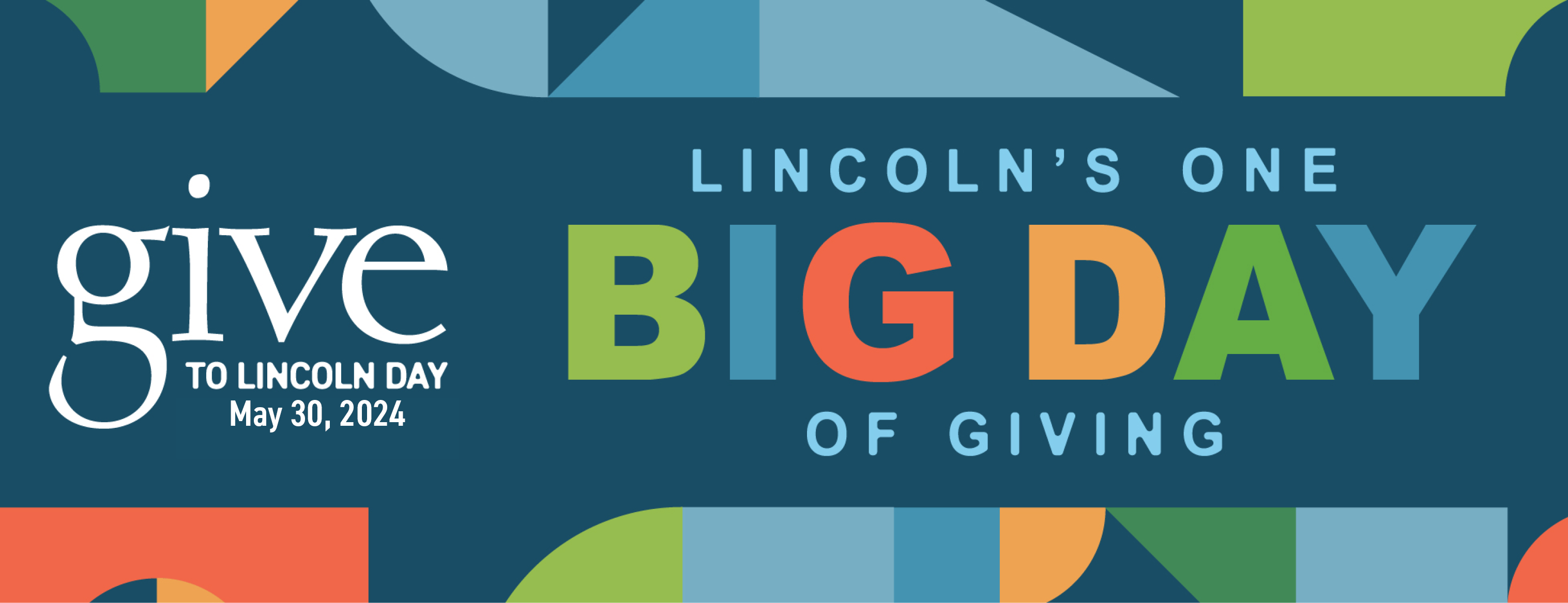
Lincoln’s 13th annual giving day is scheduled for Thursday, May 30th. Coordinated by the Lincoln Community Foundation (LCF), Give to Lincoln Day is an online event encouraging donations to support the local nonprofits and causes people care about. More than 460 local charities have registered for this year’s event. Every participating nonprofit organization will receive a proportional share of a record $650,000 match fund, based upon its percentage of total dollars raised, thanks to LCF and sponsors including Presenting Sponsor, West Gate Bank.
Last year’s event raised more than $7.5 million for local nonprofits. The event has raised $57 million since 2012.
“Year after year, Give to Lincoln Day represents what makes our community special,” said Alec Gorynski, LCF President/CEO. “With the largest match fund in our 12-year history, we can’t wait to create an even bigger impact for our local nonprofits.”
LCF also recently announced the continuation of West Gate Bank’s Presenting Sponsorship for Give to Lincoln Day for the next three years.
“Our ongoing commitment to Give to Lincoln Day is one of the many ways we are investing back into the community in order to keep Lincoln growing and thriving,” said Carl Sjulin, West Gate Bank President. “We are proud to continue our partnership with Lincoln Community Foundation as the Presenting Sponsor for Give to Lincoln Day.”
Donors may search participating nonprofits and give online at GiveToLincoln.com. Donations must be made before 11:59 p.m. on May 30 to count toward the giving day and the match fund. The minimum donation is $10 per charity. Additionally, gifts made online at GiveToLincoln.com from May 1 through May 29 are eligible for a daily drawing to receive a $250 boost from Allo Fiber.
Gifts may also be mailed to the Lincoln Community Foundation if postmarked by May 24. Donors may also drop off donations between May 1 and May 30 at all Lincoln West Gate Bank branches via the lobby or the commercial drop drawers.
- Lincoln Community Foundation’s mailing address, 215 Centennial Mall South, Lincoln, NE, 68508.
- Presenting Sponsor, West Gate Bank, Lincoln Branch Locations, visit https://westgate.bank/locations for lobby hours.
On May 30 donation totals can be viewed throughout the day at GiveToLincoln.com.
Match Sponsors include: West Gate Bank – Presenting Sponsor, ABC Electric, Allo Fiber, Assurity Life Foundation, D.A. Davidson & Co., Davis Design, Frontier Bank, HBE LLP, The Hsin & Chao Families, Kawasaki Motors Manufacturing Corp., Kubly Family Foundation, Lutz, Mail Management Services, Inc., The Family of J. Gates & Daisy Minnick, Olsson, Pepsi Cola of Lincoln, Pinnacle Bank, Runza National, William J. Mueller & Kim M. Robak, Sampson Construction Company, Inc., Joe W. & Ruth K. Seacrest Foundation Fund, Tom & Lisa Smith, Dr. Gene & Kristen Stohs, Talent Plus Inc, Mark H. Tallman, Bill & Mae Whitmer Family Fund and WRK Family Foundation.
Bill and Marilyn Cintani Honored with 2023 Charity Award
Published on May 2, 2023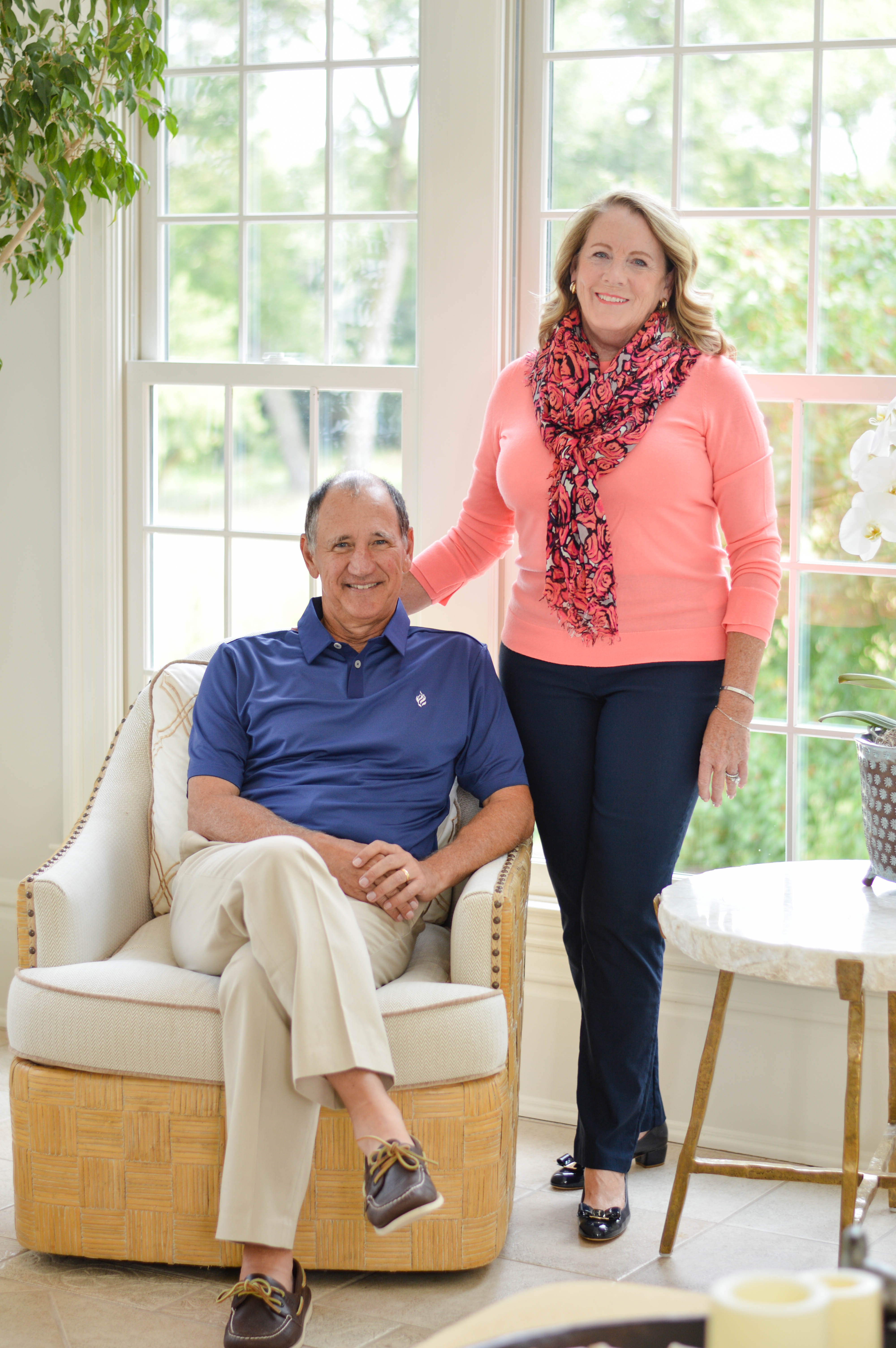
On May 2, 2023, Bill* and Marilyn Cintani became the 12th recipients of the Charity Award. Bill and Marilyn are known for their generous contributions to so many corners of the community, and for their work in partnership with the Lincoln Community Foundation.
Bill brought his vision and leadership to the Foundation’s board from 2012-2017. He served as board chair and past president. During Bill’s time on the board, he saw the impact a match can have on encouraging donations through Give to Lincoln Day. Inspired by this concept of leveraging, in 2018, Bill and Marilyn pledged matching dollars from their personal fund for new donor advised funds established at the Foundation. Marilyn’s heart guides the issues she supports, focusing her philanthropy on children and young families by extending resources to support those enduring challenging situations.
The Cintani’s modest approach to philanthropy has been steady and caring – giving opportunities to those who might not have otherwise had them. They truly epitomize what it means to give, act and lead.
Previous Charity Award honorees include:
Ed and Mary Copple – 2012
James and HK Stuart – 2013
James and Rhonda Seacrest – 2014
Alice Dittman – 2015
Jim and Mary Able and the Abel Family – 2016
Donna Woods – 2017
Robert and Karen Duncan – 2018
Dr. Tom and Nancy Osborne – 2019
Duane and Phyllis Acklie – 2020
Community of Lincoln – 2021
Tom and Lisa Smith - 2023
Spring 2024 Newsletter
Published on May 8, 2024To catch up on the latest Lincoln Community Foundation happenings click here to download the newsletter.
Inspired by her husband, Rosalind Carr hopes to inspire others to give to Lincoln Littles
Published on Feb 27, 2024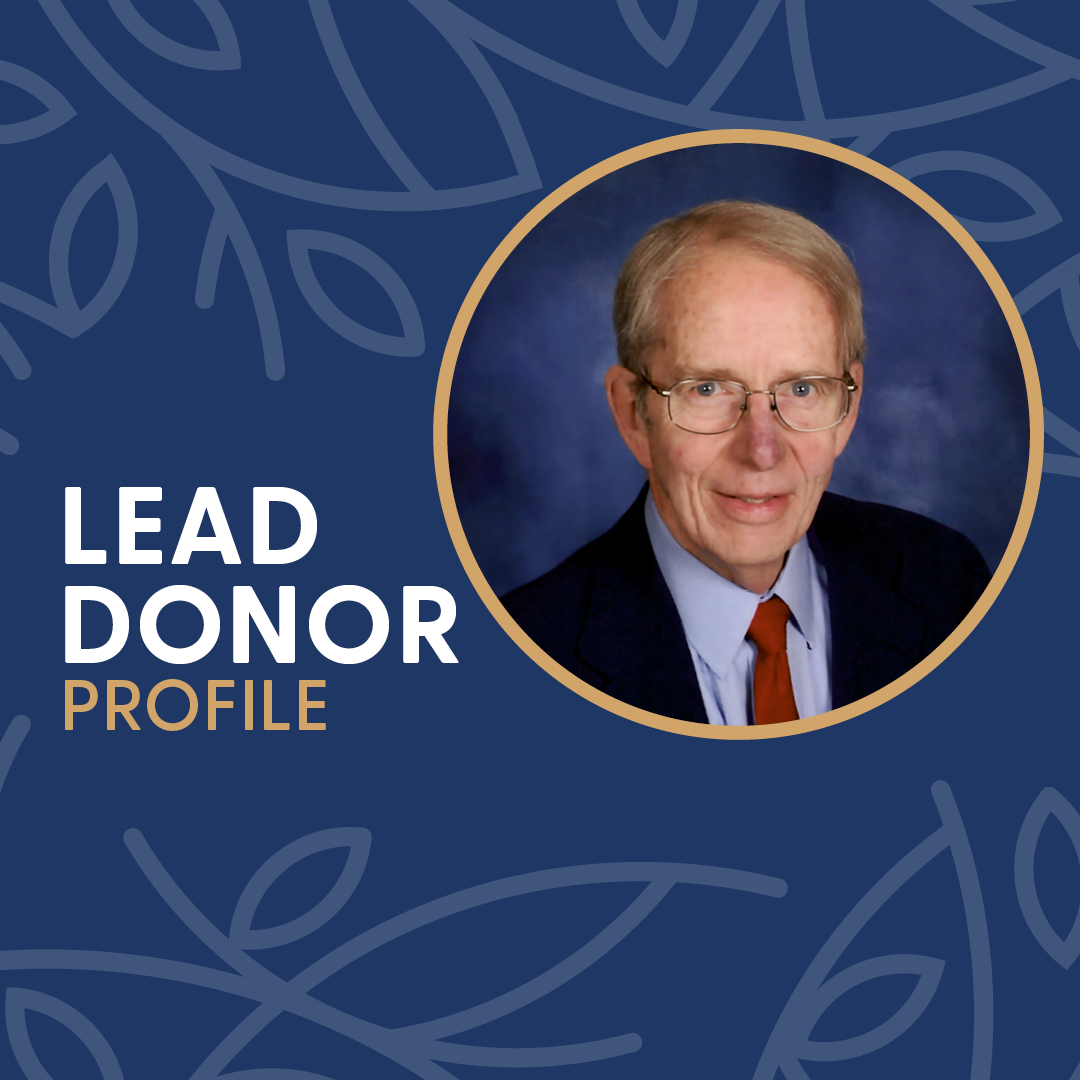
Rosalind Carr wants you to know that an ordinary family can make an impact. “You don’t have to have inherited wealth,” she said. “You can live a frugal life and have enough money to do something like this.”
Since 2022, Rosalind has made a Lead Donor gift in her late husband Jim’s memory to the Lincoln Littles campaign. She hopes her gifts will encourage others to support Lincoln Littles’ annual Giving Campaign, which provides tuition assistance to families in need of early childhood education and supports providers, teachers, businesses and the community.
Jim and Rosalind raised their family in a home near East Campus. Jim, a beloved chemistry professor at the University of Nebraska – Lincoln, loved to teach and to learn. “You asked him a question and he’d find the answer,” Rosalind said.
“He loved blowing stuff up for an audience,” laughed Rosalind. He would volunteer and donate his time generously. Among other places, he was a regular at fundraisers for the childcare at their church, First Plymouth Congregational Church, as well as in classrooms taught by teachers in his Kiwanis Club. “He probably had 40-years-worth of T-shirts from judging school science fairs in Lincoln and the state.”
As Rosalind reflected on Jim’s qualities, she extols his patience, his ability to find the answer to any question and to explain it in a way you’d understand.
Jim died in July, 2020 after living with Parkinson’s Disease. “He never lost his chemistry,” Rosalind said. “If you asked him a chemistry question, you could see his demeanor change and he could answer it.”
Despite being a single-income family for most of their 50 years of marriage (Rosalind worked for about 10 years to allow their girls to attend any college they wanted without incurring debt), Jim and Rosalind have long supported their favorite causes. They made donations that reflected on Jim’s passion for singing in the church choir and Rosalind’s knack for quilting. They supported theatre, civic engagement nonprofits, and those that help with basic needs.
But they also liked to inspire others. Because they believe that everyone needs a home to flourish, they originated the “Friends of Habitat for Humanity of Lincoln Fund” at Lincoln Community Foundation in 2017 with the intent that others would give to it as well.
After Jim’s death, Rosalind created her legacy plans with LCF to set up a fund to support organizations that provide quality early childhood education to local children from birth to age 5.
“Jim always liked to work with little kids,” she said. “He loved how they were so curious and asked such good questions.” She believes this sort of legacy is exactly what Jim would want.
As you develop your financial and estate plans, remembering your community can provide a lasting and meaningful legacy. For more information, contact Chip DeBuse at 402-474-2345 or chipd@lcf.org.
A Love Letter to Give to Lincoln Day
Published on May 28, 2024
By Jenny Chapin
Do you believe in love at first sight? That feeling that hits you like a ton of bricks and stops you in your tracks. I’ve been lucky to experience it a few times in my life. The first was at my ninth-grade dance recital. As we crossed the stage during the curtain call, I caught the brown eyes of a tall boy tap dancing behind me. We kept falap-ing but the world stopped spinning for me at that moment. I was hooked.
My most recent experience with this type of crush happened two years ago at Give to Lincoln Day.
As Vice President for Marketing and Communications, Give to Lincoln Day is arguably the biggest (and most fun) day of my year. Preparations for Lincoln’s One Big Day of Giving start months in advance and on May 1st – we’re off and running.
In a matter of weeks, Lincoln comes together to raise millions of dollars for local nonprofits. Our talented staff at LCF facilitates and processes nearly 25,000 individual donations. It’s really an incredible event to be behind the scenes of. Year after year, I am blown away by not only the generosity of our community but by the passion of our nonprofit partners.
My first two years on the job were unique because we were navigating Give to Lincoln Day during the pandemic. By 2022, the staff was excited to gather again and host our Nonprofit Festival in Tower Square. The Tower Square event features more than 70 nonprofits. Each agency has a booth and an activity to share their mission with the community members who stop by the festival.
That year was cold and rainy for May. In fact, we even debated canceling the event. But we’re Nebraskans. We’re hearty people and we persevere. At least that’s what our President, Alec, told me over the phone as he was helping people hold down their tents in the wind and rain and I was still warm and dry at the office.
I bundled up and headed to Tower Square. The nonprofits were out in force and the space was already a buzz albeit a little damp. I was bouncing between our radio remote broadcasts when it happened. The crowds parted, our eyes met, and I knew my life would never be the same.
“What’s his name?” – I asked the woman standing next to him.
“This is Patch. He’s never been on a leash before and he’s up for adoption.”

Patch. He was five pounds of absolute sweetness. I had never seen a dog that looked like him before. The eyes. The ears. The floppiness. I couldn’t handle it. Why didn’t anyone warn me that puppies would be here? Okay, they did – but I didn’t anticipate this.
Throughout the day, I made several trips to the booth’s puppy playpen to visit him. At one point, someone with the rescue organization said, “Patch’s mom is here.”
I had never been called “mom” before.

But what was I thinking? I couldn’t get a dog. I was working my busiest day of the year, and the show must go on. Right?!
Maybe just one more trip to Tower Square to see him and then I’ll definitely get back to work.
As the festival activities wrapped up and the puppies were carefully loaded back in their van, I said goodbye to Patch and went back to my desk. In-between posting on our social media channels and fielding interviews, I found myself on that agency’s adoption website. Then on my apartment’s website.
How much is a pet deposit anyway?
Then suddenly I had an appointment the next day to go see him. It was all happening, and I was defenseless to stop it. My coworkers cheered me on and also questioned my sanity.
“Are you really going to get that dog?”
“I think so.”
I once read if you’re torn between two choices when making a decision – pick the bigger life. That night, as we watched the total on www.GiveToLincoln.com climb towards a new record, I felt confident. I could handle this. Dogs like Patch don’t just walk into your life every day and when they do, you say “yes.”
I woke up the next day in a panic.
What was I thinking? I stayed up past midnight refreshing the website, my apartment is a mess, I can’t bring home a puppy today!
And yet…
He came home. And I did open myself up to the bigger life. A messier, more chaotic, more loving life.
All dog owners think that they have the very best dog, and the thing is – they are all correct. But Patch is really a special guy. He’s spunky and curious and playful. He can’t let someone walk by without a hello. I now know all my neighbors by name, thanks to Patch. He’s taught me how to love unconditionally and that kind of love makes you a better person.
Two years later, when I think about Give to Lincoln Day, I feel like a character in a Hallmark movie that finally gets the true meaning of Christmas. I was working it – but I wasn’t fully living it. And now I am.
This year, I plan to donate to the organization that brought Patch to me and many others that are close to my heart. When you give back, you get so much more in return. And how lucky are we to have a day that celebrates exactly that?
I hope you fall in love with something this Give to Lincoln Day and who knows…you may end up picking the bigger life.
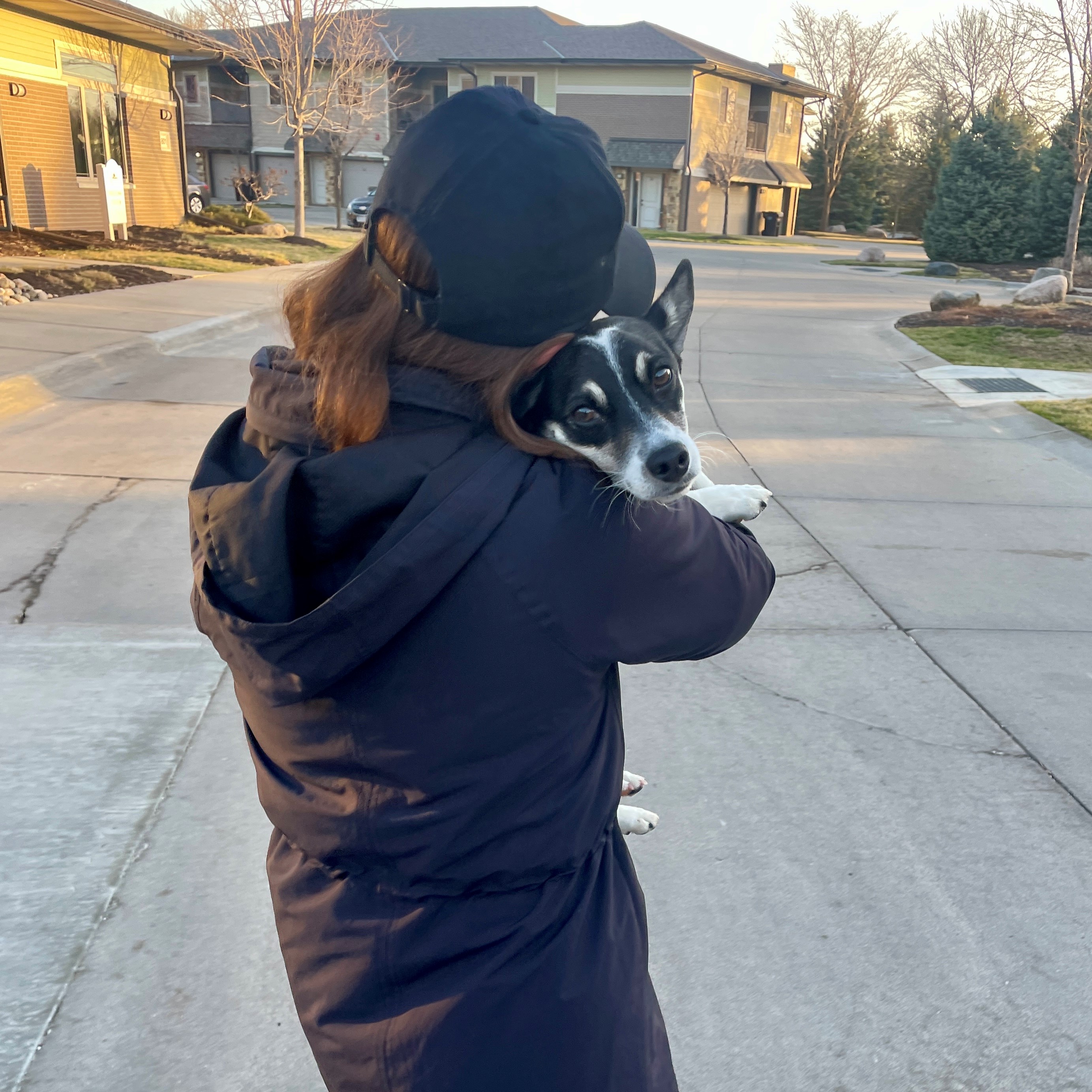
Participate in Give to Lincoln Day via IRA QCDs
Published on Apr 12, 2024
When you reach a certain age, the federal government requires you to withdraw or distribute a portion of your IRA investment and consequently pay taxes on the amount withdrawn. By using a Qualified Charitable Distribution (QCD) to support a qualified charity, those funds are transferred directly to that charitable organization, tax-free.
This year’s Give to Lincoln Day is Thursday, May 30. Join Lincoln’s One Big Day of Giving by using Qualified Charitable Distributions (QCDs) from your IRA to support your favorite registered nonprofits.
Here’s how…
- Contact your IRA administrator about your annual distributions. Decide your total donation for Give to Lincoln Day this year.
- Request your IRA administrator distribute an IRA QCD directly to Lincoln Community Foundation, mailing the distribution to the Foundation at 215 Centennial Mall South, Suite 100, Lincoln, NE 68508. Please request that your name be included on the check.
- Complete the LCF form for IRA QCDs gifts, listing the amount for each nonprofit you wish to support, and return it to the Lincoln Community Foundation
Questions? Contact Rhonda Page at 402-474-2345 or rhondap@lcf.org.
Psst: Don’t forget about charitable gift annuities
Published on Feb 9, 2024
Certain charitable clients may wish to structure a gift to charity so that the client retains a lifetime income stream. Keep in mind that a charitable gift annuity (“CGA”) could be an attractive option for these clients. Plus, if the client is 70 ½ or older, the client can take advantage of the one-time Legacy IRA opportunity to give $53,000 to a qualified charity such as an unrestricted or field-of-interest fund at Lincoln Community Foundation.
A CGA, like any other annuity, is a contract. Your client agrees to make an irrevocable transfer of cash or assets to a charitable organization. In return, the charitable organization (such as LCF) agrees to pay the client (or a designated beneficiary such as a spouse) a fixed payment for life. Your client is eligible for an immediate income tax deduction for the present value of the future amount passing to charity.
The team at Lincoln Community Foundation can help you stay up-to-date on the latest CGA rate changes (including the rates that took effect at the beginning of this year). We’ll work with you to evaluate whether and when a CGA is a good planning move for your client.
Inaugural Lincoln CAP® cohort charts the way for clients’ philanthropic aspirations
Published on May 8, 2024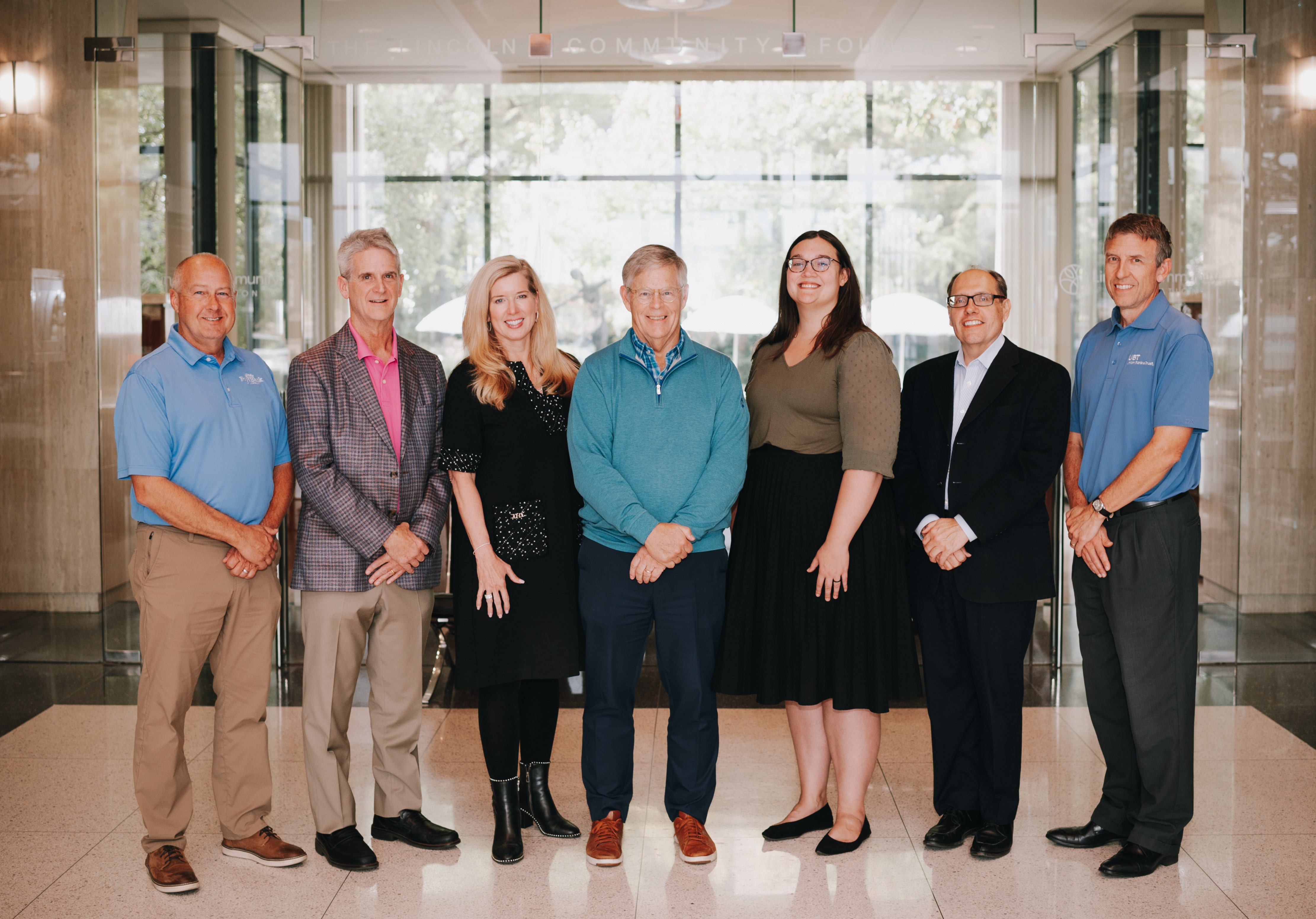
LCF is pleased to introduce eight newly minted Chartered Advisors in Philanthropy (CAP®) in our community, thanks to a new partnership between LCF and the American College of Financial Services. Pictured from left to right: John Mabry, Food Bank of Lincoln; John Gessert, Union Bank & Trust; Lisa Smith, D.A. Davidson & Co.; Chip DeBuse, Lincoln Community Foundation; Brittney Holley, Cline, Williams, Wright, Johnson & Oldfather, LLP; Keith Napolitano, University of Nebraska Foundation; and Michael Henkenius, Union Bank and Trust. Not pictured: Brett Ebert, Ball, Loudon, Ebert & Brostrom, LLC and Krystal Siebrandt, HBE, LLP.
The Chartered Advisor in Philanthropy (CAP®) designation is a graduate level program available to professional advisors such as estate planning attorneys, accountants, financial advisors, and development professionals. Aided with their new CAP® designation, these participants employ valuable skills and expertise in their work with individuals and families as they consider how best to incorporate philanthropy into their financial and estate plans.
During the seven-month CAP® program, participants learn how to work through family dynamics to arrive at a shared set of goals, learn the different charitable structures and tax implications, and gain valuable insights into nonprofit finance. LCF sponsored and organized a study group of eight individuals to pursue together the CAP® designation.
The group met bi-weekly for seven months and was facilitated by Jon Gessert of Union Bank and Trust and Brett Ebert of Ball, Loudon, Ebert, and Brostrom. Both Brett and Jon had previously received their CAP® designation and helped bring the material to life for the study group participants.
“It was exciting to serve as a guide and a navigator to my colleagues in the financial and legal professions,” said Brett. “Twice a month we had the chance to get together to swap stories of clients who are doing great things for Lincoln, and how we can continue to grow in our ability to better serve the client and out community.”
This was the inaugural CAP® study group, with a second cohort set to begin this spring.
“Arming our professional advisor community with the philanthropic expertise to help shape and support generosity is critical to our mission here at the Foundation,” said Chip DeBuse, LCF’s Vice President of Legacy Planning. “Through the CAP® program, we are building a network of trusted advisors locally that are trained to get to the ‘why’ of giving in conversations with their clients – ultimately creating a more vibrant and generous community.”
Sowing the seeds of success
Published on May 8, 2024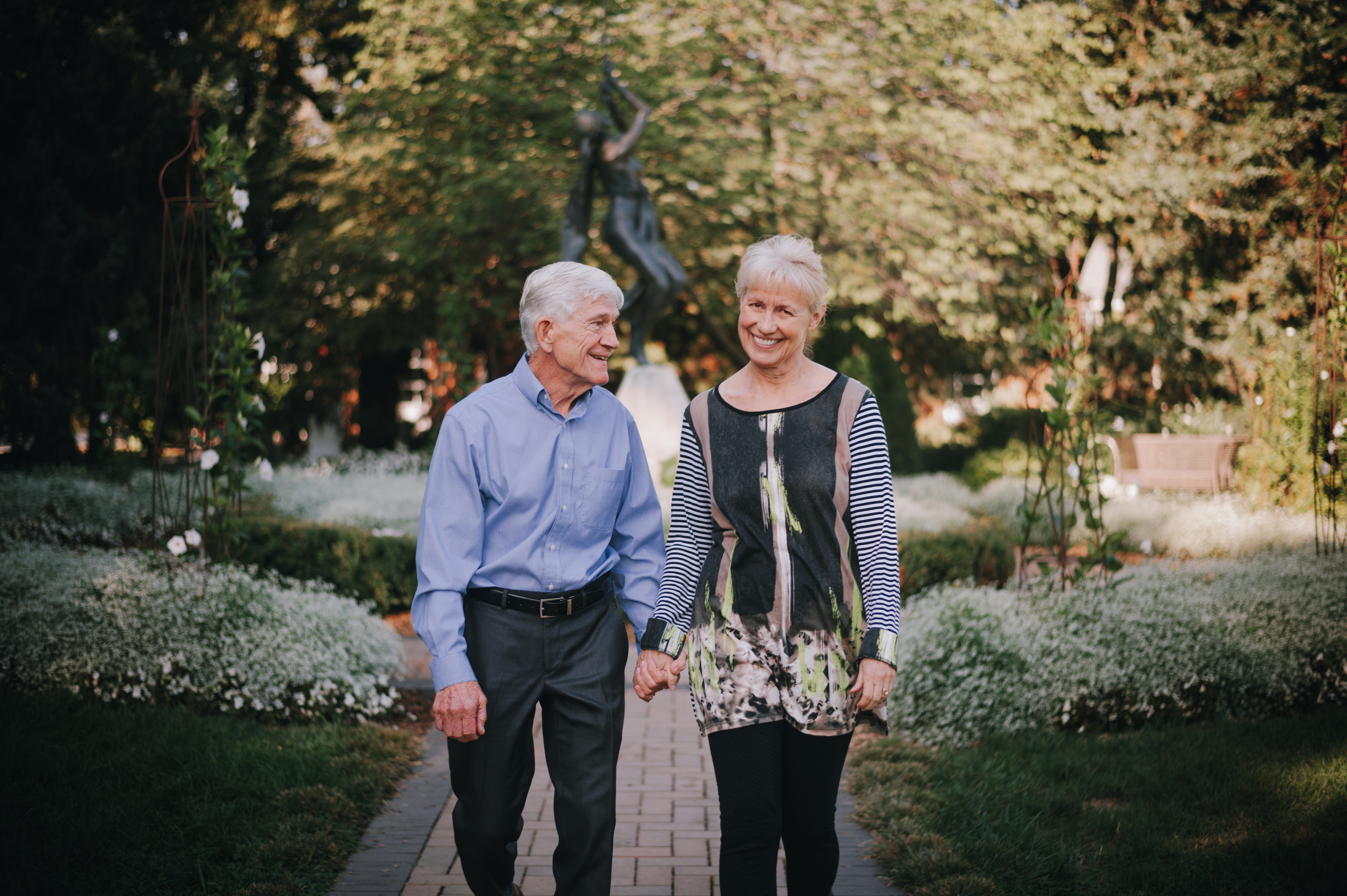
Each spring, as the trees start to blossom, students in our area prepare for the next step on their learning journey. Graduation parties are planned, and high school seniors and their families look to their upcoming opportunities for college. Over the years, generous donors to Lincoln Community Foundation have established 87 scholarship funds that benefit students in Lancaster County and across the state of Nebraska.
Many of us are familiar with scholarships from the student perspective, but there is also a great deal happening in tandem with the application process. Other individuals are also preparing for the scholarship season – the members of our community that serve on LCF’s scholarship selection committee.
These folks are the behind-the-scenes volunteers who are passionate about helping students attain higher education and dedicate hours of their time to ensure that deserving recipients are selected.
Bob and Sheri Downey know this process well.
“When you read the applications, the need is obvious,” said Bob. “And the work that these students are putting in to gaining higher education is tremendous.”
Sheri agreed.
“They have a high likelihood of succeeding,” she said. “It’s a good thing to be able to help them along the way.”
Bob and Sheri discussed what draws them to this volunteer opportunity year after year over coffee at the Mill Coffee Telegraph. For Sheri, it was her own college experience that inspired her to give of her time.
“I worked full-time to support my tuition and books,” said Sheri. “Scholarships made it possible for me to pursue my degree.”
Originally from Kansas City, Sheri came to Lincoln to attend the University. Bob, a long-time Lincolnite, also graduated from the University of Nebraska-Lincoln. They met by chance outside of Sports Courts, a Lincoln health and racquet ball club. Forty-four years later, they love calling Lincoln home.
“It’s still a big-small town,” said Bob.
Answering a blind ad in the newspaper for a job at the Capital Humane Society brought them back to Lincoln early on in their marriage. Looking for opportunities to be closer to family, Bob didn’t realize at the time that he’d be forging his path of 36 years helping Lincoln’s pets as its CEO.
“When I started, the organization was close to bankruptcy,” said Bob. “We had a staff of 11 and one facility. Now their assets have grown to more than $11 million, they have two locations, and they’re providing critical veterinary services.”
“During my time we were able to do so many positive things,” he continued. “But I think the biggest impact was changing how the community looks at animals who come from shelters.”
Sheri’s heart and career has been focused on working with veterans. After more than 29 years with the VA Medical Center, she reflected: “the good always outweighed the bad.”
Volunteering as LCF scholarship reviewers led Bob and Sheri to think about their own legacy plans and establishing a future gift for students. When it came to deciding where to create their own scholarship fund – the choice was obvious.
“It was extremely easy to work with the Foundation,” said Bob. “The trust was already there. I just picked up the phone.”
The Downeys worked with Vice President and General Counsel Tracy Edgerton to focus their support on the areas that meant the most to them. The Bob and Sheri Downey Endowed Scholarship Fund reflects their own passions and will benefit students pursuing veterinary medicine, food and nutrition, and health care.
“It is such a joy to work with folks like the Downeys to help them bring their vision to reality,” Tracy said. “Bob and Sheri knew they wanted to help young people in our community make the most of their college experience, and they honed in on helping students in critical areas that mirror their professional journeys.”
As Bob and Sheri gear up for another season of scholarship selections, they hope that others are encouraged to think about legacy giving.
“What a great way to ensure that what’s left behind will help other people,” said Bob. “It’s something everyone can do.”
Generosity blossoms through uplifting acts – like leaving a meaningful gift for the community of the future. To learn more, contact Tracy Edgerton at 402-474-2345 or tracye@lcf.org.
Ways to Help - Nebraska/Iowa Tornado Relief and Recovery
Published on Apr 30, 2024Many of us experienced concern and panic for our family, friends and neighbors as tornados tore through the Great Plains in recent days. Organizations are galvanizing quickly to provide resources for immediate basic needs as well as longer-term recovery efforts.
If you would like to recommend a grant from your LCF donor advised fund to aid in recovery, please consider a grant for any of the following regional nonprofits. All of these organizations have strong track records in supporting relief and recovery efforts. When we receive your grant recommendation, we will ensure it is reviewed and distributed quickly so that these resources may be deployed to those recovering from these devasting storms.
To recommend a grant to any of the organizations below, or other qualified nonprofits helping with this local emergency, go to https://lcf.fcsuite.com/erp/fundmanager and login to our donor portal.
- Omaha Community Foundation’s Nebraska Tornado Recovery Fund - https://omahafoundation.org/news/donate-to-the-nebraska-tornado-recovery-fund/.
- Community Foundation for Western Iowa’s Southwest Iowa Emergency Relief Fund - https://pccf.fcsuite.com/erp/donate/create/fund?funit_id=1813
- United Way of the Midlands’ Nebraska and Iowa Tornado Relief Fund - https://unitedwaymidlands.org/
- American Red Cross-Omaha-Council Bluffs & SW Iowa Chapter - https://www.redcross.org/local/nebraska/about-us/locations/omaha-council-bluffs-metro-region-office.html
- Salvation Army of Omaha’s Fund to help tornado victims in Eastern Nebraska and Western Iowa - https://centralusa.salvationarmy.org/omaha/
If you have any questions, please contact Rhonda Page, rhondap@lcf.org, or 402-474-2345.
2023 JoAnn Martin Civic Leadership Award
Published on May 2, 2023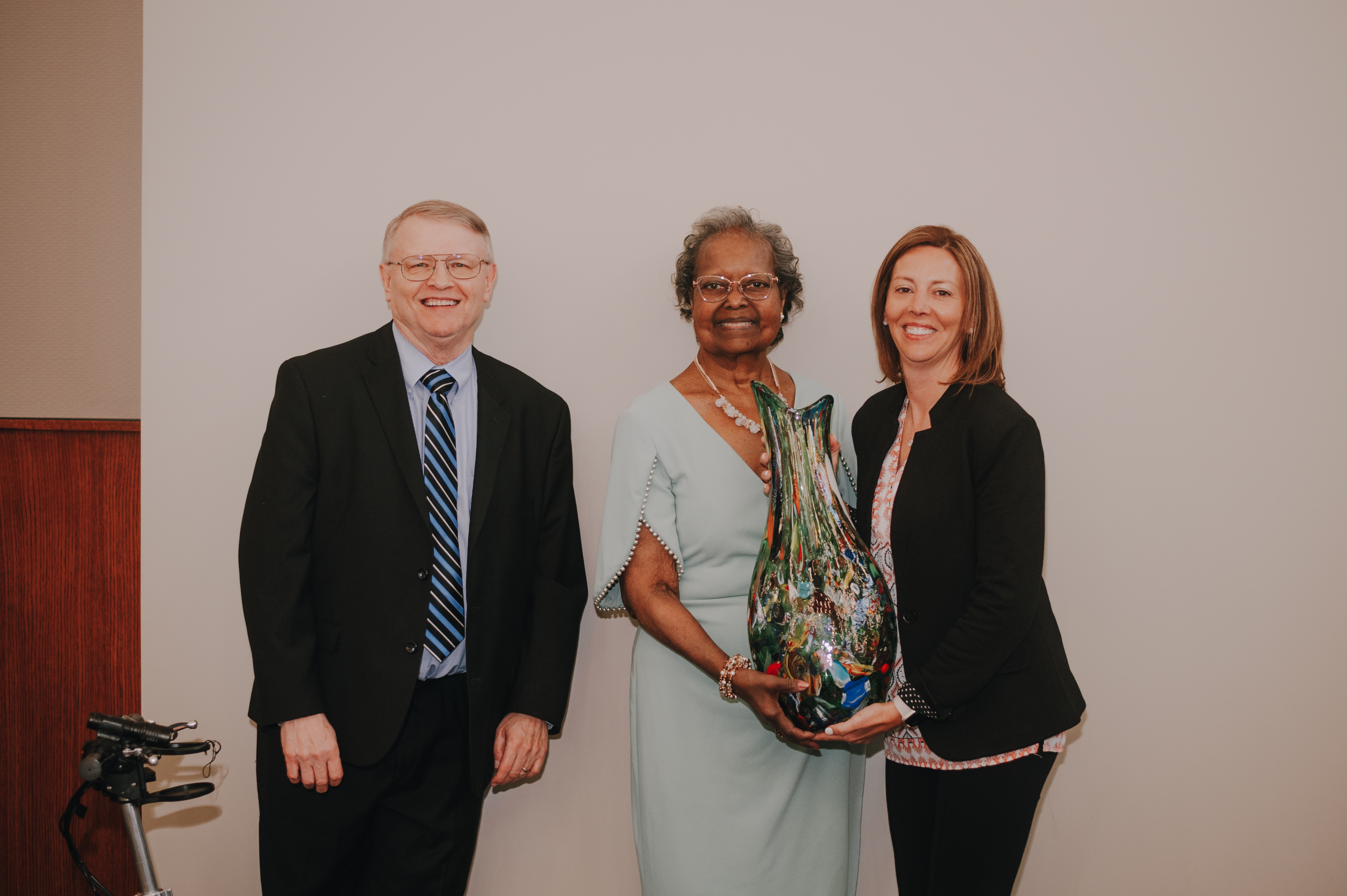
The JoAnn Martin Civic Leadership Award was presented to Dr. Mae Colleen Jones on May 2, 2023. The award was established to recognize an individual who has demonstrated a strong commitment to civic leadership – an individual that possesses servant leadership qualities and expresses their servant leadership through volunteer service to our community, to include leadership service with nonprofit and civic organizations in varying capacities. The award first presented to JoAnn Martin shortly before her passing in the fall of 2021 by a group of community leaders including leaders from Ameritas and NRC, who also established an endowment at the Foundation to sustain JoAnn’s leadership legacy.
Now retired, Dr. Mae Colleen Jones has spent her career in academia, the majority of which was with the University of Nebraska-Lincoln. The reason for her recognition was not just because of her leadership throughout her professional career, but also because of her extensive history of community service. The award’s nominating committee identified nearly 20 unique instances of Dr. Jones’ formal community leadership service, including volunteer leadership roles with the United Way, Leadership Lincoln, Friendship Home, the Sheldon, the Lied Center, and the Lincoln Community Foundation.
As Dr. Jones became the second recipient of the JoAnn Martin Civic Leadership Award, she reflected on the journey that brought her and Melvin to Lincoln. They had both decided early on to support each other’s professional path and “bloom where they were planted.”
“When Melvin died, I was reminded of a Maya Angelou quote, ‘You may not control all the events that happen to you, but you can decide not to be reduced by them’,” she said. “It was not difficult for me to step up and become more visibly active in Lincoln – because the perspectives of Black people, women and ‘transplanted’ new Nebraskans are essential to the health, growth, and future of this community.”
Give to Lincoln Day Breaks Record Total Raised for Local Nonprofits
Published on Jun 4, 2024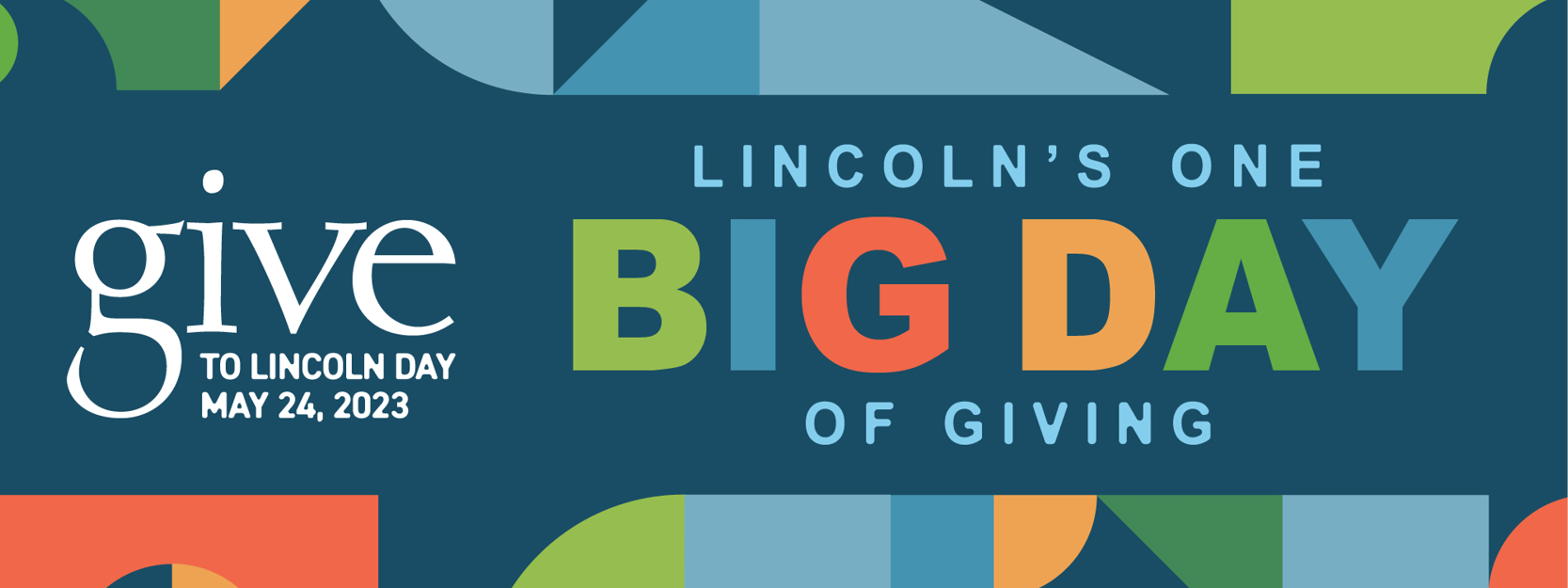
The 13th annual Give to Lincoln Day on May 30th raised more than $8.5 million for 463 local nonprofits – the highest amount raised in the event’s history. The funds are designated to help support charitable organizations that serve Lincoln and Lancaster County. All participating nonprofits will receive a proportional share of a record $650,000 match fund based upon the organization’s percentage of the total dollars raised, provided by LCF and sponsors including Presenting Sponsor, West Gate Bank.
“Give to Lincoln Day is about inspiring our community to give, and Lincoln gave in a big way,” said Alec Gorynski, LCF President/CEO. “This incredible display of generosity for our local nonprofits means more meals, more access, more help, and more hope. While setting a new record is to be applauded, it’s the many ways in which our community shows up and lends their support that matter.”
More than 25,000 donations were received for the 13th annual Give to Lincoln Day. The event has raised more than $65.5 million for local nonprofits in its 12-year history.
For more information and to see gifts received for each nonprofit, visit www.GiveToLincoln.com.
Match Sponsors include: West Gate Bank (Presenting Sponsor), ABC Electric, ALLO Fiber, Assurity Life Foundation, Rich Bailey, Jan & John Blumer, D.A. Davidson & Co., Davis Design, Frontier Bank, Jeff & Judy Greenwald, HBE LLP, The Hsin & Chao Families, Kile & Cuz Johnson, Kawasaki Motors Manufacturing Corp., Kubly Family Foundation, Lutz, Mail Management Services, Inc., JoAnn & Derrel Martin Charitable Fund, Jim McKee and Linda Hillegass, The Family of J. Gates & Daisy Minnick, Olsson, Pepsi Cola of Lincoln, Pinnacle Bank, Runza National, William J. Mueller & Kim M. Robak, Sampson Construction Company, Inc., Joe W. & Ruth K. Seacrest Foundation Fund, Tom & Lisa Smith, Dr. Gene & Kristen Stohs, Ronald & Camilla Svoboda, Talent Plus Inc, Mark H. Tallman, Bill & Mae Whitmer Family Fund and WRK Family Foundation.
The Lincoln Community Foundation, established in 1955, strives to continually enrich the Lincoln community by promoting and achieving perpetual philanthropic support. The Foundation has distributed more than $238 million in grants to nonprofit organizations that have improved the lives of thousands of residents.
A note from Alec
Published on Jun 14, 2024![]()
When I first joined Lincoln Community Foundation as President/CEO in December 2021, my favorite part of the onboarding experience was meeting one on one with our donors and community partners. Those early days were filled with coffees and conversations. As I sat with each person and listened to what they love about Lincoln and why they chose to partner with the Foundation – a theme emerged.
They said Lincoln was special. People here know how to come together to accomplish great things. Lincoln is “a big, small town” and feels like that – neighbors supporting neighbors to build community and achieve a shared vision.
At the time, I was struck by everyone’s sincerity across the board. And during the past two and a half years, I have experienced this spirit of collaboration first-hand – not only in my role with the Foundation but as a resident. This city has embraced my family, and for that we are forever grateful.
All of this contributes to why it is with true sadness that I share my resignation as President & CEO of Lincoln Community Foundation, effective August 2, 2024.
I was presented with an opportunity to step into a role at the Greater Omaha Chamber of Commerce and Economic Development Partnership as Senior Vice President for Economic Development. I did not plan for my time at the Foundation to conclude so soon, nor was I pursuing this opportunity, but after much counsel and consideration, I have decided to accept the position.
I am immensely proud of what has been accomplished during my time at the Foundation. These achievements are thanks to the hard work of our wonderful team of professionals. Folks who show up every day to inspire our community to give, act and lead. It’s been an honor to work alongside them.
As an organization, we’ve introduced a new strategic plan, mission, and vision as well as updated our brand identity. With our community partners, we’ve made incredible strides for early childhood and affordable housing. And most recently, as a community, we came together to raise a record $8.5 million for local nonprofits during Give to Lincoln Day.
I will leave here knowing that Lincoln Community Foundation is in an excellent position and will continue to forge partnerships that extend our network for good. The leadership and vision of the board of directors will guide the succession and transition of my role, and there will be more information to follow in the coming weeks.
Thank you for your unwavering support of this community and its Foundation. It’s been a privilege to be a part of it.
Connection Cadre provides moral support, guidance to local childcare educators
Published on May 8, 2024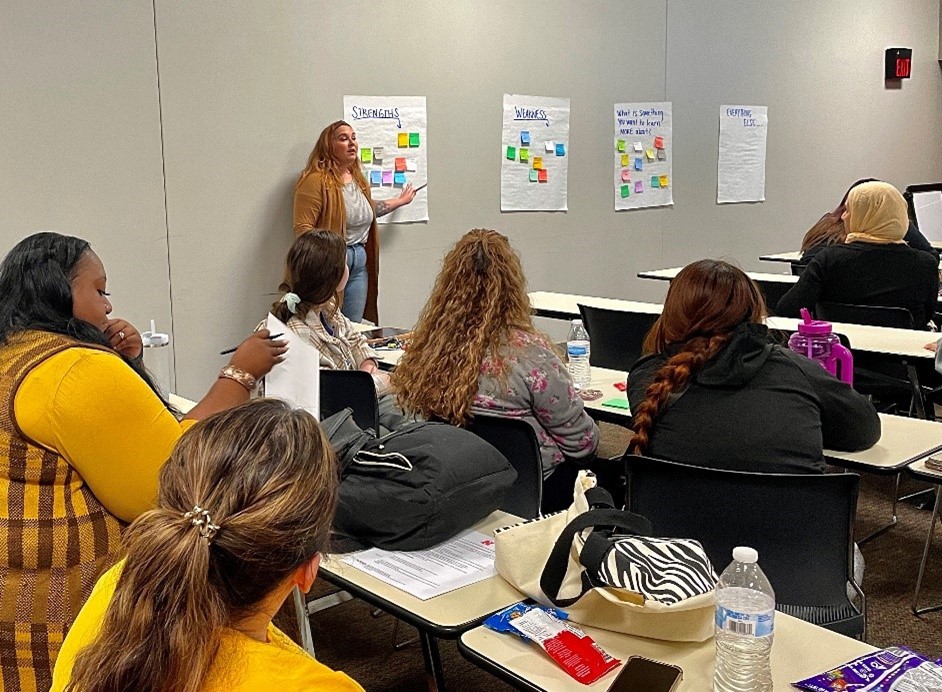
Vanessa Benes has worked as an early childcare educator for less than a year, and she’s still new to her job with Kids First Childcare, Inc.
But she has found understanding, moral support and friendship – along with solid strategies and advice – at the Connection Cadre, a monthly professional learning and coaching opportunity initiated by Lincoln Littles.
“Everyone is so kind at the Cadre, very open, accommodating and encouraging,” Vanessa said. “They can give you support and sympathy when you’ve had a hard day, while also understanding that you really love your job.”
And she does love her job.
“I get all those hugs and snuggles from the cutest toddlers, 15 to 24 months old. I love little kids.”
The Connection Cadre launched several months ago with invitations to the 30 graduates of the Childcare Teacher Foundations Classes – training hosted by Lincoln Littles and focused on providing training and guidance for those interested in working in early childcare.
The Cadre provides a safe space for graduates of the classes to stay connected, process barriers, celebrate successes in their work, and exchange strategies. The Cadre has a well-being focus to build community and connection in the early childhood workforce.
Aaliyah Solorio, who works at Trinity Lutheran Childcare, is drawn to the learning and bonding at the Cadre.
“You get new and different perspectives from all the guest speakers about things you might not even think about, like applying diversity training in our classrooms, or getting help when you don’t know what to do in a specific situation,” she said.
According to Aaliyah, perhaps the best part of the Cadre is getting to know and connecting with other early childcare educators.
“We have breakthrough moments,” she said. “We talk about the love of our job. Younger kids are such a breath of fresh air. They have such innocence and happiness. It’s rewarding, helping them learn.”
Elaine Simpson, recently hired as director of the new early childcare program at Catholic Social Services, has respect for the training class as well as the Cadre – both facilitated by Lincoln Littles.
“The connections we make with other people in childcare are invaluable. We learn from one another,” she said.
Elaine said it’s been an interesting experience switching from a career with school-age children to a career with younger children with support from Lincoln Littles.
“This has been a great opportunity to get the necessary training, talk about diverse strategies, appreciate working with young children,” she said. “I love watching these little kids grow, giving them the confidence to take risks and learn new things.”
The new Cadre fosters a community of learning and problem-solving, not only supporting individual teachers but also contributing to a culture of continuous improvement within the early childhood community.
The Cadre reinforces the importance of professional development programs that provide a platform for teachers to share their experiences, seek advice and collectively work towards solutions. Educators expand their knowledge and deepen professional connections.
Vanessa explained that she is new to early childcare – and new to working at Kids First Childcare, Inc. – and decided to explore the opportunity after she struggled to find childcare for her own two children when she was looking for work.
“The situation ultimately led me to working in early childcare, and it has been a perfect solution,” Vanessa shared.
The training and Cadre experience have offered her help in a new career by providing everything from CPR certification to handling difficult work situations to celebrating career successes.
“The training and Cadre are really great things for Lincoln,” Vanessa said. “I hope they can offer more classes. This kind of training helps to ensure we provide high-quality childcare in our community. Parents need to be able to trust that their children are well taken care of.”
Aaliyah agreed. “Everyone in the Cadre is connected. We support one another. We set and share our intentions of how we want to get better.”
Elaine echoed a common sentiment from the cohort.
“I’m so grateful for the prospect of getting immersed in the culture of early childcare, for the ongoing support, for the chance to continue to grow and learn, for connecting with people who are doing what you’re doing. People who understand,” she said.
Fiscally sponsored by Lincoln Community Foundation, Lincoln Littles is an organization of passionate advocates focused on ensuring access to quality early childhood care and education in Lincoln. For more information, contact Anne Brandt at anne.brandt@lincolnlittles.org or visit www.LincolnLittles.org.
Lincoln Community Foundation 2023 Open Door Grants
Published on Apr 1, 2024The Lincoln Community Foundation distributes community grants to local nonprofit organizations through Open Door Grants. These grants are made possible by contributions from the Lincoln Forever Fund and from LCF donor endowment funds. The following organizations received grant dollars in the specified quarter during 2023.
Lincoln Community Foundation Awards $136,817 in Q4 2023 to Support 24 Local Nonprofits
Barnabas Community, Inc.
Operating support
Belmont Community Center
AC system for gymnasium
Bright Lights
Student scholarships for summer enrichment camps
Camp Floyd Rogers
Scholarships for Lancaster County children with diabetes to attend camp
Citizens for Improved Transit (Fiscal Sponsorship Fund at LCF)
Purchase StarTran bus passes for low-income individuals
City of Lincoln - Police Department
Operating support to fund staff in the Victim Assistance Unit
Civic Nebraska
Afterschool tutoring programs at Lincoln High School and Lincoln Northeast High School
Friends of Lied - Lied Center for the Performing Arts
Kinetic Lights program educational/outreach opportunities
Friendship Home of Lincoln
Operating support
Good Life Community Development - Ybor Second Chance Kitchen
On-site culinary education at Community Correction Center
HONESTy Project
Funding for licensing and insurance of semi-truck and trailer to be used as educational tool
Legal Aid of Nebraska
Operating support
Lincoln Housing Authority
30th annual Lincoln Northeast High School student build house
Lincoln Literacy
Operating support
Military & Veteran Success Center - UNL
Additional tutoring services for military connected students
MilkWorks
Operating support
Mourning Hope Grief Center
Grief support programming and grief first aid kits at LPS
Nebraska Appleseed
Fellowship for Spanish language translator for Community Assistance Line
Nebraska Soccer Club
Afterschool soccer programming with focus on immigrant and refugee populations
Northeast Family Center
Operating support
Republic of South Sudan (ROSS) Leaders
Funding for Career Exploration Initiative/college tours
Special Olympics Nebraska
Support for Unified Champion Schools programming
Sunrise Communications dba KZUM
Community Voices internship program
We Can Do This, INC
Support for food program - weekend meals, food pantry, and grocery store vouchers
---------------------------------------------------------------------------------
Lincoln Community Foundation Awards $135,700 in Q3 2023 to Support 22 Local Nonprofits
Asian Communty and Cultural Center
Sponsor for Welcoming Week 2023 through Lincoln/Lancaster New American Task Force
BraveBe Child Advocacy Center
Operating support
Bryan Health Foundation
Bryan Health Pathways Program
Cause Collective
Jumpstart Program
Dimensions Education Programs
Outdoor classroom
DreamCatchers Ride, Inc.
Operating support
Food Bank of Lincoln
Replacement of food donation barrels
Girls on the Run of Nebraska
After school programming
Heartland Cancer Foundation
Operating support
Lincoln Animal Ambassadors
Pet Food Bank
Lincoln Arts Council
Sponsorship for Mayor's Arts Awards
Lincoln Children's Zoo
Sponsorship of Zoo Lights
Lincoln Indian Center
Operating support, to include mower and freezer purchase
Linked2Literacy
Funding to implement Dolly Parton's Imagination Library program
LUX Center for the Arts
2023 Emerge LNK Mural and Street Arts Festival
Project Connect (Lincoln Homeless Coalition event)
Animal services during Project Connect
RISE ACADEMY
Operating support
ROAM Share (dba BikeLNK)
Operating support
Solidago Conservancy
Operating support
Tabitha
Meals on Wheels program
The Foundry Community
UNL Honors students to serve as nonprofit interns with Intern Foundry
United Way of Lincoln and Lancaster County
Funding for community-wide volunteer platform, Get Connected
---------------------------------------------------------------------------------
Lincoln Community Foundation Awards $97,300 in Q2 2023 to Support 17 Local Nonprofits
Atlas Lincoln
Operating support
Cultural Centers of Lincoln
Capacity and infrastructure building activities
Foundation for Lincoln Public Schools
Special education assistive technology program
Jazz in June
2023 Jazz in June
Mercy Housing Midwest
Funding for Resident Services Program
Mosaic in Southeast Nebraska
Obie projector
Proyecto Cultural
Funding for repair and replacement of damaged sewer line and other facility repairs
Big Brothers Big Sisters Lincoln
Operating Support
ECHO Collective
Operating Support
Foundation for Lincoln City Libraries
Meeting room video-conferencing equipment
Lutheran Family Services of Nebraska
Support for community-based children and family services in Lancaster County
Nebraska Safety Council
Scholarships for CPR/AED certification for low-income residents at local Recreation Centers
Autism Center of Nebraska
Funding for the Art Garden
Branched Oak Observatory
Operating support
Educare Lincoln
Operating support
Great Plains Art Museum
Funding for “Threads & Trails: Contemplations of Our Herstories”
Nebraska Civic Engagement Table
Operating support
---------------------------------------------------------------------------------
Lincoln Community Foundation Awards $103,369 in Q1 2023 to Support 18 Local Nonprofits
City of Lincoln - Urban Development
Lead mitigation efforts
Office of Diversity and Inclusion - UNL
Launch of Institute for Inclusive Innovation
History Nebraska Foundation
Programming for two traveling exhibits from Smithsonian
Launch Leadership
Operating support
TADA Productions, Inc
Support for 15th anniversary season programming
Capital Humane Society
Landscaping and beautification efforts at Pieloch Pet Center and Admission & Assessment Center
Community Action Partnership of Lancaster and Saunders Counties
Renovations to outdoor facilities at the Head Start location at 1843 K Street
Girl Scouts Spirit of Nebraska
Lincoln Outreach Summer Series Day Camp program
Lincoln Littles
Purchase of weather radios for childcare programs
Meadowlark Music Festival
2023 season support
Rabble Mill
Operating support
Voices of Hope
Operating support
Center for Legal Immigration Assistance
Operating support
Clyde Malone Community Center
Operating support
Family Service Lincoln
Infant supplies for WIC clients attending Spring Baby Shower
Girls Incorporated of Lincoln
Support for Eureka!, a summer STEM college and career preparatory program for 8th-12th grade girls
Lincoln Council Saint Vincent de Paul
Operating support
YWCA
Operating support
LCF Receives 2024 HUD Secretary’s Award for Public-Philanthropic Partnerships
Published on Jul 15, 2024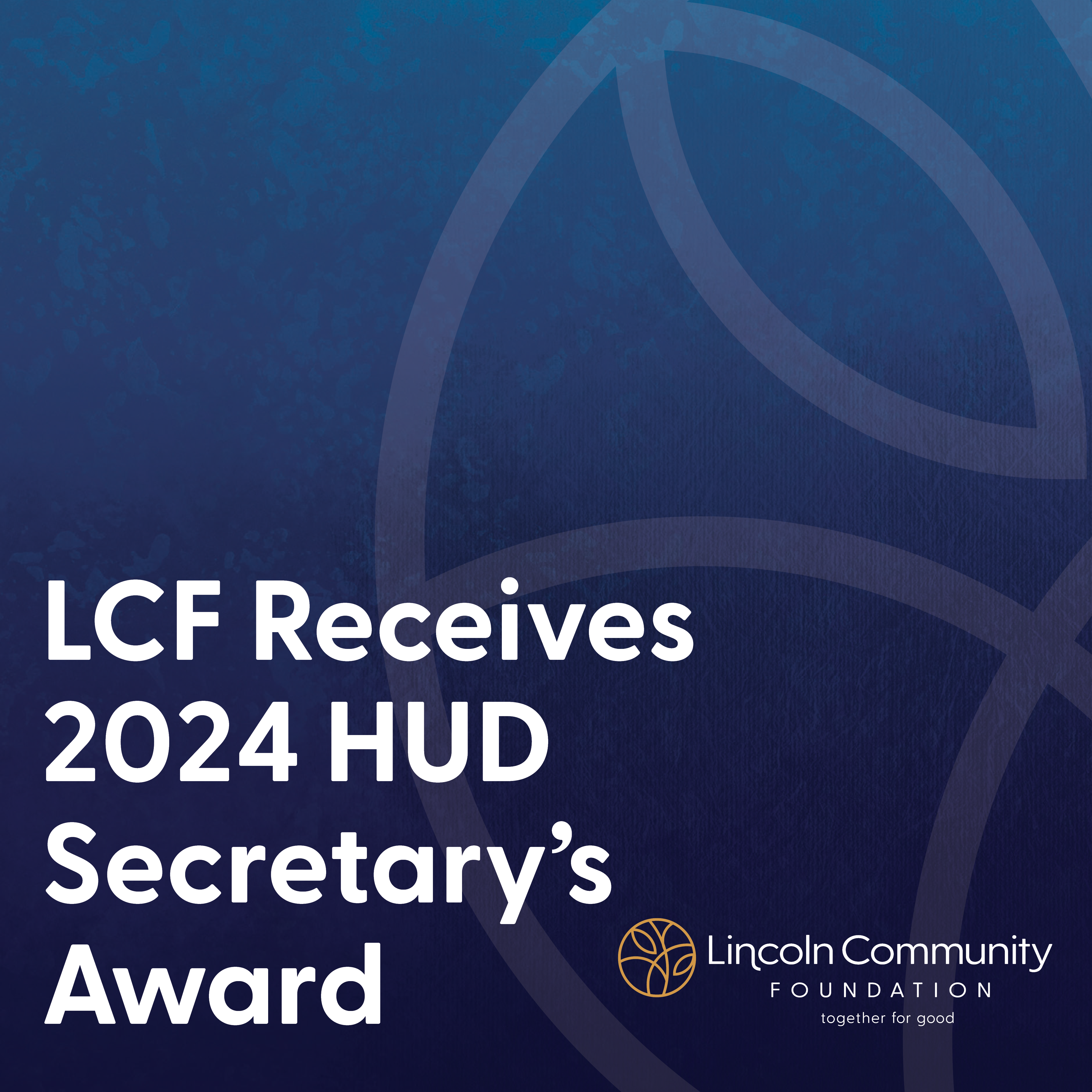
Lincoln Community Foundation (LCF) recently received the 2024 HUD Secretary Award for Public-Philanthropic Partnerships. The award is a national partnership between the Department of Housing and Urban Development (HUD) and the Council on Foundations, now in its eleventh year, and calls attention to philanthropy’s work with government partners.
The Foundation received the award for its partnership with the City of Lincoln Mayor’s Office to increase affordable housing in Lincoln.
"This award is a testament to the naturally collaborative approach we take to our work here in Lincoln," said President/CEO, Alec Gorynski. “We are grateful to be recognized for our strong partnership with Mayor Leirion Gaylor Baird and her team as we work together to address the challenges surrounding affordable housing.”
The Lincoln Community Foundation convened more than 20 private and public stakeholders from the community to create a task force that provided a recommendation to the mayor that addressed the community’s affordable housing shortage. As a result of this collaboration, the Lincoln Community Foundation and the City of Lincoln Mayor’s Office co-created a new affordable housing loan fund within an existing, but defunct, Community Development Financial Institution (CDFI) called Community Development Resources (CDR).
In just two years, Community Development Resources (CDR) has financed more than 300 affordable housing units for low-and moderate-income residents of Lincoln. The plan has stated a goal of 9,000 affordable housing units over a ten-year period.
The award ceremony took place on July 11 in Washington D.C. Board Member and retired Urban Development Director for the City, Dan Marvin, accepted the award on behalf of the Foundation.
“This year’s awardees collectively demonstrate that we can achieve greater impact and real change when we work together,” said Council on Foundations’ President and CEO Kathleen Enright. “We’re proud to recognize these innovative initiatives that are transforming communities across the country through public-philanthropic partnerships.”
Other winners this year are Rochester Area Community Foundation; Seattle Foundation; The Dayton Foundation; John T. Gorman Foundation and Yampa Valley Community Foundation.
Lincoln Community Foundation, established in 1955, provides leadership and tools that connect donor generosity to local needs and passions. The Foundation has distributed more than $237 million in grants to nonprofit organizations that have improved the lives of thousands of residents. To learn more, visit www.lcf.org.
Q3 2024 Professional Advisors Newsletter
Published on Jul 29, 2024Click here to view the Q3 2024 LCF Professional Advisors Newsletter.
Lincoln Community Foundation Names New CEO
Published on Jul 26, 2024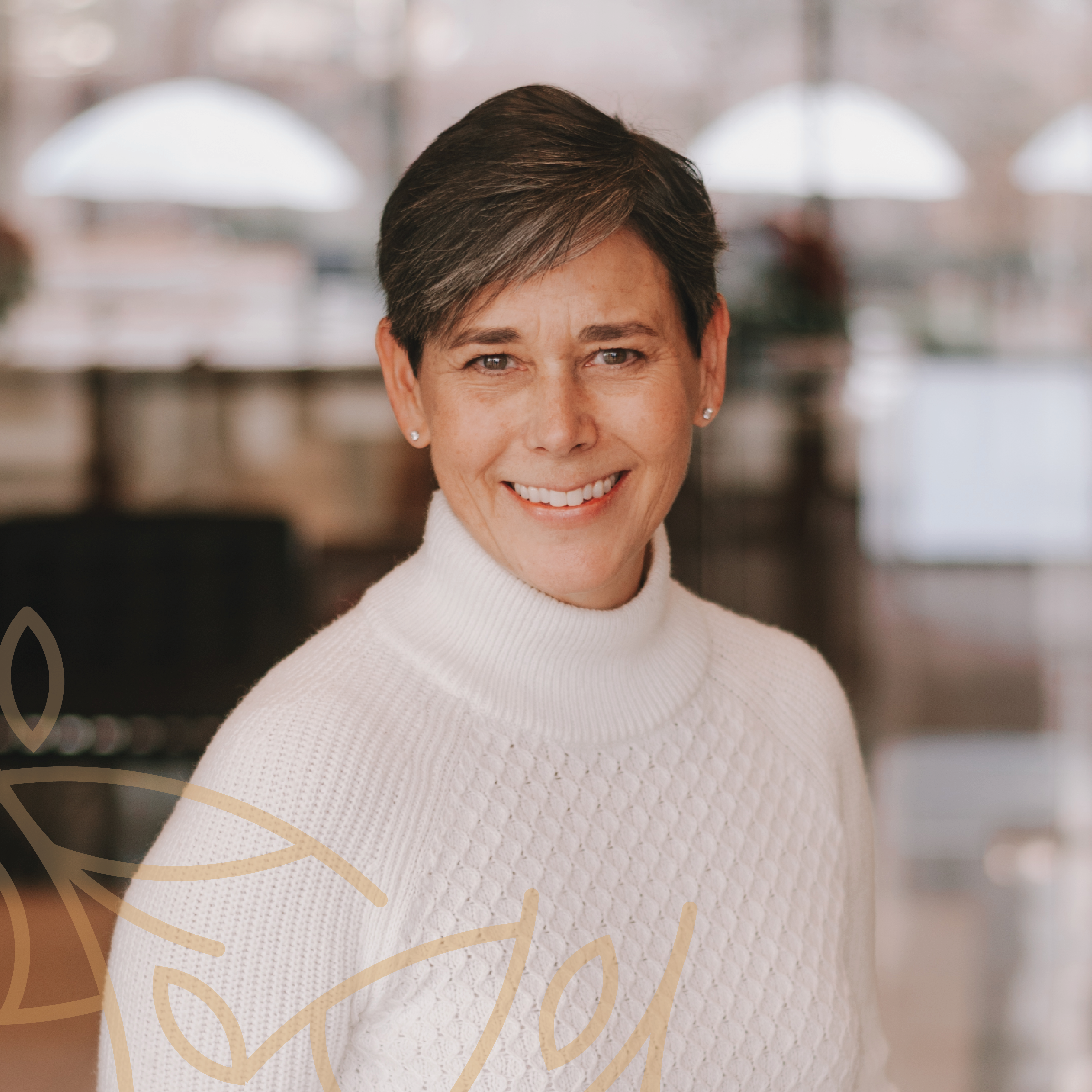
The Lincoln Community Foundation’s Board of Directors today announced the selection of Tracy Edgerton as its new President & Chief Executive Officer. The Board voted unanimously to approve the search committee’s recommendation in naming Edgerton to the position. She will succeed Alec Gorynski, who has served as president for the past two years.
Throughout her career, Edgerton has led efforts to build community by investing in relationships. She has more than 25 years of experience in planned gift fundraising, nonprofit management, law, and estate and tax planning. Before her appointment to lead the Foundation, Edgerton served as its Vice President of Philanthropy Services and General Counsel.
“Tracy has played an integral role in the Foundation’s growth over the past eight years,” said Foundation Board Chair Mark Hesser. “With her extensive background in philanthropy, strong community relationships and passion for facilitating positive change, she is uniquely positioned to lead the organization.”
In her role as Vice President of Philanthropy Services, Edgerton served on the Foundation’s leadership team and managed its development and fundraising programs. Edgerton worked directly with donors and their professional advisors to develop comprehensive gift planning strategies based on their individual goals and led conversations with local leaders, city government and other organizations to develop strategies for collaboration and problem solving on community needs and opportunities.
Edgerton also employed her legal expertise to create, revise and review Foundation policies and procedures and led organizational efforts to ensure use of best practices through certification via the National Standards for U.S. Community Foundations. Prior to her work at the Foundation, she managed the gift planning program at the University of Nebraska Foundation for more than 10 years.
Complementing her professional experience, Edgerton has served on various civic and volunteer associations including the Lincoln-Lancaster County Planning Commission, Charitable Gift Planners of Nebraska, Nebraska State Bar Association and the Lincoln Estate Planning Council. She volunteers as a Lincoln TeamMates mentor and has served on the Abendmusik at First Plymouth board of directors.
“Eight years ago, I was eager to join the incredible team of professionals at the Foundation who come to work every day to serve the organization and our community,” said Edgerton. “I am now excited to serve the Foundation in a different way as we work together with focus and innovation to build on the momentum of the past and create a better tomorrow.”
Edgerton is a graduate of UNL’s College of Journalism and Mass Communications and the University of Iowa College of Law. She will assume the role of President/CEO in August 2024.
About Lincoln Community Foundation
Through partnerships and collaboration, Lincoln Community Foundation facilitates positive change for the common good. Since 1955, the Foundation has been privileged to be part of many wonderful legacies by connecting donor generosity to local needs. With gifts of all sizes from thousands of donors over the years, the assets of the Foundation have grown to more than $235 million. The Foundation has distributed more than $237 million in grants to nonprofit organizations that improve the lives of Lincoln’s residents. Lincoln Community Foundation is accredited by the National Standards for U.S. Community Foundations®. Learn more at www.LCF.org.
Finding your philanthropic personality
Published on Jul 19, 2024
By Tracy Edgerton
Here in Lincoln, charitable giving traditions are a big part of our community, although the way these values are translated into action may vary widely from person to person. And that’s a good thing! When we align our charitable giving activities with our own personality and the ways we like to do good, giving becomes more meaningful and as a result, we may become even more involved with local nonprofits that do amazing work.
Indeed, the causes you choose to support may be based on personal experiences or even how you view your character. You may also find that philanthropy fosters personal growth and self-discovery. Some people find that getting involved in the community creates opportunities for networking and building relationships based on shared values and goals.
That’s why it’s important to acknowledge that not everyone likes to “do good” in the same way. To figure out what mix of charitable activities might best suit your personality, consider reflecting on whether you tend toward an ”investor,” “connector” or “activator” profile.
Here’s what it might look like to be an “investor” type of philanthropist:
- –You like to get involved in community activities where you can act independently, rather than scheduling dedicated time.
- –You may have more money than time.
- –You’re happy to write a check or purchase a product that supports a cause.
If you tend toward the “connector” type, this may describe your preferences:
- –You like community activities where you can collaborate with friends and family.
- –You enjoy the opportunity to meet people who care about a variety of causes, not necessarily a specific charity.
- –You like attending charities’ fundraising events, and you might even regularly promote your favorite causes on social media.
If you’re an “activator” type, here’s what that could look like:
- –Your philanthropic passion lies with one or two specific causes.
- –You like the idea of playing a small part in “changing the world” and affecting a single issue that could potentially benefit society on a broad scale.
- –You enjoy serving on a charity’s board of directors.
Whatever your personality type, Lincoln Community Foundation can help! Whether it’s setting up a donor advised fund to organize your giving, working with you and your advisors to establish a legacy bequest, or getting your family and friends involved in site visits to favorite charities, we’re here for you! Please reach out, and let’s chat!
Advising the charitable millionaire next door
Published on Jul 29, 2024
At the end of 2024’s first quarter, an estimated 485,000 Americans could count themselves among the so-called “401(k) millionaires,” meaning the balance in their employer-sponsored retirement plans has reached the $1 million level. Thanks in part to stock market rallies during the first part of the year, that’s a larger number than ever before. Many of these 401(k) accounts will be rolled over into IRAs after retirement and the assets will continue to grow.
With so many of your charitably-inclined clients holding large sums of money in 401(k)s and IRAs, now is an important time for a brief refresher course on the benefits of deploying these accounts toward achieving clients’ philanthropic goals. Indeed, although a charitable bequest of any type of property can help achieve a client’s estate planning and legacy goals, retirement accounts are especially powerful. When your client names a public charity, such as a donor advised or other fund at the Lincoln Community Foundation, as the beneficiary of a traditional IRA or qualified employer retirement plan, your client achieves extremely tax-efficient results. Here’s why:
–First, the client achieved tax benefits over time as the client contributed money to a traditional IRA or to an employer-sponsored plan. That’s because contributions to certain retirement plans are what the IRS considers “pre-tax”; your client does not pay income tax on the money used to make those contributions (subject to annual limits).
–Second, assets in IRAs and qualified retirement plans grow tax free inside the plan. In other words, the client is not paying taxes on the income generated by those assets before distributions start in retirement years. This allows these accounts to grow rapidly.
–Third, when a client leaves a traditional IRA or qualified plan to a fund at LCF or another charity upon death, the charity does not pay income taxes (or estate taxes) on those assets. By contrast, if the client were to name children as beneficiaries of an IRA, for example, those IRA distributions to the children are subject to income tax (and potentially estate tax), and that tax can be hefty given the tax treatment of inherited IRAs.
So, if your client is deciding how to dispose of stock and an IRA in an estate plan and intends to leave one to children and the other to charity, leaving the IRA to charity and the stock to children is a no-brainer. Remember, the client’s stock owned outside of an IRA gets a “step-up in basis” when the client dies, which means that the children won’t pay capital gains taxes on the pre-death appreciation of that asset when they sell it.
Speaking of savvy giving techniques using IRAs, a client who is 70 ½ or older can make tax-efficient gifts directly from an IRA to a qualified charity (including certain types of funds at the Lincoln Community Foundation), up to $105,000 per year! This is known as a “Qualified Charitable Distribution.”
The Philanthropy Services team at LCF is always happy to work with you to ensure that your clients are maximizing their assets to fulfill their charitable giving goals, both during their lives and through legacy gifts. We look forward to the conversation!
What’s bubbling up: Need-to-know updates on the proposed donor-advised fund regulations
Published on Jul 29, 2024
The Lincoln Community Foundation is committed to providing timely updates on legal and policy developments to help you and other professionals who advise philanthropic clients stay on top of best practices in charitable planning. In that spirit, donor advised funds and the rules governing these vehicles are topics that are popping up more frequently in financial and even mainstream media. Our team is closely watching these regulatory developments.
As background, in November 2023, the Internal Revenue Service issued proposed regulations that would change the way donor-advised funds are defined and how they operate. Especially leading up to the May 6, 2024 public hearings, the proposed regulations have created quite a buzz. If you’d not yet heard about the proposed regulations, the April 19, 2024 letter to Treasury Secretary Janet Yellen, signed by 33 members of Ways and Means, might have grabbed your attention. The letter lays out concerns that “these regulations could have the unintended consequence of impeding charitable giving in our communities, particularly at our local community foundations.” You’ll hear from us when (and if) the proposed regulations, or some version thereof, go into effect and what to do about it.
We’ve studied the transcript from the public hearings in early May, and it was inspiring to see so many community foundation leaders share their recommendations urging that any new regulations not disrupt the positive and productive working relationships between community foundations and advisors who are helping their clients achieve philanthropic goals. At this point, no one can predict what will happen with the proposed regulations--whether and how they will be revised or when they might become effective, if ever. As always, our team is staying on top of the issues. We’ll keep you informed.
As you track the issue, however, it’s important to remember that a donor advised fund is just one of many types of funds your clients can establish at the community foundation. Consider:
–Certainly, the donor advised fund is popular because it allows your client to make a tax-deductible transfer of cash or marketable securities that is immediately eligible for a charitable deduction. Then, the client can recommend gifts to favorite charities from the fund to meet community needs as they emerge.
–Other types of funds at LCF can be just as effective as a donor advised fund depending on the client’s objectives. In some situations, these other fund types are even more effective than a donor advised fund to achieve a client’s goals.
–Field-of-interest funds and designated funds, for example, allow your client to support a charitable cause or organization they love. Unrestricted funds, such as our Lincoln Forever Funds, help your clients support future needs in Lincoln and Lancaster County that can’t be predicted and can only be addressed through the Lincoln Community Foundation’s perpetual structure and mission to serve the community as a whole.
–A major advantage of field-of-interest funds, designated funds, and unrestricted funds is that they are eligible recipients of the popular and tax-savvy planning tool called the Qualified Charitable Distribution, or “QCD,” available to your clients who have reached age 70 ½.
We look forward to helping you serve your charitable clients regardless of where the proposed regulations ultimately land. And we’ll keep you posted!
Planning for a sunset: Lock in a higher exemption, unlock a legacy
Published on Jul 29, 2024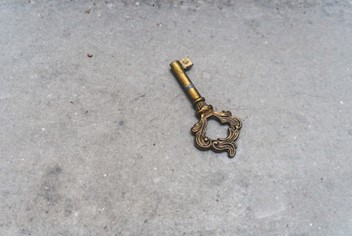
Without additional action by Congress, our current estate tax laws will sunset at the end of 2025, resulting in a dramatically reduced federal estate tax exemption - from more than $13.6 million per person in 2024 to approximately $7 million in 2026 (this includes adjustments for inflation). This change would affect many high net-worth individuals and families, likely exposing many more estates to federal estate taxes.
Of course, it’s impossible to predict whether Congress will enact legislation to prevent this sunset. Even so, advisors can prepare for client discussions and start considering estate planning strategies now, especially techniques that incorporate multi-generational gifts and charitable planning.
Indeed, for a client who is charitably-inclined, making larger lifetime gifts to charity and arranging for charitable bequests will help reduce the client’s taxable estate because of the charitable estate and gift tax deduction. For example, donor advised and/or endowed funds established at Lincoln Community Foundation are flexible and effective ways for your clients to accomplish their charitable goals and lower taxes by way of both lifetime and estate gifts.
For some clients, you may wish to begin exploring a comprehensive, multi-generational wealth transfer plan, potentially using key tax-planning vehicles, such as:
Charitable lead trust
Charitable lead trusts (CLTs) may be particularly effective in the current environment. These trusts can provide income to your client’s fund at LCF for a set time period, with the assets then passing to family members. Right now, the higher exemption amount allows for potentially significant initial funding of such trusts. This is because the value of the remainder interest counts toward the client’s estate and gift tax exemption.
Generation-skipping trust
A generation-skipping trust is an irrevocable trust that can benefit a client’s grandchildren and later generations. This trust utilizes a client’s generation-skipping transfer (GST) tax exemption (which parallels the estate and gift tax exemption). This type of trust could allow a client to take advantage of the higher exemption before it potentially decreases in 2026. It is possible under some states’ laws for these trusts to continue for many generations in a “dynasty” format, such that each generation benefits from the trust’s income (and potentially principal for health and education) without the trust’s assets being included in the beneficiaries’ estates for tax purposes.
Multi-generational fund at LCF
Alongside a charitable lead trust or generation-skipping trust, or as a standalone, a client can establish a donor advised fund at LCF that can function much like a family foundation, with successive generations serving as advisors. Or the client may ask us to step in after the first or second generation and recommend grants from the fund, carrying on the tradition of supporting the causes and organizations that have been most important to the client during their lifetime.
The LCF team looks forward to working with you to achieve your clients’ long-term charitable goals, even in the midst of uncertainty concerning the estate tax laws.
A Lincoln tradition turns 50
Published on Jul 31, 2024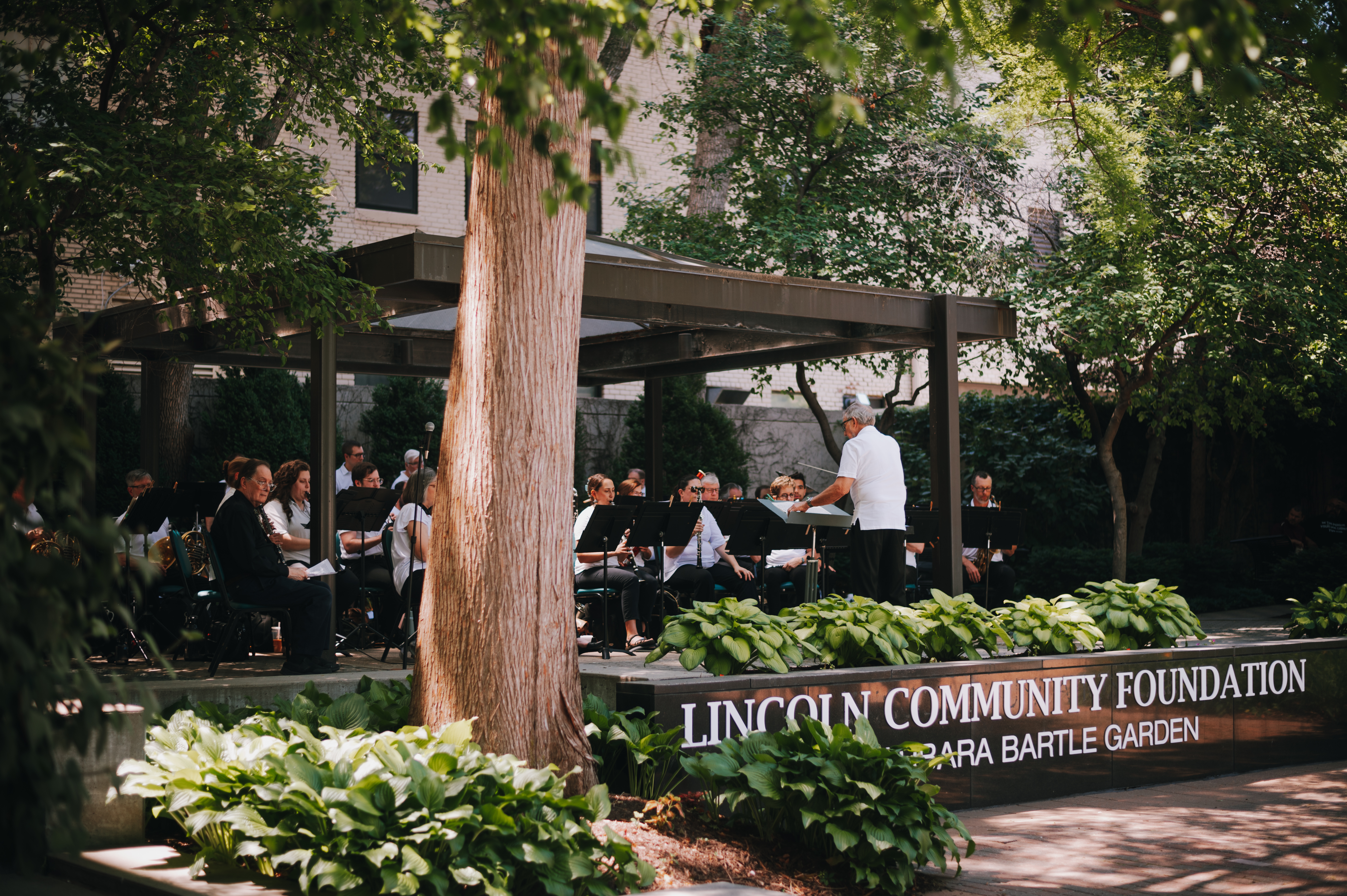
The year 1974 saw the invention of chicken fingers, Skittles and the Rubik’s Cube. Barbra Streisand scored a number one hit that year with “The Way We Were,” and President Richard Nixon resigned following the Watergate scandal.
Meanwhile, here in Lincoln, Nebraska, the first Lincoln Community Foundation Garden Performance Series premiered at 14th and N streets.
According to an advertisement in the June 11, 1974, edition of the Lincoln Journal Star, the first performance featured the Lincoln Symphony Orchestra with a free outdoor pop-up concert titled “Brown Bag Intermezzo.”
Five decades later, hundreds of musical groups have performed in the garden over the years accompanied by the tune of scores of family picnics, as this lovely treasure celebrates its 50th anniversary.
Undoubtedly, many things have stayed the same over those many intervening summers. Families, business folks, older couples, and young children alike still come together each Wednesday at noon. Everyone still gathers in that delightful concert space next to the Lincoln Community Foundation building, and everyone still sways to the music right along with the rhythmic sounds of water fountains and rustling leaves.
This summer the June 12th concert featured a special celebration in honor of the series’ golden anniversary. Nathan LeFeber was there, playing the trombone as part of the Lincoln Municipal Band (LMB). But it wasn’t his first time there.
“I just wanted to drop a quick note and say congratulations on 50 years, and thank you for including the LMB in the festivities,” wrote Nathan, director of bands for Kearney High School. “I live in Kearney but grew up in Lincoln and remember the gardens and the concert series well. It was fun for me to be a part of the celebration. Here's to 50 more years!”
LCF was established in 1955, however, the Foundation gardens were dedicated nearly 20 years later, in October 1973, according to Chip DeBuse, who works in philanthropy services for LCF.
“I think the concert area was specifically designed to be performance space,” he said. “It made perfect sense with a park located right in the middle of downtown. There’s nothing else quite like it in the city.”
Chip called it a lovely, long-time Lincoln tradition.
“Families can enjoy free, live music. And musicians love coming to play here. They play for an hour for fun, unlike a nightclub where they must play until 1 a.m. It’s an easy audience and a wonderful space.”
In 1975, the first summer-long series was announced – sponsored by the Downtown Lincoln Promotion Council and organized by the Lincoln Foundation Garden program committee. LCF’s involvement with the series ebbed and flowed throughout the years.
By 2012, current staff realized that the concert series needed additional support to continue its grand tradition.
“We picked up the banner,” Chip explained. “I think it took an organization like the Foundation to make it happen.”
First, LCF staff worked to raise money from neighboring businesses, as well as the Downtown Lincoln Association. Then they found a programming partner in Arts Incorporated.
“We started organizing and facilitating the concerts, focusing more on professional music,” said Dean Haist with Arts Incorporated. “We believe strongly in paying the musicians, respecting their talent and skill.”
At that point the concert season was also expanded from May through September, and Arts Incorporated began organizing the Wednesday performance calendar.
“We send out a call to more than 50 groups, with 19 spots to fill, and ask groups to fill out applications. Then we evaluate each one, looking for variety and quality,” he said.
After each performance, Arts Incorporated circulates surveys for feedback.
“We have raised the quality and diversity of performances over the past decade and made the series sustainable,” said Dean. “I personally thank the musicians after every concert.”
Both Chip and Dean give a shoutout to the Downtown Lincoln Association (DLA) for stepping up with support.
“When you look at this collaboration between the DLA, the Foundation and Arts Incorporated, you think, what’s more community than that?” Chip asked.
He said the concert series is now more stable than ever.
“We’re so happy right now,” Chip reflected. “Family-friendly performances for 50 years, on rainy days or hot days, and we’re planning to continue to keep our gates open.”
Thank you to the 2024 Garden Performance Series Sponsors:
Arts, Inc., Pam Herbert Barger Piano Students, Robert F. and Barbara M. Bartle Garden Performance Endowment, Eagle Printing and Sign, Farmers Mutual Insurance, Nebraska Arts Council, Pearle Francis Finigan Foundation, Pinnacle Bank, US Bank, Kinetic by Windstream and Woods Aitken LLP.
A match made in Lincoln
Published on Jul 31, 2024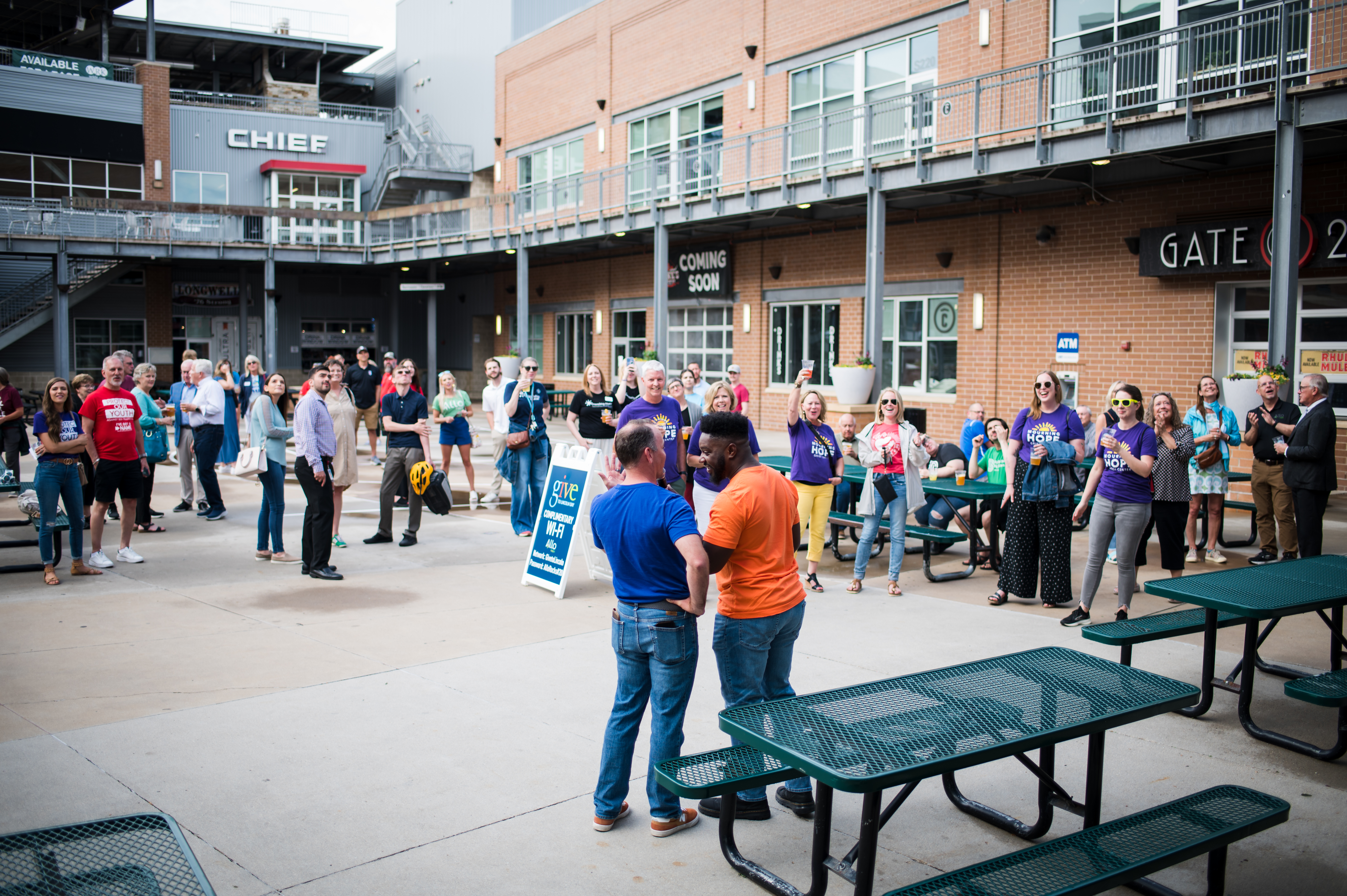
Each May the LCF office experiences a flurry of activity thanks to Give to Lincoln Day. From fielding calls and emails from donors and nonprofits, to facilitating thousands of gifts and grants, to coordinating events with local media and sponsors, our small but mighty staff is firing on all cylinders.
One Give to Lincoln Day activity has become a bit of an office tradition. In the breakroom there is a friendly pool where staff members make their best guess for the total amount raised. Price is Right rules apply – the closest guess without going over receives bragging rights.
This year’s record-breaking results took most of the team out of the running.
“At one point, I asked our Senior Accounting Manager Brenda Davis to make sure my numbers were correct,” said Michelle Paulk, LCF’s VP for Community Development and Outreach. “To say we were pleasantly surprised is an understatement.”
The 13th annual Give to Lincoln Day raised more than $8.5 million dollars – a new record for the event and nearly $1 million more than the previous year.
“Our community has demonstrated an incredible capacity for giving back,” said President/CEO Alec Gorynski. “These results will benefit 463 nonprofit organizations who contribute so much to the quality of life here in Lincoln.”
This year’s event also received a boost from the largest match fund in Give to Lincoln Day history, thanks to many generous sponsors including Presenting Sponsor, West Gate Bank.
“West Gate Bank has championed Give to Lincoln Day from the beginning,” said Alec. “When we met with Chairman, President and CEO Carl Sjulin last year, he challenged us to think outside of the box and find innovative ways to grow the event. With their continued commitment, we set out to do just that and increased the match by 30%.”
Thanks to the $650,000 match fund, the Foundation also established a new incentive for early giving with its Online Daily Drawings, powered by ALLO Fiber. Each day from May 1st through May 29th, one donation received through GiveToLincoln.com was randomly selected to receive a $250 boost for its designated nonprofit.
“The daily drawings were a great way to highlight the variety of organizations available to support while building excitement for Give to Lincoln Day,” said VP for Marketing and Communications Jenny Chapin. “As we approached May 30th, we really felt the energy ramp up. We knew we were about to have a big day.”
And what a day it was! Donors and nonprofit representatives gathered that afternoon in the Railyard for the first-ever Give to Lincoln Day Power Hour. As folks watched GiveToLincoln.com refresh on the Cube’s 40 ft LED screen, a cheer rang out when the total exceeded the final number raised in 2023 at just 5 pm. By the next morning, a new record was realized.
“When you think about a city of our size raising more than $8.5 million for local nonprofits in the course of a month, it shows you just how generous Lincoln is,” said Michelle. “In its history, Give to Lincoln Day has been the catalyst for $65.5 million in critical support. We can’t wait to see what’s next.”
Now that the dust has settled on a record-breaking event, it won’t be long before preparations begin for 2025 (save the date for May 29th!). In the meantime, LCF Gift Processor Karlene Behlen gets the bragging rights for having the closest guess in the office pool, although her job may have given her an inside track.
“I had a feeling as I was processing donations all month long that we’d beat $8 million,” she said with a smile.
Thank you to our generous match sponsors!
West Gate Bank, Presenting Sponsor
ABC Electric
ALLO Fiber
Assurity Life Foundation
Rich Bailey
Jan & John Blumer
D.A. Davidson & Co.
Davis Design
Frontier Bank
Jeff & Judy Greenwald
HBE LLP
The Hsin & Chao Families
Kile & Cuz Johnson
Kawasaki Motors Manufacturing Corp.
Kubly Family Foundation
Lutz
Mail Management Services, Inc.
JoAnn & Derrel Martin Charitable Fund
Jim McKee & Linda Hillegass
The Family of J. Gates & Daisy Minnick
Olsson
Pepsi Cola of Lincoln
Pinnacle Bank
Runza National
William J. Mueller & Kim M. Robak
Sampson Construction Company, Inc.
Joe W. & Ruth K. Seacrest Foundation Fund
Tom & Lisa Smith
Dr. Gene & Kristen Stohs
Ronald & Camilla Svoboda
Talent Plus Inc
Mark H. Tallman
Bill & Mae Whitmer Family Fund
WRK Family Foundation
Summer 2024 Newsletter
Published on Jul 31, 2024To catch up on the latest Lincoln Community Foundation happenings click here to download the newsletter.
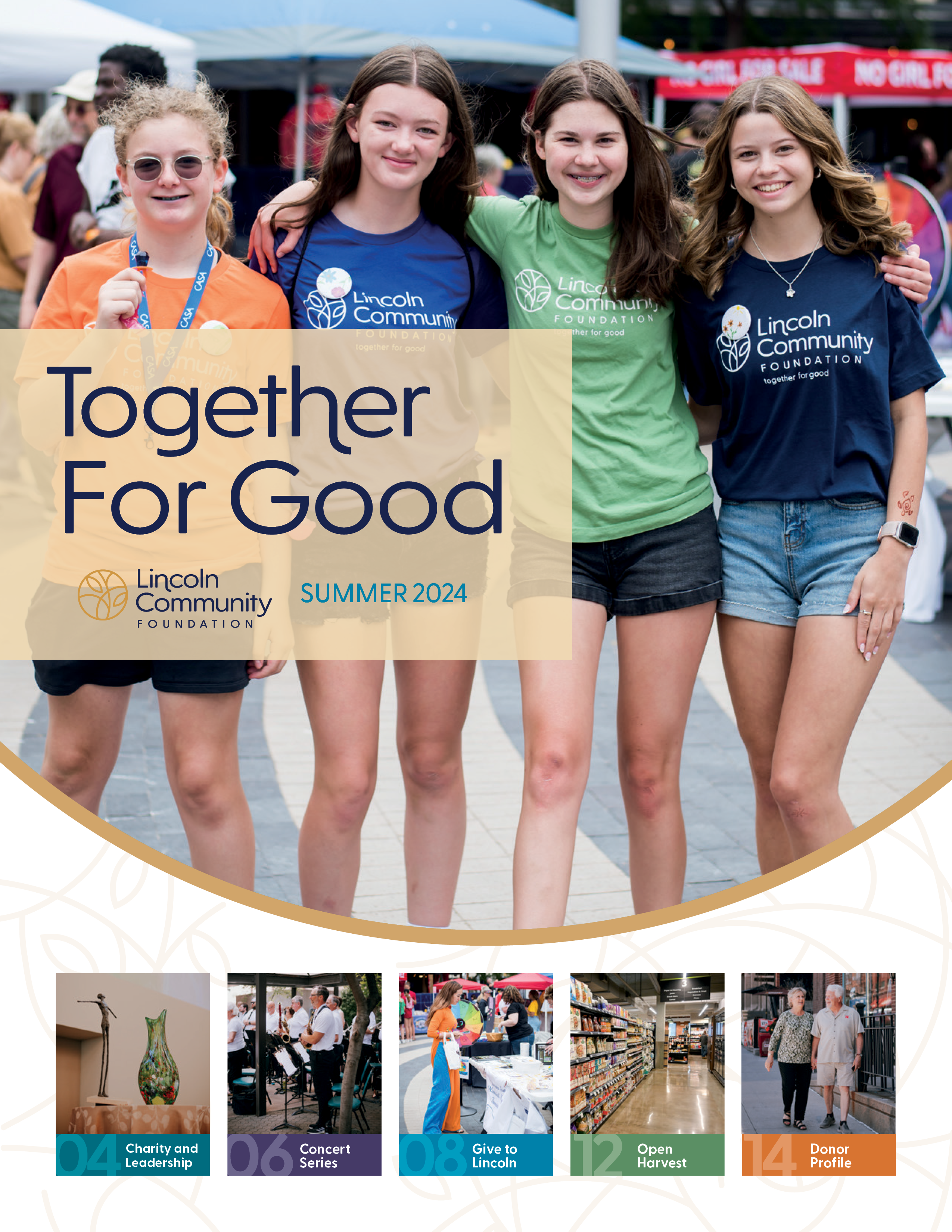
How to help in the aftermath of Hurricane Helene
Published on Sep 30, 2024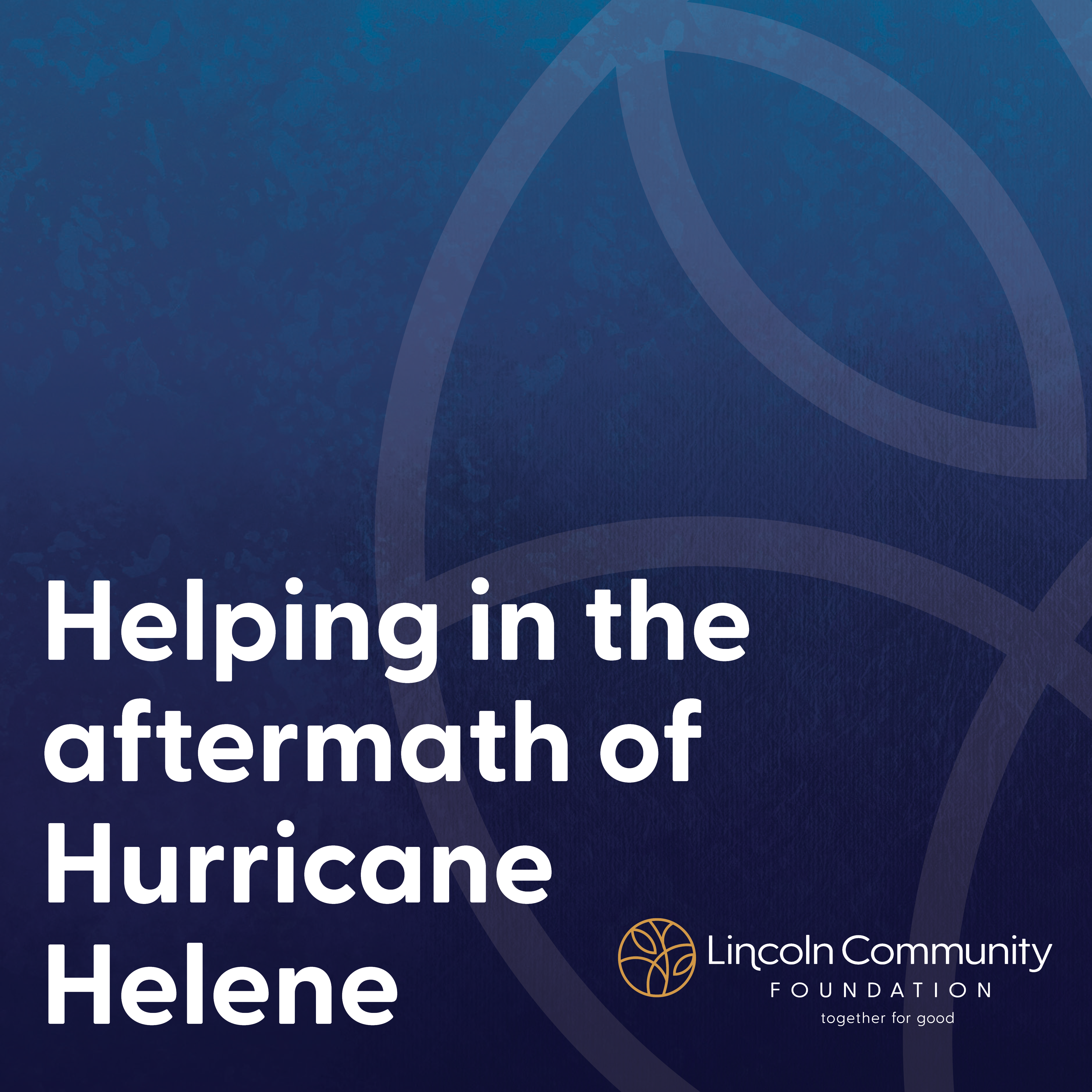
The news from Florida to North Carolina in recent days has been devastating. Many communities are now facing the long task of recovery in the wake of Hurricane Helene. Organizations are galvanizing quickly to provide resources.
We would like to share just a few of the many organizations that have strong track records in supporting relief and recovery efforts:
- Center for Disaster Philanthropy’s Hurricane Season Recovery Fund:
https://disasterphilanthropy.org/donate/atlantic-hurricane-season-recovery-fund/
- Community Foundation Tampa Bay:
https://cftampabay.org/helene/
- Community Foundation of Western North Carolina:
https://cfwnc.fcsuite.com/erp/donate/create/fund?funit_id=1332
- United Way of North Carolina:
https://fundraise.givesmart.com/form/1nSUgw?vid=17wt2l
If you would like to utilize your donor advised fund at the Lincoln Community Foundation to recommend a grant to any of the organizations above, or other qualified nonprofits helping with this emergency, go to https://lcf.fcsuite.com/erp/fundmanager and login to our donor portal.
If you have any questions, please contact Rhonda Page, rhondap@lcf.org, or 402-474-2345.
Celebrating Designated Grants
Published on Aug 29, 2024
by Trish Reimer
Do you celebrate significant annual events such as special anniversaries, family milestones, and birthdays? Here at the Lincoln Community Foundation, we like to celebrate something special each August – annual grant distributions from our designated funds.
Simply put, designated funds are endowed funds in which the donor has listed designated qualified charities to receive an annual grant. We refer to these charities as beneficiaries of the fund. Some donors may list one beneficiary whereas others might list multiple beneficiaries.
This year we generated 407 designated grants to 231 beneficiaries from 170 active designated funds. This amounted to nearly $1.7 million in grants distributed. It was an annual celebratory process that I’m coining “Designated Day.”
Some donors will set up their designated fund during their lifetime while others prefer to make arrangements through legacy planning. Designated funds continue to grow through the power of endowment and sage financial management by the Foundation staff. Designated funds can be appealing philanthropic vehicles that allow donors’ gifts to grow while benefiting nonprofits that may not have the administrative capacity to manage endowed investments.
Designated funds are also attractive to donors who wish to leave sustaining gifts to multiple nonprofits without having to set up separate funds for each of them. We take the trust that donors place in the Foundation very seriously to ensure that these annual grants are disbursed per the donors’ wishes.
It is a great honor to serve as a connector between donors and the charities they wish to support in perpetuity. It’s rewarding to know that we can look forward to and share in this annual celebration. What a privilege it is to work “Together for Good.”
Establishing a designated fund with the Lincoln Community Foundation means that you are leaving an annual, sustaining gift to those organizations that you love…forever. If this sounds like a good fit to help you achieve your charitable goals, we invite you to reach out to us. We’d be honored to help you plan this annual celebration.
Here's wishing everyone a happy “Designated Day” and many, many more.
Lincoln Community Foundation grants more than $1.6 million
Published on Aug 29, 2024Thanks to the foresight of generous donors, Lincoln Community Foundation made grants in August of $1,640,027 for 231 nonprofit organizations, 139 of which were local. These grants came from designated funds created by donors to support their favorite nonprofits and houses of worship. Endowed funds provide annual financial support to the organizations specified by the donors, helping the community and the nonprofits grow and thrive forever.
Through partnerships and collaboration, Lincoln Community Foundation facilitates positive change for the common good. Since 1955, the Foundation has been privileged to be part of many wonderful legacies by connecting donor generosity to local needs. The Foundation has distributed more than $238 million in grants to nonprofit organizations that improve the lives of Lincoln’s residents. Lincoln Community Foundation is accredited by the National Standards for U.S. Community Foundations®. Learn more at www.LCF.org.
Welcoming Week: Cultivating and Celebrating Diversity in Lincoln
Published on Sep 10, 2024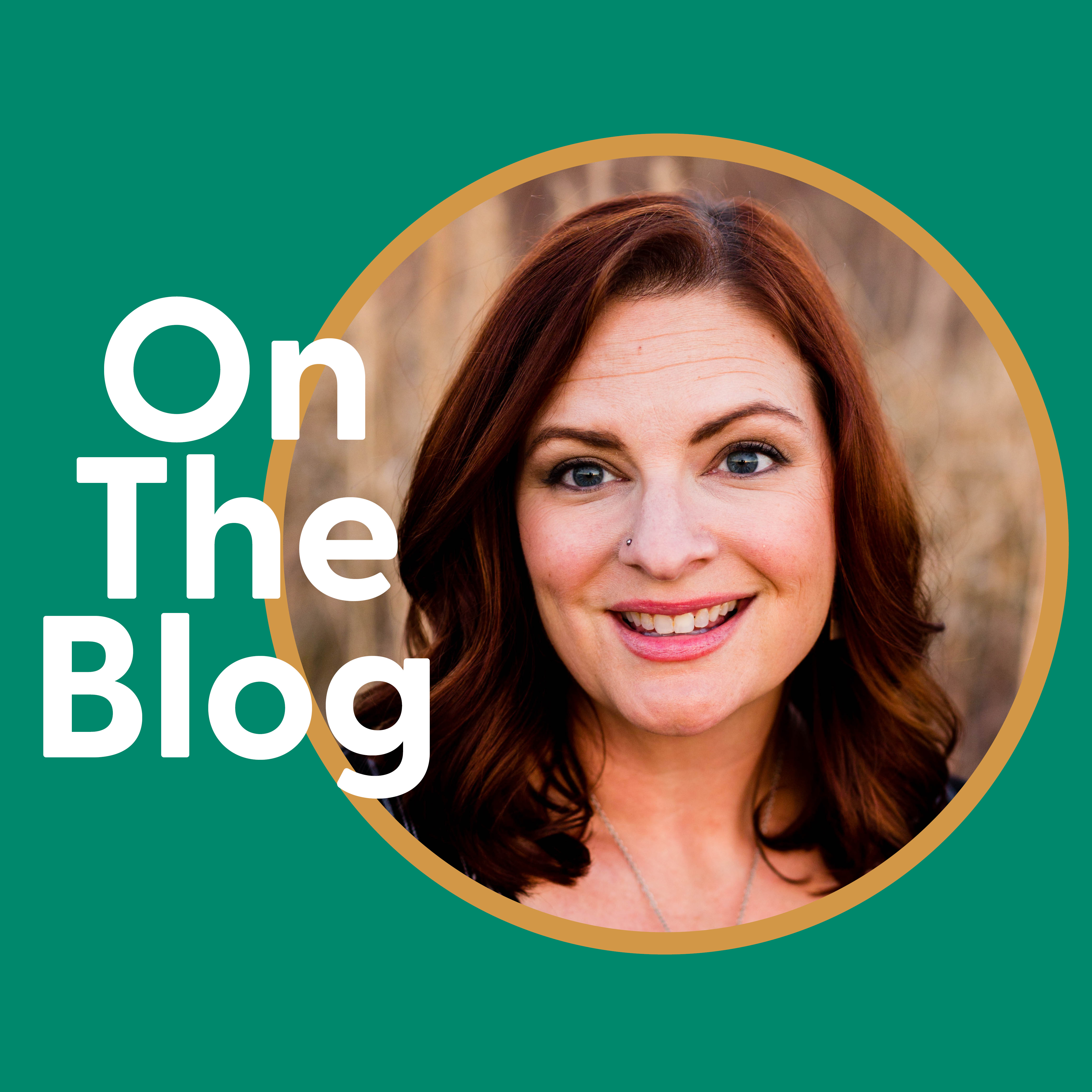
By Lisa Guill
Director of Communications | Asian Community & Cultural Center
Welcoming Communities Coordinator | Cultural Centers of Lincoln
LINCOLN, A WELCOMING PLACE
For decades, Lincoln has been a community of welcome for immigrants and refugees. In fact, about ten percent of Lincolnites are foreign-born. Our newest neighbors come to Lincoln for all kinds of reasons, from employment and entrepreneurship to education and community. This brings a wealth of cultural diversity to celebrate and explore!
Welcoming Week is an annual series of events inviting ALL of Lincoln to see and experience myriad cultures in our community. In 2023, Lincoln Welcoming Week celebrated more than 8,000 people in attendance across 23 events. Welcoming Week 2024 kicks off on September 13th and will feature more than 30 events across the city. Almost all events are free and open to the public.
Join us at the Lincoln Children’s Zoo on September 20th for Lincoln Welcoming Week’s cornerstone event Lincoln Unites, a free event celebrating a plethora of cultures. Lincoln Unites kicks off with a citizenship ceremony, and continues with a community festival full of performances, food, and activities for the whole family.
El Centro de las Américas’ Latino Festival on September 14th, presents Central and South American culture through music, dance, food, and more. And the Asian Community & Cultural Center’s 10th annual Harvest Moon Festival weaves together harvest celebration traditions from various Asian cultures, hosting a huge party for entire community.
In addition to community festivals, you can explore language learning with Lincoln Libraries and at Sower Books. Visit the International Quilt Museum to learn from local immigrants about the cultural significance of their traditional textiles and clothing. Check out an open house at Lincoln Literacy or the Lincoln Public Schools’ Welcome Center. Drop in at one of the many library story times.
IT'S ABOUT YOU
Welcoming Week is a great opportunity for YOU to build community across cultures. How? By attending and sharing Welcoming Week events. Or, by hosting a Cultural Exchange event. What is a Cultural Exchange event? Glad you asked!
A Cultural Exchange event is a gathering that invites guests to bring a piece of their cultural heritage to share. This can be a personal story, food, or a book – anything that links to cultural roots. You can host a potluck at work, inviting your coworkers to bring a dish to share that represents their cultural heritage. This is a tasty option!
You can take over your monthly book club to read and discuss an immigration story. Check out WelcomingLNK for a book list and more details on hosting a Cultural Exchange event.
A complete calendar of Lincoln Welcoming Week 2024 events can be found at WelcomingLNK, with current updates on the Facebook page Lincoln Welcoming Week.
Huge thanks to Welcoming Week 2024 sponsors: Lincoln Community Foundation, InspirMedia, Cooper Foundation, Ameritas, Firespring, Lutheran Family Services, Helen Fagan & Associates, Bryan Health, Brown Immigration Law, and Lincoln Public Schools.
OK, IT’S ABOUT US
Welcoming Week is just one way to be part of the movement to build belonging in Lincoln. Every action matters. Every invitation, every kindness helps neighbors new and old to feel safe and seen.
To learn more about Welcoming efforts in Lincoln visit WelcomingLNK.org.
Hurricane Milton Response | Ways to Help
Published on Oct 15, 2024As our country faces the aftermath of another devastating storm, many are looking for ways to offer help and hope for those in the wake of Hurricane Milton. We wanted to share a few of the many funds set up to help with emergency food, shelter, clothing, medical treatment, and more.
- American Red Cross
Disaster Relief Fund
Leveraging the power of more than 1,000 Red Cross volunteers in providing relief and recovery resources to those who are coping with tremendous loss and incredible challenges.
- Collaboratory
SWFL Emergency Relief Fund
In partnership with United Way of Lee, Hendry, and Glades Counties to collectively help Southwest Florida rebuild, supporting local nonprofits helping individuals needing immediate and long-term resources to recover.
- Collier Community Foundation
Collier Comes Together Hurricane Disaster Relief Fund
To benefit local nonprofit programs and relief efforts, getting funds where they are needed most.
- Community Foundation of Sarasota County
Suncoast Disaster Recovery Fund
To provide recovery support to the Suncoast Region in response to Hurricanes Helene and Milton. The fund will allow investments in long-term, long-range programs to sustain local agencies after initial emergency relief is provided.
The Season of Sharing County in Greatest Need
To provide targeted financial assistance for necessities like rent, utilities, car repairs or other emergency expenses to individuals on the brink of homelessness in response to Hurricanes Helene and Milton. This fund supports the greatest need within Sarasota, Manatee, DeSoto and Charlotte counties.
- Community Foundation Tampa Bay
Tampa Bay Rapid Response Fund
This fund supports area nonprofits working on the front lines of Hurricanes Helene and Milton relief efforts. Money will be deployed to local nonprofits to address needs.
- Gulf Coast Community Foundation
Rapid Response Fund
This fund will support their service area community and partners impacted by Hurricane Milton.
- Pinellas Community Foundation
Tampa Bay Resiliency Fund
Will provide critical support, empowering nonprofits to deliver essential assistance to those who need it most in their service areas.
If you would like to utilize your donor advised fund at the Lincoln Community Foundation to recommend a grant to any of the organizations above, or other qualified nonprofits helping with this emergency, login to our donor portal. If you have any questions, please contact Rhonda Page, rhondap@lcf.org, or 402-474-2345.
Your IRA is a force for good
Published on Oct 18, 2024
By Chip DeBuse
It probably would not surprise you to learn that over 42% of Americans own an IRA. In many cases, IRAs–especially for people who have rolled over one or more employer retirement plans–represent a significant portion of a household’s net worth. When it comes to charitable planning, IRAs should never be ignored. Indeed, your IRA may offer some of the best opportunities to support the causes you care about.
For starters, no matter what your age, consider the benefits of changing the beneficiary designation on your IRA to name your fund at the Lincoln Community Foundation as the recipient of all or a portion of the account. This is an easy, tax-effective way to leave a bequest to support the causes you care about.
The Philanthropy Services team at LCF can help you structure the terms of your fund to match your intended charitable legacy. For example, you can make arrangements for your children to serve as advisors on the fund to recommend grants to particular areas of interest or direct the Foundation itself to deploy the money to support the community’s areas of greatest need.
The reason an IRA beneficiary designation is such an ideal form of charitable bequest is because of the tax advantages. Dollars flowing to the Lincoln Community Foundation from an IRA upon your death are not subject to estate tax. In addition, as a public charity, LCF does not pay income taxes on the IRA assets it receives.
By contrast, if you were to name your children as beneficiaries of the IRA, those IRA distributions to the children are subject to income tax, which can be hefty given the tax treatment of inherited IRAs. Plus, the IRA assets would be included in your estate for estate tax purposes.
Exploring ways to give your IRA to charity can also serve as a helpful reminder to review all of your beneficiary designations. Although this task may be easy to overlook, beneficiary designation forms actually represent critical components of your estate plan.
To understand this, you need look no further than the cautionary tale of a Procter & Gamble employee who passed away in 2015, leaving behind a retirement plan. Way back in 1987, the employee named his girlfriend as the beneficiary and, despite their relationship ending, never updated the beneficiary designation. When the employee died, the retirement plan, which had grown to nearly $1 million, passed via the beneficiary designation to, you guessed it, the 1980s ex-girlfriend.
Finally, if you have reached the age of 70 ½, you can make what’s known as a Qualified Charitable Distribution (“QCD”) from your IRA directly to certain charities, including a designated fund or a field-of-interest fund at the Lincoln Community Foundation–up to $105,000 per year per spouse in 2024. You won’t pay income tax on the distribution and, happily, if you’ve reached the age for Required Minimum Distributions, (age 73) your QCDs count toward those distributions.
The upshot? Next time you review your financial and estate plan with your advisor, take a close look at your IRAs. If you intend to leave a charitable legacy, or if you’d like to support your favorite organizations during your retirement years, your IRA may be your best bet to make a big difference in the causes you care about.
To learn more, reach out to me or any of my colleagues at 402-474-2345. We’re here to help.
Lincoln Littles answers the call
Published on Nov 8, 2024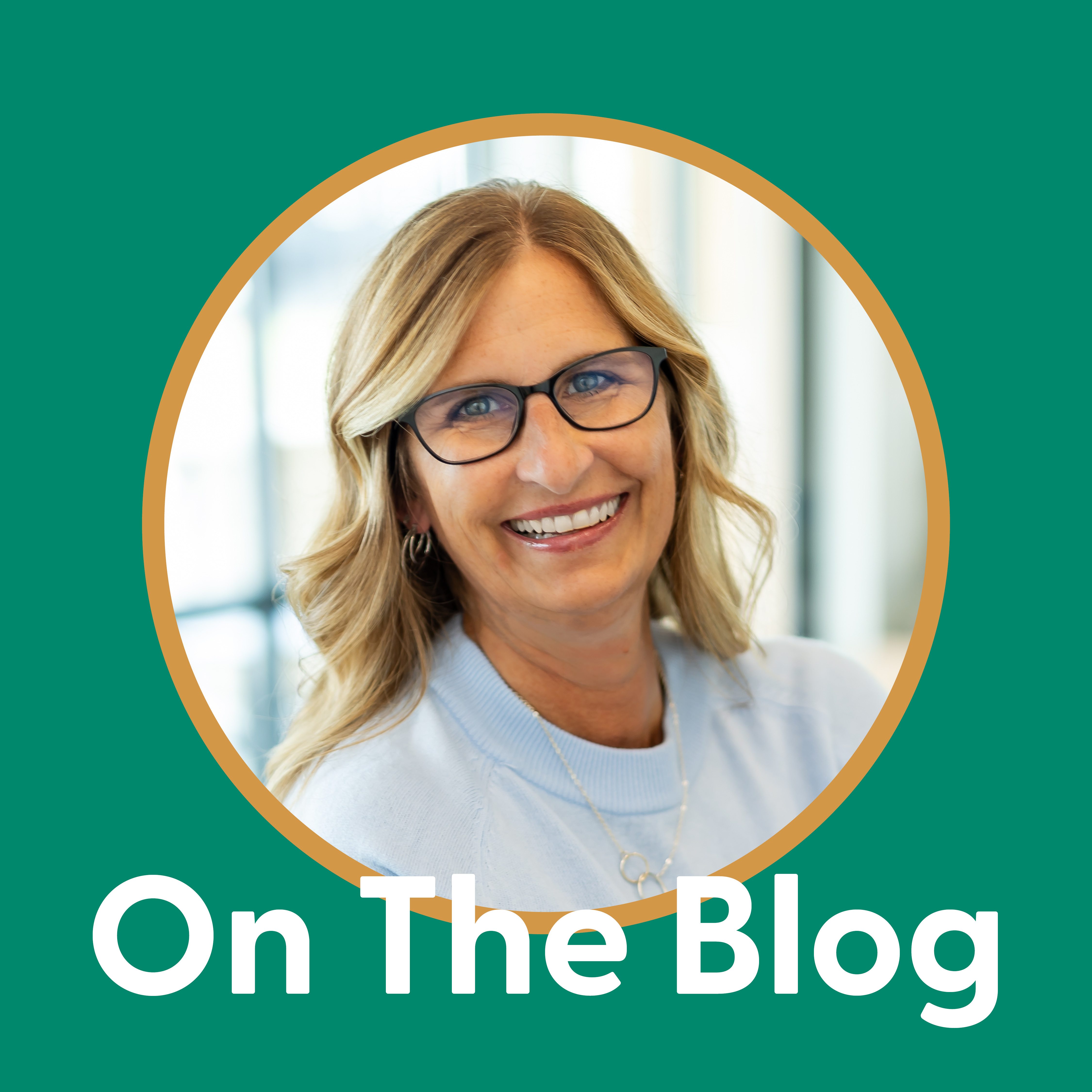
By Suzanne Schneider
No two days are alike in my role as Associate Director with Lincoln Littles. There is one certainty within my day-to-day, however. The phone will ring. A LOT.
The calls cover a variety of things, most are early childhood related, with the exception of an occasional call from my own children still navigating young adulthood.
Here’s a look at an average day addressing the needs for quality and affordable childcare in our community.
At 8 am, there is a call from a single dad who lost his job and needs help with childcare costs while he interviews for a new position and waits for his first paycheck.
Next an email and call with a community member that wants to start her own childcare and needs help with all the processes, there are so many to navigate.
Then the call from a new childcare director that needs support and asks about joining the Lincoln Littles Peer Mentor Program.
Next up, a mom and baby stop by our office, they just moved to Lincoln so mom can attend grad school at the University.
“Are there any programs to help me with childcare while I work to better my family?”
As soon as she left, I received a call from a teacher at one of our local middle schools.
“I don’t want to leave my teaching career but if I don’t find help paying for childcare, I won’t have an option.”
Then the call from a director of a childcare center who wants to increase the quality of her program.
“To raise quality, I need to make some improvements to the infant classroom. Can you help? Are there any grants available?”
Another director calls saying she needs staff. She has families waiting to start but can’t enroll them if she doesn’t get some teachers hired.
Over the past several months there were the calls from childcare programs struggling to stay open:
“Can you help us stay open?”
“Can you help us close gracefully?”
“Can you help us find places for the kids and staff to go?”
At 6 pm, I host an informational session for childcare staff to help them understand the new school readiness tax credit so they can claim anywhere from $2,300 up to $3,500 and increase their income.
After that, I call it a day. A good day. These are just a few of the calls that come into our office. You may have noticed we’ve changed the timing of our annual fundraising campaign so that we can keep helping the folks who know they can pick up the phone and call Lincoln Littles. The need is as urgent as ever.
When you give, you make more stories like these possible. Will you join me and all of us at Lincoln Littles in answering the call?
Suzanne Schneider is the associate director for Lincoln Littles. To support access to quality and affordable early childcare with a gift to Lincoln Littles visit LincolnLittles.org.
Open Door Grant opens new possibilities to students
Published on Nov 26, 2024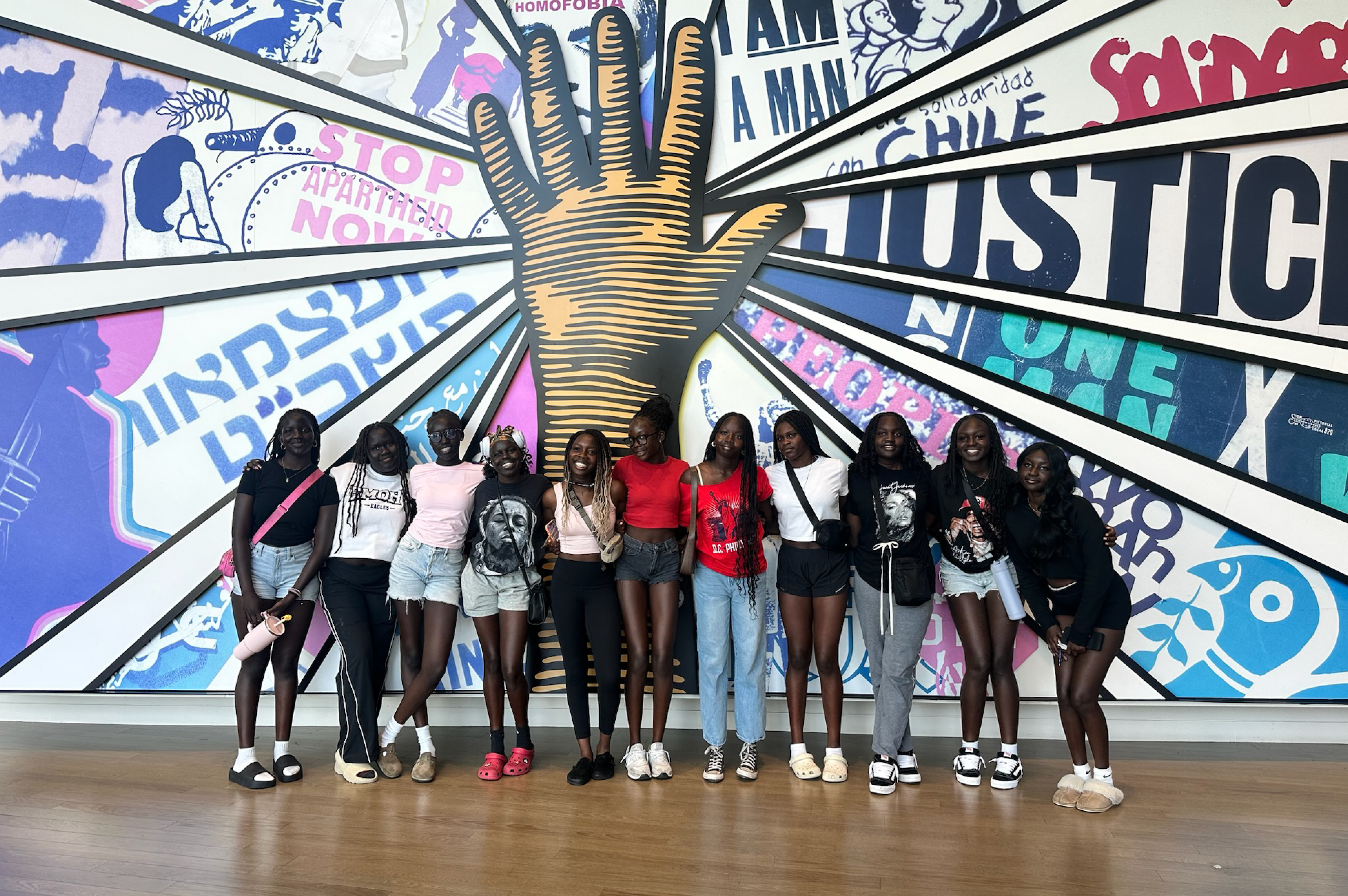
By Liz McCue
Navigating the path to college in the United States is challenging enough as is, but even more so for students who are the first to travel that path in their families. That’s why, since the organization’s founding in 2019, ROSS (Republic of South Sudan) Leaders has taken high school juniors and seniors on college tours and offered college preparation programs.
“Most of our students are first generation, whether that be first-generation student, as well as first-generation American,” said Nyagoa Deng, who serves as both program facilitator and one of the college tour coordinators for ROSS Leaders’ Lincoln chapter.
ROSS Leaders offers mentorship, academic support, community and cultural engagement, and health and wellness programs to the children of South Sudanese immigrant and refugee families in multiple communities across the United States, including Lincoln. For its first few years, the organization took students on tours of local institutions, including the Universities of Nebraska at Omaha and Lincoln. More recently, ROSS Leaders has been helping students dream even further, starting with a trip to Chicago in 2022.
This year, with the help of an Open Door Grant from the Lincoln Community Foundation, ROSS Leaders took around 50 high school juniors and seniors from Lincoln and Omaha to Atlanta. They visited institutions including Historically Black Colleges and Universities (HBCUs) like Spelman College and Morehouse College, as well as universities like Emory University and Georgia State University.
Open Door Grants support Lincoln nonprofits with grants available on a rolling basis with monthly review and a simplified application. For ROSS Leaders, that made it easy to obtain financial support that would help cover operational costs and, with additional grants and donations, make the trip free to all students. In fact, all the organization’s youth programs are available at no cost, said Flora Mondi, interim executive director, to ensure money isn’t a barrier to participation.
Students were split into two groups for the trip. Around two dozen girls traveled to Atlanta first, from July 30 to August 3, and another two dozen boys went from August 4 to 8.
“I honestly can without a doubt say that the college tour was life-changing to some of our students,” Nyagoa said.
She was one of several members of ROSS Leaders’ leadership who accompanied students to Atlanta. Visiting colleges is an important part of the trip, but so is the travel itself.
For some students, this may be their first time traveling out of Nebraska, or even outside of their hometowns. Even as some South Sudanese families mark 20-25 years of living in the United States, immigrants and refugees face language and educational barriers in Nebraska’s job markets that limit their income. In a 2020 report published by the Nebraska Department of Health and Human Services, 63.9% of South Sudanese or Sudanese refugee survey respondents reported an annual income of $20,000-$35,000.
That’s also why the college tours are so valuable – students can view another path for their future that they may not have known existed from seeing their parents’ or family friends’ experiences.
“I always like to say it’s just getting the opportunity to them, because students don’t know what they don’t know,” Nyagoa said.
In Atlanta, students went to the Coca-Cola factory, the Georgia Aquarium, the National Center for Civil & Human Rights and the Apex Museum. They also visited The Black Man Lab and the Southern Center for Human Rights, where they met with Black men and women in a variety of careers.
Seeing successful Black professionals was another important part of the trip, said Anger Dok, ROSS Leaders’ communications director.
“A lot of the students, after they went to the Lab, were talking about how they had never seen so many successful Black men in their 30s, 40s, 50s and being able to talk to them,” Anger said. “And they also felt like it was a vulnerable space where they could talk about how they felt.”
At the Southern Center for Human Rights, the girls met with leaders and attorneys, including the executive director, Terrica Ganzy.
“It was beautiful for our students to see women of color in those positions and hear their amazing words of wisdom, as well,” Nyagoa said. And not just students — one of her colleagues also found a new interest in law, and the experience assured Deng of her desire to pursue a law degree.
For both Nyagoa and Anger, seeing students get excited at new possibilities is one of the greatest parts of their jobs. They also faced barriers to getting into college and see a lot of themselves in the students they work with.
“I want to help students the way I wish I had been helped,” Nyagoa said. “I hope to be able to aid my students so that they don't have to face these same barriers, students who share virtually all the same identities as me.”
Her mom was a major proponent in Nyagoa’s higher education journey, hoping that she and her siblings could have a life and jobs that weren’t as labor intensive. That mindset is held by many parents who send their children to ROSS Leaders’ programs, too — they want to see their children attain college degrees and fulfilling and impactful jobs.
The number of role models who can speak about college and their professional journey is growing, as previous ROSS Leaders participants return to the organization as mentors. Anger herself didn’t learn about it until she was in college, but in the years she’s been a mentor or program coordinator for ROSS Leaders, she’s enjoyed seeing students grow over the years, both as people and inches in height.
The organization has growth in its future, too, with goals of eventually offering free ACT testing and taking students on trips abroad. Starting with just five students in 2019, programs now serve dozens, driven in no small part by word-of-mouth — students bring their friends, who bring their siblings, who then bring their friends to events or talk about programs. Excitement for the college tours for juniors and seniors has grown year after year this way, too.
“I’m looking forward to seeing that twinkle in their eye continue through multiple generations of students,” Anger said.
Lincoln Community Foundation announces retirement of Vice President for Finance, Scott Lawson
Published on Jan 14, 2025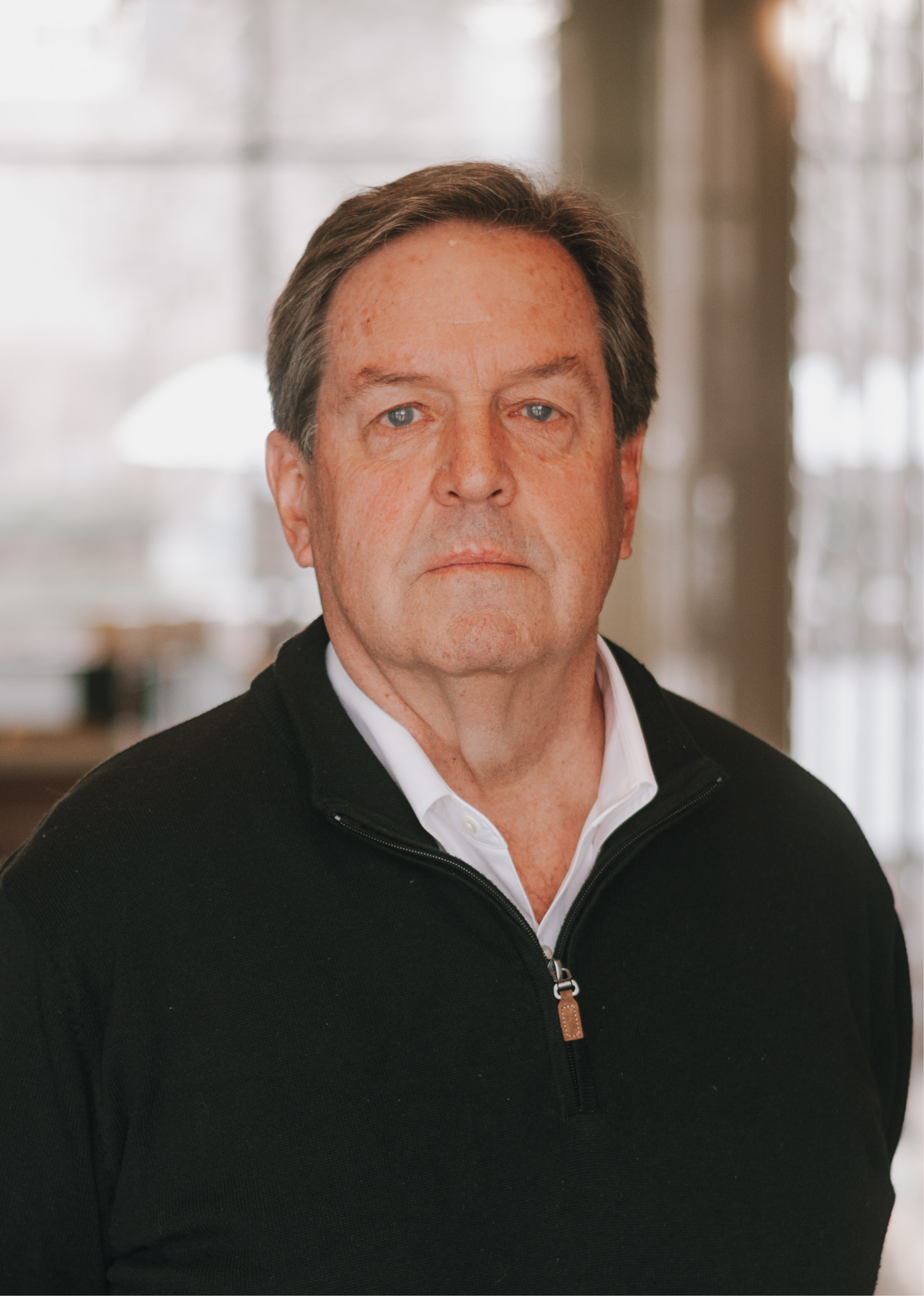 Lincoln Community Foundation (LCF) announced today that Vice President for Finance and Administration, Scott Lawson, will retire as of April 30, 2025. Since 2010, Lawson has overseen LCF’s financial system, including financial management, investment monitoring, human resources, and information systems.
Lincoln Community Foundation (LCF) announced today that Vice President for Finance and Administration, Scott Lawson, will retire as of April 30, 2025. Since 2010, Lawson has overseen LCF’s financial system, including financial management, investment monitoring, human resources, and information systems.
“We were fortunate to have Scott at the financial helm during a period of extraordinary growth for the Foundation,” said President Tracy Edgerton. “His leadership and integrity have built essential trust for this organization in our community, and this trust helps us extend our network for good both now and into the future.”
When Lawson joined LCF in 2010, the organization recorded $797,000 in gift revenue and $64 million in assets. In 2024, LCF received gift revenue of $44 million and now has assets totaling $250 million. During the past 15 years, the organization has granted more than $175 million to local nonprofits and has raised more than $66 million through Give to Lincoln Day.
“I am immensely proud of what has been accomplished for our community during my tenure,” said Lawson. “It is an honor and privilege to be a part of this organization.”
Scott Lawson has been involved in the accounting profession since 1979, when he started as a certified public accountant with Deloitte & Touche. He also served as the Controller for Life Operations at Lincoln Benefit Life Company.
LCF will soon begin a search for Lawson’s successor.
About Lincoln Community Foundation
Through partnerships and collaboration, Lincoln Community Foundation facilitates positive change for the common good. Since 1955, the Foundation has been privileged to be part of many wonderful legacies by connecting donor generosity to local needs. The Foundation has distributed more than $255 million in grants to nonprofit organizations that improve the lives of Lincoln’s residents. Lincoln Community Foundation is accredited by the National Standards for U.S. Community Foundations®. Learn more at www.LCF.org.
Fall 2024 Newsletter
Published on Nov 26, 2024To catch up on the latest Lincoln Community Foundation happenings click here to download the newsletter.
Lead Donor Profile: Jim Krieger draws on his business background to advocate for early childhood
Published on Nov 26, 2024
By Mary Kay Roth
Jim Krieger grew up with a mother who believed in quality early childcare, a woman far ahead of her time. What’s more, she talked the talk and walked the walk – working in Lincoln’s high-poverty schools during the early 1960’s.
His mother’s beliefs have helped shape Jim’s life, professionally and personally. As a young man he landed a job with Don Clifton at SRI Research Center, which eventually led to an opportunity to support one of the first businesses in Lincoln to facilitate early childcare for its employees.
Today Jim is retired but has become a lifelong advocate of early childcare and continues to preach its merits.
He explains that after majoring in business administration and finance at the University of Nebraska-Lincoln, he left his first accounting job when given a chance to work for Don Clifton and SRI, a company that would eventually merge with Gallup.
He started at the company in 1978 and watched the business grow, move into bigger buildings, eventually constructing an entire campus at 70th and O streets. And as the company exploded in size, Jim worked his way up to Vice President and Chief Financial Officer.
In 1981, the company had the notion of an on-site early childcare center. Jim had the perfect background to support the initiative.
“Jim lost his dad in 1967 when he was only 14 years old, and his mom was left with two children to support,” Jim’s wife, Penny, reflected. “She was a school nurse and became very involved with Head Start.”
“Years later, when Jim was at Gallup, he was very much aware of how employer-supported childcare benefited both the families and the businesses where they worked.”
Jim described his mom as an early pioneer and champion of nurses and early education in public schools, as well as a powerful leader in supporting healthcare and childcare for families in poverty.
“If there was a health initiative proposed for kids or infants, mom was always the first one to set it up,” he said. “She kept medical equipment in the back of her car and after dinner I’d go with her when she would go into homes to test children for things like hearing problems.”
In 1962 his mom was offered the opportunity to help set up and work the health care component of Head Start centered at Elliott Elementary and five other public schools, one of the very earliest national childcare programs in the country.
“So, you can imagine when people in the Gallup office started talking about establishing a full-time early childcare center and I had grown up learning about the value of quality childcare,” said Jim. “I had positive memories of the support it could give children and families.”
Eventually Jim took on the financial end of the Gallup childcare center and was responsible for ensuring the company was fiscally responsible in their childcare operation – and he credits much of that early success to bringing in fierce local childcare advocates such as Jane Ericson, Helen Raikes, Connie Rath and Mary Reckmeyer.
“Jim made it happen, his voice was huge,” said Mary.
“Back in the day, companies may have believed that providing childcare was a good idea, but they would look at the upfront costs, not the potential benefits and outcomes,” she continued. “Jim, however, was the financial guy and he believed childcare was the right thing to do. He always said, ‘Let’s figure it out.’ He gave us credibility.”
Although Jim is retired, he continues to believe childcare is a unique employee engagement and recruitment tool.
“When we were recruiting and trying to attract business leaders to Gallup, childcare gave us something extra to offer,” he said. “And there were additional benefits, as it also cut down on employee loss, so our business didn’t have to rehire and retrain.”
Anne Brandt, executive director of Lincoln Littles, is honored that Jim now brings this perspective as he works closely with their organization.
“Jim is an incredible partner to Lincoln Littles serving on our Champions of Early Childhood, our Board of Advisors, and Executive Team,” said Anne. “In addition, Jim lends his time by helping us dive deeper into future strategy for businesses. His professional background coupled with past involvement in on-site childcare at Gallup are invaluable.”
These days Jim continues to champion the advantages of offering employees childcare.
“It’s great for employees and their families, but also for a company’s return on investment,” he said.
Jim understands that access to early care and education goes beyond a family or women’s issue – it impacts the entire community. He still attributes his philosophy back to his mother and to what he calls, “an accidental form of education due to what I experienced in those early, important years. That never goes away.”
Jim said his mother trusted people. “Trust your employees and they will do right by you. Honor and support them.”
That’s the way he has lived his own life, and he hopes his story will inspire other businesses to find innovative solutions while keeping their employees top of mind. He recognizes that our community is lucky to have a partner in Lincoln Littles which supports both employees and businesses with their childcare needs.
“I believe in doing whatever you can to take care of your employees.” he said. “I’m so blessed to have been given some very unique opportunities in life. I’d like to make sure others have the same opportunities.”
Jim and his wife, Penny, operate the Krieger Family Foundation established in 2011, focused on the importance and relevancy of learning entrepreneurial skills, supporting and helping develop related programs. The Jim & Penny Krieger Family Foundation is a Lincoln Littles lead donor.
LCF promotes Hansen, welcomes new staff
Published on Nov 18, 2024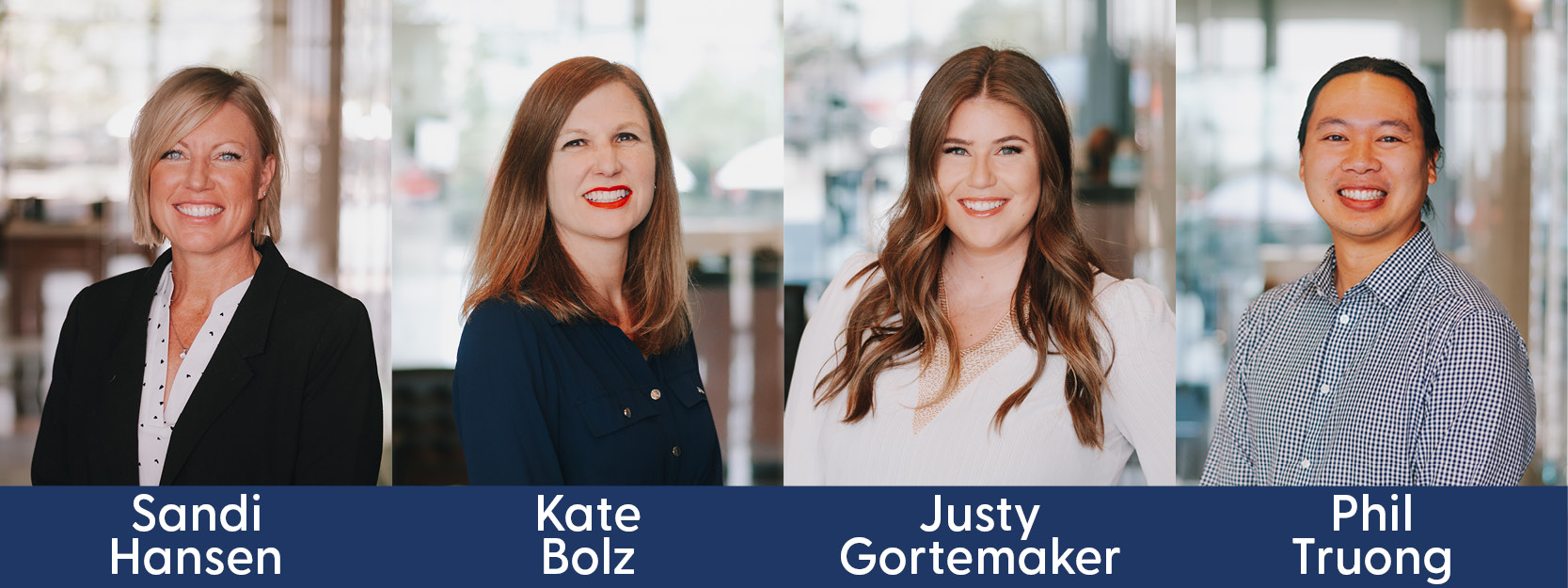
Lincoln Community Foundation (LCF) recently announced the promotion of Sandi Hansen to Vice President, Philanthropy Services. Hansen leads LCF efforts to support community initiatives and cultivate strategic philanthropic partnerships.
“Sandi is passionate about creating and fostering meaningful relationships to build our community,” said LCF President, Tracy Edgerton. “We’re thrilled to have her expertise guiding the vision and strategy for our Philanthropy Services team.”
Additionally, LCF is pleased to welcome three new staff members to its team of professionals who are committed to building a better, stronger community for people today and generations to come.
Kate Bolz brings nearly 20 years of experience in economic and community development to the role of Community Leadership and Belonging Manager, supporting LCF’s community leadership and grantmaking functions by facilitating collaborations across all sectors of the city. Bolz also designs and implements strategies to address inequities in our community and leads belonging, equity, and inclusion efforts.
Also joining the team earlier this year is Justy Gortemaker. In the new role of Events & Communications Manager, she designs and executes LCF’s events and supports internal and external marketing efforts. Gortemaker is a passionate storyteller with nearly 10 years of experience in producing events.
Phil Truong brings more than five years of experience to the Finance & Operations Team as LCF’s new Staff Accountant. In this role, Truong is responsible for grant processing, accounts payable, fiscal sponsorship fund management, and data analysis.
Since 1955, LCF has been privileged to be part of many wonderful legacies by connecting donor generosity to local needs. The organization serves as a faithful steward for many types of philanthropic gifts and helps donors create lasting legacies of giving. LCF has distributed more than $255 million in grants to nonprofit organizations that have improved the lives of our residents.
Lincoln Community Foundation receives momentous estate gift benefiting local nonprofits
Published on Nov 14, 2024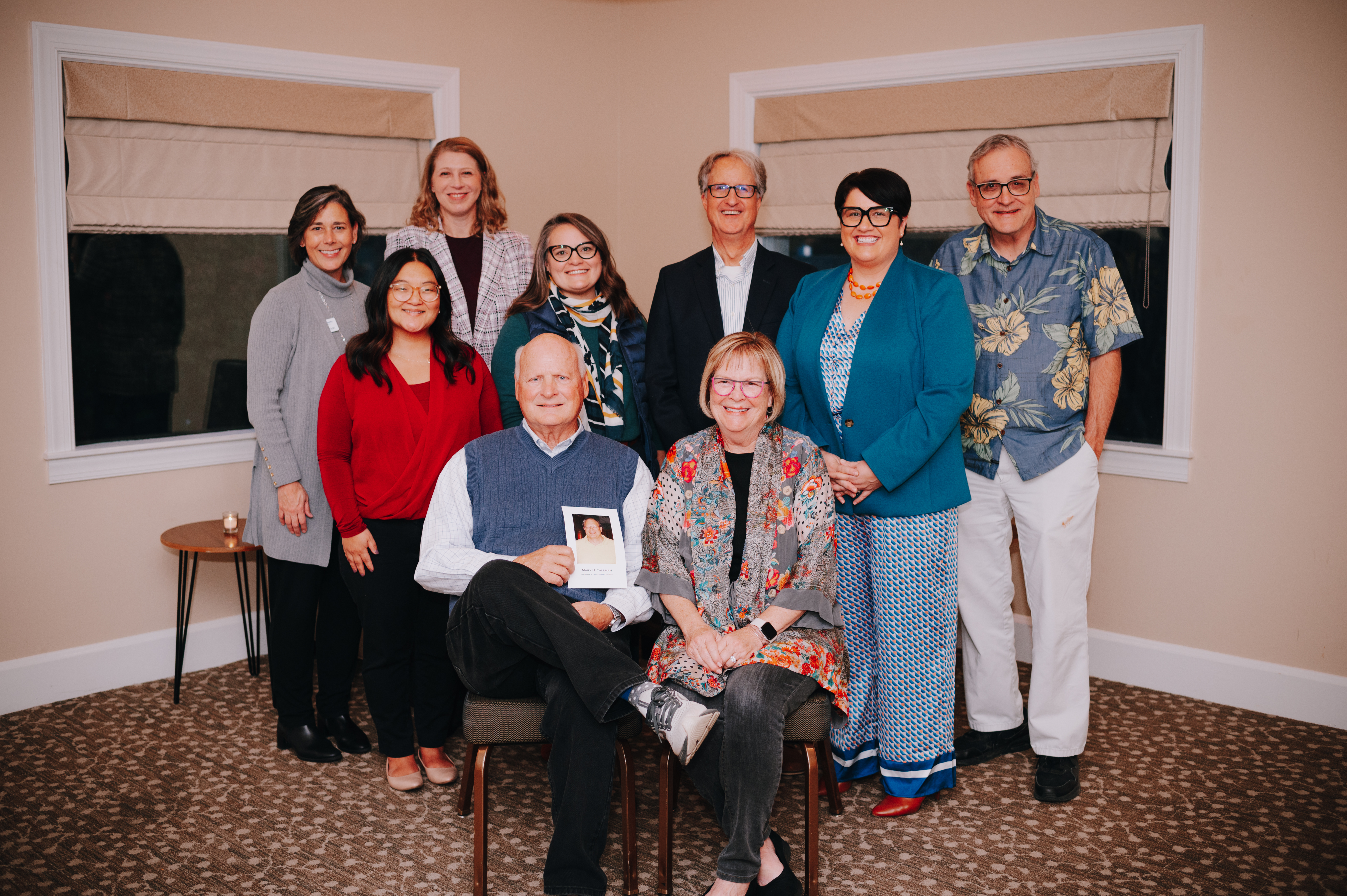
Back row, left to right: Tracy Edgerton, Lincoln Community Foundation; Alynn Sampson, Matt Talbot Kitchen & Outreach; Leah Droge, Friendship Home of Lincoln; Michaella Kumke, Food Bank of Lincoln; Pete Allman, Lighthouse; Macala Carter, Center for People; Pastor Tom Barber, People’s City Mission
Front row, left to right: Tom & Sue Tallman
(LINCOLN, NE – November 14, 2024) – Lincoln Community Foundation announced today that seven organizations have been named by the estate of Mark H. Tallman to each receive approximately $90,000 a year over the next 10 years. The nearly $7 million legacy gift will benefit Center for People, Food Bank of Lincoln, Friendship Home of Lincoln, Lighthouse, Matt Talbot Kitchen & Outreach, People’s City Mission and Lincoln Community Foundation in support of Give to Lincoln Day matching funds.
“This extraordinary gift is a representation of Mark’s quiet, yet visionary philanthropy,” said Lincoln Community Foundation President Tracy Edgerton. “Through his estate plan, he found a unique way to make a difference and support these essential organizations throughout the next decade.”
This fund will be held and invested at the Foundation for 10 years, providing the selected nonprofits with annual distributions starting in February 2025.
“Mark supported Lincoln in a variety of ways throughout his lifetime,” said Chip DeBuse, the Foundation’s vice president for development. “His legacy gift will establish a pipeline of critical support into our community through the work of these nonprofits.”
Mark Hall Tallman was born in Madison, WI, to Hazel Abel Tallman and Gene Hall Tallman. He spent most of his life in Lincoln, graduating from Lincoln Southeast High School in 1967 and Princeton University in 1971. Mark was the owner and president of DATA SOURCE MEDIA for 38 years. He died on January 23, 2024.
“Mark was always pro-Lincoln,” said Mark’s brother, Tom Tallman. “He wanted to leave his estate to charity to make it easier for these organizations to live out their mission and continue to do great work for the community.”
About Lincoln Community Foundation
Through partnerships and collaboration, Lincoln Community Foundation facilitates positive change for the common good. Since 1955, the Foundation has been privileged to be part of many wonderful legacies by connecting donor generosity to local needs. The Foundation has distributed more than $255 million in grants to nonprofit organizations that improve the lives of Lincoln’s residents. Lincoln Community Foundation is accredited by the National Standards for U.S. Community Foundations®.
The best job in the world
Published on Nov 15, 2024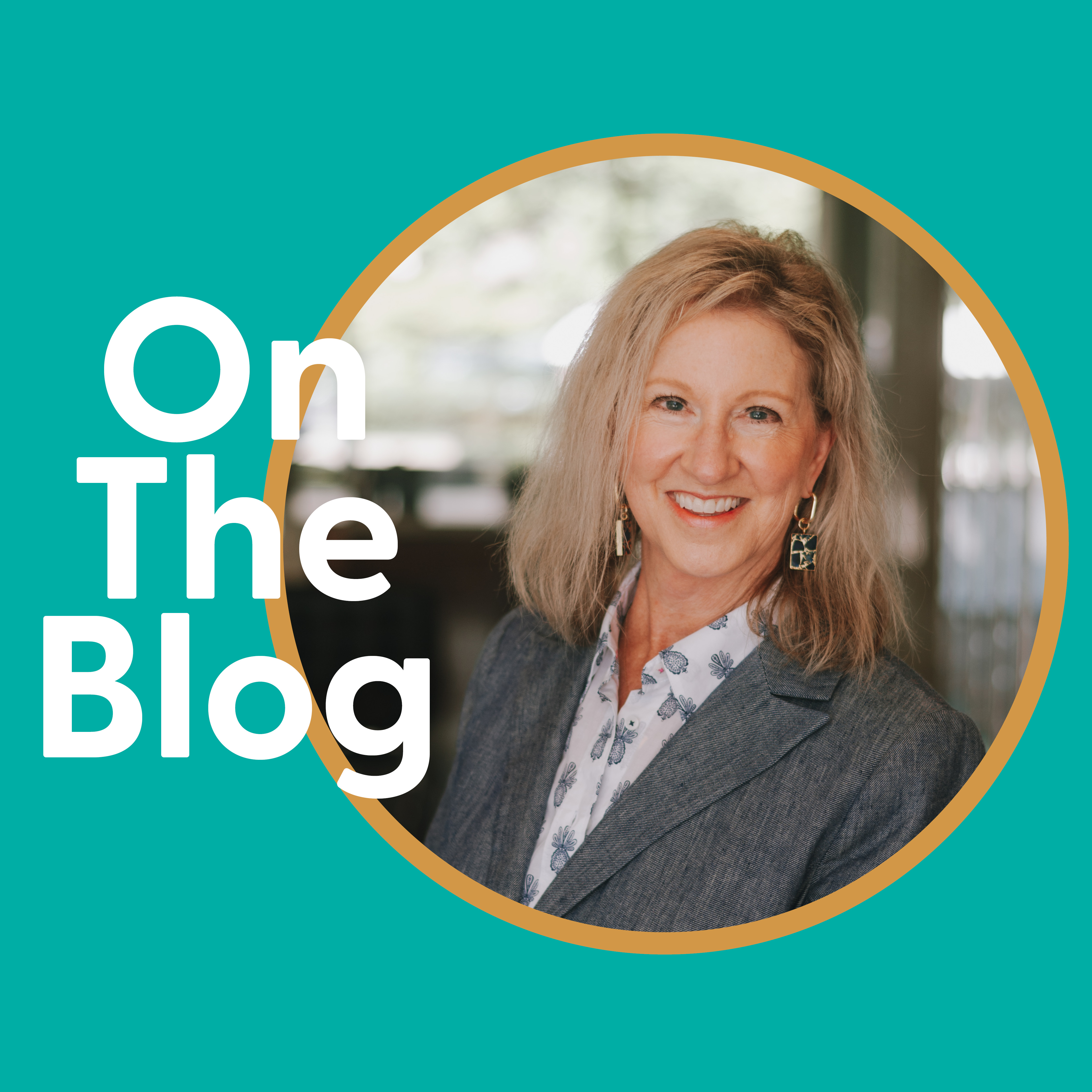
By Rhonda Page
I have the best job.
For the past 14 years at the Lincoln Community Foundation, I’ve been fortunate to hear the stories of our neighbors and how they are compelled to help those around them. These generous folks often employ their giving spirit through our local nonprofits that provide support and service for so many, and often these organizations partner with LCF throughout the year.
Why do I have the best job? Because I get to work with these individuals every day and help them make grants to amazing nonprofits, both local and nationwide. I experience their joy when they support the causes that are meaningful to them. Every gift makes a difference, and every donor has a story behind their generosity.
Many Lincolnites want to make the world a better place by creating a gift for the future. When a donor describes what they want to accomplish through their legacy gift, I witness the sense of peace and satisfaction they experience. What an extraordinary experience of purpose and joy, knowing they are lifting up folks they may not know. It makes me want to open a bottle of champagne and toast the moment!
Each decision to give is my reason to honor these donors and demonstrate our appreciation for their generosity. I see you, I am grateful for you, and I am available to answer questions and help you accomplish your charitable goals.
My role is Donor Relations, and that is why I have the best job. Thank you for all you do to support the organizations and causes that do so much in Lincoln and beyond. Please reach out soon – I can’t wait to connect!
Community conversations inform Lincoln’s latest data report
Published on Nov 26, 2024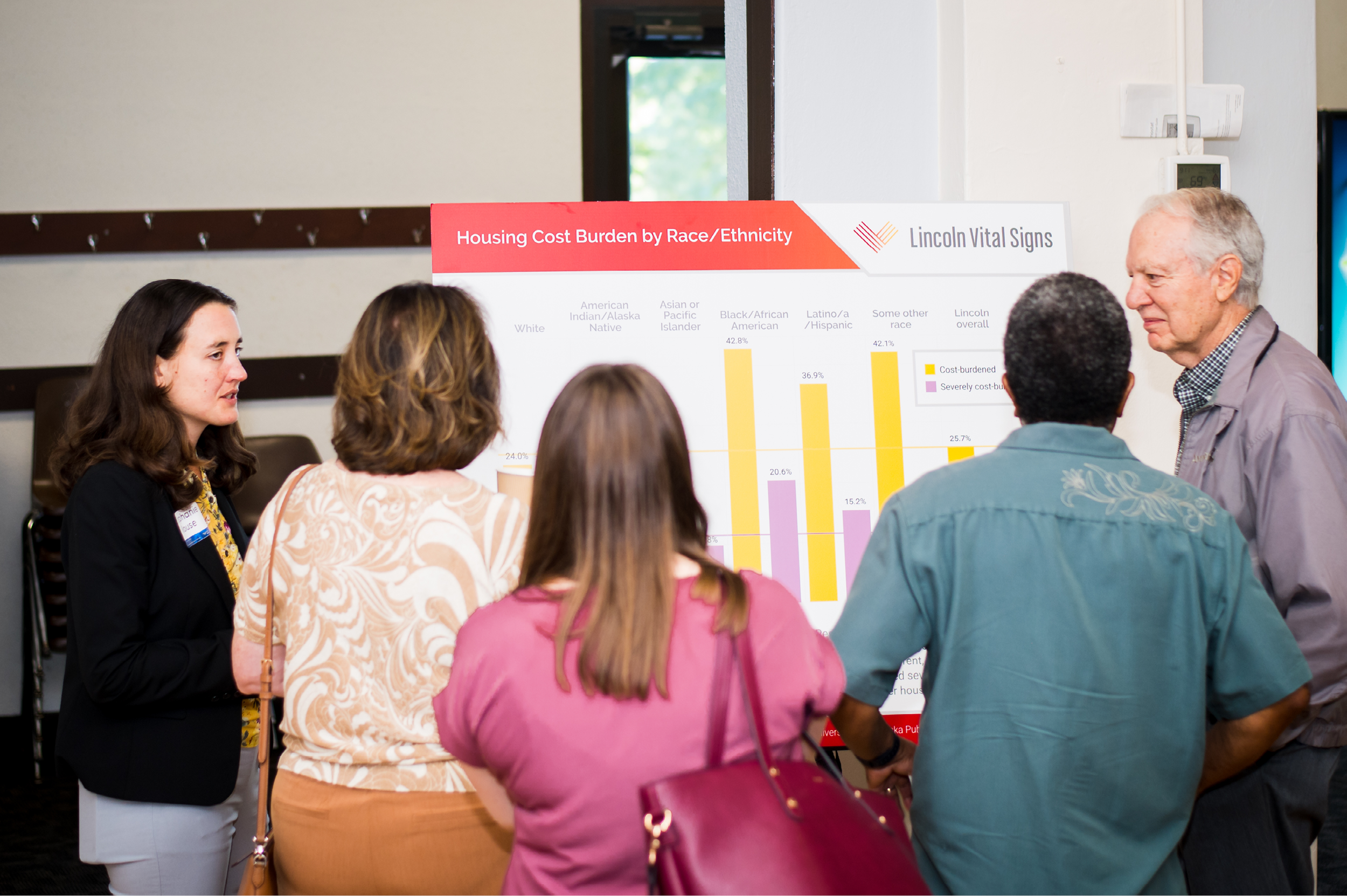
More than 120 community members attended a gathering at Auld Pavilion Recreation Center on October 3 to hear the latest findings from Lincoln Vital Signs and learn how our community is coming together to address persistent disparities.
Since 2014, Lincoln Vital Signs has been a community-wide data resource. The data is used by organizations and individuals to inform decisions, spark connections, and spur collaboration.
The focus issue continues the tradition of providing credible, reliable information about Lincoln while highlighting the diversity of our community and identifying opportunities to increase prosperity for all residents.
Dr. Janell Walther from the University of Nebraska Public Policy Center provided background information on how Lincoln identified the need for more focused and comprehensive data on race equity.
“One of the biggest questions folks kept coming back to was, ‘How can we explain what these disparities look like and the impact of those disparities?’” she shared.
With that, Lincoln Community Foundation and the University of Nebraska Public Policy Center sought to establish a process to not only gather and evaluate data based on racial and ethnic diversity, but to also do so with input from our community.
Dr. Walther explained that central to this process was hearing from our neighbors.
“We didn’t want to tell a story about our community without their voice at the table,” she said. “As a result, we planned four “Data Walks” where we invited community members to review eight preliminary data indicators.”
The events were hosted at Educare in the Belmont neighborhood, F Street Community Center in the South of Downtown neighborhood, Hartley Elementary School in the Hartley neighborhood, and Willard Community Center in the West A neighborhood. Interpreters, childcare, refreshments, and a stipend were provided to make these data walks accessible.
“People shared whether the data felt true to their experience, what they wished they knew, how the disparities might be addressed, and when the data felt surprising or not,” said Dr Walther. “This community input reshaped the report and the indicators.”
Lincoln Vital Signs: Race Equity Trends 2024 presents data in chapters covering: Community Profile, Financial Well-Being, Housing and Neighborhoods, Education, and Health. Dr. Stacey Hoffman, one of the authors of the report and senior research manager at the University of Nebraska Public Policy Center, presented key findings.
“Lincoln is growing more diverse,” she said. “As the size of our overall population grows, the proportion of residents who identify with racial or ethnic groups other than white or Caucasian is also increasing.”
Dr. Hoffman shared that Lincoln does well in a number of areas when considering racial equity. The majority of Lincoln’s population, across all racial and ethnic groups, have achieved some education after high school. People serving on City Boards and Commissions, who are appointed by the mayor, are representative of the racial and ethnic make-up of the city. Workforce participation and employment rates are higher for some racial and ethnic groups than the city-wide average.
However, the data shows that while diversity is increasing, persistent disparities exist. Black or African American residents, and Native American residents, experience lower employment rates than the Lincoln city-wide average. Median household incomes are lower for most non-white households with only white and Asian households having average incomes higher than the Lincoln city-wide average. Severe housing cost burden is disproportionately experienced by non-white households. Disparities in educational attainment exist and financial factors are related to children’s educational outcomes.
Selina Martinez, administrative director of student engagement and inclusion at Southeast Community College, followed Dr. Hoffman’s presentation and shared her perspective with the crowd.
“For individuals with lived experience like myself and others in the room, this data is not surprising,” she said.
Prior to her role at Southeast Community College, Selina served in a dual capacity at Community Health Endowment and the Lincoln Community Foundation. Much of her time was spent developing the Race Equity report by engaging with the Public Policy Center, the funders of the report and the Lincoln Vital Signs Advisory Committee.
“Part of our discussions included our intentional effort with how this data would be both displayed and communicated so we could highlight the benefits of our diverse communities and prevent further harm to communities experiencing these inequities,” she shared.
From surveys to meetings, the process spanned several months, ensuring the data was reported in a thoughtful and inclusive way.
To conclude the event, participants were encouraged to personally explore the data by visiting key findings presented on posters throughout the room. Representatives from the Public Policy Center, as well as community members whose work represents some of the many ways Lincoln is responding to persistent disparities, were available next to each data point to facilitate conversation.
“The Public Policy Center compiles this data for our community to be informed,” said Selina. “And through the robust networks of the folks gathered here today, the Lincoln Community Foundation invites you to take the next step and get involved.”
To explore the data and view the full Lincoln Vital Signs Race Equity 2024 report, visit LincolnVitalSigns.org.
Must-know tips for clients’ year-end giving
Published on Nov 20, 2024We know you’ve got a lot on your plate as the end of the year approaches. Even if charitable giving does not appear on the surface to be a burning issue in client meetings, it’s still crucial that you keep in mind a few essential charitable giving techniques because your clients do care. Please scan these three important techniques, and please reach out to the Lincoln Community Foundation on any matter related to charitable giving.
–Encourage clients to consider giving highly-appreciated stock, not cash, to their funds at LCF, thereby maximizing tax benefits.
–Help clients evaluate a “bundling” or “bunching” technique to make gifts to donor advised funds at LCF, exceeding the currently high standard deduction to be able to itemize. Then, donor advised fund assets can be used over the next few years to support clients’ favorite charities.
–Help clients who are 70 ½ and older make Qualified Charitable Distributions (“QCDs”) directly from IRAs to designated or field-of-interest funds (donor advised funds are ineligible recipients) at the Lincoln Community Foundation–up to $105,000 per person. Plus, QCDs satisfy RMDs!
Reach out to our Philanthropy Services team today! November is the time to set things in motion so you don’t get caught up in the year-end rush. We are here for you.
Charitable planning can help ease client procrastination
Published on Nov 20, 2024
“Nothing is so fatiguing as the eternal hanging on of an uncompleted task.”
–William James
Procrastination is a drain in ways that go far deeper than the incomplete task itself. We know this intellectually, but it can be so hard to break the procrastination habit. It seems that the more daunting the task, the harder it is to tackle. This surely is a major reason some of your clients routinely put off important planning discussions. And of course, many of those discussions are tax-sensitive, which means year-end can get very hectic and stressful for clients who wait until the last minute.
As the year begins to wind down, consider tapping into your clients’ philanthropic interests as a catalyst to motivate them to start addressing year-end planning items right now rather than waiting until December. You may discover that the uplifting topic of philanthropy makes it easier to at least start a conversation. Then, the conversation can evolve to include not only charitable giving topics, but also other tax planning topics that need attention.
Here’s how this could work with a client:
–Review the charitable components of the client’s estate and financial plans, including provisions in wills and trusts, beneficiary designations, donor advised funds, prior years’ tax deductions, and historical gifts to favorite charities.
–Reach out to the client to suggest that you meet–or at least jump on a call–to check in on 2024 charitable giving plans and other items.
–Open the conversation by briefly recapping the charitable planning components already in place and the client’s history of giving. Then ask the client about their plans for 2024.
–As you talk with the client about charitable intentions, bring up various charitable giving tools and opportunities that match those intentions. In each case, use the charitable discussion as a springboard for general tax planning items that need to be addressed before year-end.
–For example, if a client who is over 70 ½ mentions wanting to support a particular need or organization in the community, you can suggest that you loop in the Foundation’s Philanthropy Services team to potentially establish a field-of-interest or designated fund, which can then receive distributions from the client’s IRA up to $105,000 annually per person. This, in turn, opens the door to discuss Required Minimum Distributions and other elements of retirement planning in general.
–If the client mentions that they are already dreading gathering tax receipts for 2024 charitable donations, suggest that the client consider setting up a donor advised fund at LCF to serve as a convenient and rewarding “hub” for charitable giving. Going forward, the client can conduct the bulk of their giving using the donor advised fund and avoid the mad scramble for receipts. If the client already has a donor advised fund, make sure they know how to use it most effectively, and reach out to the Foundation for help. What’s more, discussing charitable donation receipts presents a nice opening to remind a client about other paperwork that may need to be gathered or completed to meet overall estate and financial planning goals.
–When your client talks about charities they plan to support before year-end, remind your client not to automatically reach for the checkbook. Most of the time, highly-appreciated marketable securities (or other highly-appreciated, long-term assets) are ideal gifts to a client’s fund at LCF or other public charity because the client is eligible for a tax deduction at the assets’ fair market value, and the proceeds from the sale of the assets will be free from capital gains tax. That means more funds are available to support the client’s favorite causes. Conveniently, the conversation about highly-appreciated stock can segue naturally into a conversation about overall stock positions.
–Philanthropy topics can naturally lead into even more topics that are sensitive to year-end timing, such as annual exclusion gifts, estimated tax planning, and updating wills and trusts before the extended family gathers for the holiday or travels together overseas.
The Lincoln Community Foundation is here to help you serve your charitable clients every step of the way, every month of the year. We understand that late-December transactions are often unavoidable. The net-net is that we’re happy to work with you according to your clients’ schedules, whether that means getting a jump on a new year and processing stock gifts in February, helping you plan in September for year-end, or preparing fund agreements in December. It’s our pleasure to assist!
Your Guide to Year-End Giving
Published on Nov 20, 2024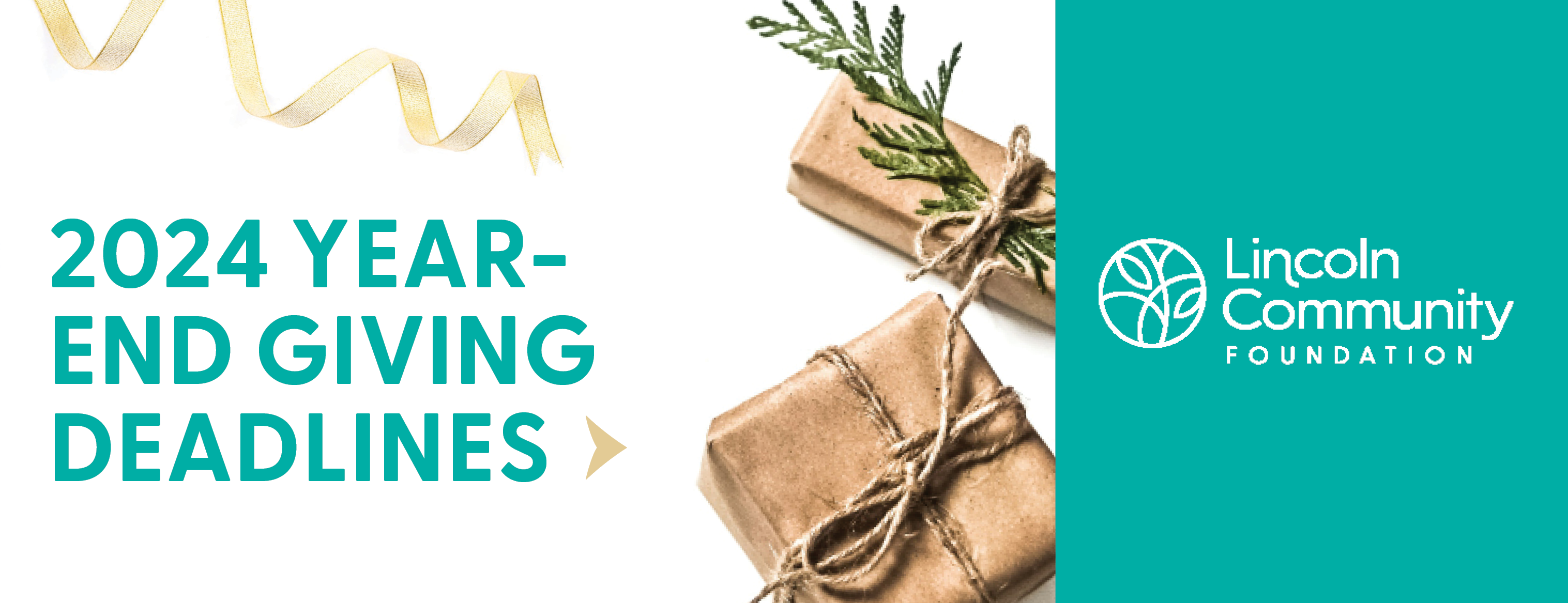
2025 is just around the corner but there’s still time to make a difference this year! To assist your year-end giving, here are a few helpful reminders:
1. If you have an LCF donor advised fund:
- • Any credit card contributions you make to your fund through your donor portal between now and December 31 at 11:59 PM central time will be credited to 2024.
- • Online bank account contributions must be received into LCF bank accounts by December 31. Online bank account contributions take several days to process. We encourage you to submit bank account gifts by December 20 to allow for processing.
- • New grant requests must be submitted through the portal or via email by noon on December 30. We recommend submitting your grant recommendations as soon as possible so they can be processed by the end of the year. Please note that the timing of grants does not impact your eligibility for a charitable income tax deduction, and we will do our best to fulfill all grant recommendations prior to year-end.
For support in donating to your fund or requesting a grant, please contact Rhonda Page at 402-474-2345 or rhondap@lcf.org.
2. Online gifts, such as credit card gifts and bank account gifts, may be made now through 11:59 PM central time on New Year’s Eve to be credited as a 2024 contribution. Click here to make your year-end gifts to any LCF fund. We encourage you to submit bank account gifts by December 20 to allow for processing.
3. Notify us now of any gifts you may send via stock or IRA distributions as these require extra time and coordination. Stock gifts must be received in one of our brokerage accounts by the close of the markets on December 31. Contact Chip DeBuse with questions at 402-474-2345 or chipd@lcf.org. We recommend initiating your stock gift at least 10 business days before year-end. Please discuss complex assets with Chip by December 11 to allow adequate time to review for approval and transfer by year-end.
4. Gifts mailed through USPS must have a visible postmark of no later than Tuesday, December 31 to receive credit in 2024. Please make all gifts payable to “Lincoln Community Foundation,” with the fund name noted on the memo line. Gifts arriving via UPS or FedEx must be received at the Foundation by 5:00 PM on December 31 to be credited in 2024.
Lincoln Community Foundation
215 Centennial Mall South
Suite 100
Lincoln, NE 68508
402-474-2345
5. Need help deciding where you want your year-end gifts to go? Consider a gift to Lincoln’s future. LCF’s Lincoln Forever Fund supports the ever-changing needs and opportunities in our community. You can also open a donor advised fund before December 31 to make your 2024 year-end gift now and decide later how you want the funds to be distributed.
6. Our office will be open December 30-31 from 8:00 AM – 5:00 PM. LCF is proud to be your philanthropic partner in 2024 and beyond. Please let us know how we can assist you.
Thank you again for your support throughout this past year. Together, we are building a better tomorrow. Cheers to a prosperous 2025!
New online platform offers innovative way to get involved
Published on Nov 26, 2024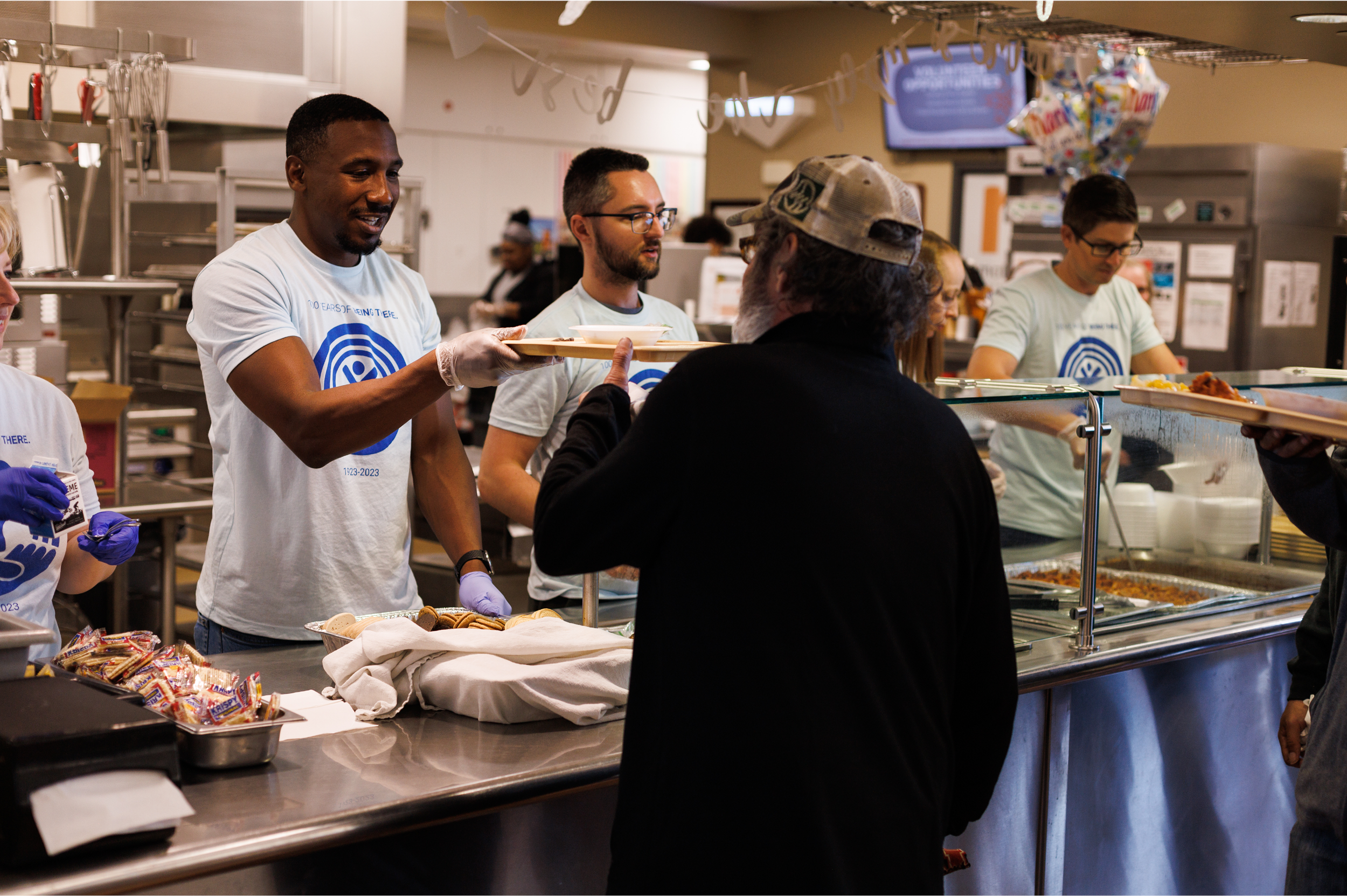
As we enjoy the season of giving thanks and giving back, the old adage of giving your “time, talent, and treasure” still rings true.
One resource we all have available to give is time, however, it can be hard for individuals to know where to start and how to connect with the causes and organizations they care about – a challenge that the United Way of Lincoln and Lancaster County set their sights to solve through their new online platform, VolunteerLNK.org.
The user-friendly platform which debuted in April 2024, simplifies the process of finding meaningful volunteer possibilities and is tailored to each user’s unique interests, skills and availability.
“Our hope is to empower individuals to take an active role in building a stronger, more vibrant community,” said Meagan Liesveld, executive director for United Way of Lincoln and Lancaster County. “We want the community to know that the time is right to step back in if they haven’t already.”
Within the first several months of the platform, there were more than 750 volunteers registered to fill the nearly 90 agencies’ posted positions. Volunteer opportunities can be filled by individuals, families, church groups, companies, retirees. The site also offers options for high school and college students to get involved.
Andrew Brown, assistant director of community engagement at the University of Nebraska-Lincoln, shared how students can easily find upcoming volunteer opportunities and document their impact through the new platform.
“VolunteerLNK has enabled students to come together with nonprofits in the Lincoln area to leverage their collective capacity and make change in our community,” said Andrew.
Additionally, UNL has utilized VolunteerLNK.org to support their Engage Lincoln program which connects more than 100 students to five different nonprofits each month. The Student Leadership, Involvement, and Community Engagement team sources data from Lincoln Vital Signs to identify community needs, then uses information hosted on VolunteerLNK.org to locate nonprofit partners and connect students to their volunteer opportunities.
The centralized platform also benefits the organizations with their search for volunteers. Some opportunities are for a specific day and time, while others are ongoing, such as being a tutor for Lincoln Literacy or a CASA volunteer advocate. The goal is to help volunteers and organizations find each other through commonalities.
“VolunteerLNK.org is making it faster and easier than ever to connect donors to the needs and opportunities in our community,” said Michelle Paulk, LCF’s vice president of grantmaking and community outreach. “LCF is proud to support this important platform through our Open Door Grant program and we hope it inspires folks to take the next steps to get involved.”
Are you looking for ways to give back and create positive change in our community? Visit VolunteerLNK.org and learn more.
Fostering trust and making a difference
Published on Dec 6, 2024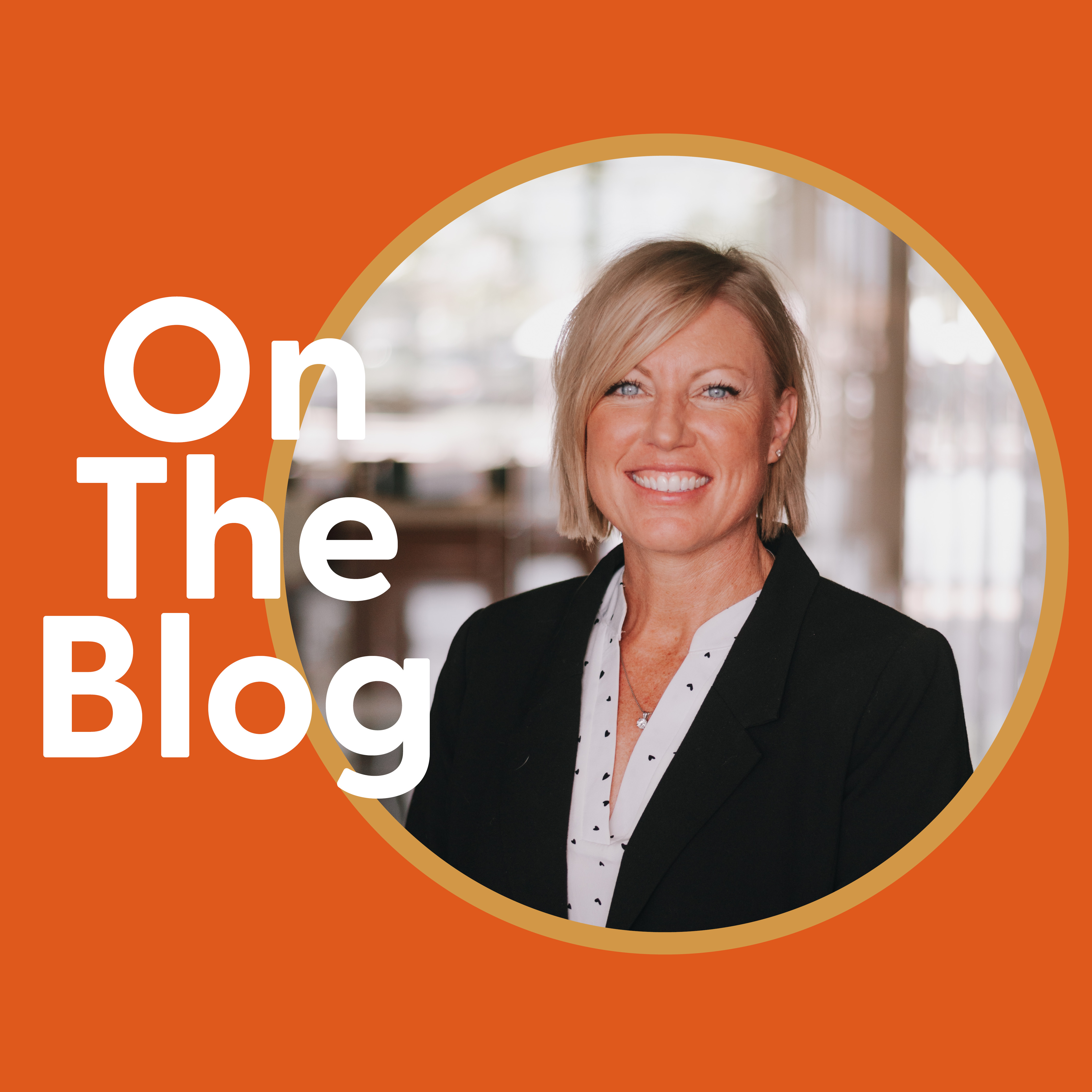
By Sandi Hansen
Many people are not aware of the extent to which America’s charitable organizations help improve quality of life in our communities. From social services to the arts, virtually every aspect of our lives is touched by the work of nonprofits. Indeed, the gifts Americans give to charity every year total more than $557 billion and provide critical support for nearly 1.5 million organizations that are helping communities thrive.
Research shows that trust continues to be an important factor in charitable giving. Unfortunately, high levels of trust can sometimes be hard to achieve.
So, what should you do if you know you want to support a particular organization, but you’ve not quite yet gained a level of trust to go “all in?” Or what if you want to support an overall area of community need but you’re not sure which organizations are best aligned with the results you want your charitable gifts to achieve? Or what if you’re fairly certain you know the specific organizations that are addressing your areas of interest right now, but you’re concerned that this “fit” might change over time as needs shift and charities evolve?
At the Lincoln Community Foundation, we can help in situations like these and many others like them.
Here are three examples:
–If you’ve established a donor-advised fund at LCF to organize your giving, lean on our team for insights into which organizations are best suited to achieve your charitable goals at any given time. We stay up to date on local nonprofits, their priorities, and their programs and staff. We can provide information and insights to help you make informed decisions.
–If you’re committed to supporting a specific organization but you’d rather not give the money outright, you could consider setting up a designated fund at LCF to make distributions to the charity according to parameters you set. This is a wonderful way to provide permanent support for the organizations you care most about, helping them achieve long-term sustainability and allowing your legacy to be connected to them forever. Grants are made annually to the recipient organizations from the “spendable” portion of designated funds.
–If you’d like the team at LCF to help out even more, you might consider establishing a field-of-interest fund so that the Foundation can deploy its expertise in selecting charities that are best suited from year to year to achieve your goals for community impact.
–To ensure that the mission of the Lincoln Community Foundation itself stays strong and that dollars will flow to support critical community needs for generations, you can establish an unrestricted fund at the Foundation. You can add to the unrestricted fund during your lifetime, such as through gifts of appreciated stock, and you can also include a gift to the fund in your estate plan through your will or an IRA beneficiary designation.
LCF is unique in its structure as a perpetual institution governed by an independent board of directors. Our mission is to improve the quality of life in Lincoln across generations by connecting donors to the causes they care about and leading on critical community issues. We’re honored to work alongside you and your family as you build trust with the charitable organizations that are making a difference for everyone who lives and works in the community we love.
For more information, reach out to us at 402-474-2345 or lcf@lcf.org.
Never too small to start
Published on Dec 13, 2024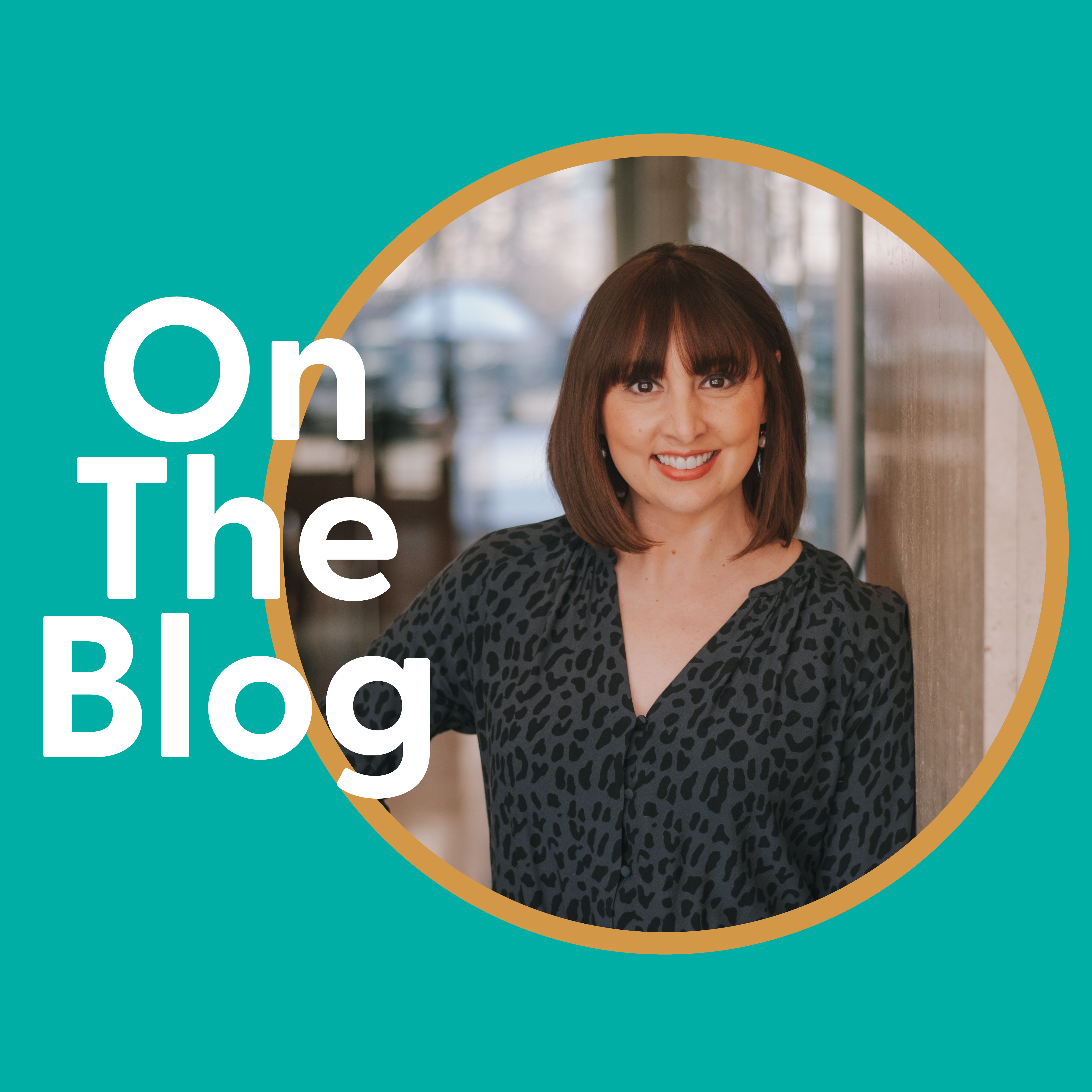
By Jenny Chapin
Last month my colleagues and I ventured up to Omaha for the annual National Philanthropy Day luncheon hosted by the Association of Fundraising Professionals-Nebraska Chapter. The celebration is always inspiring – with many folks from our region receiving well-deserved recognition for their generosity.
We had nominated our Give to Lincoln Day Presenting Sponsor, West Gate Bank, for Outstanding Local Business and were excited to applaud their incredible support for the communities they serve. Before that, the first award of the afternoon was for Outstanding Youth in Philanthropy, and the recipient was a 12-year-old from Lincoln, Flynn, who decided you’re never too small to make a difference.
Flynn took the stage to accept his award, and the audience was blown away. Here he was – so confident, so inspiring and still middle school. Flynn’s philanthropic journey started after a frightening incident at school. There were rumors that a gun was brought into the building, and everyone had to be evacuated. As he saw his classmates lined up outside – nervous and afraid – he had a thought. If one person could cause so much damage and chaos through a negative action, then one person could create a positive transformation in their community as well.
He set out to do just that and started a fundraiser for the Malone Center’s Capital Campaign with a goal of raising $100,000 by the end of the year. He designed merchandise, built out a website and was on his way. At the time of the event, he had already raised more than $70,000.
Flynn shared an African proverb that inspires his efforts with the crowd:
“If you think you are too small to make a difference, you haven’t spent a night with a mosquito.”
As we drove back to Lincoln that day, I couldn’t stop thinking about Flynn’s story. My mind turned to my almost eight- and five-year-old nieces. With the holidays quickly approaching, I decided it was the perfect time to make sure they knew they were never too small to make a difference and get them excited about giving back.
At Thanksgiving, I sat them down in their breakfast nook and said, “Okay guys, we’re having a business meeting.”
Their faces lit up with joy, excitement and frankly – confusion.
“A business meeting?!”
I explained that I had a special bank account (my donor advised fund at LCF) and the only thing the money can go toward is helping people. I was going to give each of them $100 for Christmas and they got to decide where they wanted the support to go to. Of course, I was there to give them some ideas/parameters. Their first request was to help Trevor – the dog who lives across the street. I explained that unfortunately, Trevor is not a registered 501(c)(3).
Back to the drawing board.
My youngest niece, Juliet, ended up selecting the Lincoln Children’s Zoo to support their new baby giraffe. My oldest niece, Rosie, wanted to help “the puppies” so we went with Capital Humane Society. I told them that I’d make their grants on Giving Tuesday so their money would be put to work in time for Christmas.
The next day, Rosie wanted to watch something Christmas-y with me. I don’t know if you’re familiar with the cinematic work of Elf Pets: Santa's St. Bernards Save Christmas currently on Netflix but that was her selection. Fair warning, spoilers ahead.
The IMDB synopsis reads: Scout Elves, a slew of St. Bernard pups and a big-hearted family change their community for the better and ensure Santa's yuletide mission to bring more Christmas spirit succeeds.
In the film (okay it’s a 26-minute animated short), a family struggles to get community donations for Bob’s Helping Hands, the food and clothing pantry they run. There’s simply no Christmas spirit. Everyone is out shopping to get deals and gifts for themselves. The kids decide to take matters into their own hands. They pool their money from babysitting, birthdays and mowing lawns and head to the store for supplies. Unfortunately, a sale has lapsed so their math was wrong, and they don’t have enough money to cover their purchases.
As a line of impatient customers grows behind them, they finally share their reason for buying the groceries with the cashier. She ends up purchasing a gift card herself to help them cover the rest of the bill – explaining that she had once turned to Bob’s Helping Hands when she was experiencing hard times.
At this point – I’m crying.
The scene shifts back to Bob’s – folks are waiting in line for support, but the pantry is bare. Until the kids bring their supplies. Then suddenly, there’s more people at the door with donations. It’s everyone from the store who heard what the kids’ plan and got inspired to help. I’m still crying.
Rosie looked up at me and tugged on my sleeve.
“It’s like what we’re doing!”
It is, kid.
As we approach the holidays, I plan to give the girls stuffed animals – a giraffe and a puppy – as a representation of their first charitable endeavors. Down the road, I hope they’ll enjoy the intangible gift of giving back just as much as the presents under the tree. And eventfully, we’ll bring their baby brother, Burke, into our business meetings. At the moment, his two-and-a-half-year-old schedule is pretty much booked with carrying around a plastic stick and hitting things with it.
I have to thank Flynn for his inspiration on that chilly November day. I sure hope he hits his goal. Perhaps I need to make one more grant – for Burke, for Flynn, for everyone who needs a reminder that you’re never too small to start something big.
California Wildfires | Ways to Help
Published on Jan 15, 2025As California’s wildfire season grows increasingly more severe, with the state suffering through some of the largest, deadliest, and most destructive fires in the past 5 years, many are looking for ways to offer help and hope to the nearly 200,000 people in and around Los Angeles facing evacuation and loss.
We wanted to share a few of the many funds set up to support communities through this critical period with both intermediate assistance and long-term recovery.
- The American Red Cross
Supporting the opening of shelters and evacuation centers and provision of food and comfort for those fleeing the fires. Along with food and shelter, the Red Cross is supporting those affected with relief supplies, health services such as replacing lost medications and eyeglasses, emotional support and spiritual care. - California Community Foundation’s Wildfire Recovery Fund
Providing long-term recovery relief to the most underserved communities in the region that need it most, including the Native American, Muslim, migrant and non-native English-speaking communities – as well as children, the elderly, and individuals with disabilities. - Center for Disaster Philanthropy
Focusing on smaller communities decimated by fires that might not rise to the level of federal or state disaster designation. - Kern Community Foundation’s Borel Fire Relief Fund
Established to address the Kern River Valley's recovery needs in the aftermath of the Borel Fire. - Pasadena Community Foundation’s Eaton Canyon Fire Relief and Recovery Fund
Helping bridge financial gaps by collaborating with local foundations and nonprofit organizations that are already providing emergency aid to wildfire survivors and first responders.
If you would like to utilize your donor advised fund at the Lincoln Community Foundation to recommend a grant to any of the organizations above, or other qualified nonprofits helping with this emergency, login to your donor portal. If you have any questions, please contact Rhonda Page, rhondap@lcf.org, or 402-474-2345.
Lincoln Community Foundation awards more than $1.3 Million to support nonprofits & students
Published on Jan 23, 2025In 2024, Lincoln Community Foundation (LCF) distributed a total of $1,319,000 in Open Door Grants to local nonprofit organizations and scholarships for students.
Open Door Grants support efforts by nonprofits in Lincoln and Lancaster County to meet existing needs or address challenges and opportunities facing our community. These grants are made possible by contributions from the Lincoln Forever Fund and LCF donor endowment funds. In 2024, LCF granted $749,000 to 100 local nonprofits. The full list of grants awarded may be viewed at https://www.lcf.org/impacting-community/grants-awarded.
Generous donors to Lincoln Community Foundation have established 89 scholarship funds that benefit students in Lancaster County and across the state of Nebraska. For 2024, there were 292 scholarship recipients who received awards that totaled $570,000.
Lincoln Community Foundation, established in 1955, provides leadership and tools that connect donor generosity to local needs and passions. The Foundation has distributed more than $255 million in grants to nonprofit organizations that have improved the lives of thousands of residents. To learn more, visit www.lcf.org.
Embracing intention in 2025
Published on Jan 24, 2025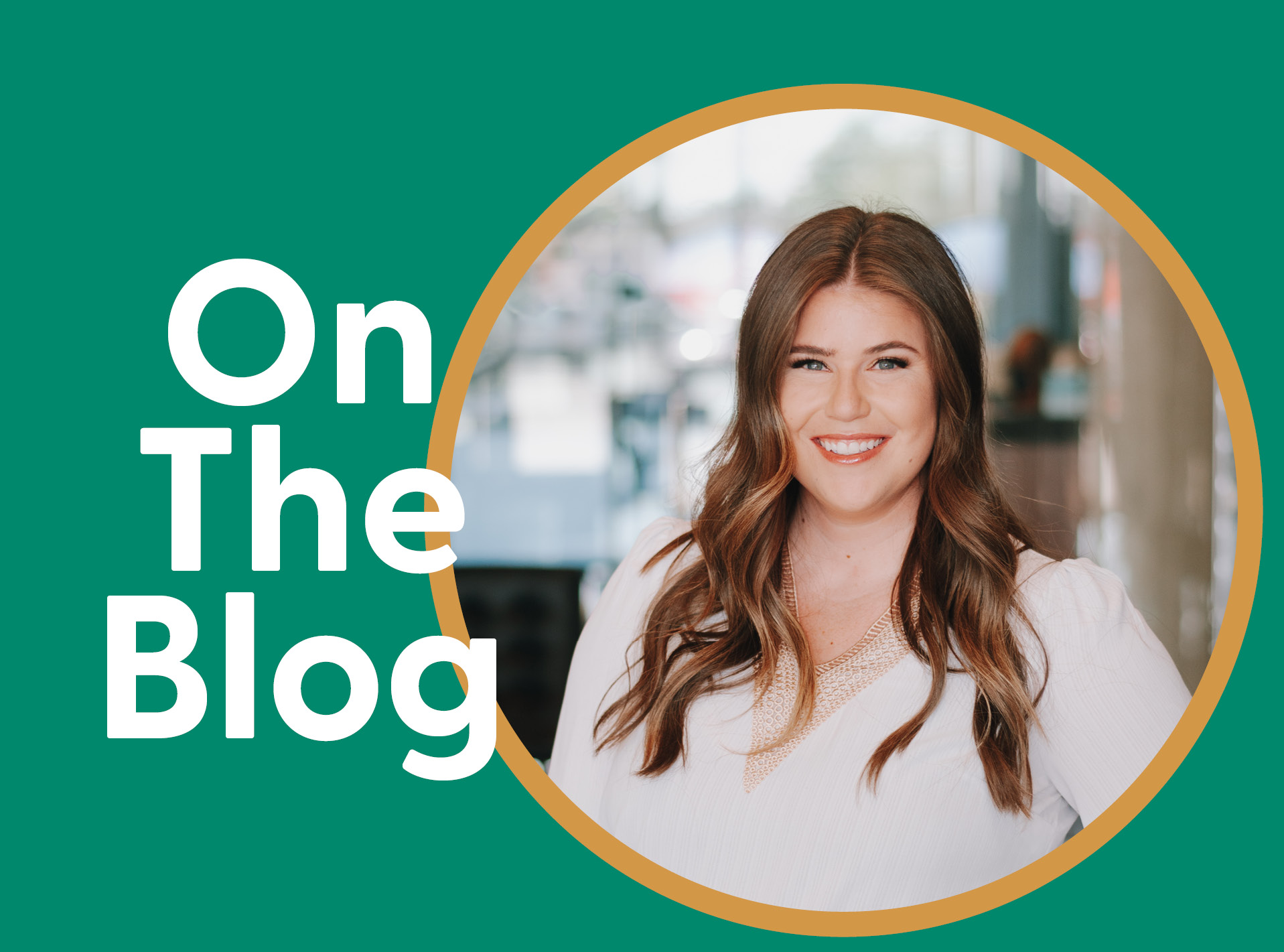
By Justy Gortemaker
Have you ever felt like the chaos of December leaves you too drained to embrace the fresh start January promises? I’ll be the first to admit that by the time January hits, I’m not exactly ready to jump into action.
A dear friend told me recently, “January is for rest. February is when everything really starts.” And I leaned into that advice…hard. I spent most of January giving myself permission to rest, recuperate and reflect. The result ended up significantly shaping my favorite new year tradition – selecting my word of the year.
If you aren’t familiar with this practice, it is a word that’s chosen to represent and positively anchor your intentions for the year ahead. There is no right or wrong way to arrive at your word of the year, but I like to focus my word on action. I ask myself questions like ‘how will I achieve my goals?’ or ‘how will I feel my best at the end of each day?’ It didn’t take long before I landed on Patience.
As Events & Communications Manager, patience plays a huge role in everything that I do. If you’ve ever planned an event, you may recall experiencing an unexpected challenge or two. If you didn’t, I would recommend you buy a lottery ticket!
Maybe a keynote’s flight is delayed or a PowerPoint’s formatting didn’t transfer correctly. Patience will help me to remain calm under pressure and make rational decisions. I know enough to know that I do not know it all. Patience will help me continue to foster trust with stakeholders, ensuring success from start to finish.
I shared this tradition with my fellow Belonging Team members, a group focused on fostering a culture of intention for LCF and was fully supported to encourage staff-wide participation in this activity.
As my coworkers submitted their words, I got more excited for the year ahead. We distributed a card with each person’s word, a dictionary definition as a baseline reminder and an affirmation to help maintain alignment and keep our intentions top of mind.
The benefits of intentionality in the workplace are plentiful; increased focus and productivity, improved communication, stronger relationships, enhanced job satisfaction to name a few.
When I joined LCF in August, one of the many things that stood out to me within the organization was the transparency around mission, vision and values. This told me that LCF’s important work for our community was being done with intention. The past five months have proven that to be true.
We plan site visits. Our staff has spent time touring local nonprofits that recently received an Open Door Grant and other support from LCF to see first-hand the work they are doing within our community.
We meet you where you are. We visited retirement and assisted-living residences to connect with donors who are no longer able to easily attend our events but care deeply for the well-being of our community.
We welcome you in our space. We spent Wednesdays in the summer watching Lincolnites fill the LCF Barbara Bartle Garden for the Summer Performance Series while tapping along to the music from our offices or amongst the audience. Our garden is also open during the warmer months if you need a peaceful place to enjoy a break. I highly recommend this hidden oasis and lunch from our neighbor, Sweet Things by Marcy!
We know that time spent together is time well spent. We start each week with a staff meeting – checking in, encouraging open dialogue about goals, celebrating purposeful contributions and creating space for intentional collaboration.
I am looking forward to adding to this list as I round out my first year on the LCF team – embracing what makes me feel connected and fulfilled. It is with great joy that I share the 2025 LCF staff’s ‘Word of the Year’ submissions. Perhaps they might inspire you to find your own word of the year!
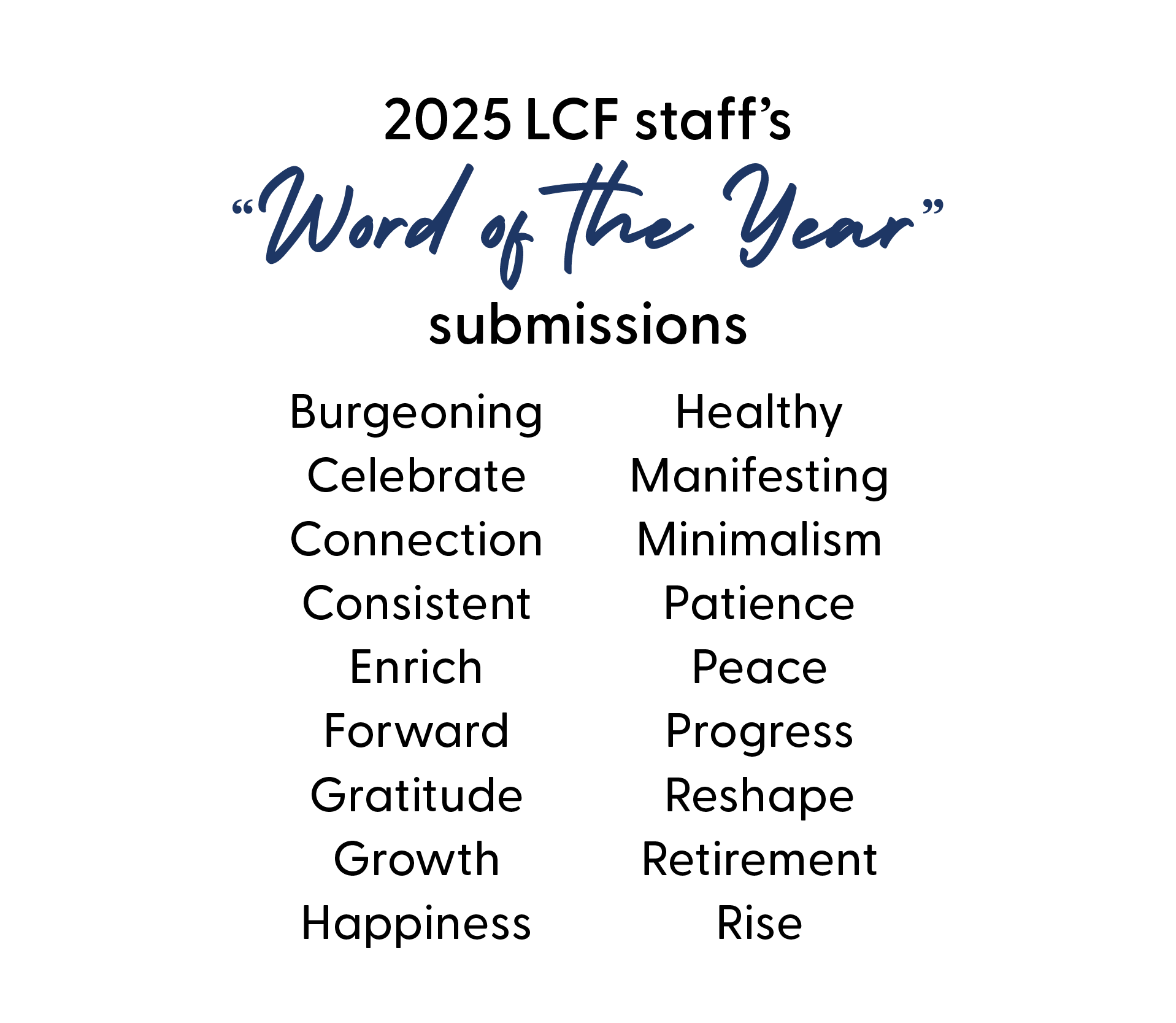
LCF recognized for national philanthropic standards
Published on Jan 28, 2025
Lincoln Community Foundation recently received re-accreditation with the nation’s highest standard for philanthropic excellence. National Standards for U.S. Community Foundations® establish legal, ethical, effective practices for community foundations everywhere.
The National Standards for U.S. Community Foundations® program requires community foundations to document their policies for donor services, investments, grantmaking and administration. With more than 500 community foundations already accredited nationwide, the program is designed to provide quality assurance to donors, as well as to their legal and financial advisors.
“Every day the LCF team leans in on our core value of integrity,” said Tracy Edgerton, president of Lincoln Community Foundation. “By striving to do our work with integrity at the forefront, we build trust within the community. This accreditation reflects our promise to Lincoln that we will act with uncompromising honesty in everything we do.”
The National Standards for U.S. Community Foundations® program was established in 2000 in cooperation with the Council on Foundations. For more information about National Standards, visit www.cfstandards.org.
Lincoln Community Foundation Welcomes New Board Members
Published on Feb 13, 2025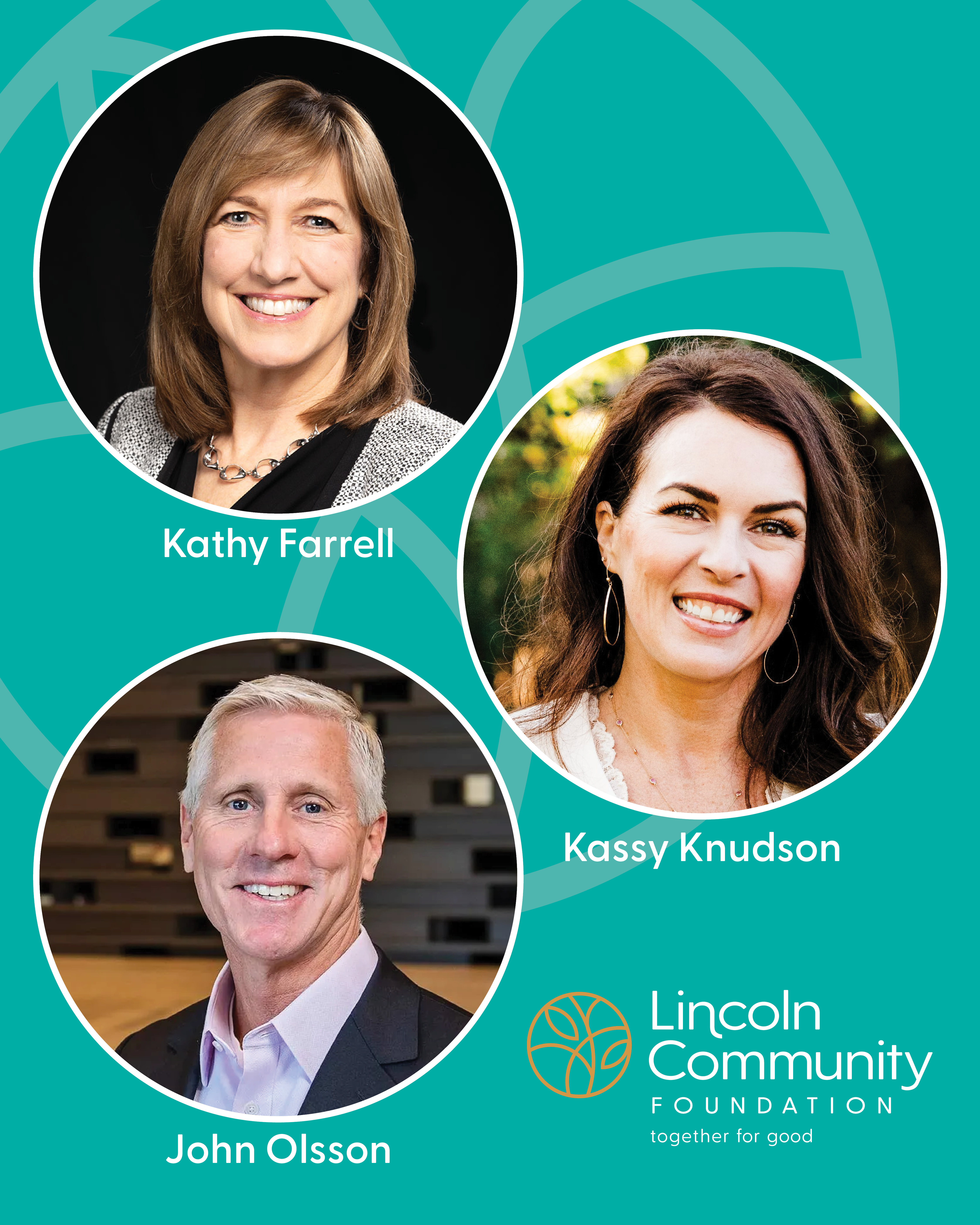
The Lincoln Community Foundation welcomes three new members to its board of directors: Dr. Kathy Farrell, University of Nebraska-Lincoln, College of Business; Kassy Knudson, Lincoln Industries; and John Olsson, Olsson.
Officers for 2025 include Mark Hesser, board chair, Pinnacle Bancorp, Inc.; Lauren Pugliese, vice chair, McCarthy Capital; Jasmine Kingsley, secretary, Hudl; Susie Keisler-Munro, treasurer, Assurity, and Marilyn Moore, past chair, retired Bryan College of Health Sciences and Lincoln Public Schools.
Lincoln Community Foundation, established in 1955, provides leadership and tools that connect donor generosity to local needs and passions. The Foundation has distributed more than $255 million in grants to nonprofit organizations that have improved the lives of thousands of residents.
For clients who love local causes, Lincoln Community Foundation is the place
Published on Feb 26, 2025
by Susan Crotteau, Director of Planned Giving
Most of your philanthropic clients likely support a wide variety of charities year after year. The causes they support represent a range of motivations, including personal experience, a role as a volunteer or board member, family tradition, or alignment with values and community priorities.
Many of the charitable organizations your clients support are local. That’s important to note because it means that your clients are especially well-positioned to lean into the Lincoln Community Foundation’s unique position as the hub for charitable giving and local knowledge. Here are three reasons that matters:
–Clients can tap into our team’s knowledge about specific organizations, including financial information, data about the impact of a charity’s programs, and observations of an organization’s areas of greatest need.
–Clients can choose from a variety of fund types depending on what they’d like to achieve. A designated fund, for example, allows your client to set aside tax-deductible dollars that are dedicated to supporting a specific organization. Through LCF, funds are distributed over time to the charity while the assets remaining in the fund are protected from the charity’s creditors. Another example is an unrestricted fund, which leverages the Foundation’s extensive research about the needs of the community (think Lincoln Vital Signs and Prosper Lincoln initiatives) and the nonprofit programs that are addressing those needs.
–Clients can work with the Philanthropy Services team to leave a bequest to an endowment fund to support community needs for generations to come. As a perpetual organization (celebrating 70 years in 2025!), the Lincoln Community Foundation ensures that charitable giving stays strong in our region to address important needs as they evolve over time.
Of course, if your client establishes a donor advised fund at LCF, the fund can support local causes as well as causes across the country. As the hub for your clients’ charitable giving, our tools and our team are dedicated to helping your clients achieve their charitable goals both near and far. Working with LCF, no matter what a particular client’s charitable priorities may be, is itself a strong show of support for philanthropy right here in our community.
Sifting through it: What’s on the legislative menu that could impact charitable giving?
Published on Feb 26, 2025
by Chip DeBuse, Vice President for Development – Legacy Giving
We all know that the new year and a new administration brings lots of potential change. So, what is going on that you need to know about to serve your charitable clients?
At the top of the list of issues we’re watching is what might happen with the Tax Cuts and Jobs Act (TCJA) of 2017. As a quick refresher, the TCJA introduced several changes that significantly impacted charitable giving in the United States. These changes are set to expire at the end of 2025, and their potential extension factors into charitable planning techniques.
You’ll no doubt recall that the TCJA lowered individual income tax rates across the board, which in turn decreased the tax savings for each dollar donated, making charitable contributions slightly less attractive from a tax perspective. What’s more, TCJA provisions nearly doubled the standard deduction. (In 2025, the standard deduction is $15,000 for single filers and $30,000 for a married couple filing jointly.) This increase led to a dramatic reduction in the number of taxpayers who itemized their deductions. As a result, fewer taxpayers could claim charitable deductions, potentially discouraging giving among those who previously itemized. Indeed, research estimated that U.S. charitable giving fell by about $20 billion in 2018, the first year the TCJA was in effect.
In addition, the TCJA roughly doubled the estate tax exemption, which has reached $13.99 million per person for 2025. The higher exemption has diluted purely tax-driven motivations for charitable giving among your wealthy clients. With fewer estates subject to tax, many advisors are working with a smaller pool of clients for whom charitable bequests are a useful technique for reducing taxable estates.
Naturally, tax policy plays a role in your clients’ charitable giving behaviors, and certainly the giving behaviors following TCJA reflected tax policy’s influence. Nevertheless, studies have shown that most donors are motivated by factors other than saving taxes. Reasons for giving include a sense of duty to give back to society, a desire to tackle inequality, personal passion for specific charitable causes, religious beliefs, and dedication to supporting those less fortunate. Your clients who give to charity benefit emotionally from their gifts, and of course they like knowing that they are helping others and strengthening community ties. While tax benefits certainly are part of a client’s decision-making process, they’re likely a secondary consideration rather than the primary reason for giving. Indeed, even with tax benefits, your client will always end up with less money after making a charitable contribution, signaling that financial gain is not the main driver of philanthropy. Keep this in mind as tax developments unfold.
Despite the many unknowns, what we do know is that something will happen in 2025 that influences charitable planning. Although TJCA provisions are set to expire at the end of 2025, it’s too soon to determine exactly how you should advise your clients about their charitable planning strategies. Note three potential outcomes of tax policy developments this year:
–If lawmakers extend the current TJCA provisions, existing patterns of charitable giving are likely to continue, with a potentially continued reduction in overall donations due to the higher standard deduction and estate tax incentives that motivate only ultra-affluent clients.
–If the TCJA’s provisions expire without replacement, and the tax code reverts back to pre-TJCA rules, it could lead to an increase in charitable giving as more taxpayers return to itemizing deductions and face higher marginal tax rates. Plus, a lower estate tax exemption would create a strong incentive for more of your clients to pursue lifetime and legacy gifts to charity to reduce taxable estates.
–New tax legislation could introduce different incentives for charitable giving. For example, the proposed Charitable Act aims to create a universal charitable deduction, which could encourage giving across all income levels. For an uplifting read that includes compelling points about the role of the nonprofit sector and the history of charitable giving, check out this letter that was issued late last year to congressional leaders urging them to enact a charitable deduction for taxpayers who do not itemize.
Of course, we’ll keep you posted! In the meantime, please reach out to strategize about individual client situations. The Philanthropy Services team at the Lincoln Community Foundation is here to help you structure charitable plans to empower clients to achieve their philanthropic goals, with or without a tax deduction.
Doubling down: More good in your retirement years
Published on Feb 28, 2025
By Chip DeBuse
If you’ve reached or are nearing retirement age, you may be evaluating how charitable giving will fit into this next phase of your life. If you’ve found that you have more time, more money, or both, now that work and raising children are in the rearview mirror, be sure you’re familiar with the various charitable giving techniques that are most appealing to retirees and the various ways the Lincoln Community Foundation can help.
Here are four signals that it may be time to update your philanthropy strategies with the help of our team:
– You’re feeling more connected to local issues. Whether it’s because annual income and corresponding giving capacity are more predictable, or because you have more time, getting involved with favorite charities can help you stay active and even avoid loneliness. LCF stays in close contact with the many nonprofit organizations in our community, and we are happy to serve as a sounding board as you ramp up your involvement.
– You may be less likely to itemize deductions. Many retirees apply the standard deduction on their income tax returns because they don’t have many expenses that qualify for itemization, such as business expenses and mortgage interest deductions. Now is a good time to evaluate with your tax advisor whether itemizing deductions in certain years could be beneficial. Through LCF, you may be able to concentrate charitable contributions to your donor advised fund (DAF) in particular tax years to trigger itemized deductions. This is called “bunching,” and a DAF, for example, can help you take advantage of itemizing tax deductions while still allowing you to provide steady support to nonprofits out of that fund in years that follow the itemizing year.
– You are more interested in involving your children and grandchildren in your philanthropy. LCF is happy to help you fulfill your desire to stay connected with children and grandchildren, including formalizing roles for family members as advisors and successor advisors of your donor advised fund, or involving younger family members in site visits and other educational programs. LCF offers many ways to structure philanthropic priorities for generational wealth as well as create positive, authentic communication channels across an extended family.
– You are ready to start making Qualified Charitable Distributions. If you are at least age 70 ½, you can direct a tax-free distribution ($108,000 per spouse in 2025) from an IRA to a qualified charity such as a field-of-interest or designated fund at LCF. If you must take Required Minimum Distributions (RMDs), the Qualified Charitable Distribution (QCD) is especially beneficial. This is because the distribution to charity counts toward RMDs and therefore never lands in your taxable income.
If these ideas capture your attention, please reach out! We are here as your philanthropic partner to help you make the most of your giving, today and in the future. We look forward to collaborating to make your retirement years fulfilling and rewarding for you and the people–and community–you love most.
For more information, contact Chip DeBuse at 402-474-2345 or chipd@lcf.org.
Just the facts: Five tax reminders for charitable giving
Published on Mar 24, 2025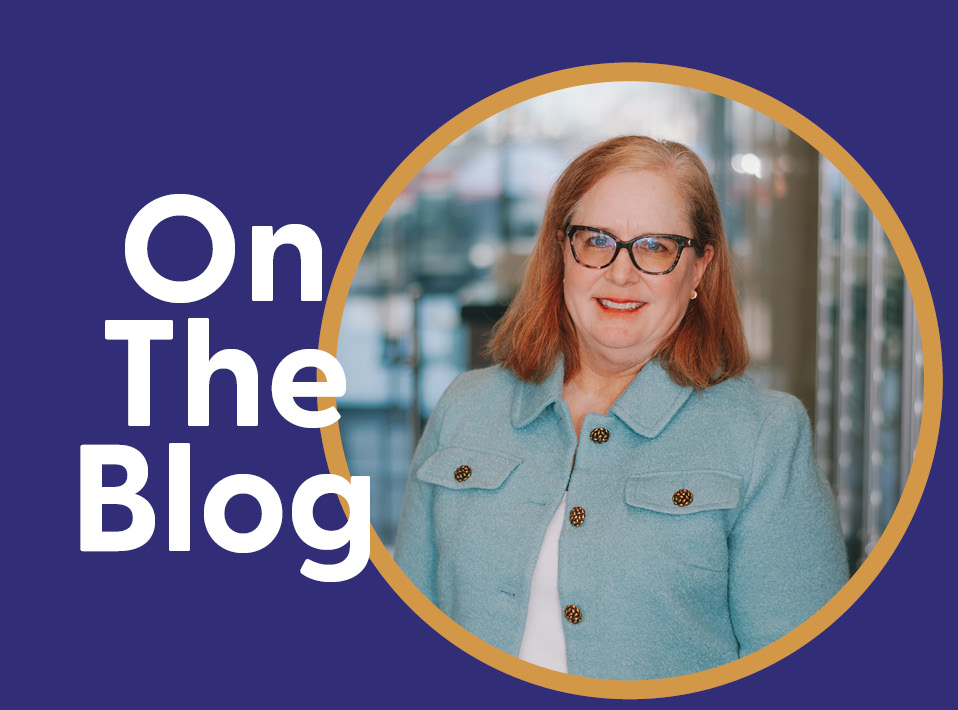
By Susan Crotteau
Tax time is a great reason to review the basics! At the Lincoln Community Foundation, our goal is to help make the tax aspects of your charitable giving as easy and effective as possible. If you’ve already established a donor advised or other type of fund at LCF, or if you’re considering starting a fund in 2025, it may be helpful to scan a quick reference guide of FAQs for a few of the tax rules that apply to charitable giving.
Where charitable giving is concerned, why does it matter whether or not I itemize my deductions?
Charitable contributions can only be deducted if you itemize your deductions. If you do your own taxes, you’ll report deductions on Schedule A of IRS Form 1040. Itemization is only available if your total deductions exceed the standard deduction. For example, for tax year 2024 (the tax return you’ll file in 2025), the standard deduction is $14,600 for single filers and $29,200 for joint filers. As you look at 2025 and beyond, check with our staff about how your donor advised fund (DAF) can help you cross the itemization threshold while still carrying out your multi-year annual giving plans to support your favorite charities.
If I use my donor advised fund to make all of my gifts to charity, do I need receipts for all of those gifts?
No! A big advantage of organizing your giving through a DAF at LCF is that you can make a single gift of cash – or even better, appreciated stock – to your DAF, and then support your favorite charities from that fund. This means the only tax receipt you need is the one that documents your gift to LCF for your DAF.
What documentation is required for me to take a charitable deduction?
Donations over $250 require written acknowledgment from the charity. LCF provides this for gifts you make to your DAF or other type of fund. Use IRS Form 8283 for non-cash contributions valued at $500 or more. Appraisals are required for donations valued over $5,000 (such as private stock and real estate).
How much of my income can I deduct for charitable donations to the Lincoln Community Foundation and other public charities?
Cash donations to public charities (including your fund at LCF) are deductible up to 60% of adjusted gross income (AGI). Donations of non-cash assets, such as appreciated stock or real estate, are deductible up to 30% of AGI. Remember that donating appreciated assets held for more than one year to a DAF at LCF can avoid capital gains tax; LCF does not pay tax when it sells the asset, leaving more money in the DAF to support your favorite causes than you would have if you had sold the asset and donated the cash.
What are the rules for IRA distributions to a charity?
If you’re age 70 ½ or older, you can make Qualified Charitable Distributions (QCDs), up to $108,000 in 2025, from IRAs to certain types of funds at the community foundation (such as designated funds or unrestricted funds, but not donor advised funds). QCDs can satisfy your required minimum distributions.
As always, the staff at LCF are here to help you achieve your charitable goals during tax season and throughout the year as you implement a philanthropy plan that meets both your financial goals as well as your goals for making a difference in the community.
For more information, give us a call at 402-474-2345.
Leveraging philanthropy to build modern affordable housing
Published on Apr 10, 2025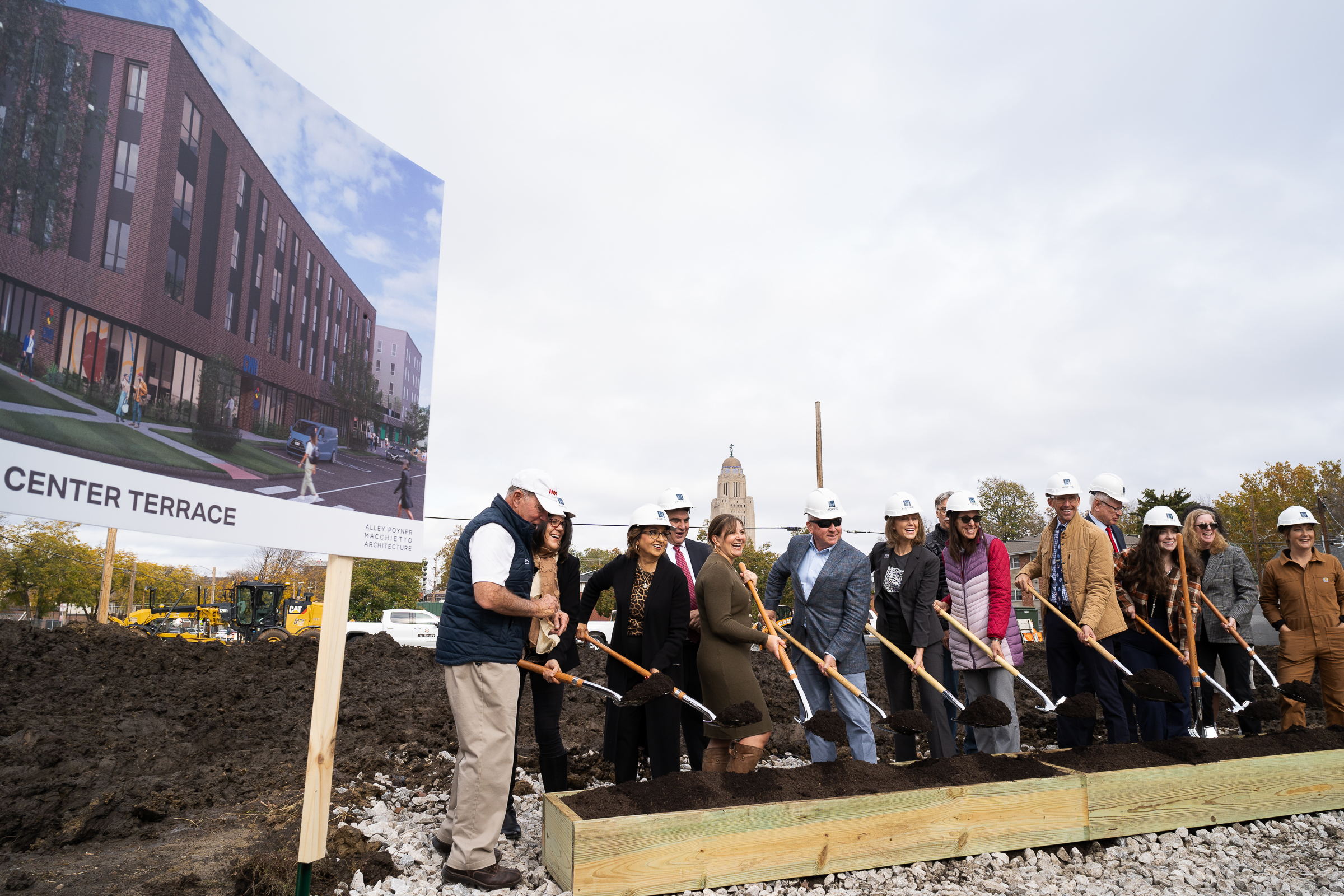
By Liz McCue
It took around a decade and the collaboration of dozens of individuals and organizations to reach a groundbreaking ceremony held on Nov. 6. But within two years, Center Terrace will bring 125 affordable apartments, community space and a medical clinic to 1000 S. 13th St. in the South of Downtown neighborhood.
The five-story building will offer one-, two- and three-bedroom apartments feasible for residents making 50-60% of Lincoln’s median household income. The name highlights both the location’s past as the home of CenterPointe and the building’s rooftop deck, said Carina McCormick, housing advocate and treasurer for the South of Downtown Community Development Organization (SDCDO) board of directors.
Carina is a resident of the neighborhood and has been involved in efforts to improve the area even before SDCDO was created in 2016. She also served as board president in 2023, and worked closely with organizations, including Lincoln Community Foundation (LCF), that helped make the Center Terrace project a reality.
“It’s a remarkable number of organizations and institutions that have made this possible,” said Rich Herink, LCF’s consultant for strategic partnerships. “Not to just build it, but to build it so it could be rented out to people with half the median income.”
Both Rich and former LCF President Barbara Bartle helped SDCDO build connections that support the mission of the foundation — to improve the Lincoln community — and the goals of Center Terrace.
LCF helped SDCDO in initially purchasing the land for Center Terrace, a loan since repaid after being turned over to Hoppe Development, which will oversee construction and manage the completed property. A second, low-interest loan, along with loans from the Woods Charitable Foundation and the Cooper Foundation, and funds from an anonymous donor, will ensure units can be rented at 50% of Lincoln’s median household income for years to come.
A model for collaborative, affordable housing development
The question was always “how can we help drive these costs down to make it affordable,” said Rich. Anyone can build an apartment complex to be rented at market value, he noted, but many residents in the South of Downtown make far less than Lincoln’s median household income, recorded at $67,846 according to the 2022 census.
That’s where a network of local and state agencies came together. Along with foundations, SDCDO and Hoppe Development worked with the city of Lincoln for tax-increment financing designated specifically to support low-income housing in the neighborhood, along with $300,000 for public improvements. Lincoln Electric System provided funds to increase the building’s energy efficiency, further providing savings for future residents.
The Nebraska Department of Economic Development administered ARPA grants that support both Center Terrace and Clinic With A Heart, a free, local healthcare clinic that will move into commercial space on the first floor, and Community Development Resources helped structure the philanthropic loans and ARPA grants. Low-income housing tax credit was allocated by the Nebraska Investment Finance Authority, with tax equity provided by WNC.
Multiple banks collaborated on a syndicated loan for construction — Horizon Bank, Pinnacle Bank, BankFirst and West Gate Bank — and Cedar Rapids Bank and Trust provided a permanent bond.
Additionally, Congressman Mike Flood has advocated for $2.2 million in 2025 community project funds to support Center Terrace and public space improvements around it, including street crossings, sidewalks, lighting and a pocket park, according to his website.
“This project is a model for how to collaborate with neighborhoods and serve communities,” said Jake Hoppe, Hoppe Development managing partner, at Center Terrace’s groundbreaking.
Built for the community
Hoppe Development’s commitment to collaboration was one of the reasons Carina and other SDODC board members supported handing the development of Center Terrace to the company.
“It’s all very community driven,” she said, from incorporating feedback from residents to working with the Lux Center for the Arts to commission murals on the building when construction is completed.
The design of the building, by architectural firm Alley Poyner Macchietto, was also chosen to complement the character in the surrounding neighborhood.
“There had always been an effort to make Center Terrace within the environment of the existing neighborhood,” said Carina. “That played into the design, to make it look like three smaller buildings instead of one large apartment complex.”
The South of Downtown stretches from Tenth Street through 17th Street and L Street south to A Street, and includes parts of the historic Everett, Near South and Capitol View neighborhoods. Residents are primarily renters (more than 90%), and median household income for the neighborhood is just $20,826, according to the city’s South of Downtown Redevelopment & Strategic Plan.
A resident panel consulted throughout the project, as well as surveys of residents and neighborhood engagement led by SDODC and NeighborWorks, identified priorities for Center Terrace. At the top was affordability for current South of Downtown residents — but so was communal space, a park and off-street parking.
“I’m just excited to see people move in,” said Carina.
She noted that Center Terrace will offer individuals and families safe, healthy, accessible homes. The building will have an elevator, and in-unit washers and dryers, which aren’t available in many apartments in the neighborhood. A garage on the first floor will provide close parking for tenants and Clinic With a Heart.
Center Terrace will also be built around a public “pocket” plaza that can support events, mobile healthcare clinics and food trucks, in response to resident requests. A small park and public community room will also provide neighbors with space for entertainment, celebration and connection.
Feedback from residents at a community forum held by SDODC was “overwhelmingly positive,” Carina said, for Center Terrace’s design and the opportunities it will open to the neighborhood. Both she and current SDODC Board President Kile Johnson agreed the inclusion of Clinic With A Heart is a win for the community.
“It became a natural fit,” said Kile.
The move will give Clinic With A Heart dedicated space in a location accessible to uninsured or low-income patients both new and current. A StarTran bus stop is already present at the site, and bike lanes and well-marked crosswalks are part of the intended public improvements.
The work that went into Center Terrace won’t end once construction is completed, though. Instead, it will serve as a benchmark for what affordable housing development could look like in both Lincoln and elsewhere. The Hoppes manage developments across Nebraska and can apply the combination of tax credits and philanthropy, and comprehensive community engagement to support even more communities.
In the meantime, affordable housing projects and programs will continue for the South of Downtown, utilizing housing trusts and TIF-backed rental rehabilitation funding. LCF has worked hand-in-hand with SDCDO since the organization was founded and will continue to seek opportunities to improve the Lincoln community and the lives of its residents.
Donor Profile | Chuck and Carol van Rossum
Published on Apr 10, 2025
“Your generosity is a reminder that there are kind-hearted individuals and organizations devoted to making a difference in the lives of students like me. It motivates me to strive for excellence, and to one day be in a position to pay it forward. Thank you from the bottom of my heart for believing in me and investing in my future.” – Riya, Student Success Scholarship recipient
Carol van Rossum and her late husband, Chuck, probably never imagined they would make such a momentous difference in the lives of so many young people.
But thanks to a thoughtful decision to use their named scholarship fund and participate in the Lincoln Community Foundation’s new Student Success Scholarship program – that’s exactly what they are doing.
“This scholarship fund is close to my heart, it speaks to everything my husband believed in and symbolized,” said Carol. “I was fortunate to talk to him about our estate planning while he was living, and we both wanted our legacy to live on as long as possible…to last in perpetuity.”
The couple have established several funds through the Lincoln Community Foundation, but the student scholarship is perhaps the most precious to them.
And though the Charles F. and Carol A. van Rossum Scholarship Fund was created years ago, the Foundation only recently founded the new Student Success Scholarship Fund as a place that existing scholarships – like Carol and Chuck’s – might find a better fit.
“I never dreamed I would actually see it working, but I’ve been so blessed to see this scholarship in action,” said Carol. “I’ve been lucky enough to read about the students who receive the scholarships, read their thank-you letters. It warms my heart, and I know Chuck would have loved all of this.”
The couple helped set up criteria for their scholarship, geared toward first-generation graduates who demonstrate community service, financial need and quality academic marks.
But Carol attributes the couple’s estate planning success to the Lincoln Community Foundation.
“I would say the biggest plus is that they listened to what we wanted. They didn’t tell us what we should do. We were able to determine where we wanted our resources to go – how our money could match our passions and aspirations.”
After all, philanthropy runs deep in both their families.
“My dad was a pilot in World War II and endured a POW camp for nine months after his plane was shot down,” she said.
He survived and returned home to run the family seed company, but also to serve as a model citizen.
“He was such a people person, involved in all parts of the community. And he would always give back. I grew up watching his generosity and spirit of giving.”
Chuck’s mother, meanwhile, had a heart of gold and also gave of herself, Carol said. “Chuck was just like her. He truly never knew a stranger.”
It’s probably no accident these two spirits came together.
Carol attended college at Illinois State as a young woman, working to earn an education degree. But a very unexpected and fateful phone call changed her life.
She explained that her roommate had a boyfriend who would phone from Florida, but on one call another young man got on the phone – claiming he had paid for the call and wanted to talk to someone. Carol was handed the phone and had her first conversation with Chuck van Rossum.
The rest was history. After letter writing and eventually meeting, the two married in 1972 and since Chuck was enlisted in the Air Force, the family was assigned to places around the world – from Indiana to the Netherlands to Germany to Alaska to Nebraska and Illinois.
The couple had two children, and eventually Chuck retired from the Air Force to work first at an Illinois university – then in Student Affairs at the University of Nebraska-Lincoln.
“He was a big Husker fan, and we had a sweet spot in our hearts for Nebraska,” said Carol.
They loved living in Lincoln and, somewhere along the way, began developing an estate plan that included a partnership with the Lincoln Community Foundation.
“Chuck passed away 10 years ago, but we were lucky to have this discussion while he was still living,” said Carol. “I thought it was important to establish something with Chuck’s name to honor his legacy. What’s more, we really liked this community and found we could leave our contributions to all our favorite causes, everything dear to our hearts.”
Jump-Starting Student Success
The Lincoln Community Foundation’s Student Success Scholarship Fund was implemented in 2024 to provide scholarship awards that were renewable, flexible and led to degree completion, according to Trish Reimer, Grants and Scholarship Manager for LCF.
“We wanted to see how we could use some of our existing scholarship funds in a way that aligned more with our vision statement – to create a community where everyone is thriving, working together, to build a better tomorrow,” said Trish.
The van Rossum Scholarship fund, along with seven other scholarship funds, partnered to disburse significant awards in 2024, providing five students with amounts up to $5,000 per student – with an opportunity to renew the award for up to four years ($20,000 total).
“We are so grateful for Carol and Chuck. They epitomize the breadth of tools the Foundation has available for donors that wish to give and demonstrate how they could establish funds that align with their passions,” said Trish. “Their generosity is humbling.”
If you are interested in helping students pursue their post-secondary education and want to learn more about the Student Success Scholarship Fund, contact Susan Crotteau at 402-474-2345 or susanc@lcf.org.
Participate in Give to Lincoln Day 2025 via IRA QCDs
Published on Apr 10, 2025The 14th Give to Lincoln Day is just around the corner! This annual giving event benefiting local nonprofits kicks off May 1 and builds up to Lincoln’s One Big Day of Giving on Thursday, May 29.
When you reach a certain age, the federal government requires you to withdraw or distribute a portion of your IRA investment and consequently pay taxes on the amount withdrawn. By using a Qualified Charitable Distribution (QCD) to support a qualified charity, those funds are transferred directly to that charitable organization, tax-free.
If you have an IRA and would like to make a QCD to support this year’s Give to Lincoln Day, please follow these steps:
- Decide the total amount you wish to donate with your IRA QCD for Give to Lincoln Day.
- Contact your IRA administrator to request a check for this amount from your IRA as a QCD. Checks must be made payable and mailed to Lincoln Community Foundation.
Lincoln Community Foundation
Attn: Rhonda Page
215 Centennial Mall South
Suite 100
Lincoln, NE 68508
Please ask your administrator to include your name and “QCD” in the memo line. Checks must be received at the Foundation by May 29 to count towards the event.
- Select the nonprofit(s) you’d like to donate to. All participating nonprofits will be listed on GiveToLincoln.com after April 28.
- Complete the IRA QCD form with your selected nonprofit(s) name and amount of your donation(s). Your donations should equal the total amount of your QCD check. Please note there is a $100 minimum donation per organization. Forms may also be requested by contacting Rhonda Page at 402-474-2345 or rhondap@lcf.org.
- Return the completed form to the Foundation by Friday, May 16.
Questions? Contact Rhonda Page at 402.474.2345 or rhondap@lcf.org.
Spring 2025 Newsletter
Published on Apr 14, 2025To catch up on the latest Lincoln Community Foundation happenings click here to download the newsletter.
Celebrating Black Led Philanthropy
Published on Apr 15, 2025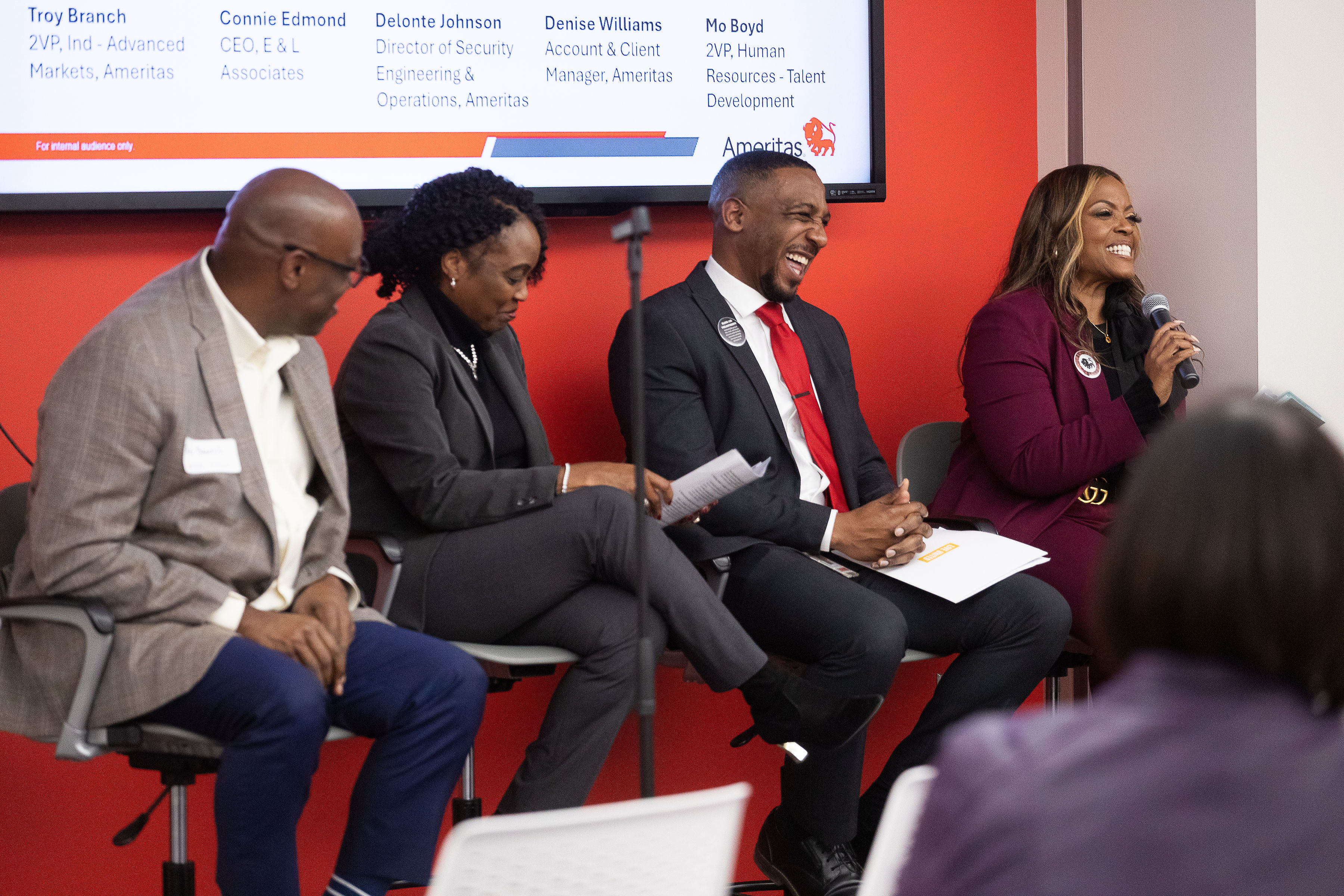
From left to right: Troy Branch, Connie Edmond, Delonte Johnson and Denise Williams.
“We’re better together,” said Connie Edmond, CEO of E&L Associates in Lincoln. “Not just one demographic. Not just one neighborhood. But the entire community, philanthropists together in unity.”
As a board member of Lincoln Community Foundation, Connie has joined with other leaders in advancing community conversations about Black Led Philanthropy. She also served as a panelist in their most recent event on financial literacy in early February.
She hopes that these conversations create a snowball effect, encouraging more people to participate in future events and discussions focused on Black Led Philanthropy.
"Everybody will walk away with a different takeaway," she said. “Whether that's skills and knowledge they can apply in their own lives or opportunities and connections they can build by meeting other attendees. It's all for the community's benefit."
Ameritas’s Black and African American Bison Strong resource group hosted the February panel in partnership with the Black Led Philanthropy group, LCF and United Way of Lincoln and Lancaster County.
The gathering was the latest in a series of community discussions developed from this collaboration. Prior events included an introductory session held at The Post in August, and a November panel of five nonprofits focused on the education and support of youth at Integrative Behavioral Health Services.
This group was formed out of a desire by both LCF and United Way to learn how they could better support the work already happening in Lincoln’s Black community, and to find ways to partner, promote and uplift existing philanthropy.
“It’s part of our mission to show how charitable giving and philanthropy is something we all can participate in,” said LCF President Tracy Edgerton. “We have a platform and knowledge that can amplify the work of our Black community members, to help connect our neighbors to the projects and organizations that reflect their values.”
The two organizations first met with a small group of Black leaders in the summer of 2023 to figure out what a partnership could look like. The conversations were rich, and necessary, said Peter Ferguson, one of the early participants. Peter has served on United Way’s board, is one of the advisers for the annual Rev. Dr. Martin Luther King, Jr. Youth Rally, coordinator of culture, inclusion, and scholar development and assistant supervisor of recruitment for Lincoln Public Schools.
“We probably have of the longest standing philanthropic giving that this community has seen,” he said. “Giving may be more informal — there’s no campaign, no giant check, no temperature graphic showing a goal. Instead, it’s giving through church, through fraternities and sororities and through family.”
Those first conversations recognized that ongoing and historical philanthropy, and how LCF and the United Way could work together to “celebrate and grow the acts of philanthropy — time, talent and treasure — and perhaps even consider some collective activities,” said Meagan Liesveld, executive director for United Way of Lincoln and Lancaster County.
Both Peter and Tracy described it as catalyzing in the way that it brought people together to gather information and ideas, and to act on them. There were folks in the room with connections to nonprofits, to city government, to schools, with a broad range of knowledge and expertise.
“It felt like being at the right place at the right time,” said Mo Boyd, second vice president, human resources - talent development at Ameritas and chair of the Black Led Philanthropy group.
Mo was also part of the early conversations. At first, he thought it was simply a good opportunity to work with community leaders he knew and some he was not as familiar with yet.
“I found myself being extremely engaged, being happy to ask a lot of questions, very participative and really wanting to take my experiences in Nebraska and outside of Nebraska and bring some of the thought leadership that I had developed over the years back to my home state,” Mo said.
Lincoln is one of the most welcoming places he’s lived, Mo shared, and he was excited to help “strengthen the community in a way that continues to feel welcoming and warm for everyone.”
Over time, more voices were added to the group, and they created a survey to learn how Lincoln’s Black community engages with charitable causes, what is most important to the community and to identify opportunities for future engagement. Four areas of focus were identified: education, financial literacy, mental health and mentorship.
“At the end of our year of listening, it is the hope that we may be able to determine one or two areas of deepest interest that this group of philanthropists and community members might be able to focus in on and support in some way together,” said Meagan.
A date for a fourth event hasn’t been set yet, but the results have already shown success. For the first two events, nearly 60 people attended and 80 registered for the February event at Ameritas.
“It says the community is responding to the events, and they like what they’re seeing,” said Mo.
The financial literacy panel also marked the opening of a month-long installation at Ameritas of the Rev. Dr. Martin Luther King, Jr. Youth Rally mural, titled 'Walk Together,' was created by local artist Jevon Woods and commissioned by the Rally Planning Committee to celebrate 30 years of the Rev. Dr. Martin Luther King, Jr. Youth Rally. Committee members welcomed the attendees with inspiring speeches to begin the conversation.
“Our youth have, not just for the last 30 years, but also throughout time, been the leaders in the philanthropic movements,” said Peter. “It’s important to have a seat at the table alongside older community members, both to learn from them and be part of the conversations that impact their future.”
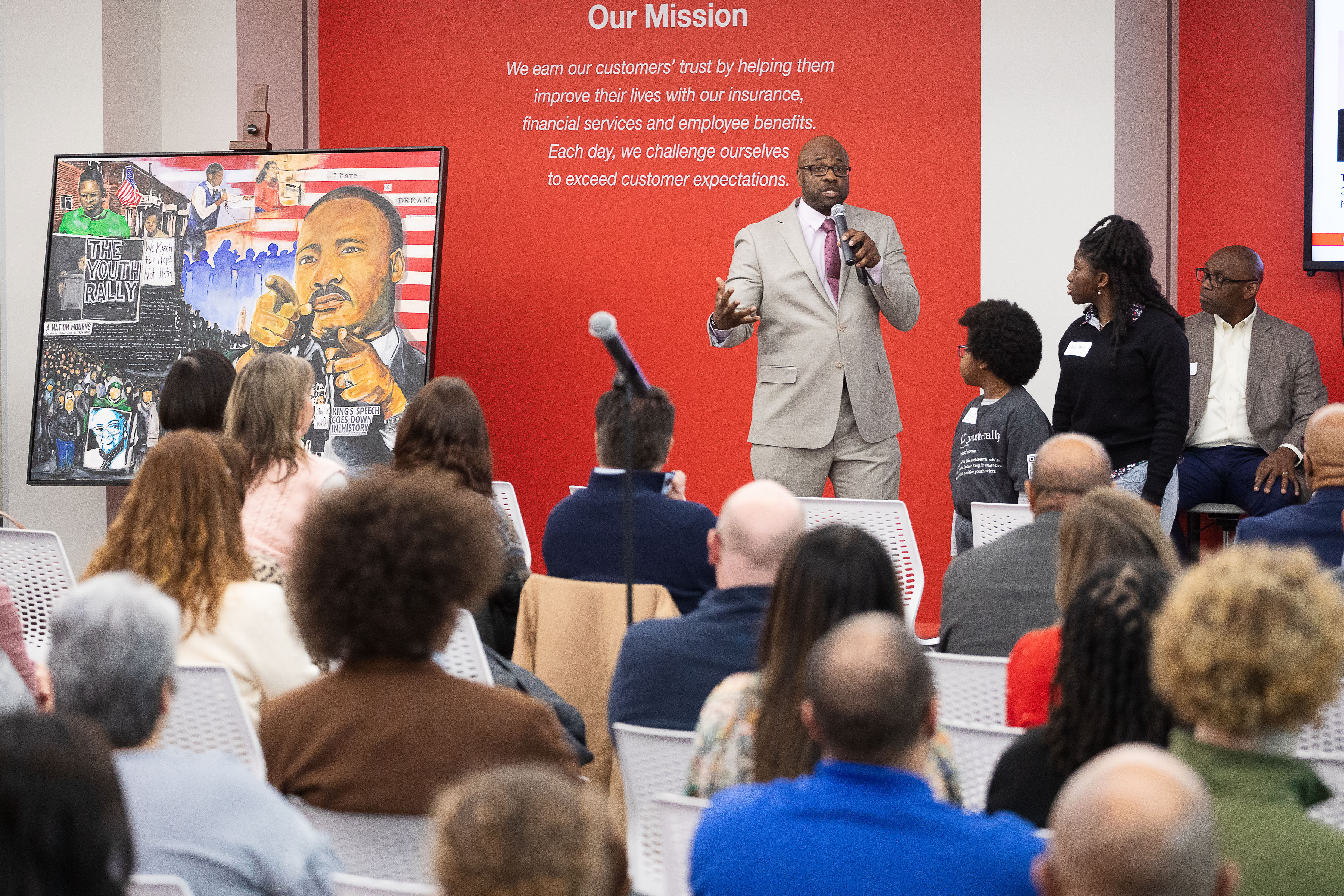
Peter Ferguson and Rally scholars present the Rev. Dr. Martin Luther King, Jr. Youth Rally mural, commissioned by artist Jevon Woods.
Along with Connie Edmond, panelists included fellow financial experts Troy Branch, second vice president for individual advanced markets at Ameritas, Delonte Johnson, director of security engineering and operations at Ameritas, and Denise Williams, account and client manager at Ameritas. The event was emceed by Mo Boyd.
“People can be traumatized by financial experiences,” shared Connie, so they don’t talk about it.
The panelists turned that stigma on its head, sharing from their own experiences and their connections with one another. It was clear that participating in the panel was more than something they were doing for work, but rather a way to give back to the community.
That’s something else Connie emphasized, that money isn’t the only way to engage in philanthropy.
“Everybody thinks it’s about money, but God has gifted you with talents,” she said. “Philanthropy can be a time investment — through mentoring, advocating and volunteering. It could be through skills and knowledge.”
“Every one of us can be a philanthropist,” agreed Tracy. “The value of philanthropy isn’t just in the people who have the capacity to give high amounts of money. It’s in each of us, in our capacity to love and care, and support the causes that reflect the values of our Lincoln community.”
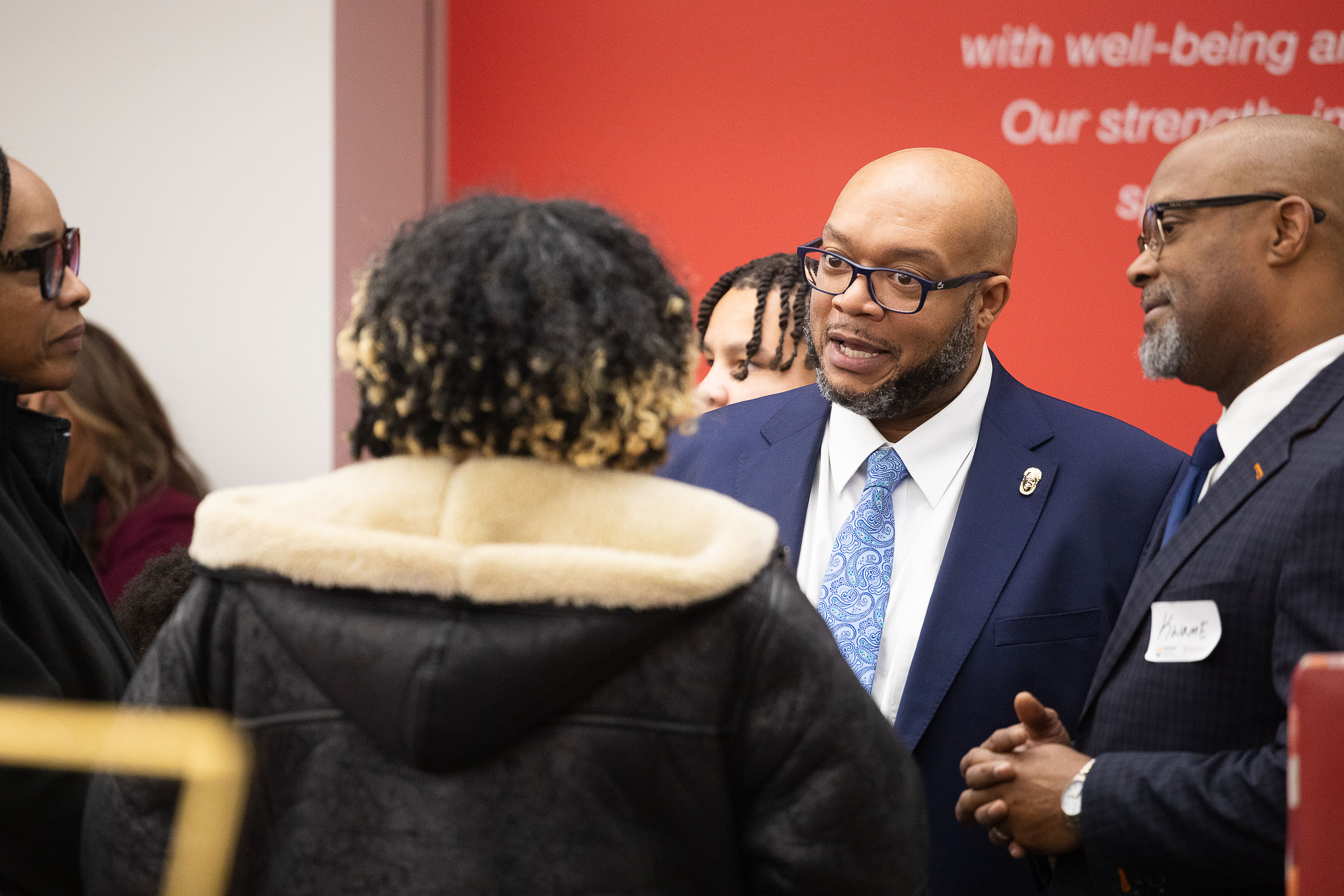
Mo Boyd (center), second vice president, human resources – talent development at Ameritas and chair of the Black Led Philanthropy group chats with attendees after the February panel on financial literacy.
Meet Marcy
Published on Apr 15, 2025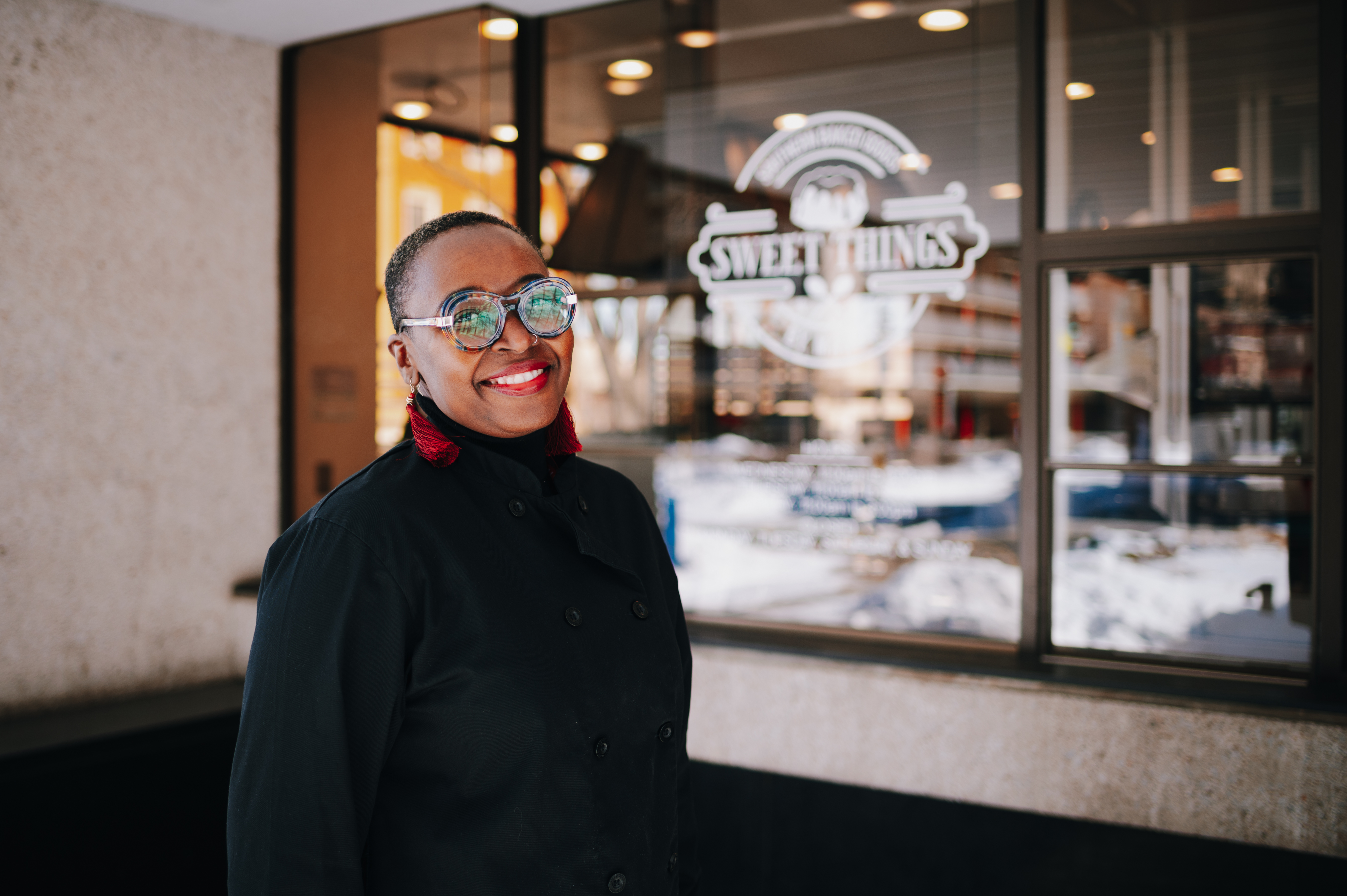
Marcy Haas’ journey to running her own business is one of resilience and transformation. Community support has helped her turn her passion into a successful venture – Sweet Things by Marcy – now located in the Lincoln Community Foundation Barbara Bartle Garden.
How did Sweet Things by Marcy begin?
Sweet Things by Marcy officially launched in October 2020, but my love for baking started when I was just six years old. When my husband was diagnosed with cancer and I faced a potential furlough, I turned to baking as a form of therapy. What began as a personal passion quickly turned into something much bigger.
With the encouragement of my friends and neighbors, I started selling my baked goods from home. Due to high demand, I rented the Kinder Bites commercial kitchen, baking on nights and weekends. In 2024, I made the move to Culinary Kitchen. The flexibility of my own space has helped me expand my menu and business.
How has Lincoln shaped your business journey?
Our community has been instrumental in every step of my journey. The availability of free or low-cost farmers' markets, such as East Campus Discovery Days, gave me a platform to introduce my desserts to a wider audience and the confidence to continue following my dream. My favorite collaboration so far has been with James Arthur Vineyard, where I do wine and dessert pairings. I also provide pairings for events at The Post and was recently a featured baker at the Downtown Lincoln Association’s Chocolate Lover’s Fantasy event.
The connections I’ve made have been just as valuable. When I joined the Chamber of Commerce, I never expected my son’s casual seating arrangement at my ribbon-cutting event to lead to my next business space! He happened to sit next to someone who introduced me to Kevin Knudson with Culinary Kitchen – proof of the kind of magic that happens in a community like Lincoln.
How can someone purchase items from your business?
Customers can preorder a variety of baked goods and I also provide desserts for local businesses like Lila Mae’s Southern Kitchen and Canyon Joe’s Barbecue. I offer lunch options at my Culinary Kitchen service window Wednesday-Friday, especially during community events in the garden. I am also available for event catering and can even provide a hassle-free homemade dinner for your family.
Do you have a favorite item on your menu?
I only bake what I love, so everything I make is special to me! My sons, Matthew and Chris, definitely have their favorites. Matthew always requests sweet potato pie for his birthday, while Chris prefers German chocolate cake.
How can our community support Sweet Things by Marcy?
The best way to support Sweet Things by Marcy is to follow along on social media, attend local pop-ups and spread the word. Every purchase, share or review and even just a kind word helps small businesses like mine continue to grow.
Explore the menu, place an order and stay updated on upcoming events!
1413 N Street
sweetthingsbymarcy.com
Facebook & Instagram @SweetThingsByMarcy
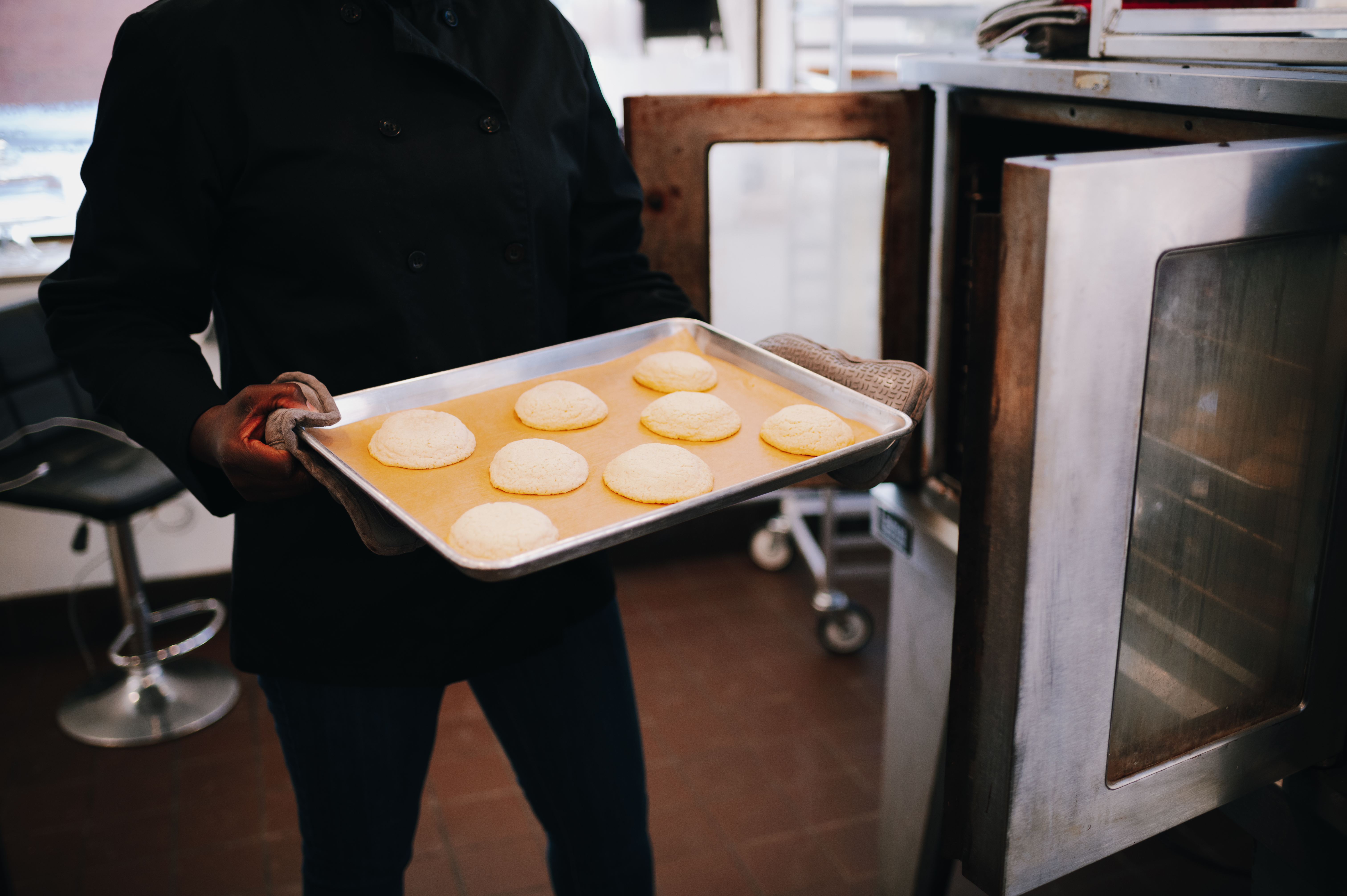
Paving a path for women through philanthropy
Published on Apr 15, 2025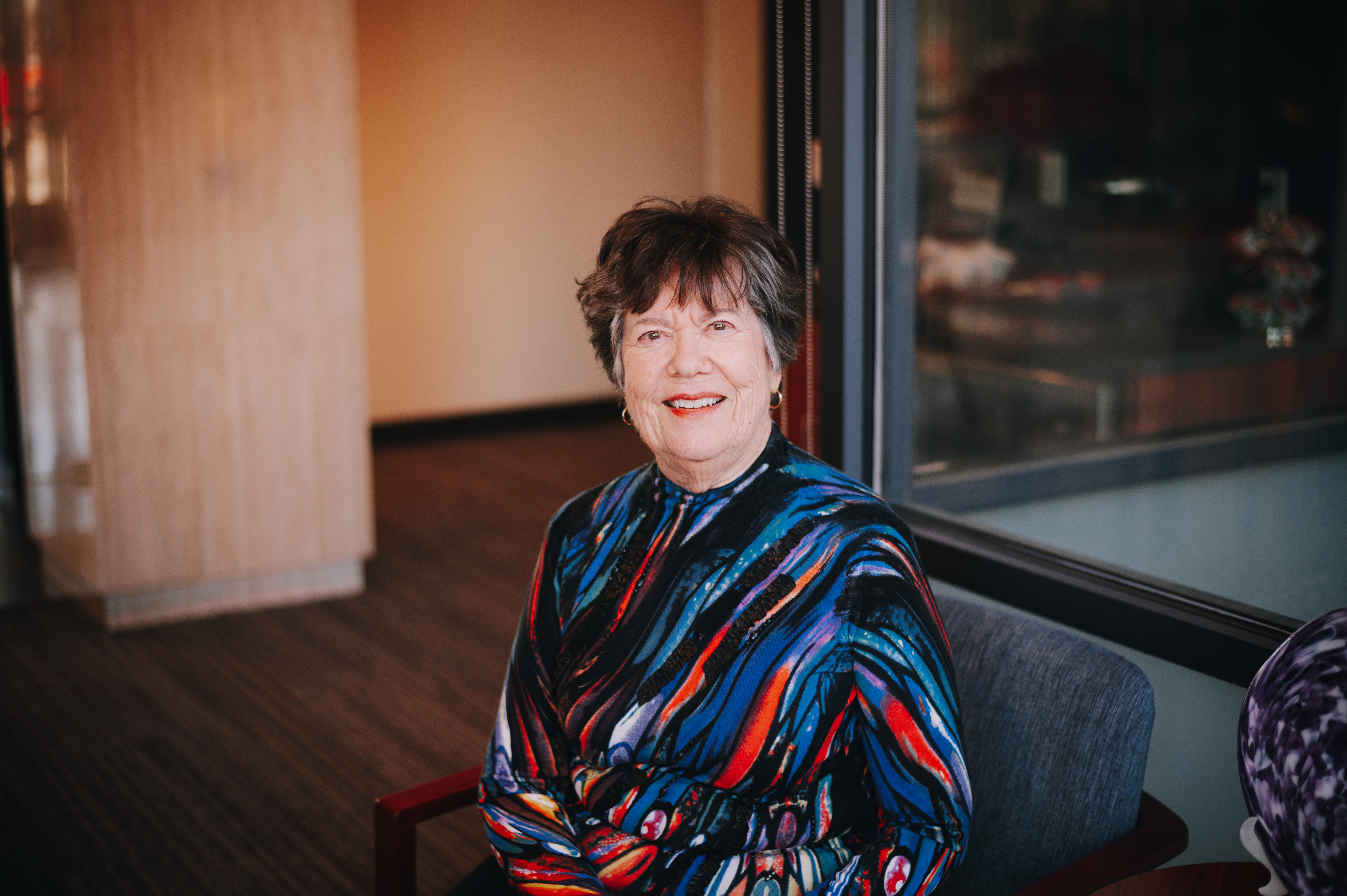
Jean Jeffrey knows what it’s like to be the only woman at the table.
While pursuing her CPA in the early 1960s, she walked into her first business class to see a lecture hall full of men – with just one seat open in the middle of the room.
During her career, she volunteered her time and often found herself to be the only woman on several service boards.
“They’d always make me treasurer,” laughed Jean.
Throughout it all, Jean fearlessly made her own way as a woman in a male-dominated industry. Her mother had worked as a bookkeeper, which gave her a taste of the accounting world when most women were pursuing teaching or nursing. She credits these experiences to not only her worldview – but her passion for helping women and children through her philanthropy.
Jean recently reflected on her journey that started back in the College of Business at the University of Nebraska-Lincoln (UNL).
“Being one of the only women in that scene – the professors knew you,” said Jean.
When she found that open seat in her business class, she caught the eye of her future husband, Michael, who sat in the front row.
“I beat him in the class,” she winked.
Jean was from York; Mike was from Lincoln. In college, they made lifelong friends with other couples, many of whom were Mike’s fraternity brothers from Beta Theta Pi.
“We basically had to draw straws to pick which weekend in June we’d each get married,” said Jean.
After graduation, Jean found landing a job as a CPA to be challenging.
“The Bis Ad College placement office actually had printed on the synopsis of the businesses interviewing for positions, whether women should apply,” said Jean. “Only two firms would interview me in the accounting area.”
Jean eventually found her “yes” through the national firm Peat, Marwick, Mitchell.
Mike was committed to the Army through ROTC after a deferment to complete law school at UNL. He then went into Judge Advocate General's Corps (JAG) and was stationed in Virginia, South Korea and New York. Jean joined Mike in Seoul, South Korea for six months after completing tax season back in Lincoln.
While serving in JAG at a post in New York City, Mike attended New York University for his master’s in tax law. From New York, they went to Florida before returning to Lincoln.
“I’m a Midwesterner at heart,” said Jean.
Mike joined his father’s law practice before eventually opening his own. Jean opened her own accounting firm, and they raised their two daughters back in the town where they met. Jean is an extrovert and was naturally drawn to service roles in the community.
“When I was younger, I gave of my time, and that’s helped me focus my philanthropy locally now. I’ve seen the need so dramatically,” said Jean.
Mike battled heart disease from a young age, so they both retired early to enjoy their time together.
“After Mike passed way in 2009, I went back on a few boards and felt even more compelled to give,” said Jean.
When it came time to think about her own estate plans, Jean turned to the Lincoln Community Foundation.
“After serving on the Foundation’s board, I was familiar with what they did and how they can help you think about your philanthropy,” she said.
Jean set up her legacy plan through a Donor Advised Fund which is now fully funded. In addition, she opened a Lincoln Forever Fund to support future needs and opportunities in the community through the Foundation’s unrestricted endowment. More recently, Jean has also started utilizing Qualified Charitable Distributions (QCD) from her IRA.
“I did not start giving through my IRA as soon as I should have,” she said. “It’s just a great tool if you have much of an asset for an IRA. If you need to take your minimum distribution, a QCD counts for that.”
The federal government requires you to withdraw and pay taxes on a portion of your IRA fund balance when you reach a certain age. However, by using a QCD, those funds may be distributed directly to charitable organizations without paying taxes on the amount transferred.
Jean plans to continue using QCD’s, especially when it comes to supporting her favorite causes during the Foundation’s annual giving event – Give to Lincoln Day – each May.
“I’ve always believed in giving back to the community because I felt pretty fortunate,” she said. “I know what it’s like for women to face challenges and discrimination. I’m grateful to be in a position to help.”
Participate in Give to Lincoln Day via IRA QCDs
The 14th Give to Lincoln Day is just around the corner! This annual giving event benefiting local nonprofits kicks off May 1 and builds up to Lincoln’s One Big Day of Giving on Thursday, May 29. Eligible donors can now use a Qualified Charitable Distribution (QCD) from their IRAs to support their favorite local causes during Give to Lincoln Day.
If you have an IRA and would like to make a QCD to support this year’s Give to Lincoln Day, please follow these steps:
- Decide the total amount you wish to donate with your IRA QCD for Give to Lincoln Day.
- Contact your IRA administrator to request a check for this amount from your IRA as a QCD. Checks must be made payable and mailed to Lincoln Community Foundation.
Lincoln Community Foundation
Attn: Rhonda Page
215 Centennial Mall South
Suite 100
Lincoln, NE 68508
Please ask your administrator to include your name and “QCD” in the memo line. Checks must be received at the Foundation by May 29 to count towards the event.
- Select the nonprofit(s) you’d like to donate to. All participating nonprofits will be listed on GiveToLincoln.com after April 28.
- Complete the IRA QCD form with your selected nonprofit(s) name and amount of your donation(s). Your donations should equal the total amount of your QCD check. Please note there is a $100 minimum donation per organization. Forms may also be requested by contacting Rhonda Page at 402-474-2345 or rhondap@lcf.org.
- Return the completed form to the Foundation by Friday, May 16.
For more information on IRA QCDs and Give to Lincoln Day, contact Chip DeBuse at 402-474-2345 or chipd@lcf.org.
Reeling in smiles
Published on Apr 17, 2025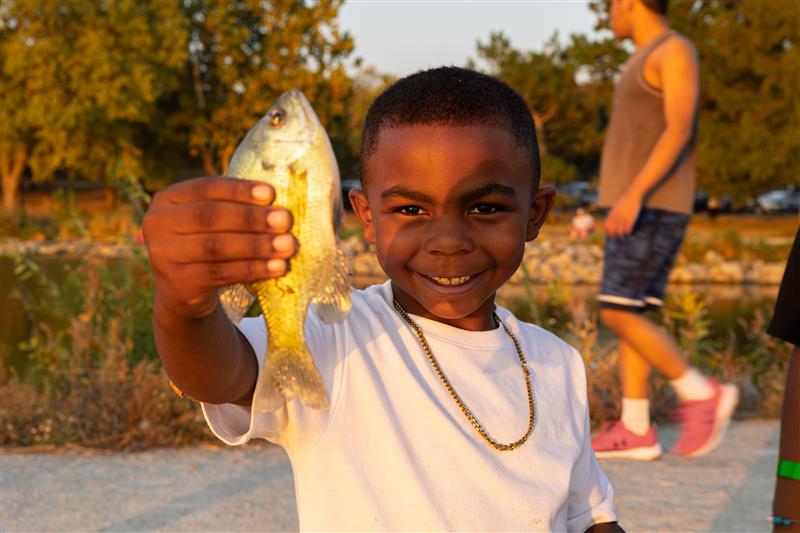
Big Gumdrop Outdoors connects underserved youth to nature with help from their first-ever grant
By Mary Kay Roth
Growing up in Lincoln, Elijah Riley always loved the outdoors. A self-taught young man in archery and hunting – you could often find him going fishing with his dad, camping with his family and building fires in Cub Scouts.
But he soon noticed other kids like him – underserved minority children – were not experiencing nature and felt uncomfortable or afraid outdoors.
So, while only in his early 20s, with his own sweat and money, Elijah was on a mission to create Big Gumdrop Outdoors – a nonprofit with a focus on helping underserved children discover the wonder of Mother Nature.
"I believe the outdoors is for everyone, and it’s my mission to make sure no kid feels like they don’t belong,” he said. “The wild is waiting – all we have to do is step outside."
Until recently Elijah provided the funding for his endeavor, but last year Big Gumdrop Outdoors received their very first chance for outside support – an Open Door Grant from the Lincoln Community Foundation.
“It was for $3,000 and that was just huge for us,” said Elijah. “We are so grateful to the Foundation for not only supporting us, but for providing opportunities to all of Lincoln’s nonprofits and smaller organizations. We’re now able to go into summer, our busiest season, confident we’re making a difference for our youth.”
Today, Big Gumdrop Outdoors operates after-school clubs, summer programs and monthly community events designed to meet kids where they are. And Elijah envisions so much more, fostering a generation of outdoor enthusiasts that are diverse, empowered and deeply connected to the land.
“We are driven by an urgent reality,” he said. “Too many children are growing up disconnected from nature with serious implications for their health, development and futures.”
Elijah explained that today’s children play more on concrete than dirt. Youth ages 8-18 spend an average of 7.5 hours a day on screens, a staggering 114 days per year. Research indicates that such overreliance on digital devices is linked to higher rates of depression and anxiety, inadequate sleep, low self-esteem, poor body image, eating disorders and online harassment.
“Put those kids in nature,” Elijah said with a huge smile. “You’ll see transformation.”
“There’s joy on their faces when they experience the excitement of catching their first fish and embracing the outdoors.”
Elijah found his solace in nature starting at a very young age with dad time and Cub Scouts.
“As I got older, I watched History and Discovery channels, wildlife shows, hunting documentaries and adventure series. I wanted to grow up and hunt alligators,” he said.
He took a detour in high school when he played football at Lincoln High, but three knee surgeries sidelined the teenager and brought him straight back to the outdoors – eventually starting a social media presence to document his nature experiences.
During a semester abroad in college, he gave a presentation about his fledging business to his entrepreneurship class.
“One of my peers challenged me,” said Elijah. “She asked, ‘If your goal is to teach underserved youth about the outdoors, what are you actually doing to give them access?’"
A lightbulb went on – his mission was solid.
Upon his arrival back to the states, Elijah immediately began real-world networking, creating lesson plans and, in the summer of 2023, Big Gumdrop launched its first eight-week program with the Clyde Malone Community Center.
“I designed the curriculum all by myself. I wanted kids to learn about ecosystems, put up tents, fish and cook over campfires,” he said.
He taught them about corn production (corn stalks to corn-on-the-cob to corn in the can) – planting pumpkin seeds, matching animals with appropriate ecosystems and identifying wildlife calls.
Midway through college, Elijah was officially the founder and executive director of Big Gumdrop Outdoors, a nonprofit dedicated to educating urban youth about nature.
Growing in bits and pieces, the organization now offers after-school programs through the Lincoln Public Schools Community Learning Centers, as well as several summer programs.
And the list of lessons and activities has broadened as well, now serving up everything from conservation storytelling (with lessons in photography and videography), to building campfires and cooking hot dogs, to getting coached in the lures, baits, rods and reels of fishing and experiencing area parks and lakes through field trips.
In December 2024, Elijah graduated from the University of Nebraska-Lincoln and was hired by Ducks Unlimited as a Youth Engagement Coordinator for the Great Plains region.
But his focus remains on teaching essential wilderness skills that inspire the next generation to explore the outdoors and consider careers in natural resources.
And he continues to stretch his scope.
Big Gumdrop has branched out to hosting monthly community events such as nature walks in Wilderness Park, fishing and kayaking clinics, and more.
Last year he looked to provide ongoing support for Big Gumdrop by engaging in fundraisers, as well as submitting their first grant application to Lincoln Community Foundation.
“Receiving the grant from LCF moved our bottom line,” he said. “I can’t begin to describe the affirmation this has given us. We are grateful for all the people who have offered support, and we’re excited to think about what long-term sustainability can look like.”
Of course, he dreams even bigger – hoping to take the Gumdrop formula beyond Lincoln –to Omaha, Kearney and places throughout Nebraska.
“Our goal is to create a pipeline where we begin working with children in elementary school, move to their feeder middle school and work with them again in their high schools,” he shared. “The high school students could serve as mentors to the younger kids, and we could provide internships and scholarship opportunities to develop deeper connections to the outside world.”
Elijah believes he’s had good fortune in his life, starting with a less-than-flattering nickname in school – Gumdrop – and turning it into something positive.
“It seems like all the stars have aligned and I am feeling quite blessed,” he said.
He remembers when he was a boy and a Cub Scout leader taught him how to build a fire.
“He changed my life, yet he never really realized the impact he had on me,” he said. “Now I watch all these kids out in nature, learning new skills – and I wonder how we will change their lives.”
Record Number of Nonprofits Registered for 14th Annual Give to Lincoln Day
Published on May 1, 2025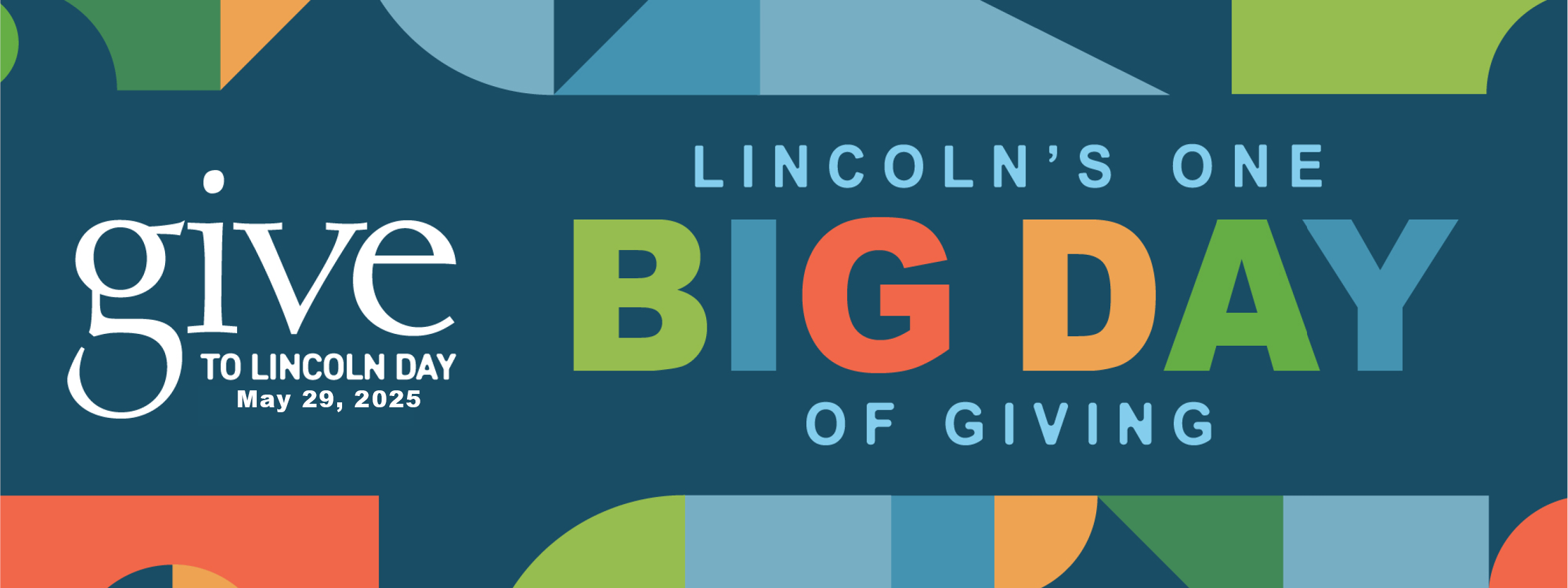
Lincoln’s 14th annual giving day is scheduled for Thursday, May 29. Coordinated by the Lincoln Community Foundation (LCF), Give to Lincoln Day is an online event encouraging donations to support the local nonprofits and causes people care about. A record number of 502 nonprofits have registered for this year’s event. Every participating nonprofit organization will receive a proportional share of a $650,000 match fund, based upon its percentage of total dollars raised, thanks to LCF and sponsors including Presenting Sponsor, West Gate Bank.
Last year’s event raised a record $8.5 million for 463 local nonprofits. The event has raised $65 million since 2012.
“Last year’s record-breaking results demonstrate what we can accomplish when we come together to give for good,” said Tracy Edgerton, LCF President. “During this time of uncertainty for many local nonprofits, a gift on Give to Lincoln Day represents more than just dollars It’s a show of support for their important work that adds so much to our quality of life here in Lincoln.”
Starting May 1, donors may search participating nonprofits and give online at GiveToLincoln.com. Donations must be made before 11:59 p.m. on May 29 to count toward the giving day and the match fund. The minimum donation is $10 per charity. Additionally, gifts made online at GiveToLincoln.com from May 1 through May 28 are eligible for a daily drawing to receive a $250 boost from Allo Fiber.
Gifts may also be mailed to the Lincoln Community Foundation if postmarked by May 22. Donors may also drop off donations between May 1 and May 29 at all Lincoln West Gate Bank branches via the lobby or the commercial drop drawers.
• Lincoln Community Foundation’s mailing address, 215 Centennial Mall South, Lincoln, NE, 68508.
• Presenting Sponsor, West Gate Bank, Lincoln Branch Locations, visit https://westgate.bank/ locations for lobby hours.
On May 29 donation totals can be viewed throughout the day at GiveToLincoln.com.
Sponsors Include: West Gate Bank (Presenting Sponsor), ABC Electric, ALLO Fiber, Assurity Life Foundation, Rich Bailey, The Hsin & Chao Families, D.A. Davidson & Co., Davis Design, Firespring, Frontier Bank, Kile & Cuz Johnson, Kawasaki Motors Manufacturing Corp., Kubly Family Foundation, Mail Management Services, Inc., JoAnn & Derrel Martin, The Family of J. Gates & Daisy Minnick, William J. Mueller & Kim M. Robak, Olsson, Pepsi Cola of Lincoln, Pinnacle Bank, Runza National, Joe W. & Ruth K. Seacrest Fund, Tom & Lisa Smith, Dr. Gene & Kristen Stohs, Talent Plus Inc, The Estate of Mark H. Tallman, Bill & Mae Whitmer Family Fund and WRK Family Foundation.
Marc and Kathy LeBaron Honored with 2024 Charity Award
Published on May 12, 2024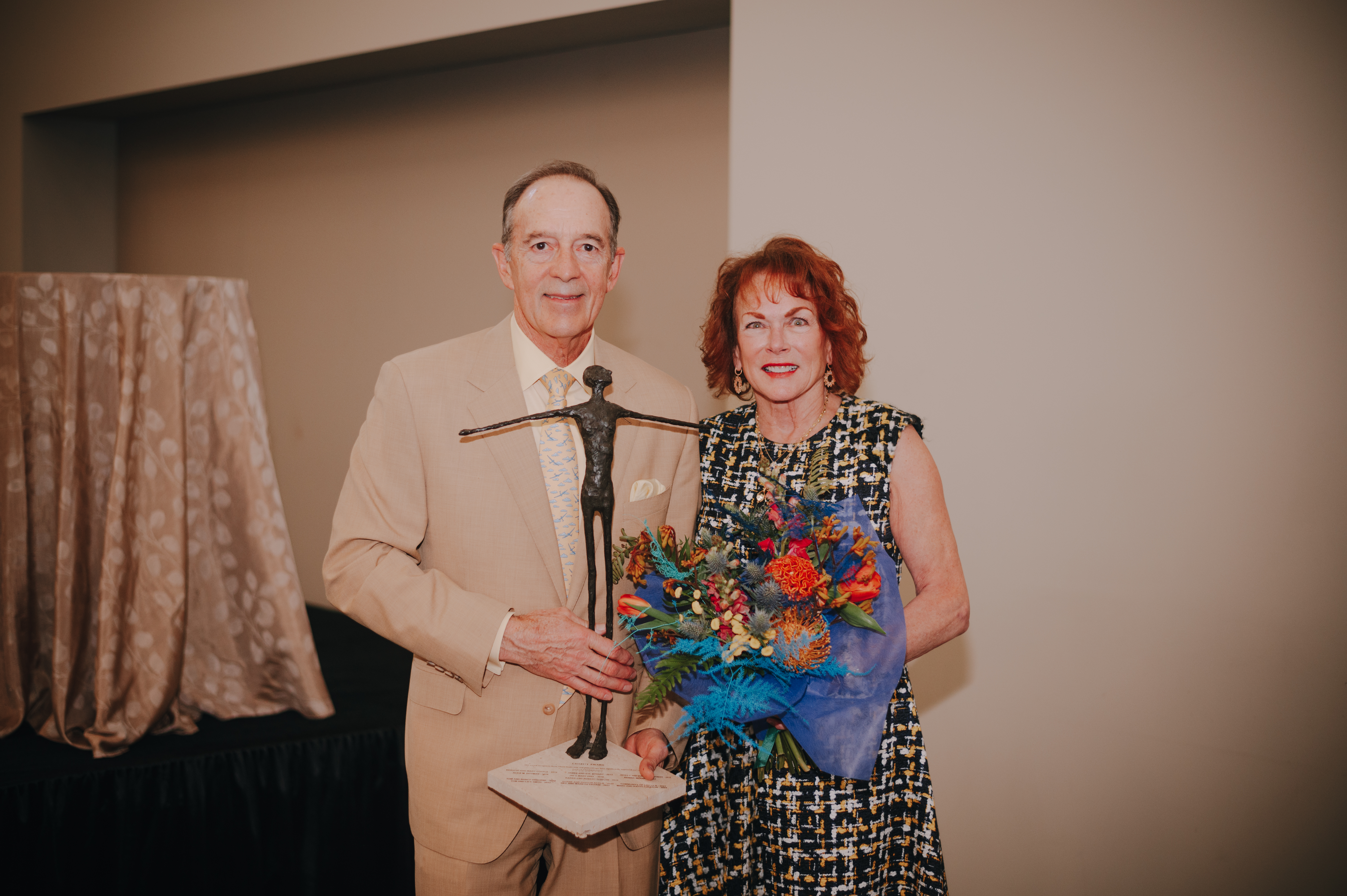
The Charity Award was established by the Foundation to provide the community with an opportunity to recognize individuals for their philanthropic contributions. Marc and Kathryn (Kathy) LeBaron were honored as the 2024 recipients on April 30, 2024.
Both Lincoln natives and graduates of the University of Nebraska-Lincoln, the LeBarons’ philanthropy has been focused on making Lincoln a better place to live, work and raise a family as well as helping vulnerable children and supporting the arts.
Paige Piper, executive director of BraveBe Child Advocacy Center, shared how Kathy and Marc’s involvement in our community has made it a brighter, safer, and more welcoming place for all.
“To know Marc and Kathy is to know passion for cause and a willingness to spring into action to help those in need,” said Paige. “Simply put, their generosity is equal parts inspiring and contagious.”
Marc is the president and CEO of Lincoln Industries. He purchased the business in 1983 from his father Dale. Now 70 years later, it is still a family-owned business with the LeBarons’ daughters Katie Haszard and Kassy Knudson at the company in leadership roles.
“Marc is a phenomenal business leader and innovator,” shared Tom Henning. “How do you give back to the community? Well one major way is to run a great business and create a lot of great jobs, which Marc and Kathy have clearly done at Lincoln Industries.”
Beyond job creation, the LeBarons and Lincoln Industries support the community in a variety of ways. They provide paid time off for employees to volunteer and lend their leadership to their passion projects like Junior Achievement and Willard Community Center.
“The Willard Community Center capital campaigns that Kathy and I have been a part of made such a difference – not only for the Center but for the neighborhood,” remarked Candy Henning. “The childcare, the education, and the spaces that it provides for the community to come together is so important. It’s changed the neighborhood and I know it’s changing people’s lives.”
The LeBarons are also avid collectors and supporters of the arts. They both recognize the positive impact that art has on society and work to make it accessible to their community. They provide leadership to arts organizations like Public Art Lincoln and Museum of Nebraska Art and create new art spaces in our community like their private gallery with Karen & Robert Duncan, The Assemblage.
“We were in Berlin, Germany on an art trip Marc and Kathy were leading when we came up with this idea for additional space for our collections,” shared Robert. “When we came home, we searched for awhile and finally found a building and it’s been a great asset for both us and the community.”
Marc and Kathy’s exceptional philanthropy now inspires the next generation of their family.
“Kath and I are privileged to have two wonderful daughters and sons-in-law that share our philosophy and are active in numerous organizations in our community,” said Marc. “I am intensively proud that they are, in spite of their busy lives, committed to making Lincoln a better place and carrying on the tradition.”
2024 Charity Award from Lincoln Community Foundation on Vimeo.
2024 JoAnn Martin Civic Leadership Award
Published on May 12, 2024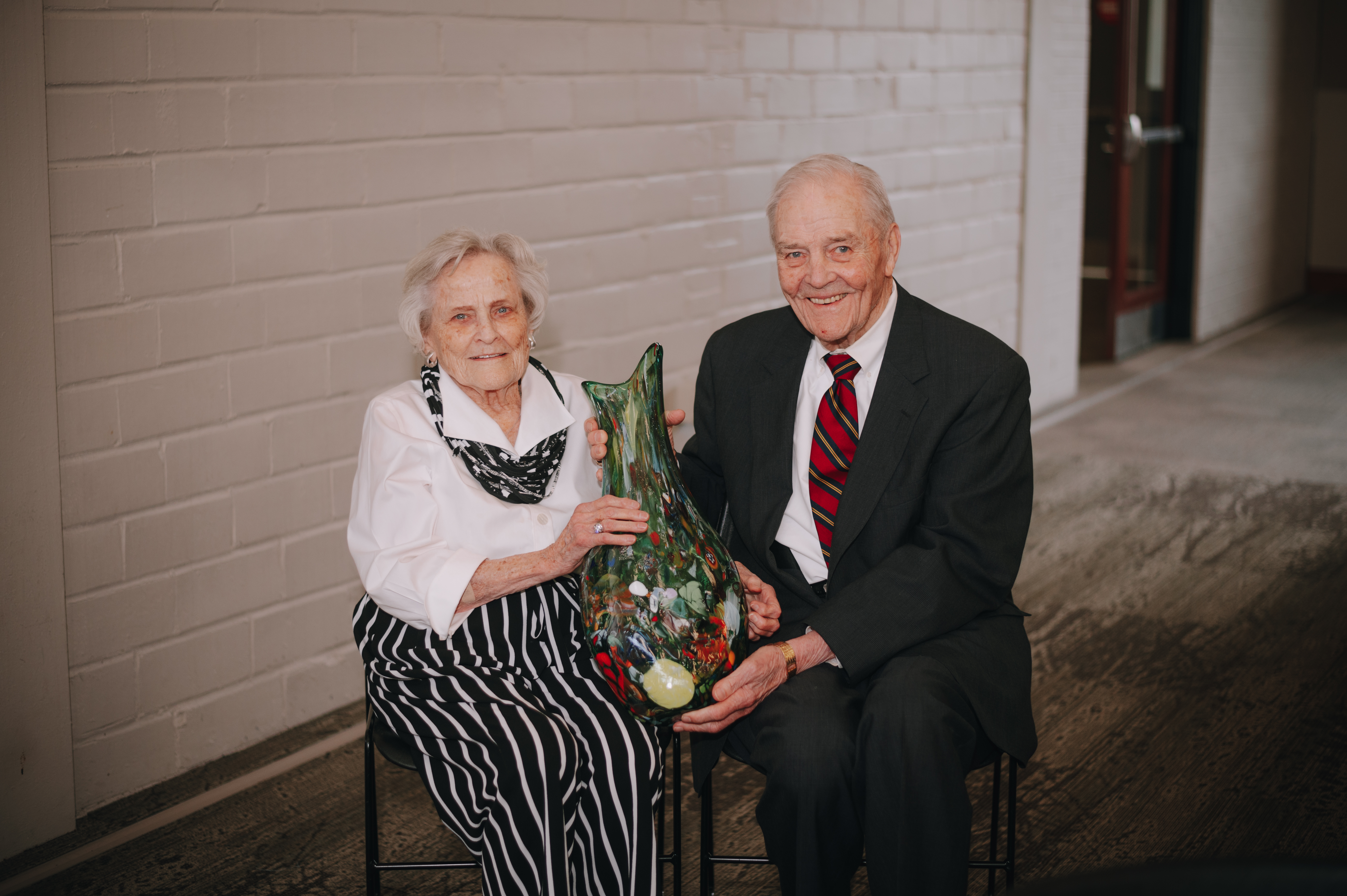
The JoAnn Martin Civic Leadership Award recognizes a strong commitment to servant leadership through volunteer service to nonprofit and civic organizations. The award was established and first presented to JoAnn Martin shortly before her passing in the fall of 2021 by a group of community leaders including leaders from Ameritas and NRC. They also established an endowment at the Foundation to sustain JoAnn’s leadership legacy along with JoAnn’s family.
Jack and Sally Campbell became the third recipients of the award on April 30, 2024. Their story started nearly 80 years ago when they were set up on a blind date in high school by a mutual friend. Jack was from Lincoln and Sally lived in Kearney. Their first date was to see Tommy Dorsey’s Orchestra at the Turnpike.
“Two and a half dollars a ticket too,” Jack remembered with a laugh.
They went on to attend and graduate from the University of Nebraska-Lincoln together. After Jack’s service in the Air Force, they returned to Lincoln to raise their family while Jack enjoyed a 40-year career with Massachusetts Mutual Life Insurance Company.
Leslie Levy, executive director of the International Quilt Museum spoke for many when she reflected on what makes the Campbells so special to this community.
“When you think about Jack and Sally Campbell, you think about them together as this incredible duo,” she said. “They are lively, kind, and compassionate. They live every day to the fullest and when they walk into a room, they just light it up.”
For the Campbells, living every day to the fullest has meant years of service to organizations including The Cooper Foundation, Friends of Lied, Nebraska Cultural Endowment and countless others. They both have a passion for the arts and humanities which is reflected in the opportunities they choose to be involved in.
As a founder of the Nebraska Cultural Endowment, Jack worked tirelessly to bring together the interests of private citizens and elected officials to establish the first public-private trust to fund both the arts and humanities in 1998.
Jack’s college connection to Johnny Carson – who he knew in school as John – led to a $500,000 grant from the Carson Foundation, the first major gift to the Cultural Endowment.
“Johnny Carson saw the good work being done in Nebraska and he knew people like Jack Campbell were involved,” said Chris Sommerich, executive director, Humanities Nebraska. “The Carson Foundation continues to support the Cultural Endowment all these years later.”
Sally is the former president of the Lincoln Quilters Guild and served as president for Junior League. Her love for quilting and people intersected often in her community service. Greg Jensen, former senior director of development for the University of Nebraska Foundation, reflected on how he first got to hear about Sally.
“Spearheaded by Sally, a group of quilters from all over the country put a quilt together and flew to Sweden to present it to the Queen,” he said. “That was really a big deal. It made a lot of press for Lincoln, Nebraska to have many of our own present this gift.”
For Jack and Sally, it is the friendships they continue to make – both in Lincoln and across the state – that inspire their service and keep them so involved.
“Jack and Sally’s presence in Lincoln was in the right place at the right time,” said Laurie Richards, interim film programmer for The Ross. “We are very fortunate, and we should feel blessed that they have been part of all this activity. We honor them today and we thank them so much.”
2024 JoAnn Martin Civic Leadership Award from Lincoln Community Foundation on Vimeo.
Lincoln Community Foundation Announces Tyrell Ross as New Vice President, Finance
Published on May 15, 2025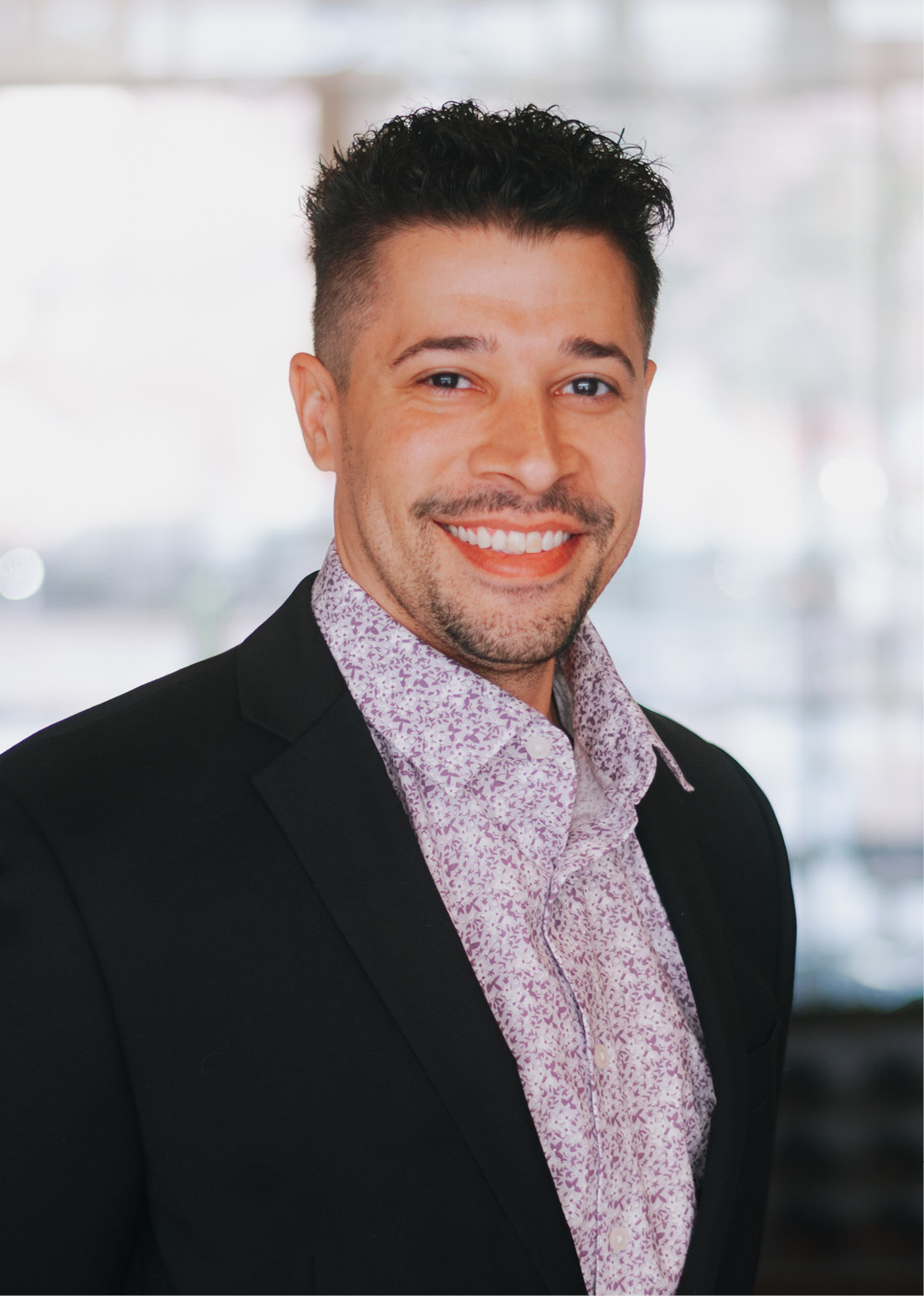 Lincoln Community Foundation (LCF) welcomes Tyrell Ross to its growing team of professionals as Vice President for Finance. Ross has nearly 15 years of experience in finance, accounting, and human resources, most recently with the College of Business at University of Nebraska-Lincoln.
Lincoln Community Foundation (LCF) welcomes Tyrell Ross to its growing team of professionals as Vice President for Finance. Ross has nearly 15 years of experience in finance, accounting, and human resources, most recently with the College of Business at University of Nebraska-Lincoln.
“Tyrell brings a breadth of experience to this essential role of overseeing the Foundation’s finances,” said President Tracy Edgerton. “We are thrilled to welcome him to our team of folks who wake up every day and inspire our community to give, act and lead.”
In the role of VP for Finance, Ross will oversee the Foundation’s financial system, including financial management, investment monitoring, human resources, and information systems. He has a Master of Business Administration from University of Nebraska-Lincoln. Ross succeeds Scott Lawson who retired on April 30 after 15 years with the Foundation.
The Lincoln Community Foundation, established in 1955, strives to continually enrich the Lincoln community by promoting and achieving perpetual philanthropic support. The Foundation has distributed more than $255 million in grants to nonprofit organizations that have improved the lives of thousands of residents.
A shared agenda for Lincoln’s future
Published on May 21, 2025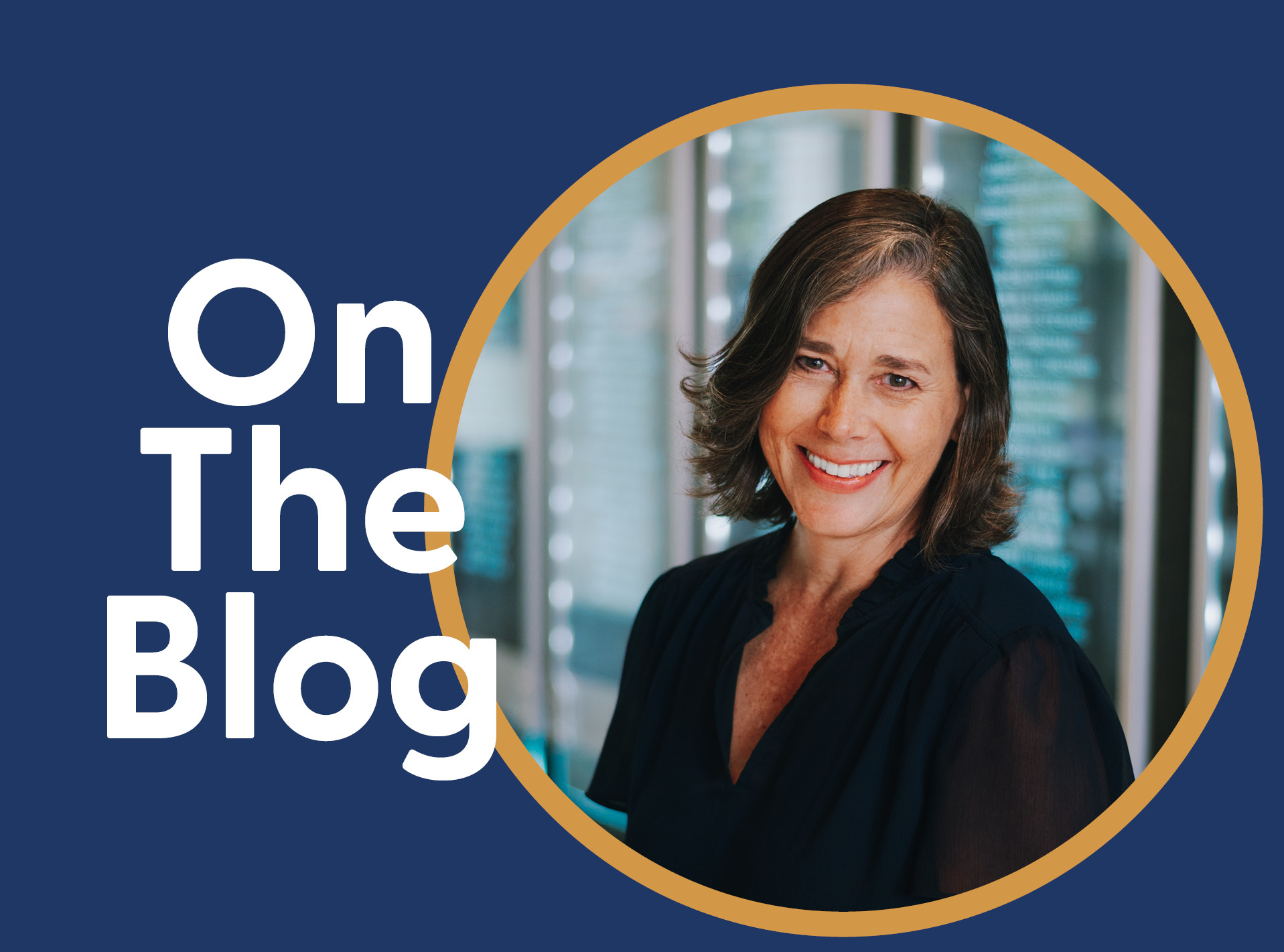
When I think about what makes Lincoln special, it’s not just our vibrant neighborhoods or quality of life—it’s how we show up for one another. We’re a community where people ask, “How can I help?” and then roll up their sleeves to do the work. That spirit is exactly what fuels Prosper Lincoln.
More than a decade ago, Lincoln Community Foundation convened civic, nonprofit and business leaders to commission Lincoln Vital Signs, a data-driven snapshot of our city’s strengths and challenges. What followed wasn’t just a report—it launched a movement. From that shared understanding emerged Prosper Lincoln, a community-wide effort grounded in listening, learning, and acting together.
Since then, Prosper Lincoln has united thousands of residents, organizations, and businesses around common priorities—from early childhood education to housing to building strong neighborhoods. The results speak for themselves.
In Belmont, parents, families, educators, city leaders, and students gather monthly to plan community events, elevate resident voices, and solve problems together. That’s what Connection looks like: neighbors coming together to create opportunities, whether it’s expanding access to the local pool or planning a “Summer of Fun” shaped entirely by resident feedback.
In the newly completed Foxtail Meadows neighborhood, families are now living in safe, stable homes built through a coordinated housing initiative supported by multiple public and private organizations. It's a model for what happens when we invest in Housing that meets real needs.
And at Northeast Family Center, Lincoln Littles is helping families overcome the high cost of childcare while strengthening the early childhood workforce. That’s the power of Early Childhood—when family well-being and education are supported together.
These stories remind us: change doesn’t happen in silos. It happens when we align around a shared vision, pool our resources, and keep showing up.
That’s why we’ve launched Prosper Lincoln 3.0—a renewed call to action guided by fresh insights from the 2025 Lincoln Vital Signs report and the voices of people across our city. Over the next five years, we’ll focus on:
- Connections: All people thrive through community engagement and social bonds.
- Housing: All residents live in quality housing they can afford.
- Early Childhood: All children flourish socially, emotionally, physically and educationally.
These priorities are deeply interconnected and essential to building a more vibrant, equitable Lincoln. From increasing access to affordable child care to fostering neighborhood resilience and belonging, Prosper Lincoln 3.0 challenges us to move forward together.
At Lincoln Community Foundation, our role is to convene, connect and catalyze. We don’t run every program, but we invest in the infrastructure and relationships that allow good ideas to grow—and we support the people closest to the work.
As Rev. Juan Carlos Huertas, a Foundation board member and leader within the Prosper Lincoln visioning team, said: “Hope increases with imagination.” We invite you to imagine a Lincoln where every child gets a strong start, every resident finds connection, and every household and family has a place to call home.
That vision starts with all of us. Let’s rise, shine, and Prosper—together.
Weighing the options: Private foundation or donor advised fund?
Published on May 21, 2025
When you’re working on the charitable components of a client’s estate or financial plan, one of the first areas you’ll likely explore is the structure. Certainly you are familiar with both private foundations and donor advised funds as useful charitable giving tools. Before you jump into one or the other for a particular client, though, it’s important to review the similarities and differences between the two so that you can best achieve your client’s goals.
To help you evaluate a client’s options, here are three common myths about the differences between private foundations and donor advised funds.
Myth #1: Donor advised funds are all the same and only private foundations can be customized
Private foundations will always differ from donor advised funds in important ways, not only because of their status as separate legal entities and the deductibility rules for gifts to these entities, but also because of the opportunities to customize governance. But it is a mistake to assume that a donor advised fund is a cookie-cutter vehicle. Indeed, “donor advised fund” is simply a term used to describe the structure of a fund and its relationship with a sponsoring organization such as Lincoln Community Foundation. The donor advised fund vehicle itself is extremely flexible. Here’s why:
– Donor advised funds are popular because they allow your client to make a tax-deductible transfer of cash or marketable securities that is immediately eligible for a charitable deduction. Then, your client can recommend gifts to favorite charities from the fund when the time is right.
– A donor advised fund at LCF is frequently a more effective choice than a donor advised fund offered through a financial institution. That’s because at LCF, your client is part of a community of giving and has opportunities to collaborate with other donors who share similar interests. Plus, Lincoln Community Foundation is itself local and is deeply knowledgeable about the needs of our community and the nonprofits meeting those needs.
– Lincoln Community Foundation can work with you and your client to build a charitable giving plan that extends for multiple future generations. That is because the Philanthropy Services Team at LCF supports your clients in strategic grant making, family philanthropy, and opportunities to learn about local issues and nonprofits making a difference.
Myth #2: Deciding whether to establish a donor advised fund or a private foundation mostly depends on size
The size of a donor advised fund, like the size of a private foundation, is unlimited. The United States’ largest private foundations are valued well into the billions of dollars. Information about private foundations, ironically, is not so private. The Internal Revenue Service provides public access to private foundations’ Form 990 tax returns. That is not the case for individual donor advised funds.
Similarly, donor advised funds are not subject to an upper limit. Although information on the asset size of individual donor advised funds is not publicly available, anecdotal information indicates that some donor advised funds' assets may total in the billions of dollars.
Indeed, a donor advised fund of any size can be an effective alternative to a private foundation, thanks to fewer expenses to establish and maintain, maximum tax benefits (higher deductibility limitations and fair market valuation for contributing hard-to-value assets), no excise taxes, and confidentiality (including the ability to grant anonymously to charities).
The net-net here is that the decision of whether to establish a donor advised fund or a private foundation–or both–is much less a function of size than it is other factors that are tied more closely to the objectives a client is trying to achieve.
Myth #3: Donor advised funds and private foundations are mutually exclusive
Make sure you’re aware of the benefits of using both a donor advised fund and a private foundation to accomplish clients’ charitable goals. For example:
– Donor advised funds can help meet the need for anonymity in certain grants, which is typically difficult using a private foundation on its own.
– A donor advised fund can receive a client’s gifts of highly-appreciated, nonmarketable assets such as closely-held stock and real estate, and benefit from favorable tax deduction rules not available for gifts to a private foundation.
– An integrated donor advised fund and private foundation approach can help a client balance and diversify investment and distribution strategies to ensure that giving to important causes remains steady even in market downturns.
Some private foundations are even considering transferring their assets to a donor advised fund at LCF to carry on the foundation’s mission. Terminating a private foundation and consolidating giving through a donor advised fund is sometimes the best alternative for a client when the day-to-day management and administration of the private foundation has become more time-consuming than expected and is taking time and focus away from nonprofits, the community, and making grants.
Along these lines, some families with private foundations find that the tax rules related to investments, distributions, and “self-dealing” have become harder to navigate and are perhaps even preventing the family from maximizing tax benefits of charitable giving. Finally, the administrative load of managing a private foundation sometimes becomes overwhelming, especially if the family members who handled these functions initially have retired, passed away, or simply become busy with other projects.
The bottom line here is that we encourage you to reach out us at LCF anytime you are evaluating how to structure a charitable giving plan to achieve both your client’s charitable goals and financial goals. We are here to help. In many cases, our tools and services are a great fit for your client’s needs. If not, we will point you in the right direction.
Philanthropy: It’s a marathon, not a sprint
Published on May 21, 2025
As 2025 continues to deliver twists and turns, it’s important to keep talking about philanthropy. Charitable giving is a vital strategy for your clients, even in times of economic uncertainty. Here are three trends to watch as you guide your clients through an unpredictable era and encourage them to look beyond the horizon.
Your clients still want to give
While overall giving may dip during economic downturns, most of your philanthropic clients will continue to support their favorite charities. Indeed, giving often rebounds quickly alongside economic recovery. Donor-advised funds, in particular, have shown resilience and even growth during economic shocks, providing a stable source of support for nonprofits and a flexible tool for your clients. This support is crucial because economic upheaval often increases community need, which in turn creates more demand for nonprofits’ services. Often, as was the case during the pandemic, donors rise to the occasion. By working with the community foundation, your clients can stay close to the tangible, local impact of their giving.
Legislation is still percolating
At the moment, key provisions of the Tax Cuts and Jobs Act (TCJA) are set to expire at the end of 2025, potentially impacting the charitable strategies you recommend to clients. Notably, though, on February 13, 2025, lawmakers in both the House and Senate introduced the Death Tax Repeal Act of 2025, aiming to permanently eliminate the federal estate tax and the federal generation-skipping transfer (GST) tax. Needless to say, if this act becomes law, the landscape of tax planning will change dramatically. On a happy note, under recently-proposed legislation, clients over the age of 70 ½ would be able to make Qualified Charitable Distributions to donor-advised funds at the community foundation. Under current law, eligible fund recipients of QCDs are limited to designated, field-of-interest, unrestricted, and similar funds.
Focus on the future
Some of your clients may be wondering just how much they can truly accomplish through philanthropy, especially right now. The answer is a lot. Sometimes called “big bet philanthropy,” strategies to leverage charitable dollars to tackle systemic social issues are becoming more popular. “Long-haul” initiatives require sustained commitment, collaboration, and capacity-building among both donors and the nonprofit organizations they support. Thanks to its mission to connect donors to community needs, the community foundation is in a unique position to work with your clients who want to pursue this form of charitable giving.
Please reach out to the team at the community foundation anytime. Even during economic upheaval, charitable giving remains a powerful tool for tax planning and durable community impact. Thank you for your continued work to help your clients maximize their positive influence on our community.
Give to Lincoln Day Breaks Records – Raises $9.5 Million for Local Nonprofits
Published on Jun 5, 2025
The 14th annual Give to Lincoln Day on May 29 raised $9.5 million for 502 local nonprofits – the highest amount raised in the event’s history and nearly $1M more than the year prior. Coordinated by the Lincoln Community Foundation (LCF), Give to Lincoln Day is an online event encouraging donations to support the local nonprofits and causes people care about. The funds are designated to help support charitable organizations that serve Lincoln and Lancaster County.
“Year after year, Give to Lincoln Day represents what makes this community special,” said Tracy Edgerton, LCF President. “Once again, Lincoln has stepped up to break records and uplift the important work of local nonprofits. This incredible display of generosity will open doors for a brighter future.”
All participating nonprofits will receive a proportional share of a $650,000 match fund based upon the organization’s percentage of the total dollars raised, provided by LCF and sponsors including Presenting Sponsor, West Gate Bank.
More than 27,000 donations were received for the 14th annual Give to Lincoln Day. The event has raised more than $75 million for local nonprofits in its 13-year history.
For more information and to see gifts received for each nonprofit, visit www.GiveToLincoln.com.
Sponsors Include: West Gate Bank (Presenting Sponsor), ABC Electric, ALLO Fiber, Assurity Life Foundation, Rich Bailey, The Hsin & Chao Families, D.A. Davidson & Co., Davis Design, Firespring, Frontier Bank, Kile & Cuz Johnson, Kawasaki Motors Manufacturing Corp., Kubly Family Foundation, Mail Management Services, Inc., JoAnn & Derrel Martin, The Family of J. Gates & Daisy Minnick, William J. Mueller & Kim M. Robak, Olsson, Pepsi Cola of Lincoln, Pinnacle Bank, Runza National, Joe W. & Ruth K. Seacrest Fund, Tom & Lisa Smith, Dr. Gene & Kristen Stohs, Talent Plus Inc, The Estate of Mark H. Tallman, Bill & Mae Whitmer Family Fund and WRK Family Foundation.
The Lincoln Community Foundation, established in 1955, strives to continually enrich the Lincoln community by promoting and achieving perpetual philanthropic support. The Foundation has distributed more than $255 million in grants to nonprofit organizations that have improved the lives of thousands of residents.
Generational Shifts: Fulfilling clients' charitable wishes
Published on May 21, 2025
by Sandi Hansen, Vice President for Philanthropy Services
Chances are, you’ve already begun to notice that a major transfer of wealth is happening as your Baby Boomer clients establish financial and estate plans to pass their wealth to their Gen X and Millennial children.
The dollars involved are eye-popping. Most attorneys, financial advisors, and CPAs have seen the Cerulli study’s estimate that $124 trillion in wealth in the U.S. will transfer through 2048. The research estimates that most of this wealth–$105 trillion–will pass directly to children, grandchildren, and other heirs. And, notably, the study estimates that $18 trillion will flow to philanthropy. And check out the numbers for Nebraska. From our friends at the Nebraska Community Foundation in their recent report, over the next ten years, $100 billion will transfer to succeeding generations, and $950 billion will transfer over the next 50 years. www.nebcommfound.org/transfer-of-wealth
As the transfer of wealth gains momentum, advisors have a major opportunity to position themselves as trusted experts who can help clients not only structure efficient lifetime and estate gifts to heirs but also help ensure that clients’ charitable wishes are achieved. It’s crucial for advisors to know that Lincoln Community Foundation is here to help incorporate philanthropy into clients’ financial and estate plans.
Here’s why this is so important:
– There’s a knowledge gap. Clients may not be aware of the options and benefits of charitable planning. Even many of your affluent clients may still be writing checks to their favorite charities, not realizing that gifts of appreciated stock, for example, can be more tax-efficient, and that tools at LCF, such as donor advised funds, can be incredibly useful.
– Next-level strategies are key. Your ultra-wealthy clients will likely need to implement sophisticated strategies for transferring assets smoothly and tax-efficiently. Clients want to maximize the results of their charitable gifts while also protecting their families' interests. Leaning on the Foundation to help structure gifts of complex assets, such as closely-held business interests, can make a huge difference in reducing a client’s tax bill and achieving meaningful community impact.
– Legacy planning starts now. It’s tempting to put off addressing a client’s wishes to support favorite charities in an estate plan. “We’ll look at that in a few years,” is a common but less-than-ideal approach. That’s because charitable bequests are best addressed as part of a comprehensive estate and financial plan. Naming a fund at Lincoln Community Foundation as the beneficiary of a client’s IRA, for example, is an extremely tax-efficient way to accomplish charitable wishes.
Our Philanthropy Services Team is here to augment your expertise in charitable giving strategies. Not only will you be better able to meet clients’ needs, but you’ll also strengthen relationships and improve client retention. Please reach out to learn more about how LCF can help your clients make a lasting impact with their wealth while achieving their financial goals.
Ways to Help: Texas Flooding Relief
Published on Jul 7, 2025As our country faces the aftermath of another devastating storm, many are looking for ways to offer help and hope for those in the wake of the flash flooding in Texas. We wanted to share a few of the many funds set up to help with emergency food, shelter, clothing, medical treatment and more.
Community Foundation of the Texas Hill Country – Kerr County Flood Relief Fund – supporting local recovery efforts in one of the hardest-hit regions.
San Antonio Food Bank – providing food and supplies to families in crisis.
American Red Cross Disaster Relief Fund – offering shelter, supplies and mental health support to those displaced by the disaster.
Center for Disaster Philanthropy – providing guidance and coordinated funding for long-term recovery.
San Angelo Disaster Relief Fund - providing financial support to flood victims in San Angelo and surrounding areas.
If you would like to utilize your donor advised fund at the Lincoln Community Foundation to recommend a grant to any of the organizations above, or other qualified nonprofits helping with this emergency, login to our donor portal. If you have any questions, please contact our Philanthropy Services Team at 402-474-2345.
One Big Beautiful Bill Act: Three Insights for Philanthropy
Published on Jul 11, 2025The One Big Beautiful Bill Act was signed into law by President Trump on July 4, 2025, after the House of Representatives approved the Senate’s changes to H.R. 1, which passed the House by a narrow margin in May.
The OBBBA, with nearly 900 pages of provisions, reshapes policy across major sectors of the U.S. economy. Included in the OBBBA are several provisions that impact philanthropy.
Three major takeaways are of particular importance as the Lincoln Community Foundation helps donors, fund holders, and nonprofits–as well as attorneys, CPAs, and financial advisors–navigate charitable planning opportunities over the months and years ahead.
(Notably, the OBBBA omits several provisions that appeared in previous versions of the legislation, such as a proposed increase to the net investment income tax on private foundations.)
Insight #1: Standard deduction goes higher
What’s in the OBBBA?
The new law makes permanent the standard deduction increases under the Tax Cuts and Jobs Act of 2017 (TCJA), increasing the standard deduction for 2025 to $15,750 for single filers and $31,500 to taxpayers who are married and filing jointly. The new law also expands the “bonus” deduction for taxpayers 65 and older through 2028.
What’s more, under the new law, individuals who itemize may take charitable deductions only to the extent the charitable deductions exceed 0.5% of adjusted gross income.
Furthermore, taxpayers in the top bracket can only claim a 35 percent tax deduction for charitable gifts instead of the full 37 percent that would otherwise apply to their income tax rate. Note also that the final bill permanently extended the 60% of adjusted gross income contribution limitation for cash gifts made to certain qualifying charities.
What does this mean for charitable giving?
With even fewer taxpayers eligible to itemize, and deductions capped for high-income earners, we’re likely to see a continuation of the chilling effect on charitable giving that occurred in the wake of the TCJA.
What can you do?
If you regularly support charities, it’s important to continue to do so whether or not you’re benefiting from a tax deduction. Our community needs you, now more than ever. If you’re a nonprofit, or if you’re an attorney, CPA, or financial advisor who works with charitable clients, remember that people do not give to charity solely to secure a tax deduction. Keep in mind that many other factors motivate charitable giving, and philanthropy is an important priority for many families. (This article in the Stanford Social Innovation Review has stood the test of time.)
Insight #2: Deduction for non-itemizers
What’s in the OBBA?
The new law includes a provision, effective after 2025, allowing non-itemizers to take a charitable deduction of $1,000 for single filers and $2,000 for taxpayers who are married and filing jointly. As has been the case in the past, gifts to donor advised funds are not eligible. Unlike a previous (but smaller) similar provision, though, this law is not set to sunset.
What does this mean for charitable giving?
After the TCJA went into effect, households that itemize deductions dropped to under 10%. Parallel to this trend, the number of U.S. adults who give to charity in any given year has dropped over the last 20 years from nearly two-thirds to less than half, according to some studies. Against this backdrop, the OBBBA’s deduction for non-itemizers has the potential to re-motivate charitable giving among a significant number of households.
What can you do?
For everyone, now is the time to take a serious look at your charitable giving plans to support the causes you care about over the years ahead, especially if you are early in your career and not yet itemizing deductions. If you’ve already established a fund or you’re working with LCF in another way, please reach out to learn how we can help you make the most of the new tax laws, and even get your children and grandchildren involved. If you’re a nonprofit, now is the time to attract and engage brand new donors. And if you’re an attorney, CPA, or financial advisor, make sure you talk about charitable giving with your clients who don’t itemize; a $1000 or $2000 deduction could be just the motivation they need to begin a journey of philanthropy.
Insight#3: No sunsetting estate tax exemption
What’s in the OBBA?
For affluent taxpayers updating financial and estate plans, and for the attorneys, CPAs, and wealth managers advising them, the last couple of years have been a roller coaster because of the looming possibility that the TCJA’s increase to the estate tax exemption would sunset at the end of 2025. Finally, there is clarity: Under the OBBBA, the sunset will not happen.
The new law makes permanent the increase in the unified credit and generation-skipping transfer tax exemption threshold. The 2025 exemption is $13.99 million for single filers and $27.98 million married filing jointly. In 2026, these numbers increase to $15 million and $30 million respectively.
What does this mean for charitable giving?
Purely estate tax-based incentives to give to charity continue to apply only to the ultra-wealthy, likely resulting in a continuation of the taxpayer behavior triggered by the TCJA. In other words, most people will give to charity during their lifetimes and in their estates for reasons other than a tax deduction.
What can you do?
There is no guarantee that the estate tax exemption will stay high forever. As families work with their tax and estate planning advisors, many are viewing the next two years as an important window to plan ahead. The upshot of the new law is that high net-worth taxpayers now have more time to thoughtfully consider estate planning strategies, including charitable giving. For nonprofit organizations, this means continuing to focus on long-term planned giving strategies is wise.
Questions?
The Philanthropy Services Team at LCF is here to help. Give us a call at 402-474-2345 or contact us through our website.
This article is provided for informational purposes only. It is not intended as legal, accounting, or financial planning advice.
Rediscovering Purpose Through Giving in Retirement
Published on Jul 25, 2025
by Rhonda Page
If you’ve recently retired, you may be figuring out the ideal balance of activities. If you’ve been retired for several years, you might be exploring what brings you the most meaning and fulfillment.
Time and again, research shows us that finding purpose is essential to a happy and satisfying retirement. Consider the following:
- - A large-scale, longitudinal study using data from 13,770 older adults, found that those with a higher sense of purpose were significantly less likely to develop unhealthy behaviors.
- - Other research using a nationally representative panel of over 8,000 American adults determined that, contrary to some beliefs, retirement can actually increase a person's sense of purpose.
- - A cross-sectional study of nearly 2,000 adults found that a strong sense of purpose is significantly associated with lower rates of depression and anxiety in both retirees and non-retirees.
Retirement offers a unique opportunity to rediscover your sense of purpose beyond the boundaries of a traditional career. LCF’s Philanthropy Services team and charitable tools can support you on this journey. Here’s how:
Check in on tax planning
We can work with you and your tax advisors to ensure your charitable giving aligns with your estate and financial plan to achieve the impact you’re seeking. For example, we can help explore whether “bunching” charitable donations in higher-income years might allow you to exceed the itemization threshold, while using your donor advised fund to support your favorite causes steadily over time.
If you’re 70 ½ or older, we can help evaluate whether tax-free transfers - up to $108,000 in 2025 - from your IRA directly to a designated, unrestricted, or field-of-interest fund at LCF would be an effective planning strategy for your situation.
Involve the next generation
Many retirees have more time to include children, grandchildren or close friends in their personal charitable activities. Our team can work alongside you and your advisors to name family members as current or successor advisors to your donor advised fund. Together, you can participate in site visits and attend educational events - strengthening family bonds while building a legacy of generosity across generations.
Our staff can help you identify ways to include children and grandchildren in site visits to favorite charities and participate in education sessions about community needs and the nonprofits that are making a difference for people who live in our community.
Build a legacy
As Lincoln continues to grow and evolve, so do the needs of our community. Including philanthropy in your estate plan is a powerful way to create a meaningful legacy rooted in generosity and care.
Many individuals choose to update their estate plans after retiring. As you work with your professional advisors, consider incorporating a gift in your estate plan that will allow your charitable legacy to live on for generations. This can provide significant tax advantages and ensure your charitable vision continues into the future. Whether you’d like to establish a permanent endowment to support the community’s greatest needs or provide support for LCF’s mission and operations, we are here to help design a plan that reflects your values.
You can also name your donor advised fund as an estate beneficiary, and your children and grandchildren can then serve as advisors to the fund, continuing your charitable legacy in the family’s name.
We look forward to working with you throughout your retirement years to ensure that your vision for the community is fulfilled through the power of giving. Please reach out to us anytime at 402-474-2345.
Donor Profile: Betsy Grindlay
Published on Aug 12, 2025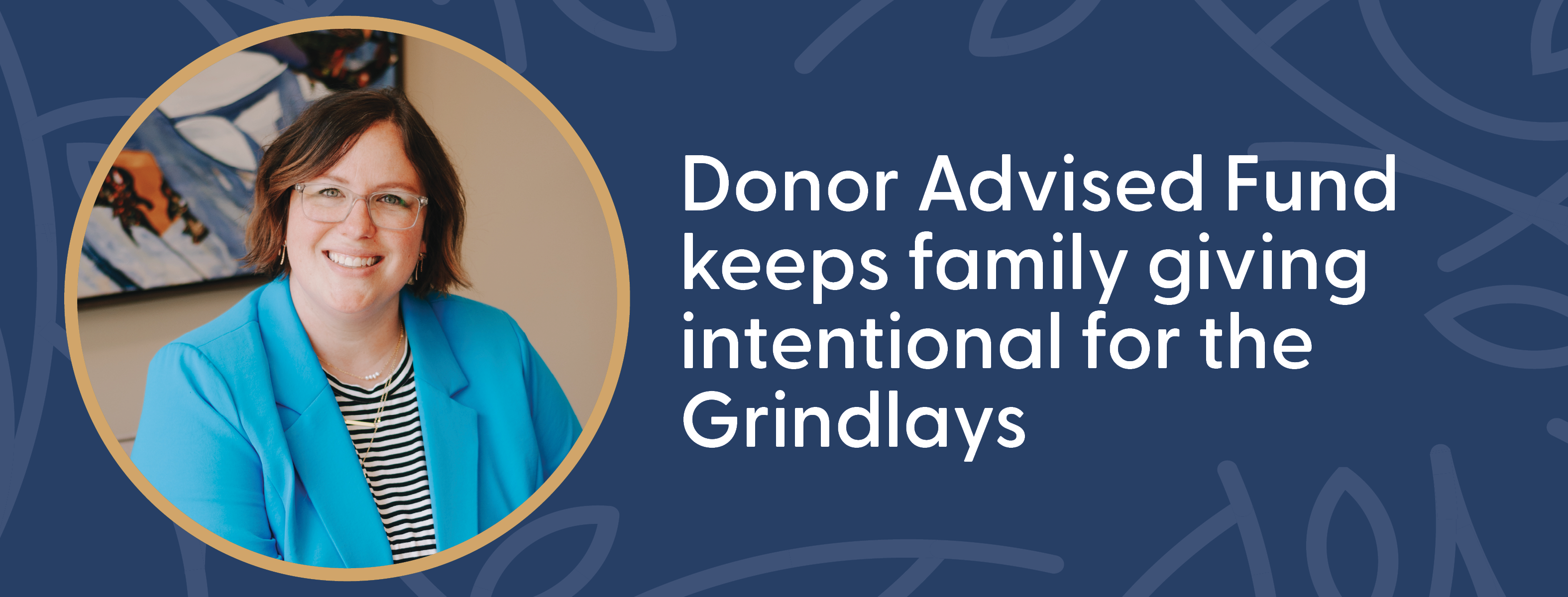
By Justy Gortemaker
For Betsy Grindlay, giving back to her community isn’t something reserved for someday – it’s woven into the everyday.
“I love the feeling of our big, small town – including the unexpected run-ins in the produce aisle,” she said. “There’s this shared sense of responsibility to make this place better for each other.”
A Lincoln native, Betsy has always felt connected to the rhythm of the Capital City. She works in marketing and operations at her family’s business, Speedway Motors, but the daily routine of raising two young kids also keeps her and her husband, Jarrett, on their toes.
“We’re currently in the stage of diapers, swim lessons, sidewalk chalk and sticky hands,” she laughed.
As the couple juggles work, family and a freezer full of popsicles, they’re also quietly building a legacy – one that’s rooted in gratitude, fueled by intention and shining a light for the next generation of Lincoln givers.
The Grindlays recently took the next step in their giving journey by opening a Donor Advised Fund (DAF) at Lincoln Community Foundation.
Their decision reflects not just commitment to community but a hope to inspire others to prioritize giving as well.
Betsy’s introduction to philanthropy began in a quiet but consistent way.
“Every week at church, my mom would write a check, and one of us kids got to put it in the offering bowl,” she shared. “It was a visible act of giving – nothing flashy, just a steady message that this is who we are. We’re a family that gives.”
Now raising a family of their own, Betsy and Jarrett are focused on passing on those same values.
“We live here, we give here,” Betsy said.
One of the ways they have paved their own philanthropic path is through Lincoln’s One Big Day of Giving. They have supported Give to Lincoln Day for years, and Betsy admits it continues to energize her.
“It’s a way to give in one unified place and the nonprofits do such a great job showcasing their unique missions and plans for each contribution,” she said. “I know people who check the leaderboard and support the nonprofits near the bottom to help spread the love. It’s one day where it feels like we’re all working together to do something magical for our community.”
One of her favorite Give to Lincoln Day traditions is “crowdsourcing” through her personal Facebook page, inviting her friends to share the nonprofits they support and why.
“Hearing someone say, ‘this one helped my family,’ or ‘this organization supports kids in a way that’s really meaningful to me’ turns giving into a conversation.”
And it’s that spirit that ultimately inspired the couple to open a Donor Advised Fund – just in time for Give to Lincoln Day.
With the guidance of their financial advisor, Blake Anderson at Pittenger & Anderson, Betsy and Jarrett began exploring options for more intentional charitable contributions.
“Blake knew it was important to us to keep our support local, and he encouraged us to look into a DAF through LCF to make sure that happened,” she explained. “Once we realized it could help us plan in a way that was thoughtful, strategic and community-focused, it was a no-brainer.”
The process, she said, couldn’t have been easier.
“I filled out an online form and immediately got an email back from Rhonda Page at LCF that laid everything out. She even anticipated questions I might have in the future. It made me feel like, ‘Okay, I can do this.’”
One of Betsy’s biggest hopes is that more people will begin to see philanthropy as something within reach and meaningful now.
“It doesn’t matter if you’re giving $5 or $5,000 – it all makes a difference,” she said. “I remind myself often that there are seasons of less and seasons of more, but it’s the consistency that matters.”
She also emphasized that giving is about the example you set.
“I want to live a legacy of giving, not just leave one,” she said. “Right now, that means teaching my daughters to share toys. Someday, I hope that grows into a mindset of generosity and empathy that they carry with them into adulthood.”
Betsy is already thinking about the long-term impact their fund can have.
“There’s something powerful in thinking about your legacy while you’re still building your life,” she said. “We don’t know what the future holds, but we can still plan to make a difference in it.”
The Grindlays’ story is a reminder that philanthropy isn’t about waiting for perfection; it’s about participation.
“To anyone thinking about opening a DAF – just start,” she said. “It’s easier than you think, it feels better than you expect and it matters more than you’ll ever know.”
Simplify Your Giving
A Donor Advised Fund (DAF) is a popular and convenient tool that simplifies annual giving and recordkeeping. This type of fund helps you control the timing of gifts because you may take the tax deduction when you make a gift to your fund. Then you can recommend charitable donations whenever you wish, whether it’s monthly, annually or any time in the future.
DAFs at LCF help folks accomplish their charitable goals in Lincoln and beyond, offering flexible giving options with top-notch personal assistance and expertise. Charitable giving should be fulfilling, inspiring and fun – and that is possible when you work with a team who knows your name and keeps your philanthropic passions at the heart of everything we do.
Ready to learn more about a Donor Advised Fund at LCF? Contact Susan Crotteau at 402-474-2345 or susanc@lcf.org.
Timing is everything: Mapping out clients’ 2025 charitable giving plans
Published on Aug 13, 2025by Chip DeBuse, Vice President for Development, Legacy Planning
It’s never been easy to navigate the ever-shifting tax rules to help clients structure charitable gifts, and now it’s even trickier. Major changes under the One Big Beautiful Bill Act (OBBBA), signed into law on July 4, 2025, are creating complexity, opportunity, and, for some, urgency. The OBBBA reshapes both how much a client can deduct for charitable contributions and which clients can benefit from these deductions in the first place. Indeed, your clients might have read a recent Wall Street Journal article (subscription required) outlining major tax planning themes related to charitable giving.
As always, the team at Lincoln Community Foundation is honored to be your first call when the topic of charitable giving arises in client conversations. In most cases, our tools can be useful, and if we can’t help directly, we’ll point you in the right direction.
Here are three key issues to discuss with philanthropic clients:
Evaluate whether the client could benefit from “bunching” charitable contributions in 2025
Many advisors are recommending that their clients address head on the One Big Beautiful Bill Act’s expansion of the standard deduction—$15,750 for single filers and $31,500 for married couples in 2025, with even higher levels for taxpayers aged 65 and older. A technique known as “bunching” charitable donations can be particularly useful. For example, if a client typically donates $12,000 each year to charity, but the client’s other deductions do not push them over the standard deduction, the client could give $36,000 (three years' worth of gifts) to a donor advised fund at LCF in 2025. The idea is that the client can combine this gift with other deductions to substantially exceed the standard deduction, allowing the client to itemize and claim a much greater deduction for that year. Over the following two years, the client can take the standard deduction and lean on the donor advised fund to distribute funds to favorite charities.
Note that the higher standard deduction will likely impact tax-motivated charitable giving, even with the expected uptick in the number of itemizers thanks to the OBBBA’s new state and local tax deduction allowances (subscription required to the Wall Street Journal).
Look ahead to 2026 as you help clients plan for 2025
For your clients who continue to itemize deductions, 2026 will bring even further changes. Only charitable donations exceeding 0.5% of AGI will be deductible. For example, a couple with $225,000 in AGI would see their deductible charitable amount reduced by $1,125 per year. Although clients who are large-scale donors may find this change proportionately less impactful, clients making moderate or smaller-sized gifts might see a significant reduction in their eligible deductions. What’s more, under the OBBBA, high-income taxpayers will see their maximum tax benefit from charitable deductions calculated at a top marginal rate of 35%, down from 37%, starting in 2026.
These changes may prompt higher-income clients to lean heavily on bunching strategies in 2025 to maximize current tax advantages before stricter limits kick in.
Watch the fine print on the charitable deduction for non-itemizers
Under the OBBBA, starting in 2026, taxpayers who take the standard deduction will be able to claim a direct deduction for charitable giving—up to $1,000 for single filers and $2,000 for married couples filing jointly. This provision mirrors temporary measures seen during the COVID-19 pandemic. Crucially, the deduction is limited to cash gifts made directly to qualified charities; donations of property or stock, and contributions to donor advised funds, do not qualify. For the estimated 100 million Americans who do not itemize, which likely includes many of your clients, this provision is certainly good news. That said, gifts of appreciated stock and donor advised funds are tax-effective and convenient charitable giving vehicles, and many clients may be disappointed that they can’t deploy these techniques to take advantage of this new deduction.
2025 certainly is shaping up to be an important year for helping your clients plan their charitable gifts. Please reach out to our team to explore ways to leverage the community foundation’s tools, including establishing your client’s donor advised fund to take advantage of bunching. And of course, always remember that regardless of the tax implications, your clients’ philanthropy addresses vital community needs—and this is a motivator that transcends any deduction.
Summer 2025 Newsletter
Published on Aug 22, 2025To catch up on the latest Lincoln Community Foundation happenings click here to download the newsletter.
Back to school: Expanding support for education
Published on Aug 22, 2025
By Trish Reimer, Grants and Scholarship Manager
August is here which means it’s time for back-to-school! If education is on your mind, you’re in good company.
In 2024, charitable giving to education rose to more than $58 billion. If related causes are close to your heart, the dedicated team at Lincoln Community Foundation can help you explore a variety of purposeful ways to make a difference now and in the future.
Direct your gift to student success
Selecting a nonprofit, such as a school foundation, as a recipient of a designated fund can also leave a lasting impact. Many school districts have supporting foundations that benefit students from early childhood through high school graduation. School foundations or other youth-centered nonprofits fund enrichment programs, scholarships or even provide emergency assistance that helps low-income students and their families.
Find your education “niche”
By establishing a field-of-interest fund at LCF, you can work with our team to identify specific parameters that you’d like to fund. Charitable funding that enhances children and youth development creates ripple effects across classrooms and generations of learners.
For example, you may be interested in supporting programs that offer tutoring and mentorship. You may choose to support nonprofits who provide enrichment education in music, art, theater or STEM opportunities. Or, you may decide to direct your charitable dollars to quality early childhood programs, which research shows can have a profound and lasting positive impact on a child’s future. Together, we can identify an area of focus that aligns with your goals.
Scholarships – a traditional approach
Of course, a scholarship fund is a familiar and traditional philanthropic tool. The Lincoln Community Foundation currently manages more than 90 scholarship funds and awarded more than $606,000 to 299 recipients in 2025.
Most recently, the establishment of the LCF Student Success Scholarship has provided a vehicle that allows like-minded donors to pool their resources to provide flexible, meaningful, renewable scholarship awards that lead to degree completion.
For example, donors Carol van Rossum and her late husband, Chuck, made a thoughtful decision to use their named scholarship fund and participate in the new Student Success Scholarship program. The van Rossum Scholarship fund, along with seven other scholarship funds, partnered to disburse significant awards in 2024, providing five students with amounts up to $5,000 per student – with an opportunity to renew the award for up to four years ($20,000 total). You can read Chuck and Carol’s story here.
LCF is happy to facilitate a dialogue with you to structure your funding – whether through a scholarship fund or other types of support – to fill gaps in student need. As students head back to school and education is top of mind, we are here to make sure your giving is effective, strategic and in line with your philanthropic goals.
Questions? We’re here to help! Reach out at 402-474-2345 or trishr@lcf.org.
Lincoln Community Foundation grants more than $1.8 Million
Published on Aug 28, 2025Thanks to the foresight of many generous donors, Lincoln Community Foundation made grants in August of $1,838,100 for 223 nonprofit organizations. These grants came from endowed funds created by individual donors to support their favorite nonprofits and houses of worship. Endowed funds provide annual financial support to the organizations specified by the donors, helping both the community and the nonprofits grow and thrive.
“It is a great honor to serve as a connector between donors and the charities they wish to support forever,” said President Tracy Edgerton. “These gifts will continue to grow through the power of endowment and sage financial management and investment by our team.”
Through partnerships and collaboration, Lincoln Community Foundation facilitates positive change for the common good. Since 1955, the Foundation has been privileged to be part of many wonderful legacies by connecting donor generosity to local needs. The Foundation has distributed more than $255 million in grants to nonprofit organizations that improve the lives of Lincoln’s residents. Lincoln Community Foundation is accredited by the National Standards for U.S. Community Foundations®. Learn more at www.LCF.org.
Lincoln Community Foundation 2024 Open Door Grants
Published on Aug 28, 2025The Lincoln Community Foundation distributes community grants to local nonprofit organizations through Open Door Grants. These grants are made possible by contributions from the Lincoln Forever Fund and from LCF donor endowment funds. The following organizations received grant dollars in the specified quarter during 2024.
Lincoln Community Foundation Awards $163,500 in Q4 2024 to Support 25 Local Nonprofits
Big Brothers Big Sisters of the Midlands
Operating support
Fresh Start
Operating support
Lincoln Medical Education Partnership
The Market, which provides diapers and personal hygience products for LMEP's patients
Mercy Housing Midwest
Resident Services Program at Western Manor and Northglen Apartments
The Nebraska Communities Playhouse
New youth programming - Young Artists Collective-Hickman Theater
Big Gumdrop Outdoors
Operating support
Bryan Foundation
Funding for 350 lockboxes for weapons
Center for People
Operating support
CenterPointe
Crisis Response staffing and programming
Civic Nebraska
Salaries for two community organizers with Collective Impact Lincoln
Clinic With a Heart
Operating support
Foster Care Closet
Operating support
Friends of Lied - Lied Center for the Performing Arts
“Around the Americas,” featuring bilingual songs, books, movement, and sensory-friendly performances
Legal Aid of Nebraska
Operating support for Lancaster County services
Lincoln Housing Charities
House-build by residential construction class at Northeast HS
Lincoln Literacy
Operating support
Lincoln's Symphony Orchestra
Operating support
Military & Veteran Success Center
Funding and expansion of tutoring services
Museum of American Speed
Operating support
Nebraska Appleseed
Community engagement and advocacy work to promote affordable housing
Planned Parenthood of the Heartland
Sex education programming in Lancaster County
Ponca Economic Development Corporation
Workforce development programming
We Can Do This
Purchase food and provide weekend meals to children at Belmont Community Center
Willard Community Center
Operating support
YMCA of Lincoln
Operating support
____________________________________________________________
Lincoln Community Foundation Awards $162,100 in Q3 2024 to Support 27 Local Nonprofits
ACLU of Nebraska
Voting rights restoration work
Asian Community & Cultural Center
Essential Resources Program which serves immigrant and refugee families in Lincoln
Barnabas Community
Operating support
BraveBe Child Advocacy Center
Operating support
Camp Floyd Rogers
Scholarships for diabetic children attending camp
Citizens for Improved Transit
Purchase of bus passes for low-income individuals
Flatwater Free Press
2024 Flatwater Festival
Girls on the Run of Nebraska
Program support in LPS Title 1 schools
Intertribal Medicine Collective
Operating support
I've Got A Name
Operating support
Lincoln Arts Council
Mayor's Arts Awards support
Lincoln Community Playhouse
Operating support
Lincoln Homeless Coalition
2024 Project Connect
Lincoln Littles
Emergency equipment for childcare providers and staff development
Lincoln Sports Foundation
Operational costs for irrigating grass fields
Linked2Literacy
Operating support
Lutheran Family Services
Kinship Navigator Program for Lancaster County families
MilkWorks
Operating support
Nebraska Diaper Bank
Diaper procurement and distribution in Lancaster County
Nebraska Housing Developers Association
Support for RentWise - a Renter and Housing Provider Community Education tool
Nebraska Writers Collective
All Writes Reserved and Visiting Writers Series programming in Lancaster County
ROAM Share (dba BikeLNK)
Operating support
Tabitha
Support for Meals on Wheels program
United Way of Lincoln and Lancaster County
Support for VolunteerLNK
Visionary Youth
Community Impact Program
Voices of Hope
Operating support
Wachiska Audubon Society
Operating support
____________________________________________________________
Lincoln Community Foundation Awards $275,271 in Q2 2024 to Support 23 Local Nonprofits
Asian Community Cultural Center
Welcoming Week 2024 - New Americans Task Force
Boy Scouts of America, Cornhusker Council
Afterschool ScoutReach programming through CLCs
Boys & Girls Clubs of Lincoln/Lancaster County
Expansion at North Star High School to house aviation program and Boys & Girls Club programs
Community Action Partnership of Lancaster and Saunders Counties
Renovation of Head Start Center on K Street
Cultural Centers of Lincoln
Capital campaign to build new facility
Family Health Services
Operating support for Lancaster County services
Foundation for Lincoln Public Schools
Adaptive communication devices for LPS students
Good Neighbor Community Center
Operating support
HopeSpoke
Operating support
Madonna Foundation
Adaptive communication devices
Malone Community Center
Capital campaign to build new facility
Nebraska State Historical Society Foundation
Support for reinstallation of Pershing Mural at Wyuka Park
Southern Heights Food Forest
Funding for outdoor classroom and summer programming
Atlas Lincoln
Operating support
Girls Inc. of Lincoln
Eureka!, a STEM-focused college and career cohort program
Partnership for a Healthy Lincoln
Community Breastfeeding Educator program
Immigrant Legal Center + Refugee Empowerment Center (ILC+REC)
Refugee resettlement services in Lincoln including legal representation and social work services
Lincoln Fencing Club
Purchase of regulation, portable competitive braces for para-fencing participants
Live Yes Studios
Operating support
Rabble Mill (The Bay)
Operating support
RISE Academy
Operating support
Branched Oak Observatory
Construction of dual domed observatory
Sunday Farmers Market at College View
Support for marketing activities for the Market
____________________________________________________________
Lincoln Community Foundation Awards $143,325 in Q1 2024 to Support 23 Local Nonprofits
Asian Community & Cultural Center
CareerLadder program for an intensive English class for foreign-trained teachers
Blixt Arts Lab
Support for FOSTER, a play focusing on early childhood education
Jazz in June
Sponsorship of 2024 season
CEDARS Youth Services
Equipment for maintenance facilities staff
Center for Legal Immigration Assistance
Operating support
Children's Nebraska Foundation
Project ADAM to provide AEDs in Lincoln schools
Family Service WIC
Diapers for clients who attend Spring Baby Shower
Food Fort
Bus repairs
Foundation for Lincoln Public Schools
Spark Summer Learning scholarships
Lighthouse
Operating support
Lincoln Children's Museum
Museums for All program - subsidized admission rates for qualifying families
Lincoln Flying Disc Club
Bethany Beginners Disc Golf Course
Lincoln International FC
Operating support
Lincoln Lancaster County Genealogical Society
Transcription and preservation of Lincoln neighborhood oral histories into a digital format
Madonna Foundation
Renovations for nursing facility
Malone Community Center
Relocation expenses during capital project
Meadowlark Music Festival
Support for 2024 season
Nebraska Jazz Orchestra
April concert for community
Lincoln Hygiene Network
Operating support
Sadie Dog Fund
Veterinary care for dogs from underresourced families
The Bridge Behavioral Health
Replacement of an HVAC unit
The Indian Center
Operating support
Yazda- Yazidi Cultural Center
Operating support
A note from Chip
Published on Sep 3, 2025 My first day with Lincoln Community Foundation was appropriately Give to Lincoln Day – May 16, 2013.
My first day with Lincoln Community Foundation was appropriately Give to Lincoln Day – May 16, 2013.
After much consideration – and 12 Give to Lincoln Days later – I have decided to retire from the Lincoln Community Foundation at the end of 2025.
I have been privileged to be invited into the lives of donors and their families as they consider how best to leave their mark on Lincoln. It has been a great honor to work alongside many dedicated legal and financial advisors as they assist their clients in crafting their charitable legacies.
I have been fortunate to assist with countless agreements for donor advised funds, field-of-interest funds, permanent and term endowments and personalized legacy plans these past dozen years. It has been a joy to have the opportunity to work with the staff and leadership of so many nonprofit organizations in their important work supporting our community.
I have been part of Lincoln Vital Signs, three iterations of Prosper Lincoln, the South of Downtown Community Development Organization, the inaugural LCF Chartered Advisor in Philanthropy program and more in my role at LCF and as a member of the community.
I am grateful for these opportunities.
Thanks to you – LCF has grown its assets and, more importantly, its reach within the community. I have been proud to be part of this incredible growth and pleased to be part of LCF’s thoughtful, professional team.
What comes next? I’m still working that out, but it will certainly involve more golf and our grandchildren.
What I am certain of is that LCF will continue to grow and thrive. My talented colleagues with the Philanthropy Services team – Sandi Hansen, Susan Crotteau and Rhonda Page – will be here for you every step of the way during this transition.
In the meantime, I will continue to be a charitable resource for you through the end of the year. Should you have any questions, please don’t hesitate to reach out at 402-474-2345.
I want to extend my gratitude to this organization, its donors, the many dedicated members of our board of directors and the advisor community for making my years at LCF so enjoyable. What a ride it’s been!
Tongue twister: OBBBA, IRAs, QCDs, and FAQs
Published on Sep 10, 2025by Susan Crotteau, Director of Planned Giving
If your head is spinning, it’s for a good reason! Let’s face it–the rules for using IRAs to give to charity were complicated before the OBBBA got thrown into the mix. Let’s address five frequently asked questions we’ve been hearing from attorneys, CPAs, and financial advisors as you counsel your charitable clients.
“I have a lot of clients who are 70 ½ and older. I know the new tax laws are a big deal. Did the rules change for Qualified Charitable Distributions?”
This is a great question, and it’s super important. The short answer is no–the One Big Beautiful Bill Act did not directly change the IRS’s rules for Qualified Charitable Distributions, or “QCDs.” Through a QCD, a taxpayer who is over the age of 70 ½ can direct up to $108,000 (2025 limit) from an IRA to an eligible charity, including some types of funds at the Lincoln Community Foundation.
“I can tell there’s more to the story. What else should I know to best guide my clients who are 70½ and older?”
We are glad you asked! QCDs are even more tax-savvy after the One Big Beautiful Bill Act because they bypass the new 0.5% adjusted gross income floor that will apply to itemized charitable deductions starting in 2026. Unlike other gifts, QCDs also avoid the 35% cap on deduction value for high-income taxpayers, preserving their full tax benefit. Because they reduce taxable income directly without requiring itemization, QCDs provide retirees a simple, consistent way to maximize charitable impact in a more restrictive tax environment.
“When should I call the Lincoln Community Foundation if I have a client who is a good candidate for a QCD?”
Anytime! Several types of funds at LCF are eligible recipients of Qualified Charitable Distributions, including field-of-interest funds, designated funds, and unrestricted funds. Although your client’s donor advised fund is not a permissible QCD recipient under IRS rules, our team is happy to work with you and your client to establish another type of fund alongside an existing donor advised fund and set in motion an overall strategy that meets both the client’s financial and estate planning goals as well as the client’s goals for community impact. And remember, QCDs are eligible gifts for Give To Lincoln Day each May. Have your clients call our Philanthropy Services Team next April to get ready to support their favorite local nonprofits.
“Remind me again why IRAs are such powerful legacy gifts to charity?”
Clearly, IRAs are tax-savvy savings vehicles during a client’s lifetime because contributions to traditional IRAs may be tax-deductible. Plus, the assets inside the account grow tax-deferred, allowing returns to compound. Leaving an IRA to charity at death, such as to a client’s fund at the foundation, is also tax-savvy. The assets avoid income tax because the charity, unlike heirs, can withdraw the funds tax-free. The assets also escape estate tax because charitable bequests are fully deductible from the taxable estate.
“Does the whole QCD have to go directly to the charity?”
No! A special type of QCD allows your client to make a “split interest” gift to either a charitable remainder trust (CRT) or charitable gift annuity (CGA). The 2025 per-taxpayer limit for this so-called “legacy IRA” is $54,000. Note that the CGA option may be the most attractive option for your clients because of the significantly greater administrative burdens of setting up a CRT.
Please reach out to our Philanthropy Services team anytime at 402-474-2345. We are happy to set up a charitable giving plan that allows your client to make QCDs to help achieve their charitable goals.
